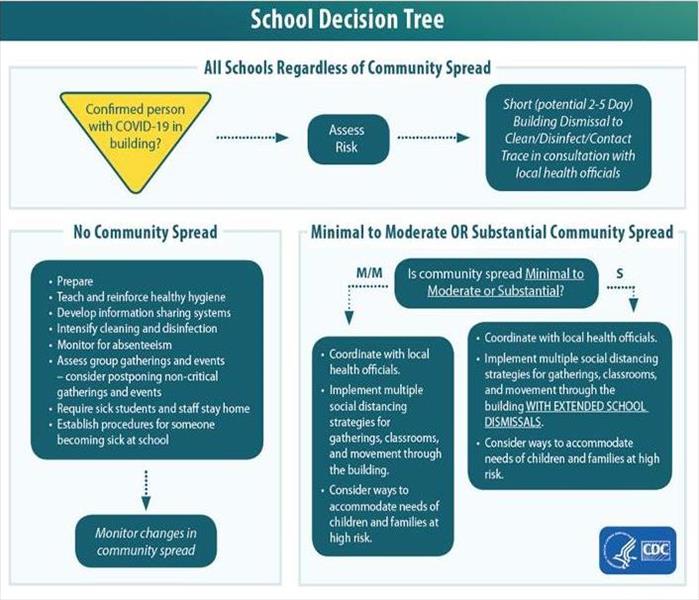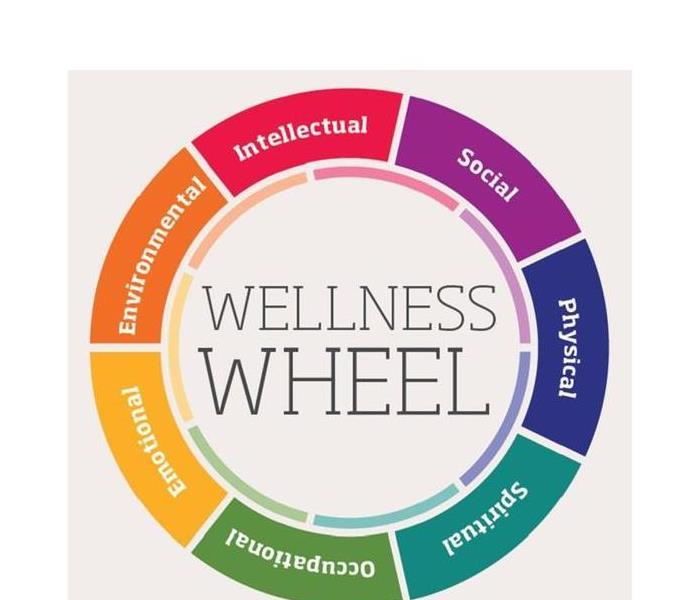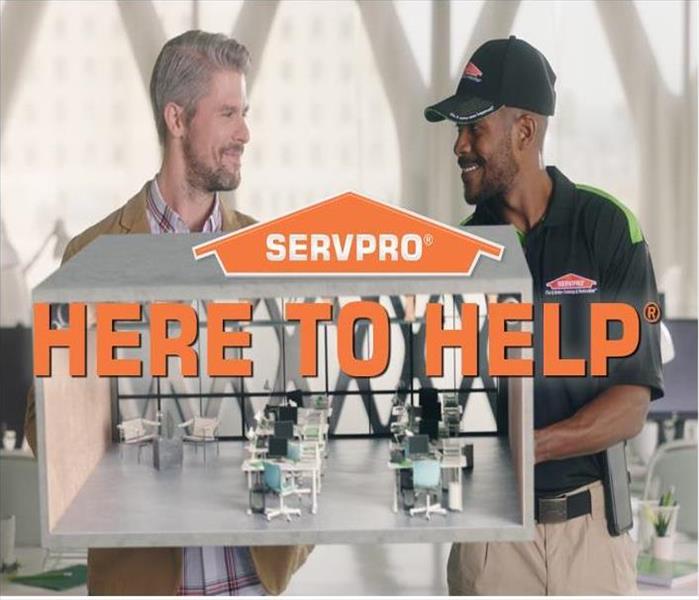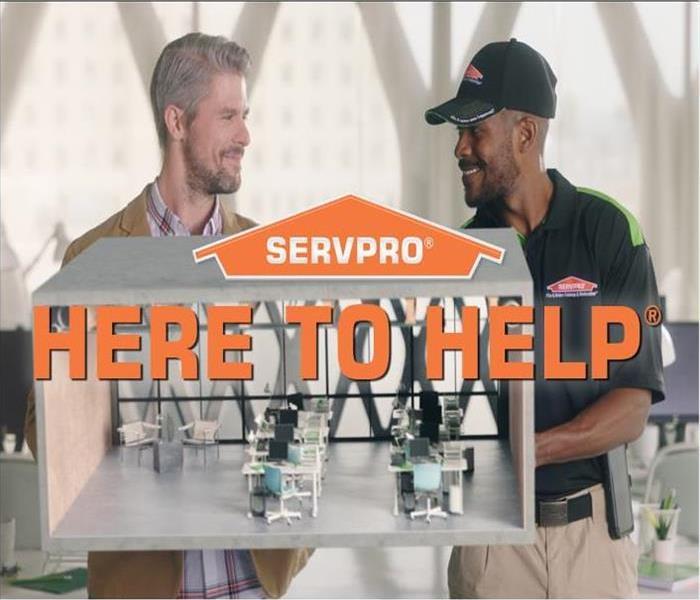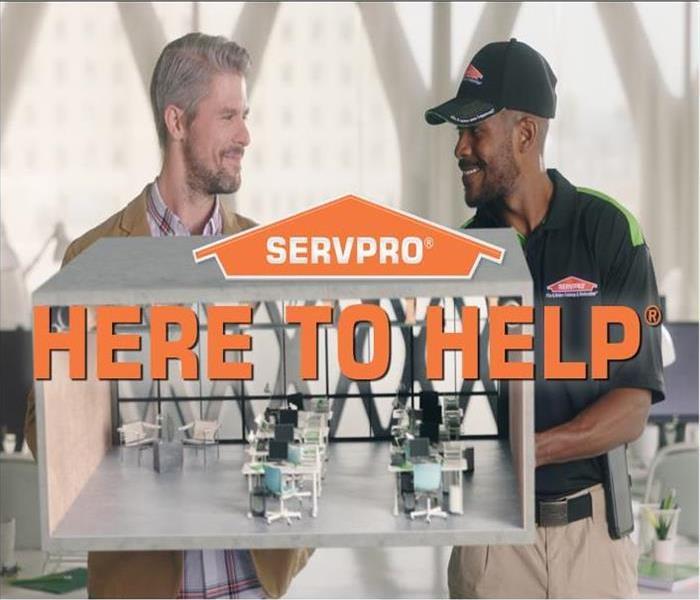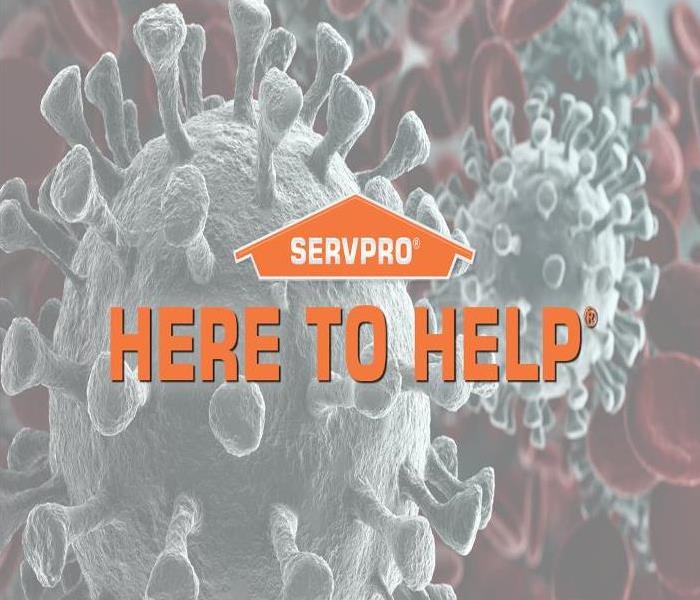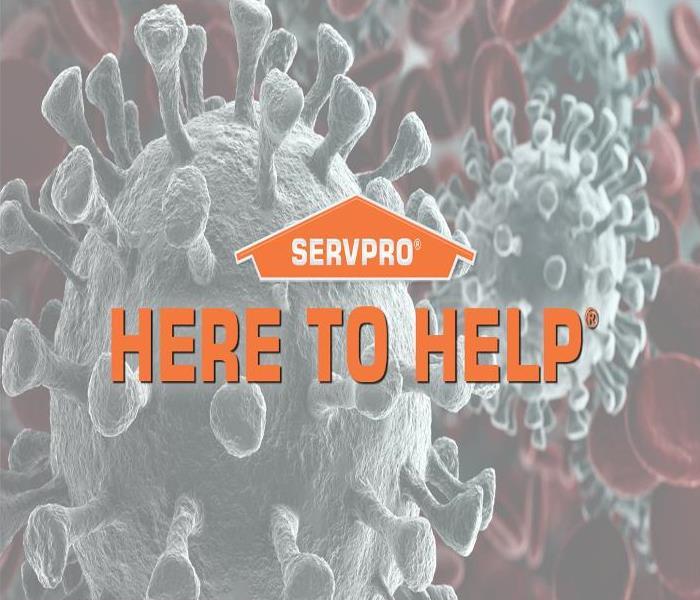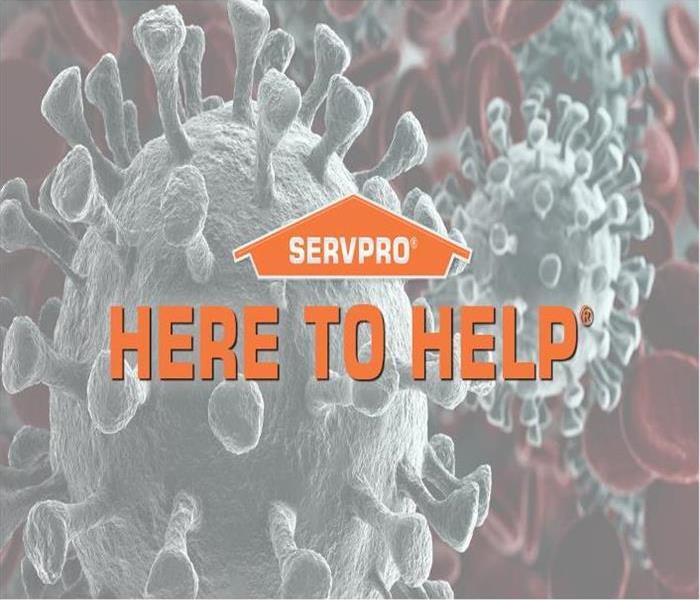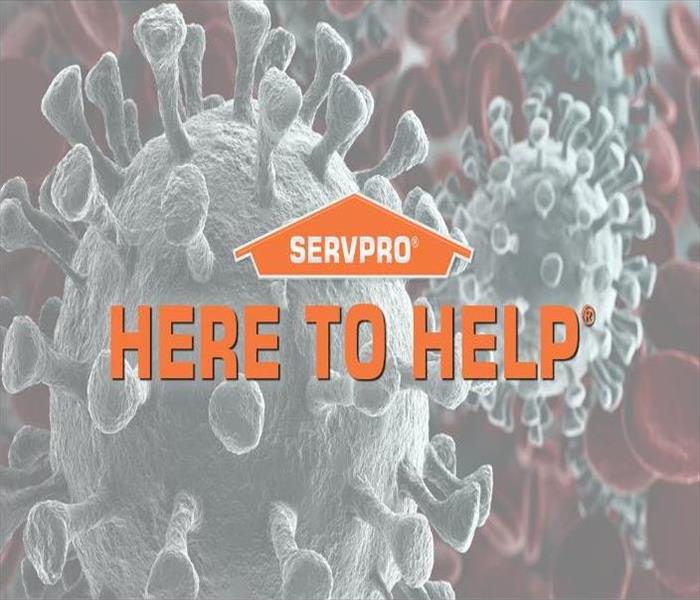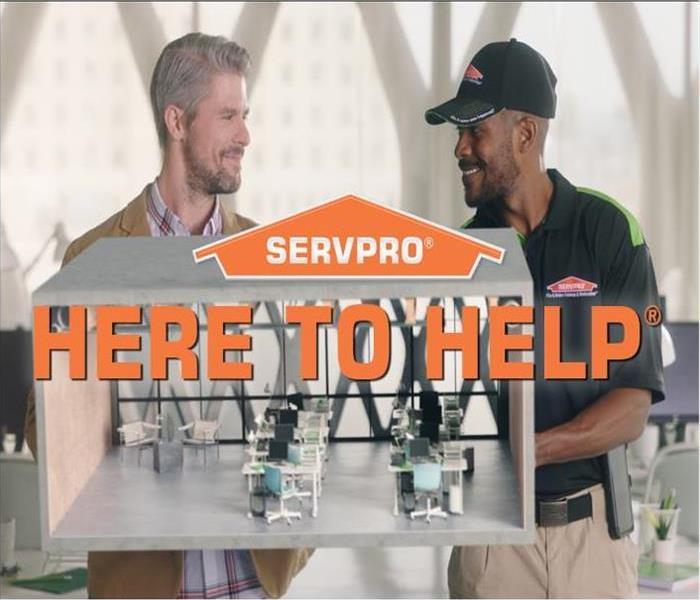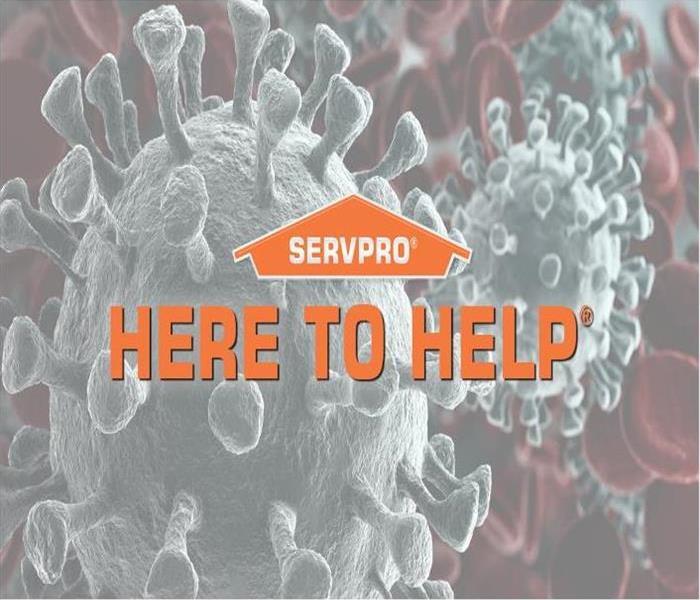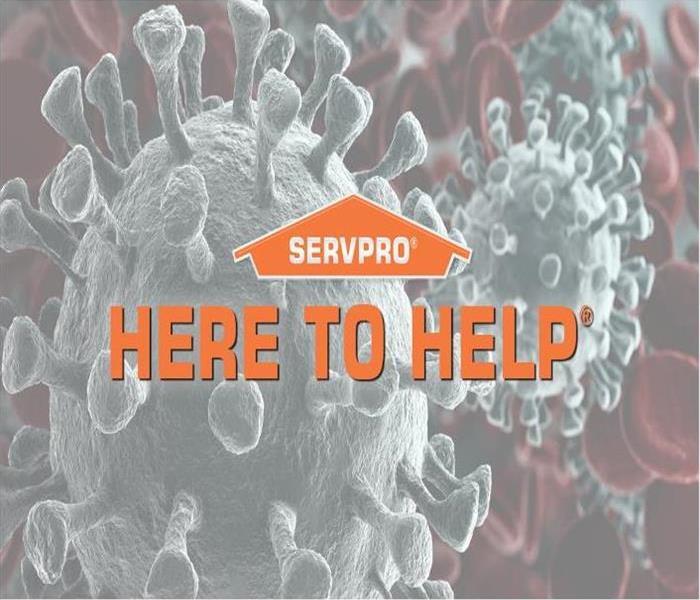Archived Community Blog Posts
Spread Holiday Cheer with SERVPRO and the Patriots Toy Drive!
11/15/2024 (Permalink)
 SERVPRO is proud to give back through the Patriots Toy Drive
SERVPRO is proud to give back through the Patriots Toy Drive
This holiday season, SERVPRO is proud to give back through the Patriots Toy Drive, spreading joy to children in need. Here’s how you can join us in making a difference:
Drop Off Your Gift
Visit us at 90 Elm Street, Hopkinton, MA, and place a new, unwrapped toy in our collection box located in the lobby.
Can’t Stop By? We’ve Got You Covered!
We can bring a toy collection box straight to your office. Simply email Tom at triley@SERVPROframingham.com to arrange a delivery.
Donate Online
Support the cause from anywhere by making a donation here: SERVPRO Donation Link.
Thank you for helping us bring smiles to children’s faces this holiday season. Your generosity means the world to us! ??
Floodwater Dangers: Understanding the Risk of Electrocution and Other Hazards
10/17/2024 (Permalink)
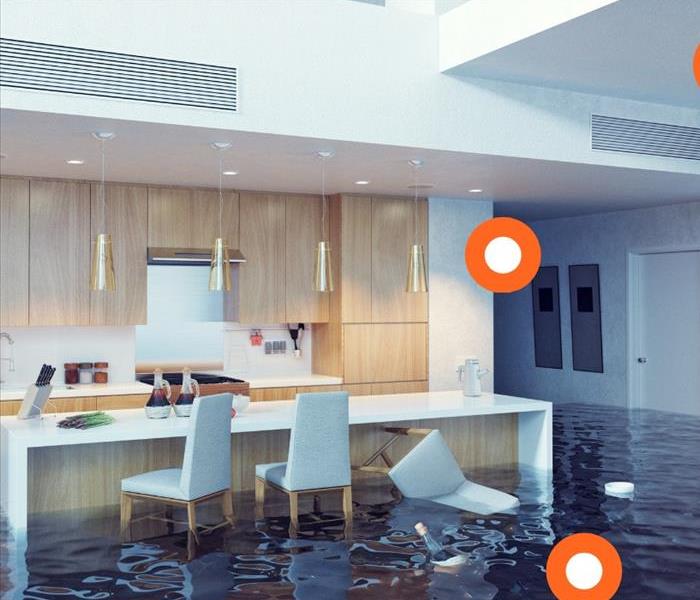 Safety always comes first—don’t take unnecessary risks in flood situations. If you need assistance contact us today!
Safety always comes first—don’t take unnecessary risks in flood situations. If you need assistance contact us today!
When flooding occurs, the immediate instinct is to focus on the rising water levels and potential property damage. However, one of the most critical and life-threatening dangers often goes unnoticed—electrocution. Floodwater can carry a range of hidden dangers, and understanding these risks could save your life.
Why Is Floodwater So Dangerous?
Floodwater isn’t just water; it’s a powerful force that often brings a mix of hazardous materials and contaminants. It can carry everything from raw sewage and chemicals to sharp debris and, critically, the risk of electrical hazards. Power lines, electrical appliances, and submerged outlets can all pose severe risks when exposed to floodwater. Even a small amount of water in the wrong place can turn deadly when it comes into contact with electricity.
While most of us know the physical dangers of floodwater—such as strong currents or deep water—the risk of electrocution is less obvious but just as severe. Taking appropriate precautions can be the difference between safety and tragedy.
The Risk of Electrocution in Floodwater
One of the greatest hidden dangers in floodwater is electrocution. Water is an excellent conductor of electricity, and when floodwater comes into contact with live electrical sources, it can become electrified. Electrical currents can travel through water, affecting anyone who comes into contact with it, even if the electrical source is not visible.
Here are some common ways floodwater becomes electrified:
- Downed power lines: Floods can knock over power lines, causing them to electrify large areas of water.
- Submerged electrical appliances: If a home or business is flooded, electrical appliances, outlets, and wiring can pose risks even if the power is out.
- Hidden electrical currents: Even if you cannot see the source, an electrical current can still travel through water, making it dangerous to step into any standing water.
Essential Safety Tips When Dealing with Floodwater
If you find yourself in an area affected by flooding, it’s vital to take every possible precaution to stay safe. Here are a few crucial tips to keep in mind:
1. Avoid Touching Electrical Equipment
Never touch electrical equipment, appliances, or power sources if you are wet or standing in water. The combination of water and electricity can be fatal. Even if you’re in a rush to salvage belongings or turn off the power, it’s not worth the risk if water is present. It’s best to wait until a professional can assess the situation.
2. Be Cautious of Hidden Objects
Floodwater is often murky, making it impossible to see what’s lurking beneath the surface. Unseen objects, such as sharp debris, glass, or even animals, can cause serious injuries if you aren’t careful. If you must wade through floodwater, wear appropriate protective clothing and be cautious of every step.
3. Avoid Using Open Flames
While it may seem like a good idea to use candles or other open flames for light during a flood-related power outage, this can be extremely dangerous. Flooding often causes gas leaks, which can create a highly explosive environment. Using open flames in areas where gas may be leaking can ignite a fire or cause an explosion. Instead, use battery-powered lights or flashlights for illumination.
Additional Precautions to Consider
Beyond the immediate dangers of electrocution and injury, there are other precautions to keep in mind when dealing with floodwater:
- Turn off the power if possible: If you know your home is at risk of flooding and you have the chance, turn off the main electrical power supply before the water reaches electrical systems. This reduces the risk of electrocution.
- Stay informed: Monitor news reports and local authorities for updates on the status of power lines, electrical hazards, or gas leaks in flooded areas. Information can change rapidly during a flood event, so staying updated can help you avoid danger zones.
- Seek professional help: Once floodwater subsides, it’s tempting to re-enter your home or business to assess the damage. However, it’s important to have a professional—such as an electrician or emergency services personnel—evaluate the property for electrical hazards before entering.
Long-Term Consequences of Flood Damage
Even after floodwater recedes, the damage it causes can linger for months or even years. Electrical systems, wiring, and appliances that have been submerged in water are often compromised and may no longer be safe to use. Mold and other contaminants can also form, creating additional health risks.
Once your property is deemed safe, you’ll likely need to replace or repair many electrical components. Never attempt to restore electrical power without a thorough inspection from a licensed electrician.
Floodwater is dangerous for many reasons, but the risk of electrocution is perhaps the most critical hazard to be aware of. Water and electricity don’t mix, and the consequences of coming into contact with electrified water can be deadly. Always prioritize safety by avoiding electrical equipment when wet or standing in water, steering clear of unseen hazards, and never using open flames during a flood event.
By staying informed and taking the right precautions, you can minimize your risk and protect yourself and your loved ones from floodwater's many hazards. Safety always comes first—don’t take unnecessary risks in flood situations. If you need assistance contact us today!
Halloween Safety: Tips for a Fun and Safe Celebration
10/11/2024 (Permalink)
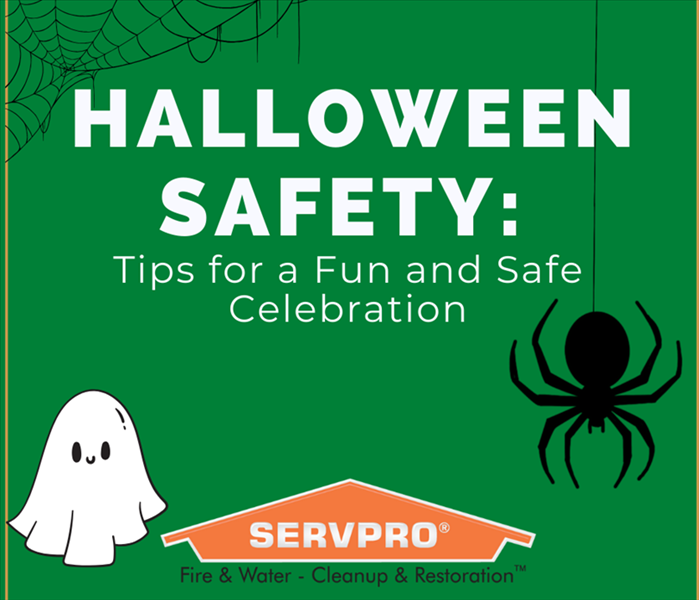 By following these tips, you can make sure that your Halloween celebration is both thrilling and safe.
By following these tips, you can make sure that your Halloween celebration is both thrilling and safe.
Halloween is a time for creativity, costumes, and fun, but it’s important to remember that safety should be a top priority. With a bit of planning and awareness, you can ensure that Halloween is both enjoyable and secure for everyone. Here’s a guide to keeping the holiday safe for trick-or-treaters, party-goers, and homeowners alike.
1. Costume Safety
Your costume is the highlight of Halloween, but it’s essential to choose one that prioritizes safety:
- Opt for Flame-Resistant Materials: Ensure that costumes are made from flame-resistant fabrics to reduce the risk of fire.
- Avoid Long, Flowing Costumes: These can pose tripping hazards. Consider shorter costumes or ones that can be easily adjusted.
- Make Sure Masks Fit Properly: Masks should allow for clear vision and breathing. If masks are not an option, use face paint or makeup to complete your look.
- Add Reflective Tape: Enhance visibility by adding reflective tape to costumes, especially if trick-or-treating in low-light conditions.
2. Trick-or-Treating Tips
Trick-or-treating is a beloved tradition, but safety is crucial. Here’s how to ensure a safe outing:
- Accompany Young Children: Always have an adult or responsible older child escort younger trick-or-treaters.
- Use Flashlights: Equip everyone with flashlights or glow sticks to increase visibility and make sure that drivers can see you.
- Stick to Well-Lit Areas: Choose well-lit streets and avoid shortcuts through dark or unfamiliar areas.
- Cross-Streets Safely: Remind children to use crosswalks and to look both ways before crossing the street.
3. Candy Safety
Candy is the main attraction of Halloween, but make sure it’s enjoyed safely:
- Inspect Treats: Check all candy for tampering or damage before eating. Discard anything that seems suspicious.
- Be Aware of Allergies: If your child has food allergies, ensure that they only eat treats that are safe for them. Consider carrying an allergy-friendly snack as a backup.
- Limit Sugar Intake: Too much candy can lead to stomachaches and tooth issues. Encourage moderation and balance with healthy snacks.
4. Party Safety
If you’re hosting or attending a Halloween party, keep these tips in mind:
- Secure Your Home: Make sure your home is safe for guests. Clear walkways of any obstacles and ensure that decorations don’t pose tripping hazards.
- Check for Allergies: If you’re serving food, be mindful of guests' food allergies. Label dishes clearly and offer a variety of allergy-friendly options.
5. Decorations and Lighting
Decorations set the Halloween mood, but they should be safe and well-maintained:
- Use LED Lights: Opt for LED lights for decorations, as they are cooler and less likely to cause fires.
- Secure Decorations Properly: Ensure that decorations are firmly attached and won’t create tripping hazards or get knocked over easily.
- Keep Pathways Clear: Make sure walkways and driveways are free of decorations and obstacles to prevent accidents.
Halloween is a time for creativity, excitement, and fun, but keeping safety in mind ensures that everyone can enjoy the festivities without worry. By following these tips, you can make sure that your Halloween celebration is both thrilling and safe. From costumes to candy, and everything in between, a little preparation goes a long way in making this Halloween a memorable and secure experience for all.
Happy Halloween, and stay safe!
SERVPRO of Norwood/West Roxbury is your comprehensive solution for residential and commercial restoration and cleaning services. Our highly trained technicians are available 24/7 to address any water, fire, or storm damage in Westwood, MA | Dedham, MA | West Roxbury, MA | Norwood, MA and surrounding areas.
National Preparedness Month: A Call to Action for Safety and Resilience
9/1/2024 (Permalink)
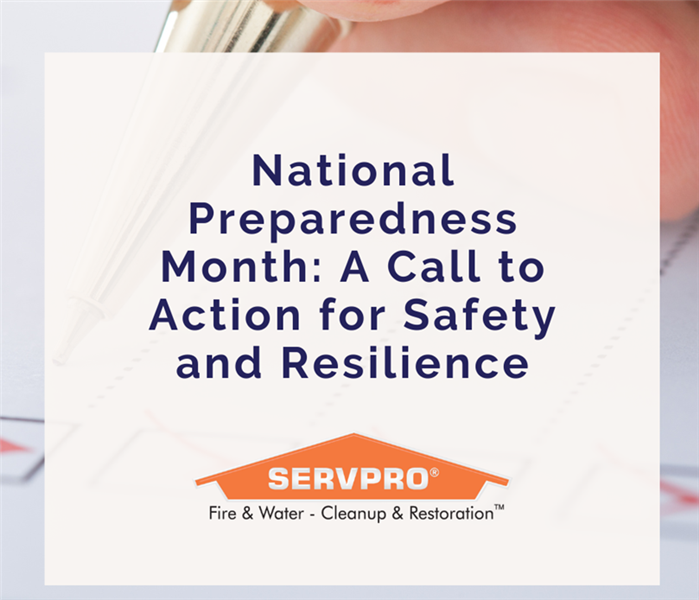 Disasters can strike without warning, and the effects can be devastating.
Disasters can strike without warning, and the effects can be devastating.
Every September, National Preparedness Month (NPM) serves as a reminder of the importance of preparing for emergencies and disasters. Whether it's natural disasters, health crises, or unexpected events, being prepared can make all the difference in safeguarding ourselves, our loved ones, and our communities.
Why National Preparedness Month Matters
Disasters can strike without warning, and the effects can be devastating. National Preparedness Month is a nationwide initiative to raise awareness about the importance of preparing for these emergencies. By taking proactive steps, we can mitigate the impact of disasters, reduce the loss of life, and increase the resilience of our communities.
This year's theme, "Take Control in 1, 2, 3," is a call to action for everyone, especially older adults, to take simple, practical steps toward preparedness. Whether it's creating an emergency plan, assembling a disaster kit, or staying informed, these actions can empower us to respond effectively when disaster strikes.
Weekly Activities to Boost Your Preparedness
Throughout September, National Preparedness Month offers a range of activities and resources to help you take control of your safety. Here’s how you can get involved each week:
Week 1: August 28–September 3 – Kickoff to NPM
The first week is all about raising awareness. This is the time to start thinking about your preparedness plan and sharing information with others. Whether it's discussing emergency plans with your family or attending a local preparedness event, getting involved early sets the stage for a proactive month.
Week 2: September 4–10 – Multigenerational Preparedness
Emergencies affect everyone, so it's important to involve every generation in your preparedness plans. This week focuses on creating a family emergency communication plan that ensures all family members, from the youngest to the oldest, know what to do in an emergency. Discuss evacuation routes, meeting points, and emergency contacts, so everyone is on the same page.
Week 3: September 11–17 – Community Service
Communities that work together are stronger together. This week encourages you to get involved in your community's preparedness efforts. Whether it's joining a local emergency response team, organizing a preparedness workshop, or simply checking in on neighbors who might need extra help, your efforts can make a big difference.
Week 4: September 18–24 – Individual Preparedness
Personal preparedness is key to staying safe in an emergency. This week, focus on the steps you can take to prepare yourself and your household. Download the FEMA app for up-to-date information and resources, assemble an emergency kit, and make sure you have a plan for any specific needs, such as pets or medical conditions.
Week 5: September 25–30 – Lead Up to National PrepareAthon Day
As National Preparedness Month comes to a close, it’s time to put everything into action. National PrepareAthon Day is an opportunity to practice your emergency plans, review your safety checklists, and ensure that your preparations are in place. Whether it's participating in a local drill or simply going over your family’s emergency plan one more time, taking action now can help you respond confidently in the face of a disaster.
Additional Ways to Get Prepared
In addition to the weekly activities, there are many other steps you can take to enhance your preparedness during National Preparedness Month:
- Create an Emergency Kit: Make sure you have essential items like food, water, first aid supplies, flashlights, batteries, and blankets on hand. Don't forget to include items like medications, important documents, and any special needs supplies.
- Prepare for Specific Risks: Learn about the specific risks in your area, such as wildfires, hurricanes, or earthquakes, and take steps to reduce your vulnerability. This could include clearing your property of wildfire risks, securing heavy furniture, or learning about evacuation routes.
- Consider Special Needs: If you or a loved one has special needs or disabilities, take extra care to ensure that your emergency plan addresses these needs. This might involve creating a personalized emergency kit, arranging for transportation, or making sure your home is accessible in an emergency.
The Importance of Being Prepared
National Preparedness Month is more than just a reminder; it’s a call to action. By taking steps to prepare for emergencies, you’re not only protecting yourself and your loved ones but also contributing to the resilience of your community. Disasters are unpredictable, but with the right preparations, we can all take control and face them with confidence.
As we move through September, let's commit to making preparedness a priority. Whether you're creating an emergency plan for the first time or simply reviewing and updating your existing preparations, every action counts. Together, we can ensure that we're ready for whatever comes our way.
For more information and resources on how to prepare, visit Ready.gov. Stay safe, stay informed, and take control in 1, 2, 3!
SERVPRO of Norwood/West Roxbury is your comprehensive solution for residential and commercial restoration and cleaning services. Our highly trained technicians are available 24/7 to address any water, fire, or storm damage in Westwood, MA | Dedham, MA | West Roxbury, MA | Norwood, MA and surrounding areas.
Cheering on Our Team Member Sophia Masciarelli in Her First NYC Marathon!
7/20/2024 (Permalink)
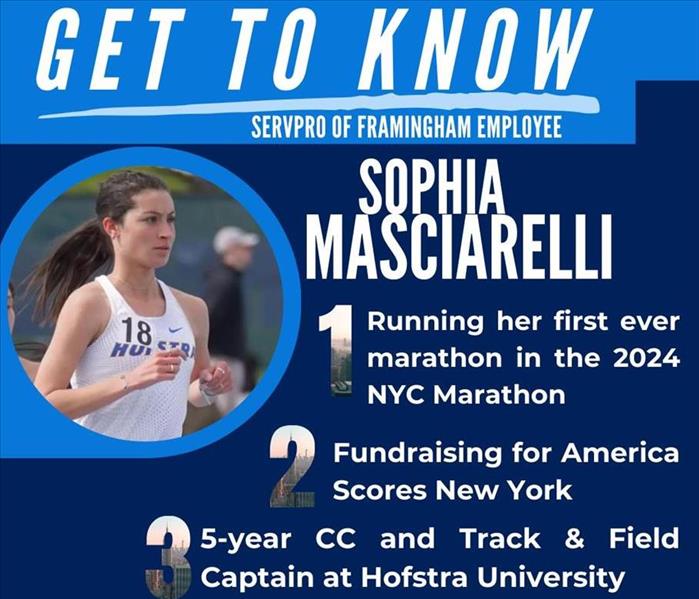 Let's show Sophia the power of community and help her make her marathon debut an unforgettable journey
Let's show Sophia the power of community and help her make her marathon debut an unforgettable journey
We are thrilled to announce that one of our own team members, Sophia Masciarelli, is gearing up for her very first NYC Marathon! Sophia plays a crucial role in our team offices, and now she's stepping up to the challenge of running the iconic marathon on November 3rd.
But Sophia's journey isn't just about conquering 26.2 miles—it's also about making a meaningful impact. She's running to support America SCORES New York, a fantastic charitable organization that provides after-school programs combining soccer, creative writing, and service learning to empower youth in underserved communities across New York City.
America SCORES New York aims to nurture young minds, build confidence, and foster a love for learning through engaging activities that blend sports, creativity, and community service. By supporting Sophia, you're not only cheering her on during her marathon training but also contributing to the growth and development of countless young lives in our city.
Join us in rallying behind Sophia as she prepares for this incredible challenge! Your support can make a world of difference. To learn more about Sophia's fundraising efforts and to donate, please visit her fundraising page here: Sophia's Fundraising Page.
Let's show Sophia the power of community and help her make her marathon debut an unforgettable journey of compassion and determination. Together, we can make a lasting impact on our community and support the next generation of leaders through America SCORES New York. Go, Sophia!
The 1st Annual Celebration of Life 5K!
4/21/2024 (Permalink)
 Mark your calendars and join us on June 22 at the Field of Dreams in Plainville, MA. See you there!
Mark your calendars and join us on June 22 at the Field of Dreams in Plainville, MA. See you there!
We are thrilled to announce our partnership with the For Kids' Sake Foundation as a proud sponsor of the 1st annual Celebration of Life 5K. This exciting event, honoring the life and legacy of Malia Jusczyk, aims to raise funds for the For Kids' Sake Foundation to help crush cancer.
Event Details:
- Date: June 22
- Location: Field of Dreams in Plainville, MA
How You Can Get Involved:
- Volunteer: Help make this event a success by volunteering your time and energy.
- Sponsor: Showcase your support for this cause by becoming a sponsor of the event.
- Participant: Join us for a day of fun and fitness as we run to support a great cause.
Together, we can make a difference and support this important cause. Mark your calendars and join us on June 22 at the Field of Dreams in Plainville, MA. See you there!
Link to register or donate:
Join Our SERVPRO Patriots Toy Drive!
10/29/2023 (Permalink)
 The Patriots Toy Drive is a wonderful opportunity to make a positive impact on the holiday season
The Patriots Toy Drive is a wonderful opportunity to make a positive impact on the holiday season
The holiday season is a time of giving, and our SERVPRO franchise is thrilled to be a part of the Patriots Toy Drive this year. We invite you to join us in making a difference in the lives of children by contributing to this heartwarming initiative. Here's how you can get involved!
Event Details:
What: Patriots Toy Drive
Where: SERVPRO Office, 90 Elm Street, Hopkinton, MA 01748
How: Drop off new toys in our office lobby
When: Monday – Friday, 9 AM – 5 PM
How to Participate:
- Donate a New Toy: We welcome any new, unwrapped toys that you'd like to contribute to the Patriots Toy Drive. Simply drop them off at our SERVPRO office, and look for the collection box in our lobby.
- Visit Our Office: Stop by our office during our regular business hours to deliver your donation. Our team will be on hand to receive your heartfelt contributions.
- Spread the Word: Help us make a bigger impact by sharing this information with your friends, family, and colleagues. Encourage them to join us in spreading joy to children in need.
- Get a Toy Box for Your Office: Want to involve your workplace in this heartwarming cause? We're happy to provide a toy collection box for your office. Reach out to Tom in our sales office at triley@SERVPROframingham.com to coordinate the details.
- Have Questions or Need Assistance? If you have any questions, need more information, or would like assistance in any way, feel free to reach out to Tom at the provided email address. He'll be more than happy to help make your participation in the Patriots Toy Drive seamless and enjoyable.
At SERVPRO, we believe in the power of community and the joy that comes from giving back. The Patriots Toy Drive is a wonderful opportunity to make a positive impact on the holiday season for children who could use a little extra cheer. Join us in spreading the warmth and magic of the holidays by contributing to this meaningful cause. Together, we can make a difference, one toy at a time. Thank you for your generosity and for being a part of this incredible journey!
The Dangers of Fall Leaves and Weather: Staying Safe and Prepared
9/20/2023 (Permalink)
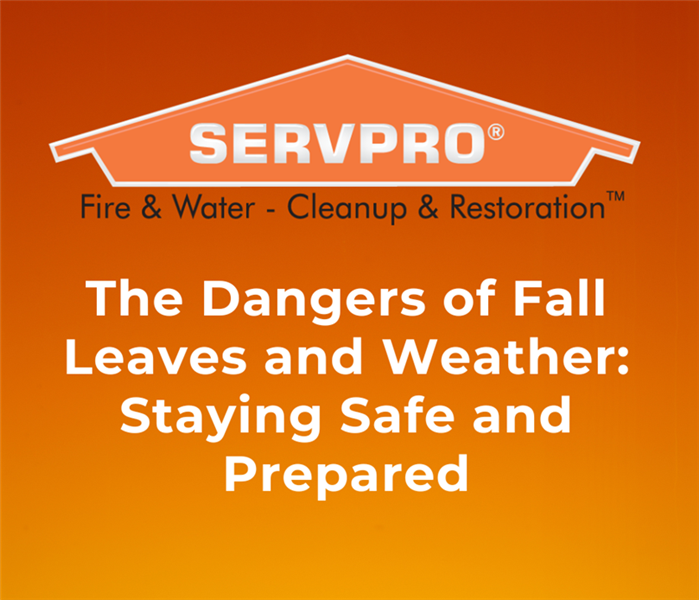 While fall is a beautiful and enjoyable season, it's essential to be aware of the potential dangers associated with falling leaves
While fall is a beautiful and enjoyable season, it's essential to be aware of the potential dangers associated with falling leaves
Fall is a magical season, with its vibrant foliage and cooler temperatures making it a favorite for many. Here are potential hazards associated with fall leaves and weather.
- Slippery Leaves: While the sight of colorful leaves blanketing the ground is picturesque, it can also be treacherous. Fallen leaves can become wet and create slippery surfaces, posing a significant risk for slips and falls. This is especially true in areas with heavy foot traffic, such as sidewalks and driveways.
Keep walkways clear of leaves and debris, and use a leaf blower or rake to prevent accumulation.
- Reduced Visibility: The shorter days of fall mean less daylight, which can affect visibility for both pedestrians and drivers. Leaves can obstruct sidewalks and roadways, making it challenging to see potential hazards.
Wear bright clothing or reflective accessories when walking or biking in low-light conditions. Ensure your vehicle's headlights and taillights are in working order.
- Wet and Slippery Roads: As fall progresses, rainy and stormy weather becomes more frequent. Wet leaves on the road can create slippery conditions for drivers, leading to accidents.
Slow down when driving on wet roads covered with leaves and maintain a safe following distance from other vehicles. Ensure your tires are in good condition to provide proper traction.
- Increased Allergens: Fall leaves can trigger allergies for some individuals, as they release mold spores and other allergens into the air. This can lead to symptoms such as sneezing, congestion, and itchy eyes.
If you have allergies, consider using air purifiers in your home and keeping windows closed on windy days. Consult with an allergist for advice on managing your allergies during the fall season.
- Temperature Fluctuations: Fall is a season of temperature fluctuations, with chilly mornings and warm afternoons. Sudden drops in temperature can catch people off guard, potentially leading to cold-related illnesses.
Dress in layers to stay warm in the morning and shed layers as the day warms up. Carry a light jacket or sweater for unexpected temperature changes.
- Fallen Branches and Trees: Strong winds and storms can cause trees and branches to fall. This poses a significant danger to people, vehicles, and property.
Inspect trees on your property for signs of damage or weakness, and trim branches that could potentially fall. During windy weather, avoid standing under trees and park your car away from large trees.
While fall is a beautiful and enjoyable season, it's essential to be aware of the potential dangers associated with falling leaves and changing weather. By taking precautionary measures and staying informed about weather conditions, you can ensure a safe and pleasant autumn for yourself and your loved ones.
SERVPRO Of Norwood West Roxbury is The #1 Choice in Cleanup and Restoration for residential and commercial buildings’ fire, mold, water, and storm damage. If you are looking for assistance, just click on the contact us page, and someone will be in touch shortly.
SERVPRO of Norwood West Roxbury Shares How to Deal with Fire and Smoke Damage in a Home or Business
1/7/2023 (Permalink)
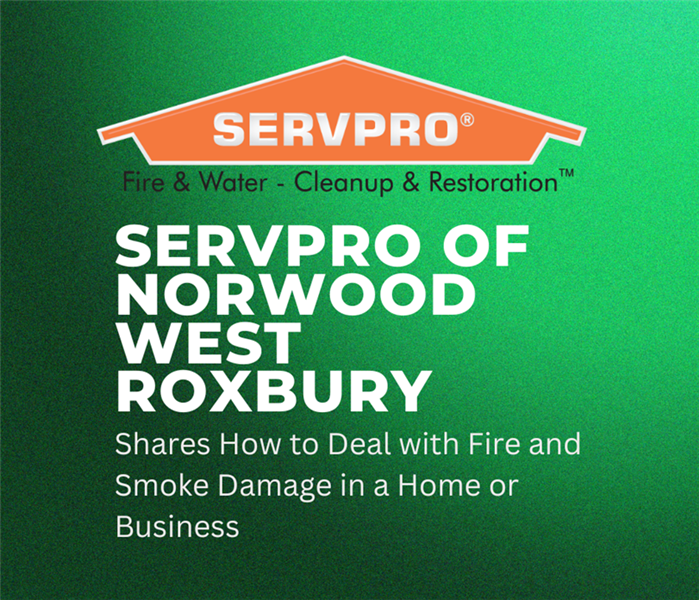 SERVPRO Norwood West Roxbury trained in a variety of different related clean-up including the latest professional equipment, tools, and procedures.
SERVPRO Norwood West Roxbury trained in a variety of different related clean-up including the latest professional equipment, tools, and procedures.
It is not common for fire loss, soot damage, or smoke damage problems to occur in any building.
When a firefighter enters a fire, their first defense is to use lots of water to extinguish the fire. The steps that firefighters take to control the fire will leave back ashes, fire loss, soot damage, smoke damage or air quality problems. You will need to hire a professional to get the remainder of the damage taken care of. SERVPRO of Norwood West Roxbury is trained in a variety of different related clean-up including the latest professional equipment, tools, and procedures.
With our fire cleanup efforts, the business can get back to business as soon as it is physically possible.
Smoke and fire damage situation is different for everyone, each situation requires a unique solution tailored to the specific conditions.
SERVPRO of Norwood West Roxbury is your premier choice for fire damage and restoration. Our teams are ready to respond 24 hours a week, any day of the year. When you bring us on the job our team of licensed contractors and certified technicians will work collaboratively with you throughout the duration of the project. They will keep you updated on the project's status and ensure that your expectations are met. We will help you to move forward and make it “Like it never even happened” for all of your fire damage.
SERVPRO of Norwood West Roxbury Celebrates Thanksgiving
11/5/2022 (Permalink)
 Happy Thanksgiving from all of us at SERVPRO of Norwood West Roxbury.
Happy Thanksgiving from all of us at SERVPRO of Norwood West Roxbury.
Thanksgiving Day is an annual national holiday in the United States and is a day to celebrate the harvest and other blessings of the past year. It is a time for gathering with loved ones. However, oftentimes safety can be a concern when cooking.
Here are the top safety tips:
- Stay in the kitchen when you are cooking
- Stay home when cooking your turkey and check on it frequently.
- Keep children away from the stove.
- Make sure kids stay away from hot food.
- Keep knives out of the reach of children.
- Keep matches and lighters out of the reach of children.
- Never leave children alone in a room with a lit candle.
- Keep the floor clear so you don’t trip.
- Make sure your smoke alarms are working.
Above all else, Happy Thanksgiving from all of us at SERVPRO of Norwood West Roxbury.
SERVPRO of Norwood West Roxbury is your premier choice for restoration and rebuilding. Our teams are ready to respond 24 hours a week, any day of the year. When you bring us on the job our team of licensed contractors and certified technicians will work collaboratively with you throughout the duration of the project. They will keep you up to date on the status of the project and make sure that your expectations are met. We will help you to move forward and make it “Like it never even happened” for all of your storm damage.
SERVPRO of Norwood West Roxbury Helps Businesses Prepare For Flooding.
11/5/2022 (Permalink)
 Flooding happens more often than we'd like. It is critical that businesses are prepared for natural disasters.
Flooding happens more often than we'd like. It is critical that businesses are prepared for natural disasters.
Flooding happens more often than we'd like. It is critical that businesses are prepared for natural disasters. It is recommended to have flood insurance and tools that mitigate total loss in emergency situations.
According to the Federal Emergency Management Agency (FEMA), flooding occurs in over 90 percent of disasters, averaging 17 billion dollars of damage each year.
Here are some helpful tips:
- Analyze flood maps: FEMA is the most reliable resource for this. They provide flood maps that are updated regularly.
- Conduct risk analysis: Storms can completely destroy a given area. FEMA states that as little as one inch of flood water can cause $25,000 in damage. This can cause the company operations issues for an unforeseen amount of time.
- Generate a disaster plan: Having a disaster plan is a great way to maintain calmness. Train your employees with steps in your disaster plan.
- Obtain commercial flood insurance: You will want to establish your risk analysis. This will give you an idea of what type of commercial flood insurance to purchase.
- Protect business information: When flooding does occur, it can be hard to salvage equipment and paperwork.
- Purchase flood boards: If you are in a flood-prone area or at risk of flooding you will want to consider this.
- Raise electrical sockets, fuse boxes, and wiring: Moving electrical wiring to a safe height is simple.
- Install non-return valves: Businesses should consider the installation of non-return valves for drains. This can be an added layer of protection during flooding.
SERVPRO of Norwood West Roxbury is your premier choice for restoration and rebuilding. Our teams are ready to respond 24 hours a week, any day of the year. When you bring us on the job our team of licensed contractors and certified technicians will work collaboratively with you throughout the duration of the project. They will keep you up to date on the status of the project and make sure that your expectations are met. We will help you to move forward and make it “Like it never even happened” for all of your storm damage.
SERVPRO of Norwood West Roxbury Helps Prepare For Winter Storms
11/5/2022 (Permalink)
 It is important to know what to do before the winter weather arrives.
It is important to know what to do before the winter weather arrives.
Winter storms can create a higher risk of car accidents, carbon monoxide poisoning, and more.
They can also create blizzard conditions, freezing rain, snow, ice, extreme cold, and high winds. They might even last for several days which can cut off heat, and cause power outages.
It is important to know what to do before the winter weather arrives.
Here are some quick winter storm tips:
- Install caulking and weather stripping around doors and windows.
- Insulate pipes to reduce freezing.
- Install and test smoke alarms and carbon monoxide detectors.
- Pay attention to weather reports and warnings.
- Sign up for your community’s warning system such as Emergency Alert System (EAS) and NOAA Weather Radio.
- Gather supplies or restock your disaster supply kits.
- Remember the needs of your pets.
- Have extra batteries for radios, flashlights and cellphones.
- Create an emergency supply kit for your vehicle. Include jumper cables, sand, a flashlight (hand-crank or battery-operated), first aid kit, etc.
- If you must go outside, dress in layers.
Winter storms are not fun, but it is mother nature and we can not prevent it. The best thing to do is be prepared for a storm.
SERVPRO of Norwood West Roxbury is your premier choice for restoration and rebuilding. Our teams are ready to respond 24 hours a week, any day of the year. When you bring us on the job our team of licensed contractors and certified technicians will work collaboratively with you throughout the duration of the project. They will keep you up to date on the status of the project and make sure that your expectations are met. We will help you to move forward and make it “Like it never even happened” for all of your storm damage.
SERVPRO of Norwood West Roxbury Recognizes Fire Prevention Week
10/5/2022 (Permalink)
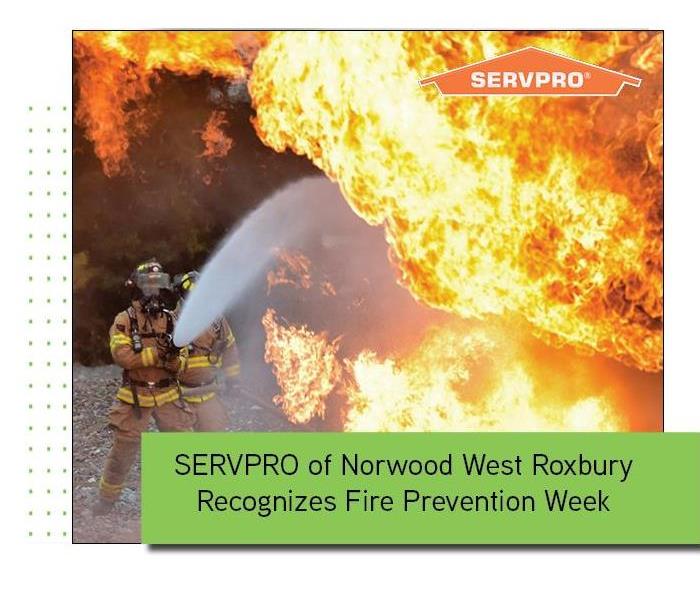 It is important for everyone to plan and practice a home fire escape. It is important everyone knows what to do when the smoke alarm sounds.
It is important for everyone to plan and practice a home fire escape. It is important everyone knows what to do when the smoke alarm sounds.
On October 9th, 1911 over 250 people died and buildings were destroyed by a fire. In 1922, President Harding proclaimed National Fire Prevention Week.
Here are some tips to help you with fire prevention.
- Install and maintain smoke detectors.
- Have a fire escape plan and practice it with your family.
- Keep matches and lighters out of the hands of children.
- Have home heating systems and chimneys inspected?
It is important for everyone to plan and practice a home fire escape. It is important everyone knows what to do when the smoke alarm sounds.
Have a plan for everyone in the home, and make sure they know what to do. Smoke alarms sense smoke well before you can, alerting you to danger, this is why it is important to have one in every bedroom.
SERVPRO of Norwood West Roxbury is your premier choice for restoration and rebuilding. Our teams are ready to respond 24 hours a week, any day of the year. When you bring us on the job our team of licensed contractors and certified technicians will work collaboratively with you throughout the duration of the project. They will keep you up to date on the status of the project and make sure that your expectations are met. We will help you to move forward and make it “Like it never even happened” for all of your storm damage.
SERVPRO of Norwood West Roxbury Explains Fire Prevention Day
10/5/2022 (Permalink)
 It is important to create awareness of fires and know how to participate because we never know when a fire can happen.
It is important to create awareness of fires and know how to participate because we never know when a fire can happen.
On October 8, 1871, Mrs. O’Leary was in her barn, milking her cow. The cow kicked over a lamp, which started the Great Chicago Fire of 1871. More than 300 people were killed, 100,000 people were left homeless, and over 17,000 structures were destroyed. This and other major fires caused a movement to proclaim this holiday, National Fire Prevention Day on October 9th. (nfpa.org)
It is important to create awareness of fires and know how to participate because we never know when a fire can happen.
- Fire departments around the country hold sessions and seminars to teach fire prevention and safety.
- Schools have fire drills and hold lessons on fire prevention.
- Families conduct an EDITH exercise (Exit Drills In The Home). If you need assistance with this, reach out to your local fire department.
- Businesses should conduct fire drills. Set up an escape plan.
- Learn more about fires both nationally and locally.
Fires are never something that anyone anticipates happening, but they happen more often than not, it is important to be prepared as best as you can.
SERVPRO of Norwood West Roxbury is your premier choice for restoration and rebuilding. Our teams are ready to respond 24 hours a week, any day of the year. When you bring us on the job our team of licensed contractors and certified technicians will work collaboratively with you throughout the duration of the project. They will keep you up to date on the status of the project and make sure that your expectations are met. We will help you to move forward and make it “Like it never even happened” for all of your storm damage
Fall Safety From SERVPRO of Norwood West Roxbury
10/5/2022 (Permalink)
 Fall has arrived, and it is a good idea for everyone in your home to refresh their fall fire safety tips.
Fall has arrived, and it is a good idea for everyone in your home to refresh their fall fire safety tips.
Fall has arrived, and it is a good idea for everyone in your home to refresh their fall fire safety tips.
These fire tips are especially important for children and families.
- Check Smoke Detectors & Fire Extinguishers.
- Change batteries in smoke detectors and carbon monoxide detectors.
- Verify that smoke detectors are working.
- Make sure that there are smoke detectors in your home.
- Make sure everyone knows how to use a fire extinguisher.
- Make Sure All Heating Sources Work Properly
- Verify that everything you need to keep your home warm throughout fall and winter is working.
- Make sure that any space heaters are surrounded by at least three feet of empty space.
- Never place clothing or any other objects on a space heater.
- Do not place space heaters near furniture or drapery.
If you aren’t sure about any of these tips, reach out to a local firefighter, they will be able to assist you and answer any questions.
SERVPRO of Norwood West Roxbury is your premier choice for restoration and rebuilding. Our teams are ready to respond 24 hours a week, any day of the year. When you bring us on the job our team of licensed contractors and certified technicians will work collaboratively with you throughout the duration of the project. They will keep you up to date on the status of the project and make sure that your expectations are met. We will help you to move forward and make it “Like it never even happened” for all of your storm damage.
SERVPRO of Norwood West Roxbury Shares Halloween Safety
10/5/2022 (Permalink)
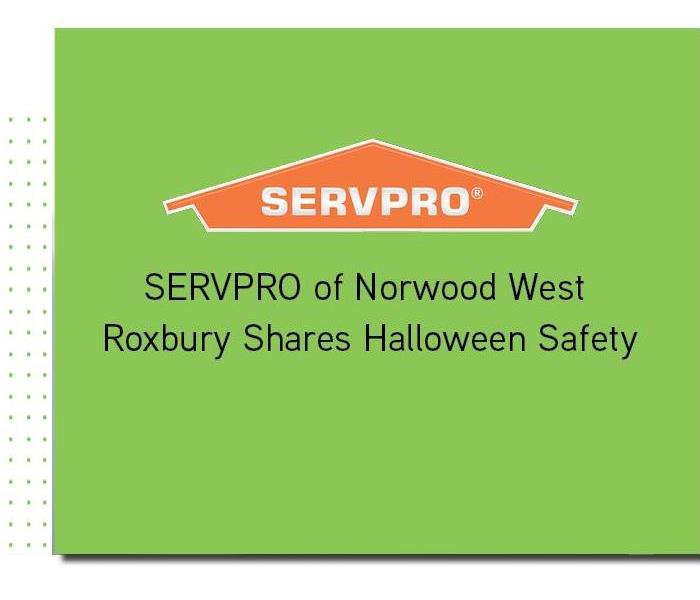 More than twice as many children are killed in pedestrian-car crashes between the hours of 4 and 10 PM on Halloween.
More than twice as many children are killed in pedestrian-car crashes between the hours of 4 and 10 PM on Halloween.
More than twice as many children are killed in pedestrian-car crashes between the hours of 4 and 10 PM on Halloween. This is because drivers not being aware of their surroundings. (National Highway Traffic Safety Administration).
However, safety is important for everyone. Here are a few tips to help be safe this holiday:
- Wear bright clothes. If your costume is dark use reflectors.
- Hold onto your child’s hand.
- Always try to cross crosswalks and be alert.
- Look every which way before you do cross the street.
- Do not jaywalk.
- Wait for the car to the first pass where you want to cross.
- All drivers should stay off their cell phones.
- If you are partying instead of trick or treating, stay sober or find another ride home.
- Wait behind other vehicles that are pulled over, because they may be dropping off children.
- Warn children that they are not to get into the car of anyone they do not know.
- Make sure to have fun!
Above all else, have fun and stay safe. After all, this holiday is met to be fun for free candy.
SERVPRO of Norwood West Roxbury is your premier choice for restoration and rebuilding. Our teams are ready to respond 24 hours a week, any day of the year. When you bring us on the job our team of licensed contractors and certified technicians will work collaboratively with you throughout the duration of the project. They will keep you up to date on the status of the project and make sure that your expectations are met. We will help you to move forward and make it “Like it never even happened” for all of your storm damage.
SERVPRO of Norwood West Roxbury Explains How To Burn Leaves Safely
10/5/2022 (Permalink)
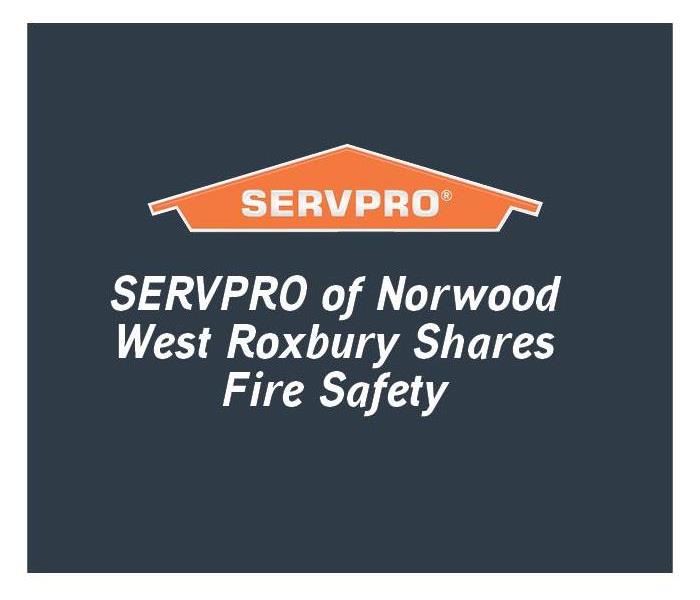 People like to burn leaves or throw trash onto piles, such as household garbage, construction debris, or old papers. This can actually cause damage.
People like to burn leaves or throw trash onto piles, such as household garbage, construction debris, or old papers. This can actually cause damage.
Falling leaves are the first signs of the fall season. Many are faced with how to dispose of them!
People like to burn leaves or throw trash onto piles, such as household garbage, construction debris, or old papers. This can actually cause more damage than good.
Burning materials such as yard waste, grass clippings, and leaves may be permissible depending on your town’s ordinances. If you decide to burn leaves, do not use flammable liquids to ignite the debris. Keep an eye on the fire at all times and be prepared to extinguish it at any moment. Safety should always be the number one concern.
There are plenty of safe alternatives for you to do instead of burning leaves.
- You can recycle tree limbs, grass clippings, and leaves.
- You can also compost items into mulch or chipped them into landscaping material.
- Many cities and towns provide a curbside collection of bagged leaves. Check with your local public works department.
- Call a yard waste or junk removal service, they will take the debris to the dump or recycling center.
There are plenty of ways to get rid of your leaves this fall, it just depends on what works best for you. Remember safety first; prevent a fire if you are able to.
SERVPRO of Norwood West Roxbury is your premier choice for restoration and rebuilding. Our teams are ready to respond 24 hours a week, any day of the year. When you bring us on the job our team of licensed contractors and certified technicians will work collaboratively with you throughout the duration of the project. They will keep you up to date on the status of the project and make sure that your expectations are met. We will help you to move forward and make it “Like it never even happened” for all of your storm damage.
SERVPRO of Norwood West Roxbury Shares Fire Safety
10/5/2022 (Permalink)
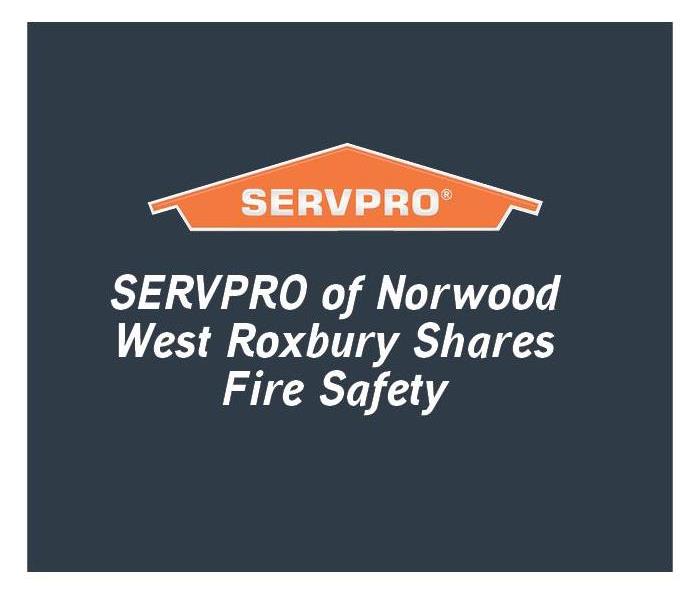 Always put your safety first; if you are not confident in your ability to use a fire extinguisher, get out and call 9-1-1.
Always put your safety first; if you are not confident in your ability to use a fire extinguisher, get out and call 9-1-1.
Cooking and heating are the leading causes of home fires during the winter months. Here are some quick and easy tips to help prevent a fire in and around your building.
- Be alert when cooking; if you are sleepy or have consumed alcohol, don’t use the oven or stovetop
- Stay in the kitchen while you are frying, grilling, boiling, or broiling food
- When simmering, baking, or roasting, check the food regularly, remain in the kitchen while cooking, and use a timer
- Keep anything that can catch fire away from your stovetop
- Keep all flammables, like paper, clothing, bedding, drapes, or rugs, at least 3 feet from a space heater, stove, or fireplace
- Never leave portable heaters and fireplaces unattended; turn off heaters and make sure fireplace embers are extinguished before leaving the room
- If you must use a space heater, place it on a level, nonflammable surface, like ceramic tile, not on a rug or carpet
- Keep children and pets away from space heaters
- Institute a “no smoking” policy in the house
- Check all cords and replace any that are frayed or have bare wires
- Switch to flameless candles
- Smoke alarms are a key part of a home fire escape plan providing early warning to reduce your risk of dying in a fire.
- Use special alarms with strobe lights and bed shakers for people who are hard of hearing or deaf
- Replace smoke alarms that are 10 or more years old
- Make an Escape Plan
Everyone needs to know your family's escape plan. The National Fire Protection Association indicates that 71% of Americans have a home fire escape plan but only 47% have practiced it. Practice getting out with your eyes closed, crawling low to the floor, and keeping your mouth covered.
Always put your safety first; if you are not confident in your ability to use a fire extinguisher, get out and call 9-1-1.
SERVPRO of Norwood West Roxbury is your premier choice for restoration and rebuilding. Our teams are ready to respond 24 hours a week, any day of the year. When you bring us on the job our team of licensed contractors and certified technicians will work collaboratively with you throughout the duration of the project. They will keep you up to date on the status of the project and make sure that your expectations are met. We will help you to move forward and make it “Like it never even happened” for all of your storm damage.
SERVPRO of Norwood West Roxbury Shares What To Do If You Have a Tornado Warning
9/16/2022 (Permalink)
 If you have a tornado warning, shelter is critical for your safety. Have a safe room that is away from any doors or windows.
If you have a tornado warning, shelter is critical for your safety. Have a safe room that is away from any doors or windows.
If you have a tornado warning, shelter is critical for your safety. Have a safe room that is away from any doors or windows.
If you don't have a safe room or basement, you should look around your home to determine the best place.
Here are Some Ideas:
- Bathrooms might be a good shelter, but they should not have outside walls or windows.
- Closets are another option; they should be deep inside with no outside walls, doors, or windows.
- A hallway is another great option. Be sure to shut all doors, and to create as many barriers as possible.
SERVPRO of Norwood West Roxbury is your premier choice for restoration and rebuilding. Our teams are ready to respond 24 hours a week, any day of the year. When you bring us on the job our team of licensed contractors and certified technicians will work collaboratively with you throughout the duration of the project. They will keep you up to date on the status of the project and make sure that your expectations are met. We will help you to move forward and make it “Like it never even happened” for all of your storm damages.
September is National Preparedness Month
9/16/2022 (Permalink)
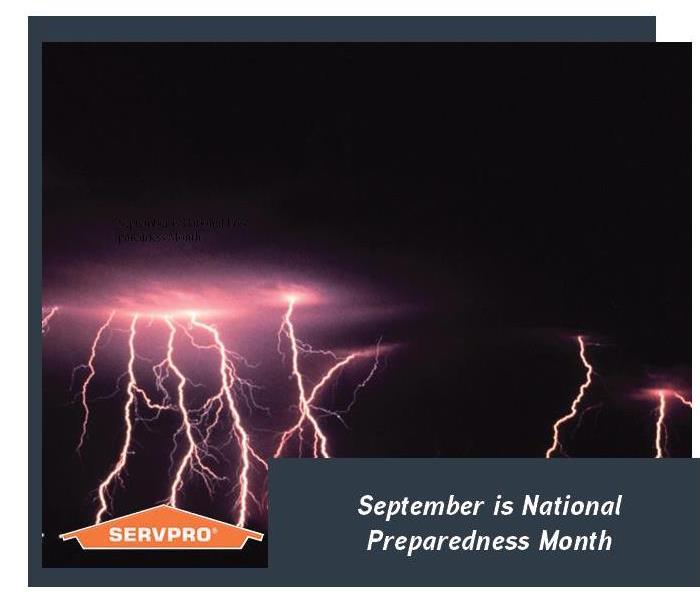 Each September we recognize National Preparedness Month. It was created to promote family and community disaster planning now, but also in the future.
Each September we recognize National Preparedness Month. It was created to promote family and community disaster planning now, but also in the future.
Each September we recognize National Preparedness Month. It was created to promote family and community disaster planning now, but also in the future.
Here are some tips to help plan:
- You need an emergency plan! Planning for emergencies is essential because they can happen to anyone at any time.
- If your emergency supply kit is already stocked, make sure that the items are not expired. For example, are the batteries still working?
- Make sure to cut back trees and shrubs that are too close to your house, so it can prevent damage in storm season.
- Make sure that those around you are prepared. Include your children in your preparedness drills and know your emergency plans of what to do if you need to evacuate or shelter in place.
SERVPRO of Norwood West Roxbury is your premier choice for restoration and rebuilding. Our teams are ready to respond 24 hours a week, any day of the year. When you bring us on the job our team of licensed contractors and certified technicians will work collaboratively with you throughout the duration of the project. They will keep you up to date on the status of the project and make sure that your expectations are met. We will help you to move forward and make it “Like it never even happened” for all of your storm damages.
SERVPRO of Norwood West Roxbury Shares Safety Tips
9/16/2022 (Permalink)
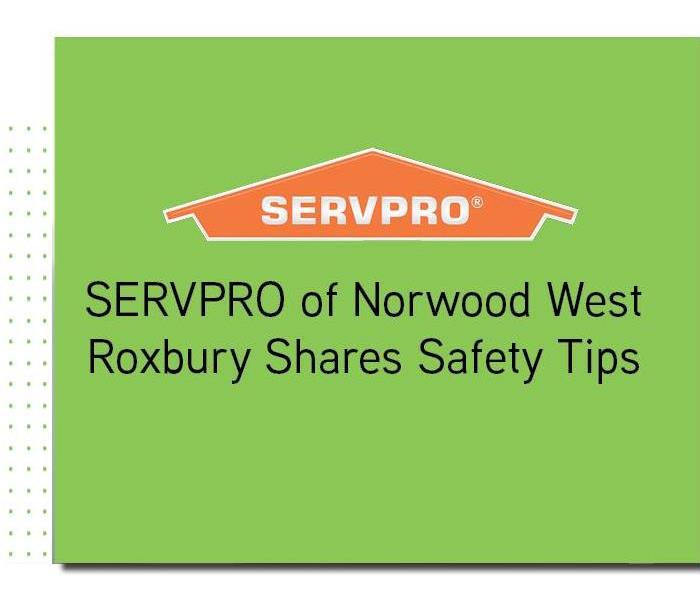 National Preparedness Month, which is September, encourages and reminds people to be prepared for disasters or emergencies in their communities.
National Preparedness Month, which is September, encourages and reminds people to be prepared for disasters or emergencies in their communities.
National Preparedness Month, which is September, encourages and reminds people to be prepared for disasters or emergencies in their communities.
This is the time to find ways to help others understand more about preparing for disasters and reducing risks to health and the environment.
- Generator: Know ahead of time where you would run a generator. The generator exhaust is not good for you to inhale. Make sure to always put generators outside well away from doors, windows, and vents.
- Water: If drinking water is from a private well, know your contacts for inspecting the safety of your drinking water after a flood.
- Septic system: Make sure to know whom to call to have it inspected after a flood.
- Communities: Plan ahead for large amounts of disaster debris from damaged or destroyed buildings, supplies, trees or other green waste, or other materials.
SERVPRO of Norwood West Roxbury is your premier choice for restoration and rebuild. Our teams are ready to respond 24 hours a week, any day of the year. When you bring us on the job our team of licensed contractors and certified technicians will work collaboratively with you throughout the duration of the project. They will keep you up to date on the status of the project and make sure that your expectations are met. We will help you to move forward and make it “Like it never even happened” for all of your storm damages.
Fire Safety Tips for Fall
9/16/2022 (Permalink)
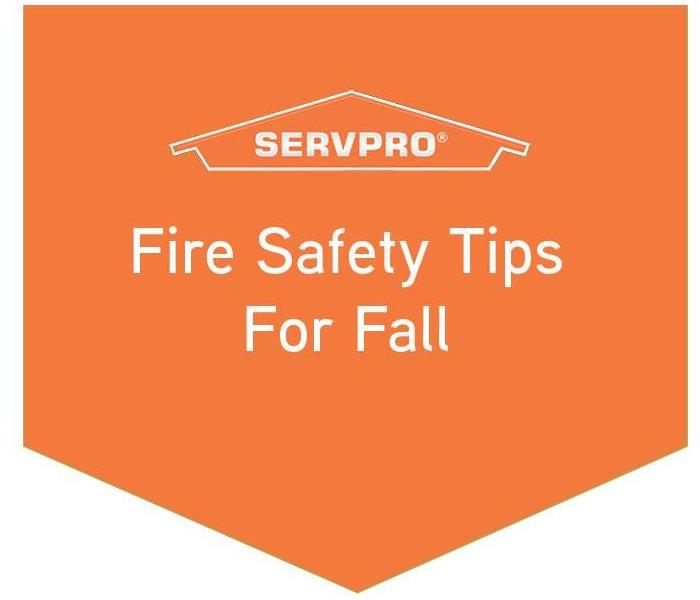 Fall is a great time for many people to enjoy the beautiful crisp weather, but along with that comes several dangers especially fires.
Fall is a great time for many people to enjoy the beautiful crisp weather, but along with that comes several dangers especially fires.
When the weather turns cold most people spend more time inside their homes. This is simply because people are using fireplaces, furnaces, and heaters to keep warm. However, make sure to understand the dangers that can come of it.
Here are some tips to help prevent fires:
- Service Your Furnace: Before the cold winter weather sets in, call your heating and cooling company to service your furnace. It is good to have an inspection to make sure everything is in working order and there are no leaks.
- Use Fireplaces Safely: Keep fire in its proper place by using a fireplace screen. This will keep sparks from flying out of the fireplace.
- Use Caution with Space Heaters: A space heater can be an effective way to warm up a chilly room. Your space heater may require venting, so make sure you have vented it to the outdoors. There should be at least three feet of empty area around space heaters.
- Reconsider Leaf Burning: Burning leaves produces dangerous and cancer-causing chemicals. Homeowners should avoid disposing of leaves this way.
- Exercise Candle Caution: Candles are a great way to give a room some light, and also smell. They can also cause fires. Never leave candles burning unattended.
- Change Smoke Alarm Batteries: It is wise to change the batteries in your smoke alarms and carbon monoxide detectors when you turn back your clocks for Daylight Saving Time.
- Safety Tips for Fall Driving: There's nothing more beautiful than a fall drive, but weather can cause dangerous roads.
Fall is a great time for many people to enjoy the beautiful crisp weather, but along with that comes several dangers especially fires.
SERVPRO of Norwood West Roxbury is your premier choice for restoration and rebuilding. Our teams are ready to respond 24 hours a week, any day of the year. When you bring us on the job our team of licensed contractors and certified technicians will work collaboratively with you throughout the duration of the project. They will keep you up to date on the status of the project and make sure that your expectations are met. We will help you to move forward and make it “Like it never even happened” for all of your fire damages.
Fall Home Maintenance Checklist
9/16/2022 (Permalink)
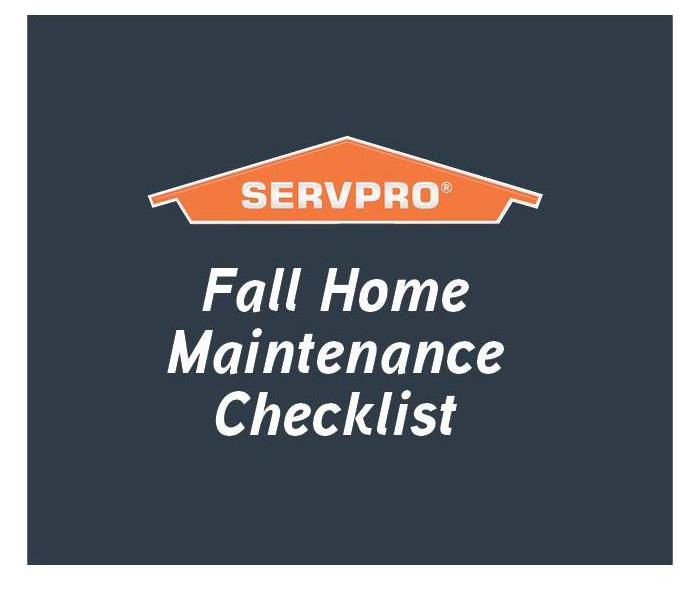 Here are some home maintenance ideas that will keep your home running in peak condition all winter long.
Here are some home maintenance ideas that will keep your home running in peak condition all winter long.
It is time to get your house in shape for the cooler months ahead. Here are some home maintenance ideas that will keep your home running in peak condition all winter long.
Exterior Maintenance
- You will want to check the foundation for cracks and caulk such as where pipes or wires enter the house; this can save you money in the long run.
- Make sure you have storm windows and doors and remove screens.
- Inspect exterior walls to see if any paint is peeling or blistering on the house or outbuildings. Peeling paint is a sign that the existing paint film is failing.
- Make sure the roof is in good shape and make sure there are not any lose shingles. If not taken care of, damage can happen with deterioration to insulation, wood, and drywall.
Interior Maintenance
- Air from windows and doors is easy to find, make sure to apply weather stripping and caulk to areas that have air venting issues.
- Change the direction of your ceiling fan to create an upward draft that redistributes warm air from the ceiling.
- Check basement windows for drafts, loose frames, or cracked panes.
- Vacuum internal parts of air conditioners.
- Clean your humidifiers regularly during the heating season. Bacteria and spores can develop in a dirty water tank resulting in unclean moisture.
SERVPRO of Norwood West Roxbury is your premier choice for restoration and rebuild. Our teams are ready to respond 24 hours a week, any day of the year. When you bring us on the job our team of licensed contractors and certified technicians will work collaboratively with you throughout the duration of the project. They will keep you up to date on the status of the project and make sure that your expectations are met. We will help you to move forward and make it “Like it never even happened” for all of your storm damages.
SERVPRO of Norwood West Roxbury Shares How to Burn a Candle Safely
8/14/2022 (Permalink)
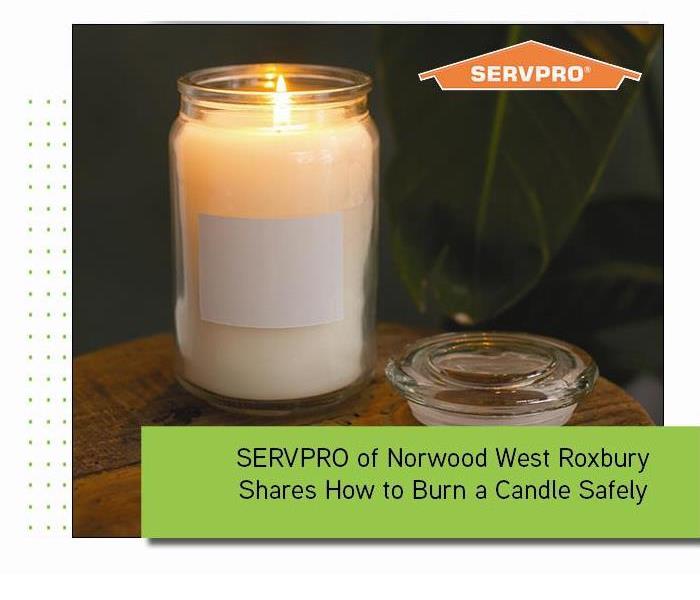 Many people enjoy having candles lit in their homes in the fall months. It is important to know candle safety.
Many people enjoy having candles lit in their homes in the fall months. It is important to know candle safety.
Many people enjoy having candles lit in their homes in the fall months. It is important to know candle safety so that you can enjoy without leading to a fire.
- Before burning, trim the wick to ¼ inch. Long or crooked wicks can cause uneven burning.
- Use a candleholder designed for candle use. It should be heat resistant, sturdy, and large enough to contain drips.
- Burn candles in a well-ventilated room.
- When lighting a candle, use a long-reach lighter.
- Keep your hair and loose clothing out of sight.
- Never leave a candle unattended.
- Never burn a candle near anything that can catch fire.
- Keep burning candles away from furniture, drapes, bedding, carpets, etc.
- Keep candles out of the reach of children and pets.
- Never touch or move a candle while it is burning.
- Place burning candles at least three inches apart from one another.
- Extinguish a candle if the flame becomes too high.
- Never use a candle as a night light or while you are sleeping.
- Use a candle snuffer to extinguish a candle.
- Never use water to extinguish a candle; this can cause wax to splatter.
- Make sure the candle is completely out before leaving the room.
Fire safety is always important. You can prevent a candle fire with these simple tips.
SERVPRO of Norwood West Roxbury is available 24/7 including holidays and weekends to assist you with your disaster needs to get it back to “Like it never even happened.”
SERVPRO of Norwood West Roxbury Shares What You Should Do to Your Home Before Fall Starts
8/14/2022 (Permalink)
 Consider everything you need to know before your house transitions to cool fall nights.
Consider everything you need to know before your house transitions to cool fall nights.
There are important preparations that come with being a homeowner. Consider everything you need to know before your house transitions to cool fall nights.
- Clean your gutters: If they're clogged, you can end up with a flooded interior and damaged exterior.
- Check for drafts: Weatherstripping is simple and probably the most cost-effective way to keep heating costs down.
- Drain your outdoor faucets: Drain and disconnect all garden hoses to prevent any water freezing.
- Bring your outdoor furniture in: If you want to get another summer season out of it you should store it away.
- Change your filters: If your filters are clogged, it's harder to keep your home at the temperature you want it to be.
- Change your batteries: Once a year you should be checking to make sure all smoke detectors and carbon monoxide devices are working.
SERVPRO of Norwood West Roxbury is available 24/7 including holidays and weekends to assist you with your disaster needs to get it back to “Like it never even happened.”
SERVPRO of Norwood West Roxbury Shares Smoke Detector Tips
8/14/2022 (Permalink)
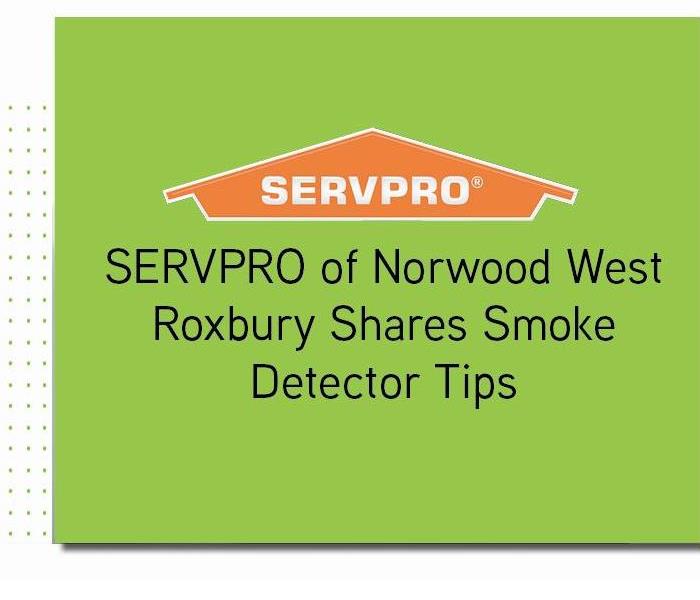 A smoke detector is one of those things we take for granted, unless it’s sounding an alarm or making that annoying chirping noise.
A smoke detector is one of those things we take for granted, unless it’s sounding an alarm or making that annoying chirping noise.
A smoke detector is one of those things we take for granted, unless it’s sounding an alarm or making that annoying chirping noise.
A smoke detector is one of the most important devices in your house. It can save your life in an emergency. Find out what you need to know about smoke detectors.
- You should check your smoke detectors monthly or at least twice a year.
- Most smoke detectors are powered by 9-volt batteries. To check these remove the plastic cap from the detector, replace the battery and press the test button.
- Most smoke detectors last a maximum of 10 years, always check for a date stamped on the back.
Three out of five home fire deaths result from fires in properties without working smoke alarms.
Furthermore, failing to check your smoke alarms regularly increases the likelihood that they’ll fail if a fire erupts.
Maintaining smoke alarms takes minutes, and it’s worth it for the peace of mind it provides.
SERVPRO of Norwood West Roxbury is available 24/7 including holidays and weekends to assist you with your disaster needs to get it back to “Like it never even happened.”
SERVPRO of Norwood West Roxbury Shares Grill Safety
8/14/2022 (Permalink)
 rill fires can start easily and spread quickly. Learn how you can help keep your home safe with these tips.
rill fires can start easily and spread quickly. Learn how you can help keep your home safe with these tips.
Grilling is a popular way to enjoy the nice summer weather. Grill fires can start easily and spread quickly. Learn how you can help keep your home safe with these tips.
- Only use grills outside: It may be tempting to set up your grill inside of your open garage, but they are strictly designed for outdoor use.
- Place your grill away from your home: You should avoid placing your grill outside the back door, or back deck because it can pose a potential fire hazard.
- Make sure your grill is located on a flat surface: Grills that are placed on uneven surfaces can tip over easily and cause a fire.
- Check your grill for leaks: A leak in the gas lines can cause propane to build up inside when the lid is closed.
- Always clean your grill after use: Using your grill often causes grease to build up. The build-up can then act as fuel and catch fire.
- Never leave your barbecue grill unattended while in use: When a grill is left unattended it can become a safety and fire hazard.
- Keep a spray bottle on hand: It’s common for grills to flare up as fat drips, and this can cause a section of the grill to remain on fire.
- Always have a fire extinguisher close by It is simple to use, just point and spray to extinguish the fire.
SERVPRO of Norwood West Roxbury is available 24/7 including holidays and weekends to assist you with your disaster needs to get it back to “Like it never even happened.”
SERVPRO of Norwood/West Roxbury is Hiring A Production Technician
8/8/2022 (Permalink)
 SERVPRO of Norwood/West Roxbury is Hiring A Production Technician
SERVPRO of Norwood/West Roxbury is Hiring A Production Technician
SERVPRO of Norwood/West Roxbury is Hiring A Production Technician
Conveniently located right off Rt 495 in Hopkinton, SERVPRO of Norwood/West Roxbury offers exciting employment opportunities. When you arrive at our office, you will feel the positive energy as you are enthusiastically greeted by our office dog, Maggie. She will put a smile on your face as soon as you enter!
SERVPRO of Norwood/West Roxbury is committed to employee development, providing multiple opportunities for resource training. You will be encouraged to stay current and to expand your knowledge and skills in your particular area of employment. We have very clear and stated goals and they don’t just sit in a word document, they are prominent for all to see and remember, painted in bright gold on our conference walls! Our traineeship office, located in Lawrence, frequently holds seminars and presentations on the latest communications from SERVPRO corporate.
In addition, our employees enjoy the convenient amenities just steps from our office. Within a block, you have Starbucks, "Dunkins", local delis, convenience stores and gas stations as well as very popular restaurants great for meeting up with friends after work. Inquire today and we will look forward to talking to you about potential employment
SERVPRO of Norwood/West Roxbury is the place for you! Contact us at (508) 370-4400
SERVPRO of Norwood West Roxbury Talks About Heat Waves
8/8/2022 (Permalink)
 It is important to stay hydrated during the month of August: it is known as the extreme heat month.
It is important to stay hydrated during the month of August: it is known as the extreme heat month.
It is important to stay hydrated during the month of August: it is known as the extreme heat month. Make sure to drink plenty of water to stay hydrated. Hot weather causes sweat, so you will need to replenish the lost fluids.
Here are some tips for you to stay cool during the summer months:
- Never leave children or pets in hot vehicles.
- Stay inside during the hottest part of the day (10 A.M to 4 P.M.)
- When you’re in the outdoors, make sure to stay out of direct sunlight.
- Set your air conditioners to a lower temperature.
- Use curtains or blinds to keep direct sunlight out.
- Eat small meals and eat more often.
- Wear light, loose-fitting, light-colored clothing.
- Check on family and friends who are elder.
- If you feel overheated, cool off with wet washcloths on your wrists and neck. Carry a cooling facial mist with you.
Stay hydrated, and cool, during the month of August, while you make sure you enjoy summer as best as you can.
SERVPRO of Norwood West Roxbury is available 24/7 including holidays and weekends to assist you with your disaster needs to get it back to “Like it never even happened.”
SERVPRO of Norwood West Roxbury Shares Back To School Tips
8/4/2022 (Permalink)
 The school season will be starting back up soon and it is important to remember some key tips that will help keep them safe and healthy.
The school season will be starting back up soon and it is important to remember some key tips that will help keep them safe and healthy.
The school season will be starting back up soon and it is important to remember some key tips that will help keep them safe and healthy throughout the school year.
Here are some tips to make sure your child safely travels to school:
- Review your family's walking safety rules. Make sure to practice walking to school with your child.
- Walk on the sidewalk. If there is no sidewalk, walk facing the traffic.
- Before crossing the street, stop and look left, right, and left again.
- Make eye contact with drivers before crossing.
- Always cross streets at crosswalks or intersections
- Stay alert and avoid distractions.
- Teach your children school bus safety rules.
- Teach your children to stand 6 feet away from the curb
- Make eye contact with children who are crossing the street
- Never pass a bus loading or unloading children
SERVPRO of Norwood West Roxbury is available 24/7 including holidays and weekends to assist you with your disaster needs to get it back to “Like it never even happened.”
SERVPRO of Norwood West Roxbury Shares Tax-Free Information
8/4/2022 (Permalink)
 The tax-free weekend comes once a year. This allows people to get school items tax-free, which could be a great deal of savings!
The tax-free weekend comes once a year. This allows people to get school items tax-free, which could be a great deal of savings!
The tax-free weekend comes once a year. This allows people to get school items tax-free, which could be a great deal of savings!
The sales tax holiday for 2022 will be held on Saturday, August 13, and Sunday, August 14. Retail items of up to $2,500, purchased in Massachusetts for personal use on these two days, will be exempt from sales tax.
If you spend more than $2,500 on an item, the entire amount paid for the item is subject to sales tax, not just the amount that exceeds that threshold. There is, however, an exemption with respect to clothing. An item of clothing is generally exempt from the sales tax unless the item costs more than $175. If it does, only the amount over $175 is subject to tax. If on the sales tax holiday, the price of an item of clothing exceeds $2,500, the first $175 is not subject to tax.
You can learn more here:
https://www.mass.gov/info-details/sales-tax-holiday-frequently-asked-questions
SERVPRO of Norwood West Roxbury is available 24/7 including holidays and weekends to assist you with your disaster needs to get it back to “Like it never even happened.”
SERVPRO of Norwood West Roxbury Shares The Top 5 Summer Safety Tips
7/3/2022 (Permalink)
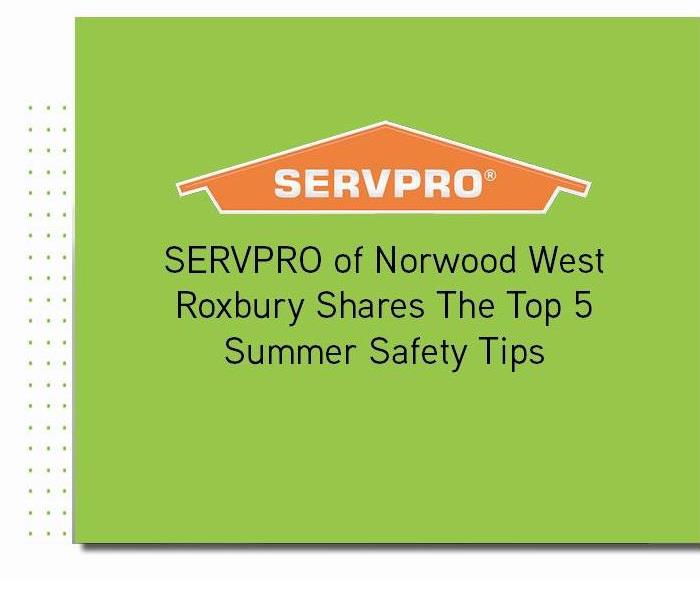 Summer is a time for adventure! Before you start with the fun and games, keep in mind these important summer safety tips.
Summer is a time for adventure! Before you start with the fun and games, keep in mind these important summer safety tips.
Summer is a time for adventure! Before you start with the fun and games, keep in mind these important summer safety tips.
- Water Safety: Drownings are number one of the leading causes of accidental deaths for children under five. To prevent this, parents are encouraged to keep a closer eye on their children, especially around water. Areas that are both in and out of the house should be kept closed off without supervision. Children participating in boating should always wear a life jacket.
- Playgrounds: Spending time outdoors with your kids is a great way to enjoy the time. Certain activities on the playground are more dangerous than others. Parent supervision is important, to keep children from falling in playground areas. Almost half of all falls occur due to a lack of supervision.
- Heat Exposure: Summer heat can be dangerous. On a hot day leaving kids dehydrated can cause exhaustion, dizziness, and even vomiting. Extreme temperatures can induce heat stroke. Parents should be extremely cautious about keeping kids hydrated with water.
- Bicycles and Outdoors Sports: Bicycle injuries among kids 5-14 are more prevalent than any other sport. Children should always wear a helmet. Outdoor games such as skateboarding, rollerblading, etc should always stay on the right side of the road and go with the flow of traffic. Make sure to make eye contact with drivers before crossing.
- Fireworks: Fireworks are dangerous and never advised around kids. Children should also never be allowed to handle sparklers. Picking a unique spot to watch fireworks can be equally as enjoyable.
SERVPRO of Norwood West Roxbury is available 24/7 including holidays and weekends to assist you with your disaster needs to get it back to “Like it never even happened.”
SERVPRO of Norwood West Roxbury Shares Things To Do Before Going On Vacation
7/3/2022 (Permalink)
 After you are all packed for vacation and feel at ease, take the time to protect your home while you're on vacation.
After you are all packed for vacation and feel at ease, take the time to protect your home while you're on vacation.
You are getting ready to go on vacation for a week, and are all ready to go. After you are all packed and feel at ease, take the time to protect your home while you're on vacation. July and August are popular months when home burglaries peak.
Here is a checklist to help keep your house safe while you are away:
- Set timers on interior lights: Don't allow your house to appear as if no one is home.
- Power surges: Disconnect the computer, TV, stereo, and other electronics. You can also make sure they are plugged safely into a surge protector.
- Don't make or socialize status updates: Never broadcast your location on social media.
- Alert your alarm company: If you have an automatic security system in place, let them know you will be away for an extended period of time. Make sure the alarm is set properly when you leave.
- Secure valuables: Put your jewelry or other valuables in a safe deposit box.
- Set the HVAC: Set your thermostat to lower your heat or air conditioning usage.
- Protect your pipes: Make sure pipes in vulnerable areas such as attics, basements, and crawlspaces are insulated.
- Arrange for lawn care: Before you leave, trim tree branches that might allow access to a climbing burglar.
- Stop newspapers and mail: Have them regularly picked up by a neighbor.
- Plan exterior lighting: Set these lights on timers to deter burglars.
- Don't leave spare keys outdoors: Get rid of spare keys that are around the exterior of your home.
- Lock the garage: Secure the door and any entrances to the garage so they can’t enter your home from that access point.
SERVPRO of Norwood West Roxbury is available 24/7 including holidays and weekends to assist you and help you with commercial damage. “Like it never even happened.”
SERVPRO of Norwood West Roxbury Shares What To Do If Your House Is On Fire
7/3/2022 (Permalink)
 It is never a fun experience when a house sets on fire. However, it is important to know what to do in case it ever happens.
It is never a fun experience when a house sets on fire. However, it is important to know what to do in case it ever happens.
It is never a fun experience when a house sets on fire. However, it is important to know what to do in case it ever happens.
These steps can help you, and your loved ones, recover after a house fire:
- Find a safe place to stay: No matter the amount of damage, you likely can't stay in your own home for a little while until damages are completed.
- Contact your insurance agent: You'll need to start a claim immediately. Make sure to save all receipts and keep a detailed record of all purchases. Your insurance agent should also be able to help you secure your property and offer restoration companies like SERVPRO of Framingham.
- Take care of your pets: You should have your pets checked by a veterinarian after a fire. It can affect some of their health.
- Get a copy of the fire report: You can usually get fire reports from your local fire department. This will be handy for yourself and your insurance claim.
- Address your finances: You'll still need to make mortgage payments, even if your home is destroyed. Keep in mind that you need to continue any car payments and replace any credit or debit cards that may have been destroyed.
- Recover your possessions: Items destroyed in a house fire are usually covered by insurance. To help make sure everything is accounted for, keep a home inventory of possessions. It is also a good idea to add photos of before and after items.
- Take care of your family's mental health: Disasters can affect people's mental health. It is devastating and traumatic.
SERVPRO of Norwood West Roxbury is available 24/7 including holidays and weekends to assist you with your disaster needs to get it back to “Like it never even happened.”
SERVPRO of Norwood Shares Firework Safety
6/6/2022 (Permalink)
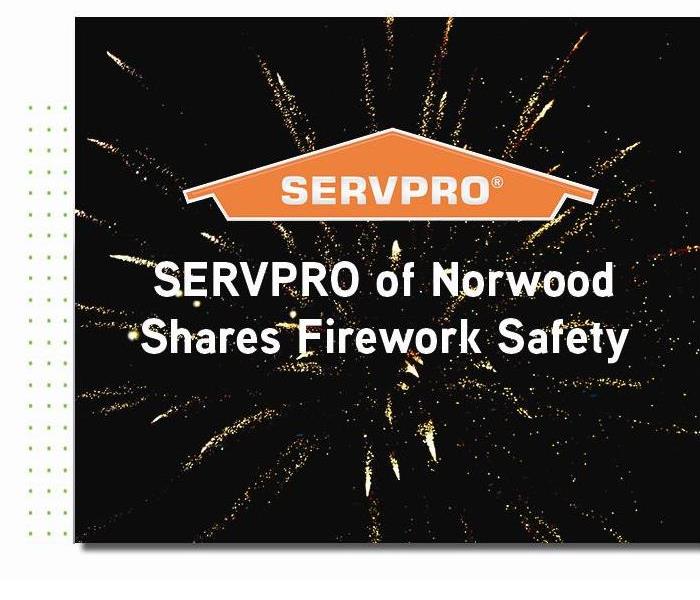 Fireworks can be very dangerous if they are not used properly, they can even cause a fire to your home.
Fireworks can be very dangerous if they are not used properly, they can even cause a fire to your home.
The summer months call for fireworks. Fireworks are designed to burn and produce motion or audible effects. Here are some firework safety tips that you should consider:
- NEVER give fireworks to young children. Make sure there is adult supervision of all fireworks at all times
- Always read and follow the manufacturer's directions
- Buy from reliable sellers
- Use outdoors only
- Always have water handy
- Never experiment or make your own fireworks
- Light only one firework at a time
- Never give fireworks to small children
- Dispose of fireworks properly by soaking them in water and then disposing of them in your trash can
- Never throw or point fireworks at other people
- Never carry fireworks in your pocket
- Never shoot fireworks in metal or glass containers.
Fireworks can be very dangerous if they are not used properly, they can even cause a fire to your home. If your house gets hit by a fire, call for restoration needs.
SERVPRO of Norwood West Roxbury is available 24/7 including holidays and weekends to assist you with your disaster needs to get it back to “Like it never even happened.”
SERVPRO of Norwood West Roxbury Shares How To Observe Lightning Safety Awareness Week
6/6/2022 (Permalink)
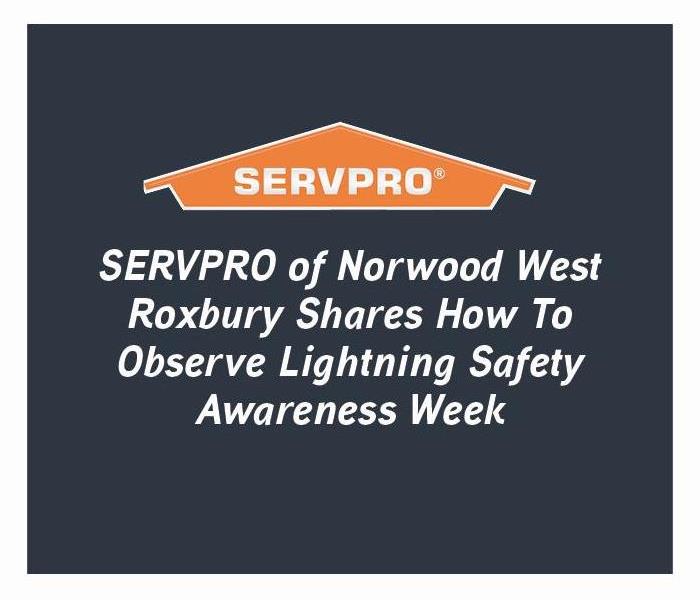 Lightning is popular in the summer months and it can cause much damage to a building. It is important to take precautions to help prevent damage.
Lightning is popular in the summer months and it can cause much damage to a building. It is important to take precautions to help prevent damage.
Lightning is popular in the summer months and it can cause much damage to a building. It is important to take precautions to help prevent damage.
It is advised to stay indoors during a thunderstorm, there are occasions when we might not be able to. It is important to have a safety plan in place should a thunderstorm arrive.
It is important to be thoroughly aware of its dangers so that we can take the necessary precautions if we are ever caught in a storm.??
Lightning Safety Awareness Week helps to alert people that the outdoors are not safe during a thunderstorm. Lightning can strike from over 15 miles away and any delays in taking precautions can cause serious injury or fatality. Lightning Safety Awareness Week is important to spread awareness of lightning and lightning safety.
Here are some topics and links to help you become more informed during the week.
SERVPRO of Norwood West Roxbury is available 24/7 including holidays and weekends to assist you with your disaster needs to get it back to “Like it never even happened.”
SERVPRO of Norwood West Roxbury Shares 5 Tips for National Pet Preparedness Month
6/6/2022 (Permalink)
 June is National Pet Preparedness Month. Pets are important in our lives so, we need to stay educated and share with others how to care for our pets.
June is National Pet Preparedness Month. Pets are important in our lives so, we need to stay educated and share with others how to care for our pets.
June is National Pet Preparedness Month. Pets are important in our lives so, we need to stay educated and share with others how to care for our pets.
Here are some tips to help our pets:
- Identification: Make sure your pet is microchipped and, if they do not have one yet, schedule an appointment with your veterinarian.
- The device can be scanned at a veterinary office or animal shelter.
- It will display life-saving information like your address and phone number.
- If you move or change numbers let your microchip company know so that they can update their records!
- Make sure identification tags are current.
- Make sure to include if they need medication, or if they do not like other animals, on their tag to help emergency personnel know what type of care they need while they work on reconnecting you.
- Know where to go!
If you area is prone to flooding or any other type of natural disaster, it is important to find a place outside of the area where you can take your pets with you.
- It is a good idea to have a list of options and contact numbers for where you might go.
- If you leave your home because the electricity is out and it is too hot or too cold, it is the same for your pets, don’t leave them behind!
- Stay together!
Natural disasters can be frightening for us and even more for our pets.
- It is important to have them on a leash at all times while you are outside.
- Your area may have dangerous debris that they can get into.
- If your home has been damaged, remember to keep cats in a carrier or confined.
- Make a kit!
?A premade kit can be vital if you have to evacuate your home.
- Good items to keep in your pet’s kit include a few days' worths of food, bottles of water, extra medication, copies of veterinary records, poop bags, cat litter and pan, sturdy leashes, and collars, and a first aid kit.
- You will also want to have a list of pet-friendly hotels, dishes, and if they have a favorite type of treat or toy!
- Know who to contact!
If a disaster hits while you are at work or away from your home, make sure to discuss a plan of action in advance with a neighbor or family member.
- Agree that if one of you cannot make it back home that the other will bring your pets and their emergency kit will make the situation much less hectic.
- Have updated stickers on your front door letting emergency personnel know how many pets are in the home.
- Keep your veterinary clinic, pet-friendly hotels, and the Pet Poison Helpline numbers handy so you are prepared for any situation you may encounter.
No one likes to think a natural disaster will happen in their area but having these strategies in place will help ensure that you and your pets are prepared. If a disaster hits your home, we are here to help restore your fire, storm, and water damage.
SERVPRO of Norwood West Roxbury is available 24/7 including holidays and weekends to assist you with your disaster needs to get it back to “Like it never even happened.”
New England SERVPRO® Owners Team Up with Red Sox
6/3/2022 (Permalink)
 "Our SERVPRO New England team is excited to cheer the Boston Red Sox to victory alongside our community! Let's go, Red Sox!"
"Our SERVPRO New England team is excited to cheer the Boston Red Sox to victory alongside our community! Let's go, Red Sox!"
A group of SERVPRO franchise owners in northern New England is proud to announce their collective sponsorship of the Boston Red Sox for the 2022 season. The SERVPRO owner group, which is made up of more than 30 SERVPRO franchise owners, is excited to come together and partner with their beloved Red Sox, making this sponsorship one of the first of its kind for SERVPRO.
"This new deal illustrates the SERVPRO family's love for their local communities, fellow New Englanders, and America's favorite pastime," said Jesse Mathewson, SERVPRO Marketing Team Member.
The sponsorship is marked by two LED signs that will illuminate SERVPRO's distinctive green and orange on the first and third baselines at every home game in historic Fenway Park, home of the Red Sox. The group will also sponsor National Clean-Up Day on September 17, including the pregame ceremony and in-park promotions when the Red Sox host the Kansas City Royals.
This isn't the first interaction between the Red Sox and the brand, as SERVPRO's certified restoration specialists had the honor of cleaning and sanitizing Fenway Park at the onset of the COVID-19 pandemic in 2020.
"Being selected to assist an institution like Fenway Park, prioritizing safety above all else, following all IICRC guidelines and CDC protocols, was a privilege," Mathewson said. "Ever since that initial interaction with such a first-class organization, we knew we wanted to take the next step to make the partnership bigger."
SERVPRO's full spectrum of restoration, mitigation, construction, cleaning, and decontamination services are offered year-round, but one thing SERVPRO and the Boston Red Sox have in common is how each gears up during the Spring season.
"Spring is the perfect time to have your residential or commercial property cleaned and sanitized by our team of certified technicians from our New England SERVPRO locations," Mathewson said. "We are proud to support the Red Sox and our local communities, not only with this sponsorship but with any emergency or upcoming services and projects this year."
"Our SERVPRO New England team is excited to cheer the Boston Red Sox to victory alongside our community! Let's go, Red Sox!"
SERVPRO of Norwood West Roxbury Shares Positive Reviews
5/8/2022 (Permalink)
 We take great pride in our services, customers, and team. We are highly trained in the restoration field.
We take great pride in our services, customers, and team. We are highly trained in the restoration field.
SERVPRO of Norwood West Roxbury is a restoration company and we hope you never have to call us. Sometimes we know that disasters can happen.
We take great pride in our services, customers, and team. We are highly trained in the restoration field. Our customer's testimonials speak for themself.
“I can't say enough good things about Kevin and Rodney. I was so impressed by how hard they worked to get my home back together. thank you so much.” --Julia
“Great company to work with after I experienced a home fire. Rodney and Amy were great in cleaning up the damage. mauritizo was great to work within the rebuild. thank you servrpo” -- Issy
SERVPRO of Norwood West Roxbury is available 24/7 including holidays and weekends to assist you with your disaster needs to get it back to “Like it never even happened.”
SERVPRO of Norwood West Roxbury Helps The Local Community
5/8/2022 (Permalink)
 Both the Disaster Remediation and Rebuild Teams of SERVPRO of Norwood West Roxbury are highly skilled and professional.
Both the Disaster Remediation and Rebuild Teams of SERVPRO of Norwood West Roxbury are highly skilled and professional.
Both the Disaster Remediation and Rebuild Teams of SERVPRO of Norwood West Roxbury are highly skilled and professional. Our certified technicians and licensed contractors will be there for you throughout the entire project life cycle. They will collaborate with you, keep you informed and make sure that your expectations are met. There is no need to manage multiple contractors, timelines, or invoices. SERVPRO of Norwood West Roxbury is your one-stop remediation to rebuild the shop. We will make it "Like it never even happened."
We are close by and ready to respond immediately when you need cleaning or restoration services. For major storms and disasters, we can even call upon special Disaster Recovery Teams for additional resources.
We are proud to serve our local communities:
- Westwood, MA
- Dedham, MA
- West Roxbury, MA
- Norwood, MA
- East Dedham, MA
- South Norwood, MA
- Norwood Centre, MA
- Endicott, MA
- Riverdale, MA
- Midtown Bus District, MA
- Walpole, MA
- Medfield, MA
SERVPRO of Norwood West Roxbury is available 24/7 including holidays and weekends to assist you with your disaster needs to get it back to “Like it never even happened.”
SERVPRO of Norwood West Roxbury Shares Professional Help for Water Damage
4/9/2022 (Permalink)
 SERVPRO of Norwood West Roxbury is available 24/7 including holidays and weekends to assist you with your disaster needs to get it back to “Like it ne
SERVPRO of Norwood West Roxbury is available 24/7 including holidays and weekends to assist you with your disaster needs to get it back to “Like it ne
When water damage happens, you might want to clean it up yourself. However, the downside is that water migrates quickly and can wind up far away from the origination point. This can cause damage to your house.
If a pipe breaks in a bathroom and gravity pulls the water downward. Then it runs under the tile floor. It will go between the floor and exist into the living room all over a carpeted floor. If any moisture gets left in these areas, it can trigger issues such as mold. It is important to make sure you address these problems and hire a professional.
SERVPRO of Norwood West Roxbury is available 24/7 including holidays and weekends to assist you with your disaster needs to get it back to “Like it never even happened.”
SERVPRO of Norwood West Roxbury is the Restoration Company To Call
4/9/2022 (Permalink)
 SERVPRO of Norwood West Roxbury understands that having your building damaged from mold, fire, water, or storms can leave a lasting impression.
SERVPRO of Norwood West Roxbury understands that having your building damaged from mold, fire, water, or storms can leave a lasting impression.
SERVPRO of Norwood West Roxbury understands that having your building damaged from mold, fire, water, or storms can leave a lasting impression.
You have a responsibility to keep claims costs down while still providing the best services possible for your customers.
We are uniquely qualified to help you get your property restored efficiently. Our results create a measurable difference, giving you many competitive advantages.
SERVPRO of Norwood West Roxbury is available 24/7 including holidays and weekends to assist you with your commercial disaster needs to get it back to “Like it never even happened.”
SERVPRO of Norwood West Roxbury Talks How To Limit Mold Growth
1/19/2022 (Permalink)
 Certain types of mold can happen in cold weather. Here are steps you can take to prevent mold from happening in your home.
Certain types of mold can happen in cold weather. Here are steps you can take to prevent mold from happening in your home.
Most molds thrive in environments more than 70 degrees. However, other types of mold can happen in cold weather. Here are steps you can take to prevent mold from happening in your home.
Mold during the winter can be in uninsulated closets, crawlspaces, attics, and windows. Make sure to ensure these spots are kept free from moisture. Mold loves moisture, so keep the humidity level below 40%.
If you have spaces in your home that tend to be more humid, swap out wall-to-wall carpets for hard-surface floors or area rugs.
Make sure to fix any leaks in your roof and around doors and windows. Any spot that retains moisture can lead to mold.
When you take a shower or cook, always use fans to vent that moisture out of the house. Check all vents in the kitchen, bathroom, and laundry to the outside rather than to the crawlspace.
Many of the items on this list are regular maintenance items, but it’s always a good idea to have a winter checklist to prevent any disaster whenever possible. Prevention can go a long way to preventing mold infestation.
SERVPRO of Norwood West Roxbury is available 24/7 including holidays and weekends to assist you with your mold disaster needs to get it back to “Like it never even happened.”
SERVPRO of Norwood West Roxbury is Faster To Any Size Disaster
1/13/2022 (Permalink)
 We respond quicker with more resources and tools for all of your restoration needs.
We respond quicker with more resources and tools for all of your restoration needs.
We respond quicker with more resources and tools for all of your restoration needs. For major storms and disasters, we call upon special Disaster Recovery Teams for additional resources.
There are many benefits when working with SERVPRO of Norwood West Roxbury:
- 24 Hour Emergency Service
- We have technicians that are on call with specialized equipment
- We have advanced training to quickly restore your property
- We’re dedicated to responding immediately
In many cleaning and restoration situations, immediate action is needed. An immediate response helps to minimize the damage and the cleaning and restoration costs.
SERVPRO of Norwood West Roxbury is available 24/7 including holidays and weekends to assist you with your home restoration needs to get it back to “Like it never even happened.”
SERVPRO of Norwood West Roxbury has Advanced Technology and Techniques
1/4/2022 (Permalink)
 SERVPRO is ready to respond immediately when you need restoration services for your home or business.
SERVPRO is ready to respond immediately when you need restoration services for your home or business.
SERVPRO is ready to respond immediately when you need restoration services for your home or business. We have the training, equipment, and resources for any size disaster.
Moisture Detection and Measurement Equipment: Scientific drying principles rely upon specialized equipment to detect, measure, and monitor a property’s moisture levels. Infrared cameras can help detect water through a wall, ceiling, or floor.
Water Extraction Equipment: Powerful extraction equipment speeds the drying process by removing the bulk of the water.
Drying Equipment: Industrial strength air movers and dehumidifiers are needed to remove the remaining moisture from the ceiling, walls, and floors. Proper drying helps to prevent swelling and warping of floors.
Odor Removal and Deodorization: Water and fire damage often causes powerful odors. Our machines remove airborne contaminants and control the air quality during the restoration and cleanup process.
SERVPRO of Norwood West Roxbury is available 24/7 including holidays and weekends to assist you with your home restoration needs to get it back to “Like it never even happened.”
SERVPRO of Norwood West Roxbury Helps Restoration For Residential And Commercials
1/4/2022 (Permalink)
 We will be there for you on a continual basis, from the time you request services until the job has been completed to your satisfaction.
We will be there for you on a continual basis, from the time you request services until the job has been completed to your satisfaction.
We will be there for you on a continual basis, from the time you request services until the job has been completed to your satisfaction. You can count on your project manager from your first point of contact and throughout the entire remediation process. We collaborate with you while working with our great team of technicians, carefully and expeditiously restoring your home or business to a like-new state.
We take pride in our major advantages such as
- 24-Hour Emergency Service
- Faster to Any Size Disaster
- Highly Trained Restoration Technicians
- A Trusted Leader in the Restoration Industry
- Locally Owned and Operated
- Advanced Restoration and Cleaning Equipment
SERVPRO of Norwood West Roxbury is available 24/7 including holidays and weekends to assist you with your home restoration needs to get it back to “Like it never even happened.”
SERVPRO of Newton Wellesley Community Shares Christmas Safety
12/23/2021 (Permalink)
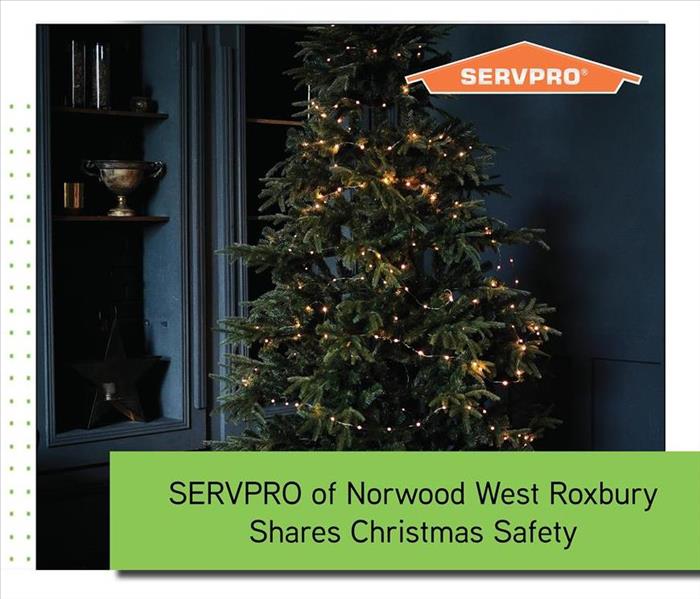 Christmas is a wonderful time of year. It is important to know some safety tips during the year, so you can protect yourself and your family.
Christmas is a wonderful time of year. It is important to know some safety tips during the year, so you can protect yourself and your family.
Christmas is a wonderful time of year. It is important to know some safety tips during the year, so you can protect yourself and your family. It’s fun to decorate, but holiday decorations may increase your risk for a home fire, if not careful. Nearly half of holiday decoration fires happen because decorations are placed too close to a heat source. Here are some safety tips:
- Inspect holiday lights before putting them up. Throw away light strands that are frayed or have pinched wires.
- Water your Christmas tree every day because a dry tree can catch on fire easily.
- Consider using battery-operated flameless candles. These can look and feel like real candles. Make sure they are in stable holders and place them where they cannot be knocked down easily.
- Half of the home decoration fires in December are started by candles. If you are not near the candle, blow it out so you prevent a fire. Make sure to keep candles at least 12 inches away from anything that burns.
- More than 1 in every 5 Christmas tree fires were caused by a heat source too close to the tree. Make sure your tree is at least 3 feet away from heat sources like fireplaces, radiators, space heaters, candles, or heat vents.
- Get rid of your tree after Christmas or when it is dry.
Happy Holidays from all of us at SERVPRO of Newton Wellesley. We hope you have a wonderful and safe holiday season!
SERVPRO of Newton Wellesley is available 24/7 including holidays and weekends to assist you and get your home back to “Like it never even happened.”
SERVPRO of Newton Wellesley Community Shares Winter Storm Safety
12/20/2021 (Permalink)
 The winter months have arrived Newton Wellesley and it is important to prepare ahead. Here are some great winter storm safety tips for you
The winter months have arrived Newton Wellesley and it is important to prepare ahead. Here are some great winter storm safety tips for you
The winter months have arrived Newton Wellesley and it is important to prepare ahead. Here are some great winter storm safety tips for you:
- Learn how to protect pipes from freezing: Check your home heating sources are correct with local codes and permit requirements.
- Make sure your home is properly insulated: Check Caulk and weather-strip doors, and windows, to keep cold air out.
- Heating options: Consider buying emergency heating equipment, such as a wood-burning stove or kerosene heater.
- Fireplace: Keep a supply of firewood handy. Be sure the fireplace is properly vented and in good working order before using it.
- Flooding: Consider purchasing flood insurance, if you live in a flood-prone area.
- Emergency Kit: Check your emergency kit and replenish any items that may have been expired or are missing.
A winter storm can hit at any time, and sometimes a business might not even be prepared for it. These are some tips to keep handy should the need arise.
SERVPRO of Newton Wellesley is available 24/7 including holidays and weekends to assist you and get your home back to “Like it never even happened.”
SERVPRO of Newton Wellesley Community Gives Back To The Community
12/14/2021 (Permalink)
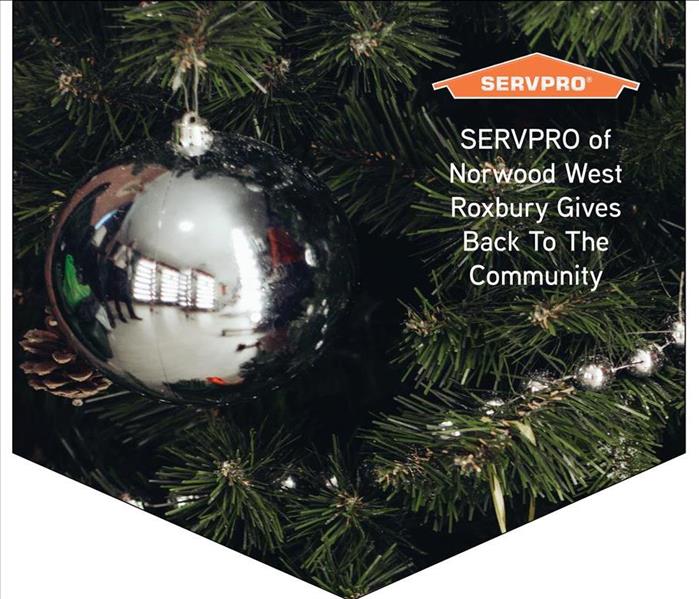 Our local SERVPRO Team is working to assist the Framingham Food Pantry here in Massachusetts this holiday season.
Our local SERVPRO Team is working to assist the Framingham Food Pantry here in Massachusetts this holiday season.
Our local SERVPRO Team is working to assist the Framingham Food Pantry here in Massachusetts this holiday season.
You can stop into our location (90 Elm Street Hopkinton, MA 01748) and donate the following items: flour (2,4 or 5 lbs) canola oil, vegetable oil, and olive oil of any size. They are also in need of personal hygiene items toothpaste, shampoo, and bars of soap.
If you are not able to make it out to our location, you can make a donation right online: https://www.hopeworldwidema.org/framingham-food-pantry
We appreciate your help this holiday season! Happy Holidays!
SERVPRO of Newton Wellesley is available 24/7 including holidays and weekends to assist you and get your home back to “Like it never even happened.”
SERVPRO of Newton Wellesley Community Prepares Businesses With Emergency Readiness Plan
12/11/2021 (Permalink)
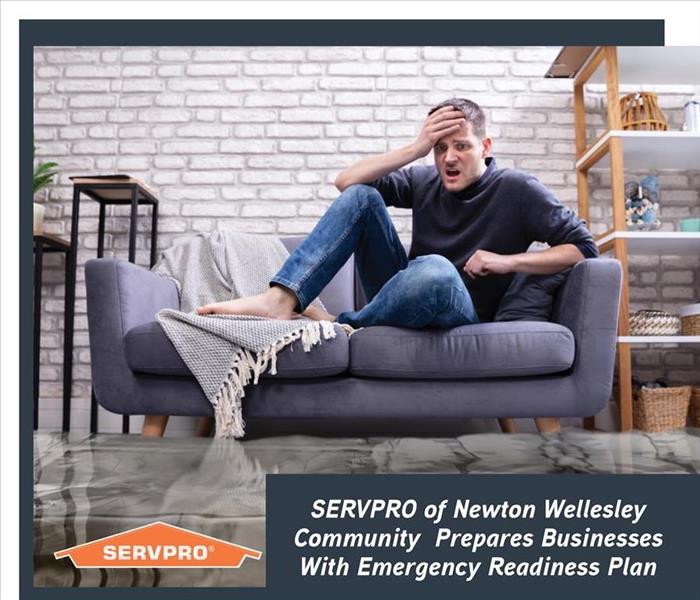 It is important to have a plan in place ahead of time in case a disaster strikes in your business.
It is important to have a plan in place ahead of time in case a disaster strikes in your business.
It is important to have a plan in place ahead of time in case a disaster strikes in your business. Businesses that come out stronger on the other side of an emergency are the ones that pre-planned using SERVPRO’s Emergency Ready Plan (ERP).
This will help your business be able to minimize interruption because you’ll know what to do.
Here are some benefits for choosing SERVPRO when you have commercial damage:
- Available 24/7, including all major holidays: Storms and disasters can strike at any time.
- Commercial Large Loss Division: Our Disaster Recovery Teams are composed of elite technicians who have the training and resources.
- Easier Insurance Claims Process: We will help you navigate the insurance claims process and ensure it is properly taken care of.
No matter what the disaster at your business is, we can help you get your business restored. If you are ready to set up your Emergency Readiness Plan, give us a call today.
SERVPRO of Newton Wellesley is available 24/7 including holidays and weekends to assist you and get your home back to “Like it never even happened.”
SERVPRO of Newton Wellesley Community Helps Commercial Buildings Restore
12/6/2021 (Permalink)
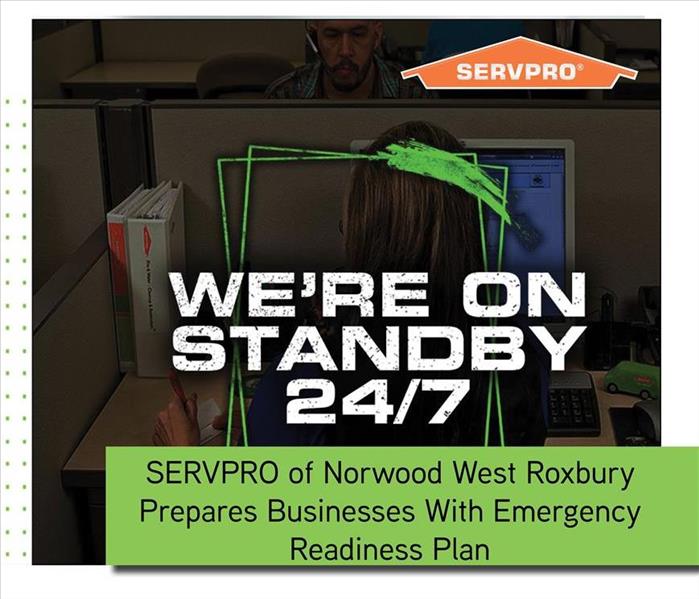 SERVPRO of Framingham helps commercial buildings with cleaning and restoration projects, that are either large or small.
SERVPRO of Framingham helps commercial buildings with cleaning and restoration projects, that are either large or small.
SERVPRO of Framingham helps commercial buildings with cleaning and restoration projects, that are either large or small.
When your commercial property is hit with damage due to a storm it can leave your employees in shock. It’s important to know that you have professional large-loss specialists to handle the restoration process.
Here are benefits for hiring SERVPRO:
- Available 24/7: Storms and disasters can strike at any time of the day or night, so we are available no matter when.
- Professionals: Our Disaster Recovery Teams are composed of elite technicians; they have training and resources to handle large-loss events.
- Large Commercial Assistance: We serve industries such as hospitals, universities, and government facilities.
- Personal Approach: Each large loss project is managed by our project manager.
- Teamwork: We will help you navigate the insurance claims process and coordinate the necessary paperwork for a great experience.
SERVPRO of Newton Wellesley is available 24/7 including holidays and weekends to assist you and get your home back to “Like it never even happened.”
SERVPRO of Norwood West Roxbury Celebrates Small business Saturday
11/27/2021 (Permalink)
 There is an entire day dedicated to the small local businesses: Small Business Saturday.
There is an entire day dedicated to the small local businesses: Small Business Saturday.
With the holidays here, people are trying to find the best deals for all of the items on family and friends. There is an entire day dedicated to the small local businesses: Small Business Saturday. We support and love all of our local small businesses not only today but through out the year.
This year, Small Business Saturday lands on November 27th. It is important to support local businesses especially after the year we have had. We can’t wait to see all the great sales from our local community.
SERVPRO of Norwood West Roxbury is available 24/7 including holidays and weekends to assist you with your home restoration needs to get it back to “Like it never even happened.”
SERVPRO of Norwood West Roxbury Celebrates Thanksgiving
11/24/2021 (Permalink)
 Here are some Thanksgiving safety tips.
Here are some Thanksgiving safety tips.
Thanksgiving Day is a national holiday in the United States. In 1621, the Plymouth colonists and Wampanoag Native Americans shared an autumn harvest feast that is acknowledged today as one of the first Thanksgiving celebrations in the colonies.
Here are some Thanksgiving safety tips:
- Do not leave food cooking unsupervised.
- Have a fire extinguisher nearby.
- Do not leave candles burning unattended.
- Do not burn candles near flammable items like curtains.
- Follow instructions carefully when using a deep fryer.
Happy Thanksgiving to all of our friends and family in Norwood West Roxbury have a wonderful day!.
SERVPRO of Norwood West Roxbury is available 24/7 including holidays and weekends to assist you with your home restoration needs to get it back to “Like it never even happened.”
SERVPRO of Norwood West Roxbury Talks Winter Weather Safety
11/16/2021 (Permalink)
 We all know that winter in the Norwood West Roxbury area can change quickly. Here are some important winter storm things to know.
We all know that winter in the Norwood West Roxbury area can change quickly. Here are some important winter storm things to know.
We all know that winter in the Norwood West Roxbury area can change quickly. Here are some important winter storm things to know.
- Winter Storm Warning: This is issued when hazardous weather is arriving such as heavy snow, freezing rain, or sleet. This is usually issued 12 to 24 hours beforehand.
- Winter Weather Advisory: This is issued for accumulations of snow, freezing rain, and sleet.
- Know Your Risk for Winter Storms: Pay attention to the weather and warnings of winter storms.
SERVPRO of Norwood West Roxbury is available 24/7 including holidays and weekends to assist you with your home restoration needs to get it back to “Like it never even happened.”
SERVPRO of Norwood West Roxbury Provides Shopping Online Tips.
11/12/2021 (Permalink)
 Online shopping is blooming this year. It’s important to take steps to protect yourself when shopping online.
Online shopping is blooming this year. It’s important to take steps to protect yourself when shopping online.
Online shopping is blooming this year. It’s important to take steps to protect yourself when shopping online especially during the holiday season.
It makes it more lucrative for scammers. They can trick buyers into paying for goods they won’t receive or even obtain personal information.
Here are some online shopping tips:
- Think before you click: Beware of ads encouraging clicking on links and leaving a website to another.
- Do your homework: Prior to making a purchase, read reviews and learn more about a company.
- Consider your payment options: A credit card is much better than using a debit card.
- Watch what you give away: Be alert to the kinds of information being collected to complete your transaction.
- Keep tabs on your bank and statements: Set up alerts so that if your credit card is used, you will receive a text message.
- Keep a clean machine: Be sure that all internet-connected devices like computers and smartphones are free from malware.
- Use secure Wi-Fi: Public Wi-Fi to shop online is convenient, but you should use a Virtual Private Network (VPN) or your phone as a hotspot.
SERVPRO of Norwood West Roxbury is available 24/7 including holidays and weekends to assist you with your home restoration needs to get it back to “Like it never even happened.”
SERVPRO of Norwood West Roxbury Shares Christmas Tree Safety
11/9/2021 (Permalink)
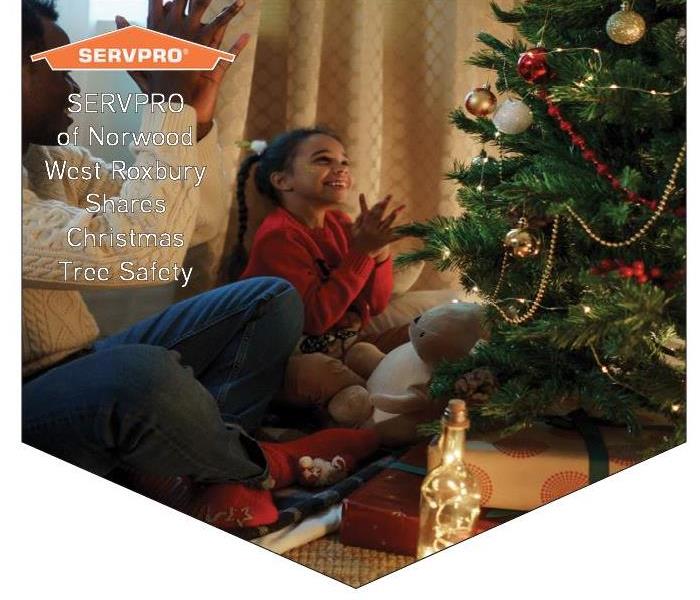 Fires are very common around the holidays simply because of Christmas trees and lights. To help prevent fires this holiday season here are some tips
Fires are very common around the holidays simply because of Christmas trees and lights. To help prevent fires this holiday season here are some tips
Fires are very common around the holidays simply because of Christmas trees and lights. Roughly three-quarters of Christmas tree fires occur in December or January. (National Fire Protection Association). To help prevent fires this holiday season here are some tips:
- Use miniature lights, they are great because they help reduce the drying of the tree.
- Always inspect light sets prior to placing them on the tree.
- Do not overload electrical circuits.
- Always turn off the lights when unattended.
- If the tree is dry, remove it from the house.
- Never burn any part of the tree in a fireplace.
SERVPRO of Norwood West Roxbury is available 24/7 including holidays and weekends to assist you with your home restoration needs to get it back to “Like it never even happened.”
SERVPRO of Norwood West Roxbury Shares Thanksgiving Cooking Safety
11/4/2021 (Permalink)
 The kitchen is used a lot during the holiday. Keep fire safety top of mind this holiday.
The kitchen is used a lot during the holiday. Keep fire safety top of mind this holiday.
Cooking fires are the number one cause of home fires. The kitchen is used a lot during the holiday. Keep fire safety top of mind this holiday. Here are some tips so you and your loved ones can stay safe during the holiday:
- Stay in the kitchen when you are cooking.
- Check on your turkey often.
- Keep children at least three feet away from cooking.
- Watch electric cords and make sure they aren’t dangling.
- Keep matches and lighters out of the reach of children.
- Keep the floor clear so you don’t trip with hot items.
- Make sure your smoke alarms are working.
SERVPRO of Norwood West Roxbury is available 24/7 including holidays and weekends to assist you with your home restoration needs to get it back to “Like it never even happened.”
SERVPRO Norwood West Roxbury Halloween Safety Tips
10/30/2021 (Permalink)
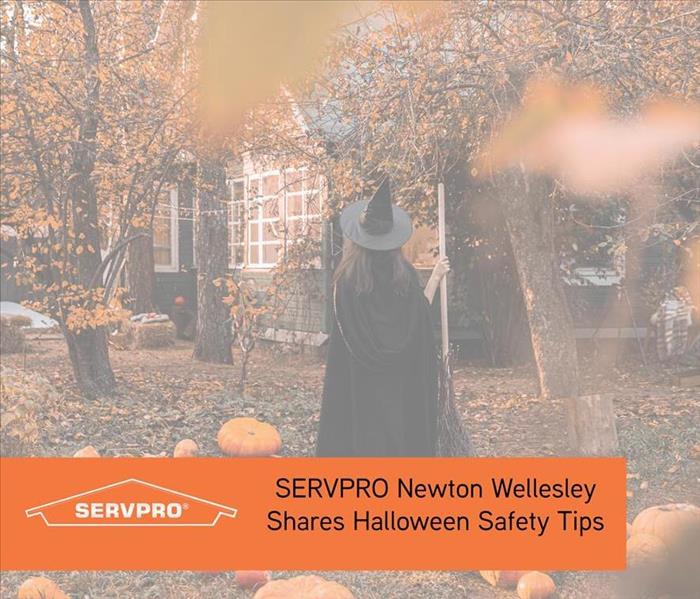 Halloween is a fun day for children. They get to dress up and get free candy. However, along with Trick or Treating comes safety.
Halloween is a fun day for children. They get to dress up and get free candy. However, along with Trick or Treating comes safety.
Halloween is a fun day for children. They get to dress up and get free candy. However, along with Trick or Treating comes safety; this is the utmost important thing for all kids.
Here are safety tips for this day:
- Walk Safely: Make sure to cross the street at corners and use traffic signals and crosswalks. Double-check left, right, and left again when crossing.
- Put electronic devices down: Pay attention to your surroundings and keep your head up.
- Walk on sidewalks: If there are no sidewalks, walk facing traffic.
- Watch for cars: Look out for cars that are backing up. Do not run into the street.
- Wear bright colors: Make sure to have some reflective clothing and choose light colors so people can see you at night.
- Drive safe: Take extra time to look for kids at intersections and hidden areas.
- Make sure to turn your headlights on so you can spot them from greater distances.
- Popular trick-or-treating hours are 5:30 p.m. to 9:30 p.m. Be especially alert for kids during those hours.
- Most of all have fun and be safe! Happy Halloween.
SERVPRO of Norwood West Roxbury is available 24/7 including holidays and weekends to assist you with your home restoration needs to get it back to “Like it never even happened.”
SERVPRO Norwood West Roxbury Honors National First Responders Day
10/28/2021 (Permalink)
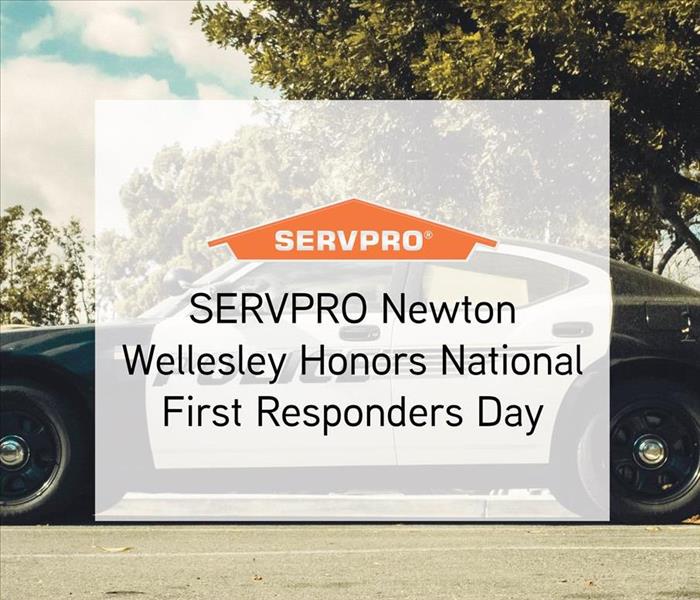 October 28th is National First Responders Day and it is a day to honor the men and women when an emergency is at hand.
October 28th is National First Responders Day and it is a day to honor the men and women when an emergency is at hand.
October 28th is National First Responders Day and it is a day to honor the men and women when an emergency is at hand.
First responders are dedicated to saving lives: firefighters, police, emergency medical technicians (EMT), paramedics, and 911 operators.
We honor this national day of gratitude and pay tribute to their endless hours and sacrifices.
HOW TO OBSERVE #NationalFirstRespondersDay
This day provides you with an opportunity to recognize a first responder.
- Treat them to their favorite beverage
- Buy their next meal
- Hand deliver a note and gift
Connect with a first responder and thank them. Let them know you appreciate their dedication and sacrifice.
SERVPRO of Norwood West Roxbury is available 24/7 including holidays and weekends to assist you with your home restoration needs to get it back to “Like it never even happened.”
SERVPRO Norwood West Roxbury Honors Mental Health Day
10/10/2021 (Permalink)
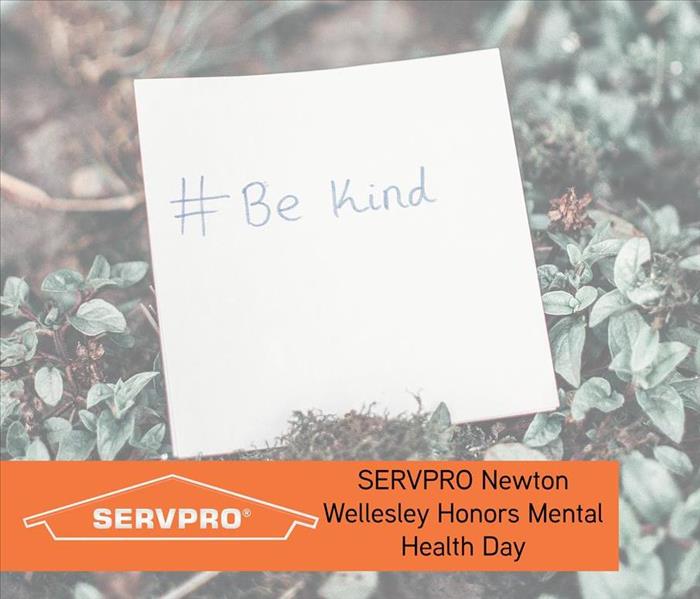 World Mental Health Day is celebrated on October 10th to help raise awareness and support mental health.
World Mental Health Day is celebrated on October 10th to help raise awareness and support mental health.
World Mental Health Day is celebrated on October 10th to help raise awareness and support mental health.
Mental health is a demanding topic. People aren’t shy to address mental health issues and are finally getting the attention they deserve.
However, that doesn’t mean we should stop creating awareness.
Mental health covers several areas and means many things to different people: social, emotional, and psychological well-being. It can affect thoughts, feelings, and actions. Positive mental health will help decrease stress.
HOW TO OBSERVE #MentalHealthDay
Not everyone faces mental health issues, but mental health can impact many at one point or another. Discussing mental health with your loved ones helps.
- Organizations host a variety of events about this topic. Events may include educational seminars, free mental health screenings, walk-a-thons, marathons, conferences, mass media promotions, and more. You can find some here: https://www.nami.org/Get-Involved/Awareness-events
- If you know someone who struggles with a mental health disorder, reach out to them and offer support. Knowing they have someone to reach out to can be life-changing.
- You can also donate to an organization: National Alliance on Mental Health (NAMI) and the Brain and Behavior Research Foundation.
Share this day on social media with #WorldMentalHealthDay.
SERVPRO of Norwood West Roxbury is available 24/7 including holidays and weekends to assist you with your home restoration needs to get it back to “Like it never even happened.”
SERVPRO Norwood West Roxbury Gives Back During Breast Cancer Month
10/4/2021 (Permalink)
 The entire month of October is Breast Cancer Awareness Month. This was created to raise awareness about the impact of breast cancer.
The entire month of October is Breast Cancer Awareness Month. This was created to raise awareness about the impact of breast cancer.
The entire month of October is Breast Cancer Awareness Month. This was created to raise awareness about the impact of breast cancer and local communities.
Each year in the United States, about 255,000 women get breast cancer and 42,000 women die from the disease.
Men also get breast cancer, but it is not very common. About 1 out of every 100 breast cancers diagnosed in the United States are found in a man. (CDC)
Here are ways to give back:
- Make a Donation: This will help cancer patients get the medical help and resources they need.
- Start a Fundraiser: Get involved with friends and family to start one and make it fun.
- Join a Race or Walk: This will help fund life-saving research, treatment, and education.
https://www.komen.org/
SERVPRO of Norwood West Roxbury is available 24/7 including holidays and weekends to assist you with your home restoration needs to get it back to “Like it never even happened.”
SERVPRO Norwood West Roxbury Honors Fire Prevention Week
10/4/2021 (Permalink)
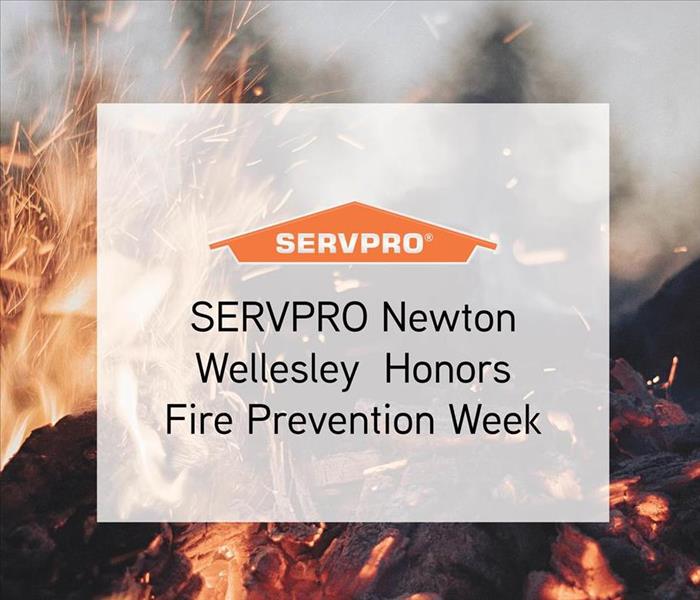 The National Fire Protection Association (NFPA) designates one week, Sunday, October 3rd to Saturday, October 9th, each year to share fire safety.
The National Fire Protection Association (NFPA) designates one week, Sunday, October 3rd to Saturday, October 9th, each year to share fire safety.
The National Fire Protection Association (NFPA) designates one week, Sunday, October 3rd to Saturday, October 9th, each year to share fire safety topics. This is honored for one week once a year, but we should practice fire safety at all times.
The goal of Fire Prevention Month is to raise fire safety awareness but to help ensure safety and protection. In 1922, the National Fire Protection Association (NFPA) named the second week of October Fire Prevention Week in commemoration of the Great Chicago Fire in 1871. (First Alert)
Fire safety awareness and education are important for families and communities. Check your local fire department, sometimes provide education to local communities.
The NFPA's 2021 campaign for Fire Safety Month is "Learn The Sounds of Fire Safety. (NFPA)"
Here are some ways to help protect your home and family:
- Install smoke and carbon monoxide alarms
- Have fire extinguishers at home
- Have an emergency plan
- Have local numbers handy (insurance, restoration, doctors, vet, etc).
- Test alarms
- Change the batteries
- Know how to use a fire extinguisher
Unattended cooking is the #1 cause of home fires. (First Alert)
Please practice home safety, so you are prepared throughout the entire year.
SERVPRO of Norwood West Roxbury is available 24/7 including holidays and weekends to assist you with your home restoration needs to get it back to “Like it never even happened.”
SERVPRO Norwood West Roxbury Celebrates Fall
9/22/2021 (Permalink)
 September 22nd is the autumnal equinox. Fall begins in the Northern Hemisphere whereas spring begins in the Southern Hemisphere.
September 22nd is the autumnal equinox. Fall begins in the Northern Hemisphere whereas spring begins in the Southern Hemisphere.
September 22nd is the autumnal equinox. Fall begins in the Northern Hemisphere whereas spring begins in the Southern Hemisphere.
This is the turning point when darkness begins to win over daylight. Our hours of daylight have been slightly shorter each day since the summer solstice in June.
For the next three months, our hours of daylight will continue to grow shorter. At the autumnal equinox, day and night are approximately equal in length.
SERVPRO of Norwood West Roxbury is available 24/7 including holidays and weekends to assist you with your home restoration needs to get it back to “Like it never even happened.”
SERVPRO Norwood West Roxbury Honors Grandparents Day
9/12/2021 (Permalink)
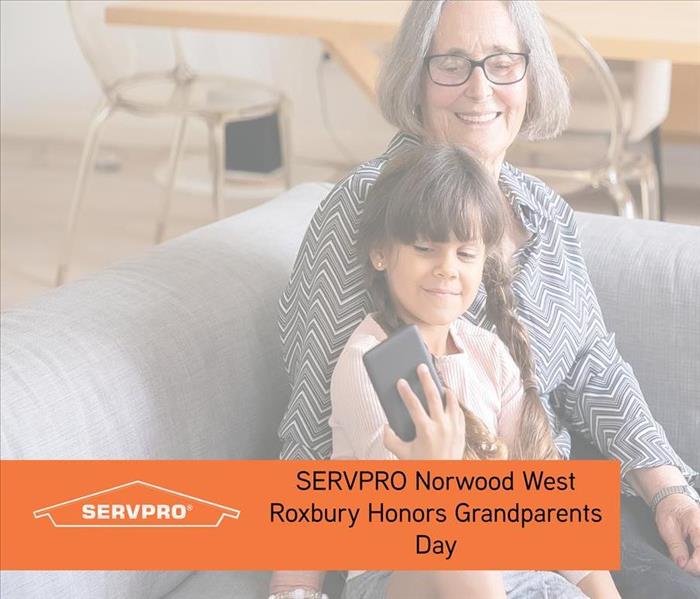 Sunday, September 12 is Grandparents Day. It is a special day for grandparents. We support Grandparents’ Day because Grandkids Matter.
Sunday, September 12 is Grandparents Day. It is a special day for grandparents. We support Grandparents’ Day because Grandkids Matter.
Sunday, September 12 is Grandparents Day. It is a special day for grandparents.
We support Grandparents’ Day because Grandkids Matter. Grandchildren thrive when grandparents have a supporting relationship with family members.
There is a special day for Mothers and Fathers so why not have a whole day dedicated to our grandparents. Grandparents have a uniquely special bond, and this day is a great time to treasure that time together.
Make sure to spend time with your Grandparents not only today but as often as you can.
SERVPRO of Norwood West Roxbury is available 24/7 including holidays and weekends to assist you with your home restoration needs to get it back to “Like it never even happened.”
SERVPRO Norwood West Roxbury Emergency Supply Kits For National Preparedness Month
9/12/2021 (Permalink)
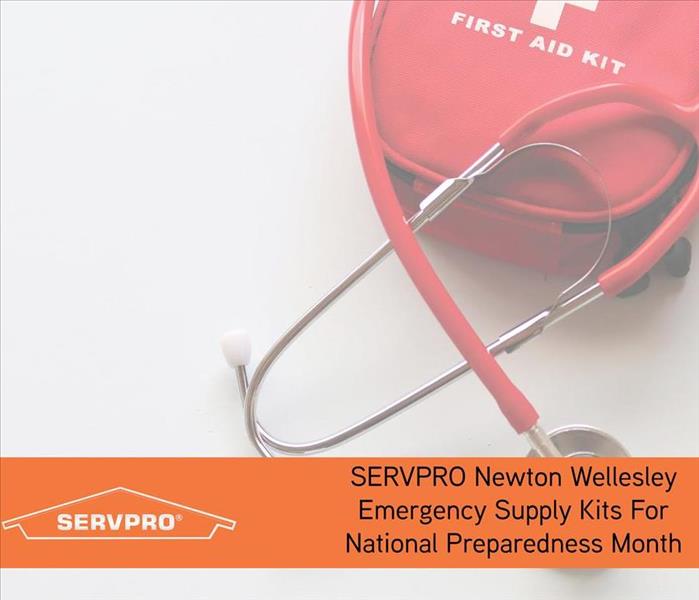 A supply kit should be prepared for potential disasters. You should make sure your family has the necessary food and supplies.
A supply kit should be prepared for potential disasters. You should make sure your family has the necessary food and supplies.
A supply kit should be prepared for potential disasters. You should make sure your family has the necessary food and supplies.
It is also important to keep the kit up to date. Keep food and water fresh. It is typically best to store the kit, along with any pet supplies, in a closet.
Here is a basic emergency supply kit list:
- Water (one gallon per person per day for several days, for drinking and sanitation)
- Food (at least a three-day supply of non-perishable food)
- Battery-powered radio and an NOAA Weather Radio
- Flashlight
- First aid kit
- Extra batteries
- Dust mask (to help filter contaminated air)
- Moist towelettes, garbage bags, and plastic ties (for personal sanitation)
- Wrench or pliers (to turn off utilities)
- Manual can opener (for food)
- Cell phone with chargers and a backup battery
- Non-prescription medications such as pain relievers
- Prescription eyeglasses or contact lens solution
- Infant formula, bottles, diapers, wipes, and diaper rash cream
- Pet food and extra water for your pet
- Important family documents such as copies of insurance policies, identification, and bank account records saved electronically
- Sleeping bag or warm blanket for each person
- Complete change of clothing appropriate for your climate
- Fire extinguisher
- Feminine supplies and personal hygiene items
- Paper cups, plates, paper towels, and plastic utensils
- Books, games, puzzles, or other activities for children
Source; https://www.ready.gov/kit
SERVPRO of Norwood West Roxbury is available 24/7 including holidays and weekends to assist you with your home restoration needs to get it back to “Like it never even happened.”
SERVPRO Norwood West Roxbury Honors 9-11
9/10/2021 (Permalink)
 September 11th is Patriot Day. It is an observed holiday in the United States. This is to commemorate the lives of those who were lost in 2001.
September 11th is Patriot Day. It is an observed holiday in the United States. This is to commemorate the lives of those who were lost in 2001.
September 11th is Patriot Day. It is an observed holiday in the United States. This is to commemorate the lives of those who were lost in the 2001 terrorist attacks.
On December 18th, 2001, September 11th was declared as Patriot Day. This is a yearly proclamation requesting that all flags be flown at half-staff.
Americans are asked to honor those lost with a moment of silence at 8:46 AM, Eastern Standard Time. This is the time that the first airplane struck the World Trade Center.
Please join us today remembering those at this designation time.
SERVPRO of Norwood West Roxbury is available 24/7 including holidays and weekends to assist you with your home restoration needs to get it back to “Like it never even happened.”
Happy Labor Day From SERVPRO Norwood West Roxbury
9/1/2021 (Permalink)
 We hope that you have a healthy and safe Labor Day weekend and are able to enjoy time off.
We hope that you have a healthy and safe Labor Day weekend and are able to enjoy time off.
Labor Day is Monday, September 6th. It is a day to tribute the contributions and achievements of the hard-working Americans.
Labor Day was created by the labor movement in the 19th century; it became a federal holiday in 1894. This is an annual celebration of workers and their achievements. It originated during one of American labor history’s most dismal chapters.
The Industrial Revolution in the United States on average had Americans working 12-hour days and seven-day weeks to make a basic living. Even children as young as 5 or 6 were working across the country.
People were faced with extremely unsafe working conditions, sanitary facilities, and uneven breaks.
Today it symbolizes the end of summer for many Americans. This is celebrated with parties, street parades, and festivals.
We hope that you have a healthy and safe Labor Day weekend and are able to enjoy time off.
SERVPRO of Newton Wellesley is available 24/7 including holidays and weekends to assist you and get your home back to “Like it never even happened.”
Fire Safety Tips for Fall in Norwood West Roxbury
8/31/2021 (Permalink)
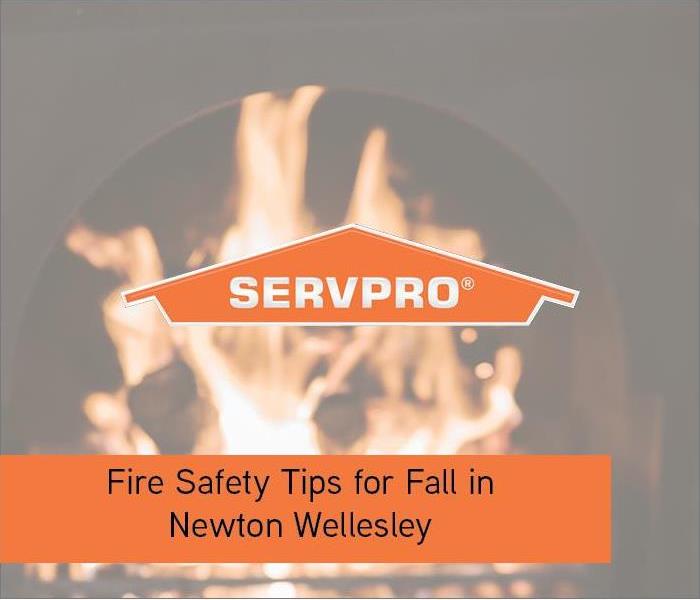 There’s nothing cozier than spending time with a fireplace to keep you warm as the weather turns colder
There’s nothing cozier than spending time with a fireplace to keep you warm as the weather turns colder
There’s nothing cozier than spending time with a fireplace to keep you warm as the weather turns colder. It is important to know some of the safety hazards:
Have Your Furnace Serviced: Have your furnace inspected by your heating and cooling company regularly, but especially during a new season. Have them check for leaks and ensure it is working properly.
Be Careful Using Your Fireplace: Make sure your fireplace has a screen; screens are crucial so that it keeps flying sparks safely inside the fireplace.
Use Caution with Space Heaters: Space heaters are a great way to chill out. Just make sure that you allow at least three feet of empty space around the heater to prevent fires.
Leaf Burning Could Be Dangerous: Burning leaves can be dangerous, make sure to wear a protective mask if you decide to do so. Never burn leaves on a windy day.
Exercise Candle Safety: Candles give a wonderful ambiance to a room but can also pose a fire hazard; never leave candles unattended.
SERVPRO of Norwood West Roxbury is available 24/7 including holidays and weekends to assist you to get your home back to “Like it never even happened.”
Winterizing Your Kitchen in Norwood West Roxbury
8/27/2021 (Permalink)
 Before you know it fall will be here; now is the time to think ahead and plan ahead
Before you know it fall will be here; now is the time to think ahead and plan ahead
Before you know it fall will be here; now is the time to think ahead and plan ahead. Apart from regular maintenance, it is time to wash the curtains, replace the shelf liners, and clean fixtures throughout your home. This is the time to give your kitchen some attention:
- Refrigerator: Remove all the contents, shelves, racks, bins, and trays, then wash everything with antibacterial cleaner.
- Stove: If your model is self-cleaning, then you know the drill. However, if not you can place a cup of ammonia in a ceramic dish in the oven overnight; be sure to wear gloves and open all nearby windows to prevent a fire.
- Dishwasher: You will want to use some baking soda on a damp sponge and wipe down the interior liner.
SERVPRO of Norwood West Roxbury is available 24/7 including holidays and weekends to assist you to get your home back to “Like it never even happened.”
Safety Tips for Fall Driving in Norwood West Roxbury
8/23/2021 (Permalink)
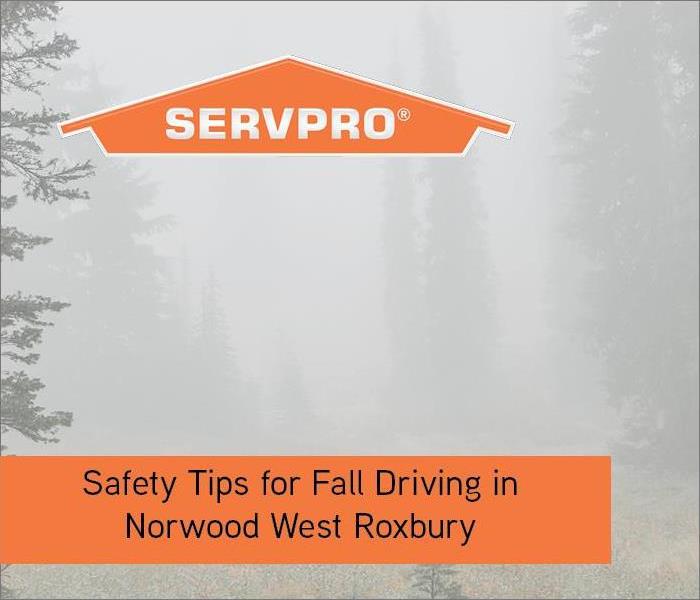 As the fall months are getting closer, the weather will be shifting, so it is important to drive cautious in the coming months.
As the fall months are getting closer, the weather will be shifting, so it is important to drive cautious in the coming months.
As the fall months are getting closer, the weather will be shifting, so it is important to drive cautious in the coming months. Here are some tips for you to remember:
Visibility May Be Poor: Falling leaves, rain, or fog can limit your vision sometimes. If you find your visibility limited, slow down or pull over.
Watch for Children: Make sure to use extra caution around leaves piled at the curbside. Children love playing in large piles of leaves that can sometimes be hidden.
Slow Down on Wet Pavement: Always keep a safe distance behind the car in front of you, especially in rainy conditions.
Be Prepared for Changing Weather: Try to always be prepared for a change in the weather by bringing a warm coat, rain gear, and gloves.
Should a storm arise and cause damage to your home or business give us a call. SERVPRO of Norwood West Roxbury is available 24/7 including holidays and weekends.
Fall Cleaning Tips in Norwood West Roxbury
8/22/2021 (Permalink)
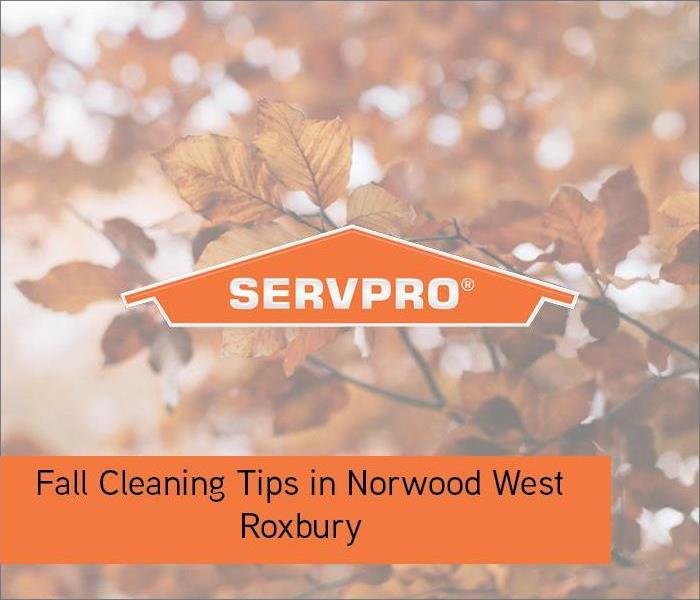 Roof gutters are traces that route water off your roof, it is really important to clean your gutters.
Roof gutters are traces that route water off your roof, it is really important to clean your gutters.
Roof gutters are traces that route water off your roof, it is really important to clean your gutters. If not taken care of, clogged gutters can cause water to pool on your roof, which can lead to water damage and structural damage. Poor gutter maintenance also leads to problems with siding, windows, doors, and foundations.
Some gutters have leaf-catching systems, but even these gutters need to be checked though. The best approach is to plan a day when you can check your gutters to make sure they are ready for the next season.
If you want to manually clean your gutters the best time is the day after a light rain; damp leaves and dirt will come up easier. If you are cleaning this yourself, use a narrow trowel to scoop and dispose of it in the garbage bag.
Next, use the hose to remove loose silt and anything else. If there's an obstruction in your downspout, use a plumber's snake to work it out. Have a helper who can spot you on the ladder as needed.
Also take a look at how the water is draining from your roof. If you see large drips along the joints where sections of gutter are attached your gutters may need repair; give someone a call to check it out.
SERVPRO of Norwood West Roxbury is available 24/7 including holidays and weekends to assist you to get your home back to “Like it never even happened.”
Autumn Home Maintenance Safety Tips in Norwood West Roxbury
8/22/2021 (Permalink)
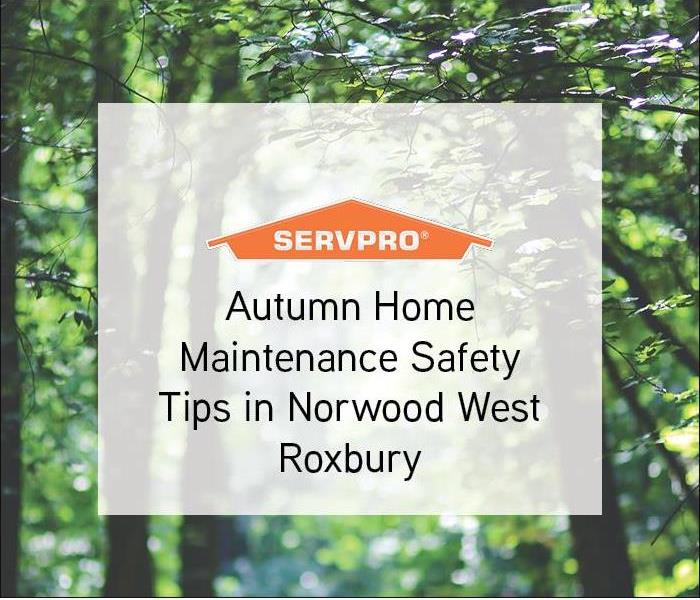 As the weather starts to cool off you will find more people doing yard work and prepping for the new season.
As the weather starts to cool off you will find more people doing yard work and prepping for the new season.
As the weather starts to cool off you will find more people doing yard work and prepping for the new season. It can be therapeutic for people to work on their yard in these crisp months.
Here are some safety tips should you decide to do yard work in the fall:
Look Up Before Pruning Trees: Make sure you know the area before you start trimming your trees. Look for where power lines are before you set up your ladder.
Use Caution on Ladders: Your ladder should be placed on a flat, level surface. You will want to make sure to wear appropriate footwear.
Clean Up Fallen Leaves: Check to make sure all walkways and driveways are clear of falling leaves since wet leaves can make for a slippery pedestrian hazard.
These are simple and easy little tips you can practice during the Autumn season to ensure safety all around you and your home.
SERVPRO of Norwood West Roxbury is available 24/7 including holidays and weekends to assist you to get your home back to “Like it never even happened.”
Summer Fires Safety Tips in Norwood West Roxbury
8/9/2021 (Permalink)
 Fires can be caused in the summertime for various reasons: grilling outdoors, family gatherings, and celebrations.
Fires can be caused in the summertime for various reasons: grilling outdoors, family gatherings, and celebrations.
Fires can be caused in the summertime for various reasons: grilling outdoors, family gatherings, and celebrations. There are many different types of fires during the summer months:
Grill fires: Fires from grills happen when there is mishandling of the igniting of the grill. You will want to make sure that your grill is free of branches, roofs, or any overhang.
Air Conditioning Fires: Inadequate wiring can cause a fire because of electrical malfunctions. If your AC heats up, call for help immediately to ensure it doesn’t transfer to something nearby.
Smoking Fires: Smoking fires are common throughout the year. Make sure to keep cigarettes are properly put out before throwing them on the ground.
Summer is a time to enjoy the outdoors, have fun, and have plenty of gatherings. The weather isn’t the only thing that heats up during these few months; be aware of the risk of fires.
SERVPRO of Norwood West Roxbury is available 24/7 including holidays and weekends to assist you for your home restoration needs to get it back to “Like it never even happened.”
Summer House Safety in Norwood West Roxbury
8/9/2021 (Permalink)
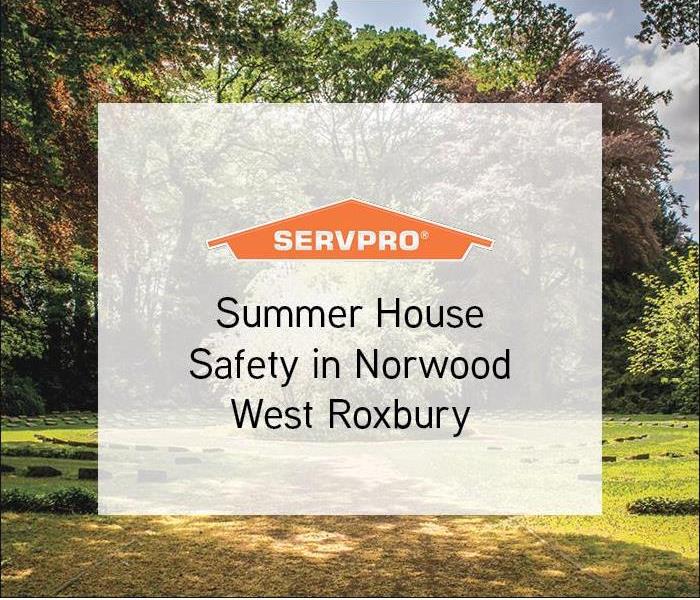 Summer is ending soon, but there are still many cookouts, bonfires, and outdoor activities happening.
Summer is ending soon, but there are still many cookouts, bonfires, and outdoor activities happening.
Summer is ending soon, but there are still many cookouts, bonfires, and outdoor activities happening. All this time outside can lead to potential dangers. It is important to keep track of repairs and installations you can make throughout your home.
We’ve put together all the tips you need to keep your family and home secure throughout the summer.
- Install sun shades to your windows to deflect heat.
- Reseal any cracking caulk on external windows and doors to prevent any leaks.
- Inspect the outside of your home for cracks and any overhanging tree limbs that could fall during a storm.
- Protect yourself in the event of a flood from a summer storm by double-checking that you have flood insurance added to your home insurance policy.
- Spray your yard home to protect it from insects, pests, and other creatures.
- Schedule a yearly inspection to help catch termites and stop them in their tracks before they cause major damage to your home’s structure.
SERVPRO of Norwood West Roxbury is available 24/7 including holidays and weekends to assist you to get your home back to “Like it never even happened.”
National Grilling Season in Norwood West Roxbury
7/12/2021 (Permalink)
 July is National Grilling Month, how will you enjoy your cookouts?
July is National Grilling Month, how will you enjoy your cookouts?
July is National Grilling Month, how will you enjoy your cookouts?
Enjoy the whole family together by using the grill. There's nothing better than outdoor cooking, so enjoy summer by entertaining with the best kinds of summer food.
However, along with grills can come fires. Here are a few helpful tips for you to during your grilling season:
- Keep your grill clean: Keeping your grill clean can extend the life of your grill. Stuck on grease should be cleaned since this can cause large fires.
- Always preheat the grill: This helps prevent food from sticking to the grates.
- Wash your hands often: Whenever handling raw meat, it is best to wash your hands with warm soapy water.
- Keep the food cold: Keep food cold until you are ready to cook.
- Monitor your grill: You should never leave your grill unattended, this can cause a large fire to anything nearby.
SERVPRO of Norwood West Roxbury is available 24/7 including holidays and weekends to assist you and get your home back to “Like it never even happened.”
National Pet Fire Safety Day in Norwood West Roxbury
7/12/2021 (Permalink)
 The best tip should a fire arise in your home, is to have an escape plan that includes your pets. Discuss who will be in charge of rescuing your pet.
The best tip should a fire arise in your home, is to have an escape plan that includes your pets. Discuss who will be in charge of rescuing your pet.
National Pet Fire Safety Day is July 15th. This is a day to learn how to keep your pet safe should a fire arise; it is important that we dedicate a day to keeping them safe should a scary event happen.
Here are some facts about pets and fires:
Pets cause over 1,000 house fires each year in the United States. It is important to make sure that there is nothing nearby that can start a fire.
Did you know that there are nearly 360,000 house fires each year in the United States? That is a lot of fire and damage.
Over 40,000 pets die every year in house fires. Awareness can save pet lives but also just having a plan should a fire arise is critical.
The best tip should a fire arise in your home, is to have an escape plan that includes your pets. Discuss who will be in charge of rescuing your pet in the event of a fire.
SERVPRO of Norwood West Roxbury is available 24/7 including holidays and weekends to assist you and get your home back to “Like it never even happened.”
Back to School Safety Tips in Norwood West Roxbury
7/12/2021 (Permalink)
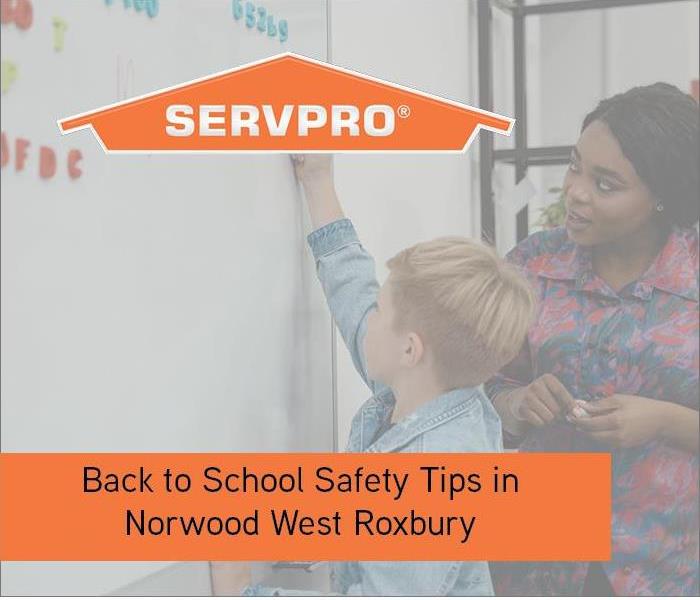 Summer is flying by, parents are starting to think about Back to School already. Here are some great school safety tips.
Summer is flying by, parents are starting to think about Back to School already. Here are some great school safety tips.
Summer is flying by, parents are starting to think about Back to School already. As the school year starts to arrive here are some great safety tips for the school year:
- Be on the lookout for school zone signals, and slow down to obey all traffic laws.
- Always stop for school busses whenever applicable.
- Watch out for school crossing guards.
- Be aware of children near schools, bus stops, sidewalks, in the streets, and in school parking lots.
- Never pass other vehicles while driving in a school zone.
- Avoid using a cell phone while driving in a school zone.
- Make sure a supervisor is always present when children are at the school’s playground.
- Allow time for drop-off and pick-up.
- If your child is walking to school make sure they know the correct route.
- Always use public sidewalks and streets when walking to school.
- If your child is walking to school, have them walk with other students.
- Make sure to teach your children to recognize and obey traffic signals and signs.
- Teach your children to only cross streets at designated crosswalks.
- Make sure to enforce looking both ways before crossing the street.
- Make sure the bus comes to a complete stop before getting on or off.
- When riding the bus, make sure your child understands to remain seated.
SERVPRO of Norwood West Roxbury is available 24/7 including holidays and weekends to assist you to get your home back to “Like it never even happened.”
Norwood to Host Independence Day Parade
6/15/2021 (Permalink)
 The parade will begin at 10 AM on July 3rd at Coakley Middle School.
The parade will begin at 10 AM on July 3rd at Coakley Middle School.
On Saturday, July 3rd, the town of Norwood is gearing up for an exciting parade. The parade will begin at 10 AM at the Coakley Middle School, located at 1315 Washington Street Norwood, MA. The parade will then go down Washington Street to Town Hall, where it will conclude after taking a right in front of the Town Hall. The town of Norwood's website states that "Our annual 4th of July Parade has brought so much pleasure to residents of Norwood and surrounding communities for many years. Many bands and entertainment acts continue to return to Norwood every year to be part of the July 4th Celebration. They come because of the tremendous response and enthusiasm of the community". If community members are interested in volunteering at the parade, they can contact the Norwood Recreation Department at 781-762-0466 to learn more about how they can help with the celebration.
Boston Area Experiences First Heat Wave of 2021
6/8/2021 (Permalink)
 Temperatures in the Greater Boston Area reached well over 90 this past weekend
Temperatures in the Greater Boston Area reached well over 90 this past weekend
Last Monday, June 7th, Boston area residents turned up their A/C and hopped in pools as the first heat wave of 2021 rolled through the Greater Boston Area. A heat wave is defined as three or more days of 90-degree or higher temperatures, and the past weekend surely lived up to heat wave standards. The grueling heat began on Saturday, June 5th, as temperatures hit 90 degrees in Boston. Then on Sunday, Boston reached 93 degrees. Communities in Norwood, Dedham, Westwood, Walpole, and Medfield attempted to cool off as the heat came through, showing signs of a hot summer ahead. “As always, be smart and hydrate,” said Bill Simpson, meteorologist at the National Weather Service, adding that people should try to take care of their outside tasks early or late when it’s not as hot. SERVPRO of Norwood/West Roxbury reminds all community members to be safe in the heat, and not over-exert themselves because it can be dangerous to the body.
Fireworks safety in Norwood West Roxbury
6/8/2021 (Permalink)
 Fireworks Safety Month is in June. Summer months are filled with celebrations of summer, vacations, and the Fourth of July.
Fireworks Safety Month is in June. Summer months are filled with celebrations of summer, vacations, and the Fourth of July.
Fireworks Safety Month is in June. Summer months are filled with celebrations of summer, vacations, and the Fourth of July.
Summer is a fun time for outdoor activities such as barbeques. However, many like to celebrate with fireworks. Fireworks are beautiful, but can also be dangerous. Fireworks’ safety should be taken heavily. Most fireworks injuries are reported between June 16 to July 16.
It is important to learn about fireworks safety methods and instructions.
Speak up if you see others indulging in fireworks activities that are dangerous.
Practice using fireworks safely. It’s a celebration of our protectors; the fire and health departments work hard for our comfort and safety; practice safe fireworks.
Go all out in enjoying any celebrations, but practice the necessary safety precautions while doing it.
SERVPRO of Norwood West Roxbury is available 24/7 including holidays and weekends to assist you and get your home back to “Like it never even happened.”
National Insurance Awareness Day in Norwood West Roxbury
6/6/2021 (Permalink)
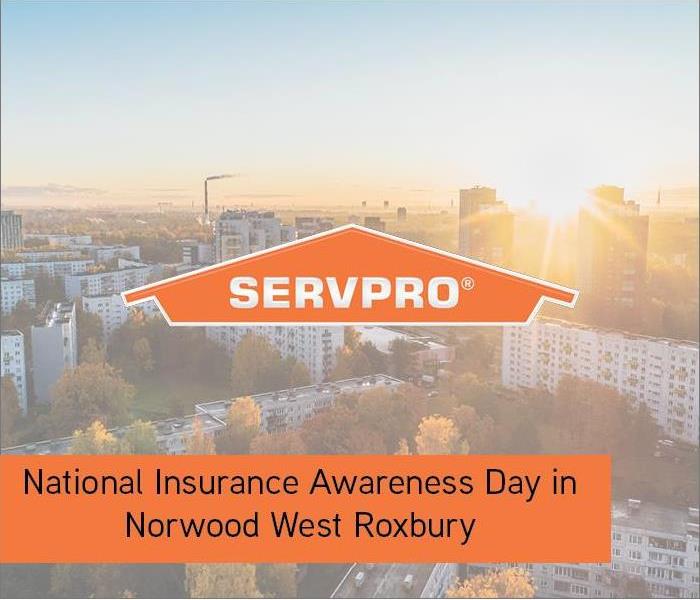 June 28 is National Insurance Awareness Day. It is a good idea to check out yearly your insurance coverages and deductibles
June 28 is National Insurance Awareness Day. It is a good idea to check out yearly your insurance coverages and deductibles
June 28 is National Insurance Awareness Day. It is a good idea to check out yearly your insurance coverages and deductibles; you never know when a disaster can strike in your home. This means it is a good day to evaluate your insurance coverage and assess your risk.
It is important to review your policies and consider any life changes that might require updating your coverage. This can help you in the future should a disaster ever happen.
Hurricane season started on June 1st. It is important to know the storm risk. Do you need supplemental flood or wind insurance? Anywhere that it can rain, it can flood.
SERVPRO of Norwood West Roxbury is available 24/7 including holidays and weekends to assist you and get your home back to “Like it never even happened.”
SERVPRO of Norwood West Roxbury nurses
5/6/2021 (Permalink)
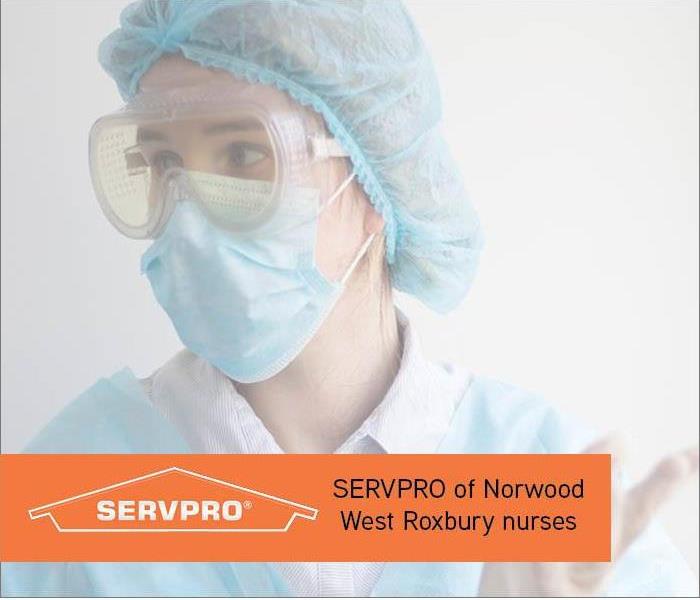 Give nurses you know a shout-out and thank them for their hard work.
Give nurses you know a shout-out and thank them for their hard work.
Did you know National Nurses Day is observed every year on May 6th? Help us raise awareness of all nurses on this day. We acknowledge the vital role nurses play in society.
National Nurses Week is May 6th and ends on May 12th. Nurses play a vital part in our community every day. We should not only celebrate and appreciate them during this time but every day.
HOW TO OBSERVE #NationalNursesDay
You can recognize nurses everywhere.
Celebrate their dedication and commitment to their patients and career.
Tell someone about the excellent care you’ve received from a nurse.
All it takes is a simple ‘thank you.’
When you visit a doctor, make sure to follow the instructions they give you and ask questions. Asking questions is always critical especially for your health.
Give nurses you know a shout-out and thank them for their hard work.
Use #NationalNursesDay to share a story and recognition on social media.
SERVPRO of Norwood West Roxbury is available 24/7 including holidays and weekends to assist you and get your home back to “Like it never even happened.”
SERVPRO of Norwood West Roxbury is celebrating International Firefighters’ Day 2021
5/4/2021 (Permalink)
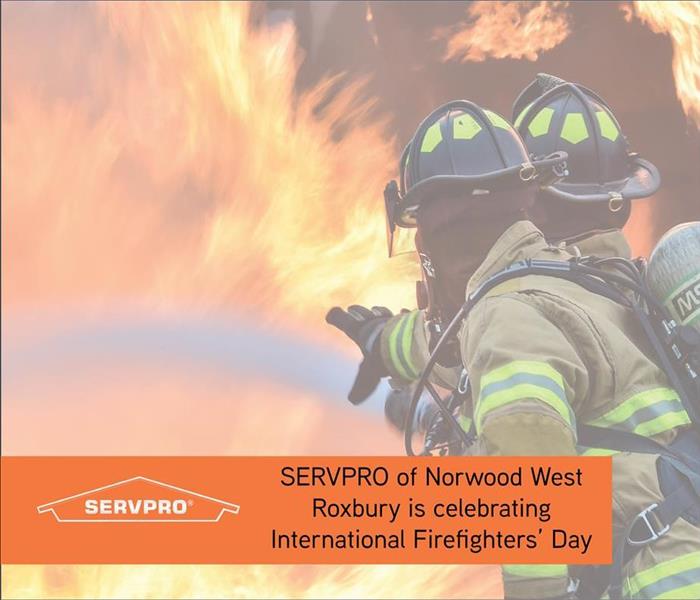 The (NFFF) National Fallen Firefighters Foundation Observes International Firefighters’ Day 2021.
The (NFFF) National Fallen Firefighters Foundation Observes International Firefighters’ Day 2021.
The (NFFF) National Fallen Firefighters Foundation Observes International Firefighters’ Day 2021.
This day was established in 1999 to honor the lives of firefighters who died in a wildfire in Victoria, Australia. It helps to recognize the service and sacrifice that firefighters make daily.
This day of recognition is the mission behind the NFFF. They help to honor and remember fallen firefighters. They assist families in rebuilding their lives but also are incredible for our community.
Firefighters are our family, friends, and co-workers at SERVPRO of Norwood West Roxbury. They respond to calls without any hesitation. They take amazing care of our community. Join us in thanking firefighters for all that they do. They work the front lines every day and our communities are made stronger by the dedication of these firefighters.
We appreciate them today and every day. Thank you for all that you do in the community.
SERVPRO of Norwood West Roxbury is available 24/7 including holidays and weekends to assist you and get your home back to “Like it never even happened.”
Thanks to our SERVPRO of Norwood Westroxbury administrative staff
4/25/2021 (Permalink)
Administrative Professionals Day was April 21st. We did not post about this special day on time,
but we still did celebrate with our staff. We want to share more about it with our local community.
Administrative Professionals Day is a special day to recognizes assistants and office staff. They are truly critical for our team at SERVPRO. The purpose of this day is to show appreciation for administrative teammates.
We always strive to show appreciation to our customers and staff whenever possible. It is important to recognize them throughout the year. There are fairly simple ways to recognize a team member: flowers, candy, coffee, coffee mugs, and so much more. Find out what they like best and show them you care and appreciate them.
Voltaire -- “Appreciation is a wonderful thing. It makes what is excellent in others belong to us as well.”
Thank you to our administrative staff at SERVPRO of Norwood Westroxbury each and every day. Here at SERVPRO, we have the certified professionals you need to help restore your home or business. Contact us today at (781) 769-9125 for more information.
Spring Storm Tips for Norwood West Roxbury
4/25/2021 (Permalink)
 Spring is has arrived here in Norwood West Roxbury. Spring can also mean strong severe storms.
Spring is has arrived here in Norwood West Roxbury. Spring can also mean strong severe storms.
Spring is has arrived here in Norwood West Roxbury. It is a great time of year, you know cook out’s, sports, and gatherings. Spring can also mean strong severe storms. There are some simple things you can do to prepare for storms before they happen.
Here are a few tips to consider:
Trim trees: Get rid of dead branches that could end up being dangerous in a severe storm. Find out if they are near the power source to your home.
Ensure sump pumps are working: Rainstorms can all result in flooded basements, it is important to make sure they are working properly now, not when the storm comes.
Secure backyard items: Move items such as patio furniture, lawn chairs, propane tanks, grills, flags, and poles, to your shed, or garage if the weather has called for high winds.
Be ready for power outages:
Think ahead: Plan to have extra ice in your freezer. This can ensure you have ice for several different reasons.
Use a cooler: You can add food that you want to access easily to in the cooler. This will keep other items in the fridge without constantly opening the fridge.
Extras: Have extra batteries, drinking water, and a good first-aid kit readily accessible.
If you find yourself in need of restoration for your home or business, give SERVPRO of Norwood West Roxbury a call at (617) 332-9000, we respond faster to any size disaster.
Planning To Reopen - Latest COVID-19 Vaccine Update
1/7/2021 (Permalink)
Governor Charlie Baker has voiced his concerns regarding the potential increase in COVID-19 cases coming out of the holiday season. Baker said while it remained too early to draw definitive conclusions, it appeared the state is seeing a uptick in coronavirus hospitalizations stemming from the December holidays.
He also shared the change in the average age of COVID-19 patients. At the beginning of November the average age of patients receiving hospitalization for COVID-19 was 61. The average age has increased significantly. Currently it is 71 years old.
In light of this new data Governor Baker announced that people age 75 or older had been moved higher up in the order of the state's vaccination plan; and that first responders will begin receiving vaccination shots next week.
The 75-plus age group is now part of Phase 2, Group 1 in the rollout, joining people with two co-morbid conditions as those considered at high risk for complications from COVID-19. They had previously been listed later in Phase 2.
The change affects about 170,000 people and was recommended by the state's advisory board.
But the next set of people who will receive the vaccine are the state's roughly 45,000 first responders, the third of seven groups in Phase 1, who can begin to be vaccinated starting next Monday, Jan. 11.
"Police officers, firefighters EMTs and all first responders work in risky situations every day and this vaccine will protect them from COVID and the terrible illness that can come with it," Baker said during a press conference Monday.
There are three options for getting the vaccine, outlined on the state's first responder vaccination website:
- Departments that meet certain criteria, like being able to vaccinate at least 200 first responders and store the doses on-site, can administer the shots themselves.
- More than 60 sites have been stood up to give first responders the vaccine.
- The state is working on developing four mass vaccination sites that can vaccinate up to 2,000 people per day, the details of which are still yet to be released. Baker said it's likely those sites would continue to be used after first responders are vaccinated.
It is critical for all of us to remain vigilant in our battle against COVID-19. COVID-19 remains a highly transmissible disease. Individuals should continue to follow these universal precautions:
- Follow healthy hygiene practices
- Stay at home when sick
- Practice social distancing
- Use a cloth face covering (with some exceptions) in community settings when physical distancing cannot be maintained.
We will continue to share with you guidance from the CDC, EPA, FDA, Mass EEA, Mass EEC, Mass DESE, and OSHA and the Governor's office While the administration continues to work with Federal and Local agencies to insure the safety and wellbeing of the residents of the Commonwealth during this ongoing pandemic and now manage the delivery of the much needed aid.
Also, we at SERVPRO of Norwood/West Roxbury know that not every community has access to the resources necessary to meet the strict cleaning guidelines to ensure a safe environment for our children. For those communities, we are here to help!
Certified: SERVPRO Cleaned
The Disaster Remediation Teams at SERVPRO of Norwood/West Roxbury are specialists in cleaning services and we adhere to the highest cleaning and sanitation standards. We are prepared to clean and disinfect your schools, according to protocols set forth by the Centers for Disease Control and Prevention. We have years of experience in dealing with biological contaminants, and we will go beyond the scope of work of "normal daily cleaning". Call SERVPRO of Norwood/West Roxbury today for a free consultation - (781) 769-9125.
All of us here at SERVPRO of Norwood/West Roxbury want you and your loved ones to stay safe and know that we will make it through this together! Rest assured, we will continue to do our best to keep you up-to-date and informed!
Planning To Reopen - Latest COVID-19 Update
1/6/2021 (Permalink)
At his press conference yesterday, Governor Charlie Baker reiterated the importance of remaining vigilant in following the Administration's guidelines to control the spread of COVID-19 and warned of the reality that the new, more contagious variant of the coronavirus has arrived in the state.
"I think most of us are working on the assumption that it's here," Baker said at a press conference at Baystate Medical Center in Springfield. "There would be no reason not to."
Currently, four states have confirmed the presence of this new strand of the COVID-19 virus:
- New York
- Colorado
- California
- Florida
The first U.S. case of the U.K. virus was detected by health officials in Colorado at the end of December in a man in his 20s. The most concerning aspect of this discovery was that this individual had no recent travel history.
Governor Baker shared the latest data on the spread of COVID-19 in Massachusetts:
- The number of patients hospitalized for COVID-19 has increased again, to 2,339.
- Of those hospitalized, 423 were listed as being in intensive care units
- Of those in ICU 258 are intubated
He assured residents that Department of Public Health is working closely with the Centers for Disease Control and Prevention, to monitor the potential spread of this new variant into the Commonwealth.
He also took this time to remind residents that the rollback on coronavirus restrictions that took effect last month are still in affect until at least noon on Jan. 10. These include a crack down on gatherings and businesses and a requirement that hospitals halt most elective surgeries. The major impact of these rollbacks was a reduction in maximum capacity limits to 25% for the following:
- Restaurants
- Movie theaters and performance venues
- Casinos
- Offices
- Places of worship
- Retail businesses
- Fitness centers and health clubs
- Libraries
- Golf facilities
- Driving and flight schools
- Arcades
- Museums
Baker closed by reiterating the need for people to refrain from unnecessary social gatherings and follow guidelines set forth by the state. He said, "I'll go back to my little speech about how important it is for people to wear masks, maintain distance and recognize and appreciate that when you're not with the people you live with, you really ought to be very vigilant and careful and cautious about your physical engagement with other people," and that, "everything we can do to be vigilant is going to protect you and the members of your family from getting the virus or potentially giving it to someone else."
It is critical for all of us to remain vigilant in our battle against COVID-19. COVID-19 remains a highly transmissible disease. Individuals should continue to follow these universal precautions:
- Follow healthy hygiene practices
- Stay at home when sick
- Practice social distancing
- Use a cloth face covering (with some exceptions) in community settings when physical distancing cannot be maintained.
We will continue to share with you guidance from the CDC, EPA, FDA, Mass EEA, Mass EEC, Mass DESE, and OSHA and the Governor's office While the administration continues to work with Federal and Local agencies to insure the safety and wellbeing of the residents of the Commonwealth during this ongoing pandemic and now manage the delivery of the much needed aid.
Also, we at SERVPRO of Norwood/West Roxbury know that not every community has access to the resources necessary to meet the strict cleaning guidelines to ensure a safe environment for our children. For those communities, we are here to help!
Certified: SERVPRO Cleaned
The Disaster Remediation Teams at SERVPRO of Norwood/West Roxbury are specialists in cleaning services and we adhere to the highest cleaning and sanitation standards. We are prepared to clean and disinfect your schools, according to protocols set forth by the Centers for Disease Control and Prevention. We have years of experience in dealing with biological contaminants, and we will go beyond the scope of work of "normal daily cleaning". Call SERVPRO of Norwood/West Roxbury today for a free consultation - (781) 769-9125.
All of us here at SERVPRO of Norwood/West Roxbury want you and your loved ones to stay safe and know that we will make it through this together! Rest assured, we will continue to do our best to keep you up-to-date and informed!
Travel FAQ 18-26
1/5/2021 (Permalink)

The holiday season has past but travel risks remain. It remains important that we all do our best to continue to travel as responsibly and safely as possible. The Baker Administration has set forth guidelines to follow for those of us where travel is unavoidable this Holiday Season. The following are FAQ to help residents of the Commonwealth better understand the requirements.
18. May travelers from places other than lower-risk states be exempt from the Travel Order requirements if traveling for the purpose of running errands like going to the grocery store or pharmacy?
- Travelers are exempt from the requirements to fill out the Travel Form and self-quarantine or obtain a negative COVID-19 test result if their travel is limited to brief trips for purposes that the Commissioner has designated as Critical Life Activities. This allowance is limited to short, same-day trips across the border and back for the following purposes: grocery shopping, visits to pharmacies, attending appointments with licensed health care providers including medical, dental, or mental health,, visiting persons receiving treatment in hospitals or residing in congregate care settings, attendance at day care or children’s camps, attending religious services and funerals or memorial services, or attending to the care needs of family members.
- During such trips, travelers are instructed to wear face-coverings, maintain social distance, practice good hygiene, and adhere to all other COVID-19 rules and restrictions.
19. I am a resident of RI attending a wedding in MA. Is the wedding considered a Commissioner’s Exemption under “religious services?”
- The wedding service itself can be considered an exemption as a religious service. However, any reception or celebration which either precedes or follows the ceremony is not exempted and requires either quarantining or a 72 hour negative test result in order to attend.
20. Are parents, guardians, and children required to comply with the Travel Order if traveling for the purpose of managing shared custody of a child?
- Children who travel into and out of Massachusetts because of transfers of custody or visitation between parents or guardians are exempt from the requirements of the order. Parents and guardians may rely on the transitory travel exemption, provided they comply with its limitations.
21. Other states’ travel restrictions include exemptions for trips that last less than 24 hours. Does Massachusetts have a similar exemption?
- No, there is no specific exemption for trips that last less than 24 hours. Such short trips may be covered by exemptions like the ones for transitory travel or commuting for work or school. Travelers arriving from places other than lower-risk States must fill out the Travel Form and self-quarantine or obtain a negative test result if they do not meet one of these exemptions.
22. I am looking to be exempt from the requirement to self-quarantine by obtaining a negative COVID-19 test, but I am unable to get tested in the state that I am traveling from. What can I do?
- A traveler who is required to quarantine may be released from the obligation to continue quarantining upon obtaining proof of a COVID-19 negative test, which was administered after the person’s arrival in Massachusetts. Travelers are required to quarantine immediately upon arrival in Massachusetts but may temporarily break quarantine to receive testing. Travelers must arrange for the test at their own expense and then are required to immediately continue quarantining until receiving a negative test result or the 10 days is complete.
23. After completing the Travel Form, do I need to keep a copy of my submission on-hand?
- You should keep the documentation with you. If you obtained a negative COVID-19 test result to be exempt from the self-quarantine requirement you should be prepared to produce those results upon request.
24. I am traveling to Massachusetts from Puerto Rico (or some other United States Territory). How does the Travel Order apply to me?
- For the purposes of the Travel Order the following U.S. jurisdictions are treated as States:
- District of Columbia
- Puerto Rico
- USVI
- Guam
- Northern Mariana Islands
- American Samoa
- None of these areas is currently classified as a lower-risk State, so travelers arriving from any of these places are required to fill out the Travel Form and self-quarantine or be prepared to produce a negative COVID-19 test result if they do not fall within one of the enumerated exceptions.
23. My child attends day care or day camp in MA or RI. Does he or she need to test or quarantine each day?
- No. Children who travel into or out of Massachusetts to attend day care or day camps are not required to comply with the Travel Order, and a parent or guardian transporting the child may rely on the transitory travel exemption, provided they comply with its limitations.
24. I live in Rhode Island and have a child or other family member receiving specialized medical care in MA. Can I visit them without quarantining or receiving a negative COVID test result?
- Yes. See response question number 18 above, which explains the Commissioner’s limited exception for Critical Life Activities.
25. What are the Commissioner’s exceptions for Critical Life Activities?
- grocery shopping
- visits to pharmacies
- attending appointments with licensed health care providers, including medical, dental, or mental health
- visiting persons receiving treatment in hospitals or residing in congregate care facilities
- attendance at day care or children’s camps
- attending religious services, and funerals or memorial services
- attending to the care needs of a family member
26. I am traveling into Massachusetts to participate in a clinical trial, am I exempt from the form and quarantine requirements?
Yes. Travelers coming to Massachusetts to participate in a clinical trial do not need to fill out the travel form and do not need to quarantine for 10 days.
Visitors are strongly urged to obtain a negative result before traveling to Massachusetts.
Testing for children, 10 years and younger, who are traveling with an adult from their household is not required.
Note: These requirements are in addition to Massachusetts requirements for wearing a mask or other face covering in both indoor and outdoor settings, any time you cannot socially distance and remain 6 feet from other people.
It is critical for all of us to remain vigilant in our battle against COVID-19. COVID-19 remains a highly transmissible disease. Individuals should continue to follow these universal precautions:
- Follow healthy hygiene practices
- Stay at home when sick
- Practice social distancing
- Use a cloth face covering (with some exceptions) in community settings when physical distancing cannot be maintained.
We will continue to share with you guidance from the CDC, EPA, FDA, Mass EEA, Mass EEC, Mass DESE, and OSHA and the Governor's office While the administration continues to work with Federal and Local agencies to insure the safety and wellbeing of the residents of the Commonwealth during this ongoing pandemic and now manage the delivery of the much needed aid.
Also, we at SERVPRO of Norwood/West Roxbury know that not every community has access to the resources necessary to meet the strict cleaning guidelines to ensure a safe environment for our children. For those communities, we are here to help!
Certified: SERVPRO Cleaned
The Disaster Remediation Teams at SERVPRO of Norwood/West Roxbury are specialists in cleaning services and we adhere to the highest cleaning and sanitation standards. We are prepared to clean and disinfect your schools, according to protocols set forth by the Centers for Disease Control and Prevention. We have years of experience in dealing with biological contaminants, and we will go beyond the scope of work of "normal daily cleaning". Call SERVPRO of Norwood/West Roxbury today for a free consultation - (781) 769-9125.
All of us here at SERVPRO of Norwood/West Roxbury want you and your loved ones to stay safe and know that we will make it through this together! Rest assured, we will continue to do our best to keep you up-to-date and informed!
Celebrating The Holidays Safely - Travel FAQ 10-17
12/31/2020 (Permalink)

As we continue to celebrate the holiday season it is important that we all do our best to do so as responsibly and safely as possible. The Baker Administration has set forth guidelines to follow for those of us where travel is unavoidable this Holiday Season. The following are FAQ to help residents of the Commonwealth better understand the requirements.
10. I am a MA resident and I provide Critical Infrastructure Services. I plan to go on vacation to Florida with my family. Do I need to quarantine when I return home from Florida?
- Yes. Workers who travel from Massachusetts for personal or leisure reasons cannot rely on the Critical Infrastructure Worker exemption upon return. You must either quarantine or satisfy the testing rule. Your status as a Critical Infrastructure Worker does not allow you to break quarantine—even to do that specialized work—following travel for personal or leisure reasons.
- Likewise, a Critical Infrastructure Worker who comes to Massachusetts for personal or leisure reasons cannot rely on the Critical Infrastructure Worker exemption upon arrival and must either quarantine or satisfy the testing rule.
11. I am dropping my child off at college in another state that is not considered lower risk. Do I need to quarantine when I come home?
- It depends. If a parent/guardian/family member is entering a non-lower-risk state only to drop off the student and then immediately leaves the campus and the state, then they would meet the exemption of transitory travel. If they are staying overnight, then they are subject to the quarantine requirement upon return or must meet the testing rule.
12. I am entering Massachusetts but do not need to fill out the travel form because I meet an exemption. Do I need written documentation demonstrating that I meet the exemption criteria?
13. I am visiting my relative in Massachusetts. I live in a non-lower-risk state. I plan to quarantine in my relative’s home. Does my relative need to quarantine as well?
- No. You should stay in a separate room from your relative. However, your presence in your relative’s home does not require your relative to quarantine.
14. I am traveling to MA from a non-lower-risk state and do not meet an exemption criteria. I previously had COVID-19, I isolated pursuant to CDC guidelines and was released from isolation, do I still need to quarantine or meet the testing rule?
- Yes. You must quarantine upon arrival or meet the testing rule.
- If you took a test within 72 hours of your arrival and it came back positive due to your previous infection, you can use the positive test result plus a note from your doctor documenting your previous diagnosis and recovery to satisfy the testing rule.
15. Can international travelers get tested in another country before arriving?
- Yes, provided that they take a molecular (PCR) SARS-CoV2 test on a sample obtained 72 hours or less prior to arrival in Massachusetts that is authorized by their Government.
16. I am a MA resident and went on vacation to a non-lower-risk state. Can I get a test in that state 72 hours before I come home to avoid the quarantine requirement?
- Yes, provided the test meets the DPH specifications.
17. I am a MA resident and I am required to travel from MA to a non-lower-risk state at the direction of the Military. Do I need to fill out the form and quarantine when I come home?
- No. Massachusetts residents who go out of state for military work and then return back to Massachusetts meet the military exemption.
Visitors are strongly urged to obtain a negative result before traveling to Massachusetts.
Testing for children, 10 years and younger, who are traveling with an adult from their household is not required.
Note: These requirements are in addition to Massachusetts requirements for wearing a mask or other face covering in both indoor and outdoor settings, any time you cannot socially distance and remain 6 feet from other people.
It is critical for all of us to remain vigilant in our battle against COVID-19. COVID-19 remains a highly transmissible disease. Individuals should continue to follow these universal precautions:
- Follow healthy hygiene practices
- Stay at home when sick
- Practice social distancing
- Use a cloth face covering (with some exceptions) in community settings when physical distancing cannot be maintained.
We will continue to share with you guidance from the CDC, EPA, FDA, Mass EEA, Mass EEC, Mass DESE, and OSHA and the Governor's office While the administration continues to work with Federal and Local agencies to insure the safety and wellbeing of the residents of the Commonwealth during this ongoing pandemic and now manage the delivery of the much needed aid.
Also, we at SERVPRO of Norwood/West Roxbury know that not every community has access to the resources necessary to meet the strict cleaning guidelines to ensure a safe environment for our children. For those communities, we are here to help!
Certified: SERVPRO Cleaned
The Disaster Remediation Teams at SERVPRO of Norwood/West Roxbury are specialists in cleaning services and we adhere to the highest cleaning and sanitation standards. We are prepared to clean and disinfect your schools, according to protocols set forth by the Centers for Disease Control and Prevention. We have years of experience in dealing with biological contaminants, and we will go beyond the scope of work of "normal daily cleaning". Call SERVPRO of Norwood/West Roxbury today for a free consultation - (781) 769-9125.
All of us here at SERVPRO of Norwood/West Roxbury want you and your loved ones to stay safe and know that we will make it through this together! Rest assured, we will continue to do our best to keep you up-to-date and informed!
Celebrating The Holidays Safely - Travel FAQ 1-9
12/30/2020 (Permalink)

As we continue to celebrate the holiday season it is important that we all do our best to do so as responsibly and safely as possible. The Baker Administration has set forth guidelines to follow for those of us where travel is unavoidable this Holiday Season. The following are FAQ to help residents of the Commonwealth better understand the requirements.
1. Does this apply to students arriving from other States or foreign countries to attend college or university or boarding school?
- Yes. The travel rule applies to all persons entering Massachusetts from any point of origin. A student who enters Massachusetts from any place not included on the list of COVID-19 lower-risk States must quarantine for 10 days if the student cannot provide proof of a negative test result that meets the standards of the 72-hour test rule.
2. Does the rule apply to parents, guardians and family members who are dropping their students off for boarding school or college/university?
- Yes. If a parent/guardian/family member is entering Massachusetts only to drop off the student and then immediately leaves the campus and the state, then they would meet the exemption of transitory travel. If they are staying overnight, then they are subject to the requirements of the travel order.
- Parents, guardians, and family members who do not meet the transitory travel exemption and are coming into Massachusetts from any place other than a COVID-19 lower-risk State are required to either receive a negative test within 72 hours of coming into Massachusetts or quarantine for 10 days.
3. Where can I report concerns I may have about non-compliance with the order?
4. If I develop symptoms but had a negative test what should I do?
- The 72-hour test is a diagnostic test that is a point in time clinical measurement. If you develop symptoms, you may need to be tested again and may need medical attention.
5. I received a call that I should go into quarantine because I was exposed to someone who tested positive for COVID-19. My test came back negative 3 days ago. Do I still need to quarantine?
- Yes. If you were exposed to someone known to be COVID-19 positive, then you are at increased risk of becoming positive and will need to quarantine for 10 days in your home state.
6. I had an antigen test which was negative, do I need to be tested again?
- Yes, a negative antigen test must be confirmed by a negative result from an FDA EUA-approved molecular (PCR) SARS-CoV2 test on a sample obtained 72 hours or less prior to arrival in Massachusetts.
7. I plan to arrive in Massachusetts on, or before, July 31, 2020, do I need to fill out the travel form?
8. I am traveling with my children from a non-lower-risk State. I took a test and have my negative result. Do my kids need a test for COVID-19 as well?
- It depends on each child’s age. If your child is 10 or younger, then the child does not need a test. If the child is 11 or older, then the child needs to be tested or will need to quarantine for 10 days, unless an exemption criteria applies.
9. I am a MA resident returning home after traveling to a state that is not considered lower risk. I have proof of a negative test result on a sample taken before my out-of-state travel, and because I was out of state only for 48 hours, I am returning within 72 hours of the time the sample was taken. Can I use my negative test results taken before I left to satisfy the 72-hour testing rule and avoid quarantine?
- No, you must quarantine or obtain a new test upon return, unless you meet another exemption.
Visitors are strongly urged to obtain a negative result before traveling to Massachusetts.
Testing for children, 10 years and younger, who are traveling with an adult from their household is not required.
Note: These requirements are in addition to Massachusetts requirements for wearing a mask or other face covering in both indoor and outdoor settings, any time you cannot socially distance and remain 6 feet from other people.
It is critical for all of us to remain vigilant in our battle against COVID-19. COVID-19 remains a highly transmissible disease. Individuals should continue to follow these universal precautions:
- Follow healthy hygiene practices
- Stay at home when sick
- Practice social distancing
- Use a cloth face covering (with some exceptions) in community settings when physical distancing cannot be maintained.
We will continue to share with you guidance from the CDC, EPA, FDA, Mass EEA, Mass EEC, Mass DESE, and OSHA and the Governor's office While the administration continues to work with Federal and Local agencies to insure the safety and wellbeing of the residents of the Commonwealth during this ongoing pandemic and now manage the delivery of the much needed aid.
Also, we at SERVPRO of Norwood/West Roxbury know that not every community has access to the resources necessary to meet the strict cleaning guidelines to ensure a safe environment for our children. For those communities, we are here to help!
Certified: SERVPRO Cleaned
The Disaster Remediation Teams at SERVPRO of Norwood/West Roxbury are specialists in cleaning services and we adhere to the highest cleaning and sanitation standards. We are prepared to clean and disinfect your schools, according to protocols set forth by the Centers for Disease Control and Prevention. We have years of experience in dealing with biological contaminants, and we will go beyond the scope of work of "normal daily cleaning". Call SERVPRO of Norwood/West Roxbury today for a free consultation - (781) 769-9125.
All of us here at SERVPRO of Norwood/West Roxbury want you and your loved ones to stay safe and know that we will make it through this together! Rest assured, we will continue to do our best to keep you up-to-date and informed!
Celebrating The Holidays Safely - Quarantine Guidance
12/23/2020 (Permalink)

As we continue to celebrate the holiday season it is important that we all do our best to do so as responsibly and safely as possible. The Baker Administration has set forth guidelines to follow for those of us where travel is unavoidable this Holiday Season. Visitors are strongly urged to obtain a negative result before traveling to Massachusetts. The following highlights the administration's quarantine guidelines.
Testing As An Alternative To QuarantineYou do not need to quarantine for 10 days if you took a test for COVID-19 and have received a negative result. The specimen for the test must have been collected no longer than 72 hours before your arrival in Massachusetts, and the testing must be by a method approved by the Massachusetts Department of Public Health. Upon request, you must be able to demonstrate proof of the negative test result.
If you took a test prior to your arrival but have not received your negative result, you MUST quarantine until you receive the negative result. You may obtain a test at your own expense after your arrival in Massachusetts, but you MUST quarantine until you obtain a negative result. Use the COVID-19 testing map to find a site near you.
Information about approved molecular tests can be found in the Department of Public Health Guidance. A negative result from an antigen test must be confirmed by a negative result from an FDA EUA-approved molecular (PCR) SARS-CoV2 test, on a sample obtained 72 hours or less prior to arrival in Massachusetts. Serology tests will not be accepted.
How to Quarantine
Travelers who do not fall within the one of the three exemption categories detailed above:
- coming from a lower-risk state,
- meeting the 72-hour testing rule, or
- meeting a limited circumstance-specific exemption, must quarantine beginning immediately upon arrival in Massachusetts.
The quarantine must continue for a period of 10 days unless the traveler leaves the State sooner.
The requirements for quarantining are as follows:
- Travelers, along with their travel party, must separate from all other people for 10 days.
- Travelers must not be in public or otherwise leave the identified quarters.
- The living quarters must have a separate bathroom facility for each individual or family group. Access to a sink with soap, water, and paper towels is necessary. Cleaning supplies (e.g. household cleaning wipes, bleach) must be available in the bathroom.
- Travelers must have a way to self-quarantine from other household members if a fever or other symptoms develop, in a separate room(s) with a door.
- During the quarantine period, no one else should be in the living quarters other than those in the Travel Party, including hotel staff or delivery persons, as applicable.
- Food must be delivered to the living quarters.
- Travelers must have a sufficient supply of face masks or face coverings to wear and must be compliant with the Massachusetts masking order.
- Travelers are not to leave their living quarters except to receive urgent medical care.
- Travelers should engage in proper hygiene including washing hands frequently using soap and water for at least 20 seconds. If soap and water are not available, an alcohol-based hand sanitizer that contains at least 60% alcohol may be used.
- Travelers should remain aware of potential COVID like symptoms including: fever (temperature over 100.0 degrees); cough; difficulty breathing; shortness of breath; chills; muscle or body aches; runny nose or nasal congestion; new loss of taste or smell; headache; nausea; vomiting or diarrhea. Travelers with any of these symptoms should immediately contact a healthcare provider.
- If no one in the Travel Party develops symptoms, then the travel party may continue with their normal activities after 10 days.
These requirements are in addition to Massachusetts requirements for wearing a mask or other face covering in both indoor and outdoor settings, any time you cannot socially distance and remain 6 feet from other people.
What Happens Visitors Develop COVID-19 Symptoms While In Massachusetts?
The 72-hour test is a diagnostic test that is a point in time clinical measurement. If you develop symptoms, you may need to be tested again and may need medical attention.
Leaving Prior To Completion Of Quarantine
A traveler may choose to leave Massachusetts before the completion of their 10-day quarantine.
Testing for children, 10 years and younger, who are traveling with an adult from their household is not required.Note: These requirements are in addition to Massachusetts requirements for wearing a mask or other face covering in both indoor and outdoor settings, any time you cannot socially distance and remain 6 feet from other people.
It is critical for all of us to remain vigilant in our battle against COVID-19. COVID-19 remains a highly transmissible disease. Individuals should continue to follow these universal precautions:
- Follow healthy hygiene practices
- Stay at home when sick
- Practice social distancing
- Use a cloth face covering (with some exceptions) in community settings when physical distancing cannot be maintained.
We will continue to share with you guidance from the CDC, EPA, FDA, Mass EEA, Mass EEC, Mass DESE, and OSHA and the Governor's office While the administration continues to work with Federal and Local agencies to insure the safety and wellbeing of the residents of the Commonwealth during this ongoing pandemic and now manage the delivery of the much needed aid.
Also, we at SERVPRO of Norwood/West Roxbury know that not every community has access to the resources necessary to meet the strict cleaning guidelines to ensure a safe environment for our children. For those communities, we are here to help!
Certified: SERVPRO Cleaned
The Disaster Remediation Teams at SERVPRO of Norwood/West Roxbury are specialists in cleaning services and we adhere to the highest cleaning and sanitation standards. We are prepared to clean and disinfect your schools, according to protocols set forth by the Centers for Disease Control and Prevention. We have years of experience in dealing with biological contaminants, and we will go beyond the scope of work of "normal daily cleaning". Call SERVPRO of Norwood/West Roxbury today for a free consultation - (781) 769-9125.
All of us here at SERVPRO of Norwood/West Roxbury want you and your loved ones to stay safe and know that we will make it through this together! Rest assured, we will continue to do our best to keep you up-to-date and informed!
Celebrating The Holidays Safely - Travel Guidance
12/22/2020 (Permalink)

As we continue to celebrate the holiday season it is important that we all do our best to do so as responsibly and safely as possible. The Baker Administration has set forth guidelines to follow for those of us where travel is unavoidable this Holiday Season. The following highlights those guidelines.
10-Day Quarantine Requirement
All individuals entering the State of Massachusetts must quarantine for 10 days from the date of arrival in the Commonwealth unless the individual meets one of the criteria below:
- 72-hour Testing Rule: The individual can produce, upon request, proof of a negative test result for COVID-19 from a test administered on a sample taken no longer than 72 hours before your arrival in Massachusetts.
- Transitory travel: This includes people who are passing through Massachusetts and permits travelers to drive through the State or to connect to their airplane, bus or train, or to stop at a highway rest stop, but this exception extends only so long as is reasonably required for the traveler to complete their transit, make any necessary airplane, bus, or train connection, or make use of travel services such as at a highway rest stop.
- Patients Seeking or Receiving Medical Treatment: Patients who are traveling to Massachusetts to seek or receive specialized medical care from a physician located in the Commonwealth and persons accompanying and providing needed support to the patient.
- Military Personnel: Any person who is required to travel to Massachusetts at the order or directive of a Federal or State military authority.
- Workers Providing Critical Infrastructure Services: Workers who enter Massachusetts to perform critical infrastructure functions as specified in Version 3.1 of the listing published by the Federal Cybersecurity and Infrastructure Security Agency are exempt from quarantine while they are commuting to or from or while at work. For the first 10-days after arrival, when the worker is not at work or commuting to work they must quarantine. Additional information may be found here: https://www.cisa.gov/publication/guidance-essential-critical-infrastructure-workforce. Workers who travel to or from Massachusetts for personal or leisure reasons cannot rely on this exemption.
Travelers visiting the state of Massachusetts may not need to quarantine for 10 days if they took a test for COVID-19 and have received a negative result. The specimen for the test must have been collected no longer than 72 hours before their arrival in Massachusetts, and the testing must be by a method approved by the Massachusetts Department of Public Health. Upon request, visitors must be able to demonstrate proof of the negative test result.
Visitors who took a test prior to their arrival but have not received a negative result, MUST quarantine until a negative result is received. Visitors may obtain a test at their own expense after arrival in Massachusetts, but they MUST quarantine until they obtain a negative result. Use the COVID-19 testing map to find a site near you.
Information about approved molecular tests can be found in the Department of Public Health Guidance. A negative result from an antigen test must be confirmed by a negative result from an FDA EUA-approved molecular (PCR) SARS-CoV2 test, on a sample obtained 72 hours or less prior to arrival in Massachusetts. Serology tests will not be accepted.
Visitors are strongly urged to obtain a negative result before traveling to Massachusetts.
Testing for children, 10 years and younger, who are traveling with an adult from their household is not required.
Note: These requirements are in addition to Massachusetts requirements for wearing a mask or other face covering in both indoor and outdoor settings, any time you cannot socially distance and remain 6 feet from other people.
It is critical for all of us to remain vigilant in our battle against COVID-19. COVID-19 remains a highly transmissible disease. Individuals should continue to follow these universal precautions:
- Follow healthy hygiene practices
- Stay at home when sick
- Practice social distancing
- Use a cloth face covering (with some exceptions) in community settings when physical distancing cannot be maintained.
We will continue to share with you guidance from the CDC, EPA, FDA, Mass EEA, Mass EEC, Mass DESE, and OSHA and the Governor's office While the administration continues to work with Federal and Local agencies to insure the safety and wellbeing of the residents of the Commonwealth during this ongoing pandemic and now manage the delivery of the much needed aid.
Also, we at SERVPRO of Norwood/West Roxbury know that not every community has access to the resources necessary to meet the strict cleaning guidelines to ensure a safe environment for our children. For those communities, we are here to help!
Certified: SERVPRO Cleaned
The Disaster Remediation Teams at SERVPRO of Norwood/West Roxbury are specialists in cleaning services and we adhere to the highest cleaning and sanitation standards. We are prepared to clean and disinfect your schools, according to protocols set forth by the Centers for Disease Control and Prevention. We have years of experience in dealing with biological contaminants, and we will go beyond the scope of work of "normal daily cleaning". Call SERVPRO of Norwood/West Roxbury today for a free consultation - (781) 769-9125.
All of us here at SERVPRO of Norwood/West Roxbury want you and your loved ones to stay safe and know that we will make it through this together! Rest assured, we will continue to do our best to keep you up-to-date and informed!
Celebrating The Holidays Safely - Guidance
12/17/2020 (Permalink)
As we enter the December holiday season, the Baker administration urge residents of the Commonwealth to follow the public health guidance to help keep themselves and those around them safe. This year the administration is asking residents to:
- Limit in-person celebrations to household members only
- Postpone or cancel travel this holiday season. If you do choose to travel, be aware of and comply with Massachusetts travel order requirements.
- Follow the current state gathering size limits and sector-specific workplace safety standards.
Lower-Risk Celebrations And Activities
- Limit in-person holiday gatherings to only people you live with.
- Host a virtual holiday dinner with extended family or friends.
- Prepare foods for family and neighbors and deliver them in a no-contact way.
- Virtually attend your traditional holiday activities, such as a visit with Santa.
- Consider virtual caroling or reciting. Provide a link to your virtual caroling to the people you want to sing to.
- View holiday lights from your car with those you live with.
Higher-Risk Celebrations And Activities
- Any time you gather with others outside of your household, you increase the risk of contracting or spreading illness. All residents are discouraged from gathering. Gatherings in Massachusetts are subject to gathering size limits.
- You are risking your health and others health if you host or participate in any in-person festivities if you or anyone in your household:
- has been diagnosed with COVID-19 and has not completed the isolation period;
- has symptoms of COVID-19;
- is waiting for COVID-19 viral test results;
- may have been exposed to someone with COVID-19 in the last 14 days; or
- is at increased risk of severe illness from COVID-19, such as older adults or those with certain medical conditions.
- If in-person caroling or reciting, stay more than 25 feet from the people you are reciting or singing for and wear a mask. Remain outdoors while caroling.
- If you visit Santa Claus in person, wear a mask, stay 6 feet from Santa and others while in line, and make a reservation for your visit where available.
- If viewing holiday lights outdoors, take a one-way walk with those you live with and maintain distance from others.
Other Recommendations And Guidance
- Always wear your mask and watch your distance. (Remove your mask only for eating and drinking.)
- For 10 days before and after holiday gatherings, monitor yourself closely for fever and other symptoms of COVID-19, minimize contact with other people, and leave home only for essential services like going to work, buying groceries, and appointments with doctors; OR,
- Obtain a negative result from a COVID-19 test, on a sample obtained within 72 hours of the celebration. Even with a negative test you must be vigilant about masking and distancing when you are around individuals you do not live with.
- Testing only indicates whether a person may have COVID-19 at the moment of the test. You can still become sick with COVID-19 after your test and before your celebration.
- Testing information can be found at www.mass.gov/GetTested
- Do not share food, drink, or any utensils, including serving utensils.
- Seat people with plenty of space (at least six feet) from one another while dining.
- Consider seating people at smaller tables in multiple rooms instead of around a large family table.
- Improve ventilation by opening windows and doors.
- If setting up outdoor seating under a tent, ensure guests are still seated with physical distancing in mind. Enclosed 4-wall tents will have less air circulation than open air tents and should be considered indoor spaces (check also fire codes for heating tents).
- If outdoor temperature or weather forces you to put down the tent sidewalls, consider leaving one or more sides open or rolling up the bottom 12 inches of each sidewall to enhance ventilation while still providing a wind break.
With the first vaccines rolling into Massachusetts this week, the hope is that this request is a one-time sacrifice to help the state weather the winter season and return to normal next year.
The end is finally in-sight, however, it has yet to arrive. It is critical for all of us to remain vigilant in our battle against COVID-19. COVID-19 remains a highly transmissible disease. Individuals should continue to follow these universal precautions:
- Follow healthy hygiene practices
- Stay at home when sick
- Practice social distancing
- Use a cloth face covering (with some exceptions) in community settings when physical distancing cannot be maintained.
We will continue to share with you guidance from the CDC, EPA, FDA, Mass EEA, Mass EEC, Mass DESE, and OSHA and the Governor's office While the administration continues to work with Federal and Local agencies to insure the safety and wellbeing of the residents of the Commonwealth during this ongoing pandemic and now manage the delivery of the much needed aid.
(See our Planning to Reopen series of blogs for more information regarding CDC, EPA, FDA, Mass EEA, Mass DESE, and OSHA safety requirements). To review the administration's reopening guidance from the state click here. To view Governor Baker's full report click here).
Also, we at SERVPRO of Norwood/West Roxbury know that not every community has access to the resources necessary to meet the strict cleaning guidelines to ensure a safe environment for our children. For those communities, we are here to help!
Certified: SERVPRO Cleaned
The Disaster Remediation Teams at SERVPRO of Norwood/West Roxbury are specialists in cleaning services and we adhere to the highest cleaning and sanitation standards. We are prepared to clean and disinfect your schools, according to protocols set forth by the Centers for Disease Control and Prevention. We have years of experience in dealing with biological contaminants, and we will go beyond the scope of work of "normal daily cleaning". Call SERVPRO of Norwood/West Roxbury today for a free consultation - (781) 769-9125.
All of us here at SERVPRO of Norwood/West Roxbury want you and your loved ones to stay safe and know that we will make it through this together! Rest assured, we will continue to do our best to keep you up-to-date and informed!
Celebrating The Holidays Safely
12/16/2020 (Permalink)
Governor Charlie Baker has a message to the residents of the Commonwealth - Reconsider how you wish to celebrate the holiday season this year. After a spike in COVID-19 rates after Thanksgiving Governor Baker's administration and local communities were forced to reimpose certain safety restrictions. The Governor went so far as rolling back the state's current phase to Stage 1 of Phase 3. That is why the administration is urging residents against inter-household gatherings and travel for Christmas, Hanukkah, Kwanzaa, and New Year’s Eve in order to avoid a similar scenario playing out as the pandemic enters its first full winter season.
“After seeing what happened in the aftermath of that one day, Thanksgiving, I don’t think we should kid ourselves about the holidays in December,” Baker said during a press conference Tuesday afternoon at the Massachusetts State House.
The state’s Department of Public Health released updated guidance Tuesday for the December holidays, echoing previous guidelines for Halloween and Thanksgiving but with a specific focus on limiting gatherings to members of the same household.
“It’s pretty simple,” Baker said Tuesday. “The safest way to celebrate this year is with members of your own household and to postpone or cancel any travel plans.
For those residents who do plan to travel should be prepared to comply with the state’s quarantine requirements for people entering and returning to Massachusetts.
Baker noted that the average number of new daily COVID-19 infections nearly doubled following Thanksgiving, as did the rate of positive tests in Massachusetts. This increase appears to have tapered off within the last several days and the Baker administration is doing its best to educate Massachusetts residents of the inherent risks involved when we let our guard down.
Similar to the Thanksgiving guidance, the guidelines encourage virtual gatherings only with extended family members and friends, as well as virtual Santa visits and caroling. Driving around to look at holiday lights in a car with members of your own family is also listed as a low-risk activity.
For those who are planning in-person versions of those events, the guidelines stress the importance of mask wearing and social distancing.
“It’s not a secret that we’re in a second surge here in Massachusetts,” Baker said. “And while hope is clearly right around the corner — arriving in dry ice in the form of the vaccine — it’s not here yet".
With the first vaccines rolling into Massachusetts this week, the hope is that this request is a one-time sacrifice to help the state weather the winter season and return to normal next year.
The end is finally in-sight, however, it has yet to arrive. It is critical for all of us to remain vigilant in our battle against COVID-19. COVID-19 remains a highly transmissible disease. Individuals should continue to follow these universal precautions:
- Follow healthy hygiene practices
- Stay at home when sick
- Practice social distancing
- Use a cloth face covering (with some exceptions) in community settings when physical distancing cannot be maintained.
We will continue to share with you guidance from the CDC, EPA, FDA, Mass EEA, Mass EEC, Mass DESE, and OSHA and the Governor's office While the administration continues to work with Federal and Local agencies to insure the safety and wellbeing of the residents of the Commonwealth during this ongoing pandemic and now manage the delivery of the much needed aid.
(See our Planning to Reopen series of blogs for more information regarding CDC, EPA, FDA, Mass EEA, Mass DESE, and OSHA safety requirements). To review the administration's reopening guidance from the state click here. To view Governor Baker's full report click here).
Also, we at SERVPRO of Norwood/West Roxbury know that not every community has access to the resources necessary to meet the strict cleaning guidelines to ensure a safe environment for our children. For those communities, we are here to help!
Certified: SERVPRO Cleaned
The Disaster Remediation Teams at SERVPRO of Norwood/West Roxbury are specialists in cleaning services and we adhere to the highest cleaning and sanitation standards. We are prepared to clean and disinfect your schools, according to protocols set forth by the Centers for Disease Control and Prevention. We have years of experience in dealing with biological contaminants, and we will go beyond the scope of work of "normal daily cleaning". Call SERVPRO of Norwood/West Roxbury today for a free consultation - (781) 769-9125.
All of us here at SERVPRO of Norwood/West Roxbury want you and your loved ones to stay safe and know that we will make it through this together! Rest assured, we will continue to do our best to keep you up-to-date and informed!
Planning To Reopen - Vaccine Update, First Responders
12/15/2020 (Permalink)
First responders at the State and local level have been on the front lines of providing support to their communities during the COVID-19 pandemic. For the past year they have selflessly put the health and safety of themselves and their families at risk in order battle the Coronavirus pandemic. While there fight is far from over there is finally a light at the end tunnel. After a tumultuous nine months, Massachusetts has begun to receive doses of a newly authorized Coronavirus vaccine!
To assist our brave front line workers in their ongoing self-sacrificing struggle the initial, limited, quantities have been air-marked for medical staff. According to the Baker Administration the following hospitals received deliveries on Monday:
- Boston Medical Center
- Brockton Hospital
- Cape Cod Hospital
- Falmouth Hospital.
Additionally, the Administration has shared their schedule of expected deliveries for the remainder of this week.
TUESDAY, December 15
- Melrose Wakefield gets shipment, begins vaccinations
- Tufts Medical Center begins vaccinations
- Massachusetts General Hospital gets shipment
- UMass Memorial Medical Center gets shipment
- Boston Children’s Hospital gets shipment
- Newton Wellesley Hospital gets shipment
- South Shore Health gets shipment
WEDNESDAY, December 16
- BMC begins vaccinations
- MGH begins vaccinations
- Beth Israel Lahey Health begins vaccinations
THURSDAY, December 17
- UMass Memorial Medical begins vaccinations
Also, Lawrence General Hospital is expecting to receive a shipment and begin vaccinations this week. They estimate receiving the vaccine no later than Thursday.
And that is only the beginning of the good news! Moderna’s COVID-19 vaccine is up for approval by the FDA on Thursday and if all goes as expected distribution could begin next week!
Governor Baker has outlined a phased approach for the distribution of the vaccinations in Massachusetts. During the first phase health care workers, elderly in long term care and first responders can expect to be given access to the vaccines. The vaccines will be made available to the general public in the second phase which is expected to begin sometime next spring.
The hospitals are all in the process of identifying, notifying and scheduling those who will get vaccinated first. The state expects a total of 59,475 doses to arrive in Massachusetts sometime this week. Another 40,000 doses will come in a second delivery to the state, earmarked for nursing home and assisted living residents and staff. By the end of December, the state expects a total of some 300,000 doses.
The end is finally in-sight, however, it has yet to arrive. It is critical for all of us to remain vigilant in our battle against COVID-19. COVID-19 remains a highly transmissible disease. Individuals should continue to follow these universal precautions:
- Follow healthy hygiene practices
- Stay at home when sick
- Practice social distancing
- Use a cloth face covering (with some exceptions) in community settings when physical distancing cannot be maintained.
We will continue to share with you guidance from the CDC, EPA, FDA, Mass EEA, Mass EEC, Mass DESE, and OSHA and the Governor's office While the administration continues to work with Federal and Local agencies to insure the safety and wellbeing of the residents of the Commonwealth during this ongoing pandemic and now manage the delivery of the much needed aid.
(See our Planning to Reopen series of blogs for more information regarding CDC, EPA, FDA, Mass EEA, Mass DESE, and OSHA safety requirements). To review the administration's reopening guidance from the state click here. To view Governor Baker's full report click here).
Also, we at SERVPRO of Norwood/West Roxbury know that not every community has access to the resources necessary to meet the strict cleaning guidelines to ensure a safe environment for our children. For those communities, we are here to help!
Certified: SERVPRO Cleaned
The Disaster Remediation Teams at SERVPRO of Norwood/West Roxbury are specialists in cleaning services and we adhere to the highest cleaning and sanitation standards. We are prepared to clean and disinfect your schools, according to protocols set forth by the Centers for Disease Control and Prevention. We have years of experience in dealing with biological contaminants, and we will go beyond the scope of work of "normal daily cleaning". Call SERVPRO of Norwood/West Roxbury today for a free consultation - (781) 769-9125.
All of us here at SERVPRO of Norwood/West Roxbury want you and your loved ones to stay safe and know that we will make it through this together! Rest assured, we will continue to do our best to keep you up-to-date and informed!
Planning To Reopen - Understanding The Rollback
12/10/2020 (Permalink)
On Tuesday Gov. Charlie Baker declared that Massachusetts will soon roll back a single step within the current phase of its economic reopening plans, as cases continue to spike across the state. The changes officially begin on Sunday, Dec. 13 and will impact restrictions on the number of people allowed inside facilities and implement new rules related to masks and dining. He explained that the move back to "step one, phase three" will reduce capacity limits at nearly all businesses — including gyms, museums, office spaces, restaurants and arcades — to 40%.
Additionally, he also announced that masks must now be worn at all times inside workplaces unless a worker has a medical exemption or is in a private space. Lastly, outdoor events in every municipality no longer may host gatherings with more than 50 people.
The new orders called for restaurants to reduce the number of people who can be seated at any table to six, as well as to set 90-minute limits for diners. Patrons must wear masks as they order food and whenever they are not eating or drinking. Musical performances will no longer be allowed in restaurants. Food courts will close again. For the communities that were, however, deemed "lower risk," and did move into "step 2," the state permitted the following:
- Indoor performance venues to open with 50% capacity with a maximum of 250 people
- Outdoor performance venues capacity to increase to 50%, with a maximum of 250 people
- Trampolines, obstacles courses, roller rinks and laser tag to open, with capacity at 50%
- Fitting rooms open at retail stores
- Gyms, museums, libraries and driving and flight schools to increase capacity to 50%
Now, Baker's most recent order means all communities that adopted any of the above measures will need to shut those activities down by Sunday.
"The state of Massachusetts is being tested once again," Baker said, "the days of most people doing most of the right things are probably not enough," he added. Tuesday's announcement came just one day after the governor told reporters that starting Friday, hospitals would begin canceling some non-urgent, inpatient elective surgeries and appointments.
While the administration continues to work with communities to implement best practices and protocols for reopening we will continue to share with you guidance from the CDC, EPA, FDA, Mass EEA, Mass EEC, Mass DESE, and OSHA and the Governor's office to follow as we prepare for the new school year.
Also, we at SERVPRO of Norwood/West Roxbury know that not every community has access to the resources necessary to meet the strict cleaning guidelines to ensure a safe environment for our children. For those communities, we are here to help!
Certified: SERVPRO Cleaned
The Disaster Remediation Teams at SERVPRO of Norwood/West Roxbury are specialists in cleaning services and we adhere to the highest cleaning and sanitation standards. We are prepared to clean and disinfect your schools, according to protocols set forth by the Centers for Disease Control and Prevention. We have years of experience in dealing with biological contaminants, and we will go beyond the scope of work of "normal daily cleaning". Call SERVPRO of Norwood/West Roxbury today for a free consultation - (781) 769-9125.
All of us here at SERVPRO of Norwood/West Roxbury want you and your loved ones to stay safe and know that we will make it through this together! Rest assured, we will continue to do our best to keep you up-to-date and informed!
Planning To Reopen - Rollback
12/9/2020 (Permalink)
Last week Governor Baker announced that beginning Friday, December 4th, hospitals in Massachusetts will “curtail” elective inpatient procedures in an effort to free up staff and beds as the commonwealth braces for a new surge of coronavirus cases in the Commonwealth.
This means that medical centers will need to cease procedures that impact their inpatient capacity. The measure does not apply in cases where canceling or delaying treatment would negatively impact a patient’s health.
Data released by the state Department of Public Health on Sunday shows the seven-day average of the number of hospitalized COVID-19 patients has risen consistently over the past month, jumping from 491 patients on Nov. 6 to 936 patients on Nov. 26, Thanksgiving Day, to 1,312 patients on Dec. 5, the last date with available data.
In response to this negative trend the state opened a field hospital at the DCU Center in Worcester and plans are in the works to launch another such facility in Lowell.
Additionally, yesterday, Governor Baker announced, amid the swelling COVID-19 hospitalizations, a statewide rollback of the Massachusetts reopening process.
According to the Governor, all cities and towns will be required to go back to the first step of Phase 3 of the reopening, along with several other more “targeted” restrictions.
In addition to requiring indoor performance venues, certain retail fitting rooms, and recreational attractions like roller rinks, trampoline parks, laser tag venues, and escape rooms across the state to close, rolling back to the first step of Phase 3 also reduces capacity limits for a variety of sectors — including retail stores, gyms, offices, places of worship, movie theaters, and museums — from 50 percent to 40 percent of their maximum occupancy.
Previously, the Baker administration had allowed communities with lower rates of COVID-19 to move to the second step of Phase 3. According to the state’s website, there were already 58 communities in Massachusetts not deemed lower-risk that had to remain in or move back to the first step of Phase 3 (though others, like Boston, had voluntarily stayed in the first step). Under the new order, which takes effect Sunday, all 351 cities and towns in the state have to go back to the first step.
While the administration continues to work with communities to implement best practices and protocols for reopening we will continue to share with you guidance from the CDC, EPA, FDA, Mass EEA, Mass EEC, Mass DESE, and OSHA and the Governor's office to follow as we prepare for the new school year.
Also, we at SERVPRO of Norwood/West Roxbury know that not every community has access to the resources necessary to meet the strict cleaning guidelines to ensure a safe environment for our children. For those communities, we are here to help!
Certified: SERVPRO Cleaned
The Disaster Remediation Teams at SERVPRO of Norwood/West Roxbury are specialists in cleaning services and we adhere to the highest cleaning and sanitation standards. We are prepared to clean and disinfect your schools, according to protocols set forth by the Centers for Disease Control and Prevention. We have years of experience in dealing with biological contaminants, and we will go beyond the scope of work of "normal daily cleaning". Call SERVPRO of Norwood/West Roxbury today for a free consultation - (781) 769-9125.
All of us here at SERVPRO of Norwood/West Roxbury want you and your loved ones to stay safe and know that we will make it through this together! Rest assured, we will continue to do our best to keep you up-to-date and informed!
Planning To Reopen - Updated MA Safety, Manufacturing Part 4 of 4
12/8/2020 (Permalink)
Lower risk Massachusetts communities have been permitted to move into Step II of Phase III of Governor Baker's reopening plan. The Commonwealth defines "Lower-risk communities" as cities and towns that have not been designated in the “red” category in any of the last three weekly Department of Public Health weekly reports. Click here to see the list of communities not designated as lower-risk communities.
To assist business owners we will be sharing highlights of the State's Updated Safety Standards and Reopening Guidelines for impacted sectors. NOTE: COVID-19 is highly transmissible. Individuals should follow these universal precautions regardless of the extent of mitigation needed:
- Follow healthy hygiene practices
- Stay at home when sick
- Practice social distancing
- Use a cloth face covering (with some exceptions) in community settings when physical distancing cannot be maintained.
The current state of the COVID-19 pandemic is continually evolving. What is true today may not be tomorrow. At this time, the evidence suggests schools have not played a significant role in COVID-19 transmission and that children, particularly younger children, are less likely than adults to be infected with COVID-19.
As always, work with your local health officials to determine a set of strategies appropriate for your community’s situation.
(See our Planning to Reopen series of blogs for more information regarding CDC, EPA, FDA, Mass EEA, Mass DESE, and OSHA safety requirements). To review the administration's reopening guidance from the state click here. To view Governor Baker's full report click here).
Manufacturing
These sector specific COVID-19 workplace safety standards, and in conjunction with the COVID-19 Order No. 53, for Manufacturing Activities are issued to provide owners and operators of manufacturing sites and workers and contractors with instructions to help protect against the spread of COVID-19. Employers are encouraged to have workers continue to telework if feasible. These standards are minimum requirements only and are not exclusive or exhaustive. The public health data and matrix for disease prevention upon which these guidelines are based can and does change frequently, and the operator of the manufacturing site is accountable for adhering to all local, state and federal requirements relative to manufacturing activities. The operator of the manufacturing site is also responsible for staying abreast of any updates to these requirements.
Hygiene Protocols
- Ensure access to handwashing facilities on site, including soap and running water, and allow sufficient break time for workers to wash hands to frequently; alcohol-based hand sanitizers with at least 60% alcohol may be used as an alternative
- Supply workers at workplace location with adequate cleaning products (e.g., sanitizer, disinfecting wipes)
- Require regular and not less than daily cleaning and sanitation of all high-touch areas such as workstations, door handles, and restrooms
- Avoid sharing materials / equipment (e.g., goggles) or disinfect equipment between use
- Post visible signage throughout the site to remind workers of the hygiene and safety protocols
Recommended Best Practices
- Whenever possible employees should wear gloves, according to Standard Precautions, when it can be reasonably anticipated that contact with blood or other potentially infectious materials, mucous membranes, non-intact skin, potentially contaminated skin or contaminated equipment could occur.
- Gloves are not a substitute for hand hygiene.
- If your task requires gloves, perform hand hygiene prior to donning gloves, before touching the patient or the patient environment.
- Perform hand hygiene immediately after removing gloves.
- Change gloves and perform hand hygiene during patient care, if:
- gloves become damaged
- gloves become visibly soiled with blood or body fluids following a task
- moving from work on a soiled body site to a clean body site on the same patient or if another clinical indication for hand hygiene occur
- Never wear the same pair of gloves in the care of more than one patient
- Carefully remove gloves to prevent hand contamination
Cleaning And Disinfecting
- Clean commonly touched surfaces in restrooms (e.g., toilet seats, doorknobs, stall handles, sinks, paper towel dispensers, soap dispensers) frequently and in accordance with CDC guidelines
- Conduct frequent cleaning and disinfection of site (after each shift, and more frequently if feasible)
- Keep cleaning logs that include date, time, and scope of cleaning
- Conduct frequent disinfecting of heavy transit areas, heavy machinery and high-touch surfaces (e.g., doorknobs, handrails, shared tools, bathrooms, elevators)
- In event of a positive case, shut down site for a deep cleaning and disinfecting of the workplace in accordance with current guidance
- Open windows and doors to increase airflow where possible
Recommended Best Practices
- Open windows and doors to increase airflow where possible
While the administration continues to work with communities to implement best practices and protocols for reopening our schools we will continue to share with you guidance from the CDC, EPA, FDA, Mass EEA, Mass EEC, Mass DESE, and OSHA and the Governor's office to follow as we prepare for the new school year.
Also, we at SERVPRO of Norwood/West Roxbury know that not every community has access to the resources necessary to meet the strict cleaning guidelines to ensure a safe environment for our children. For those communities, we are here to help!
Certified: SERVPRO Cleaned
The Disaster Remediation Teams at SERVPRO of Norwood/West Roxbury are specialists in cleaning services and we adhere to the highest cleaning and sanitation standards. We are prepared to clean and disinfect your schools, according to protocols set forth by the Centers for Disease Control and Prevention. We have years of experience in dealing with biological contaminants, and we will go beyond the scope of work of "normal daily cleaning". Call SERVPRO of Norwood/West Roxbury today for a free consultation - (781) 769-9125.
All of us here at SERVPRO of Norwood/West Roxbury want you and your loved ones to stay safe and know that we will make it through this together! Rest assured, we will continue to do our best to keep you up-to-date and informed!
Planning To Reopen - Updated MA Safety, Manufacturing Part 3 of 4
12/3/2020 (Permalink)
Lower risk Massachusetts communities have been permitted to move into Step II of Phase III of Governor Baker's reopening plan. The Commonwealth defines "Lower-risk communities" as cities and towns that have not been designated in the “red” category in any of the last three weekly Department of Public Health weekly reports. Click here to see the list of communities not designated as lower-risk communities.
To assist business owners we will be sharing highlights of the State's Updated Safety Standards and Reopening Guidelines for impacted sectors. NOTE: COVID-19 is highly transmissible. Individuals should follow these universal precautions regardless of the extent of mitigation needed:
- Follow healthy hygiene practices
- Stay at home when sick
- Practice social distancing
- Use a cloth face covering (with some exceptions) in community settings when physical distancing cannot be maintained.
The current state of the COVID-19 pandemic is continually evolving. What is true today may not be tomorrow. At this time, the evidence suggests schools have not played a significant role in COVID-19 transmission and that children, particularly younger children, are less likely than adults to be infected with COVID-19.
As always, work with your local health officials to determine a set of strategies appropriate for your community’s situation.
(See our Planning to Reopen series of blogs for more information regarding CDC, EPA, FDA, Mass EEA, Mass DESE, and OSHA safety requirements). To review the administration's reopening guidance from the state click here. To view Governor Baker's full report click here).
Manufacturing
These sector specific COVID-19 workplace safety standards, and in conjunction with the COVID-19 Order No. 53, for Manufacturing Activities are issued to provide owners and operators of manufacturing sites and workers and contractors with instructions to help protect against the spread of COVID-19. Employers are encouraged to have workers continue to telework if feasible. These standards are minimum requirements only and are not exclusive or exhaustive. The public health data and matrix for disease prevention upon which these guidelines are based can and does change frequently, and the operator of the manufacturing site is accountable for adhering to all local, state and federal requirements relative to manufacturing activities. The operator of the manufacturing site is also responsible for staying abreast of any updates to these requirements.
Staffing And Operations
- Provide training to workers on up-to-date safety information and precautions including hygiene and other measures aimed at reducing disease transmission, including:
- Social distancing, hand-washing, proper use of face coverings
- Self-screening at home, including temperature and symptom checks
- Importance of not coming to work if ill
- When to seek medical attention if symptoms become severe
- Which underlying health conditions may make individuals more susceptible to contracting and suffering from a severe case of the virus
- Facilities must screen workers at each shift by ensuring the following:
- Worker is not experiencing any symptoms such as fever (100.0 and above) or chills, cough, shortness of breath, sore throat, fatigue, headache, muscle/body aches, runny nose/congestion, new loss of taste or smell, or nausea, vomiting or diarrhea
- Worker has not had “close contact” with an individual diagnosed with COVID-19. “Close contact” means living in the same household as a person who has tested positive for COVID-19, caring for a person who has tested positive for COVID-19, being within 6 feet of a person who has tested positive for COVID-19 for 15 minutes or more, or coming in direct contact with secretions (e.g., sharing utensils, being coughed on) from a person who has tested positive for COVID-19, while that person was symptomatic
- Worker has not been asked to self-isolate or quarantine by their doctor or a local public health official
- Workers who fail to meet the above criteria must be sent home
- Facilities with highly manual work should reopen in gradual / phased approach, adjusting operations and work scheduling (working teams with different schedules or designated staggered arrival / departure time) to reduce density in the facility, minimize contact across workers and prevent congestion
- Limit visitors and service providers on site; shipping and deliveries should be completed in designated areas, outside the facility if possible
- Log everyone who comes in contact with site to enable contact tracing, including temporary visitors (e.g., those doing material drop-offs)
- For guidance on business-sponsored travel, refer to the Commonwealth's current out-of-state travel order. Employers are strongly discouraged from requiring or allowing business-related travel to destinations other than those appearing on the Department of Public Health’s list of COVID-19 lower risk States. Employers that permit employer-paid or - reimbursed travel to those States should take measures to ensure employees comply with this order. Employers are also urged to strongly discourage their employees from taking leisure travel to destinations not included on the list of COVID-19 lower-risk States
- Workers must stay home if feeling ill
- Workers who are particularly vulnerable to COVID-19 according to the Centers for Disease Control (e.g., due to age or underlying conditions) are encouraged to stay home
- Encourage workers to self-identify symptoms or any close contact to a known or suspected COVID-19 case to the employer
- Encourage workers who test positive for COVID-19 to disclose to the workplace employer for purposes of cleaning / disinfecting and contact tracing. If the employer is notified of a positive case at the workplace, the employer shall notify the local Board of Health (LBOH) in the city or town where the workplace is located and assist the LBOH as reasonably requested to advise likely contacts to isolate and self-quarantine. Testing of other workers may be recommended consistent with guidance and / or at the request of the LBOH
- Post notice to worker and customers of important health information and relevant safety measures as outlined in the Commonwealth’s Mandatory Safety Standards for Workplace
- Manufacturing sites should maintain operating hours that allow for on-going off-hour sanitation and cleaning
- Additional on-site amenities and services may only open and operate when those amenities or services would otherwise be authorized to operate under the Commonwealth’s Phased Reopening Plan and then must adhere to all sector-specific safety protocols, available on the Reopening Plan website, applicable to the amenity or service.
Recommended Best Practices
- Facilities with highly manual work should reopen in gradual / phased approach, adjusting operations and work scheduling (working teams with different schedules or designated staggered arrival / departure time) to reduce density in the facility, minimize contact across workers and prevent congestion
- Workers who are particularly vulnerable to COVID-19 according to the Centers for Disease Control (e.g., due to age or underlying conditions) are encouraged to stay home
- Encourage workers to self-identify symptoms or any close contact to a known or suspected COVID-19 case to the employer
- Encourage workers who test positive for COVID-19 to disclose to the workplace employer for purposes of cleaning / disinfecting and contact tracing
While the administration continues to work with communities to implement best practices and protocols for reopening our schools we will continue to share with you guidance from the CDC, EPA, FDA, Mass EEA, Mass EEC, Mass DESE, and OSHA and the Governor's office to follow as we prepare for the new school year.
Also, we at SERVPRO of Norwood/West Roxbury know that not every community has access to the resources necessary to meet the strict cleaning guidelines to ensure a safe environment for our children. For those communities, we are here to help!
Certified: SERVPRO Cleaned
The Disaster Remediation Teams at SERVPRO of Norwood/West Roxbury are specialists in cleaning services and we adhere to the highest cleaning and sanitation standards. We are prepared to clean and disinfect your schools, according to protocols set forth by the Centers for Disease Control and Prevention. We have years of experience in dealing with biological contaminants, and we will go beyond the scope of work of "normal daily cleaning". Call SERVPRO of Norwood/West Roxbury today for a free consultation - (781) 769-9125.
All of us here at SERVPRO of Norwood/West Roxbury want you and your loved ones to stay safe and know that we will make it through this together! Rest assured, we will continue to do our best to keep you up-to-date and informed!
Planning To Reopen - Updated MA Safety, Manufacturing Part 2 of 4
12/2/2020 (Permalink)
Lower risk Massachusetts communities have been permitted to move into Step II of Phase III of Governor Baker's reopening plan. The Commonwealth defines "Lower-risk communities" as cities and towns that have not been designated in the “red” category in any of the last three weekly Department of Public Health weekly reports. Click here to see the list of communities not designated as lower-risk communities.
To assist business owners we will be sharing highlights of the State's Updated Safety Standards and Reopening Guidelines for impacted sectors. NOTE: COVID-19 is highly transmissible. Individuals should follow these universal precautions regardless of the extent of mitigation needed:
- Follow healthy hygiene practices
- Stay at home when sick
- Practice social distancing
- Use a cloth face covering (with some exceptions) in community settings when physical distancing cannot be maintained.
The current state of the COVID-19 pandemic is continually evolving. What is true today may not be tomorrow. At this time, the evidence suggests schools have not played a significant role in COVID-19 transmission and that children, particularly younger children, are less likely than adults to be infected with COVID-19.
As always, work with your local health officials to determine a set of strategies appropriate for your community’s situation.
(See our Planning to Reopen series of blogs for more information regarding CDC, EPA, FDA, Mass EEA, Mass DESE, and OSHA safety requirements). To review the administration's reopening guidance from the state click here. To view Governor Baker's full report click here).
Manufacturing
These sector specific COVID-19 workplace safety standards, and in conjunction with the COVID-19 Order No. 53, for Manufacturing Activities are issued to provide owners and operators of manufacturing sites and workers and contractors with instructions to help protect against the spread of COVID-19. Employers are encouraged to have workers continue to telework if feasible. These standards are minimum requirements only and are not exclusive or exhaustive. The public health data and matrix for disease prevention upon which these guidelines are based can and does change frequently, and the operator of the manufacturing site is accountable for adhering to all local, state and federal requirements relative to manufacturing activities. The operator of the manufacturing site is also responsible for staying abreast of any updates to these requirements.
Social Distancing
- Ensure separation of 6 feet or more between individuals at fixed working positions unless this distance is unsafe due to the particular nature of the manufacturing work or the configuration of the workspace
- Manual work: reengineer workstations to increase distance between workers; install visual distancing markers on workstations to delineate 6 feet separations; place markers throughout facility to guide movement of individuals
- Close or reconfigure worker common spaces and high density areas of facilities where workers are likely to congregate (e.g., break rooms, eating areas) to allow physical distancing
- Cafeterias must practice physical distancing and appropriate hygiene measures and may allow indoor and / or outdoor seating according to Restaurant guidance
- Designate assigned working areas (e.g., floor, building, factory zone) to individuals where possible to limit movement throughout the facility and limit contact between workers
- Improve ventilation for enclosed spaces where possible (e.g., open doors and windows)
- Stagger lunch and break times, regulating maximum number of people in one place and ensuring at least 6 feet of physical distancing during any meeting
- Face coverings are required for all workers, except where doing so may introduce a safety hazard to workers or where an individual is unable to wear a face covering due to a medical condition or disability
- Establish directional pathways to manage worker flow for foot traffic, to minimize contact (e.g., one-way entrance and exit to rooms, one-way pathways). Post clearly visible signage regarding these policies
- Minimize the use of confined spaces (e.g., elevators, control rooms, vehicles) by more than one individual at a time; all workers in such spaces at the same time are required to wear face coverings
- Physical partitions separating workstations must be installed for areas that cannot be spaced out. Physical partitions must be at least 6 feet in height
Recommended Best Practices
Designate assigned working areas (e.g., floor, building, factory zone) to individuals where possible to limit movement throughout the facility and limit contact between workers
While the administration continues to work with communities to implement best practices and protocols for reopening our schools we will continue to share with you guidance from the CDC, EPA, FDA, Mass EEA, Mass EEC, Mass DESE, and OSHA and the Governor's office to follow as we prepare for the new school year.
Also, we at SERVPRO of Norwood/West Roxbury know that not every community has access to the resources necessary to meet the strict cleaning guidelines to ensure a safe environment for our children. For those communities, we are here to help!
Certified: SERVPRO Cleaned
The Disaster Remediation Teams at SERVPRO of Norwood/West Roxbury are specialists in cleaning services and we adhere to the highest cleaning and sanitation standards. We are prepared to clean and disinfect your schools, according to protocols set forth by the Centers for Disease Control and Prevention. We have years of experience in dealing with biological contaminants, and we will go beyond the scope of work of "normal daily cleaning". Call SERVPRO of Norwood/West Roxbury today for a free consultation - (781) 769-9125.
All of us here at SERVPRO of Norwood/West Roxbury want you and your loved ones to stay safe and know that we will make it through this together! Rest assured, we will continue to do our best to keep you up-to-date and informed!
Planning To Reopen - Updated MA Safety, Manufacturing Part 1 of 4
12/1/2020 (Permalink)
Lower risk Massachusetts communities have been permitted to move into Step II of Phase III of Governor Baker's reopening plan. The Commonwealth defines "Lower-risk communities" as cities and towns that have not been designated in the “red” category in any of the last three weekly Department of Public Health weekly reports. Click here to see the list of communities not designated as lower-risk communities.
To assist business owners we will be sharing highlights of the State's Updated Safety Standards and Reopening Guidelines for impacted sectors. NOTE: COVID-19 is highly transmissible. Individuals should follow these universal precautions regardless of the extent of mitigation needed:
- Follow healthy hygiene practices
- Stay at home when sick
- Practice social distancing
- Use a cloth face covering (with some exceptions) in community settings when physical distancing cannot be maintained.
The current state of the COVID-19 pandemic is continually evolving. What is true today may not be tomorrow. At this time, the evidence suggests schools have not played a significant role in COVID-19 transmission and that children, particularly younger children, are less likely than adults to be infected with COVID-19.
As always, work with your local health officials to determine a set of strategies appropriate for your community’s situation.
(See our Planning to Reopen series of blogs for more information regarding CDC, EPA, FDA, Mass EEA, Mass DESE, and OSHA safety requirements). To review the administration's reopening guidance from the state click here. To view Governor Baker's full report click here).
Manufacturing
These sector specific COVID-19 workplace safety standards, and in conjunction with the COVID-19 Order No. 53, for Manufacturing Activities are issued to provide owners and operators of manufacturing sites and workers and contractors with instructions to help protect against the spread of COVID-19. Employers are encouraged to have workers continue to telework if feasible. These standards are minimum requirements only and are not exclusive or exhaustive. The public health data and matrix for disease prevention upon which these guidelines are based can and does change frequently, and the operator of the manufacturing site is accountable for adhering to all local, state and federal requirements relative to manufacturing activities. The operator of the manufacturing site is also responsible for staying abreast of any updates to these requirements.
Standards For Responsible Manufacturing Activities In Massachusetts
No manufacturing activity shall occur without meeting the State mandatory Safety Standards for Workplaces as applied to manufacturing facilities in this document. These sector specific COVID-19 Workplace Safety Standards for Manufacturing apply to all manufacturing (essential and non-essential) in operation during the COVID-19 public health emergency until rescinded or amended by the State. The operator of each manufacturing site or facility shall be responsible for meeting these standards.
The following workplace specific safety standards are organized around four distinct categories covering Social Distancing, Hygiene Protocols, Staffing and Operations, and Cleaning and Disinfecting.
Hygiene Protocols
- Ensure access to handwashing facilities on site, including soap and running water, and allow sufficient break time for workers to wash hands to frequently; alcohol-based hand sanitizers with at least 60% alcohol may be used as an alternative
- Supply workers at workplace location with adequate cleaning products (e.g., sanitizer, disinfecting wipes)
- Require regular and not less than daily cleaning and sanitation of all high-touch areas such as workstations, door handles, and restrooms
- Post visible signage throughout the site to remind workers of the hygiene and safety protocols
- Avoid sharing materials / equipment (e.g., goggles) or disinfect equipment between use
Recommended Best Practices
- Frequently wash your hands with soap and water for at least 20 seconds. When soap and running water are unavailable, use an alcohol-based hand rub with at least 60% alcohol.
- Always wash hands that are visibly soiled.
- Avoid touching your eyes, nose, or mouth with unwashed hands.
- Practice good respiratory etiquette, including covering coughs and sneezes.
While the administration continues to work with communities to implement best practices and protocols for reopening our schools we will continue to share with you guidance from the CDC, EPA, FDA, Mass EEA, Mass EEC, Mass DESE, and OSHA and the Governor's office to follow as we prepare for the new school year.
Also, we at SERVPRO of Norwood/West Roxbury know that not every community has access to the resources necessary to meet the strict cleaning guidelines to ensure a safe environment for our children. For those communities, we are here to help!
Certified: SERVPRO Cleaned
The Disaster Remediation Teams at SERVPRO of Norwood/West Roxbury are specialists in cleaning services and we adhere to the highest cleaning and sanitation standards. We are prepared to clean and disinfect your schools, according to protocols set forth by the Centers for Disease Control and Prevention. We have years of experience in dealing with biological contaminants, and we will go beyond the scope of work of "normal daily cleaning". Call SERVPRO of Norwood/West Roxbury today for a free consultation - (781) 769-9125.
All of us here at SERVPRO of Norwood/West Roxbury want you and your loved ones to stay safe and know that we will make it through this together! Rest assured, we will continue to do our best to keep you up-to-date and informed!
Planning To Reopen - Updated MA Safety, Retail Part 4 of 4
11/24/2020 (Permalink)
Lower risk Massachusetts communities have been permitted to move into Step II of Phase III of Governor Baker's reopening plan. The Commonwealth defines "Lower-risk communities" as cities and towns that have not been designated in the “red” category in any of the last three weekly Department of Public Health weekly reports. Click here to see the list of communities not designated as lower-risk communities.
To assist business owners we will be sharing highlights of the State's Updated Safety Standards and Reopening Guidelines for impacted sectors. NOTE: COVID-19 is highly transmissible. Individuals should follow these universal precautions regardless of the extent of mitigation needed:
- Follow healthy hygiene practices
- Stay at home when sick
- Practice social distancing
- Use a cloth face covering (with some exceptions) in community settings when physical distancing cannot be maintained.
The current state of the COVID-19 pandemic is continually evolving. What is true today may not be tomorrow. At this time, the evidence suggests schools have not played a significant role in COVID-19 transmission and that children, particularly younger children, are less likely than adults to be infected with COVID-19.
As always, work with your local health officials to determine a set of strategies appropriate for your community’s situation.
(See our Planning to Reopen series of blogs for more information regarding CDC, EPA, FDA, Mass EEA, Mass DESE, and OSHA safety requirements). To review the administration's reopening guidance from the state click here. To view Governor Baker's full report click here).
Retail Businesses
These updated workplace safety standards, and in conjunction with the COVID-19 Order No. 53, for Retail Businesses are posted in advance of their effective date to allow Retail Businesses time to prepare to operate in compliance with these mandatory health and safety standards. Retail Businesses remain subject to the previously issued October 29, 2020 safety standards until these revised workplace safety standards go into effect on November 6, 2020.
Hygiene Protocols
- Disinfect shared equipment, such as cash registers, intercoms, tagging machines before use by another employee
- Ensure access to handwashing facilities on site, including soap and running water, wherever possible and encourage frequent handwashing; alcohol-based hand sanitizers with at least 60% alcohol may be used as an alternative
- Supply workers at workplace location with adequate cleaning products (e.g., sanitizer, disinfecting wipes)
- Alcohol-based hand sanitizers with at least 60% alcohol shall be made available at entrances and throughout floor areas for both workers and customers
- Avoid sharing equipment and supplies between workers
- Post visible signage throughout the site to remind workers of hygiene and safety protocols
Recommended Best Practices
- Stock up on cleaning products (e.g., sanitizer, disinfecting wipes)
- Alcohol-based hand sanitizers stations throughout floor areas for both workers and customers
Cleaning and Disinfecting
- Clean commonly touched surfaces in restrooms (e.g., toilet seats, doorknobs, stall handles, sinks, paper towel dispensers, soap dispensers) frequently and in accordance with CDC guidelines
- Conduct frequent cleaning and disinfection of site (at least daily and more frequently if feasible)
- Keep cleaning logs that include date, time, and scope of cleaning
- Conduct frequent disinfecting of heavy transit areas and high-touch surfaces (e.g., doorknobs, bathrooms, baskets, carts, staff break rooms)
- In event of a positive case, shut down site for a deep cleaning and disinfecting of the workplace in accordance with current CDC guidance
- Open windows and doors to increase airflow where possible
- Once returned or tried on by customers, remove clothing from service for 24 hours (before it can be returned by staff and handled by another customer)
Recommended Best Practices
- Open windows and doors to increase airflow where possible
While the administration continues to work with communities to implement best practices and protocols for reopening our schools we will continue to share with you guidance from the CDC, EPA, FDA, Mass EEA, Mass EEC, Mass DESE, and OSHA and the Governor's office to follow as we prepare for the new school year.
Also, we at SERVPRO of Norwood/West Roxbury know that not every community has access to the resources necessary to meet the strict cleaning guidelines to ensure a safe environment for our children. For those communities, we are here to help!
Certified: SERVPRO Cleaned
The Disaster Remediation Teams at SERVPRO of Norwood/West Roxbury are specialists in cleaning services and we adhere to the highest cleaning and sanitation standards. We are prepared to clean and disinfect your schools, according to protocols set forth by the Centers for Disease Control and Prevention. We have years of experience in dealing with biological contaminants, and we will go beyond the scope of work of "normal daily cleaning". Call SERVPRO of Norwood/West Roxbury today for a free consultation - (781) 769-9125.
All of us here at SERVPRO of Norwood/West Roxbury want you and your loved ones to stay safe and know that we will make it through this together! Rest assured, we will continue to do our best to keep you up-to-date and informed!
Planning To Reopen - Updated MA Safety, Retail Part 3 of 4
11/23/2020 (Permalink)
Lower risk Massachusetts communities have been permitted to move into Step II of Phase III of Governor Baker's reopening plan. The Commonwealth defines "Lower-risk communities" as cities and towns that have not been designated in the “red” category in any of the last three weekly Department of Public Health weekly reports. Click here to see the list of communities not designated as lower-risk communities.
To assist business owners we will be sharing highlights of the State's Updated Safety Standards and Reopening Guidelines for impacted sectors. NOTE: COVID-19 is highly transmissible. Individuals should follow these universal precautions regardless of the extent of mitigation needed:
- Follow healthy hygiene practices
- Stay at home when sick
- Practice social distancing
- Use a cloth face covering (with some exceptions) in community settings when physical distancing cannot be maintained.
The current state of the COVID-19 pandemic is continually evolving. What is true today may not be tomorrow. At this time, the evidence suggests schools have not played a significant role in COVID-19 transmission and that children, particularly younger children, are less likely than adults to be infected with COVID-19.
As always, work with your local health officials to determine a set of strategies appropriate for your community’s situation.
(See our Planning to Reopen series of blogs for more information regarding CDC, EPA, FDA, Mass EEA, Mass DESE, and OSHA safety requirements). To review the administration's reopening guidance from the state click here. To view Governor Baker's full report click here).
Retail Businesses
These updated workplace safety standards, and in conjunction with the COVID-19 Order No. 53, for Retail Businesses are posted in advance of their effective date to allow Retail Businesses time to prepare to operate in compliance with these mandatory health and safety standards. Retail Businesses remain subject to the previously issued October 29, 2020 safety standards until these revised workplace safety standards go into effect on November 6, 2020.
Staffing And Operations
The following workplace specific guidance is organized around four distinct categories covering Staffing and Operations.
- Provide training to workers on up-to-date safety information and precautions including hygiene 4 and other measures aimed at reducing disease transmission, including:
- Social distancing, hand-washing, proper use of face coverings
- Self-screening at home, including temperature and symptom checks
- Importance of not coming to work if ill
- When to seek medical attention if symptoms become severe
- Which underlying health conditions may make individuals more susceptible to contracting and suffering from a severe case of the virus
- Facilities must screen workers at each shift by ensuring the following:
- Worker is not experiencing any symptoms such as fever (100.0 and above) or chills, cough,shortness of breath, sore throat, fatigue, headache, muscle/body aches, runny nose/congestion, new loss of taste or smell, or nausea, vomiting ordiarrhea
- Worker has not had “close contact” with an individual diagnosed with COVID-19. “Close contact” means living in the same household as a person who has tested positive for COVID-19, caring for a person who has tested positive for COVID-19, being within 6 feet of a person who has tested positive for COVID-19 for 15 minutes or more, or coming in direct contact with secretions (e.g., sharing utensils, being coughed on) from a person who has tested positive for COVID-19
- Worker has not been asked to self-isolate or quarantine by their doctor or a local public health official
- Workers who fail to meet the above criteria must be sent home
- Adjust workplace hours and shifts (leverage working teams with different schedules or staggered arrival / departure) to minimize contact across workers and reduce congestion at entry points
- Businesses should reduce operating hours to allow for on-going off-hour sanitation and cleaning
- Limit visitors and service providers on site; shipping and deliveries should be completed in designated areas
- Workers shall not appear for work or complete a shift if feeling ill
- Workers who are particularly vulnerable to COVID-19 according to the Centers for Disease Control (e.g., due to age or underlying conditions) are encouraged to stay home
- Workers are strongly encouraged to self-identify symptoms or any close contact to a known or suspected COVID-19 case to the employer
- Encourage workers who test positive for COVID-19 to disclose to the employer for purposes of cleaning / disinfecting and contact tracing. If the employer is notified of any positive case at the workplace, the employer must immediately notify the local Board of Health (LBOH) in the city or town where the workplace is located. Employers must assist the LBOH with contact tracing efforts, including advising likely contacts to isolate and self-quarantine. Testing of other workers may be recommended consistent with guidance and / or at the request of theLBOH
- Post notice to workers and customers of important health information and relevant safety measures as outlined in the Commonwealth’s Mandatory Safety Standards for Workplace
- For in-home delivery of products, such as furniture and appliances, screen customers for symptoms prior to workers entering the house. Delay delivery if customer indicates potential COVID-19 positive person in the household
- Limit visitors and service providers on site; shipping and deliveries should be completed in designated areas
- Limit employee movement to discrete work zones to minimize overlap where possible
Recommended Best Practices
- Workers who are particularly vulnerable to COVID-19 according to the Centers for Disease Control (e.g., due to age or underlying conditions) are encouraged to stay home
- Workers are strongly encouraged to self-identify symptoms or any close contact to a known or suspected COVID-19 case to the employer
- Encourage workers who test positive for COVID-19 to disclose to the workplace employer for purposes of cleaning / disinfecting and contact tracing
- Limit employee movement to discrete work zones to minimize overlap where possible
While the administration continues to work with communities to implement best practices and protocols for reopening our schools we will continue to share with you guidance from the CDC, EPA, FDA, Mass EEA, Mass EEC, Mass DESE, and OSHA and the Governor's office to follow as we prepare for the new school year.
Also, we at SERVPRO of Norwood/West Roxbury know that not every community has access to the resources necessary to meet the strict cleaning guidelines to ensure a safe environment for our children. For those communities, we are here to help!
Certified: SERVPRO Cleaned
The Disaster Remediation Teams at SERVPRO of Norwood/West Roxbury are specialists in cleaning services and we adhere to the highest cleaning and sanitation standards. We are prepared to clean and disinfect your schools, according to protocols set forth by the Centers for Disease Control and Prevention. We have years of experience in dealing with biological contaminants, and we will go beyond the scope of work of "normal daily cleaning". Call SERVPRO of Norwood/West Roxbury today for a free consultation - (781) 769-9125.
All of us here at SERVPRO of Norwood/West Roxbury want you and your loved ones to stay safe and know that we will make it through this together! Rest assured, we will continue to do our best to keep you up-to-date and informed!
Planning To Reopen - Updated MA Safety, Retail Part 2 of 4
11/18/2020 (Permalink)
Lower risk Massachusetts communities have been permitted to move into Step II of Phase III of Governor Baker's reopening plan. The Commonwealth defines "Lower-risk communities" as cities and towns that have not been designated in the “red” category in any of the last three weekly Department of Public Health weekly reports. Click here to see the list of communities not designated as lower-risk communities.
To assist business owners we will be sharing highlights of the State's Updated Safety Standards and Reopening Guidelines for impacted sectors. NOTE: COVID-19 is highly transmissible. Individuals should follow these universal precautions regardless of the extent of mitigation needed:
- Follow healthy hygiene practices
- Stay at home when sick
- Practice social distancing
- Use a cloth face covering (with some exceptions) in community settings when physical distancing cannot be maintained.
The current state of the COVID-19 pandemic is continually evolving. What is true today may not be tomorrow. At this time, the evidence suggests schools have not played a significant role in COVID-19 transmission and that children, particularly younger children, are less likely than adults to be infected with COVID-19.
As always, work with your local health officials to determine a set of strategies appropriate for your community’s situation.
(See our Planning to Reopen series of blogs for more information regarding CDC, EPA, FDA, Mass EEA, Mass DESE, and OSHA safety requirements). To review the administration's reopening guidance from the state click here. To view Governor Baker's full report click here).
Retail Businesses
These updated workplace safety standards for Retail Businesses are posted in advance of their effective date to allow Retail Businesses time to prepare to operate in compliance with these mandatory health and safety standards. Retail Businesses remain subject to the previously issued October 29, 2020 safety standards until these revised workplace safety standards go into effect on November 6, 2020.
Social Distancing and Capacity Limits
The following workplace specific guidance is organized around four distinct categories covering Social Distancing and Capacity Limits.
- Require face coverings at all times for all workers and customers, except where unsafe due to medical condition or disability
- Each business must monitor customer entries and exits and limit occupancy at all times to the greater of the following:
- 50% of the building’s maximum permitted occupancy as documented in its occupancy permit on record with the municipal building department or other municipal record holder
- Buildings for which no permitted occupancy limitation is on record may allow up to 10 persons (including staff) per 1,000 square feet of accessible space
- In any case, no enclosed space within the building shall exceed occupancy of 10 persons per 1,000 square feet
- All occupancy counts and calculations shall include customers, staff, and other workers
- Operators of enclosed shopping malls and other indoor, multi-tenant retail spaces must monitor customer and worker entries and exits to common areas and limit occupancy of common areas at all times to 50% of maximum permitted occupancy levels
- Within enclosed shopping malls and other indoor multi-tenant retail spaces:
- Retailers or restaurants serving food shall adhere to the latest restaurant protocols. Food court seating may be open provided that restaurant protocols, including spacing and cleaning of tables, are followed. In accordance with the COVID-19 Order No. 53 restaurants and food courts must close to the public no later than 9:30 pm and may not re-open to the public before 5:00 am the following day, although restaurants may continue to provide take-out service after 9:30pm.
- Any additional seating areas must remain closed
- Any children’s play areas must be closed
- All arcades must follow the standards for Arcades and Other Indoor and Outdoor Game and Recreation Businesses
- If the store offers delivery, curbside pickup capabilities, or limited “appointment only shopping,” customers should be encouraged to use those methods before coming into the store
- Grocery stores and retail stores with a pharmacy department must provide dedicated hours at least one hour each day of operation, in the early morning, for adults 60 years of age and older. These hours must be conspicuously posted
- Other retail stores are encouraged to offer exclusive hours or other accommodations for those in high-risk populations as defined by the CDC
- Ensure separation of 6 feet or more between individuals where possible:
- Close or reconfigure worker common spaces and high density areas where workers are likely to congregate (e.g., break rooms, eating areas) to allow social distancing
- Physical partitions must separate workstations that cannot be spaced out (partitions must be at least 6 feet in height) 3
- Install physical barriers for checkout stations where possible, otherwise maintain 6 feet distance where not possible
- Install visual social distancing markers to encourage customers to remain 6 feet apart (e.g., lines outside of the stores if applicable, lines to make payments, lines to use the restroom)
- Mark rooms and hallways to indicate 6 feet separation
- Establish directional aisles to manage customer flow for foot traffic, if possible, to minimize contact (e.g., one-way entrance and exit to the store, one-way aisles). Post clearly visible signage regarding these policies
- Contactless payment methods are encouraged
- Self-serve, unattended buffets, topping bars, and other communal serving areas (such as salad bars) must remain closed. Retailers must eliminate any open free samples or tastings. Self-serve beverage stations must comply with the following guidelines:
- Hand sanitizer must be made available next to beverage stations and operators must instruct customers to use before pouring beverages
- Only straws and stirrers individually wrapped in cellophane or paper are allowed
- Cups and lids must be from single pull dispenser or other method to minimize contact
- Sweeteners, sugars and creamers must be individual packets
- Floor markers must be installed to achieve social distancing
- Use of personal mugs and cups are not allowed
- Frequent disinfecting of the beverage station must take place, even during busy times
- Individual retailers must not allow sampling or application of personal goods (makeup, perfume, lotion) unless they provide single-use applicators or have a no-touch option.
- In Phase 3 Step 1, fitting rooms may be opened for use by businesses for which their operation is necessary.
- In Phase 3 Step 2, fitting rooms may be open for use by all retail businesses.
- Any clothing tried on by a customer must either be quarantined for 24 hours or thoroughly steam cleaned prior to returning to the floor
- Stagger staff lunch and break times, regulating max number of people in one place and ensuring at least 6 feet of physical distancing
While the administration continues to work with communities to implement best practices and protocols for reopening our schools we will continue to share with you guidance from the CDC, EPA, FDA, Mass EEA, Mass EEC, Mass DESE, and OSHA and the Governor's office to follow as we prepare for the new school year.
Also, we at SERVPRO of Norwood/West Roxbury know that not every community has access to the resources necessary to meet the strict cleaning guidelines to ensure a safe environment for our children. For those communities, we are here to help!
Certified: SERVPRO Cleaned
The Disaster Remediation Teams at SERVPRO of Norwood/West Roxbury are specialists in cleaning services and we adhere to the highest cleaning and sanitation standards. We are prepared to clean and disinfect your schools, according to protocols set forth by the Centers for Disease Control and Prevention. We have years of experience in dealing with biological contaminants, and we will go beyond the scope of work of "normal daily cleaning". Call SERVPRO of Norwood/West Roxbury today for a free consultation - (781) 769-9125.
All of us here at SERVPRO of Norwood/West Roxbury want you and your loved ones to stay safe and know that we will make it through this together! Rest assured, we will continue to do our best to keep you up-to-date and informed!
Planning To Reopen - Updated MA Safety, Retail Part 1 of 4
11/17/2020 (Permalink)
Lower risk Massachusetts communities have been permitted to move into Step II of Phase III of Governor Baker's reopening plan. The Commonwealth defines "Lower-risk communities" as cities and towns that have not been designated in the “red” category in any of the last three weekly Department of Public Health weekly reports. Click here to see the list of communities not designated as lower-risk communities.
To assist business owners we will be sharing highlights of the State's Updated Safety Standards and Reopening Guidelines for impacted sectors. NOTE: COVID-19 is highly transmissible. Individuals should follow these universal precautions regardless of the extent of mitigation needed:
- Follow healthy hygiene practices
- Stay at home when sick
- Practice social distancing
- Use a cloth face covering (with some exceptions) in community settings when physical distancing cannot be maintained.
The current state of the COVID-19 pandemic is continually evolving. What is true today may not be tomorrow. At this time, the evidence suggests schools have not played a significant role in COVID-19 transmission and that children, particularly younger children, are less likely than adults to be infected with COVID-19.
As always, work with your local health officials to determine a set of strategies appropriate for your community’s situation.
(See our Planning to Reopen series of blogs for more information regarding CDC, EPA, FDA, Mass EEA, Mass DESE, and OSHA safety requirements). To review the administration's reopening guidance from the state click here. To view Governor Baker's full report click here).
Retail Businesses
These updated workplace safety standards for Retail Businesses are posted in advance of their effective date to allow Retail Businesses time to prepare to operate in compliance with these mandatory health and safety standards. Retail Businesses remain subject to the previously issued October 29, 2020 safety standards until these revised workplace safety standards go into effect on November 6, 2020.
These sector specific COVID-19 workplace safety standards for Retail Businesses are issued to provide owners and operators of Retail Businesses and workers and customers with instructions to help protect against the spread of COVID-19 as retail stores transition from curbside pickup and delivery only to browsing and in-store transactions with restrictions.
These standards are minimum requirements only and are not exclusive or exhaustive. The public health data and matrix upon which these guidelines are based can and does change frequently, and the owner or operator for each retail business is accountable for staying abreast of any updates to these requirements.
Facilities Permitted to Open to the Public by Community Status
- Food Courts
- Open, but required to close between 9:30 pm – 5:00 am except for take-out
- Open, but required to close between 9:30 pm – 5:00 am except for take-out
- Fitting Rooms
- Open in businesses for which their operation is necessary
- Open for all retail stores
Standards for Responsible Retail Businesses in Massachusetts
- In accordance with the COVID-19 Order No. 53, Requiring Early Closing for Certain Businesses and Activities, no retail business may sell or provide alcohol of any kind between the hours of 9:30 pm and 5:00 am and no entity operating under a marijuana retailer license may sell adult use cannabis or adult use cannabis products of any kind between the hours of 9:30pm and 5:00 am.
- No activity in Retail Businesses can occur without meeting these sector specific COVID-19 workplace 2 safety standards for Retail Businesses. These standards apply, until rescinded or amended by the State, to all Retail Businesses except for Farmers’ Markets, which shall continue to be governed by Department of Public Health Guidance. These standards supersede and replace earlier issued Department of Public Health guidance governing grocery stores and pharmacies.
- These standards do not supersede the updated stay at home order issued on Friday, November 6th. It is critically important that everybody follows the new order which can be found on the Mass.gov website.
While the administration continues to work with communities to implement best practices and protocols for reopening our schools we will continue to share with you guidance from the CDC, EPA, FDA, Mass EEA, Mass EEC, Mass DESE, and OSHA and the Governor's office to follow as we prepare for the new school year.
Also, we at SERVPRO of Norwood/West Roxbury know that not every community has access to the resources necessary to meet the strict cleaning guidelines to ensure a safe environment for our children. For those communities, we are here to help!
Certified: SERVPRO Cleaned
The Disaster Remediation Teams at SERVPRO of Norwood/West Roxbury are specialists in cleaning services and we adhere to the highest cleaning and sanitation standards. We are prepared to clean and disinfect your schools, according to protocols set forth by the Centers for Disease Control and Prevention. We have years of experience in dealing with biological contaminants, and we will go beyond the scope of work of "normal daily cleaning". Call SERVPRO of Norwood/West Roxbury today for a free consultation - (781) 769-9125.
All of us here at SERVPRO of Norwood/West Roxbury want you and your loved ones to stay safe and know that we will make it through this together! Rest assured, we will continue to do our best to keep you up-to-date and informed!
Planning To Reopen - New Orders And Advisories, Part 2 of 2
11/13/2020 (Permalink)

Beginning on Friday, November 6, 2020, all residents of Massachusetts are advised to stay home between the hours of 10pm and 5am.
COVID-19 case numbers in our state are rising and the Commonwealth’s COVID-19 related hospitalizations and COVID-19 Intensive Care Unit (ICU) census have more than doubled over the past 2 months. Social gatherings are contributing to these increases. Left unchecked, the current COVID-19 case growth poses a risk to our healthcare system. Intervention is warranted to moderate case growth and preserve hospital capacity. It’s more important than ever to follow guidance from local, state, and federal officials on how to stop the spread of the virus.
NOTE: COVID-19 is highly transmissible. Individuals should follow these universal precautions regardless of the extent of mitigation needed:
- Follow healthy hygiene practices
- Stay at home when sick
- Practice social distancing
- Use a cloth face covering (with some exceptions) in community settings when physical distancing cannot be maintained.
The current state of the COVID-19 pandemic is continually evolving. What is true today may not be tomorrow. At this time, the evidence suggests schools have not played a significant role in COVID-19 transmission and that children, particularly younger children, are less likely than adults to be infected with COVID-19.
As always, work with your local health officials to determine a set of strategies appropriate for your community’s situation.
(See our Planning to Reopen series of blogs for more information regarding CDC, EPA, FDA, Mass EEA, Mass DESE, and OSHA safety requirements). To review the administration's reopening guidance from the state click here. To view Governor Baker's full report click here).
Masks And Face Coverings
All persons in the Commonwealth over the age of five years old are required to wear a mask or cloth face covering over their mouth and nose when in a public location, weather indoors or outdoors. Mask or face coverings are encouraged but not required for children between the ages of two and five.
Public locations include any place open to the public including, but not limited to:
- Grocery stores
- Pharmacies and other retail stores
- Public transportation, taxis, in other ridesharing vehicles
- Public streets and ways
- Locations that host indoor or outdoor events, activities, or performances
Masks or cloth face coverings are also required when in a carpool with non-household members.
NOTE: Medical–grade masks should be reserved for healthcare workers and first responders.
Customers, visitors, attendees, etc. refusing to wear a mask or cloth face covering for non-medical reasons are to be declined entry to the facility.
Masks And Face Coverings - Exceptions
- Any person with a medical or disabling condition.
- In situations where a face covering would impede communication by or with persons with hearing impairments or similar disabilities.
- When alone in a vehicle or only with other household members
- Places of employment - Employees who request accommodations to not have to wear a face covering while at work due to a medical or disabling condition must provide their employer with documentation to verify the condition.
- Schools - Students unable to wear a face covering due to a medical or disabling condition and are expected to participate in in in-person learning must provide documentation verifying the condition.
Limitations To Gatherings
The following limitations apply to indoor and outdoor gatherings including, without limitation, all social, community, civic, public, and leisure events as well as conferences, conventions, fundraisers, and other similar events or assemblies. Members of the same household, one assemble together with no other non-household members present, do not constitute a gathering and are not be subject to these limitations.
Social Distancing
In addition to the capacity restrictions all participants in indoor and outdoor gatherings, including gatherings at private residence,must maintain at least 6 feet of physical distance from every other participant in the gathering, except where participants are members of the same household. A gathering shall violate his provision wear, no matter the number of participants present, conditions or activities at the gathering are such that it is not reasonably possible for all participants to maintain this degree of separation.
Gatherings At Private Residences
Indoor gatherings at private residences and in any other place not falling within the definition of an event venue or public setting are limited to a maximum of 10 people.
Outdoor gatherings at private residences and in any other place not falling within the definition of an event venue or public setting are limited to a maximum of 25 people.
Gatherings At Event Venues And In Public Settings
Indoor gatherings at event venues or in public settings are limited to a maximum of 25 people.
The following capacity limitations shall apply to outdoor gatherings at event venues or in public settings:
- In lower risk communities or in any successor order gatherings at event venues or in public settings are limited to a maximum of 100 persons in a single venue or space.
- In communities that do not qualify as lower risk communities, gatherings at event venues or in public settings are limited to a maximum of 50 persons in a single venue or space.
Exceptions To Limitation Restrictions
- Religious activities provided that such gatherings follow the COVID-19 safety rules and capacity limitations for Places of Worship
- Outdoor gatherings for the purpose of political expression
Notification Of Exposure Risk
For outdoor gatherings in lower risk communicate communities where more than 50 attendees are anticipated, the operator of the event venue shall provide notice to the local Board of Health in the municipality where the gathering is located at least one week before the event is scheduled, or otherwise as soon as possible where one week notice is not practical due to the nature of the event.
For events held in public spaces like parks were more than 50 attendees are anticipated, the event organizer shall be responsible for providing this notice.
Time Limitation
All gatherings, no matter the size or location, must end and participants must disperse by 9:30 PM, with the exceptions of religious gatherings and political gatherings.
Face Coverings
Masks or face coverings are encouraged at all gatherings private and public.
Contact Tracing
If a host or event venue is notified that an event attendee or event worker has tested positive for COVID-19 the event host or event venue must immediately notify the Local Board of Health in the municipality where the event took place. Host and event venues must assist the Department of Public Health and Local Board of Health with contact tracing in case investigations, including, upon request, providing list of attendees at social gatherings and their contact information. Event hosts and venues who fail to timely report positive cases or “cooperate with contact tracing and case investigations may be subject to the penalties.
While the administration continues to work with communities to implement best practices and protocols for reopening our schools we will continue to share with you guidance from the CDC, EPA, FDA, Mass EEA, Mass EEC, Mass DESE, and OSHA and the Governor's office to follow as we prepare for the new school year.
Also, we at SERVPRO of Norwood/West Roxbury know that not every community has access to the resources necessary to meet the strict cleaning guidelines to ensure a safe environment for our children. For those communities, we are here to help!
Certified: SERVPRO Cleaned
The Disaster Remediation Teams at SERVPRO of Norwood/West Roxbury are specialists in cleaning services and we adhere to the highest cleaning and sanitation standards. We are prepared to clean and disinfect your schools, according to protocols set forth by the Centers for Disease Control and Prevention. We have years of experience in dealing with biological contaminants, and we will go beyond the scope of work of "normal daily cleaning". Call SERVPRO of Norwood/West Roxbury today for a free consultation - (781) 769-9125.
All of us here at SERVPRO of Norwood/West Roxbury want you and your loved ones to stay safe and know that we will make it through this together! Rest assured, we will continue to do our best to keep you up-to-date and informed!
Planning To Reopen - New Orders And Advisories
11/12/2020 (Permalink)

Beginning on Friday, November 6, 2020, all residents of Massachusetts are advised to stay home between the hours of 10pm and 5am.
COVID-19 case numbers in our state are rising and the Commonwealth’s COVID-19 related hospitalizations and COVID-19 Intensive Care Unit (ICU) census have more than doubled over the past 2 months. Social gatherings are contributing to these increases. Left unchecked, the current COVID-19 case growth poses a risk to our healthcare system. Intervention is warranted to moderate case growth and preserve hospital capacity. It’s more important than ever to follow guidance from local, state, and federal officials on how to stop the spread of the virus.
NOTE: COVID-19 is highly transmissible. Individuals should follow these universal precautions regardless of the extent of mitigation needed:
- Follow healthy hygiene practices
- Stay at home when sick
- Practice social distancing
- Use a cloth face covering (with some exceptions) in community settings when physical distancing cannot be maintained.
The current state of the COVID-19 pandemic is continually evolving. What is true today may not be tomorrow. At this time, the evidence suggests schools have not played a significant role in COVID-19 transmission and that children, particularly younger children, are less likely than adults to be infected with COVID-19.
As always, work with your local health officials to determine a set of strategies appropriate for your community’s situation.
(See our Planning to Reopen series of blogs for more information regarding CDC, EPA, FDA, Mass EEA, Mass DESE, and OSHA safety requirements). To review the administration's reopening guidance from the state click here. To view Governor Baker's full report click here).
Updated Stay-At-Home Advisory
It is critically important that everybody follows the steps listed below, not just for their own health and safety, but for the health and safety of their family and loved ones as well. The following are excerpts from Governor Baker's executive order which can be downloaded from the Mass.gov website.
NOTE: In order to comply with this advisory, between the hours of 10pm and 5am, you must:
- Only leave home to go to work or school, or for essential needs such as seeking emergency medical care, going to the grocery store or pharmacy, picking up take-out food, or receiving deliveries. If you do leave home, practice social distancing by staying 6 feet away from others and wearing a face covering.
- Not have gatherings in your home with anybody outside of your household.
- Comply with all Governor’s Orders, including orders requiring face coverings, limiting gatherings, and mandating early closure of businesses.
- Practice social distancing and avoid touching surfaces frequently touched by others if you go outside to get fresh air.
- Use remote modes of communication like phone or video chat instead of visiting friends or family.
Taking these steps is critical to preventing the spread of the virus, protecting the lives of you and your loved ones, and preserving our acute care hospital and other health care systems’ capacity.
Early Closure of Businesses And Activities
All businesses, facilities, or activities included within the categories listed below must close their premises to the public each day no later than 9:30 PM and may not re-open their premises to the public before 5 AM the following day (the “mandatory closing period”). Except as otherwise specifically permitted, during the daily mandatory closing period, businesses, facilities, or activities within the categories listed below may not admit customers, patrons, or members of the public to their premises or otherwise offer, provide, or permit in-person, on premises services or activities.
Operations of affected businesses, facilities, or activities may keep their premises open to employees and other workers during the mandatory closing period and otherwise conduct business activities and operations that do not involve admitting customers, patrons, or members of the public to the premises.
Businesses, facilities, and activities subject to the daily mandatory closing period:
- Restaurants, take-out and delivery of food and non-alcoholic beverages may continue
- Arcades and other indoor and outdoor recreation
- Indoor and outdoor events
- Indoor and outdoor theaters, movie theaters, and performance venues
- Drive-in movie theaters
- Youth and adult amateur sports activities
- Golf facilities
- Recreational boating and boating businesses
- Outdoor recreational experiences and educational activities
- Casinos, horse racing tracks, and simulcast facilities
- Driving and flight schools
- Zoos, botanical gardens, wildlife reserves, and nature centers
- Close contact personal services
- Fitness centers and health club
- Indoor and outdoor pools
- Museums, cultural and historical facilities, guided tours
Categories of businesses, facilities, and activities listed above are each authorized and directed to amend all relevant rules, guidance documents, and protocols to incorporate the mandatory closing period requirement.
Restriction On Service And Sale Of Alcohol
During the daily mandatory closing period no person, business, organization, establishment, premises, or service holding or operating under a license issued pursuant to the general laws may sell, serve or provide alcohol of any kind to any person or entity. This restriction applies to all retailers, restaurants, private clubs, catering halls, events, and delivery services license to offer alcohol services or retail sale pursuant to the general laws.
Retail Sale Of Adult-Use Cannabis
During the daily mandatory closing period no individual, business, organization, establishment, premises, or entity holding or operating under a marijuana retailer license may sel adult-use cannabis or adult-use cannabis products of any kind to any person or entity.
While the administration continues to work with communities to implement best practices and protocols for reopening our schools we will continue to share with you guidance from the CDC, EPA, FDA, Mass EEA, Mass EEC, Mass DESE, and OSHA and the Governor's office to follow as we prepare for the new school year.
Also, we at SERVPRO of Norwood/West Roxbury know that not every community has access to the resources necessary to meet the strict cleaning guidelines to ensure a safe environment for our children. For those communities, we are here to help!
Certified: SERVPRO Cleaned
The Disaster Remediation Teams at SERVPRO of Norwood/West Roxbury are specialists in cleaning services and we adhere to the highest cleaning and sanitation standards. We are prepared to clean and disinfect your schools, according to protocols set forth by the Centers for Disease Control and Prevention. We have years of experience in dealing with biological contaminants, and we will go beyond the scope of work of "normal daily cleaning". Call SERVPRO of Norwood/West Roxbury today for a free consultation - (781) 769-9125.
All of us here at SERVPRO of Norwood/West Roxbury want you and your loved ones to stay safe and know that we will make it through this together! Rest assured, we will continue to do our best to keep you up-to-date and informed!
Planning To Reopen - Updated MA Safety, Places Of Worship, Part 1 of 3
11/5/2020 (Permalink)
Lower risk Massachusetts communities have been permitted to move into Step II of Phase III of Governor Baker's reopening plan. The Commonwealth defines "Lower-risk communities" as cities and towns that have not been designated in the “red” category in any of the last three weekly Department of Public Health weekly reports. Click here to see the list of communities not designated as lower-risk communities.
To assist business owners we will be sharing highlights of the State's Updated Safety Standards and Reopening Guidelines for impacted sectors. NOTE: COVID-19 is highly transmissible. Individuals should follow these universal precautions regardless of the extent of mitigation needed:
- Follow healthy hygiene practices
- Stay at home when sick
- Practice social distancing
- Use a cloth face covering (with some exceptions) in community settings when physical distancing cannot be maintained.
The current state of the COVID-19 pandemic is continually evolving. What is true today may not be tomorrow. At this time, the evidence suggests schools have not played a significant role in COVID-19 transmission and that children, particularly younger children, are less likely than adults to be infected with COVID-19.
As always, work with your local health officials to determine a set of strategies appropriate for your community’s situation.
(See our Planning to Reopen series of blogs for more information regarding CDC, EPA, FDA, Mass EEA, Mass DESE, and OSHA safety requirements). To review the administration's reopening guidance from the state click here. To view Governor Baker's full report click here).
Places Of Worship
These sector specific COVID-19 safety standards for Places of Worship and Religious Services are issued to provide instructions to help protect against the spread of COVID-19 as the number of persons attending in-person services increases.
These standards are minimum requirements only and are not exclusive or exhaustive. The public health data and matrix for disease prevention upon which these guidelines are based can and does change frequently, and the operator of a Place of Worship is responsible for adhering to all local, state and federal requirements.
General Standards
These standards apply to all Places of Worship and Religious Services, and all services and activities including regular and holiday services, weddings, funerals, wakes, support group meetings, and other related gatherings.
Places of Worship shall communicate to members and workers that they should not attend services in person if any of the following are true:
- Member or worker is experiencing any symptoms such as fever (100.0 and above) or chills, cough, shortness of breath, sore throat, fatigue, headache, muscle/body aches, runny nose/congestion, new loss of taste or smell, or nausea, vomiting or diarrhea
- Member or worker has had “close contact” with an individual diagnosed with COVID-19. “Close contact” means living in the same household as a person who has tested positive for COVID-19, caring for a person who has tested positive for COVID-19, being within 6 feet of a person who has tested positive for COVID-19 for 15 minutes or more, or coming in direct contact with secretions (e.g., sharing utensils, being coughed on) from a person who has tested positive for COVID-19, while that person was symptomatic
- Member or worker has been asked to self-isolate or quarantine by their doctor or a local public health official
Persons who are particularly vulnerable to COVID-19 according to the Centers for Disease Control (e.g., due to age or underlying conditions) are encouraged to stay home.
Places of Worship are encouraged to hold services virtually or outdoors and to ensure that attendees who are not from the same immediate household are spaced at least 6 feet apart. When conducting services, places of worship must abide by the following requirements.
Occupancy Limitations
For indoor services, places of worship must monitor member entries and exits and limit occupancy at all times to the greater of the following:
- 50% of the building’s maximum permitted occupancy as documented in its occupancy permit on record with the municipal building department or other municipal record holder
- Buildings for which no permitted occupancy limitation is on record may allow 10 persons (including staff) per 1,000 square feet of accessible space
- In any case, no enclosed space (e.g. a single room, basement) within the building may exceed occupancy of 10 persons per 1,000 square feet
- All occupancy counts and calculations shall include attendees, staff, and other workers
If feasible, places of worship are encouraged to arrange online sign-up for services in advance in order to monitor and limit the number of attendees
Recommended Best Practices
- If feasible, places of worship are encouraged to arrange online sign-up for services in advance in order to monitor and limit the number of attendees
While the administration continues to work with communities to implement best practices and protocols for reopening our schools we will continue to share with you guidance from the CDC, EPA, FDA, Mass EEA, Mass EEC, Mass DESE, and OSHA and the Governor's office to follow as we prepare for the new school year.
Also, we at SERVPRO of Norwood/West Roxbury know that not every community has access to the resources necessary to meet the strict cleaning guidelines to ensure a safe environment for our children. For those communities, we are here to help!
Certified: SERVPRO Cleaned
The Disaster Remediation Teams at SERVPRO of Norwood/West Roxbury are specialists in cleaning services and we adhere to the highest cleaning and sanitation standards. We are prepared to clean and disinfect your schools, according to protocols set forth by the Centers for Disease Control and Prevention. We have years of experience in dealing with biological contaminants, and we will go beyond the scope of work of "normal daily cleaning". Call SERVPRO of Norwood/West Roxbury today for a free consultation - (781) 769-9125.
All of us here at SERVPRO of Norwood/West Roxbury want you and your loved ones to stay safe and know that we will make it through this together! Rest assured, we will continue to do our best to keep you up-to-date and informed!
Planning To Reopen - Updated MA Safety, Office Spaces Part 4 of 4
11/4/2020 (Permalink)
Lower risk Massachusetts communities have been permitted to move into Step II of Phase III of Governor Baker's reopening plan. The Commonwealth defines "Lower-risk communities" as cities and towns that have not been designated in the “red” category in any of the last three weekly Department of Public Health weekly reports. Click here to see the list of communities not designated as lower-risk communities.
To assist business owners we will be sharing highlights of the State's Updated Safety Standards and Reopening Guidelines for impacted sectors. NOTE: COVID-19 is highly transmissible. Individuals should follow these universal precautions regardless of the extent of mitigation needed:
- Follow healthy hygiene practices
- Stay at home when sick
- Practice social distancing
- Use a cloth face covering (with some exceptions) in community settings when physical distancing cannot be maintained.
The current state of the COVID-19 pandemic is continually evolving. What is true today may not be tomorrow. At this time, the evidence suggests schools have not played a significant role in COVID-19 transmission and that children, particularly younger children, are less likely than adults to be infected with COVID-19.
As always, work with your local health officials to determine a set of strategies appropriate for your community’s situation.
(See our Planning to Reopen series of blogs for more information regarding CDC, EPA, FDA, Mass EEA, Mass DESE, and OSHA safety requirements). To review the administration's reopening guidance from the state click here. To view Governor Baker's full report click here).
Office Spaces
These sector specific COVID-19 workplace safety standards for Office Spaces are issued to provide businesses and other organizations operating within general use office spaces and workers in these office spaces with instructions to help protect against the spread of COVID-19. Employers are encouraged to have workers continue to telework if feasible.
These standards are minimum requirements only and are not exclusive or exhaustive. The public health data and matrix for disease prevention upon which these guidelines are based can and does change frequently, and the operator of the office space is accountable for adhering to all local, state and federal requirements. The operator of the office space is also responsible for staying abreast of any updates to these requirements.
According to the state of Massachusetts no activity in office spaces can occur without meeting the following sector specific COVID-19 workplace safety standards. These standards apply to all businesses and other organizations operating in general use office space until rescinded or amended by the State.
Cleaning And Disinfecting
Always read and follow the directions on the label to ensure safe and effective use.Wear skin protection and consider eye protection for potential splash hazards
Ensure adequate ventilation
Use no more than the amount recommended on the label
Use water at room temperature for dilution (unless stated otherwise on the label)
Avoid mixing chemical products
Label diluted cleaning solutions
Store and use chemicals out of the reach of children and pets
- Always read and follow the directions on the label to ensure safe and effective use
- Wear skin protection and consider eye protection for potential splash hazards
- Ensure adequate ventilation
- Use no more than the amount recommended on the label
- Use water at room temperature for dilution (unless stated otherwise on the label)
- Avoid mixing chemical products
- Label diluted cleaning solutions
- Store chemicals safely according to the warning labels
- Clean commonly touched surfaces in restrooms (e.g., toilet seats, doorknobs, stall handles, sinks, paper towel dispensers, soap dispensers) frequently and in accordance with CDC guidelines
- Conduct frequent cleaning and disinfection of site (at least daily and more frequently if feasible)
- Keep cleaning logs that include date, time, and scope of cleaning
- Conduct frequent disinfecting of heavy transit areas and high-touch surfaces (e.g., doorknobs, elevator buttons, staircases, vending machine, bathrooms)
- Clean shared spaces (e.g., conference rooms) between use and supply cleaning products (e.g., sanitizer, disinfecting wipes)
- In event of a positive case, shut down site for a deep cleaning and disinfecting of the workplace in accordance with current CDC guidance
- Open windows and doors to increase airflow where possible
- Clean commonly touched surfaces in restrooms (e.g., toilet seats, doorknobs, stall handles, sinks, paper towel dispensers, soap dispensers) frequently and in accordance with CDC guidelines
- Conduct frequent cleaning and disinfection of site (at least daily and more frequently if feasible)
- Keep cleaning logs that include date, time, and scope of cleaning Conduct frequent disinfecting of heavy transit areas and high-touch surfaces (e.g., doorknobs, elevator buttons, staircases, vending machine, bathrooms)
- Clean shared spaces (e.g., conference rooms) between use and supply cleaning products (e.g., sanitizer, disinfecting wipes) In event of a positive case, shut down site for a deep cleaning and disinfecting of the workplace in accordance with current CDC guidance
- Diluted household bleach solutions can be used if appropriate for the surface. Unexpired household bleach will be effective against coronaviruses when properly diluted:
- Use bleach containing 5.25%–8.25% sodium hypochlorite. Do not use a bleach product if the percentage is not in this range or is not specified.
- Follow the manufacturer’s application instructions for the surface, ensuring a contact time of at least 1 minute.
- Ensure proper ventilation during and after application.
- Check to ensure the product is not past its expiration date.
- Never mix household bleach with ammonia or any other cleanser. This can cause fumes that may be very dangerous to breathe in.
- Prepare a bleach solution by mixing:
- 5 tablespoons (1/3rd cup) of 5.25%–8.25% bleach per gallon of room temperature water or
- 4 teaspoons of 5.25%–8.25% bleach per quart of room temperature water
- Bleach solutions will be effective for disinfection up to 24 hours.
- Alcohol solutions with at least 70% alcohol may also be used.
- For electronics such as tablets, touch screens, keyboards, remote controls, and ATM machines, remove visible contamination if present.
- Follow the manufacturer’s instructions for all cleaning and disinfection products.
- Consider use of wipeable covers for electronics.
- If no manufacturer guidance is available, consider the use of alcohol-based wipes or sprays containing at least 70% alcohol to disinfect touch screens. Dry surfaces thoroughly to avoid pooling of liquids.
Recommended Best Practices
- Open windows and doors to increase airflow where possible
While the administration continues to work with communities to implement best practices and protocols for reopening our schools we will continue to share with you guidance from the CDC, EPA, FDA, Mass EEA, Mass EEC, Mass DESE, and OSHA and the Governor's office to follow as we prepare for the new school year.
Also, we at SERVPRO of Norwood/West Roxbury know that not every community has access to the resources necessary to meet the strict cleaning guidelines to ensure a safe environment for our children. For those communities, we are here to help!
Certified: SERVPRO Cleaned
The Disaster Remediation Teams at SERVPRO of Norwood/West Roxbury are specialists in cleaning services and we adhere to the highest cleaning and sanitation standards. We are prepared to clean and disinfect your schools, according to protocols set forth by the Centers for Disease Control and Prevention. We have years of experience in dealing with biological contaminants, and we will go beyond the scope of work of "normal daily cleaning". Call SERVPRO of Norwood/West Roxbury today for a free consultation - (781) 769-9125.
All of us here at SERVPRO of Norwood/West Roxbury want you and your loved ones to stay safe and know that we will make it through this together! Rest assured, we will continue to do our best to keep you up-to-date and informed!
Planning To Reopen - Updated MA Safety, Office Spaces Part 3 of 4
11/3/2020 (Permalink)
Lower risk Massachusetts communities have been permitted to move into Step II of Phase III of Governor Baker's reopening plan. The Commonwealth defines "Lower-risk communities" as cities and towns that have not been designated in the “red” category in any of the last three weekly Department of Public Health weekly reports. Click here to see the list of communities not designated as lower-risk communities.
To assist business owners we will be sharing highlights of the State's Updated Safety Standards and Reopening Guidelines for impacted sectors. NOTE: COVID-19 is highly transmissible. Individuals should follow these universal precautions regardless of the extent of mitigation needed:
- Follow healthy hygiene practices
- Stay at home when sick
- Practice social distancing
- Use a cloth face covering (with some exceptions) in community settings when physical distancing cannot be maintained.
The current state of the COVID-19 pandemic is continually evolving. What is true today may not be tomorrow. At this time, the evidence suggests schools have not played a significant role in COVID-19 transmission and that children, particularly younger children, are less likely than adults to be infected with COVID-19.
As always, work with your local health officials to determine a set of strategies appropriate for your community’s situation.
(See our Planning to Reopen series of blogs for more information regarding CDC, EPA, FDA, Mass EEA, Mass DESE, and OSHA safety requirements). To review the administration's reopening guidance from the state click here. To view Governor Baker's full report click here).
Office Spaces
These sector specific COVID-19 workplace safety standards for Office Spaces are issued to provide businesses and other organizations operating within general use office spaces and workers in these office spaces with instructions to help protect against the spread of COVID-19. Employers are encouraged to have workers continue to telework if feasible.
These standards are minimum requirements only and are not exclusive or exhaustive. The public health data and matrix for disease prevention upon which these guidelines are based can and does change frequently, and the operator of the office space is accountable for adhering to all local, state and federal requirements. The operator of the office space is also responsible for staying abreast of any updates to these requirements.
According to the state of Massachusetts no activity in office spaces can occur without meeting the following sector specific COVID-19 workplace safety standards. These standards apply to all businesses and other organizations operating in general use office space until rescinded or amended by the State.
Staffing and Operations Cont.
- Workers must wear face coverings when social distancing of 6 feet is not possible, except where unsafe due to medical condition or disability
- Employers are encouraged to have workers continue to telework if feasible; external meetings should be remote to reduce density in the office
- Employers should establish adjusted workplace hours and shifts for workers (if working in person, leverage working teams with different schedules or staggered arrival / departure) to minimize contact across workers and reduce congestion at entry points
- Limit visitors and service providers on site; shipping and deliveries should be completed in designated areas
- For guidance on business-sponsored travel, refer to the Commonwealth's current out-of-state travel order: mass.gov/MAtraveler. Employers are strongly discouraged from allowing business related travel to destinations other than those appearing on the Department of Public Health’s list of COVID-19 lower risk States. Employers that permit employer-paid or -reimbursed travel to those States should take measures to ensure employees comply with this order. Employers are also urged to strongly discourage their employees from taking leisure travel to destinations not included on the list of COVID-19 lower-risk States
- Workers must stay home if feeling ill
- Workers who are particularly vulnerable to COVID-19 according to the Centers for Disease Control (e.g., due to age or underlying conditions) are encouraged to stay home or arrange an alternate work assignment
- Workers are strongly encouraged to self-identify symptoms or any close contact to a known or suspected COVID-19 case to the employer
- Encourage workers who test positive for COVID-19 to disclose to the workplace employer for purposes of cleaning / disinfecting and contact tracing. If the employer is notified of a positive case at the workplace, the employer shall notify the local Board of Health (LBOH) in the city or town where the workplace is located and assist the LBOH as reasonably requested to advise likely contacts to isolate and self-quarantine. Testing of other workers may be recommended consistent with guidance and / or at the request of the LBOH
- Post notice to workers and customers of important health information and relevant safety measures as outlined in the Commonwealth’s Mandatory Safety Standards for Workplace
- Offices should maintain operating hours that allow for on-going off-hour sanitation and cleaning
- Allow water fountains to be used as refill stations only, provided that social distancing can be maintained. Workers should bring their own water bottles
- Additional on-site amenities and services may only open and operate when those amenities or services would otherwise be authorized to operate under the Commonwealth’s Phased Reopening Plan and then must adhere to all sector-specific safety protocols, available on the Reopening Plan website, applicable to the amenity or service. Examples include:
- Cafeterias: Must follow the latest restaurant guidance
Recommended Best Practices
- Employers are encouraged to have workers continue to telework if feasible; external meetings should be remote to reduce density in the office
- Workers who are particularly vulnerable to COVID-19 according to the Centers for Disease Control (e.g., due to age or underlying conditions) are encouraged to stay home or arrange an alternate work assignment
- Workers are strongly encouraged to self-identify symptoms or any close contact to a known or suspected COVID-19 case to the employer
- Encourage workers who test positive for COVID-19 to disclose to the workplace employer for purposes of cleaning / disinfecting and contact tracing
While the administration continues to work with communities to implement best practices and protocols for reopening our schools we will continue to share with you guidance from the CDC, EPA, FDA, Mass EEA, Mass EEC, Mass DESE, and OSHA and the Governor's office to follow as we prepare for the new school year.
Also, we at SERVPRO of Norwood/West Roxbury know that not every community has access to the resources necessary to meet the strict cleaning guidelines to ensure a safe environment for our children. For those communities, we are here to help!
Certified: SERVPRO Cleaned
The Disaster Remediation Teams at SERVPRO of Norwood/West Roxbury are specialists in cleaning services and we adhere to the highest cleaning and sanitation standards. We are prepared to clean and disinfect your schools, according to protocols set forth by the Centers for Disease Control and Prevention. We have years of experience in dealing with biological contaminants, and we will go beyond the scope of work of "normal daily cleaning". Call SERVPRO of Norwood/West Roxbury today for a free consultation - (781) 769-9125.
All of us here at SERVPRO of Norwood/West Roxbury want you and your loved ones to stay safe and know that we will make it through this together! Rest assured, we will continue to do our best to keep you up-to-date and informed!
Planning To Reopen - Updated MA Safety, Office Spaces Part 2 of 4
10/30/2020 (Permalink)
Lower risk Massachusetts communities have been permitted to move into Step II of Phase III of Governor Baker's reopening plan. The Commonwealth defines "Lower-risk communities" as cities and towns that have not been designated in the “red” category in any of the last three weekly Department of Public Health weekly reports. Click here to see the list of communities not designated as lower-risk communities.
To assist business owners we will be sharing highlights of the State's Updated Safety Standards and Reopening Guidelines for impacted sectors. NOTE: COVID-19 is highly transmissible. Individuals should follow these universal precautions regardless of the extent of mitigation needed:
- Follow healthy hygiene practices
- Stay at home when sick
- Practice social distancing
- Use a cloth face covering (with some exceptions) in community settings when physical distancing cannot be maintained.
The current state of the COVID-19 pandemic is continually evolving. What is true today may not be tomorrow. At this time, the evidence suggests schools have not played a significant role in COVID-19 transmission and that children, particularly younger children, are less likely than adults to be infected with COVID-19.
As always, work with your local health officials to determine a set of strategies appropriate for your community’s situation.
(See our Planning to Reopen series of blogs for more information regarding CDC, EPA, FDA, Mass EEA, Mass DESE, and OSHA safety requirements). To review the administration's reopening guidance from the state click here. To view Governor Baker's full report click here).
Office Spaces
These sector specific COVID-19 workplace safety standards for Office Spaces are issued to provide businesses and other organizations operating within general use office spaces and workers in these office spaces with instructions to help protect against the spread of COVID-19. Employers are encouraged to have workers continue to telework if feasible.
These standards are minimum requirements only and are not exclusive or exhaustive. The public health data and matrix for disease prevention upon which these guidelines are based can and does change frequently, and the operator of the office space is accountable for adhering to all local, state and federal requirements. The operator of the office space is also responsible for staying abreast of any updates to these requirements.
According to the state of Massachusetts no activity in office spaces can occur without meeting the following sector specific COVID-19 workplace safety standards. These standards apply to all businesses and other organizations operating in general use office space until rescinded or amended by the State.
Hygiene Protocols
- Ensure access to handwashing facilities on site, including soap and running water, wherever possible and encourage frequent handwashing; alcohol-based hand sanitizers with at least 60% alcohol may be used as an alternative
- Supply workers at workplace location with adequate cleaning products (e.g., sanitizer, disinfecting wipes)
- Post visible signage throughout the site to remind workers of the hygiene and safety protocols
- Alcohol-based hand sanitizers with at least 60% alcohol should be made available at entrances and throughout floor areas for workers
- Require regular and not less than daily cleaning and sanitation of all high-touch areas such as workstations, door handles, and restrooms
- Avoid sharing office materials / equipment or disinfect equipment between use (e.g., telephones, fax machines)
Recommended Best Practices
- Provide hand washing capabilities throughout the workplace
- Ensure frequent hand washing by employees and adequate supplies to do so
- Provide regular sanitization of high touch areas, such as workstations, equipment, screens, doorknobs, restrooms throughout work site
Staffing and Operations
- Provide training to workers on up-to-date safety information and precautions including hygiene and other measures aimed at reducing disease transmission, including:
- Social distancing, hand-washing, proper use of face coverings
- Self-screening at home, including temperature and symptom checks
- Importance of not coming to work if ill
- When to seek medical attention if symptoms become severe
- Which underlying health conditions may make individuals more susceptible to contracting and suffering from a severe case of the virus
- Facilities must screen workers at each shift by ensuring the following:
- Worker is not experiencing any symptoms such as fever (100.0 and above) or chills, cough, shortness of breath, sore throat, fatigue, headache, muscle/body aches, runny nose/congestion, new loss of taste or smell, or nausea, vomiting or diarrhea
- Worker has not had “close contact” with an individual diagnosed with COVID-19. “Close contact” means living in the same household as a person who has tested positive for COVID-19, caring for a person who has tested positive for COVID-19, being within 6 feet of a person who has tested positive for COVID-19 for 15 minutes or more, or coming in direct contact with secretions (e.g., sharing utensils, being coughed on) from a person who has tested positive for COVID-19, while that person was symptomatic
- Worker has not been asked to self-isolate or quarantine by their doctor or a local public health official
- Workers who fail to meet the above criteria must be sent home
- Adjust workplace hours and shifts (leverage working teams with different schedules or staggered arrival / departure) to minimize contact across workers and reduce congestion at entry points
- Maintain a log of workers and customers to support contact tracing (name, date, time, contact information) if needed
While the administration continues to work with communities to implement best practices and protocols for reopening our schools we will continue to share with you guidance from the CDC, EPA, FDA, Mass EEA, Mass EEC, Mass DESE, and OSHA and the Governor's office to follow as we prepare for the new school year.
Also, we at SERVPRO of Norwood/West Roxbury know that not every community has access to the resources necessary to meet the strict cleaning guidelines to ensure a safe environment for our children. For those communities, we are here to help!
Certified: SERVPRO Cleaned
The Disaster Remediation Teams at SERVPRO of Norwood/West Roxbury are specialists in cleaning services and we adhere to the highest cleaning and sanitation standards. We are prepared to clean and disinfect your schools, according to protocols set forth by the Centers for Disease Control and Prevention. We have years of experience in dealing with biological contaminants, and we will go beyond the scope of work of "normal daily cleaning". Call SERVPRO of Norwood/West Roxbury today for a free consultation - (781) 769-9125.
All of us here at SERVPRO of Norwood/West Roxbury want you and your loved ones to stay safe and know that we will make it through this together! Rest assured, we will continue to do our best to keep you up-to-date and informed!
Planning To Reopen - Updated MA Safety, Office Spaces Part 1 of 4
10/29/2020 (Permalink)
Lower risk Massachusetts communities have been permitted to move into Step II of Phase III of Governor Baker's reopening plan. The Commonwealth defines "Lower-risk communities" as cities and towns that have not been designated in the “red” category in any of the last three weekly Department of Public Health weekly reports. Click here to see the list of communities not designated as lower-risk communities.
To assist business owners we will be sharing highlights of the State's Updated Safety Standards and Reopening Guidelines for impacted sectors. NOTE: COVID-19 is highly transmissible. Individuals should follow these universal precautions regardless of the extent of mitigation needed:
- Follow healthy hygiene practices
- Stay at home when sick
- Practice social distancing
- Use a cloth face covering (with some exceptions) in community settings when physical distancing cannot be maintained.
The current state of the COVID-19 pandemic is continually evolving. What is true today may not be tomorrow. At this time, the evidence suggests schools have not played a significant role in COVID-19 transmission and that children, particularly younger children, are less likely than adults to be infected with COVID-19.
As always, work with your local health officials to determine a set of strategies appropriate for your community’s situation.
(See our Planning to Reopen series of blogs for more information regarding CDC, EPA, FDA, Mass EEA, Mass DESE, and OSHA safety requirements). To review the administration's reopening guidance from the state click here. To view Governor Baker's full report click here).
Office Spaces
These sector specific COVID-19 workplace safety standards for Office Spaces are issued to provide businesses and other organizations operating within general use office spaces and workers in these office spaces with instructions to help protect against the spread of COVID-19. Employers are encouraged to have workers continue to telework if feasible.
These standards are minimum requirements only and are not exclusive or exhaustive. The public health data and matrix for disease prevention upon which these guidelines are based can and does change frequently, and the operator of the office space is accountable for adhering to all local, state and federal requirements. The operator of the office space is also responsible for staying abreast of any updates to these requirements.
According to the state of Massachusetts no activity in office spaces can occur without meeting the following sector specific COVID-19 workplace safety standards. These standards apply to all businesses and other organizations operating in general use office space until rescinded or amended by the State.
Social Distancing
- Each office must monitor customer and worker entries and exits and limit occupancy at all times to the greater of the following:
- 50% of the building’s maximum permitted occupancy as documented in its occupancy permit on record with the municipal building department or other municipal record holder
- Buildings for which no permitted occupancy limitation is on record may allow 10 persons (including staff) per 1,000 square feet of accessible space
- In any case, no enclosed space within the facility may exceed occupancy of 10 persons per 1,000 square feet
- All occupancy counts and calculations shall include customers, staff, and other workers
- Businesses and other organizations may exceed this maximum occupancy level based on a demonstrated need for relief based on public health or public safety considerations or where strict compliance may interfere with the continued delivery of critical services
- Ensure separation of 6 feet or more between individuals unless this creates a safety hazard due to the nature of the work or the configuration of the workspace
- Close or reconfigure worker common spaces and high density areas where workers are likely to congregate (e.g., break rooms, eating areas) to allow 6 feet of physical distancing; redesign work stations to ensure physical distancing (e.g., separate tables, use distance markers to assure spacing)
- Cafeterias must practice physical distancing and appropriate hygiene measures and may allow indoor and /or outdoor seating according to Restaurant guidance
- Physical partitions separating workstations must be installed for areas that cannot be spaced out. Physical partitions must be at least 6 feet in height
- Establish directional hallways and passageways for foot traffic if possible, to minimize contact. Post clearly visible signage regarding these policies
- Limit visitors where feasible, and avoid congregation in common areas (e.g., lobbies)
- Mark rooms and hallways to indicate 6 feet separation
- Designate assigned working areas (e.g., floor, building) to individuals where possible to limit movement throughout the facility and limit contact between workers
- Stagger work schedules and improve ventilation for enclosed spaces where possible (e.g., open doors and windows)
- Limit meeting sizes, ensure 6 feet of social distancing, and encourage remote participation
- Stagger lunch and break times, regulating maximum number of people in one place and ensuring at least 6 feet of physical distancing
- Minimize the use of confined spaces (e.g., elevators, control rooms, vehicles) by more than one individual at a time; all workers in such spaces at the same time are required to wear face coverings
Recommended Best Practices
- Designate assigned working areas (e.g., floor, building) to individuals where possible to limit movement throughout the facility and limit contact between workers
While the administration continues to work with communities to implement best practices and protocols for reopening our schools we will continue to share with you guidance from the CDC, EPA, FDA, Mass EEA, Mass EEC, Mass DESE, and OSHA and the Governor's office to follow as we prepare for the new school year.
Also, we at SERVPRO of Norwood/West Roxbury know that not every community has access to the resources necessary to meet the strict cleaning guidelines to ensure a safe environment for our children. For those communities, we are here to help!
Certified: SERVPRO Cleaned
The Disaster Remediation Teams at SERVPRO of Norwood/West Roxbury are specialists in cleaning services and we adhere to the highest cleaning and sanitation standards. We are prepared to clean and disinfect your schools, according to protocols set forth by the Centers for Disease Control and Prevention. We have years of experience in dealing with biological contaminants, and we will go beyond the scope of work of "normal daily cleaning". Call SERVPRO of Norwood/West Roxbury today for a free consultation - (781) 769-9125.
All of us here at SERVPRO of Norwood/West Roxbury want you and your loved ones to stay safe and know that we will make it through this together! Rest assured, we will continue to do our best to keep you up-to-date and informed!
Planning To Reopen - Updated MA Safety, Museums And Guided Tours Part 4 of 4
10/28/2020 (Permalink)
Lower risk Massachusetts communities have been permitted to move into Step II of Phase III of Governor Baker's reopening plan. The Commonwealth defines "Lower-risk communities" as cities and towns that have not been designated in the “red” category in any of the last three weekly Department of Public Health weekly reports. Click here to see the list of communities not designated as lower-risk communities.
To assist business owners we will be sharing highlights of the State's Updated Safety Standards and Reopening Guidelines for impacted sectors. NOTE: COVID-19 is highly transmissible. Individuals should follow these universal precautions regardless of the extent of mitigation needed:
- Follow healthy hygiene practices
- Stay at home when sick
- Practice social distancing
- Use a cloth face covering (with some exceptions) in community settings when physical distancing cannot be maintained.
The current state of the COVID-19 pandemic is continually evolving. What is true today may not be tomorrow. At this time, the evidence suggests schools have not played a significant role in COVID-19 transmission and that children, particularly younger children, are less likely than adults to be infected with COVID-19.
As always, work with your local health officials to determine a set of strategies appropriate for your community’s situation.
(See our Planning to Reopen series of blogs for more information regarding CDC, EPA, FDA, Mass EEA, Mass DESE, and OSHA safety requirements). To review the administration's reopening guidance from the state click here. To view Governor Baker's full report click here).
Museums And Guided Tours
These sector specific COVID-19 workplace safety are issued to provide owners and operators of these facilities and workers and visitors with instructions to help protect against the spread of COVID-19 as Museums re-open. Facilities addressed under the term “Museum” below include Museums, Aquariums, indoor and outdoor Historic Spaces and Sites, and Guided Tours.
These standards are minimum requirements only and are not exclusive or exhaustive. The public health data and matrix upon which these guidelines are based can and does change frequently, and the owner or operator for each Museum is accountable for staying abreast of any updates to these requirements.
No activity at Museums shall occur without meeting these sector specific COVID-19 workplace safety standards. These standards apply until rescinded or amended by the State. Owners of Museums, Cultural and Historical Facilities, and Guided Tours shall be responsible for meeting these standards.
Staffing and Operations Cont.
- Facilities must screen workers at each shift by ensuring the following:
- Worker is not experiencing any symptoms such as fever (100.0 and above) or chills, cough,shortness of breath, sore throat, fatigue, headache, muscle/body aches, runny nose/congestion, new loss of taste or smell, or nausea, vomiting or diarrhea
- Worker has not had “close contact” with an individual diagnosed with COVID-19. “Close contact” means living in the same household as a person who has tested positive for COVID-19, caring for a person who has tested positive for COVID-19, being within 6 feet of a person who has tested positive for COVID-19 for 15 minutes or more, or coming in direct contact with secretions (e.g., sharing utensils, being coughed on) from a person who has tested positive for COVID-19
- Worker has not been asked to self-isolate or quarantine by their doctor or a local public health official
- Workers who fail to meet the above criteria must be sent home
- Maintain a log of workers and visitors to support potential contact tracing (name, date, time, contact information)
- Workers shall not appear for work or complete a shift if feeling ill
- Workers who are particularly vulnerable to COVID-19 according to the Centers for Disease Control (e.g., due to age or underlying conditions) are encouraged to stay home
- Workers are strongly encouraged to self-identify symptoms or any close contact to a known or suspected COVID-19 case to the employer
- Encourage workers who test positive for COVID-19 to disclose to the workplace employer for purposes of cleaning / disinfecting and contact tracing. If the employer is notified of any positive case at the workplace, the employer shall notify the local Board of Health (LBOH) in the city or town where the workplace is located.
- Employers must assist the LBOH with contact tracing efforts, including advising likely contacts to isolate and self-quarantine. Testing of other workers may be recommended consistent with guidance and / or at the request of the LBOH
- Post notice to workers and visitors of important health information and relevant safety measures as outlined in the Commonwealth’s Mandatory Safety Standards for Workplaces
- Interactive exhibits (i.e., touch and feel exhibits, play areas) should be closed or be configured with 6 feet of distancing clearly marked and receive frequent cleaning and disinfection. Hand hygiene station (soap and water or alcohol-based hand sanitizer) should be accessible to promote safe use
- Additional on-site amenities and services may only open and operate when those amenities or services would otherwise be authorized to operate under the Commonwealth’s Phased Reopening Plan and then must adhere to all sector-specific safety protocols, available on the Reopening Plan website, applicable to the amenity or service. Examples include:
- Restaurants: Must follow the latest restaurant guidance
- Gift shops: Must follow the latest retail guidance
- Performance venues: Must follow the latest performance venue guidance
- Events: Must follow the latest indoor and outdoor events guidance
Recommended Best Practices
- Workers who are particularly vulnerable to COVID-19 according to the Centers for Disease Control (e.g., due to age or underlying conditions) are encouraged to stay home
- Workers are strongly encouraged to self-identify symptoms or any close contact to a known or suspected COVID-19 case to the employer
- Encourage workers who test positive for COVID-19 to disclose to the workplace employer for purposes of cleaning / disinfecting and contact tracing
Cleaning and Disinfecting
- Clean commonly touched surfaces in restrooms (e.g., toilet seats, doorknobs, stall handles, sinks, paper towel dispensers, soap dispensers) frequently and in accordance with CDC guidelines
- Conduct frequent cleaning and disinfection of site (at least daily and more frequently if feasible)
- Keep cleaning logs that include date, time, and scope of cleaning
- Conduct frequent disinfecting of heavy transit areas and high-touch surfaces (e.g., doorknobs, bathrooms, ticket counters, staff break rooms)
- In event of a positive case, shut down site for a deep cleaning and disinfecting of the workplace in accordance with current CDC guidance
- Open windows and doors to increase airflow where possible
Recommended Best Practices
- Open windows and doors to increase airflow where possible
While the administration continues to work with communities to implement best practices and protocols for reopening our schools we will continue to share with you guidance from the CDC, EPA, FDA, Mass EEA, Mass EEC, Mass DESE, and OSHA and the Governor's office to follow as we prepare for the new school year.
Also, we at SERVPRO of Foxborough know that not every community has access to the resources necessary to meet the strict cleaning guidelines to ensure a safe environment for our children. For those communities, we are here to help!
Certified: SERVPRO Cleaned
The Disaster Remediation Teams at SERVPRO of Foxborough are specialists in cleaning services and we adhere to the highest cleaning and sanitation standards. We are prepared to clean and disinfect your schools, according to protocols set forth by the Centers for Disease Control and Prevention. We have years of experience in dealing with biological contaminants, and we will go beyond the scope of work of "normal daily cleaning". Call SERVPRO of Foxborough today for a free consultation - (508) 533-5305.
All of us here at SERVPRO of Foxborough want you and your loved ones to stay safe and know that we will make it through this together! Rest assured, we will continue to do our best to keep you up-to-date and informed!
Planning To Reopen - Updated MA Safety, Museums And Guided Tours Part 3 of 4
10/27/2020 (Permalink)
Lower risk Massachusetts communities have been permitted to move into Step II of Phase III of Governor Baker's reopening plan. The Commonwealth defines "Lower-risk communities" as cities and towns that have not been designated in the “red” category in any of the last three weekly Department of Public Health weekly reports. Click here to see the list of communities not designated as lower-risk communities.
To assist business owners we will be sharing highlights of the State's Updated Safety Standards and Reopening Guidelines for impacted sectors. NOTE: COVID-19 is highly transmissible. Individuals should follow these universal precautions regardless of the extent of mitigation needed:
- Follow healthy hygiene practices
- Stay at home when sick
- Practice social distancing
- Use a cloth face covering (with some exceptions) in community settings when physical distancing cannot be maintained.
The current state of the COVID-19 pandemic is continually evolving. What is true today may not be tomorrow. At this time, the evidence suggests schools have not played a significant role in COVID-19 transmission and that children, particularly younger children, are less likely than adults to be infected with COVID-19.
As always, work with your local health officials to determine a set of strategies appropriate for your community’s situation.
(See our Planning to Reopen series of blogs for more information regarding CDC, EPA, FDA, Mass EEA, Mass DESE, and OSHA safety requirements). To review the administration's reopening guidance from the state click here. To view Governor Baker's full report click here).
Museums And Guided Tours
These sector specific COVID-19 workplace safety are issued to provide owners and operators of these facilities and workers and visitors with instructions to help protect against the spread of COVID-19 as Museums re-open. Facilities addressed under the term “Museum” below include Museums, Aquariums, indoor and outdoor Historic Spaces and Sites, and Guided Tours.
These standards are minimum requirements only and are not exclusive or exhaustive. The public health data and matrix upon which these guidelines are based can and does change frequently, and the owner or operator for each Museum is accountable for staying abreast of any updates to these requirements.
No activity at Museums shall occur without meeting these sector specific COVID-19 workplace safety standards. These standards apply until rescinded or amended by the State. Owners of Museums, Cultural and Historical Facilities, and Guided Tours shall be responsible for meeting these standards.
Group Size Limitations For Guided Tours
- Each tour operator using a bus or other vehicle (such as a trolley, harbor cruise vessel, or duck boat) must limit occupancy at all times to 50% of the tour, vehicle or vessel’s maximum permitted occupancy as documented in its occupancy permit on record with the relevant municipal record holder
- Occupancy limitations for boat tours using vessels with open deck space that can be used to accommodate passengers shall be determined in accordance with the formula used to set charter boat occupancy limits, outlined in the Workplace Safety and Reopening Standards for For-Hire and Charter Vessels
- Tours of spaces for which no permitted occupancy limitation is on record must limit occupancy based on the Indoor and Outdoor Event guidance on the Reopening Website
- All occupant counts and calculations shall include customers and workers
- Groups of passengers should be separated on the vehicle by empty seats. If that is not possible, vehicles should stagger open rows
- Tour operators must limit group size in walking tours to groups of no more than 10 persons, excluding guides, Recommend limiting tour parties to members of the same household only
- Guides and guests should maintain 6 feet of distance and wear face coverings
Recommended Best Practices
- Museums are encouraged to offer exclusive hours or other accommodations for those in high-risk populations as defined by the CDC
- Encourage online ticket sales and contactless payment methods if possible
- Consider using timed entry tickets / reservations and imposing time limits for visits to ensure compliance with occupancy limits
- Recommend limiting tour parties to members of the same household only
Hygiene Protocols
- Ensure access to handwashing facilities on site, including soap and running water, wherever possible and encourage frequent handwashing; alcohol-based hand sanitizers with at least 60% alcohol may be used as an alternative Supply workers at workplace location with adequate cleaning products (e.g., sanitizer, disinfecting wipes)
- Alcohol-based hand sanitizers with at least 60% alcohol should be made available at entrances, exits, and throughout floor areas for both workers and visitors
- Avoid sharing equipment and supplies between workers
- Disinfect shared equipment before use by another employee
- Post visible signage throughout the site to remind workers of hygiene and safety protocols
Staffing and Operations
- Provide training to workers on up-to-date safety information and precautions including hygiene and other measures aimed at reducing disease transmission, including:
- Social distancing, hand-washing, proper use of face coverings
- Self-screening at home, including temperature and symptom checks
- Reinforce that staff shall not coming to work if ill
- When to seek medical attention if symptoms become severe
- Which underlying health conditions may make individuals more susceptible to contracting and suffering from a severe case of the virus
- Adjust workplace hours and shifts (leverage working teams with different schedules or staggered arrival / departure) to minimize contact across workers and reduce congestion at entry points
- Facilities should maintain operating hours that allow for on-going off-hour sanitation and cleaning
- Limit visitors and service providers on site; shipping and deliveries should be completed in designated areas
While the administration continues to work with communities to implement best practices and protocols for reopening our schools we will continue to share with you guidance from the CDC, EPA, FDA, Mass EEA, Mass EEC, Mass DESE, and OSHA and the Governor's office to follow as we prepare for the new school year.
While the administration continues to work with communities to implement best practices and protocols for reopening our schools we will continue to share with you guidance from the CDC, EPA, FDA, Mass EEA, Mass EEC, Mass DESE, and OSHA and the Governor's office to follow as we prepare for the new school year.
Also, we at SERVPRO of Norwood/West Roxbury know that not every community has access to the resources necessary to meet the strict cleaning guidelines to ensure a safe environment for our children. For those communities, we are here to help!
Certified: SERVPRO Cleaned
The Disaster Remediation Teams at SERVPRO of Norwood/West Roxbury are specialists in cleaning services and we adhere to the highest cleaning and sanitation standards. We are prepared to clean and disinfect your schools, according to protocols set forth by the Centers for Disease Control and Prevention. We have years of experience in dealing with biological contaminants, and we will go beyond the scope of work of "normal daily cleaning". Call SERVPRO of Norwood/West Roxbury today for a free consultation - (781) 769-9125.
All of us here at SERVPRO of Norwood/West Roxbury want you and your loved ones to stay safe and know that we will make it through this together! Rest assured, we will continue to do our best to keep you up-to-date and informed!
Planning To Reopen - Updated MA Safety, Museums And Guided Tours Part 2 of 4
10/23/2020 (Permalink)
Lower risk Massachusetts communities have been permitted to move into Step II of Phase III of Governor Baker's reopening plan. The Commonwealth defines "Lower-risk communities" as cities and towns that have not been designated in the “red” category in any of the last three weekly Department of Public Health weekly reports. Click here to see the list of communities not designated as lower-risk communities.
To assist business owners we will be sharing highlights of the State's Updated Safety Standards and Reopening Guidelines for impacted sectors. NOTE: COVID-19 is highly transmissible. Individuals should follow these universal precautions regardless of the extent of mitigation needed:
- Follow healthy hygiene practices
- Stay at home when sick
- Practice social distancing
- Use a cloth face covering (with some exceptions) in community settings when physical distancing cannot be maintained.
The current state of the COVID-19 pandemic is continually evolving. What is true today may not be tomorrow. At this time, the evidence suggests schools have not played a significant role in COVID-19 transmission and that children, particularly younger children, are less likely than adults to be infected with COVID-19.
As always, work with your local health officials to determine a set of strategies appropriate for your community’s situation.
(See our Planning to Reopen series of blogs for more information regarding CDC, EPA, FDA, Mass EEA, Mass DESE, and OSHA safety requirements). To review the administration's reopening guidance from the state click here. To view Governor Baker's full report click here).
Museums And Guided Tours
These sector specific COVID-19 workplace safety are issued to provide owners and operators of these facilities and workers and visitors with instructions to help protect against the spread of COVID-19 as Museums re-open. Facilities addressed under the term “Museum” below include Museums, Aquariums, indoor and outdoor Historic Spaces and Sites, and Guided Tours.
These standards are minimum requirements only and are not exclusive or exhaustive. The public health data and matrix upon which these guidelines are based can and does change frequently, and the owner or operator for each Museum is accountable for staying abreast of any updates to these requirements.
No activity at Museums shall occur without meeting these sector specific COVID-19 workplace safety standards. These standards apply until rescinded or amended by the State. Owners of Museums, Cultural and Historical Facilities, and Guided Tours shall be responsible for meeting these standards.
Staffing And Operations
- Require face coverings for all workers and visitors, except where unsafe due to medical condition or disability
- In Phase 3, Step 1 each museum must monitor visitor entries and exits and limit occupancy for each building open to the public at all times to:
- 40% of the museum’s maximum permitted occupancy as documented in its occupancy permit on record with the municipal building department or other municipal record holder
- Facilities for which no permitted occupancy limitation is on record may allow up to 8 persons (including staff) per 1,000 square feet of accessible indoor or outdoor space
- In any case, no enclosed space within the facility shall exceed occupancy of 8 persons per 1,000 square feet
- In Phase 3 Step 2, each facility must monitor visitor entries and exits, ensure social distancing, and limit occupancy at all times to:
- 50% of the facility’s maximum permitted occupancy as documented in its occupancy permit on record with the municipal building department or other municipal record holder
- Facilities for which no permitted occupancy limitation is on record may allow up to 10 persons per 1,000 square feet of accessible indoor or outdoor space
- In any case, no enclosed space within the facility shall exceed occupancy of 10 persons per 1,000 square feet
- All occupant counts and calculations shall include customers, staff, and other workers
- Post clearly visible signage regarding the need to maintain 6 feet of social distancing and not to enter a room until that distancing can be maintained
- Museums are encouraged to offer exclusive hours or other accommodations for those in high risk populations as defined by the CDC
- Ensure separation of 6 feet or more between individuals where possible:
- Close or reconfigure worker common spaces and high density areas where workers are likely to congregate (e.g., break rooms, eating areas) to allow social distancing
- Physical partitions must separate workstations that cannot be spaced out (partitions must be at least 6 feet in height)
- Install physical barriers for ticket counters, checkout stations, etc. where possible o Install visual social distancing markers to encourage visitors to remain 6 feet apart (e.g., lines outside of the museum if applicable, lines to make payments, lines to use the restroom)
- Mark exhibit rooms and hallways to indicate 6 feet separation
- Establish directional pathways to manage visitor flow for foot traffic, if possible, to minimize contact (e.g., one-way entrance and exit to rooms / exhibits, one-way pathways). Post clearly visible signage regarding these policies
- Stagger lunch and break times, regulating max number of people in one place and ensuring at least 6 feet of physical distancing
- Encourage online ticket sales and contactless payment methods if possible
- Consider using timed entry tickets / reservations and imposing time limits for visits to ensure compliance with occupancy limits
- Encourage the use of electronic versions of guide materials (such as brochures and gallery guides) where possible. All physical guide materials (such as paper brochures, gallery guides, and audio guides) must be discarded or sanitized between use. Any self-serve racks must be removed, and all materials must be handed out individually
While the administration continues to work with communities to implement best practices and protocols for reopening our schools we will continue to share with you guidance from the CDC, EPA, FDA, Mass EEA, Mass EEC, Mass DESE, and OSHA and the Governor's office to follow as we prepare for the new school year.
Also, we at SERVPRO of Norwood/West Roxbury know that not every community has access to the resources necessary to meet the strict cleaning guidelines to ensure a safe environment for our children. For those communities, we are here to help!
Certified: SERVPRO Cleaned
The Disaster Remediation Teams at SERVPRO of Norwood/West Roxbury are specialists in cleaning services and we adhere to the highest cleaning and sanitation standards. We are prepared to clean and disinfect your schools, according to protocols set forth by the Centers for Disease Control and Prevention. We have years of experience in dealing with biological contaminants, and we will go beyond the scope of work of "normal daily cleaning". Call SERVPRO of Norwood/West Roxbury today for a free consultation - (781) 769-9125.
All of us here at SERVPRO of Norwood/West Roxbury want you and your loved ones to stay safe and know that we will make it through this together! Rest assured, we will continue to do our best to keep you up-to-date and informed!
Planning To Reopen - Updated MA Safety, Museums And Guided Tours Part 1 of 4
10/22/2020 (Permalink)
Lower risk Massachusetts communities have been permitted to move into Step II of Phase III of Governor Baker's reopening plan. The Commonwealth defines "Lower-risk communities" as cities and towns that have not been designated in the “red” category in any of the last three weekly Department of Public Health weekly reports. Click here to see the list of communities not designated as lower-risk communities.
To assist business owners we will be sharing highlights of the State's Updated Safety Standards and Reopening Guidelines for impacted sectors. NOTE: COVID-19 is highly transmissible. Individuals should follow these universal precautions regardless of the extent of mitigation needed:
- Follow healthy hygiene practices
- Stay at home when sick
- Practice social distancing
- Use a cloth face covering (with some exceptions) in community settings when physical distancing cannot be maintained.
The current state of the COVID-19 pandemic is continually evolving. What is true today may not be tomorrow. At this time, the evidence suggests schools have not played a significant role in COVID-19 transmission and that children, particularly younger children, are less likely than adults to be infected with COVID-19.
As always, work with your local health officials to determine a set of strategies appropriate for your community’s situation.
(See our Planning to Reopen series of blogs for more information regarding CDC, EPA, FDA, Mass EEA, Mass DESE, and OSHA safety requirements). To review the administration's reopening guidance from the state click here. To view Governor Baker's full report click here).
Museums And Guided Tours
These sector specific COVID-19 workplace safety are issued to provide owners and operators of these facilities and workers and visitors with instructions to help protect against the spread of COVID-19 as Museums re-open. Facilities addressed under the term “Museum” below include Museums, Aquariums, indoor and outdoor Historic Spaces and Sites, and Guided Tours.
These standards are minimum requirements only and are not exclusive or exhaustive. The public health data and matrix upon which these guidelines are based can and does change frequently, and the owner or operator for each Museum is accountable for staying abreast of any updates to these requirements.
No activity at Museums shall occur without meeting these sector specific COVID-19 workplace safety standards. These standards apply until rescinded or amended by the State. Owners of Museums, Cultural and Historical Facilities, and Guided Tours shall be responsible for meeting these standards.
Social Distancing And Capacity Limits
- Require face coverings for all workers and visitors, except where unsafe due to medical condition or disability
- In Phase 3, Step 1 each museum must monitor visitor entries and exits and limit occupancy for each building open to the public at all times to:
- 40% of the museum’s maximum permitted occupancy as documented in its occupancy permit on record with the municipal building department or other municipal record holder
- Facilities for which no permitted occupancy limitation is on record may allow up to 8 persons (including staff) per 1,000 square feet of accessible indoor or outdoor space
- In any case, no enclosed space within the facility shall exceed occupancy of 8 persons per 1,000 square feet
- In Phase 3 Step 2, each facility must monitor visitor entries and exits, ensure social distancing, and limit occupancy at all times to:
- 50% of the facility’s maximum permitted occupancy as documented in its occupancy permit on record with the municipal building department or other municipal record holder
- Facilities for which no permitted occupancy limitation is on record may allow up to 10 persons per 1,000 square feet of accessible indoor or outdoor space
- In any case, no enclosed space within the facility shall exceed occupancy of 10 persons per 1,000 square feet
- All occupant counts and calculations shall include customers, staff, and other workers
- Post clearly visible signage regarding the need to maintain 6 feet of social distancing and not to enter a room until that distancing can be maintained
- Museums are encouraged to offer exclusive hours or other accommodations for those in high risk populations as defined by the CDC
- Ensure separation of 6 feet or more between individuals where possible:
- Close or reconfigure worker common spaces and high density areas where workers are likely to congregate (e.g., break rooms, eating areas) to allow social distancing
- Physical partitions must separate workstations that cannot be spaced out (partitions must be at least 6 feet in height)
- Install physical barriers for ticket counters, checkout stations, etc. where possible
- Install visual social distancing markers to encourage visitors to remain 6 feet apart (e.g., lines outside of the museum if applicable, lines to make payments, lines to use the restroom)
- Mark exhibit rooms and hallways to indicate 6 feet separation
- Establish directional pathways to manage visitor flow for foot traffic, if possible, to minimize contact (e.g., one-way entrance and exit to rooms / exhibits, one-way pathways). Post clearly visible signage regarding these policies
- Stagger lunch and break times, regulating max number of people in one place and ensuring at least 6 feet of physical distancing
- Encourage online ticket sales and contactless payment methods if possible
- Consider using timed entry tickets / reservations and imposing time limits for visits to ensure compliance with occupancy limits
- Encourage the use of electronic versions of guide materials (such as brochures and gallery guides) where possible. All physical guide materials (such as paper brochures, gallery guides, and audio guides) must be discarded or sanitized between use. Any self-serve racks must be removed, and all materials must be handed out individually
Recommended Best Practices
- Museums are encouraged to offer exclusive hours or other accommodations for those in high-risk populations as defined by the CDC
- Encourage online ticket sales and contactless payment methods if possible
While the administration continues to work with communities to implement best practices and protocols for reopening our schools we will continue to share with you guidance from the CDC, EPA, FDA, Mass EEA, Mass EEC, Mass DESE, and OSHA and the Governor's office to follow as we prepare for the new school year.
Also, we at SERVPRO of Norwood/West Roxbury know that not every community has access to the resources necessary to meet the strict cleaning guidelines to ensure a safe environment for our children. For those communities, we are here to help!
Certified: SERVPRO Cleaned
The Disaster Remediation Teams at SERVPRO of Norwood/West Roxbury are specialists in cleaning services and we adhere to the highest cleaning and sanitation standards. We are prepared to clean and disinfect your schools, according to protocols set forth by the Centers for Disease Control and Prevention. We have years of experience in dealing with biological contaminants, and we will go beyond the scope of work of "normal daily cleaning". Call SERVPRO of Norwood/West Roxbury today for a free consultation - (781) 769-9125.
All of us here at SERVPRO of Norwood/West Roxbury want you and your loved ones to stay safe and know that we will make it through this together! Rest assured, we will continue to do our best to keep you up-to-date and informed!
Planning To Reopen - Updated MA Safety, Fitness & Health Clubs Part 3 of 3
10/21/2020 (Permalink)
Lower risk Massachusetts communities have been permitted to move into Step II of Phase III of Governor Baker's reopening plan. The Commonwealth defines "Lower-risk communities" as cities and towns that have not been designated in the “red” category in any of the last three weekly Department of Public Health weekly reports. Click here to see the list of communities not designated as lower-risk communities.
To assist business owners we will be sharing highlights of the State's Updated Safety Standards and Reopening Guidelines for impacted sectors. NOTE: COVID-19 is highly transmissible. Individuals should follow these universal precautions regardless of the extent of mitigation needed:
- Follow healthy hygiene practices
- Stay at home when sick
- Practice social distancing
- Use a cloth face covering (with some exceptions) in community settings when physical distancing cannot be maintained.
The current state of the COVID-19 pandemic is continually evolving. What is true today may not be tomorrow. At this time, the evidence suggests schools have not played a significant role in COVID-19 transmission and that children, particularly younger children, are less likely than adults to be infected with COVID-19.
As always, work with your local health officials to determine a set of strategies appropriate for your community’s situation.
(See our Planning to Reopen series of blogs for more information regarding CDC, EPA, FDA, Mass EEA, Mass DESE, and OSHA safety requirements). To review the administration's reopening guidance from the state click here. To view Governor Baker's full report click here).
Fitness Centers And Health Clubs
The state of Massachusetts defines Fitness Centers and Health Clubs as any fitness facility that provides access to and/or instruction of personal fitness training, including but not limited to fitness activities such as:
- Weight and resistance training
- Crosstraining
- Yoga
- Spin classes
- Boot camp training
Indoor and outdoor athletic facilities, such as those for gymnastics, tennis, and swimming (whether a standalone facility or part of a Fitness Center or Health Club) must follow the Youth and Adult Sports guidance and the Pools guidance, available on the EEA Reopening Site.
Staffing And Operations Cont.
- Clearly designate staff responsible for sanitizing, cleaning, and supervision during each shift
- Workers must stay home if feeling ill
- If the employer is notified of a positive case at the workplace, the employer shall notify the local Board of Health (LBOH) in the city or town where the workplace is located and assist the LBOH as reasonably requested to advise likely contacts to isolate and self-quarantine. Testing of other workers may be recommended consistent with CDC or DPH guidance and / or at the request of the LBOH
- Post notice to workers and visitors of important health information and relevant safety measures as outlined in the Commonwealth’s Mandatory Safety Standards for Workplace
- Close or mark lockers to enforce 6 feet social distancing, especially in locker rooms. Lockers should be sanitized after each use. Gyms should provide sanitizing wipes near the lockers or in the locker room
- Individual and communal shower areas may open but should be limited to 50% capacity. Social distancing of at least 6 feet is required for all individuals in shower and locker room areas. Showers that accompany pools may follow guidance for pools located on the Reopening Website
- Require that towels be stored in clearly labeled (clean vs. soiled) sanitary containers. Appropriate temperatures should be used when washing and drying towels. Employees must wear proper protective equipment (gloves and face covering) while handling towels. Towels should not be shaken out
- Operations of related services may be allowed to open and must follow sector-specific safety protocols for each setting. Some examples include:
- In-facility child-care: Must follow child-care guidance
- Bars/food services: Must follow restaurant guidance
- Pools: Must follow pool guidance
- Athletic facilities (e.g., tennis courts): Must follow adult and youth sports guidance
- Massage: Must follow close contact personal services guidance
- Saunas, hot-tubs, and steam rooms: May not open before Phase 4
- Fans should not be used indoors and should only be used for outdoor classes if directed away from other customers
- For indoor and outdoor sports guidance, please refer to the EEA Reopening Site
Recommended Best Practices
- Consider creating “shifts” for customers engaging in unstructured exercise (i.e., open weight rooms) by using a reservation system in order to enforce occupancy limits
- Workers who are particularly high risk to COVID-19 according to the Centers for Disease Control (e.g., due to age or underlying conditions) are encouraged to stay home
- Encourage workers to self-identify symptoms or any close contact to a known or suspected COVID-19 case to the employer
- Encourage workers who test positive for COVID-19 to disclose to the workplace employer for purposes of cleaning / disinfecting and contact tracing
- Consider setting aside specific hours of operation exclusively for vulnerable populations
- Limit employees to discrete work zones to minimize overlap where possible
Cleaning And Disinfecting
- Clean commonly touched surfaces in restrooms (e.g., toilet seats, doorknobs, stall handles, sinks, paper towel dispensers, soap dispensers) frequently and in accordance with CDC guidelines
- Conduct frequent cleaning and disinfection of site (at least daily, and more frequently if feasible)
- Keep cleaning logs that include date, time, and scope of cleaning
- Conduct frequent disinfecting of heavily transited areas and high-touch surfaces (e.g., doorknobs, handrails, equipment, etc.)
- In the event of a positive case of a worker, customer or vendor shut down site and wait 24 hours before cleaning and disinfecting of the workplace in accordance with current CDC guidance
- Disinfect all fitness equipment or mutually-touched objects (e.g., spin shoes, jump ropes, dumbbells, etc.) immediately after each use. At no point should customers come in contact with objects that others have touched without first being disinfected according to CDC guidance
Recommended Best Practices
- Open windows and doors to increase airflow where possible
While the administration continues to work with communities to implement best practices and protocols for reopening our schools we will continue to share with you guidance from the CDC, EPA, FDA, Mass EEA, Mass EEC, Mass DESE, and OSHA and the Governor's office to follow as we prepare for the new school year.
Also, we at SERVPRO of Norwood/West Roxbury know that not every community has access to the resources necessary to meet the strict cleaning guidelines to ensure a safe environment for our children. For those communities, we are here to help!
Certified: SERVPRO Cleaned
The Disaster Remediation Teams at SERVPRO of Norwood/West Roxbury are specialists in cleaning services and we adhere to the highest cleaning and sanitation standards. We are prepared to clean and disinfect your schools, according to protocols set forth by the Centers for Disease Control and Prevention. We have years of experience in dealing with biological contaminants, and we will go beyond the scope of work of "normal daily cleaning". Call SERVPRO of Norwood/West Roxbury today for a free consultation - (781) 769-9125.
All of us here at SERVPRO of Norwood/West Roxbury want you and your loved ones to stay safe and know that we will make it through this together! Rest assured, we will continue to do our best to keep you up-to-date and informed!
Planning To Reopen - Updated MA Safety, Fitness & Health Clubs Part 1 of 3
10/16/2020 (Permalink)
Last Monday, October 5, lower risk Massachusetts communities will be permitted to move into Step II of Phase III of Governor Baker's reopening plan.
Lower-risk communities are defined as cities and towns that have not been designated in the “red” category in any of the last three weekly Department of Public Health weekly reports. Click here to see the list of communities not designated as lower-risk communities.
To assist business owners we will be sharing highlights of the State's Updated Safety Standards and Reopening Guidelines for impacted sectors. NOTE: COVID-19 is highly transmissible. Individuals should follow these universal precautions regardless of the extent of mitigation needed:
- Follow healthy hygiene practices
- Stay at home when sick
- Practice social distancing
- Use a cloth face covering (with some exceptions) in community settings when physical distancing cannot be maintained.
The current state of the COVID-19 pandemic is continually evolving. What is true today may not be tomorrow. At this time, the evidence suggests schools have not played a significant role in COVID-19 transmission and that children, particularly younger children, are less likely than adults to be infected with COVID-19.
As always, work with your local health officials to determine a set of strategies appropriate for your community’s situation.
(See our Planning to Reopen series of blogs for more information regarding CDC, EPA, FDA, Mass EEA, Mass DESE, and OSHA safety requirements). To review the administration's reopening guidance from the state click here. To view Governor Baker's full report click here).
Fitness Centers And Health Clubs
The state of Massachusetts defines Fitness Centers and Health Clubs as any fitness facility that provides access to and/or instruction of personal fitness training, including but not limited to fitness activities such as:
- Weight and resistance training
- Crosstraining
- Yoga
- Spin classes
- Boot camp training
Indoor and outdoor athletic facilities, such as those for gymnastics, tennis, and swimming (whether a standalone facility or part of a Fitness Center or Health Club) must follow the Youth and Adult Sports guidance and the Pools guidance, available on the EEA Reopening Site.
Social Distancing And Capacity Limits
- Require face coverings for all workers and visitors, except where unsafe due to medical condition or disability, or when engaging in strenuous fitness activity in accordance with the rules below
- Customers wearing face coverings during fitness activity must maintain physical distancing of at least 6 feet. If customers cannot wear a face covering during strenuous fitness activity, distancing of at least 14 feet must be maintained,
- In Phase 3 Step 1, each facility must monitor visitor entries and exits, ensure social distancing, and limit occupancy at all times to:
- 40% of the facility’s maximum permitted occupancy as documented in its occupancy permit on record with the municipal building department or other municipal record holder
- Facilities for which no permitted occupancy limitation is on record may allow 8 persons per 1,000 square feet of accessible indoor or outdoor space
- In any case, no enclosed space within the facility shall exceed occupancy of 8 persons per 1,000 square feet
- In Phase 3 Step 2, each facility must monitor visitor entries and exits, ensure social distancing, and limit occupancy at all times to:
- 50% of the facility’s maximum permitted occupancy as documented in its occupancy permit on record with the municipal building department or other municipal record holder
- Facilities for which no permitted occupancy limitation is on record may allow up to 10 persons per 1,000 square feet of accessible indoor or outdoor space
- In any case, no enclosed space within the facility shall exceed occupancy of 10 persons per 1,000 square feet
- All occupancy counts and calculations shall include visitors, staff, and other workers
- Arrange all equipment (weights, machines, treadmills, bikes, etc.) so exercise areas are spaced out at least 14 feet apart. If spacing of equipment is not possible, equipment must be blocked off or closed to maintain 14 feet of distancing. Spacing of machines may be adjusted to at least 6 feet apart if barriers are installed
- Consider installing plastic barriers between equipment where possible. Barriers must extend high enough to effectively block respiration from someone using the equipment. If barriers are installed, they must be cleaned regularly.
- In group fitness classes, 14 feet of physical distancing must be maintained between attendees at all times. If physical barriers are installed to separate group fitness equipment, 6 feet of physical distancing must be maintained
- Install visual markers (boundaries, walkways, signage, etc.) to encourage customers to remain at least 6 feet apart while moving throughout the space
- Establish directional pathways to manage visitor flow for foot traffic, to minimize contact (e.g., one-way entrance and exit to rooms, oneway pathways). Post clearly visible signage regarding these policies
- Stagger lunch and break times for workers, regulate the maximum number of people in one place and ensure at least 6 feet of physical distancing between workers
- Close or reconfigure common spaces and high-density areas of facilities where workers are likely to congregate (e.g., break rooms and eating areas) to allow 6 feet of physical distancing
- Close or reconfigure other common spaces where customers are likely to congregate or where social distancing is not possible, such as lobbies and waiting areas
- Install physical partitions in areas where physical distancing is not possible, such as service counters
Recommended Best Practices
- Consider installing plastic barriers between equipment where possible. Barriers must extend high enough to effectively block respiration from someone using the equipment. If barriers are installed, they must be cleaned regularly
- Consider establishing “workout zones” to encourage spacing of customers using free weights, dumbbells, etc.
- Contactless payment and sign-in methods are encouraged
While the administration continues to work with communities to implement best practices and protocols for reopening our schools we will continue to share with you guidance from the CDC, EPA, FDA, Mass EEA, Mass EEC, Mass DESE, and OSHA and the Governor's office to follow as we prepare for the new school year.
Also, we at SERVPRO of Norwood/West Roxbury know that not every community has access to the resources necessary to meet the strict cleaning guidelines to ensure a safe environment for our children. For those communities, we are here to help!
Certified: SERVPRO Cleaned
The Disaster Remediation Teams at SERVPRO of Norwood/West Roxbury are specialists in cleaning services and we adhere to the highest cleaning and sanitation standards. We are prepared to clean and disinfect your schools, according to protocols set forth by the Centers for Disease Control and Prevention. We have years of experience in dealing with biological contaminants, and we will go beyond the scope of work of "normal daily cleaning". Call SERVPRO of Norwood/West Roxbury today for a free consultation - (781) 769-9125.
All of us here at SERVPRO of Norwood/West Roxbury want you and your loved ones to stay safe and know that we will make it through this together! Rest assured, we will continue to do our best to keep you up-to-date and informed!
Planning To Reopen - Updated MA Safety, Close Contact Personal Services Part 3 of 3
10/15/2020 (Permalink)
Last Monday, October 5, lower risk Massachusetts communities will be permitted to move into Step II of Phase III of Governor Baker's reopening plan.
Lower-risk communities are defined as cities and towns that have not been designated in the “red” category in any of the last three weekly Department of Public Health weekly reports. Click here to see the list of communities not designated as lower-risk communities.
To assist business owners we will be sharing highlights of the State's Updated Safety Standards and Reopening Guidelines for impacted sectors. NOTE: COVID-19 is highly transmissible. Individuals should follow these universal precautions regardless of the extent of mitigation needed:
- Follow healthy hygiene practices
- Stay at home when sick
- Practice social distancing
- Use a cloth face covering (with some exceptions) in community settings when physical distancing cannot be maintained.
The current state of the COVID-19 pandemic is continually evolving. What is true today may not be tomorrow. At this time, the evidence suggests schools have not played a significant role in COVID-19 transmission and that children, particularly younger children, are less likely than adults to be infected with COVID-19.
As always, work with your local health officials to determine a set of strategies appropriate for your community’s situation.
(See our Planning to Reopen series of blogs for more information regarding CDC, EPA, FDA, Mass EEA, Mass DESE, and OSHA safety requirements). To review the administration's reopening guidance from the state click here. To view Governor Baker's full report click here).
Close Contact Personal Services - Cleaning And Disinfecting
- Establish and maintain cleaning protocols specific to the business
- When an active employee is diagnosed with COVID19, cleaning and disinfecting must be performed
- Disinfection of all common surfaces must take place at intervals appropriate to said workplace
- Clean commonly touched surfaces in restrooms (e.g., toilet seats, doorknobs, stall handles, sinks, paper towel dispensers, soap dispensers) frequently and in accordance with CDC guidelines
- Conduct frequent cleaning and disinfection of site (at least daily, and more frequently if feasible)
- Keep cleaning logs that include date, time, and scope of cleaning
- Conduct frequent disinfecting of heavily transited areas and high-touch surfaces (e.g., doorknobs, handrails, headrests, armrests, etc.)
- In the event of a positive case of a worker, patron or vendor shut down site for a deep cleaning and disinfecting of the workplace in accordance with current CDC guidance
- Disinfect or replace tools, implements and surfaces between customers (e.g., tables, finger bowls, chairs and headrests, spatulas, clippers, spacers, styling tools)
- If tools cannot be disinfected (i.e., porous tools such as nail files, buffers, drill bits, etc.), they must be discarded after use
- Disinfect chair, table, and/or workstation between customers or use disposable plastic coverings for each customer, observing contact time on label for disinfectant to work properly
- Launder all linens, towel drapes and smocks in hot soapy water and dry completely regularly and between each use
- Routine cleaning and disinfection procedures (e.g., using cleaners and water to pre-clean surfaces prior to applying an EPA-registered, hospital-grade disinfectant for appropriate contact times as indicated on the product's label).
- If performing emergency dental procedures, follow standard practices for disinfection and sterilization of dental devices contaminated with SARS-CoV-2, as described in the CDC Guideline for Disinfection and Sterilization in Healthcare Facilities, 2008 and Guidelines for Infection Control in Dental Health Care Settings – 2003.
- In some emergency procedures appropriate cleaning and disinfecting techniques from bloodborne pathogen practices should be used, including protecting vacuum lines with liquid disinfectant traps and high-efficiency particulate air (HEPA) filters or filters of equivalent or superior efficiency and which are checked routinely and maintained or replaced as necessary.
Note: Workers who perform cleaning and disinfection in healthcare may require PPE and/or other controls to protect them simultaneously from chemical hazards posed by disinfectants and from human blood, body fluids, and other potentially infectious materials to which they have occupational exposure in the healthcare environment. Employers may need to adapt guidance from this Dentistry workers and Employers section, the Environmental Services Workers and Employers section, and the interim guidance for workers and employers of workers at increased risk of occupational exposure, in order to fully protect workers performing cleaning and disinfection activities in healthcare workplaces.
Recommended Best Practices
- Open windows and doors to increase airflow where possible
While the administration continues to work with communities to implement best practices and protocols for reopening our schools we will continue to share with you guidance from the CDC, EPA, FDA, Mass EEA, Mass EEC, Mass DESE, and OSHA and the Governor's office to follow as we prepare for the new school year.
Also, we at SERVPRO of Norwood/West Roxbury know that not every community has access to the resources necessary to meet the strict cleaning guidelines to ensure a safe environment for our children. For those communities, we are here to help!
Certified: SERVPRO Cleaned
The Disaster Remediation Teams at SERVPRO of Norwood/West Roxbury are specialists in cleaning services and we adhere to the highest cleaning and sanitation standards. We are prepared to clean and disinfect your schools, according to protocols set forth by the Centers for Disease Control and Prevention. We have years of experience in dealing with biological contaminants, and we will go beyond the scope of work of "normal daily cleaning". Call SERVPRO of Norwood/West Roxbury today for a free consultation - (781) 769-9125.
All of us here at SERVPRO of Norwood/West Roxbury want you and your loved ones to stay safe and know that we will make it through this together! Rest assured, we will continue to do our best to keep you up-to-date and informed!
Planning To Reopen - Updated MA Safety, Close Contact Personal Services Part 2 of 3
10/14/2020 (Permalink)
Last Monday, October 5, lower risk Massachusetts communities will be permitted to move into Step II of Phase III of Governor Baker's reopening plan.
Lower-risk communities are defined as cities and towns that have not been designated in the “red” category in any of the last three weekly Department of Public Health weekly reports. Click here to see the list of communities not designated as lower-risk communities.
To assist business owners we will be sharing highlights of the State's Updated Safety Standards and Reopening Guidelines for impacted sectors. NOTE: COVID-19 is highly transmissible. Individuals should follow these universal precautions regardless of the extent of mitigation needed:
- Follow healthy hygiene practices
- Stay at home when sick
- Practice social distancing
- Use a cloth face covering (with some exceptions) in community settings when physical distancing cannot be maintained.
The current state of the COVID-19 pandemic is continually evolving. What is true today may not be tomorrow. At this time, the evidence suggests schools have not played a significant role in COVID-19 transmission and that children, particularly younger children, are less likely than adults to be infected with COVID-19.
As always, work with your local health officials to determine a set of strategies appropriate for your community’s situation.
(See our Planning to Reopen series of blogs for more information regarding CDC, EPA, FDA, Mass EEA, Mass DESE, and OSHA safety requirements). To review the administration's reopening guidance from the state click here. To view Governor Baker's full report click here).
Close Contact Personal Services - Hygiene Protocols
- Ensure access to handwashing facilities on site, including soap and running water, and allow enough break time for workers to wash hands frequently; alcohol-based hand sanitizers with at least 60% alcohol may be used as an alternative
- Supply workers at workplace location with adequate cleaning products (e.g., sanitizer, disinfecting wipes, disinfectant)
- Alcohol-based hand sanitizers with at least 60% alcohol shall be made available at entrances and throughout floor areas for both workers and customers
- Require glove changes and handwashing before and after each customer
- Do not permit sharing of tools and supplies between workers (e.g., clippers, spacers, brushes, needles, etc.). All tools must be cleaned between each customer
- Workers should change into a clean smock or gown between each customer. Consider using disposable capes and smocks. Reusable capes, towels, gowns should be laundered between each use
- Post visible signage throughout the site to remind workers and customers of hygiene and safety protocols
Staffing & Operations
- Provide training to workers on up-to-date safety information and precautions including hygiene and other measures aimed at reducing disease transmission, including:
- Social distancing, hand-washing, proper use of face coverings
- Self-screening at home, including temperature and symptom checks
- Reinforcing that staff shall not come to work if sick
- When to seek medical attention if symptoms become severe
- Which underlying health conditions may make individuals more susceptible to contracting and suffering from a severe case of the virus
- Facilities must screen workers at each shift by ensuring the following:
- Worker is not experiencing any symptoms such as fever (100.0 and above) or chills, cough, shortness of breath, sore throat, fatigue, headache, muscle/body aches, runny nose/congestion, new loss of taste or smell, or nausea, vomiting or diarrhea
- Worker has not had “close contact” with an individual diagnosed with COVID-19. “Close contact” means living in the same household as a person who has tested positive for COVID-19, caring for a person who has tested positive for COVID-19, being within 6 feet of a person who has tested positive for COVID-19 for 15 minutes or more, or coming in direct contact with secretions (e.g., sharing utensils, being coughed on) from a person who has tested positive for COVID-19
- Worker has not been asked to self-isolate or quarantine by their doctor or a local public health official
- Workers who fail to meet the above criteria must be sent home
- Adjust workplace hours and shifts (working teams with different schedules or staggered arrival / departure) to minimize contact across workers and reduce congestion
- Require customers to make an appointment in advance to receive service
- Close waiting areas and ask customers to wait outside or in cars until it is time for their appointment
- Maintain a log of workers and customers to support potential contact tracing (name, date, time, contact information)
- Remove non-essential amenities (e.g., magazines, customer-facing water or coffee, coat rooms, etc.)
- Workers shall not appear for work or complete a shift if feeling ill
- Encourage workers who test positive for COVID-19 to disclose to the workplace employer for purposes of cleaning / disinfecting and contact tracing. If the employer is notified of any positive case at the workplace, the employer must immediately notify the local Board of Health (LBOH) in the city or town where the workplace is located. Employers must assist the LBOH with contact tracing efforts, including advising likely contacts to isolate and self-quarantine. Testing of other workers may be recommended consistent with guidance and / or at the request of the LBOH
- Post notice to workers and customers of important health information and relevant safety measures as outlined in the Commonwealth’s Mandatory Safety Standards for Workplace
- Businesses should maintain operating hours that allow for on-going off-hour sanitation and cleaning
- Limit visitors and service providers on site; shipping and deliveries should be completed in designated areas
Recommended Best Practices
- Workers who are who are at high risk from COVID-19 according to the Centers for Disease Control should be encouraged to stay home or should have work assignments shifted to reduce contact with customers and co-workers
- Workers are strongly encouraged to self-identify symptoms or any close contact to a known or suspected COVID-19 case to the employer
- Encourage workers who test positive for COVID-19 to disclose to the workplace employer for purposes of cleaning / disinfecting and contact tracing
- Limit employee movement to discrete work zones to minimize overlap where possible
While the administration continues to work with communities to implement best practices and protocols for reopening our schools we will continue to share with you guidance from the CDC, EPA, FDA, Mass EEA, Mass EEC, Mass DESE, and OSHA and the Governor's office to follow as we prepare for the new school year.
Also, we at SERVPRO of Norwood/West Roxbury know that not every community has access to the resources necessary to meet the strict cleaning guidelines to ensure a safe environment for our children. For those communities, we are here to help!
Certified: SERVPRO Cleaned
The Disaster Remediation Teams at SERVPRO of Norwood/West Roxbury are specialists in cleaning services and we adhere to the highest cleaning and sanitation standards. We are prepared to clean and disinfect your schools, according to protocols set forth by the Centers for Disease Control and Prevention. We have years of experience in dealing with biological contaminants, and we will go beyond the scope of work of "normal daily cleaning". Call SERVPRO of Norwood/West Roxbury today for a free consultation - (781) 769-9125.
All of us here at SERVPRO of Norwood/West Roxbury want you and your loved ones to stay safe and know that we will make it through this together! Rest assured, we will continue to do our best to keep you up-to-date and informed!
Planning To Reopen - Updated MA Safety, Restaurants Part 3 of 3
10/9/2020 (Permalink)
As of this past Monday, October 5, lower risk Massachusetts communities will be permitted to move into Step II of Phase III of Governor Baker's reopening plan.
Lower-risk communities are defined as cities and towns that have not been designated in the “red” category in any of the last three weekly Department of Public Health weekly reports. Click here to see the list of communities not designated as lower-risk communities.
To assist business owners we will be sharing highlights of the State's Updated Safety Standards and Reopening Guidelines for impacted sectors. NOTE: COVID-19 is highly transmissible. Individuals should follow these universal precautions regardless of the extent of mitigation needed:
- Follow healthy hygiene practices
- Stay at home when sick
- Practice social distancing
- Use a cloth face covering (with some exceptions) in community settings when physical distancing cannot be maintained.
The current state of the COVID-19 pandemic is continually evolving. What is true today may not be tomorrow. At this time, the evidence suggests schools have not played a significant role in COVID-19 transmission and that children, particularly younger children, are less likely than adults to be infected with COVID-19.
As always, work with your local health officials to determine a set of strategies appropriate for your community’s situation.
(See our Planning to Reopen series of blogs for more information regarding CDC, EPA, FDA, Mass EEA, Mass DESE, and OSHA safety requirements). To review the administration's reopening guidance from the state click here. To view Governor Baker's full report click here).
Restaurants - Staffing & Operations Cont.
- Anyone showing signs of illness may be denied entry
- Workers must stay home if feeling ill
- Encourage workers who test positive for COVID-19 to disclose to the employer for purposes of cleaning / disinfecting and contact tracing. If the employer is notified of any positive case at the workplace, the employer must immediately notify the local Board of Health (LBOH) in the city or town where the workplace is located. Employers must assist the LBOH with contact tracing efforts, including advising likely contacts to isolate and self-quarantine. Testing of other workers may be recommended consistent with guidance and / or at the request of the LBOH
- Notify workers that they may not work if they test positive for COVID-19 (they should be isolated at home) or are found to be a close contact of someone with COVID-19 (they should be quarantined at home)
- Post notice to workers and customers of important health information and relevant safety measures as outlined in the Commonwealth’s Mandatory Safety Standards for Workplace
- Designate the Person in Charge (105 CMR 590) for each shift to oversee implementation of the guidelines in this document
- Restaurants will be allowed to maximize outdoor dining space, including patios and parking lots where available, where municipal approval is obtained
- Additional on-site amenities and services shall only open and operate when those amenities or services would otherwise be authorized to operate under the Commonwealth’s Phased Reopening Plan and then must adhere to all sector-specific safety protocols, available on the Reopening Plan website, applicable to the amenity or service. Examples include:
- Darts, arcade games, and other indoor games: Must follow the Arcades & Other Indoor & Outdoor Game & Recreation Businesses guidance, including the requirement that active use of pool tables and other games involving patrons not seated at tables is not permitted in areas where food service is provided.
- Musical and other performances: Must follow the latest Theater and Performance Venue guidance, including distance between performers and between performers and attendees. Any performers arriving from other states must follow the Commonwealth’s current out-of-state travel order. Performances at indoor venues in Step 1 communities may not include singing or the playing of wind or brass instruments. Performances at indoor venues in step 2 communities may not include singing, but may include the playing of wind or brass instruments in accordance with the performance venue guidance
- Dance floors: Must remain closed until Phase 4
- Gift shops: Must follow the latest retail guidance
- Events hosted at restaurants must follow the Indoor and Outdoor Events guidance, including the capacity limitations in that guidance.
Recommended Best Practices - Staffing & Operations
- Encourage use of technological solutions where possible to reduce person-to-person interaction (e.g., contactless payment, mobile ordering, text on arrival for seating)
- Workers who are particularly high risk to COVID-19 according to the Centers for Disease Control (e.g., due to age or underlying conditions) are encouraged to stay home or arrange an alternate work assignment
- Workers are strongly encouraged to self-identify symptoms or any close contact to a known or suspected COVID-19 case to the employer
- Encourage workers who test positive for COVID-19 to disclose to the employer for purposes of cleaning / disinfecting and contact tracing
Cleaning & Disinfecting
- Clean commonly touched surfaces in restrooms (e.g., toilet seats, doorknobs, stall handles, sinks, paper towel dispensers, soap dispensers) frequently and in accordance with CDC guidelines
- Keep cleaning logs that include date, time, and scope of cleaning
- Conduct frequent disinfecting of heavy transit areas and high-touch surfaces (e.g., doorknobs, elevator buttons, staircases)
- Implement procedures to increase cleaning / disinfecting in the back-of-house. Avoid all food contact surfaces when using disinfectants. Food contact surfaces must be cleaned and sanitized before use with a sanitizer approved for food contact surfaces. Non-food contact surfaces must be frequently cleaned
- In the event of a presumptive or actual positive COVID-19 case of a worker, patron, or vendor, the restaurant must shut down site for a deep cleaning and disinfecting of the workplace in accordance with current CDC guidance
Recommended Best Practices - Cleaning & Disinfecting
- Open windows and doors to increase airflow where possible
While the administration continues to work with communities to implement best practices and protocols for reopening our schools we will continue to share with you guidance from the CDC, EPA, FDA, Mass EEA, Mass EEC, Mass DESE, and OSHA and the Governor's office to follow as we prepare for the new school year.
Also, we at SERVPRO of Norwood/West Roxbury know that not every community has access to the resources necessary to meet the strict cleaning guidelines to ensure a safe environment for our children. For those communities, we are here to help!
Certified: SERVPRO Cleaned
The Disaster Remediation Teams at SERVPRO of Norwood/West Roxbury are specialists in cleaning services and we adhere to the highest cleaning and sanitation standards. We are prepared to clean and disinfect your schools, according to protocols set forth by the Centers for Disease Control and Prevention. We have years of experience in dealing with biological contaminants, and we will go beyond the scope of work of "normal daily cleaning". Call SERVPRO of Norwood/West Roxbury today for a free consultation - (781) 769-9125.
All of us here at SERVPRO of Norwood/West Roxbury want you and your loved ones to stay safe and know that we will make it through this together! Rest assured, we will continue to do our best to keep you up-to-date and informed!
Planning To Reopen - Updated MA Safety, Restaurants Part 2 of 3
10/8/2020 (Permalink)
As of this past Monday, October 5, lower risk Massachusetts communities will be permitted to move into Step II of Phase III of Governor Baker's reopening plan.
Lower-risk communities are defined as cities and towns that have not been designated in the “red” category in any of the last three weekly Department of Public Health weekly reports. Click here to see the list of communities not designated as lower-risk communities.
To assist business owners we will be sharing highlights of the State's Updated Safety Standards and Reopening Guidelines for impacted sectors. NOTE: COVID-19 is highly transmissible. Individuals should follow these universal precautions regardless of the extent of mitigation needed:
- Follow healthy hygiene practices
- Stay at home when sick
- Practice social distancing
- Use a cloth face covering (with some exceptions) in community settings when physical distancing cannot be maintained.
The current state of the COVID-19 pandemic is continually evolving. What is true today may not be tomorrow. At this time, the evidence suggests schools have not played a significant role in COVID-19 transmission and that children, particularly younger children, are less likely than adults to be infected with COVID-19.
As always, work with your local health officials to determine a set of strategies appropriate for your community’s situation.
(See our Planning to Reopen series of blogs for more information regarding CDC, EPA, FDA, Mass EEA, Mass DESE, and OSHA safety requirements). To review the administration's reopening guidance from the state click here. To view Governor Baker's full report click here).
Restaurants - Hygiene Protocols
- All workers must wash their hands frequently, and table servers must wash their hands or apply hand sanitizer between each table interaction
- Restaurants must ensure access to handwashing facilities on site, including soap and running water, and allow sufficient break time for workers to wash hands frequently; alcohol-based hand sanitizers with at least 60% alcohol may be used as an alternative
- Alcohol-based hand sanitizers with at least 60% alcohol shall be made available at entrances, exits, and in the dining area
- Restaurants must supply workers at workplace location with adequate cleaning products (e.g., sanitizer, disinfecting wipes) Post visible signage throughout the site to remind workers and customers of hygiene and safety protocols
- Self-serve, unattended buffets, topping bars, drink stations, and other communal serving areas must remain closed
- Condiments and similar products (e.g., salt, pepper, and salad dressing) should not be pre-set on tables and should instead only be provided upon request either in single-serving portions (e.g., individual packages or cups) or in serving containers that are sanitized between each use
- Menus must be one of the following:
- paper, single-use menus disposed after each use
- displayed menu (e.g., digital, whiteboard, chalkboard)
- electronic menus viewed on customers’ phones / mobile devices,
- laminated reusable menus sanitized between each use
- Utensils and place settings must be either single-use or sanitized after each use; utensils should be rolled or packaged
- Tables should not be pre-set to reduce opportunity for exposure
- Tables and chairs must be cleaned and sanitized thoroughly between each seating
Staffing & Operations
- When possible, reservations or call ahead seating should be encouraged; managers must ensure that diners waiting for tables do not congregate in common areas or form lines
- When taking reservations and when seating walk-in customers, restaurants should retain a phone number of someone in the party for possible contact tracing
- Restaurants may not provide customers with buzzers or other devices to provide alerts that seating is available or orders are ready; restaurants should instead use no-touch methods such as audio announcements, text messaging, and notices on fixed video screens or blackboards
- Alcoholic beverages may only be served for on-site consumption if accompanied by food prepared on-site. Potato chips, pretzels, and other pre-packaged, shelf stable foods, or other food prepared off-site, do not constitute food “prepared onsite.”
- For each customer, an item of prepared food must be ordered at the same time as an initial alcoholic beverage(s) order. One or more shareable food item(s) may be ordered, as long as it/they would sufficiently serve the number of people at the table.
- Provide training to workers on up-to-date safety information and precautions including hygiene and other measures aimed at reducing disease transmission, including:
- Social distancing, hand-washing, and requirement and proper use of face coverings
- Modifying practices for serving in order to minimize time spent within 6 feet of customers
- Self-screening at home, including temperature or symptom checks
- Reinforcing that staff shall not come to work if sick
- When to seek medical attention if symptoms become severe
- Which underlying health conditions may make individuals more susceptible to contracting and suffering from a severe case of the virus
- Restaurant operators should establish adjusted workplace hours and shifts for workers to minimize contact across workers and reduce congestion at entry points
- Limit visitors and vendors on site; shipping and deliveries should be completed in designated areas
- Workers shall not appear for work or complete a shift if feeling ill
- Restaurants must screen workers at each shift by ensuring the following:
- Worker is not experiencing any symptoms such as fever (100.0 and above) or chills, cough, shortness of breath, sore throat, fatigue, headache, muscle/body aches, runny nose/congestion, new loss of taste or smell, or nausea, vomiting or diarrhea
- Worker has not had “close contact” with an individual diagnosed with COVID-19. “Close contact” means living in the same household as a person who has tested positive for COVID-19, caring for a person who has tested positive for COVID-19, being within 6 feet of a person who has tested positive for COVID-19 for 15 minutes or more, or coming in direct contact with secretions (e.g., sharing utensils, being coughed on) from a person who has tested positive for COVID-19
- Worker has not been asked to self-isolate or quarantine by their doctor or a local public health official
- Workers who fail to meet the above criteria must be sent home
While the administration continues to work with communities to implement best practices and protocols for reopening our schools we will continue to share with you guidance from the CDC, EPA, FDA, Mass EEA, Mass EEC, Mass DESE, and OSHA and the Governor's office to follow as we prepare for the new school year.
Also, we at SERVPRO of Norwood/West Roxbury know that not every community has access to the resources necessary to meet the strict cleaning guidelines to ensure a safe environment for our children. For those communities, we are here to help!
Certified: SERVPRO Cleaned
The Disaster Remediation Teams at SERVPRO of Norwood/West Roxbury are specialists in cleaning services and we adhere to the highest cleaning and sanitation standards. We are prepared to clean and disinfect your schools, according to protocols set forth by the Centers for Disease Control and Prevention. We have years of experience in dealing with biological contaminants, and we will go beyond the scope of work of "normal daily cleaning". Call SERVPRO of Norwood/West Roxbury today for a free consultation - (781) 769-9125.
All of us here at SERVPRO of Norwood/West Roxbury want you and your loved ones to stay safe and know that we will make it through this together! Rest assured, we will continue to do our best to keep you up-to-date and informed!
Planning To Reopen - Updated MA Safety, Restaurants Part 1 of 3
10/7/2020 (Permalink)

As of this past Monday, October 5, lower risk Massachusetts communities will be permitted to move into Step II of Phase III of Governor Baker's reopening plan.
Lower-risk communities are defined as cities and towns that have not been designated in the “red” category in any of the last three weekly Department of Public Health weekly reports. Click here to see the list of communities not designated as lower-risk communities.
To assist business owners we will be sharing highlights of the State's Updated Safety Standards and Reopening Guidelines for impacted sectors. NOTE: COVID-19 is highly transmissible. Individuals should follow these universal precautions regardless of the extent of mitigation needed:
- Follow healthy hygiene practices
- Stay at home when sick
- Practice social distancing
- Use a cloth face covering (with some exceptions) in community settings when physical distancing cannot be maintained.
The current state of the COVID-19 pandemic is continually evolving. What is true today may not be tomorrow. At this time, the evidence suggests schools have not played a significant role in COVID-19 transmission and that children, particularly younger children, are less likely than adults to be infected with COVID-19.
As always, work with your local health officials to determine a set of strategies appropriate for your community’s situation.
(See our Planning to Reopen series of blogs for more information regarding CDC, EPA, FDA, Mass EEA, Mass DESE, and OSHA safety requirements). To review the administration's reopening guidance from the state click here. To view Governor Baker's full report click here).
Restaurants
The state of Massachusetts defines “Restaurant” as an establishment that provides seated food service that is prepared on-site and under a Food Service Establishment , for food service establishments that cook, prepare and serve food, intended for immediate consumption, as permitted and issued by a municipal authority pursuant to 105 CMR 590.000. Potato chips, pretzels, and other similar pre-packaged, shelf stable foods, or other food prepared off-site, do not constitute food “prepared on-site.”Restaurants must comply with the following sector specific social distancing rules for providing dining services in all customer seating areas:- Require face coverings for all customers and workers at all times, except where an individual is unable to wear a face covering due to medical condition or disability
- Customers must wear face coverings unless seated at tables
- While indoor table service is permitted, restaurants are encouraged to structure operations to operate as much as possible through outdoor table service and to strictly limit indoor table service in order to assure effective compliance with social distancing requirements and to limit activities within confined spaces
- Restaurants must comply with the following sector specific social distancing rules for providing dining services in all customer seating areas:
- Tables must be positioned so to maintain at least a 6 foot distance from all other tables and any high foot traffic areas (e.g., routes to bathrooms, entrances, exits); tables may be positioned closer if separated by protective / non-porous barriers (e.g., structural walls or plexi-glass dividers) not less than 6 feet high installed between tables and high foot traffic areas
- The size of a party seated at a table cannot exceed 10 people
- Bar seating is permitted provided that either:
- There are no active work areas or working staff behind the bar at least 6 ft away; or
- There is a physical barrier (e.g. Plexiglas) separating customers from the bar space that is at least 30 inches high and a gap/opening at the bottom of the barrier is allowed for food and drink service as long as the gap/opening is no more than 8 inches high
- In addition, parties must be seated at bars (no standing customer service) and parties must be spaced at least 6 feet from other parties
- Subject to any applicable building and fire code requirements, bar areas may be re-configured to accommodate table seating that complies with all spacing and other requirements in these COVID-19 safety standards. Tables must not be placed within 6 feet of the staffed bartending area.
- All customers must be seated; eat-in service to standing customers (e.g., around bar areas) is prohibited
- Restaurants may provide carry-out or delivery service, but all safety standards for table separation, size of party, and hygiene must be maintained for any indoor or outdoor table seating that is available to carry-out patrons
- All other amenities and areas not employed for food and beverage service (e.g., dance floors, pool tables, playgrounds, etc.) must be closed or removed to prevent gathering of customers.
- Recreation amenities which are allowed to open in Step 1 of Phase III (such as arcade games) may be open if adhering to all safety protocols in the Arcades & Other Indoor & Outdoor Game & Recreation Businesses including the requirement that active use of pool tables and other games involving patrons not seated at tables is not permitted in areas where food service is provided.
- Ensure separation of 6 feet or more between all individuals (workers, vendors, and customers) unless this creates a safety hazard due to the nature of the work or the configuration of the workspace
- Close or reconfigure worker common spaces and high density areas where workers are likely to congregate (e.g., break rooms, eating areas) to allow 6 feet of physical distancing; redesign work stations to ensure physical distancing (e.g., separate tables, stagger workstations on either side of processing lines so workers are not face-to-face, use distance markers to assure spacing including in the kitchen area)
- Establish directional hallways and passageways for foot traffic if possible, to minimize contact (e.g., one-way entrance and exit to the restaurant). Post clearly visible signage regarding these policies
- Prohibit lingering in common areas (e.g., waiting areas, bathrooms) and ensure social distancing in common areas by marking 6 feet spacing with tape or paint on the floor and signage
- All customer-facing workers (e.g., servers, bus staff) must minimize time spent within 6 feet of customers
Recommended Best Practices
- Designate assigned working areas to workers where possible to limit movement throughout the restaurant and limit contact between workers (e.g., assigning zones to servers)
- Stagger work schedules and staff meal and break times, regulating maximum number of people in one place and ensuring at least 6 feet of physical distancing
- Minimize the use of confined spaces (e.g., elevators, vehicles) by more than one individual at a time
- Valet parking operations should be avoided unless necessary due to physical or geographic constraints or in order to accommodate individual guests with disabling conditions
- Valets must be provided with hand sanitizer and should use sanitizer before and after parking vehicles
While the administration continues to work with communities to implement best practices and protocols for reopening our schools we will continue to share with you guidance from the CDC, EPA, FDA, Mass EEA, Mass EEC, Mass DESE, and OSHA and the Governor's office to follow as we prepare for the new school year.
Also, we at SERVPRO of Norwood/West Roxbury know that not every community has access to the resources necessary to meet the strict cleaning guidelines to ensure a safe environment for our children. For those communities, we are here to help!
Certified: SERVPRO Cleaned
The Disaster Remediation Teams at SERVPRO of Norwood/West Roxbury are specialists in cleaning services and we adhere to the highest cleaning and sanitation standards. We are prepared to clean and disinfect your schools, according to protocols set forth by the Centers for Disease Control and Prevention. We have years of experience in dealing with biological contaminants, and we will go beyond the scope of work of "normal daily cleaning". Call SERVPRO of Norwood/West Roxbury today for a free consultation - (781) 769-9125.
All of us here at SERVPRO of Norwood/West Roxbury want you and your loved ones to stay safe and know that we will make it through this together! Rest assured, we will continue to do our best to keep you up-to-date and informed!
Planning To Reopen - DESE Vocational Education Guidance, Part 3
10/6/2020 (Permalink)
By now the vast majority of school districts have begun the 20-21 academic year and every reasonable precaution has been taken to ensure the safest possible environment for our students. Much of the discussion has focused on the traditional classroom setting, but how has the current COVID-19 pandemic affected Vocational schools were learning requires hands-on, in-person, group learning? The Massachusetts Department of Elementary and Secondary Education (DESE) has offered guidance for vocational technical schools and comprehensive schools offering vocational technical programs. The guidance includes appropriate safety measures to promote the safety of students, teachers, and staff. This guidance may also be used as a reference for other related programs, such as Innovation Pathways and Connecting Activities. The following highlights DESE guidance. For complete details click here.
NOTE: COVID-19 is highly transmissible. Individuals should follow these universal precautions regardless of the extent of mitigation needed:
- Follow healthy hygiene practices
- Stay at home when sick
- Practice social distancing
- Use a cloth face covering (with some exceptions) in community settings when physical distancing cannot be maintained.
The current state of the COVID-19 pandemic is continually evolving. What is true today may not be tomorrow. At this time, the evidence suggests schools have not played a significant role in COVID-19 transmission and that children, particularly younger children, are less likely than adults to be infected with COVID-19.
As always, work with your local health officials to determine a set of strategies appropriate for your community’s situation.
(See our Planning to Reopen series of blogs for more information regarding CDC, EPA, FDA, Mass EEA, Mass DESE, and OSHA safety requirements). To review the administration's reopening guidance from the state click here. To view Governor Baker's full report click here).
Culinary Arts
Culinary arts programs should follow both the DESE reopening guidance and the Massachusetts Safety Standards and Checklist for Restaurants. In implementing these guidelines, culinary arts programs should:
- Limit customers. Culinary sites should only serve internal guests (e.g., staff and students) within a dine-in restaurant setting for the first two months.
- Setup online ordering for curbside pick-up for external customers. This will enable a broader customer base to buy food at the restaurant while limiting the number of external customers entering the building.
- Designate meal pick-up sites. In order to further limit interaction with customers, sites should identify a single area where meals will be picked up.
- Setup disinfecting stations. These should be available at the front and back of the house for students and staff.
Early Education And Care
Early education and care programs should follow both the DESE reopening guidance and the Massachusetts Child and Youth Serving Programs Reopen Approach. High school students in early childhood education and care programs may participate in practicums and cooperative education placements with the following safeguards:
- Sites follow guidelines issued by the Department of Early Education and Care,
- The high school student’s school district must be in the designated green/unshaded zone
- The childcare placement must be in the designated green/unshaded zone.
Cosmetology
Cosmetology programs must abide by both the DESE reopening guidance and the Massachusetts Safety Standards and Checklist for Close Contact Personal Services. In implementing these guidelines, cosmetology programs should:
- Limit customers. Cosmetology sites should only serve classmates and staff for the first two months of operations and not permit external customers. Use of mannequins should be prioritized as feasible.
- Limit services.Haircuts and other services are permitted if the individuals are not face-to-face for extended periods of time, so long as DESE and industry safety standards are followed. These standards include wearing masks, gloves, gowns or smocks, and prescription glasses, safety glasses, or goggles.
Automotive Technology And Automotive Collision
Automotive technology and automotive collision programs must abide by both the DESE reopening guidance and the Massachusetts Reopening Mandatory Safety Standards for Workplaces. In implementing these guidelines, automotive technology and automotive collision programs should:
- Provide appointment-based services only. For services provided to external customers (i.e., the public), service should be by appointment only to limit interaction.
- Minimize public entry to the building. Create drop-off and pick-up procedures that do not require personal interaction, such as key drop-boxes. If customer interactions are needed, they must occur outside of the building.
- Consider online payment systems. If feasible and to limit interaction with customers, consider using or creating online booking systems with automotive service signature and credit card payment options.
Graphic Communications And Marketing
Graphic communications and marketing programs must abide by boththe DESE reopening guidance and the Massachusetts Reopening Mandatory Safety Standards for Workplaces.In implementing these guidelines, graphic communications and marketing programs should:
- Limit external customers. For external customers, graphic communications and marketing programs should utilize virtual operations.
- Provide appointment-based services only. For services provided to external customers, service should be by appointment only to limit interaction.
- Minimize public entry to the building. Create pick-up procedures for graphic communications and marketing products that do not require personal interaction.
It is important to note that CVTE specific guidance from the Massachusetts DESE is intended to be in place ONLY for the first two months of the school year. This is consistent with the way many CVTE programs already operate, in which the initial months of the school year are dedicated to training and preparing students for work in program settings. The Department will provide additional guidance in the coming months based on updated state guidance and COVID-19 trends.
While the administration continues to work with communities to implement best practices and protocols for reopening our schools we will continue to share with you guidance from the CDC, EPA, FDA, Mass EEA, Mass EEC, Mass DESE, and OSHA and the Governor's office to follow as we prepare for the new school year.
Also, we at SERVPRO of Norwood/West Roxbury know that not every community has access to the resources necessary to meet the strict cleaning guidelines to ensure a safe environment for our children. For those communities, we are here to help!
Certified: SERVPRO Cleaned
The Disaster Remediation Teams at SERVPRO of Norwood/West Roxbury are specialists in cleaning services and we adhere to the highest cleaning and sanitation standards. We are prepared to clean and disinfect your schools, according to protocols set forth by the Centers for Disease Control and Prevention. We have years of experience in dealing with biological contaminants, and we will go beyond the scope of work of "normal daily cleaning". Call SERVPRO of Norwood/West Roxbury today for a free consultation - (781) 769-9125.
All of us here at SERVPRO of Norwood/West Roxbury want you and your loved ones to stay safe and know that we will make it through this together! Rest assured, we will continue to do our best to keep you up-to-date and informed!
Planning To Reopen - DESE Vocational Education Guidance, Part 2
10/5/2020 (Permalink)
By now the vast majority of school districts have begun the 20-21 academic year and every reasonable precaution has been taken to ensure the safest possible environment for our students. Much of the discussion has focused on the traditional classroom setting, but how has the current COVID-19 pandemic affected Vocational schools were learning requires hands-on, in-person, group learning? The Massachusetts Department of Elementary and Secondary Education (DESE) has offered guidance for vocational technical schools and comprehensive schools offering vocational technical programs. The guidance includes appropriate safety measures to promote the safety of students, teachers, and staff. This guidance may also be used as a reference for other related programs, such as Innovation Pathways and Connecting Activities. The following highlights DESE guidance. For complete details click here.
NOTE: COVID-19 is highly transmissible. Individuals should follow these universal precautions regardless of the extent of mitigation needed:
- Follow healthy hygiene practices
- Stay at home when sick
- Practice social distancing
- Use a cloth face covering (with some exceptions) in community settings when physical distancing cannot be maintained.
The current state of the COVID-19 pandemic is continually evolving. What is true today may not be tomorrow. At this time, the evidence suggests schools have not played a significant role in COVID-19 transmission and that children, particularly younger children, are less likely than adults to be infected with COVID-19.
As always, work with your local health officials to determine a set of strategies appropriate for your community’s situation.
(See our Planning to Reopen series of blogs for more information regarding CDC, EPA, FDA, Mass EEA, Mass DESE, and OSHA safety requirements). To review the administration's reopening guidance from the state click here. To view Governor Baker's full report click here).
CVTE Program Specific Guidance
The Massachusetts Department of Elementary and Secondary Education has compiled program specific guidance for CVTE schools. This guidance provides additional considerations on how to effectively apply the guidance above to CVTE programs, including exploratory programs, cooperative education (co-ops), clinical placements, and internships.
Health And Safety Practices
In DESE’s initial fall school reopening guidance, the goal was to identify the safe return of as many students as possible to in-person school. This required the establishment of new health and safety recommendations to be followed in our schools this fall. DESE medical advisors have indicated that it is not one mitigation strategy, but a combination of several strategies that will substantially reduce the risk of transmission of COVID-19 in school settings. These measures include staying home when sick, symptom screening, physical distancing, use of masks, frequent hand hygiene, creating student cohorts as feasible, and improving ventilation as feasible.
Career/vocational technical education programs must adhere to DESE's and other agencies’ COVID-19 health and safety guidelines, BUT ALSO, adhere to the federal and state guidelines for safe workplaces, and industry-specific protocols when and where ever applicable.
Additionally, CVTE programs should follow the below guidance.
- Maintain safe student collaboration. Student collaboration, such as group projects, is a core part of vocational technical education. Student collaboration is permitted if modified to accommodate all applicable health and safety guidelines. Programs will need to modify projects so that students can work collaboratively while still wearing masks and maintaining 6 feet of distance when feasible; 3 feet being the minimum distance allowed.
- Use proper eye protection. When used, face shields do not replace eye protection. Industry-standard eye protection must still be used when required.
- Use proper hand coverings. Technical programs must follow industry guidelines on the use of protective hand coverings (gloves).
- Focus on safety training. Consider designating “Safety September” to focus on safety training, including establishing new protocols necessary to mitigate COVID-19 for each CVTE program, with regular updates.
- Prepare outdoor workspaces. When possible, it is preferable for students to work outdoors. Make sure any outdoor work sites are outfitted with the required safety equipment. For instance, a work site may require fire extinguishers, Ground Fault Circuit Interrupter (GFCI) protected outlets, and first aid kits, among other items.
- Provide safe transportation. Student transportation (by van, bus, or other approved vehicle) should follow the same capacity guidelines, health and safety guidelines, and cleaning and disinfecting guidelines outlined in DESE’s Fall Reopening Transportation Guidance.
- Maintain safe equipment and materials sharing practices. Sharing equipment and materials should be minimized when feasible, but it is permitted as outlined in DESE’s Guidance for Courses Requiring Additional Safety Considerations.
- Minimize personal belongings onsite. Students should come to their class/program/technical area prepared and in uniform each day. Programs should follow the locker guidance in the Fall Reopening Facilities and Operations Guidance.
- All customers or visitors must comply with DESE and industry health and safety standards, including wearing masks at all times.
It is important to note that CVTE specific guidance from the Massachusetts DESE is intended to be in place ONLY for the first two months of the school year. This is consistent with the way many CVTE programs already operate, in which the initial months of the school year are dedicated to training and preparing students for work in program settings. The Department will provide additional guidance in the coming months based on updated state guidance and COVID-19 trends.
While the administration continues to work with communities to implement best practices and protocols for reopening our schools we will continue to share with you guidance from the CDC, EPA, FDA, Mass EEA, Mass EEC, Mass DESE, and OSHA and the Governor's office to follow as we prepare for the new school year.
Also, we at SERVPRO of Norwood/West Roxbury know that not every community has access to the resources necessary to meet the strict cleaning guidelines to ensure a safe environment for our children. For those communities, we are here to help!
Certified: SERVPRO Cleaned
The Disaster Remediation Teams at SERVPRO of Norwood/West Roxbury are specialists in cleaning services and we adhere to the highest cleaning and sanitation standards. We are prepared to clean and disinfect your schools, according to protocols set forth by the Centers for Disease Control and Prevention. We have years of experience in dealing with biological contaminants, and we will go beyond the scope of work of "normal daily cleaning". Call SERVPRO of Norwood/West Roxbury today for a free consultation - (781) 769-9125.
All of us here at SERVPRO of Norwood/West Roxbury want you and your loved ones to stay safe and know that we will make it through this together! Rest assured, we will continue to do our best to keep you up-to-date and informed!
Planning To Reopen - DESE Vocational Education Guidance
10/1/2020 (Permalink)
By now the vast majority of school districts have begun the 20-21 academic year and every reasonable precaution has been taken to ensure the safest possible environment for our students. Much of the discussion has focused on the traditional classroom setting, but how has the current COVID-19 pandemic affected Vocational schools were learning requires hands-on, in-person, group learning? The Massachusetts Department of Elementary and Secondary Education (DESE) has offered guidance for vocational technical schools and comprehensive schools offering vocational technical programs. The guidance includes appropriate safety measures to promote the safety of students, teachers, and staff. This guidance may also be used as a reference for other related programs, such as Innovation Pathways and Connecting Activities. The following highlights DESE guidance. For complete details click here.
NOTE: COVID-19 is highly transmissible. Individuals should follow these universal precautions regardless of the extent of mitigation needed:
- Follow healthy hygiene practices
- Stay at home when sick
- Practice social distancing
- Use a cloth face covering (with some exceptions) in community settings when physical distancing cannot be maintained.
The current state of the COVID-19 pandemic is continually evolving. What is true today may not be tomorrow. At this time, the evidence suggests schools have not played a significant role in COVID-19 transmission and that children, particularly younger children, are less likely than adults to be infected with COVID-19.
As always, work with your local health officials to determine a set of strategies appropriate for your community’s situation.
(See our Planning to Reopen series of blogs for more information regarding CDC, EPA, FDA, Mass EEA, Mass DESE, and OSHA safety requirements). To review the administration's reopening guidance from the state click here. To view Governor Baker's full report click here).
Career/Vocational Technical Education (CVTE) Programs Health And Safety Requirements – ZERO Tolerance
For administrators, educators, staff and students there is a ZERO tolerance policy for entering school property if you are sick.
Administrators, educators, and staff exhibiting any of the symptoms below once at school are required to report this to their supervisor and COVID-19 POC (via phone, text or email) right away, head home and follow the established protocols. Students exhibiting any of the symptoms below once at school are required to report this to their instructor and follow established protocols.
Anyone showing signs or complaining about such symptoms, should be directed to the school Nurse.
COVID-19 Typical Symptoms:
- Fever
- Cough
- Shortness of Breath
- Sore Throat
Self-certify Prior To Arriving On School Property
For administrators, educators, staff and students will self-certify that they:
- Have no signs of a fever or a measured temperature above 100.3 degrees or greater, a cough or trouble breathing within the past 24 hours.
- Have not had "close contact" with an individual diagnosed with COVID-19. “Close contact” means living in the same household as a person who has tested positive for COVID-19, caring for a person who has tested positive for COVID-19, being within 6 feet of a person who has tested positive for COVID-19 for about 15 minutes, or coming in direct contact with secretions (e.g., sharing utensils, being coughed on) from a person who has tested positive for COVID-19, while that person was symptomatic.
- Have not been asked to self-isolate or quarantine by their doctor or a local public health official.
Guidance To Prevent Exposure & Limit Transmission
- No handshaking
- Wash hands often with soap for at least 20 seconds or use an alcohol-based hand sanitizer with at least 60% ethanol or 70% isopropanol
- School Districts should develop cleaning and decontamination procedures that are posted and shared. These Procedures must cover all areas including tools, gates, equipment, vehicles, etc. and shall be visibly posted.
- Instructors and students must implement social distancing by maintaining a minimum distance of 6-feet f
- Avoid face to face meetings whenever possible
- All groups must be kept a minimum of 6’ apart at all times to eliminate the potential of cross contamination
- Each shop should have laminated COVID-19 safety guidelines and hand washing instructions
- All restroom facilities should be cleaned and handwashing stations must be provided with soap, hand sanitizer and paper towels
- All surfaces should be regularly cleaned, including surfaces, door handles, tools, equipment, etc.
- All common areas are to be regularly cleaned and disinfected at least once a day but preferably twice a day
- Faculty and students must use their own water bottle, No Sharing
- Please maintain Social Distancing separation during breaks and lunch
- Avoid touching eyes, nose, and mouth with your hands
- To avoid sharing germs, faculty and students are required to clean up after themselves. DO NOT make others responsible for moving, unpacking and packing up your personal belongings
- If you or a family member is feeling ill, stay home!
All shop areas without ready access to an indoor bathroom MUST install Wash Stations.
- Install hand wash stations with hot water, if possible, and soap at fire hydrants or other water sources to be used for frequent handwashing for all faculty and students
- All faculty and students must help to maintain and keep stations clean
- Garbage barrels will be placed next to the hand wash station for disposal of tissues/towels
Where these guidance does not meet or exceed the standards put forth by local municipalities everyone shall abide by the most stringent procedure available.
All infractions must be reported to the appointed COVID-19 Officer to ensure appropriate protocols are followed.
While the administration continues to work with communities to implement best practices and protocols for reopening our schools we will continue to share with you guidance from the CDC, EPA, FDA, Mass EEA, Mass EEC, Mass DESE, and OSHA and the Governor's office to follow as we prepare for the new school year.
Also, we at SERVPRO of Norwood/West Roxbury know that not every community has access to the resources necessary to meet the strict cleaning guidelines to ensure a safe environment for our children. For those communities, we are here to help!
Certified: SERVPRO Cleaned
The Disaster Remediation Teams at SERVPRO of Norwood/West Roxbury are specialists in cleaning services and we adhere to the highest cleaning and sanitation standards. We are prepared to clean and disinfect your schools, according to protocols set forth by the Centers for Disease Control and Prevention. We have years of experience in dealing with biological contaminants, and we will go beyond the scope of work of "normal daily cleaning". Call SERVPRO of Norwood/West Roxbury today for a free consultation - (781) 769-9125.
All of us here at SERVPRO of Norwood/West Roxbury want you and your loved ones to stay safe and know that we will make it through this together! Rest assured, we will continue to do our best to keep you up-to-date and informed!
Planning To Reopen - Baker Announcement - Phase 3, Step 2
9/30/2020 (Permalink)
Governor Charlie Baker has announced that effective Monday, October 5th, lower risk communities will be permitted to move into Step 2 of Phase 3 of the Commonwealth’s reopening plan. All other communities will remain in Phase 3, Step 1. Additionally, he issued a revised gatherings order.
NOTE: COVID-19 is highly transmissible. Individuals should follow these universal precautions regardless of the extent of mitigation needed:
- Follow healthy hygiene practices
- Stay at home when sick
- Practice social distancing
- Use a cloth face covering (with some exceptions) in community settings when physical distancing cannot be maintained.
The current state of the COVID-19 pandemic is continually evolving. What is true today may not be tomorrow. At this time, the evidence suggests schools have not played a significant role in COVID-19 transmission and that children, particularly younger children, are less likely than adults to be infected with COVID-19.
As always, work with your local health officials to determine a set of strategies appropriate for your community’s situation.
(See our Planning to Reopen series of blogs for more information regarding CDC, EPA, FDA, Mass EEA, Mass DESE, and OSHA safety requirements). To review the administration's reopening guidance from the state click here. To view Governor Baker's full report click here).
Communities At Risk
The Baker administration defines lower risk communities as cities and towns that have not been a “red” community in any of the last three weekly Department of Public Health (DPH) weekly reports.
According to the most recent report there were 17 new coronavirus-related deaths reported, bringing the state’s death toll to 9,135 with 126,408 confirmed cases.
Based on the average daily cases per 100,000 residents, each city or town has been designated as a higher risk (red), moderate risk (yellow), or lower risk (green) community. Communities with fewer than five cases are not given a designation.
Fifteen cities and towns now fall in the Department of Public Health’s highest-risk category for COVID-19 transmission;
- Chelsea
- Everett
- Framingham
- Holliston
- Lawrence
- Lynn
- Marlborough
- Nantucket
- New Bedford
- Revere
- Saugus
- Tyngsborough
- Winthrop
- Worcester
- Wrentham are
All considered to be in the red category. Dedham, Lynnfield, Monson, and Plainville were all in the red last week but have since been moved down to moderate risk.
To view the latest DPH weekly report click here.
Phase 3, Step 2 Update
Effective October 5, a limited number of sectors will be eligible to reopen, with restrictions, in Step II of Phase III for lower risk communities only:
- Indoor performance venues will be permitted to open with 50% capacity with a maximum of 250 people.
- Outdoor performance venue capacity will increase to 50% with a max of 250 people.
- For arcades and indoor and outdoor recreation businesses, additional Step II activities like trampolines, obstacle courses, roller rinks and laser tag will also be permitted to open and capacity will increase to 50%.
- Fitting rooms will be permitted to open in all types of retail stores.
- Gyms, museums, libraries and driving and flight schools will also be permitted to increase their capacity to 50%.
Revised Gatherings Order
- The limit for indoor gatherings remains at a maximum of 25 people for all communities.
- Outdoor gatherings at private residences and in private backyards will remain at a maximum of 50 people for all communities.
- Outdoor gatherings at event venues and in public settings will have a limit of 50 people in Step I communities, and a limit of 100 people in lower risk, Step II communities.
We will be sharing the updates to the industry specific guidance and protocols for a range of Phase 1, 2, and 3 businesses as the administration issues them.
Also, we at SERVPRO of Norwood/West Roxbury know that not every community has access to the resources necessary to meet the strict cleaning guidelines to ensure a safe environment for our children. For those communities, we are here to help!
Certified: SERVPRO Cleaned
The Disaster Remediation Teams at SERVPRO of Norwood/West Roxbury are specialists in cleaning services and we adhere to the highest cleaning and sanitation standards. We are prepared to clean and disinfect your schools, according to protocols set forth by the Centers for Disease Control and Prevention. We have years of experience in dealing with biological contaminants, and we will go beyond the scope of work of "normal daily cleaning". Call SERVPRO of Norwood/West Roxbury today for a free consultation - (781) 769-9125.
All of us here at SERVPRO of Norwood/West Roxbury want you and your loved ones to stay safe and know that we will make it through this together! Rest assured, we will continue to do our best to keep you up-to-date and informed!
Planning To Reopen - Our Schools, DESE Family Fact Sheet, Part 3 of 3
9/29/2020 (Permalink)
The Massachusetts Department of Elementary and Secondary Education (DESE) continues to publish guidance for schools and districts. The following highlights the guidance for schools administrators and districts to use as they work with families to help students with Individualized Education Programs (IEPs) recover as much as possible from the school disruptions that occurred because of COVID-19. To view the documentation in full You can find the guidance here: Mass DESE COVID-19 Resources.
This Fact Sheet summarizes the main points in DESE’s guidance for families. DESE encourages families to keep in touch with your child’s educators and administrators, and to talk about what the new guidance means for you and your child. If you belong to your local Special Education Parent Advisory Council (SEPAC), you can also collaborate with your school and district to plan and put in place policies and practices that will help all students with IEPs, in addition to your own child.
Please note supplemental information can be found on the Department's website at DESE COVID-19 Information and Resources.
NOTE: COVID-19 is highly transmissible. Individuals should follow these universal precautions regardless of the extent of mitigation needed:
- Follow healthy hygiene practices
- Stay at home when sick
- Practice social distancing
- Use a cloth face covering (with some exceptions) in community settings when physical distancing cannot be maintained.
The current state of the COVID-19 pandemic is continually evolving. What is true today may not be tomorrow. At this time, the evidence suggests schools have not played a significant role in COVID-19 transmission and that children, particularly younger children, are less likely than adults to be infected with COVID-19.
As always, work with your local health officials to determine a set of strategies appropriate for your community’s situation.
(See our Planning to Reopen series of blogs for more information regarding CDC, EPA, FDA, Mass EEA, Mass DESE, and OSHA safety requirements). To review the administration's reopening guidance from the state click here. To view Governor Baker's full report click here).
Your Child’s Right To Implementation Of Their IEP And A Free And Appropriate Public Education (FAPE)
It is important for you to know that special education laws provide that every student with an IEP must have a Free and Appropriate Public Education (FAPE). The U.S. Department of Education has made clear that students with IEPs must receive FAPE even during the pandemic. However, FAPE may look different because of COVID-19. For example, to protect the health and safety of students and their educators, when schools were closed in the spring your child probably received special education instruction and services by using a computer or phone, instead of being in a classroom.
You Wanted Your School To Conduct Special Needs Testing, But The Process Was Impacted By COVID-19
When school buildings unexpectedly closed because of the pandemic, schools were unable to assess students in person. This was true for students of any age, whether in pre-school or older. Going forward, districts must complete evaluations to determine the need for special education services as soon as possible, and talk with you about how best to meet the timelines for testing and holding IEP meetings so that you know whether your child is eligible, and so that students receive the services they need.
If the evaluation shows that your child is eligible for special education services, the IEP Team will develop an IEP for your child. As you and the other members of the IEP Team discuss your child’s needs during the IEP meeting, one decision you will make together is whether your child will need COVID-19 Compensatory Services because of the delays in testing and holding an IEP meeting. This is true for all students newly eligible for special education services whose eligibility determination was delayed due to the pandemic, including young children referred by Early Intervention.
Your Child Has Moved From One District To Another Or Is Attending A New Charter or Vocational/Technical School
If your child will attend a district, charter school, or vocational technical school in school year 2020-21 that is different from the district or school they attended in Spring 2020, then the new district or school is responsible for convening the IEP Team to decide whether your child needs COVID-19 Compensatory Services and/or New IEP Services. The new district or school might invite a representative from your former district or school to attend, because the former districts will pay for COVID-19 Compensatory Services.
Your Child Attends A Collaborative Or Approved Special Education School
If your child is in an out-of-district placement, the district responsible for your child’s special education program will convene an IEP meeting. The district will work with the collaborative or the approved special education school to make sure the Team has all the information it needs to consider whether your child needs COVID-19 Compensatory Services or New IEP Services.
Your district should include a representative of the collaborative or approved special education school in any planning conversations even if you decide not to convene an IEP meeting and instead discuss your child’s needs with an administrator.
Your Child Is Or Will Be 22 Years Old Between March 17 And December 23, 2020
If your child is turning 22 by December 23rd or turned 22 when school buildings were closed, you and the other members of the IEP team can work together to make your child’s transition to adult life as smooth as possible. DESE’s guidance indicates that it will be important to convene an IEP meeting, even if your child’s 22nd birthday has already passed, if:
- Your child was unable to access services during the unexpected suspension of in-person education.
- Your child regressed or failed to make effective progress during remote learning.
- Your child has significant difficulty with transitions and changes in routine, and there is concern that the suspension of in-person education will result in an unduly challenging move to adult agency services if no additional school services are provided.
- No connections, or minimal attempts at connections, have been made to relevant adult agencies such as the Massachusetts Rehabilitation Commission, the Department of Developmental Services, or the Department of Mental Health.
- You and your child have been unable to follow through on identified transitional services with adult agencies because of COVID-19, or the adult agency(ies) have been unable to follow through with you because of COVID-19.
- Your child had been expected to fulfill the requirements for the competency determination by their 22nd birthday but was unable to do so because in-person education was suspended.
If your child is over age 14, your child will be invited to attend the IEP meeting as well. If they will be receiving services from an adult agency, the district will invite a representative from that agency to attend, too. It’s important that school staff and agency staff communicate and collaborate with you to help your child.
At the meeting, you, your child, and the other IEP Team members will keep your child’s transition needs and plans for adult life in mind when considering whether your child needs COVID-19 Compensatory Services.
Keep in mind that you also have the option to not request an IEP meeting, if you feel that your child’s needs can be met through an informal meeting as described above in this Fact Sheet, or if you feel that your child has already successfully transitioned to adult life and has no more need of school services.
Legal rights
If you are interested in learning more about your and your child’s rights, please see the Parent's Notice of Procedural Safeguards.
Questions About DESE’s Guidance
For questions related to this Fact Sheet please contact DESE’s
Problem Resolution Office at 781-338-3700 or compliance@doe.mass.edu.
While the administration continues to work with communities to implement best practices and protocols for reopening our schools we will continue to share with you guidance from the CDC, EPA, FDA, Mass EEA, Mass EEC, Mass DESE, and OSHA and the Governor's office to follow as we prepare for the new school year.
Also, we at SERVPRO of Norwood/West Roxbury know that not every community has access to the resources necessary to meet the strict cleaning guidelines to ensure a safe environment for our children. For those communities, we are here to help!
Certified: SERVPRO Cleaned
The Disaster Remediation Teams at SERVPRO of Norwood/West Roxbury are specialists in cleaning services and we adhere to the highest cleaning and sanitation standards. We are prepared to clean and disinfect your schools, according to protocols set forth by the Centers for Disease Control and Prevention. We have years of experience in dealing with biological contaminants, and we will go beyond the scope of work of "normal daily cleaning". Call SERVPRO of Norwood/West Roxbury today for a free consultation - (781) 769-9125.
All of us here at SERVPRO of Norwood/West Roxbury want you and your loved ones to stay safe and know that we will make it through this together! Rest assured, we will continue to do our best to keep you up-to-date and informed!
Planning To Reopen - Our Schools, DESE Family Fact Sheet, Part 2 of 3
9/28/2020 (Permalink)
The Massachusetts Department of Elementary and Secondary Education (DESE) continues to publish guidance for schools and districts. The following highlights the guidance for schools administrators and districts to use as they work with families to help students with Individualized Education Programs (IEPs) recover as much as possible from the school disruptions that occurred because of COVID-19. To view the documentation in full You can find the guidance here: Mass DESE COVID-19 Resources.
This Fact Sheet summarizes the main points in DESE’s guidance for families. DESE encourages families to keep in touch with your child’s educators and administrators, and to talk about what the new guidance means for you and your child. If you belong to your local Special Education Parent Advisory Council (SEPAC), you can also collaborate with your school and district to plan and put in place policies and practices that will help all students with IEPs, in addition to your own child.
Please note supplemental information can be found on the Department's website at DESE COVID-19 Information and Resources.
NOTE: COVID-19 is highly transmissible. Individuals should follow these universal precautions regardless of the extent of mitigation needed:
- Follow healthy hygiene practices
- Stay at home when sick
- Practice social distancing
- Use a cloth face covering (with some exceptions) in community settings when physical distancing cannot be maintained.
The current state of the COVID-19 pandemic is continually evolving. What is true today may not be tomorrow. At this time, the evidence suggests schools have not played a significant role in COVID-19 transmission and that children, particularly younger children, are less likely than adults to be infected with COVID-19.
As always, work with your local health officials to determine a set of strategies appropriate for your community’s situation.
(See our Planning to Reopen series of blogs for more information regarding CDC, EPA, FDA, Mass EEA, Mass DESE, and OSHA safety requirements). To review the administration's reopening guidance from the state click here. To view Governor Baker's full report click here).
Your Child’s Right To Implementation Of Their IEP And A Free And Appropriate Public Education (FAPE)
It is important for you to know that special education laws provide that every student with an IEP must have a Free and Appropriate Public Education (FAPE). The U.S. Department of Education has made clear that students with IEPs must receive FAPE even during the pandemic. However, FAPE may look different because of COVID-19. For example, to protect the health and safety of students and their educators, when schools were closed in the spring your child probably received special education instruction and services by using a computer or phone, instead of being in a classroom.
Starting With Data
All decisions about the COVID-19 Compensatory Services your child may need must be individualized and based on information and data. Because your child has spent several months in your full-time company, schools and districts should prioritize collecting data and information from you. You can give your school partners important information about your child’s access to learning, engagement, attention, behavior, progress, skills, home experiences, and the effect of the COVID-19 pandemic on them. The Team needs to learn from you whether your child had difficulty accessing services remotely because of their disability, because of problems with the Internet or computer devices, because your child needed to have an interpreter or materials translated, or for any other reason.
After your child’s IEP Team (which includes you)looks at all of the information and data on your child’s progress toward meeting IEP goals, the Team will determine whether your child needs these services and supports.
Deciding What Support Your Child Needs
DESE recommends that you and the other members of the IEP Team use questions like these to guide your conversations during the Team meeting. Not necessarily all of them will need to be asked and answered to decide whether your child needs COVID-19 Compensatory Services.
- Were some services on your child’s IEP not offered? Were there services on the IEP that your child did not access remotely when in-person education was suspended?
- Did your child lose any skills?
- Did your child fail to make effective progress toward achieving their IEP goals?
- Did your child fail to make effective progress in the general curriculum?
- Does your child need additional supports and/or services temporarily to help recover from the time they did not access services remotely?
- What kinds of General Education Recovery Supports will your school or district offer? Will the General Education Recovery Support be enough to help your child regain skills and knowledge that were affected when in-person education was postponed because of COVID-19?
- Will your child need COVID-19 Compensatory Services? What kinds? How much? It is important to note that these services may not be the exact same number of IEP service hours they missed; however, the services must address your child’s individual needs. The goal of COVID-19 Compensatory Services is to help your child recover from educational disruptions caused by the COVID-19 pandemic. You and the other members of the IEP team will discuss which services will be necessary to do that.
- Will your child need new IEP Services? What kinds? How much? You may decide with your school partners that your child needs a re-evaluation or a new testing if your child has not yet been tested in the new area of suspected disability.
Having An IEP Team Meeting Or Talking To The District Without Convening The IEP Team
There are two ways that you and the school district can discuss and decide whether your child needs COVID-19 Compensatory Services. The first is having an IEP meeting. The meeting can be with the full IEP Team, or if you decide that it’s not necessary to have an IEP meeting with everybody on the Team, you can meet with only some Team members. For example, you might feel that as long as you have your child’s written math assessment, you don’t need to speak with your child’s math teacher, even though that teacher would normally attend at Team meeting. The school needs to have your permission to have an IEP meeting without the usual members present.
Another option is for you and the school district together to choose not to convene an IEP meeting and discuss your child’s need for COVID-19 Compensatory Services with your school more informally. In this case, you may feel that your child’s needs can be met fully and efficiently by talking informally with your school. It is the parent’s choice whether to skip the IEP meeting and instead discuss their child’s need for COVID-19 Compensatory Services with an administrator. If you decide that an IEP meeting is unnecessary, your district will document this with you in writing. Any decision about services or supports will also be documented in writing by the district as is explained below.
Documenting The Support Your Child Needs
The different kinds of support your child needs can be documented in different ways.
- All children can use the General Education Recovery Support offered by their school. Schools and districts are not required to write down and give you a list of the general education recovery support your child will receive, but it is a good idea to talk about these services with your child’s IEP Team. If you have questions about general education recovery support, it is a good idea to reach out to your child’s teacher or the school principal to find out more about how the school is helping all students return to learning this fall.
- If you and the other members of your child’s IEP team agree at an IEP meeting or through an informal meeting that your child needs COVID-19 Compensatory Services, the district must write down the type and amount of service(s), how often the service(s) will happen and for how long, and how your child’s progress will be monitored, and whether transportation is needed in order to access those services. The district should use DESE’s form, Notice of Proposed School District Action/N1, or meeting notes, and give you a copy in your home language.
During the current school year, your child might receive COVID-19 Compensatory Services in person or remotely.
- Any New IEP Services needed because your child has new disability-related needs will be documented on the IEP form or IEP Amendment Form.
Included in Part 3 - Testing, Moving From Districts, Attending A Collaborative, and If Your Child Is The Age Of 22.
While the administration continues to work with communities to implement best practices and protocols for reopening our schools we will continue to share with you guidance from the CDC, EPA, FDA, Mass EEA, Mass EEC, Mass DESE, and OSHA and the Governor's office to follow as we prepare for the new school year.
Also, we at SERVPRO of Norwood/West Roxbury know that not every community has access to the resources necessary to meet the strict cleaning guidelines to ensure a safe environment for our children. For those communities, we are here to help!
Certified: SERVPRO Cleaned
The Disaster Remediation Teams at SERVPRO of Norwood/West Roxbury are specialists in cleaning services and we adhere to the highest cleaning and sanitation standards. We are prepared to clean and disinfect your schools, according to protocols set forth by the Centers for Disease Control and Prevention. We have years of experience in dealing with biological contaminants, and we will go beyond the scope of work of "normal daily cleaning". Call SERVPRO of Norwood/West Roxbury today for a free consultation - (781) 769-9125.
All of us here at SERVPRO of Norwood/West Roxbury want you and your loved ones to stay safe and know that we will make it through this together! Rest assured, we will continue to do our best to keep you up-to-date and informed!
Planning To Reopen - Our Schools, DESE Family Fact Sheet, Part 1 of 3
9/25/2020 (Permalink)
The Massachusetts Department of Elementary and Secondary Education (DESE) continues to publish guidance for schools and districts. The following highlights the guidance for schools administrators and districts to use as they work with families to help students with Individualized Education Programs (IEPs) recover as much as possible from the school disruptions that occurred because of COVID-19. To view the documentation in full You can find the guidance here: Mass DESE COVID-19 Resources.
This Fact Sheet summarizes the main points in DESE’s guidance for families. DESE encourages families to keep in touch with your child’s educators and administrators, and to talk about what the new guidance means for you and your child. If you belong to your local Special Education Parent Advisory Council (SEPAC), you can also collaborate with your school and district to plan and put in place policies and practices that will help all students with IEPs, in addition to your own child.
Please note supplemental information can be found on the Department's website at DESE COVID-19 Information and Resources.
NOTE: COVID-19 is highly transmissible. Individuals should follow these universal precautions regardless of the extent of mitigation needed:
- Follow healthy hygiene practices
- Stay at home when sick
- Practice social distancing
- Use a cloth face covering (with some exceptions) in community settings when physical distancing cannot be maintained.
The current state of the COVID-19 pandemic is continually evolving. What is true today may not be tomorrow. At this time, the evidence suggests schools have not played a significant role in COVID-19 transmission and that children, particularly younger children, are less likely than adults to be infected with COVID-19.
As always, work with your local health officials to determine a set of strategies appropriate for your community’s situation.
(See our Planning to Reopen series of blogs for more information regarding CDC, EPA, FDA, Mass EEA, Mass DESE, and OSHA safety requirements). To review the administration's reopening guidance from the state click here. To view Governor Baker's full report click here).
Your Child’s Right To Implementation Of Their IEP And A Free And Appropriate Public Education (FAPE)
It is important for you to know that special education laws provide that every student with an IEP must have a Free and Appropriate Public Education (FAPE). The U.S. Department of Education has made clear that students with IEPs must receive FAPE even during the pandemic. However, FAPE may look different because of COVID-19. For example, to protect the health and safety of students and their educators, when schools were closed in the spring your child probably received special education instruction and services by using a computer or phone, instead of being in a classroom.
Definitions
In its guidance to schools and districts, DESE defined three kinds of services to help students with IEPs recover from school disruptions caused by the pandemic when the Governor ordered that in-person education was stopped, beginning in March 2020:
General Education Recovery Support
This is support that schools and districts may give to all students, including students with IEPs, to help them regain the skills and knowledge they lost when in-person instruction was suspended in the spring because of the pandemic, and to help them be well emotionally and socially.
COVID-19 Compensatory Services
These are special education instruction and services provided in addition to your child’s ongoing IEP services. If your child regressed or did not make effective progress in meeting their IEP goals because of the pandemic, these services will specifically address the effects of delayed, interrupted, suspended, or inaccessible IEP services.
New IEP Services
Your child may need additional special education services to address new areas of disability-related need. If so, these are called “New IEP Services” and your child’s IEP Team will discuss and include these new services in your child’s IEP.
Prioritizing students
While all students’ education was affected by the sudden shift to remote instruction and service delivery, some students with IEPs experienced more significant challenges than others. DESE is asking schools and districts to prioritize specific students when determining the need for these services. These specific groups of students are:
- Students with complex and significant needs:
- students already identified as “high needs” through the IEP process on the form entitled “Primary Disability/Level of Need-PL 3.”What a student’s level of need is depends on (1) where the student receives services (in or out of the general education classroom); (2) whether services are provided by general educators, special educators, paraprofessionals, or related service providers; and (3) the percent of time during the school day that the student receives special education services.
- students who could not engage in remote learning due to their disability-related needs or lack of technology;
- students who primarily use aided and augmentative communication (AAC);
- students who are homeless;
- students in foster care or congregate care; and
- students dually identified as English Learners;
- Preschool-aged children whose eligibility evaluations or start of preschool special education services have been delayed or interrupted; and
- Students who turned 22 during the suspension of in-person education or who will turn 22 during the first three months of the 2020-21 school year, and whose transition programs were interrupted or suspended before they aged out.
The Department has recommended that parents and the IEP Team work together to make decisions about COVID-19 Compensatory Services for students in these high priority groups by December 15, 2020.
For students who are not in the high priority groups, school staff will take some time to observe your child to see how they are adjusting to the new educational environment this fall. They will also review data and communicate with you about your child’s learning and emotional needs.Schools and districts will work with you to make sure your child has the services and supports they need.
Included in Part 2 - Starting Data, Deciding Appropriate Support Level, How To Meet During COVID-19, and Supporting Documentation
While the administration continues to work with communities to implement best practices and protocols for reopening our schools we will continue to share with you guidance from the CDC, EPA, FDA, Mass EEA, Mass EEC, Mass DESE, and OSHA and the Governor's office to follow as we prepare for the new school year.
Also, we at SERVPRO of Norwood/West Roxbury know that not every community has access to the resources necessary to meet the strict cleaning guidelines to ensure a safe environment for our children. For those communities, we are here to help!
Certified: SERVPRO Cleaned
The Disaster Remediation Teams at SERVPRO of Norwood/West Roxbury are specialists in cleaning services and we adhere to the highest cleaning and sanitation standards. We are prepared to clean and disinfect your schools, according to protocols set forth by the Centers for Disease Control and Prevention. We have years of experience in dealing with biological contaminants, and we will go beyond the scope of work of "normal daily cleaning". Call SERVPRO of Norwood/West Roxbury today for a free consultation - (781) 769-9125.
All of us here at SERVPRO of Norwood/West Roxbury want you and your loved ones to stay safe and know that we will make it through this together! Rest assured, we will continue to do our best to keep you up-to-date and informed!
Planning To Reopen - Our Schools, DESE Guidance For Student Groups And Events
9/24/2020 (Permalink)
As the Commonwealth, School Districts and local communities continue to manage the ever-changing pandemic environment and create some semblance of normalcy for our children it is important to understand how the need for safety impacts student groups and events. The Massachusetts Department of Elementary and Secondary Education has issued guidance to help school districts and parents to navigate these uncharted waters. Below are excerpts from the DESE's recommendations. To view recommendations in their entirety click here.
Please note supplemental information can be found on the Department's website at DESE COVID-19 Information and Resources.
NOTE: COVID-19 is highly transmissible. Individuals should follow these universal precautions regardless of the extent of mitigation needed:
- Follow healthy hygiene practices
- Stay at home when sick
- Practice social distancing
- Use a cloth face covering (with some exceptions) in community settings when physical distancing cannot be maintained.
The current state of the COVID-19 pandemic is continually evolving. What is true today may not be tomorrow. At this time, the evidence suggests schools have not played a significant role in COVID-19 transmission and that children, particularly younger children, are less likely than adults to be infected with COVID-19.
As always, work with your local health officials to determine a set of strategies appropriate for your community’s situation.
(See our Planning to Reopen series of blogs for more information regarding CDC, EPA, FDA, Mass EEA, Mass DESE, and OSHA safety requirements). To review the administration's reopening guidance from the state click here. To view Governor Baker's full report click here).
Guidance For Student Groups and School Events For School Year 2020-2021
According to the Massachusetts DESE’s and the Executive Office of Energy and Environmental Affairs the following guidance is intended to aid districts and schools in planning for the possible need to mixing of cohorts and school events that may require additional safety considerations.
Student activities provide important opportunities to develop leadership and teamwork skills, engage in new experiences, and serve their community. We strongly encourage schools and districts to continue providing these opportunities to students this fall. Adaptations to these activities, however, are necessary to support the safety of students and staff.
Specifically, this guidance covers:
- Student activities before and after school
- Non-athletic student groups
- Non-athletic interschool competitions
- Volunteering
- Gatherings with outside participants
- Leaving school grounds
Note: As the DESE continues to monitor COVID-19 trends and the latest medical research the need to amend these guidelines may arise. Districts and schools should also reference the extensive reopening guidance issued by DESE for more information on core health and safety practices that schools must adopt this fall.
Specific guidance by type of activity
Non-Athletic Student Groups
Non-athletic student group meetings are likely to involve increased mixing between student cohorts. This may be more relevant for elementary students, who likely will have stricter cohorts. Whenever feasible and to the maximum extent possible, these meetings should be held virtually.
For in-person meetings, we recommend the following guidelines:
- Group meetings should be supervised by staff and must abide by DESE’s core health and safety guidelines (including masks, physical distance, frequent handwashing).
- Groups that work collaboratively (e.g., student newspaper, yearbook) should abide by the shared equipment guidance previously released in the Guidance for Courses Requiring Additional Safety Considerations During School Year 2020-2021.
- Group sizes should be reduced and work organized into cohorts to the extent feasible.
Non-Athletic Inter-school Competitions
Whenever feasible and to the maximum extent possible, inter-school competitions should be held virtually. There are online resources to support these virtual interactions. In-person interschool competitions are permitted if at least 6 feet of distance can be maintained between individuals and participants and attendees wear masks at all times.
- If an interschool competition is held in person, it must abide by the guidelines below for large gatherings and leaving school grounds.
- To the maximum extent feasible, interschool competitions should:
- Not share equipment
- Be held outdoors, if possible
- Shorten events or reduce participants
- Incorporate protective equipment in a safe manner to further reduce spread of respiratory particles
Volunteering
- Any volunteer activities must abide by DESE’s core health and safety guidelines (including masks, physical distance, frequent handwashing).
- Consider volunteer activities that are outdoors and do not require person-to-person interaction (e.g., planting flowers in a park).
- Consider virtual volunteer service (e.g., younger student mentor program, pen pals).
General guidance for gatherings with outside participants or leaving school grounds
Gatherings of 10 or More That Include Outside Participants
Whenever feasible and to the maximum extent possible, these gatherings should be moved online. Online events can be held where all participants are virtual, or where students and staff are in person, but audiences are virtual.
In-person gatherings (such as events and performances) should be discouraged and must abide by the following safety requirements. Only essential, student-centered events should be held in person, such as student group activities or inter-school competitions.
Gatherings of 10 or more that include outside participants, such as in-person events, inter-school competitions, and field trips, typically involve families and others outside of the school community, including people who may be in higher risk groups. As a result, it is important to put in place additional safety considerations.
- Whenever feasible and to the maximum extent possible, hold all events or competitions outdoors.
- Masks are required except when unsafe due to age, medical condition, or disability.
- All participants must maintain at least 6 feet of physical distance from every other participant in the gathering, aside from participants who are members of the same household. Additional physical distancing requirements for specific activities can be found in DESE’s Guidance for Courses Requiring Additional Safety Considerations During School Year 2020-2021.
- Limit attendees to the extent feasible:
- Indoor gatherings are limited to 8 persons per 1,000 square feet of accessible, indoor floor space and never more than 25 persons in a single, enclosed indoor space.
- Outdoor gatherings are limited to 25 percent of the maximum permitted occupancy of the facility or space, or 8 persons per 1,000 square feet if no occupancy limitation is on record, and never more than 50 persons in a single outdoor space.
- For outdoor performances involving singing or brass or wind instruments, there must be at least 25 feet of distance between performers and the first row of the audience.
- Indoor performances, including theater, band, or orchestra, are not permitted at this time, but may be in the future in accordance with state guidelines.
- Attendees should be informed in the weeks leading up to and including the day of the event, and at the entrance to the event, that they must not attend if they are feeling unwell or showing any symptoms of COVID-19.
- Consider scheduling multiple events, if needed, to allow for physical distancing.
- If the event is ticketed, tickets should be sold online in advance, if possible. Consider touchless payment for in-person ticket sales,and use handwashing before and after transactions.
- Establish directional pathways to manage visitor flow for foot traffic in order to minimize contact (e.g., one-way entrance and exit to shows, one-way pathways). Post clearly visible signage regarding these policies.
- Encourage the use of electronic versions or no-touch displays in place of commonly touched physical materials (such as programs or playbills) where possible. All commonly touched physical materials must be discarded or sanitized between use.
- Ensure access to handwashing facilities on site, including soap and running water, wherever possible, and encourage frequent handwashing; alcohol-based hand sanitizers with at least 60 percent alcohol may be used as an alternative.
Leaving School Grounds
Whenever feasible and to the maximum extent possible, consider virtual alternatives to leaving school grounds. Generally, it is not recommended to hold organized school trips leaving school grounds.
However, the risk level of leaving school grounds depends on the type of activity and transportation for the trip. All trips leaving school grounds must comply with all health and safety guidance, including physical distancing, mask wearing, hand washing, and sanitation.
- If a school trip includes walking or a brief ride that abides by transportation guidelines, takes place where significant interaction with the public is not expected, and abides by the health and safety guidelines, it is permitted. For example, students may walk to a nearby park to observe plant and animal life during science class.
- If a school trip includes a long bus ride (more than three hours one way), results in close interaction with additional people (e.g., within 6 feet of outside chaperones or the public), or cannot abide by the health and safety guidelines, it is not permitted.
- Field trips can pose an additional risk due to the need to travel offsite and the need for additional chaperones. Ideally, all field trips should be held virtually.
- Out of state travel is not recommended. If an out of state trip occurs, it must abide by the state COVID-19 travel order.
Consider how to adjust open campus policies (i.e., when older students are permitted to leave school campus during the school day) to better support health and safety guidelines, such as ensuring students follow health and safety guidelines upon entering or re-entering school.
While the administration continues to work with communities to implement best practices and protocols for reopening our schools we will continue to share with you guidance from the CDC, EPA, FDA, Mass EEA, Mass EEC, Mass DESE, and OSHA and the Governor's office to follow as we prepare for the new school year.
Also, we at SERVPRO of Norwood/West Roxbury know that not every community has access to the resources necessary to meet the strict cleaning guidelines to ensure a safe environment for our children. For those communities, we are here to help!
Certified: SERVPRO Cleaned
The Disaster Remediation Teams at SERVPRO of Norwood/West Roxbury are specialists in cleaning services and we adhere to the highest cleaning and sanitation standards. We are prepared to clean and disinfect your schools, according to protocols set forth by the Centers for Disease Control and Prevention. We have years of experience in dealing with biological contaminants, and we will go beyond the scope of work of "normal daily cleaning". Call SERVPRO of Norwood/West Roxbury today for a free consultation - (781) 769-9125.
All of us here at SERVPRO of Norwood/West Roxbury want you and your loved ones to stay safe and know that we will make it through this together! Rest assured, we will continue to do our best to keep you up-to-date and informed!
Planning To Reopen - Our Schools, DESE - Update to the Child Nutrition Program Waiver
9/23/2020 (Permalink)
The following is an update which was released yesterday, September 22, 2020, by the Massachusetts Department of Elementary and Secondary Education regarding the Child Nutrition Program. To view the update in its entirety click here.
Please note supplemental information can be found on the Department's website at DESE COVID-19 Information and Resources.
NOTE: COVID-19 is highly transmissible. Individuals should follow these universal precautions regardless of the extent of mitigation needed:
- Follow healthy hygiene practices
- Stay at home when sick
- Practice social distancing
- Use a cloth face covering (with some exceptions) in community settings when physical distancing cannot be maintained.
The current state of the COVID-19 pandemic is continually evolving. What is true today may not be tomorrow. At this time, the evidence suggests schools have not played a significant role in COVID-19 transmission and that children, particularly younger children, are less likely than adults to be infected with COVID-19.
As always, work with your local health officials to determine a set of strategies appropriate for your community’s situation.
(See our Planning to Reopen series of blogs for more information regarding CDC, EPA, FDA, Mass EEA, Mass DESE, and OSHA safety requirements). To review the administration's reopening guidance from the state click here. To view Governor Baker's full report click here).
Frequently Asked Questions
NOTE: According to Massachusetts Department of Elementary and Secondary Education areas of the school visited by the COVID-19 positive individual must be closed off and/or cleaned and disinfected. The area can be used 12 hours after cleaning/disinfecting has occurred.
On June 25, 2020 MA DESE Commissioner Jeffrey Riley announced school reopening guidance that created school opening options for MA school districts. Schools may start the year with full remote learning, hybrid remote and in person learning or full in person learning. School districts are required to submit to MA DESE a plan for all three options to be used at any point during the school year. The continuum of fall reopening models has created historic uncertainty for students, families, and schools. It is unclear how many schools will reopen in September with full remote learning and for how long.
Specific Program Requirements To Be Waived
The State agency is requesting to waive the requirement that children must be present with parents or guardians in order for children to receive FFVP during COVID-19 that was included in the USDA FNS Q&A SP12-2020 under question 4 released on April 9, 2020.
Food Pick Up
Elementary schools offering FFVP foods in a non-congregate setting may not provide these foods to parents or guardians unless they are accompanied by their child(ren). Section 19(b) of the NSLA requires schools participating in the FFVP to make fresh fruits and vegetables available “to students.” Because the Families First Coronavirus Response Act (P.L. 116-127) did not include FFVP as a “qualified program,” the nationwide waiver allowing parents to pick up meals for children at non-congregate sites does not apply to FFVP.
Alternative Procedures And Anticipated Impact On Program Operations
If approved, the State agency will allow SFAs who are offering remote learning services to continue to utilize their FFVP grant funds by purchasing additional fruits and vegetables to be provided to children with the Child Nutrition Program meals. The funds will not be used to purchase components of the unitized meal. FFVP funds will continue to be used to purchase additional fresh fruits and vegetables to increase student exposure to these foods. SFAs will be instructed to follow the same food safety procedures they are currently using.
The State agency will continue to monitor FFVP reimbursement requests to ensure that the purchases and administrative costs are appropriate to the Program. There are no impacts on technology, State systems, or monitoring.
State Regulatory Barriers
There are currently no State level regulatory barriers related to this specific issue.
Anticipated Challenges
MA DESE does not anticipate that the implementation of this waiver will pose any challenges at the State or sponsor level since the sponsoring organizations are currently distributing remote meals successfully to parents under SFSP/SSO. Alternatively, high needs children will continue to benefit from increased access to fresh fruits and vegetables and schools can use already encumbered resources.
Proposed Monitoring
MA DESE will continue to closely monitor program operators and sites during the application and administrative review process. All aspects of operation will be reviewed according to regulations and guidance. MA DESE will require corrective action as necessary to ensure Program integrity.
Proposed Reporting
No later than September 30, 2021, the MA DESE will report to USDA the number of sponsors, sites and overall impact of this waiver.
Link to a copy of the notice of the waiver;
Waiver
While the administration continues to work with communities to implement best practices and protocols for reopening our schools we will continue to share with you guidance from the CDC, EPA, FDA, Mass EEA, Mass EEC, Mass DESE, and OSHA and the Governor's office to follow as we prepare for the new school year.
Also, we at SERVPRO of Norwood/West Roxbury know that not every community has access to the resources necessary to meet the strict cleaning guidelines to ensure a safe environment for our children. For those communities, we are here to help!
Certified: SERVPRO Cleaned
The Disaster Remediation Teams at SERVPRO of Norwood/West Roxbury are specialists in cleaning services and we adhere to the highest cleaning and sanitation standards. We are prepared to clean and disinfect your schools, according to protocols set forth by the Centers for Disease Control and Prevention. We have years of experience in dealing with biological contaminants, and we will go beyond the scope of work of "normal daily cleaning". Call SERVPRO of Norwood/West Roxbury today for a free consultation - (781) 769-9125.
All of us here at SERVPRO of Norwood/West Roxbury want you and your loved ones to stay safe and know that we will make it through this together! Rest assured, we will continue to do our best to keep you up-to-date and informed!
Planning To Reopen - Our Schools, DESE FAQ From The Commissioner's Desk
9/22/2020 (Permalink)
As schools reopen, common questions continue to arise from district and school leaders on how to implement the guidance that the Massachusetts Department of Elementary and Secondary Education issued over the summer. The DESE will continue to issue an intermittent FAQ, developed in collaboration with the Department of Public Health, regarding these questions. The information below provides further clarifications on the following topics: when to consider suspending in-person instruction, whether alternative diagnoses can negate the need for a COVID test, guidance for safely hosting ACT or SAT tests, and mask usage.
Please note supplemental information can be found on the Department's website at DESE COVID-19 Information and Resources.
NOTE: COVID-19 is highly transmissible. Individuals should follow these universal precautions regardless of the extent of mitigation needed:
- Follow healthy hygiene practices
- Stay at home when sick
- Practice social distancing
- Use a cloth face covering (with some exceptions) in community settings when physical distancing cannot be maintained.
The current state of the COVID-19 pandemic is continually evolving. What is true today may not be tomorrow. At this time, the evidence suggests schools have not played a significant role in COVID-19 transmission and that children, particularly younger children, are less likely than adults to be infected with COVID-19.
As always, work with your local health officials to determine a set of strategies appropriate for your community’s situation.
(See our Planning to Reopen series of blogs for more information regarding CDC, EPA, FDA, Mass EEA, Mass DESE, and OSHA safety requirements). To review the administration's reopening guidance from the state click here. To view Governor Baker's full report click here).
Frequently Asked Questions
1) How do we know if we need to suspend in-person learning for our school or district?
There is no one threshold or metric that indicates a school or district should suspend in-person learning. District and school leaders can work closely with DESE’s COVID Reporting Unit (781-338-3500) when there is a positive case in their district to determine the appropriate next steps. These next steps can include implementing existing DESE protocols to notify close contacts for testing and isolation, conferring with local public health and/or the Massachusetts Department of Public Health to determine if transmission is occurring in the class or school, or seeking advice on whether to suspend in-person learning for that class, grade, or school. It is important to note that these decisions need to be made based on local context, occur in collaboration with DESE and the local board of health, and may be based on the following factors:
- If there is a need for an extensive cleaning of the building or other facility mitigation
- If the mobile testing unit results, or other test results, suggest widespread transmission is occurring
- If there are widespread absences among students and staff due to illness
- If the school is in a district reported as “red” on the DPH health metric for the past three weeks, and risk of transmission to students and/or staff is increased
The school department and the local board of health may have other local factors that are important to consider when making this decision.
2) Does a symptomatic child with an alternative diagnosis, such as a strep throat, still need a COVID test before returning to school?
In order to protect schools from the introduction of COVID, testing of symptomatic individuals should be the default practice. Students with acute onset of new symptoms (especially respiratory symptoms such as cough, shortness of breath, sore throat) or fever should almost always receive a negative COVID test before returning to school. Health care providers have clinical discretion to consider chronic illnesses or symptoms such as headache and abdominal or gastrointestinal symptoms and use clinical judgment to defer testing when an alternative cause is firmly established.
3) Can schools host SAT and ACT tests?
Districts and school leaders have asked questions on how to safely administer SAT and ACT tests during the 2020-2021 school year, especially as many students were not able to take these tests as anticipated last spring. As long as the testing is sponsored by or administered by the school or district, this testing can occur in alignment if DESE health and safety guidelines for gatherings with outside participants (available here) are followed. Key health and safety requirements for gatherings with outside participants include maintaining at least six feet of distance between individuals, wearing masks at all times, proper hand hygiene, and a capacity limitation of 8 persons per 1,000 square feet and never more than 25 individuals in a single, enclosed indoor space.
4) What masks are recommended?
DESE has received a number of queries on the recommended types of masks from educators. Masks should cover the nose and mouth and fit snugly but comfortably against the side of the face. Masks should be secured with ties or ear loops and include multiple layers of fabric. If students are not able to wear a mask due to medical, behavioral, or other challenges, they may consider wearing a face shield. Transparent masks may be the best option for both teachers and students in classes for deaf and hard of hearing students. They may also be useful for teachers and younger students who rely on visual or facial cues.
5) How can masks be safely removed?
When putting on and taking off a mask, do not touch the front of it. Only handle the ties or ear loops. Wash your hands or use hand sanitizer after removing a mask, and before putting on a mask. Be careful not to touch your eyes, nose, and mouth when removing the mask. Masks should be placed on napkins or paper towels (with the inside face up) when removed for meals or mask breaks. Masks should be washed regularly. More information on how to wash masks can be found visiting the CDC website or clicking here.
6) How should mask breaks be conducted?
It is recommended that students have at least two mask breaks per day (e.g. mealtime and recess). As it is recommended that students younger than second grade wear masks, it is important to note that they may need additional mask breaks during the day. Mask breaks should be held outdoors, if feasible. Students must be at least 6 feet apart during mask breaks. Hand washing facilities or hand sanitizer must be available when entering and leaving this space. Students should remove masks as outlined above.
NOTE: According to Massachusetts Department of Elementary and Secondary Education areas of the school visited by the COVID-19 positive individual must be closed off and/or cleaned and disinfected. The area can be used 12 hours after cleaning/disinfecting has occurred.
While the administration continues to work with communities to implement best practices and protocols for reopening our schools we will continue to share with you guidance from the CDC, EPA, FDA, Mass EEA, Mass EEC, Mass DESE, and OSHA and the Governor's office to follow as we prepare for the new school year.
Also, we at SERVPRO of Norwood/West Roxbury know that not every community has access to the resources necessary to meet the strict cleaning guidelines to ensure a safe environment for our children. For those communities, we are here to help!
Certified: SERVPRO Cleaned
The Disaster Remediation Teams at SERVPRO of Norwood/West Roxbury are specialists in cleaning services and we adhere to the highest cleaning and sanitation standards. We are prepared to clean and disinfect your schools, according to protocols set forth by the Centers for Disease Control and Prevention. We have years of experience in dealing with biological contaminants, and we will go beyond the scope of work of "normal daily cleaning". Call SERVPRO of Norwood/West Roxbury today for a free consultation - (781) 769-9125.
All of us here at SERVPRO of Norwood/West Roxbury want you and your loved ones to stay safe and know that we will make it through this together! Rest assured, we will continue to do our best to keep you up-to-date and informed!
Planning To Reopen - Our Schools, DESE FAQ Special Education Qs 40-44
9/18/2020 (Permalink)
The way in which our children learn and our educators teach to begin this school year will be will challenging for both to say the least. Regardless of the reopening model chosen by your school district, all schools will be providing remote learning to some extent. Parents whose children require special education in the COVID-19 environment may be struggling with how these necessary changes may impact the ability of school districts to meet their children's needs. The Massachusetts Department of Elementary and Secondary Education has put together a FAQ to help parents navigate these uncharted waters.
Please note supplemental information can be found on the Department's website at DESE COVID-19 Information and Resources.
NOTE: COVID-19 is highly transmissible. Individuals should follow these universal precautions regardless of the extent of mitigation needed:
- Follow healthy hygiene practices
- Stay at home when sick
- Practice social distancing
- Use a cloth face covering (with some exceptions) in community settings when physical distancing cannot be maintained.
The current state of the COVID-19 pandemic is continually evolving. What is true today may not be tomorrow. At this time, the evidence suggests schools have not played a significant role in COVID-19 transmission and that children, particularly younger children, are less likely than adults to be infected with COVID-19.
As always, work with your local health officials to determine a set of strategies appropriate for your community’s situation.
(See our Planning to Reopen series of blogs for more information regarding CDC, EPA, FDA, Mass EEA, Mass DESE, and OSHA safety requirements). To review the administration's reopening guidance from the state click here. To view Governor Baker's full report click here).
The Massachusetts DESE recommends that districts and schools select high quality, and subject areas.
Frequently Asked Questions Regarding Special Education Related Services, and Models of Learning
Strategies for Engaging Families
40) In what ways is family engagement important to focus on at this time?
Family engagement is crucial for the healthy growth of children and youth. Quality family engagement has a lasting effect on a child’s social-emotional health as well as school readiness and academic success.
Research shows that families want their children to do well and that they believe school is important. Partnering with families improves students’ grades and motivation, helps student academic achievement. Partnering with families also helps teachers learn more about students' needs, which is information they can apply toward better meeting those needs. Engaging families can be done through phone calls, emails, texts and web-based activities.
41) What should we focus on to strengthen family engagement as schools reopen?
One of the first steps is to build partnerships with families. It will be important to continue to build and strengthen your relationships with families during the school reopening process. Building relationships encourages fundamental practices that include but are not limited to:
- Recognizing and respecting the uniqueness of each family,
- Keeping families and youth voices and perspectives at the center, and
- Planning and implementing activities with families and youth and not for families and youth.
42) How do we build a partnership with families?
- Talk with families using clear language.
- Communicate in the primary language of the home, using interpreters and translating documents, when appropriate.
- Make sure to limit educational jargon and consider the translation needs of the family.
- Be honest in your conversation. If you do not know an answer to a question, you can let the family know that you will get back to them.
- Be sure to follow up with the family.
- Discuss concerns and offer suggestions, supports and resources.
- Plan next steps together.
43) What are strategies we can use to build relationships with families during the school reopening process?
Schools and community organizations play a crucial role in establishing and strengthening shared connections with families. the Department has developed STRENGTHENING PARTNERSHIPS: A Framework for Prenatal through Young Adulthood Family Engagement in Massachusetts. Five Guiding Principles form the basis of this Framework and provide a foundation for creating, within systems and organizations, a culture that values and thrives on family engagement.
- Each family is unique, and all families represent diverse structures.
- Acknowledging and accepting the need to engage all families is essential for successful engagement of diverse families and includes recognizing the strengths that come from their diverse backgrounds.
- Building a respectful, trusting, and reciprocal relationship is a shared responsibility of families, practitioners, organizations, and systems.
- Families are their child’s first and best advocate.
- Family engagement must be equitable.
The Flamboyan Foundation has developed strategies to build relationships and partnerships with families:
- Be Authentic
- Center on the student
- Learn and focus on what is important to the family
- Offer frequent and consistent communication
- Reach out to all families
44) Are there resources available to help build relationships with families during the school reopening process?
There are many resources that provide ideas and strategies for building relationships with families. You can also work with your Special Education Parent Advisory Council (SEPAC) to be part of the process of strengthening Family Engagement.When building relationships with families, please consider that some parents/guardians are limited English proficient and may need translations or interpretations to be able to effectively engage in this collaborative work.
You may find the following resources helpful now and in the future:
- The Federation for Children with Special Needs (FCSN) provides resources and trainings for families and educators and has focused their work to address the school reopening process
- Massachusetts Prenatal through Young Adult Family Engagement Framework
- Massachusetts Family, School, and Community Partnership Fundamentals (the Fundamentals)
- Family and Community Engagement Requirements of ESSA (Every Student Succeeds Act)
NOTE: According to Massachusetts Department of Elementary and Secondary Education areas of the school visited by the COVID-19 positive individual must be closed off and/or cleaned and disinfected. The area can be used 12 hours after cleaning/disinfecting has occurred.
While the administration continues to work with communities to implement best practices and protocols for reopening our schools we will continue to share with you guidance from the CDC, EPA, FDA, Mass EEA, Mass EEC, Mass DESE, and OSHA and the Governor's office to follow as we prepare for the new school year.
Also, we at SERVPRO of Norwood/West Roxbury know that not every community has access to the resources necessary to meet the strict cleaning guidelines to ensure a safe environment for our children. For those communities, we are here to help!
Certified: SERVPRO Cleaned
The Disaster Remediation Teams at SERVPRO of Norwood/West Roxbury are specialists in cleaning services and we adhere to the highest cleaning and sanitation standards. We are prepared to clean and disinfect your schools, according to protocols set forth by the Centers for Disease Control and Prevention. We have years of experience in dealing with biological contaminants, and we will go beyond the scope of work of "normal daily cleaning". Call SERVPRO of Norwood/West Roxbury today for a free consultation - (781) 769-9125.
All of us here at SERVPRO of Norwood/West Roxbury want you and your loved ones to stay safe and know that we will make it through this together! Rest assured, we will continue to do our best to keep you up-to-date and informed!
Planning To Reopen - Our Schools, DESE FAQ Special Education Qs 36-39
9/17/2020 (Permalink)
The way in which our children learn and our educators teach to begin this school year will be will challenging for both to say the least. Regardless of the reopening model chosen by your school district, all schools will be providing remote learning to some extent. Parents whose children require special education in the COVID-19 environment may be struggling with how these necessary changes may impact the ability of school districts to meet their children's needs. The Massachusetts Department of Elementary and Secondary Education has put together a FAQ to help parents navigate these uncharted waters.
Please note supplemental information can be found on the Department's website at DESE COVID-19 Information and Resources.
NOTE: COVID-19 is highly transmissible. Individuals should follow these universal precautions regardless of the extent of mitigation needed:
- Follow healthy hygiene practices
- Stay at home when sick
- Practice social distancing
- Use a cloth face covering (with some exceptions) in community settings when physical distancing cannot be maintained.
The current state of the COVID-19 pandemic is continually evolving. What is true today may not be tomorrow. At this time, the evidence suggests schools have not played a significant role in COVID-19 transmission and that children, particularly younger children, are less likely than adults to be infected with COVID-19.
As always, work with your local health officials to determine a set of strategies appropriate for your community’s situation.
(See our Planning to Reopen series of blogs for more information regarding CDC, EPA, FDA, Mass EEA, Mass DESE, and OSHA safety requirements). To review the administration's reopening guidance from the state click here. To view Governor Baker's full report click here).
The Massachusetts DESE recommends that districts and schools select high quality, and subject areas.
Frequently Asked Questions Regarding Special Education Related Services, and Models of Learning
Early Childhood Special Education (ECSE)
36) Will districts continue to receive referrals to Early Childhood Special Education (ECSE)?
Yes, districts should continue to accept referrals from families, caregivers, and Early Intervention (EI) programs, in accordance with Child Find requirements. EI programs will refer all children who are potentially eligible for ECSE and who will be turning 3. EI regulations require the EI program to make referrals at least 90 days before the child’s third birthday.
37) Do districts need to complete the eligibility process for children referred from EI?
Districts must accept and act on referrals from EI providers. This includes attending the virtual Transition Planning Conference (TPC), reviewing existing and EI assessments, and conducting an evaluation of the child to determine if the child is eligible for special education services.
For districts that were unable to complete the eligibility process without a face-to-face assessment, an extension of EI services was made available for children who turned 3 between March 15, 2020 and August 31, 2020. For those students, EI services can continue until special education eligibility determination can be completed and the child has transitioned to special education, or until October 15, 2020. Because many districts may have been unable to conduct evaluations, convene IEP meetings, and initiate services by the child’s third birthday, and children may have been supported through this extension of EI services, districts can expect an increased number of children for whom they need to complete the eligibility determination process and an increased number of children needing special education services. District leaders should be prepared to complete the transition process, have completed assessments, and an IEP signed for this group of students by October 15, 2020.
38) How can schools and districts complete the eligibility process for young children if they cannot complete a face-to-face assessment?
Schools and districts are encouraged to consider any and all evaluation information that is already available, and conduct additional assessments that are needed, as appropriate for the child under consideration.Schools and districts should make a decision regarding the feasibility of completing the eligibility determination process on an individual basis. Use the following guide for each child to determine if the eligibility process can be completed. See above for further guidance related to assessments.
For some young children, face-to-face assessments will be necessary to determine eligibility. If assessments cannot be completed, and the child has been identified as potentially eligible for ECSE by Early Intervention providers, the following special considerations should be discussed with families:
- Provide learning opportunities in general education preschool, if available.
- Consult with Regional Consultation Program (RCP) specialists to provide resources to families and/or schools and districts.
- Connect with Coordinated Family and Community Engagement (CFCE) grantees for families to receive supports and remote playgroup opportunities.
- Collaborate with local EI programs on how to support the transition. With concurrence from the family, EI programs may complete additional assessments that may facilitate the process for determining eligibility. The EI program may request a waiver from the DPH to support and prepare the family for the transition. The waiver is not intended for the continuation of Individuals Family Service Plan (IFSP) services after the child’s third birthday.
39) What are the service options for children who are transitioning from EI to ECSE?
After eligibility is determined, there are options for the provision of services.
- IEP teams can decide to:
- Continue the IFSP for one year after the child is found eligible for ECSE. Services are considered Part B services and are provided by local schools and districts.
- Contract with EI providers to provide services and to support EC transition.
- Write an IEP
- Your staff can provide services, or
- District, and EI staff can collaboratively provide services to support EC transition.
- Write a partial IEP and conduct an extended evaluation.
Additional resources are available from the Early Childhood Technical Assistance Center (ECTA), including information about eligibility determinations and transitions.
NOTE: According to Massachusetts Department of Elementary and Secondary Education areas of the school visited by the COVID-19 positive individual must be closed off and/or cleaned and disinfected. The area can be used 12 hours after cleaning/disinfecting has occurred.
While the administration continues to work with communities to implement best practices and protocols for reopening our schools we will continue to share with you guidance from the CDC, EPA, FDA, Mass EEA, Mass EEC, Mass DESE, and OSHA and the Governor's office to follow as we prepare for the new school year.
Also, we at SERVPRO of Norwood/West Roxbury know that not every community has access to the resources necessary to meet the strict cleaning guidelines to ensure a safe environment for our children. For those communities, we are here to help!
Certified: SERVPRO Cleaned
The Disaster Remediation Teams at SERVPRO of Norwood/West Roxbury are specialists in cleaning services and we adhere to the highest cleaning and sanitation standards. We are prepared to clean and disinfect your schools, according to protocols set forth by the Centers for Disease Control and Prevention. We have years of experience in dealing with biological contaminants, and we will go beyond the scope of work of "normal daily cleaning". Call SERVPRO of Norwood/West Roxbury today for a free consultation - (781) 769-9125.
All of us here at SERVPRO of Norwood/West Roxbury want you and your loved ones to stay safe and know that we will make it through this together! Rest assured, we will continue to do our best to keep you up-to-date and informed!
Planning To Reopen - Our Schools, DESE FAQ Special Education Qs 31-35
9/16/2020 (Permalink)
The way in which our children learn and our educators teach to begin this school year will be will challenging for both to say the least. Regardless of the reopening model chosen by your school district, all schools will be providing remote learning to some extent. Parents whose children require special education in the COVID-19 environment may be struggling with how these necessary changes may impact the ability of school districts to meet their children's needs. The Massachusetts Department of Elementary and Secondary Education has put together a FAQ to help parents navigate these uncharted waters.
Please note supplemental information can be found on the Department's website at DESE COVID-19 Information and Resources.
NOTE: COVID-19 is highly transmissible. Individuals should follow these universal precautions regardless of the extent of mitigation needed:
- Follow healthy hygiene practices
- Stay at home when sick
- Practice social distancing
- Use a cloth face covering (with some exceptions) in community settings when physical distancing cannot be maintained.
The current state of the COVID-19 pandemic is continually evolving. What is true today may not be tomorrow. At this time, the evidence suggests schools have not played a significant role in COVID-19 transmission and that children, particularly younger children, are less likely than adults to be infected with COVID-19.
As always, work with your local health officials to determine a set of strategies appropriate for your community’s situation.
(See our Planning to Reopen series of blogs for more information regarding CDC, EPA, FDA, Mass EEA, Mass DESE, and OSHA safety requirements). To review the administration's reopening guidance from the state click here. To view Governor Baker's full report click here).
The Massachusetts DESE recommends that districts and schools select high quality, and subject areas.
Frequently Asked Questions Regarding Special Education Related Services, and Models of Learning
Bureau of Special Education Appeals (BSEA) Information
31) How should schools and districts communicate with and send documents to the BSEA?
During the COVID-19 crisis, the BSEA is maintaining minimal staff onsite. Therefore,administrative tasks that are not governed by timelines may take longer to fulfill (e.g., processing rejected IEPs). With regard to notice of rejected IEPs, if mailing or faxing documents is not feasible, notice of rejected IEPs can now be sent via email to BSEA at BSEArejectedIEPs@mass.gov. By contrast, hearing requests must still be faxed or sent via U.S. mail.
Consistent with BSEA Standing Order 20-02C, to ensure timely receipt of submissions during the COVID-19 pandemic, Hearing Officers and Mediators may permit the submission of correspondence and documents electronically, in addition to paper filing (via fax or regular mail). Electronic submissions to BSEA must be simultaneously copied to all other parties. All hearing requests must be submitted via mail, fax, or hand delivery.
32) Can parties obtain an extension of due process hearing timelines?
While the IDEA provides that a final decision on a due process complaint must be issued not later than 45 days after the expiration of the 30-day resolution period, a hearing officer can grant an extension of time beyond the required timelines at the request of either party for good cause. The COVID-19 emergency does not per se constitute good cause; the hearing officer will make a case by case determination on requests for extension including considerations that may be COVID-19 related.
33) Are BSEA proceedings, including mediations, occurring remotely or in person?
Effective March 15, 2020, and consistent with BSEA Standing Order 20-01C, the BSEA is conducting all proceedings remotely/virtually until further notice. This includes mediations, facilitated IEP meetings, settlement conferences, pre-hearing conferences, and hearings.The BSEA will contact parties as the date of the scheduled proceeding approaches to make necessary arrangements. Any request for change of date, location, or medium for holding due process hearings will continue to be considered on a case by case basis by the hearing officer.
Early Childhood Special Education (ECSE)
34) Do schools and districts need to complete developmental screenings as outlined in 603 CMR 28.03(1)(d)?
Yes. Schools and districts are required to complete Preschool Screenings for three and four-year-old children and for all children who are of age to enter kindergarten. Such screening shall be designed to review a child's development and to assist in identification of those children who should be referred for an evaluation to determine eligibility for special education services. The Department recognizes that schools and districts are conducting virtual interviews with families and caregivers to begin gathering information until in-person screening can occur, using current health and safety requirements.
35) Is there any specific guidance for submission of Child Outcome Summary (COS)/Indicator 7 data?
Data collection schedules and school or district cohort assignments are unchanged for Indicator 7/Early Childhood COS. Data for the COS will continue to be collected using the data collection schedule and cohort assignments. Schools and districts responsible for submitting COS data can expect to receive a letter by early October with information regarding data collection, timelines, and resources.
As schools and districts are implementing their reopening plans, special education services and supports to students, ECSE programs can continue to report on each child’s outcomes for the COS. Meetings with team members to discuss progress and outcomes should be included in the planning process.
Additional resources for ECSE:
Below are links to additional resources regarding special education and remote learning that may be helpful.
If you have concerns about the submission, please contact both;
Martha Daigle at Martha.S.Daigle@mass.gov Carla Corina at corina.eval@outlook.com
to discuss individual circumstances.
NOTE: According to Massachusetts Department of Elementary and Secondary Education areas of the school visited by the COVID-19 positive individual must be closed off and/or cleaned and disinfected. The area can be used 12 hours after cleaning/disinfecting has occurred.
While the administration continues to work with communities to implement best practices and protocols for reopening our schools we will continue to share with you guidance from the CDC, EPA, FDA, Mass EEA, Mass EEC, Mass DESE, and OSHA and the Governor's office to follow as we prepare for the new school year.
Also, we at SERVPRO of Norwood/West Roxbury know that not every community has access to the resources necessary to meet the strict cleaning guidelines to ensure a safe environment for our children. For those communities, we are here to help!
Certified: SERVPRO Cleaned
The Disaster Remediation Teams at SERVPRO of Norwood/West Roxbury are specialists in cleaning services and we adhere to the highest cleaning and sanitation standards. We are prepared to clean and disinfect your schools, according to protocols set forth by the Centers for Disease Control and Prevention. We have years of experience in dealing with biological contaminants, and we will go beyond the scope of work of "normal daily cleaning". Call SERVPRO of Norwood/West Roxbury today for a free consultation - (781) 769-9125.
All of us here at SERVPRO of Norwood/West Roxbury want you and your loved ones to stay safe and know that we will make it through this together! Rest assured, we will continue to do our best to keep you up-to-date and informed!
Planning To Reopen - Our Schools, DESE FAQ Special Education Qs 26-30
9/15/2020 (Permalink)
The way in which our children learn and our educators teach to begin this school year will be will challenging for both to say the least. Regardless of the reopening model chosen by your school district, all schools will be providing remote learning to some extent. Parents whose children require special education in the COVID-19 environment may be struggling with how these necessary changes may impact the ability of school districts to meet their children's needs. The Massachusetts Department of Elementary and Secondary Education has put together a FAQ to help parents navigate these uncharted waters.
Please note supplemental information can be found on the Department's website at DESE COVID-19 Information and Resources.
NOTE: COVID-19 is highly transmissible. Individuals should follow these universal precautions regardless of the extent of mitigation needed:
- Follow healthy hygiene practices
- Stay at home when sick
- Practice social distancing
- Use a cloth face covering (with some exceptions) in community settings when physical distancing cannot be maintained.
The current state of the COVID-19 pandemic is continually evolving. What is true today may not be tomorrow. At this time, the evidence suggests schools have not played a significant role in COVID-19 transmission and that children, particularly younger children, are less likely than adults to be infected with COVID-19.
As always, work with your local health officials to determine a set of strategies appropriate for your community’s situation.
(See our Planning to Reopen series of blogs for more information regarding CDC, EPA, FDA, Mass EEA, Mass DESE, and OSHA safety requirements). To review the administration's reopening guidance from the state click here. To view Governor Baker's full report click here).
The Massachusetts DESE recommends that districts and schools select high quality, and subject areas.
Frequently Asked Questions Regarding Special Education Related Services, and Models of Learning
Out-of-District Placements and Approved Special Education Schools and Programs
26) How can residential programs for students with IEPs maintain health and safety during the COVID-19 outbreak?
The health and safety of the students and employees in residential schools is of utmost concern during the COVID-19 pandemic.The Executive Office of Health and Human Services (EOHHS) issued guidance, most recently updated on April 14, 2020, addressing the specific procedures and protocols for residential, congregate care, and shelter providers. This guidance includes background on COVID-19, protective measures, ways to mitigate the risk of spreading COVID-19, cases and suspected cases in residents or employees, and information on testing, reporting COVID-19 cases, providing care to residents, personal protective equipment, deep cleaning, and monitoring the emotional health of employees. EOHHS will update this guidance as needed.
State and Federal Monitoring and Assistance
27) Will data submission timelines be enforced for Tiered Focused Monitoring activities and State Performance Plan/Annual Performance Report indicators?
Tiered Focused Monitoring
Due date for submission of the Public School Tiered Focused Monitoring self-assessments and Indicator data has been extended to October 30, 2020:
- Special education self-assessment?
- Civil rights self-assessment?
- English learner education self-assessment?
- Indicator data submission for Indicators 11, 12 & 13?
Contact Tim Gallagher at
Phone: 781-338-3717 Email: Timothy.Gallagher2@mass.gov
with questions related to the special education self-assessment, civil rights self-assessment and Indicator data submission.
Contact Sibel Hughes at
Phone: 781-338-3569 Email: Sibel.Hughes@mass.gov
with questions related to the English learner education self-assessment.
Indicator 7
See section on Early Childhood Special Education Services section for more information.
Indicator 14
Deadlines for Indicator 14 data submission have changed this year. The submission date is November 16, 2020. Schools and districts in Cohort 2 will use an online survey to learn about the further education and employment outcomes of their former students with IEPs. In July, the Department emailed all Cohort 2 special education administrators with detailed instructions for this year’s Indicator 14 data collection. For additional information, please contact Amanda Green at 781-338-3368 or Amanda.C.Green@mass.gov.
28) Will data submission timelines be enforced for program and mid-cycle reviews for collaboratives and approved special education day and residential programs in WBMS?
Self-assessments for the 2020-2021 WBMS data submission for collaboratives and approved special education day and residential programs are due on August 24, 2020. Please contact Jannelle Roberts at:
Jannelle.K.Roberts@mass.gov
with questions or to discuss the individual circumstances of your collaborative or approved special education school if an extension is necessary.
29) Given the COVID-19 situation, can the period of availability for IDEA Part B grant funds be extended?
The U.S. Department of Education has approved Massachusetts’ waiver request for the extension to obligate IDEA FY19 funds.This means that FY19 IDEA funds (fund codes 240 & 262) set to expire on September 30, 2020 can now be used until September 30, 2021. If a school or district has any unexpended FY19 fund code 240 &fund code 262 funds, the Department urges the school or district to continue to spend down these funds first. If the district still has unexpended FY19 funds and would like to continue to use the funds until September 30, 2021, the Department’s Grants Management Office will automatically handle the obligation period adjustments for the school or district. Schools and districts do not need to take any extra steps to secure this additional time. Schools and districts may contact the Federal Grant Programs office with any questions at
federalgrantprograms@doe.mass.edu.
30) With the extended period of availability of funds, can the district have a second year (until September 30, 2021) to carry over any unspent FY19 proportionate share funds?
The extended period of availability of FY19 funds does not change the spending requirements and time frame in IDEA regarding the expenditure of a proportionate share of a district’s IDEA Part B funds on equitable services for parentally placed private school students with disabilities attending a private school located in the district, or eligible homeschool students. The district’s equitable services obligation must be spent in the year in which funds were appropriated or obligated during a carry-over period of one additional year. See Electronic Code of Federal Regulations
NOTE: According to Massachusetts Department of Elementary and Secondary Education areas of the school visited by the COVID-19 positive individual must be closed off and/or cleaned and disinfected. The area can be used 12 hours after cleaning/disinfecting has occurred.
While the administration continues to work with communities to implement best practices and protocols for reopening our schools we will continue to share with you guidance from the CDC, EPA, FDA, Mass EEA, Mass EEC, Mass DESE, and OSHA and the Governor's office to follow as we prepare for the new school year.
Also, we at SERVPRO of Norwood/West Roxbury know that not every community has access to the resources necessary to meet the strict cleaning guidelines to ensure a safe environment for our children. For those communities, we are here to help!
Certified: SERVPRO Cleaned
The Disaster Remediation Teams at SERVPRO of Norwood/West Roxbury are specialists in cleaning services and we adhere to the highest cleaning and sanitation standards. We are prepared to clean and disinfect your schools, according to protocols set forth by the Centers for Disease Control and Prevention. We have years of experience in dealing with biological contaminants, and we will go beyond the scope of work of "normal daily cleaning". Call SERVPRO of Norwood/West Roxbury today for a free consultation - (781) 769-9125.
All of us here at SERVPRO of Norwood/West Roxbury want you and your loved ones to stay safe and know that we will make it through this together! Rest assured, we will continue to do our best to keep you up-to-date and informed!
Planning To Reopen - Our Schools, DESE FAQ Special Education Qs 20-25
9/11/2020 (Permalink)
The way in which our children learn and our educators teach to begin this school year will be will challenging for both to say the least. Regardless of the reopening model chosen by your school district, all schools will be providing remote learning to some extent. Parents whose children require special education in the COVID-19 environment may be struggling with how these necessary changes may impact the ability of school districts to meet their children's needs. The Massachusetts Department of Elementary and Secondary Education has put together a FAQ to help parents navigate these uncharted waters.
Please note supplemental information can be found on the Department's website at DESE COVID-19 Information and Resources.
NOTE: COVID-19 is highly transmissible. Individuals should follow these universal precautions regardless of the extent of mitigation needed:
- Follow healthy hygiene practices
- Stay at home when sick
- Practice social distancing
- Use a cloth face covering (with some exceptions) in community settings when physical distancing cannot be maintained.
The current state of the COVID-19 pandemic is continually evolving. What is true today may not be tomorrow. At this time, the evidence suggests schools have not played a significant role in COVID-19 transmission and that children, particularly younger children, are less likely than adults to be infected with COVID-19.
As always, work with your local health officials to determine a set of strategies appropriate for your community’s situation.
(See our Planning to Reopen series of blogs for more information regarding CDC, EPA, FDA, Mass EEA, Mass DESE, and OSHA safety requirements). To review the administration's reopening guidance from the state click here. To view Governor Baker's full report click here).
The Massachusetts DESE recommends that districts and schools select high quality, and subject areas.
Frequently Asked Questions Regarding Special Education Related Services, and Models of Learning
IEP Meetings, Timelines, and Other Procedural Requirements
20) Can the Department offer flexibility to schools and districts on meeting procedural timelines?
On April 27, 2020, U.S. Secretary of Education DeVos issued a report to Congress, declining to recommend waivers to the core tenets of the Individuals with Disabilities Education Act (IDEA). This means that IDEA procedural timelines remain in effect. The Department has issued guidance to schools and districts on this topic. For more information, see COVID Special Education Technical Advisory 2020-2.
21) A student’s IEP expired during the period when in-person instruction was suspended. Will the IEP still be in effect?
Yes. The current IEP will remain in effect until a new IEP is developed and accepted, irrespective of the expired date reflected in the IEP form.
22) If the annual review of a student’s IEP is due, or if an IEP Team determines an IEP meeting is needed, how should the district hold the meeting if an in-person meeting is not possible?
IDEA regulations contemplate that IEP meetings may be held via telephone and/or video conference. Districts should continue to convene IEP Team meetings using these alternative means of meeting participation, if necessary. To convene an IEP meeting using telephone or video conferencing, districts must ensure that all IEP Team members, particularly those whose participation is required under IDEA, have access to necessary technology and accommodations to allow remote participation. Rather than using personal telephone lines or cell phones, school and district personnel may choose to use a third-party platform. For limited English proficient parents, districts must also ensure that interpreters are provided for IEP Team meetings and translate documents, when appropriate.
If required members of the IEP Team are unable to attend, IDEA regulations provide that Team members can be excused with agreement from the family, if:
- The district and the family agree, in writing, that the attendance of the Team member is not necessary because the member’s area of the curriculum or related services is not being modified or discussed; or
- The district and the family agree, in writing, to excuse a required Team member’s participation and the excused member provides written input into the development of the IEP to the family and the IEP Team prior to the meeting.
23) Should schools continue to issue student Progress Reports?
Yes. Schools, districts, collaborative programs, and approved special education schools must continue to issue student Progress Reports at least as often as report cards or progress reports are provided for students without disabilities in accordance with Special Education Laws.Progress Reports can be sent to families in multiple ways, e.g., U.S. mail, email, student information systems, or online communication platforms, and must be translated for families if necessary.
24) Should schools continue to maintain student health records?
Yes. Even though not all schools maintain electronic health records, schools should continue to maintain nursing documentation per the Department of Public Health (DPH). Records can be maintained through paper logs and/or by entering calls into the Student Information Management System (SIMS). DPH understands that it may not be possible for nurses to transfer all paper logs into electronic systems and encourages retaining all paper logs.
25) Should schools continue to submit Chapter 688 referrals for secondary students with severe disabilities?
Yes. Schools must continue to submit Chapter 688 referrals via the Virtual Gateway. These referrals are essential so that adult agencies (Department of Developmental Services, Massachusetts Rehabilitation Commissioner, Department of Mental Health, Massachusetts Commission for the Blind, Department of Children and Families, and Massachusetts Commission for the Deaf and Hard or Hearing) can request the appropriate amount of funding from the legislature to serve students with IEPs who will turn 22 and are eligible for adult agency services. 688 referrals should be completed by the district two years before the student’s anticipated date of exit, but even late referrals are useful.
Districts should submit with the referral form, at a minimum, the student’s most recent IEP and three-year evaluation. Parent consent during this emergency can be in the form of wet signature or e-signature, email, or verbal consent documented in district staff notes. Questions about 688 filing or referral should be sent to:
Kathy Stern
NOTE: According to Massachusetts Department of Elementary and Secondary Education areas of the school visited by the COVID-19 positive individual must be closed off and/or cleaned and disinfected. The area can be used 12 hours after cleaning/disinfecting has occurred.
While the administration continues to work with communities to implement best practices and protocols for reopening our schools we will continue to share with you guidance from the CDC, EPA, FDA, Mass EEA, Mass EEC, Mass DESE, and OSHA and the Governor's office to follow as we prepare for the new school year.
Also, we at SERVPRO of Norwood/West Roxbury know that not every community has access to the resources necessary to meet the strict cleaning guidelines to ensure a safe environment for our children. For those communities, we are here to help!
Certified: SERVPRO Cleaned
The Disaster Remediation Teams at SERVPRO of Norwood/West Roxbury are specialists in cleaning services and we adhere to the highest cleaning and sanitation standards. We are prepared to clean and disinfect your schools, according to protocols set forth by the Centers for Disease Control and Prevention. We have years of experience in dealing with biological contaminants, and we will go beyond the scope of work of "normal daily cleaning". Call SERVPRO of Norwood/West Roxbury today for a free consultation - (781) 769-9125.
All of us here at SERVPRO of Norwood/West Roxbury want you and your loved ones to stay safe and know that we will make it through this together! Rest assured, we will continue to do our best to keep you up-to-date and informed!
Planning To Reopen - Our Schools, DESE FAQ Special Education Qs 9-14
9/9/2020 (Permalink)
The way in which our children learn and our educators teach to begin this school year will be will challenging for both to say the least. Regardless of the reopening model chosen by your school district, all schools will be providing remote learning to some extent. Parents whose children require special education in the COVID-19 environment may be struggling with how these necessary changes may impact the ability of school districts to meet their children's needs. The Massachusetts Department of Elementary and Secondary Education has put together a FAQ to help parents navigate these uncharted waters.
Please note supplemental information can be found on the Department's website at DESE COVID-19 Information and Resources.
NOTE: COVID-19 is highly transmissible. Individuals should follow these universal precautions regardless of the extent of mitigation needed:
- Follow healthy hygiene practices
- Stay at home when sick
- Practice social distancing
- Use a cloth face covering (with some exceptions) in community settings when physical distancing cannot be maintained.
The current state of the COVID-19 pandemic is continually evolving. What is true today may not be tomorrow. At this time, the evidence suggests schools have not played a significant role in COVID-19 transmission and that children, particularly younger children, are less likely than adults to be infected with COVID-19.
As always, work with your local health officials to determine a set of strategies appropriate for your community’s situation.
(See our Planning to Reopen series of blogs for more information regarding CDC, EPA, FDA, Mass EEA, Mass DESE, and OSHA safety requirements). To review the administration's reopening guidance from the state click here. To view Governor Baker's full report click here).
The Massachusetts DESE recommends that districts and schools select high quality, and subject areas.
Frequently Asked Questions Regarding Special Education Related Services, and Models of Learning
9) What must schools and districts do to fulfill their responsibilities under IDEA equitable services?
IDEA equitable services requirements have not changed.Schools and districts remain responsible for all IDEA equitable services requirements, irrespective of whether the school or district is implementing an in-person, remote, or hybrid model of instruction and service delivery. Schools and districts should continue to engage in meaningful consultation with approved special education private school representatives and parents/guardians of parentally-placed private school students with disabilities, including parents/guardians of homeschool students, and include as part of consultation what, if any, changes in service delivery may be implemented in the new school year based on the instructional and service delivery model(s) implemented by the school or district.Consultation with the parents/guardians should be in the primary language of the home, using interpreters and translating documents, when appropriate.If changes are made to students’ service delivery, schools and districts must include those changes in the service plans developed in collaboration with students’ parents/guardians. As part of consultation, schools and districts should also discuss whether any unspent FY 20 funds will be carried over into FY 21.
10) Should a school or district continue to provide in-person services to students with disabilities that have been prioritized for in-person instruction if their districts have received a designation of "red" based on cases per 100,000?
If a district receives a red designation for a high average daily case rate in the Department of Public Health’s weekly update, the decision to continue to provide in-person instruction to vulnerable students (including those with disabilities, English learners, and students who have not engaged with remote learning) needs to be made at the local level. Solely receiving a red designation does not in any way automatically mean that all in-person services have to be discontinued. In fact, DESE recommends that districts continue to provide as much in-person instruction as possible to vulnerable students using the key safety protocols outlined in our reopening guidance.
11) Will all students with IEPs be eligible for compensatory services because of the disruption of in-person instruction and service delivery from March 17 until the end of the 2020-2021 school year?
Whether a student is entitled to receive compensatory services because of the suspension of in-person instruction in the spring due to COVID-19, is a fact-specific and individualized determination to be made by the IEP Team. The Department has issued guidance on this topic. For more information, see COVID-19 Special Education Technical Assistance Advisory 2021-1.
12) If a student is presenting with behavior that requires them to be physically restrained and a staff member must restrain the student, should the student continue to wear a mask?
Schools and districts are required to implement preventive and proactive behavioral supports and interventions to prevent the need for a physical restraint. The Department maintains a commitment to the reduction of physical restraint in schools and reminds schools and districts that all relevant regulatory procedures, as outlined in 603 CMR 46.00, must be followed prior to, during, and subsequent to any physical restraint. If a student does need to be physically restrained, a mask should not be on the face of the student. If the student was wearing a mask prior to being placed in a physical restraint, the mask should be removed as soon as is practical and safe. Students in physical restraints should not wear masks, regardless of the behaviors they are exhibiting because masks may restrict airflow, preventing staff from effectively monitoring the student’s breathing, and the mask might be inhaled or swallowed by the student.
13) May homeschool students receive special education services delivered by the school or district, pursuant to the IEP?
Yes. Homeschool plans must be reviewed and approved in advance by the school or district, including the special education portion of the plan. Schools and districts are responsible for providing special education services to homeschool students pursuant to the IEP. Services may be provided in-person or through remote learning; communication with families is essential for understanding how services will be provided.This communication should be in the primary language of the home, using interpreters and translating documents, when appropriate.
Educational Resources
14) How can educators and administrators find resources to support remote and hybrid learning?
The Department has created and is continuously updating a spreadsheet with resources for educators and administrators, to assist them in their work with students and families.This spreadsheet can be found on the COVID-19 resources page of the Office of Special Education Planning and Policy Development (SEPP).
In addition, the Department provides information regarding special education guidance on the special education webpage. Other guidance issued by the Department can be found on the COVID-19 Guidance/On the Desktop Messages webpage.Nationally, USED has designated the National Center for Systemic Instruction (NCSI) as a resource hub for remotely-provided special education services and supports. NCSI’s resource library has been specifically created to share instructional resources and service delivery solutions.
NOTE: According to Massachusetts Department of Elementary and Secondary Education areas of the school visited by the COVID-19 positive individual must be closed off and/or cleaned and disinfected. The area can be used 12 hours after cleaning/disinfecting has occurred.
While the administration continues to work with communities to implement best practices and protocols for reopening our schools we will continue to share with you guidance from the CDC, EPA, FDA, Mass EEA, Mass EEC, Mass DESE, and OSHA and the Governor's office to follow as we prepare for the new school year.
Also, we at SERVPRO of Norwood/West Roxbury know that not every community has access to the resources necessary to meet the strict cleaning guidelines to ensure a safe environment for our children. For those communities, we are here to help!
Certified: SERVPRO Cleaned
The Disaster Remediation Teams at SERVPRO of Norwood/West Roxbury are specialists in cleaning services and we adhere to the highest cleaning and sanitation standards. We are prepared to clean and disinfect your schools, according to protocols set forth by the Centers for Disease Control and Prevention. We have years of experience in dealing with biological contaminants, and we will go beyond the scope of work of "normal daily cleaning". Call SERVPRO of Norwood/West Roxbury today for a free consultation - (781) 769-9125.
All of us here at SERVPRO of Norwood/West Roxbury want you and your loved ones to stay safe and know that we will make it through this together! Rest assured, we will continue to do our best to keep you up-to-date and informed!
Planning To Reopen - Our Schools, DESE FAQ Special Education Qs 5-8
9/8/2020 (Permalink)
The way in which our children learn and our educators teach to begin this school year will be will challenging for both to say the least. Regardless of the reopening model chosen by your school district, all schools will be providing remote learning to some extent. Parents whose children require special education in the COVID-19 environment may be struggling with how these necessary changes may impact the ability of school districts to meet their children's needs. The Massachusetts Department of Elementary and Secondary Education has put together a FAQ to help parents navigate these uncharted waters.
Please note supplemental information can be found on the Department's website at DESE COVID-19 Information and Resources.
NOTE: COVID-19 is highly transmissible. Individuals should follow these universal precautions regardless of the extent of mitigation needed:
- Follow healthy hygiene practices
- Stay at home when sick
- Practice social distancing
- Use a cloth face covering (with some exceptions) in community settings when physical distancing cannot be maintained.
The current state of the COVID-19 pandemic is continually evolving. What is true today may not be tomorrow. At this time, the evidence suggests schools have not played a significant role in COVID-19 transmission and that children, particularly younger children, are less likely than adults to be infected with COVID-19.
As always, work with your local health officials to determine a set of strategies appropriate for your community’s situation.
(See our Planning to Reopen series of blogs for more information regarding CDC, EPA, FDA, Mass EEA, Mass DESE, and OSHA safety requirements). To review the administration's reopening guidance from the state click here. To view Governor Baker's full report click here).
The Massachusetts DESE recommends that districts and schools select high quality, and subject areas.
Frequently Asked Questions Regarding Special Education Related Services, and Models of Learning
5) How can schools and districts notify and document the implementation of a student’s IEP if the delivery of services is different than described in the student’s IEP(i.e.,in circumstances where the school or district is providing services through an in-person, remote, or hybrid learning model that may look different than traditionally delivered due to COVID-19)?
Teachers or IEP liaisons should contact students’ parents/guardians as soon as possible to discuss how a given student’s IEP service will be delivered if different than described in the student’s IEP, due to the COVID-19 pandemic. Using input from that discussion, teachers or liaisons must provide parents/guardians with written documentation containing specific information about how IEP services will be delivered promptly at the start of the 2020-2021 school year. Examples of written documentation include the use of an N1,DESE’s sample “COVID-19 Special Education Learning Plan”, letter,or other means of written communication. Translations of this resource will be made available to schools and districts on DESE’s website.
This documentation should include how and where specialized services are being provided. If the remote model or remote portion of the hybrid model are being employed, this documentation should also include when the specialized services are being provided in remote. This documentation should be dated to reflect when services began. If plans change, revision dates should be added to the plan. This written documentation does not constitute an IEP amendment, and students retain stay-put rights through their IEP. Though parental consent is not required to implement the modified in-person, hybrid, or remote special education services plan, it is recommended for schools and districts to keep families informed of any changes in service delivery. Schools and districts can deliver written notification to families in multiple ways, e.g., U.S. mail, email, student information systems, or online communication platforms. Each communication should be in the primary language of the home, using interpreters and translating documents, when appropriate.
6) What types of services can be provided remotely?
The U.S. Department of Education (USED) has stated that the IDEA does not mandate specific methodologies. Where technology itself imposes a barrier to access or where educational materials simply are not available in an accessible format, educators may still meet their legal obligations by providing children with IEPs equally effective alternate access to the curriculum or services provided to other students. For example, if a teacher who has a blind student in her class is working from home and cannot distribute a document accessible to that student, she can distribute to the rest of the class an inaccessible document and, if appropriate for the student, read the document over the phone to the blind student or provide the blind student with an audio recording of a reading of the document aloud. The Department encourages parents/guardians, educators, and administrators to collaborate creatively to continue to meet the needs of students with IEPs. Consider practices such as distance instruction, tele-therapy and tele-intervention, meetings held on digital platforms, online options for data tracking, and documentation.
7) How can related services be provided during the suspension of in-person education?
Related services can be provided remotely to students in accordance with the guidelines of their respective professional boards. Schools and districts should document the provision of related services in their written notification to parents.This communication should be in the primary language of the home, using interpreters and translating documents, when appropriate.
8) If a school or district chooses a hybrid or remote model, how does this impact special education students who receive services in community-based settings and students who participate in inclusive concurrent enrollment programs at institutions of higher education?
Although in-person participation in community-based programs and inclusive concurrent enrollment programs at institutions of higher education may be limited at this time, schools and districts should make best efforts to develop plans collaboratively with community-based providers, colleges, parents/guardians, and students in order to allow students access to as much programming as possible during COVID-19. Current health and safety requirements must remain a priority when making decisions about the extent to which transition services may be provided in the community. However, it is highly recommended that in-person transition services resume as soon as it is safe to do so with the proper health and safety measures in place.
NOTE: According to Massachusetts Department of Elementary and Secondary Education areas of the school visited by the COVID-19 positive individual must be closed off and/or cleaned and disinfected. The area can be used 12 hours after cleaning/disinfecting has occurred.
While the administration continues to work with communities to implement best practices and protocols for reopening our schools we will continue to share with you guidance from the CDC, EPA, FDA, Mass EEA, Mass EEC, Mass DESE, and OSHA and the Governor's office to follow as we prepare for the new school year.
Also, we at SERVPRO of Norwood/West Roxbury know that not every community has access to the resources necessary to meet the strict cleaning guidelines to ensure a safe environment for our children. For those communities, we are here to help!
Certified: SERVPRO Cleaned
The Disaster Remediation Teams at SERVPRO of Norwood/West Roxbury are specialists in cleaning services and we adhere to the highest cleaning and sanitation standards. We are prepared to clean and disinfect your schools, according to protocols set forth by the Centers for Disease Control and Prevention. We have years of experience in dealing with biological contaminants, and we will go beyond the scope of work of "normal daily cleaning". Call SERVPRO of Norwood/West Roxbury today for a free consultation - (781) 769-9125.
All of us here at SERVPRO of Norwood/West Roxbury want you and your loved ones to stay safe and know that we will make it through this together! Rest assured, we will continue to do our best to keep you up-to-date and informed!
Planning To Reopen - Our Schools, DESE FAQ Special Education Qs 1-4
9/4/2020 (Permalink)
The way in which our children learn and our educators teach to begin this school year will be will challenging for both to say the least. Regardless of the reopening model chosen by your school district, all schools will be providing remote learning to some extent. Parents whose children require special education in the COVID-19 environment may be struggling with how these necessary changes may impact the ability of school districts to meet their children's needs. The Massachusetts Department of Elementary and Secondary Education has put together a FAQ to help parents navigate these uncharted waters.
Please note supplemental information can be found on the Department's website at DESE COVID-19 Information and Resources.
NOTE: COVID-19 is highly transmissible. Individuals should follow these universal precautions regardless of the extent of mitigation needed:
- Follow healthy hygiene practices
- Stay at home when sick
- Practice social distancing
- Use a cloth face covering (with some exceptions) in community settings when physical distancing cannot be maintained.
The current state of the COVID-19 pandemic is continually evolving. What is true today may not be tomorrow. At this time, the evidence suggests schools have not played a significant role in COVID-19 transmission and that children, particularly younger children, are less likely than adults to be infected with COVID-19.
As always, work with your local health officials to determine a set of strategies appropriate for your community’s situation.
(See our Planning to Reopen series of blogs for more information regarding CDC, EPA, FDA, Mass EEA, Mass DESE, and OSHA safety requirements). To review the administration's reopening guidance from the state click here. To view Governor Baker's full report click here).
The Massachusetts DESE recommends that districts and schools select high quality, and subject areas.
Frequently Asked Questions Regarding Special Education Related Services, and Models of Learning
1: How will schools and districts provide special education and related services to students with IEPs as schools reopen during this period of public health crisis from COVID-19?
As schools reopen, schools and districts must continue to provide a free and appropriate public education (FAPE) to students with Individualized Education Programs (IEPs) consistent with the need to protect the health and safety of students and staff. Students with IEPs must receive all services documented in their IEPs even if services are being delivered in a different service model (i.e.,modified in-person, hybrid or remote). The Department has recommended that certain categories of students be prioritized for in-person instruction even if schools and districts are operating in a hybrid or remote model. Specifically, preschool-age students with IEPs and students with disabilities who have been prioritized for in-person instruction should receive in-person instruction to the greatest extent feasible.
2: How will schools and districts provide special education and related services to students with IEPs during periods when a school or district is providing instruction a hybrid or remote model because of COVID-19?
Even if schools or districts are operating in a hybrid or remote model, educators and administrators must make every effort to continue to provide up to full-time in person instruction for students with disabilities, particularly preschool-aged students and those with who have been prioritized for in-person instruction.If in-person instruction cannot be provided, students must receive special education instruction and related services necessary to provide FAPE through an Instruction and Services model of delivery (e.g., structured lessons, tele-therapy, video-based lessons, etc.).
For school year 2020-2021, remote special education services must include the following components:
- A regular and consistent schedule of classes, interventions, services, and therapies as required by the student’s IEP, offered synchronously and/or asynchronously;
- Structured learning time designed so that the student can access state standards; and
- Frequent interactions with teachers and other staff members to ensure participation and engagement.
The consistent schedule of classes, interventions, services, and therapies must include time interacting directly with teachers and related service providers on a regular basis, as well as some independent work time, as appropriate, and opportunities for interacting with classmates. Synchronous remote lessons or tele-therapy sessions can be provided via telephone or video conferencing. Students might also benefit from asynchronous pre-recorded videos of lessons to follow at home. For students receiving the majority of their daily instruction through special education, teachers and therapists should assign supplemental work (beyond lessons taught synchronously or asynchronously) during the school day that can be accomplished independently with guidance from and accountability to the teacher or therapist.For more detailed information, please see the Comprehensive Guidance on Fall 2020 Special Education Services. For guidance and for specific resources on educating students with IEPs, please see Additional Resources for Supporting Students with Disabilities for All Educators and Providers.
3: How often should schools and districts communicate with parents/guardians during the 2020-2021 school year?
The Department strongly recommends that schools and districts cultivate excellent two-way communication with families. Schools and districts should ensure that appropriate staff(e.g., classroom teacher, special education teacher, or other service provider) communicate regularly with parents/guardians.The frequency and type of communication will vary depending on the child’s individual needs, the availability of the Team member, and the mode of communication.
The Department recommends that school and district personnel document their communication with families.Communication can include direct conversations, office hours, emails, texts, and webinars for parents/guardians.The communication should be in the primary language of the home, using interpreters and translating documents, when appropriate.
4: How can schools and districts complete the special education initial eligibility process if they cannot complete a face-to-face assessment?
Schools and districts are encouraged to consider any and all evaluation information that is already available, and conduct additional assessments that are needed, as appropriate, for the child under consideration for special education eligibility.
Schools and districts should make a decision regarding the feasibility of completing the eligibility determination process on an individual basis. Professionals should use their best judgment in determining whether the existing data review provides sufficient information for some aspects of a student’s evaluation and, if not sufficient, developing a plan for completing all special education assessments in-person or remotely.
Based on professional judgment, it may be determined that a special education assessment or parts of an assessment may be conducted remotely. Factors involved in professional judgment and supporting a determination as to whether a special education assessment can be conducted remotely include:
- Referring to guidance of the relevant professional organization(s) of the particular evaluator conducting the assessment at the state or national level.
- Consulting the assessment’s publisher regarding technical/interpretive guidelines for remote administration.
- Relying on evaluators as to whether an entire assessment or parts of an assessment may be conducted remotely.
- Taking into consideration current knowledge and circumstances of the student and making individualized decisions.
- Consulting with the special education administrator.
- Considering the use of alternative assessment tools to assess all areas of suspected disability.
- Continuing to monitor for developments in the manner assessments can be conducted remotely and, as developments emerge, revisit earlier decisions not to assess, as appropriate.
NOTE: According to Massachusetts Department of Elementary and Secondary Education areas of the school visited by the COVID-19 positive individual must be closed off and/or cleaned and disinfected. The area can be used 12 hours after cleaning/disinfecting has occurred.
While the administration continues to work with communities to implement best practices and protocols for reopening our schools we will continue to share with you guidance from the CDC, EPA, FDA, Mass EEA, Mass EEC, Mass DESE, and OSHA and the Governor's office to follow as we prepare for the new school year.
Also, we at SERVPRO of Norwood/West Roxbury know that not every community has access to the resources necessary to meet the strict cleaning guidelines to ensure a safe environment for our children. For those communities, we are here to help!
Certified: SERVPRO Cleaned
The Disaster Remediation Teams at SERVPRO of Norwood/West Roxbury are specialists in cleaning services and we adhere to the highest cleaning and sanitation standards. We are prepared to clean and disinfect your schools, according to protocols set forth by the Centers for Disease Control and Prevention. We have years of experience in dealing with biological contaminants, and we will go beyond the scope of work of "normal daily cleaning". Call SERVPRO of Norwood/West Roxbury today for a free consultation - (781) 769-9125.
All of us here at SERVPRO of Norwood/West Roxbury want you and your loved ones to stay safe and know that we will make it through this together! Rest assured, we will continue to do our best to keep you up-to-date and informed!
Planning To Reopen - Our Schools, DESE Available Resources, Materials and Considerations For High Schools
9/2/2020 (Permalink)
By now most parents of the Commonwealth know which of the three possible education models their school districts have chosen to begin the 2020-2021 academic year. The possibilities are:
- In-person - learning with new and enhanced safety requirements
- Hybrid - some combination of In-person (with new and enhanced safety requirements) and remote learning
- Remote - 100% remote learning environment
The way in which our children learn and our educators teach to begin this school year will be will challenging for both to say the least. Regardless of the reopening model chosen by your school district, all schools will be providing remote learning to some extent. To ensure that our children's learning experience is not diminished by these significant changes to their leaning structure the Massachusetts Department of Elementary and Secondary Education has offered the following resources, materials as well as guidance to consider when developing curriculum for high school students.
NOTE: COVID-19 is highly transmissible. Individuals should follow these universal precautions regardless of the extent of mitigation needed:
- Follow healthy hygiene practices
- Stay at home when sick
- Practice social distancing
- Use a cloth face covering (with some exceptions) in community settings when physical distancing cannot be maintained.
The current state of the COVID-19 pandemic is continually evolving. What is true today may not be tomorrow. At this time, the evidence suggests schools have not played a significant role in COVID-19 transmission and that children, particularly younger children, are less likely than adults to be infected with COVID-19.
As always, work with your local health officials to determine a set of strategies appropriate for your community’s situation.
(See our Planning to Reopen series of blogs for more information regarding CDC, EPA, FDA, Mass EEA, Mass DESE, and OSHA safety requirements). To review the administration's reopening guidance from the state click here. To view Governor Baker's full report click here).
Resources Available To School Districts
Providing students and teachers with access to stronger curricular materials can be a powerful way to narrow opportunity gaps and accelerate student learning at scale. During these difficult times school and district leaders lack the time and information necessary to make well-informed decisions about curriculum.
The CURATE project is DESE's response to this opportunity and need. The project's goal is to make it easier for schools and districts to lay a foundation of great curricular materials in every classroom, so that teachers can focus on making those materials work for the students they know best.
View quick reference guides on critical components of curriculum:
- Assessing your curriculum landscape
- Aligning curriculum to Massachusetts standards
- Ensuring curricular coherence
View the rubrics CURATE panels use to evaluate curricular materials (English Language Arts and Literacy; Mathematics; Science and Technology/Engineering)
- CURATE English Language Arts & Literacy Rubric
- CURATE Mathematics Rubric
- CURATE Science & Technology/Engineering Rubric
High-Quality Instructional Materials and Remote
It is paramount to ensure that every student in Massachusetts has access to a safe and supportive school environment that cultivates academic curiosity and confidence. Students have equitable access to an excellent education. Students read meaningful texts across content areas, work on complex real-world problems, participate in the arts, and share their ideas through speaking and writing using evidence, all in an effort to understand the world, their personal identities and their roles in the world.
Instruction is most powerful when educators have strong content knowledge and access to high-quality instructional materials and professional learning that promote inclusive practice accessible to all students, including English learners and students with disabilities; support authentic, engaging, and interdisciplinary student learning experiences; and invest families and students in their learning.
To support standards-based learning, we believe that every student should engage:
- with grade-appropriate text every day
- with meaningful real-world problems every day
- in scientific conversations using data every week
DESE’s is offering a 5-Part online module series though its Center for Instructional Support. This seriesreviews key instructional practices and provides tips and strategies for remote teaching aligned to the Standards and Indicators of Effective Practice and the MA Curriculum Frameworks for ELA/Literacy, Math, History/Social Science, and Science.
To inquire about registering for this series contact:
Claire Abbott @ Claire.J.Abbott@mass.gov
The Council of Chief State School Officers (CCSSO) is sharing recommendations for high-quality materials that support all district contexts and include free resources (open education resources). CCSSO runs the High-Quality Instructional Materials and Professional Development (IMPD) Network that currently supports eight states
(Delaware, Massachusetts, Mississippi, Nebraska, New Mexico, Rhode Island, Tennessee and Wisconsin) to significantly increase the number of
districts selecting high-quality, standards aligned instructional materials and to increase the number of pre-service and in-service teachers
receiving professional development grounded in the use of those materials. To view their recommendations click here.
Special Considerations for Grades 9-12
High school schedules differ from those of younger students in that coursework completion and grading “fuels” a high school transcript that is used to provide information and give access to opportunity for post-secondary life in college and career. Also, in high school, courses are typically taken just once, and that content will not be repeated in their educational career. Thus, it is critical that high school students receive schedules based on their individual credit and course content needs.
Students should enroll in courses according to the school’s normal requirements and processes, with the goal of mastering grade-level skills and building college and career readiness. School officials, in counsel with the student and reflecting on that student’s skills and priorities, should design a full and appropriate schedule for each individual student. Then the student should receive remote instruction and coursework for each of those courses commensurate with what they would have received in person. While high school schedules are much more varied than schedules at other educational levels, schools should assure that students are accessing the skills and knowledge detailed in the Massachusetts Curriculum Frameworks for their grade level. In cases where schools have limited teaching staff to support remote courses (such as for particular courses), districts may consider purchasing individual courses with certified educators provided, such as through a partnership with Commonwealth Virtual Schools. Click here to visit the website.
Schools and districts should also consider student agency throughout the scheduling process. High school students should have an opportunity to plan for their academic, personal/social, and career success through an individual planning process such as My Career and Academic Plan. This may include scheduled time with school counselors and other engaged educators to meet the needs of college and career planning in both a group and individual setting.
NOTE: According to Massachusetts Department of Elementary and Secondary Education areas of the school visited by the COVID-19 positive individual must be closed off and/or cleaned and disinfected. The area can be used 12 hours after cleaning/disinfecting has occurred.
While the administration continues to work with communities to implement best practices and protocols for reopening our schools we will continue to share with you guidance from the CDC, EPA, FDA, Mass EEA, Mass EEC, Mass DESE, and OSHA and the Governor's office to follow as we prepare for the new school year.
Also, we at SERVPRO of Norwood/West Roxbury know that not every community has access to the resources necessary to meet the strict cleaning guidelines to ensure a safe environment for our children. For those communities, we are here to help!
Certified: SERVPRO Cleaned
The Disaster Remediation Teams at SERVPRO of Norwood/West Roxbury are specialists in cleaning services and we adhere to the highest cleaning and sanitation standards. We are prepared to clean and disinfect your schools, according to protocols set forth by the Centers for Disease Control and Prevention. We have years of experience in dealing with biological contaminants, and we will go beyond the scope of work of "normal daily cleaning". Call SERVPRO of Norwood/West Roxbury today for a free consultation - (781) 769-9125.
All of us here at SERVPRO of Norwood/West Roxbury want you and your loved ones to stay safe and know that we will make it through this together! Rest assured, we will continue to do our best to keep you up-to-date and informed!
Planning To Reopen - Our Schools, DESE 3 Critical Areas For Successful Remote Learning
9/1/2020 (Permalink)
By now most parents of the Commonwealth know which of the three possible education models their school districts have chosen to begin the 2020-2021 academic year. The possibilities are:
- In-person - learning with new and enhanced safety requirements
- Hybrid - some combination of In-person (with new and enhanced safety requirements) and remote learning
- Remote - 100% remote learning environment
The way in which our children learn and our educators teach to begin this school year will be will challenging for both to say the least. Regardless of the reopening model chosen by your school district, all schools will be providing remote learning to some extent. To ensure that our children's learning experience is not diminished by these significant changes to their leaning structure the Massachusetts Department of Elementary and Secondary Education has identified three (3) critical areas to focus on when developing the upcoming educational curriculum.
- High-quality Curriculum And Instructional Materials
- Organizing Student Schedules For Structured Learning Time
- Organizing Educator Time To Maximize Time With Students
NOTE: COVID-19 is highly transmissible. Individuals should follow these universal precautions regardless of the extent of mitigation needed:
- Follow healthy hygiene practices
- Stay at home when sick
- Practice social distancing
- Use a cloth face covering (with some exceptions) in community settings when physical distancing cannot be maintained.
The current state of the COVID-19 pandemic is continually evolving. What is true today may not be tomorrow. At this time, the evidence suggests schools have not played a significant role in COVID-19 transmission and that children, particularly younger children, are less likely than adults to be infected with COVID-19.
As always, work with your local health officials to determine a set of strategies appropriate for your community’s situation.
(See our Planning to Reopen series of blogs for more information regarding CDC, EPA, FDA, Mass EEA, Mass DESE, and OSHA safety requirements). To review the administration's reopening guidance from the state click here. To view Governor Baker's full report click here).
High-quality Curriculum And Instructional Materials
According to the DESE, more than ever, strong curricular materials are critical during this uncertain time. Studies have shown that districts that have coherent, high-quality curriculum have been able to pivot more easily and have seen more coherence among teachers during the pandemic. They help teachers align their expectations to state standards designed to keep students on track for success while providing guidance on how to tailor instruction to individual students’ needs. They are engaging, challenging, and culturally-relevant. Additionally, compared to other popular interventions, simply upgrading learning materials is a more cost-effective option.
The Department has compiled a number of resources to support districts in selecting and using high-quality curriculum and instructional materials and in supporting teachers to bring them to life, especially in hybrid or remote learning environments. Visit the DESE website to view these recommendations.
Organizing Student Schedules For Structured Learning Time
All students, including those learning remotely, must receive at least the minimum amount of required instruction for the 2020-2021 school year:
- 850 hours for elementary schools, or 5 hours per day over 170 days
- 935 hours for secondary schools, or 5.5 hours per day over 170 days
Throughout the school day and week, students learning remotely should experience a combination of instructional activities, such as:
- live, synchronous instruction
- small group or individual academic support
- asynchronous, independent work time
Students should also have access to teachers or staff members at a regularly scheduled time to monitor ongoing progress and needs. With family input, schools should create and adhere to a consistent schedule of synchronous and asynchronous learning time for each child.
During asynchronous periods, schools should provide clear expectations for what students should be working on, what they need to submit, and when any assignments are due. Schools should take into consideration student and family schedules and allow for flexibility for students to complete asynchronously assigned tasks based on family schedules (such as in the evenings, on the following day, or at the end of a week). Students and families should clearly understand how attendance will be taken, how they will receive feedback on work completed asynchronously, and how they will be evaluated (such as grades).
Whether they are engaging in synchronous or asynchronous work, students learning remotely should have access to rigorous, relevant content; spend time in a range of content areas, including specials and enrichment; and have opportunities to exercise their voice and choice in activities.
Organizing Educator Time To Maximize Time With Students
For districts and schools operating an in-person or hybrid learning model, educators and staff members may be stretched across multiple learning environments, limiting their ability to directly engage with all students at all times. In these cases, it may be necessary for a district or school to supplement live teacher instruction and support with asynchronous, student-directed content. In these scenarios, it is recommended that:
- Students have opportunities to connect with adults from school as often as possible but at least once a day, for both relationship-building and academic support.
- Schools provide as much synchronous instruction and/or direct support as possible.
- Teachers provide regular, targeted, individualized or small-group instruction to students who are not meeting grade-level standards or who need additional support.
Districts and schools that are operating fully remotely are not limited by the same staffing constraints that in-person and hybrid models may experience.In this model, it is recommended that:
- Educators provide direct services to students for a comparable amount of time as they would typically provide in person, with students receiving direct instruction, support, or having access to a teacher for the majority of the scheduled school day.
- Schools and districts maximize the use of all educators to support students, including teaching or co-teaching a class, working with students individually or in small groups, facilitating independent work time, hosting advisory or office hours, providing feedback on student work, meeting with students and families, etc.
- Educators incorporate a variety of instructional activities, including those that allow students to move away from or turn off their screens and those that include physical movement, reading, writing, and working with physical materials.
NOTE: According to Massachusetts Department of Elementary and Secondary Education areas of the school visited by the COVID-19 positive individual must be closed off and/or cleaned and disinfected. The area can be used 12 hours after cleaning/disinfecting has occurred.
While the administration continues to work with communities to implement best practices and protocols for reopening our schools we will continue to share with you guidance from the CDC, EPA, FDA, Mass EEA, Mass EEC, Mass DESE, and OSHA and the Governor's office to follow as we prepare for the new school year.
Also, we at SERVPRO of Norwood/West Roxbury know that not every community has access to the resources necessary to meet the strict cleaning guidelines to ensure a safe environment for our children. For those communities, we are here to help!
Certified: SERVPRO Cleaned
The Disaster Remediation Teams at SERVPRO of Norwood/West Roxbury are specialists in cleaning services and we adhere to the highest cleaning and sanitation standards. We are prepared to clean and disinfect your schools, according to protocols set forth by the Centers for Disease Control and Prevention. We have years of experience in dealing with biological contaminants, and we will go beyond the scope of work of "normal daily cleaning". Call SERVPRO of Norwood/West Roxbury today for a free consultation - (781) 769-9125.
All of us here at SERVPRO of Norwood/West Roxbury want you and your loved ones to stay safe and know that we will make it through this together! Rest assured, we will continue to do our best to keep you up-to-date and informed!
Planning To Reopen - Our Schools, DESE Protocol, A Staff Member Is Symptomatic
8/31/2020 (Permalink)
The Massachusetts Department of Elementary and Secondary Education (DESE) has worked closely with Governor Baker's administration, public health officials, and community leaders to develop guidelines to follow should a specific COVID-19 scenario arise in a school district. As parents face the difficult decision about if and how their child will return to school this fall we believe it is critical for parents to understand the totality of any potential risks that exists and know in advance what the contingency plans are. The Massachusetts DESE has issued guidance for schools, districts, and individualized education program teams that identifies potential scenarios along with case specific protocols for responding to each specific COVID-19 scenarios.
NOTE: COVID-19 is highly transmissible. Individuals should follow these universal precautions regardless of the extent of mitigation needed:
- Follow healthy hygiene practices
- Stay at home when sick
- Practice social distancing
- Use a cloth face covering (with some exceptions) in community settings when physical distancing cannot be maintained.
The current state of the COVID-19 pandemic is continually evolving. What is true today may not be tomorrow. At this time, the evidence suggests schools have not played a significant role in COVID-19 transmission and that children, particularly younger children, are less likely than adults to be infected with COVID-19.
As always, work with your local health officials to determine a set of strategies appropriate for your community’s situation.
(See our Planning to Reopen series of blogs for more information regarding CDC, EPA, FDA, Mass EEA, Mass DESE, and OSHA safety requirements). To review the administration's reopening guidance from the state click here. To view Governor Baker's full report click here).
Protocol: Staff Member Is Symptomatic At Home
Staff members should monitor themselves at home each morning for the most common symptoms of COVID-19 (see list, CDC Covid-19 symptom checker). According to the Massachusetts DESE the following protocols should be inplace and executed upon should a staff member determine that they are symptomatic at home.
- If the staff member determines that they DO NOT have any symptoms:
- They are cleared to go into work.
- If the staff member determines that they DO HAVE symptoms:
- They should not go to work.
- They must contact the COVID-19 POC and/or other absence reporting mechanism established by the school.
- Current Massachusetts DPH guidance is that all symptomatic individuals in Massachusetts, even those with mild symptoms, should be tested. An individual who does not wish to be tested may return to school ten (10) days from start of symptoms, as long as their symptoms have improved and they have been without fever for at least 24 hours prior to their return to school without the use of fever reducing medication.
- The staff member should get tested at one of Massachusetts’s test sites. Sites may require pre-screening, a referral, and/or an appointment.
- Isolate at home until test results are returned.
- Proceed as follows according to test results:
- If test results are NEGATIVE:
- Staff member may return to school after they have tested negative for COVID-19, have improvement in symptoms, and have been without fever for at least 24 hours without the use of fever reducing medications. If a provider makes an alternative diagnosis for the COVID-19-like symptoms, the individual may return to school based on the recommendations for that alternative diagnosis (e.g., influenza or strep pharyngitis).
- If test results are POSITIVE:
- Staff member should remain at home (except to get medical care), monitor their symptoms, notify the school, notify personal close contacts, assist the school in contact tracing efforts, and answer the call from local board of health or Massachusetts Community Tracing Collaborative. Most people who have relatively mild illness will need to stay in self-isolation for at least ten (10) days and until at least three (3) days have passed with no fever and improvement in other symptoms. FOLLOW STEPS UNDER: “Protocol: Student or staff tests positive for COVID-19.”
Protocol: Staff Member Is Symptomatic At School
Staff members should monitor themselves at home each morning for the most common symptoms of COVID-19 (see list, CDC Covid-19 symptom checker). As noted above, staff should be encouraged not to come to school if they are experiencing any symptoms of COVID-19.
According to the Massachusetts DESE the following protocols should be inplace and executed upon should a staff member determine that they are symptomatic at home.
- If a staff member suspects any symptoms during the day, they should follow the school’s protocols for getting another adult to cover their class mid-day, if needed, and see the school nurse (or school medical point of contact) to be evaluated for symptoms.
- Upon evaluation if the staff member displays NO SIGNS of symptoms:
- The staff member should follow the school’s standard protocols for being excused due to illness.
- Upon evaluation if the staff member displays ANY SIGNS of symptoms:
- Current Massachusetts DPH guidance is that all symptomatic individuals in Massachusetts, even those with mild symptoms, should be tested. An individual who does not wish to be tested may return to school ten (10) days from start of symptoms, as long as their symptoms have improved and they have been without fever for at least 24 hours prior to their return to school without the use of fever reducing medication.
- The staff member should get tested at one of Massachusetts’s test sites. Sites may require pre-screening, a referral, and/or appointment.
- Isolate at home until test results are returned.
- Proceed as follows according to test results:
- If the test results are NEGATIVE:
- Staff member may return to school after they have tested negative for COVID-19, have improvement in symptoms, and have been without fever for at least 24 hours without the use of fever reducing medications. If a provider makes an alternative diagnosis for the COVID-19-like symptoms, the individual may return to school based on the recommendations for that alternative diagnosis (e.g., influenza or strep pharyngitis).
- If the test results are POSITIVE:
- Staff member should remain at home (except to get medical care), monitor their symptoms, notify the school, notify personal close contacts, assist the school in contact tracing efforts, and answer the call from local board of health or Massachusetts Community Tracing Collaborative. Most people who have relatively mild illness will need to stay in self-isolation for at least 10 days and until at least 3 days have passed with no fever and improvement in other symptoms. FOLLOW STEPS UNDER: “Protocol: Student or staff tests positive for COVID-19.”
NOTE: According to Massachusetts Department of Elementary and Secondary Education areas of the school visited by the COVID-19 positive individual must be closed off and/or cleaned and disinfected. The area can be used 12 hours after cleaning/disinfecting has occurred.
While the administration continues to work with communities to implement best practices and protocols for reopening our schools we will continue to share with you guidance from the CDC, EPA, FDA, Mass EEA, Mass EEC, Mass DESE, and OSHA and the Governor's office to follow as we prepare for the new school year.
Also, we at SERVPRO of Norwood/West Roxbury know that not every community has access to the resources necessary to meet the strict cleaning guidelines to ensure a safe environment for our children. For those communities, we are here to help!
Certified: SERVPRO Cleaned
The Disaster Remediation Teams at SERVPRO of Norwood/West Roxbury are specialists in cleaning services and we adhere to the highest cleaning and sanitation standards. We are prepared to clean and disinfect your schools, according to protocols set forth by the Centers for Disease Control and Prevention. We have years of experience in dealing with biological contaminants, and we will go beyond the scope of work of "normal daily cleaning". Call SERVPRO of Norwood/West Roxbury today for a free consultation - (781) 769-9125.
All of us here at SERVPRO of Norwood/West Roxbury want you and your loved ones to stay safe and know that we will make it through this together! Rest assured, we will continue to do our best to keep you up-to-date and informed!
Planning To Reopen - Our Schools, DESE Protocol, A Student Is Symptomatic At School
8/27/2020 (Permalink)
The Massachusetts Department of Elementary and Secondary Education (DESE) has worked closely with Governor Baker's administration, public health officials, and community leaders to develop guidelines to follow should a specific COVID-19 scenario arise in a school district. As parents face the difficult decision about if and how their child will return to school this fall we believe it is critical for parents to understand the totality of any potential risks that exists and know in advance what the contingency plans are. The Massachusetts DESE has issued guidance for schools, districts, and individualized education program teams that identifies potential scenarios along with case specific protocols for responding to each specific COVID-19 scenarios.
NOTE: COVID-19 is highly transmissible. Individuals should follow these universal precautions regardless of the extent of mitigation needed:
- Follow healthy hygiene practices
- Stay at home when sick
- Practice social distancing
- Use a cloth face covering (with some exceptions) in community settings when physical distancing cannot be maintained.
The current state of the COVID-19 pandemic is continually evolving. What is true today may not be tomorrow. At this time, the evidence suggests schools have not played a significant role in COVID-19 transmission and that children, particularly younger children, are less likely than adults to be infected with COVID-19.
As always, work with your local health officials to determine a set of strategies appropriate for your community’s situation.
(See our Planning to Reopen series of blogs for more information regarding CDC, EPA, FDA, Mass EEA, Mass DESE, and OSHA safety requirements). To review the administration's reopening guidance from the state click here. To view Governor Baker's full report click here).
Protocol: Student Is Symptomatic At School
According to the Massachusetts DESE the following protocols should be inplace and executed upon should a student become symptomatic while at school.
Although families are the most important first line of defense for monitoring symptoms, teachers will play an important role in referring possible symptomatic students to the school nurse or other medical point of contact. (Note: This will require training for teachers.)
- Teacher must ensure the student is wearing a mask that fully covers nose and mouth at all times.
- Teacher calls the nurse or school medical point of contact to inform them that they have a possible case. Nurse or school medical point of contact comes to get the student from class.
- Nurse (or school medical point of contact) should evaluate the student for symptoms (see list, CDC Covid-19 symptom checker).
- If ANY Covid-19 symptoms exist:
- Place the student in the designated medical waiting room. This space must be supervised. If feasible, schools are encouraged to provide individual students with their own waiting room. If more than one student is in the same waiting room at a time, each student must be at least 6 feet apart (and should be spaced as far apart as possible) and wearing a surgical mask (non-N95 and non-cloth) while in the medical waiting room. If a student does not already have a surgical mask, the school should provide one. Schools must also be equipped with the PPE for the staff involved with supervision of the waiting room. Strict mask wearing covering the nose and mouth at all times for every person in the room must be enforced. Students can work on individual schoolwork or other activities while in the medical waiting room.
- Contact caregiver for pick-up.
- Caregiver can pick up the student during the day
- Student waits to be picked up in the medical waiting room. Caregivers must wear a mask/face covering when picking up their student. Students should not ride the school bus to get home. Caregivers and students should wash their hands upon arriving at home and change their clothes as a precaution.
- Caregiver cannot pick up the student during the day:
- The student should wait in the medical waiting room until the end of the day to be picked up by caregiver. The student should not go home on a school bus with other students.
- Current Massachusetts DPH guidance is that all symptomatic individuals in Massachusetts, even those with mild symptoms, should be tested. An individual who does not wish to be tested may return to school ten (10) days from start of symptoms, as long as their symptoms have improved and they have been without fever for at least 24 hours prior to their return to school without the use of fever reducing medication.
- Student should get tested at one of Massachusetts’s test sites. Sites may require pre-screening, a referral, and/or appointment.
- Isolate at home until test results are returned.
- Proceed as follows according to test results:
- IF NEGATIVE: Students may return to school after they have tested negative for COVID-19, have improvement in symptoms, and have been without fever for at least 24 hours without the use of fever reducing medications. If a provider makes an alternative diagnosis for the COVID-19-like symptoms, the individual may return to school based on the recommendations for that alternative diagnosis (e.g., influenza or strep pharyngitis).
- IF POSITIVE: Student must remain at home (except to get medical care), monitor their symptoms, notify the school, notify personal close contacts, assist the school in contact tracing efforts, and answer the call from local board of health or Massachusetts Community Tracing Collaborative. Most people who have relatively mild illness will need to stay in self-isolation for at least ten (10) days and until at least three (3) days have passed with no fever and improvement in other symptoms. FOLLOW STEPS UNDER: “Protocol: Student or staff tests positive for COVID-19.”
- If NO Covid-19 symptoms exist:
- If the evaluation shows the student does not have any symptoms, send the student back to class.
NOTE: According to Massachusetts Department of Elementary and Secondary Education areas of the school visited by the COVID-19 positive individual must be closed off and/or cleaned and disinfected. The area can be used 12 hours after cleaning/disinfecting has occurred.
While the administration continues to work with communities to implement best practices and protocols for reopening our schools we will continue to share with you guidance from the CDC, EPA, FDA, Mass EEA, Mass EEC, Mass DESE, and OSHA and the Governor's office to follow as we prepare for the new school year.
Also, we at SERVPRO of Norwood/West Roxbury know that not every community has access to the resources necessary to meet the strict cleaning guidelines to ensure a safe environment for our children. For those communities, we are here to help!
Certified: SERVPRO Cleaned
The Disaster Remediation Teams at SERVPRO of Norwood/West Roxbury are specialists in cleaning services and we adhere to the highest cleaning and sanitation standards. We are prepared to clean and disinfect your schools, according to protocols set forth by the Centers for Disease Control and Prevention. We have years of experience in dealing with biological contaminants, and we will go beyond the scope of work of "normal daily cleaning". Call SERVPRO of Norwood/West Roxbury today for a free consultation - (781) 769-9125.
All of us here at SERVPRO of Norwood/West Roxbury want you and your loved ones to stay safe and know that we will make it through this together! Rest assured, we will continue to do our best to keep you up-to-date and informed!
Planning To Reopen - Our Schools, DESE Protocol, Student Is Symptomatic On The Bus
8/26/2020 (Permalink)
The Massachusetts Department of Elementary and Secondary Education (DESE) has worked closely with Governor Baker's administration, public health officials, and community leaders to develop guidelines to follow should a specific COVID-19 scenario arise in a school district. As parents face the difficult decision about if and how their child will return to school this fall we believe it is critical for parents to understand the totality of any potential risks that exists and know in advance what the contingency plans are. The Massachusetts DESE has issued guidance for schools, districts, and individualized education program teams that identifies potential scenarios along with case specific protocols for responding to each specific COVID-19 scenarios.
NOTE: COVID-19 is highly transmissible. Individuals should follow these universal precautions regardless of the extent of mitigation needed:
- Follow healthy hygiene practices
- Stay at home when sick
- Practice social distancing
- Use a cloth face covering (with some exceptions) in community settings when physical distancing cannot be maintained.
The current state of the COVID-19 pandemic is continually evolving. What is true today may not be tomorrow. At this time, the evidence suggests schools have not played a significant role in COVID-19 transmission and that children, particularly younger children, are less likely than adults to be infected with COVID-19.
As always, work with your local health officials to determine a set of strategies appropriate for your community’s situation.
(See our Planning to Reopen series of blogs for more information regarding CDC, EPA, FDA, Mass EEA, Mass DESE, and OSHA safety requirements). To review the administration's reopening guidance from the state click here. To view Governor Baker's full report click here).
Protocol: Student Is Symptomatic On The Bus
According to the Massachusetts DESE the following protocols should be inplace and executed upon should a student become symptomatic while on the bus.
Although families are the most important first line of defense for monitoring symptoms, bus drivers and bus monitors also play an important role in flagging possible symptomatic students. Note: This will require training for bus drivers (and bus monitors, if applicable).
- If symptoms are noticed as the student is getting on the bus and if there is a caregiver present, do not allow student to board the bus. The caregiver should then Follow: “Protocol: Student is symptomatic at home.”
- If student is already on the bus, ensure student is masked and the student keeps mask on covering nose and mouth at all times. If the student does not have a mask, the bus driver should be equipped to provide one.
- Ensure other students keep their masks on covering their nose and mouth at all times. Ensure student keeps required physical distance from other students.
- If not already open, windows should be opened as fully as possible, weather permitting.
- Bus driver/monitor should call ahead to the bus service dispatch. The bus service dispatch should be equipped with appropriate cell phone numbers for school and district personnel (nurse or other medical personnel). The dispatch should contact the school to inform the school nurse (or school medical point of contact) ofa possible symptomatic child.
- School nurse (or school medical point of contact) should meet the bus as it arrives, wearing a mask. As practical, student with possible symptoms should exit the bus first.
- Bus should be cleaned / disinfected.
- Nurse (or school medical point of contact) should evaluate the student for symptoms (see list above: CDC list of common symptoms of COVID-19).
- If the student displays any of the common symptoms of COVID-19 the nurse should place the student in the designated medical waiting room. This space must be supervised. If feasible schools are encouraged to provide individual students with their own waiting room. If more than one student is in the same waiting room at a time, each student must be at least 6 feet apart (and should be spaced as far apart as possible) and wearing a surgical mask (non-N95 and non-cloth) while in the medical waiting room. If a student does not already have a surgical mask, the school should provide one. Schools must also be equipped with the PPE for the staff involved with supervision of the waiting room. Strict mask wearing covering the nose and mouth at all times for every person in the room must be enforced. Students can work on individual schoolwork or other activities while in the medical waiting room.
- Contact caregiver for pick-up.
- If the caregiver CAN PICK UP the student during the day:
- Student waits to be picked up in the medical waiting room. Caregivers must wear a mask/face covering when picking up their student. Students should not ride the school bus to get home. Caregivers and students should wash their hands upon arriving at home and change their clothes, as a precaution.
- If the caregiver CAN NOT PICK UP the student during the day:
- The student should wait in the medical waiting room until the end of the day to be picked up by caregiver. The student should not go home on a school bus with other students.
- Current Massachusetts DPH guidance is that all symptomatic individuals in Massachusetts, even those with mild symptoms, should be tested. An individual who does not wish to be tested may return to school ten (10) days from start of symptoms, as long as their symptoms have improved and they have been without fever for at least 24 hours prior to their return to school without the use of fever reducing medications.
- Student should get tested at one of Massachusetts’s test sites. Sites may require pre-screening, a referral, and/or an appointment.
- Isolate at home until test results are returned.
- Proceed as follows according to test results:
- IF NEGATIVE:Students may return to school after they have tested negative for COVID-19, have improvement in symptoms, and have been without fever for at least 24 hours without the use of fever reducing medications. If a provider makes an alternative diagnosis for the COVID-19-like symptoms, the individual may return to school based on the recommendations for that alternative diagnosis (e.g., influenza or strep pharyngitis).
- IF POSITIVE:Student should remain at home (except to get medical care), monitor their symptoms, notify the school, notify personal close contacts, assist the school in contact tracing efforts, and answer the call from local board of health or Massachusetts Community Tracing Collaborative. Most people who have relatively mild illness will need to stay in self-isolation for at least 10 days and until at least 3 days have passed with no fever and improvement in other symptoms.FOLLOW: “Protocol: Student/staff tests positive for COVID-19.”
- If the student DOES NOT display any of the common symptoms of COVID-19 the nurse should:
- Send the student to class
NOTE: According to Massachusetts Department of Elementary and Secondary Education areas of the school visited by the COVID-19 positive individual must be closed off and/or cleaned and disinfected. The area can be used 12 hours after cleaning/disinfecting has occurred.
While the administration continues to work with communities to implement best practices and protocols for reopening our schools we will continue to share with you guidance from the CDC, EPA, FDA, Mass EEA, Mass EEC, Mass DESE, and OSHA and the Governor's office to follow as we prepare for the new school year.
Also, we at SERVPRO of Norwood/West Roxbury know that not every community has access to the resources necessary to meet the strict cleaning guidelines to ensure a safe environment for our children. For those communities, we are here to help!
Certified: SERVPRO Cleaned
The Disaster Remediation Teams at SERVPRO of Norwood/West Roxbury are specialists in cleaning services and we adhere to the highest cleaning and sanitation standards. We are prepared to clean and disinfect your schools, according to protocols set forth by the Centers for Disease Control and Prevention. We have years of experience in dealing with biological contaminants, and we will go beyond the scope of work of "normal daily cleaning". Call SERVPRO of Norwood/West Roxbury today for a free consultation - (781) 769-9125.
All of us here at SERVPRO of Norwood/West Roxbury want you and your loved ones to stay safe and know that we will make it through this together! Rest assured, we will continue to do our best to keep you up-to-date and informed!
Planning To Reopen - Our Schools, DESE Protocol, A Student Is Symptomatic At Home
8/25/2020 (Permalink)
The Massachusetts Department of Elementary and Secondary Education (DESE) has worked closely with Governor Baker's administration, public health officials, and community leaders to develop guidelines to follow should a specific COVID-19 scenario arise in a school district. As parents face the difficult decision about if and how their child will return to school this fall we believe it is critical for parents to understand the totality of any potential risks that exists and know in advance what the contingency plans are. The Massachusetts DESE has issued guidance for schools, districts, and individualized education program teams that identifies potential scenarios along with case specific protocols for responding to each specific COVID-19 scenarios.
NOTE: COVID-19 is highly transmissible. Individuals should follow these universal precautions regardless of the extent of mitigation needed:
- Follow healthy hygiene practices
- Stay at home when sick
- Practice social distancing
- Use a cloth face covering (with some exceptions) in community settings when physical distancing cannot be maintained.
The current state of the COVID-19 pandemic is continually evolving. What is true today may not be tomorrow. At this time, the evidence suggests schools have not played a significant role in COVID-19 transmission and that children, particularly younger children, are less likely than adults to be infected with COVID-19.
As always, work with your local health officials to determine a set of strategies appropriate for your community’s situation.
(See our Planning to Reopen series of blogs for more information regarding CDC, EPA, FDA, Mass EEA, Mass DESE, and OSHA safety requirements). To review the administration's reopening guidance from the state click here. To view Governor Baker's full report click here).
Protocol: Student Is Symptomatic At Home
According to the Massachusetts DESE the following protocols should be inplace and executed upon should a student become symptomatic at home.
- Family should monitor students at home each morning for the most common symptoms of COVID-19 (see CDC's list).
- If no the student shows no signs of symptoms
- If the student shows signs of symptoms
- Do not send the student to school.
- Call the school’s COVID-19 point of contact and inform them student is staying home due to symptoms.
- Current Massachusetts DPH guidance is that all symptomatic individuals in Massachusetts, even those with mild symptoms, should be tested. An individual who does not wish to be tested may return to school ten (10) days from start of symptoms, as long as their symptoms have improved and they have been without fever for at least 24 hours prior to their return to school without the use of fever reducing medication.
- The student should get tested at one of Massachusetts’s test sites. Sites may require pre-screening, a referral, and/or an appointment.
- Isolate at home until test results are returned.
- Proceed as follows according to test results:
- NEGATIVE: Students may return to school after they have tested negative for COVID-19, have improvement in symptoms, and have been without fever for at least 24 hours without the use of fever reducing medications. If a provider makes an alternative diagnosis for the COVID-19-like symptoms, the individual may return to school based on the recommendations for that alternative diagnosis (e.g., influenza or strep pharyngitis).
- POSITIVE: Student should remain at home (except to get medical care), monitor their symptoms, notify the school, notify personal close contacts, assist the school in contact tracing efforts, and answer the call from local board of health or Massachusetts Community Tracing Collaborative. Most people who have relatively mild illness will need to stay in self-isolation for at least 10 days and until at least 3 days have passed with no fever and improvement in other symptoms.
- FOLLOW STEPS UNDER: “Protocol: Student / staff tests positive for COVID-19.”
NOTE: According to Massachusetts Department of Elementary and Secondary Education areas of the school visited by the COVID-19 positive individual must be closed off and/or cleaned and disinfected. The area can be used 12 hours after cleaning/disinfecting has occurred.
While the administration continues to work with communities to implement best practices and protocols for reopening our schools we will continue to share with you guidance from the CDC, EPA, FDA, Mass EEA, Mass EEC, Mass DESE, and OSHA and the Governor's office to follow as we prepare for the new school year.
Also, we at SERVPRO of Norwood/West Roxbury know that not every community has access to the resources necessary to meet the strict cleaning guidelines to ensure a safe environment for our children. For those communities, we are here to help!
Certified: SERVPRO Cleaned
The Disaster Remediation Teams at SERVPRO of Norwood/West Roxbury are specialists in cleaning services and we adhere to the highest cleaning and sanitation standards. We are prepared to clean and disinfect your schools, according to protocols set forth by the Centers for Disease Control and Prevention. We have years of experience in dealing with biological contaminants, and we will go beyond the scope of work of "normal daily cleaning". Call SERVPRO of Norwood/West Roxbury today for a free consultation - (781) 769-9125.
All of us here at SERVPRO of Norwood/West Roxbury want you and your loved ones to stay safe and know that we will make it through this together! Rest assured, we will continue to do our best to keep you up-to-date and informed!
Planning To Reopen - Our Schools, DESE Protocol, Multiple Cases In School District
8/24/2020 (Permalink)
The Massachusetts Department of Elementary and Secondary Education (DESE) has worked closely with Governor Baker's administration, public health officials, and community leaders to develop guidelines to follow should a specific COVID-19 scenario arise in a school district. As parents face the difficult decision about if and how their child will return to school this fall we believe it is critical for parents to understand the totality of any potential risks that exists and know in advance what the contingency plans are. The Massachusetts DESE has issued guidance for schools, districts, and individualized education program teams that identifies potential scenarios along with case specific protocols for responding to each specific COVID-19 scenarios.
NOTE: COVID-19 is highly transmissible. Individuals should follow these universal precautions regardless of the extent of mitigation needed:
- Follow healthy hygiene practices
- Stay at home when sick
- Practice social distancing
- Use a cloth face covering (with some exceptions) in community settings when physical distancing cannot be maintained.
The current state of the COVID-19 pandemic is continually evolving. What is true today may not be tomorrow. At this time, the evidence suggests schools have not played a significant role in COVID-19 transmission and that children, particularly younger children, are less likely than adults to be infected with COVID-19.
As always, work with your local health officials to determine a set of strategies appropriate for your community’s situation.
(See our Planning to Reopen series of blogs for more information regarding CDC, EPA, FDA, Mass EEA, Mass DESE, and OSHA safety requirements). To review the administration's reopening guidance from the state click here. To view Governor Baker's full report click here).
Protocol: Presence OF Multiple Cases In The School or School District
According to the Massachusetts DESE the following protocols should be inplace and executed upon should multiple cases of COVID-19 arise within a school system or school district.
- If there is more than one confirmed COVID-19 case (students or staff) in the school at one time, or if there is a series of single cases in a short time span, school leaders and the superintendent should work with the local board of health to determine if it is likely that there is transmission happening in school.
- For each individual case, FOLLOW STEPS UNDER: “Protocol: Student or staff tests positive for COVID-19.” (see our previous blog) Note that when there is one isolated case, the student’s close contacts will need to stay home and be tested, not the whole school.
- When there is suspected in-school transmission beyond one cohort or a small number of cohorts, school and district leaders must consult with the local board of health as to proposed next steps. These steps should include a review of the specific COVID-19 public health metrics for the municipality and could lead to, for example:
- making a decision to close part of the school or the entire school for a short time (e.g. 1-3 days) for an extensive cleaning or other facility mitigation,or
- OR - making a decision to close the school partially or fully for the longer duration of a 14-day quarantine period.
- Should there be circumstances where there are multiple cases in multiple schools, school and district leaders must consult with the local board of health as to proposed next steps. These steps should include a review of the specific COVID-19 public health metrics for the municipality and could lead to:
- making a decision to a shut down the district for a short time (e.g. 1-3 days) for an extensive cleaning or other facility mitigation
- OR making a decision to shut down the district for the longer duration of a 14-day quarantine period.
- Before a final decision is made on a school or district closure, the superintendent must consult with DESE for further guidance.
- Russell Johnston, Senior Associate Commissioner, Russell.Johnston@mass.gov, 781-605-4958.
- Anne Marie Stronach, Senior Advisor to the Commissioner – Rapid Response, Anne.marie.stronach@mass.gov, 781-873-9514.
- If the decision is made to close for some number of days, the school and/or district should send clear information and instructions to families and staff:
- Informing them that it is possible COVID-19 is being transmitted in the school and/or district
- Noting that there may be more potential cases that are not yet symptomatic
- Recommending students quarantine and not have contact with others
- Reminding families of the importance of not having contact with higher-risk individuals (e.g., grandparents)
- Reminding families of the list of COVID-19 symptoms for which to monitor
- Ensuring that remote learning is immediately provided to all students
- Before bringing students back to school:
- Check inventory levels of needed supplies (e.g., disposable masks, soap, hand sanitizer, cleaning products); re-order replacement inventory
- Consider a school-wide refresher training on the importance of correct hygiene procedures (masks, physical distance, handwashing)
- Reiterate the critical nature of masks, physical distancing, and hand hygiene when students return to school
Protocol: Presence Of Significant Number Of New Cases In A Municipality
According to the Massachusetts DESE the following protocols should be inplace and executed upon should a significant rise in the number of new cases of COVID-19 occur within municipality.
- In the case of significant municipal outbreak, as determined by the local board of health or DPH, the superintendent and school leaders must consult with the local board of health to determine whether it is appropriate to close a specific school, schools, or an entire district.
- Again, before a final decision is made on a school or district closure, the superintendent must consult with DESE for further guidance.
- Russell Johnston, Senior Associate Commissioner, Russell.Johnston@mass.gov, 781-605-4958.
- Anne Marie Stronach, Senior Advisor to the Commissioner – Rapid Response, Anne.marie.stronach@mass.gov, 781-873-9514.
Protocol: State-wide Changes To Reopening Phases
According to the Massachusetts DESE the following protocols should be inplace and executed upon should any change in the Commonwealth's Reopening Phase plan occur.
- Governor Baker has announced that the Commonwealth will remain in Phase 3 of Reopening Massachusetts in significant part to help support an overall environment for the safe return to our schools for as many students, staff and teachers as possible.
- If Massachusetts moves back into a prior phase, or further changes are made in Phase 3, DESE (in consultation with the Massachusetts COVID-19 Command Center) will communicate with school districts and schools to determine whether in-person school should continue. As the transmission of the virus can vary due to local circumstances and actions, these potential recommendations may be by locality, region or statewide.
NOTE: According to Massachusetts Department of Elementary and Secondary Education areas of the school visited by the COVID-19 positive individual must be closed off and/or cleaned and disinfected. The area can be used 12 hours after cleaning/disinfecting has occurred.
While the administration continues to work with communities to implement best practices and protocols for reopening our schools we will continue to share with you guidance from the CDC, EPA, FDA, Mass EEA, Mass EEC, Mass DESE, and OSHA and the Governor's office to follow as we prepare for the new school year.
Also, we at SERVPRO of Norwood/West Roxbury know that not every community has access to the resources necessary to meet the strict cleaning guidelines to ensure a safe environment for our children. For those communities, we are here to help!
Certified: SERVPRO Cleaned
The Disaster Remediation Teams at SERVPRO of Norwood/West Roxbury are specialists in cleaning services and we adhere to the highest cleaning and sanitation standards. We are prepared to clean and disinfect your schools, according to protocols set forth by the Centers for Disease Control and Prevention. We have years of experience in dealing with biological contaminants, and we will go beyond the scope of work of "normal daily cleaning". Call SERVPRO of Norwood/West Roxbury today for a free consultation - (781) 769-9125.
All of us here at SERVPRO of Norwood/West Roxbury want you and your loved ones to stay safe and know that we will make it through this together! Rest assured, we will continue to do our best to keep you up-to-date and informed!
Planning To Reopen - Our Schools, DESE Protocol, Positive Test Result
8/21/2020 (Permalink)
The Massachusetts Department of Elementary and Secondary Education (DESE) has worked closely with Governor Baker's administration, public health officials, and community leaders to develop guidelines to follow should a specific COVID-19 scenario arise in a school district. As parents face the difficult decision about if and how their child will return to school this fall we believe it is critical for parents to understand the totality of any potential risks that exists and know in advance what the contingency plans are. The Massachusetts DESE has issued guidance for schools, districts, and individualized education program teams that identifies potential scenarios along with case specific protocols for responding to each specific COVID-19 scenarios.
NOTE: COVID-19 is highly transmissible. Individuals should follow these universal precautions regardless of the extent of mitigation needed:
- Follow healthy hygiene practices
- Stay at home when sick
- Practice social distancing
- Use a cloth face covering (with some exceptions) in community settings when physical distancing cannot be maintained.
The current state of the COVID-19 pandemic is continually evolving. What is true today may not be tomorrow. At this time, the evidence suggests schools have not played a significant role in COVID-19 transmission and that children, particularly younger children, are less likely than adults to be infected with COVID-19.
As always, work with your local health officials to determine a set of strategies appropriate for your community’s situation.
(See our Planning to Reopen series of blogs for more information regarding CDC, EPA, FDA, Mass EEA, Mass DESE, and OSHA safety requirements). To review the administration's reopening guidance from the state click here. To view Governor Baker's full report click here).
Protocol: Student or Staff Tests positive for COVID-19
According to the Massachusetts DESE the following protocols should be inplace and executed upon should a student or staff member test positive for COVID-19.
- The student or staff member must remain at home (except to get medical care), monitor their symptoms, notify the school, notify personal close contacts, assist the school in contact tracing efforts, and answer the call from local board of health or Massachusetts Community Tracing Collaborative. For most people who have relatively mild illness, they will need to stay in self-isolation for at least 10 days and until at least 3 days have passed with no fever and improvement in other symptoms.
- The student’s parent/caregiver or the staff member informs the proper school official (e.g. the COVID-19 school leader) that the individual has tested positive for COVID-19.
- The designated COVID-19 school leader should notify others as pre-determined by the school (e.g., school leadership, school nurse or school medical point of contact, building management, maintenance).
- Determine whether the student or staff member was on the premises during the time frame that started two days prior to symptom onset (or testing positive if not symptomatic) until the time of isolation.
- If so, promptly close off areas visited by the COVID-19 positive individual until such areas can be cleaned and disinfected, if they have not been cleaned and disinfected already.
- Promptly clean and disinfect the student’s or staff member’s classroom and any other facilities (e.g., extracurricular facilities) visited by the individual, if that has not been done already.
- Promptly clean and disinfect the bus(es) the student or staff member was on, if any, and if not already done.
- Communicate with families and staff of close contacts:
- The school should identify the student’s or staff member’s possible “close contacts” based on the assigned seating charts and proximity related to class activities. Close contacts are defined as only those who have been within 6 feet of distance of the individual for at least fifteen minutes, while the person was infectious. This definition is for students, teachers and other staff. The infectious period begins two days before symptom onset (or two days prior to the date of the positive test if asymptomatic) and includes up until the time the student/staff/teacher was isolated. Consider students and staff members who were close contacts in class, other school spaces, on the school bus, or at extracurricular activities.
- Send a communication to the staff/teachers and families of students of close contacts that there has been a positive test without naming the individual student or staff member who tested positive.
- Communications sent to families/staff should:
- Inform them there was a positive test (without identifying the specific individual who tested positive) in the student’s class/bus or other activity.
- Explain that since the student/staff were within 6 feet of the person with a positive test for 15 minutes or more, they are considered a “close contact” and therefore should be tested. Having assigned seating and keeping up-to-date seating charts will help identify who should be instructed to be tested: specifically, those who were sitting next to the student, plus any others who also had close contact with the student.)
- Instruct close contacts to isolate prior to their test and while waiting for the results. In general, as the highest yield test will be a few days after the exposure, ideally, the test should occur no sooner than day 4 or 5 after the last exposure. (In other words, if an exposure lasted several days, the best time to test is 4 or 5 days after the end of the exposure period.)
- Close contacts should be tested for COVID-19 at one of Massachusetts’s test sites. Sites may require pre-screening, a referral, and/or an appointment.
- Close contacts are asked to communicate their test results to the school. They should not return to school until they have quarantined for 14 days. This includes close contacts who receive a negative test result or who choose not to be tested.
- Remind families and/or staff of the importance of not having contact with higher-risk individuals (e.g., grandparents and those with underlying medical conditions).
- Remind families and/or staff of the list of COVID-19 symptoms for which to monitor.
- If the school finds out about the original COVID-19 positive test in the middle of a school day:
- The school should quickly identify the individuals who may be “close contacts” of the student and notify students and their families.
- Make sure the students who could be considered close contacts are wearing masks, including students in pre-kindergarten through first grade. Extra masks as may be needed should be provided by the school. Enforce strict physical distancing. Require students to wash their hands.
- Caregivers of close contacts may pick students up prior to the end of the day. Caregivers must wear a mask/face covering when picking up their student. Students who are close contacts and students with any symptoms should not ride the school bus to get home. Caregivers and students, as well as staff, should wash their hands upon arriving at home and change their clothes as a precaution.
- Close contacts should not come back to school until they have quarantined for 14 days and are asked to communicate their test results to the school.
- As feasible, to assist with contact tracing, make a list including phone number and email of any other close contacts the student or staff member had, beginning two days before the onset of symptoms (or positive test if asymptomatic)until individual was isolated.
- If other in the school test positive: Perform all steps under this protocol for that person. Also follow: “Protocol: Presence of multiple cases in the school.” (next blog)
- If no others in the school test positive: Close contacts are asked to communicate their test results to the school. They should not return to school until they have quarantined for 14 days. This includes close contacts who receive a negative test result or who choose not to be tested.
NOTE: areas of the school visited by the COVID-19 positive individual must be closed off and/or cleaned and disinfected. The area can be used 12 hours after cleaning/disinfecting has occurred.
While the administration continues to work with communities to implement best practices and protocols for reopening our schools we will continue to share with you guidance from the CDC, EPA, FDA, Mass EEA, Mass EEC, Mass DESE, and OSHA and the Governor's office to follow as we prepare for the new school year.
Also, we at SERVPRO of Norwood/West Roxbury know that not every community has access to the resources necessary to meet the strict cleaning guidelines to ensure a safe environment for our children. For those communities, we are here to help!
Certified: SERVPRO Cleaned
The Disaster Remediation Teams at SERVPRO of Norwood/West Roxbury are specialists in cleaning services and we adhere to the highest cleaning and sanitation standards. We are prepared to clean and disinfect your schools, according to protocols set forth by the Centers for Disease Control and Prevention. We have years of experience in dealing with biological contaminants, and we will go beyond the scope of work of "normal daily cleaning". Call SERVPRO of Norwood/West Roxbury today for a free consultation - (781) 769-9125.
All of us here at SERVPRO of Norwood/West Roxbury want you and your loved ones to stay safe and know that we will make it through this together! Rest assured, we will continue to do our best to keep you up-to-date and informed!
Planning To Reopen - Our Schools, State Guidelines - Hygiene, Isolation, Testing, PPE, Communication
8/19/2020 (Permalink)
The current state of the COVID-19 pandemic is continually evolving. What is true today may not be tomorrow. At this time, the evidence suggests schools have not played a significant role in COVID-19 transmission and that children, particularly younger children, are less likely than adults to be infected with COVID-19.
Governor Baker's administration provided the following guidance to help communities develop their individual plans which were submitted last Friday, August 14th.
NOTE: COVID-19 is highly transmissible. Individuals should follow these universal precautions regardless of the extent of mitigation needed:
- Follow healthy hygiene practices
- Stay at home when sick
- Practice social distancing
- Use a cloth face covering (with some exceptions) in community settings when physical distancing cannot be maintained.
As always, work with your local health officials to determine a set of strategies appropriate for your community’s situation.
(See our Planning to Reopen series of blogs for more information regarding CDC, EPA, FDA, Mass EEA and OSHA safety requirements). To review the administration's reopening guidance from the state click here. To view Governor Baker's full report click here).
Handwashing and Hand Sanitizing
Handwashing removes pathogens from the surface of the hands. While handwashing with soap and water is the best option, alcohol-based hand sanitizer (at least 60 percent ethanol or at least 70 percent isopropanol) may be utilized when handwashing is not available. As has always been the case, handwashing should be used whenever hands are visibly soiled and after using the bathroom. The state's initial requirements and related guidance are as follows:
- Students and staff are required to exercise hand hygiene (handwashing or sanitizing) upon arrival to school, before eating, before putting on and taking off masks, and before dismissal.
- Handwashing: When handwashing, individuals should use soap and water to wash all surfaces of their hands for at least 20 seconds, wait for visible lather, rinse thoroughly, and dry with an individual disposable towel.
- Hand sanitizing: If handwashing is not feasible, hand sanitizer with at least 60 percent ethanol or at least 70 percent isopropanol content can be used.
- Hand sanitizer should be applied to all surfaces of the hands and in sufficient quantity that it takes 20 seconds of rubbing hands together for the sanitizer to dry.
- Hand sanitizer should be placed at key locations (e.g., building entrances, cafeteria, classrooms).
COVID-19 Related Isolation Space
In order to minimize transmission of COVID-19, schools must ensure they have an isolated space available for students displaying COVID-19 symptoms. The state's initial requirements and related guidance are as follows:
- Schools are required to designate a COVID-19 related isolation space that is separate from the nurse’s office or other space where routine medical care is provided.
- A student who shows COVID-19 symptoms during the school day should be moved to the specific room pre-designated for medical-related isolation until they can be picked up by a family member.
- More information about steps to safely discharge students will be provided in future guidance.
COVID-19 Testing in Schools
At this time, the administration dose not recommend in-school testing. Rather, it is recommended that students’ families discuss testing with their health care provider. As the accuracy of point-of-care testing develops, this guidance may change.
Vaccines
Districts and schools should work with parents to ensure that students are current on all standard vaccinations before they return to in-person school. In addition, health providers strongly recommend all students and staff get their regular flu vaccine. Whereas for COVID-19 it appears children are less likely to be infected with and to transmit COVID-19, this is not the case for influenza, where children are frequent transmitters. Therefore, ensuring all students, teachers, and staff receive the seasonal flu vaccine is an extremely high priority. The Department of Public Health will be issuing updated guidance regarding vaccines for schools and parents.
Health and Safety/PPE Supplies
Per the initial supply guidance issued by Department of Elementary and Secondary Education, schools should have an inventory of standard healthcare supplies (e.g., masks and gloves). Use of additional supplies may be optional based on type of tasks performed (e.g., teachers do not need to wear gloves while teaching but may need to during necessary contact with students, such as when providing physical support to students with disabilities). All districts are eligible for federal CARES Act funds to support these purchases.
Communication Structures
Each school district should identify a COVID-19 Response Leader Point of Contact (POC). The COVID-19 response leaders should coordinate with key district and school personnel on planning efforts over the summer and be a key part of the implementation as schools open.
Establish planning and implementation teams with POC's for the following essential domains:
- Teaching and learning, including plans for in-person learning, hybrid learning, and remote learning, including technology needs and training.
- Student supports, including addressing mental health and trauma.
- Special education, English learners, and other special student populations.
- Personnel and staffing, including managing staff assignments, supporting staff with high risk medical conditions, addressing the need for possible additional staff to assist with instruction, possible additional needs for tutors, and ways to provide additional support including recruitment of volunteers as needed.
- Facilities and operations, including cleaning and sanitation, classroom and building set-up and flow, and food services.
- Transportation, including bus transportation capacity and safety protocols, management of increased traffic flow from families who decide to drop off/pick up their children, promotion of alternatives such as walking and biking.
- Additional domains appropriate to each school and district.
Communication Plans and Structures
Develop and begin implementing a plan for communicating more intensively with students, families, staff, and the community. This plan should include both two-way proactive communication (e.g., providing information and receiving feedback) and emergency communication. Consider creating and practicing communication systems with parents, students, all staff, facility and/or grounds management, and emergency medical services. Ensure translation of any information published by the school into the primary language spoken by the parent/guardian and make interpretation services available for two-way communication.
Establish connections and a process to work with local boards of health so that all parties are up to date on various statewide and local guidance and plans (e.g., health and safety updates, COVID-19 testing availability, availability of flu vaccines, etc.).
Family Survey
Develop a family survey to support school reopening planning and scheduling. Districts should consider surveying families multiple times throughout the summer and potentially into the school year. Districts and schools can use the survey to help determine:
- Children who will return to school in the fall in-person
- Children who will continue remote learning and for what reasons
- Children who need internet/technology access, and/or other technical support or one-on-one guidance
- Children who will need bus transportation
- Families who are planning to use alternate transportation (e.g., drop off and pick up their children, have their children walk or bike)
- Families who will need food assistance and other essential services
While the administration continues to work with communities to implement best practices and protocols for reopening our schools we will continue to share with you guidance from the CDC, EPA, FDA, Mass EEA, Mass EEC and OSHA and the Governor's office to follow as we prepare for the new school year.
Also, we at SERVPRO of Norwood/West Roxbury know that not every community has access to the resources necessary to meet the strict cleaning guidelines to ensure a safe environment for our children. For those communities, we are here to help!
Certified: SERVPRO Cleaned
The Disaster Remediation Teams at SERVPRO of Norwood/West Roxbury are specialists in cleaning services and we adhere to the highest cleaning and sanitation standards. We are prepared to clean and disinfect your schools, according to protocols set forth by the Centers for Disease Control and Prevention. We have years of experience in dealing with biological contaminants, and we will go beyond the scope of work of "normal daily cleaning". Call SERVPRO of Norwood/West Roxbury today for a free consultation - (781) 769-9125.
All of us here at SERVPRO of Norwood/West Roxbury want you and your loved ones to stay safe and know that we will make it through this together! Rest assured, we will continue to do our best to keep you up-to-date and informed!
Planning To Reopen - Our Schools, State Guidelines - Distancing, Grouping, Screening
8/18/2020 (Permalink)
According to the CDC, in lieu of a vaccine or therapeutic drug, mitigation is the greatest weapon communities can wield to slow the spread of a virus with pandemic potential such as COVID-19. COVID-19 is an infectious disease caused by a new, (and some data suggests evolving) coronavirus.
The current state of the COVID-19 pandemic is continually evolving. What is true today may not be tomorrow. At this time, the evidence suggests schools have not played a significant role in COVID-19 transmission and that children, particularly younger children, are less likely than adults to be infected with COVID-19.
Governor Baker's administration provided the following guidance to help communities develop their individual plans which were submitted last Friday, August 14th.
NOTE: COVID-19 is highly transmissible. Individuals should follow these universal precautions regardless of the extent of mitigation needed:
- Follow healthy hygiene practices
- Stay at home when sick
- Practice social distancing
- Use a cloth face covering (with some exceptions) in community settings when physical distancing cannot be maintained.
As always, work with your local health officials to determine a set of strategies appropriate for your community’s situation.
(See our Planning to Reopen series of blogs for more information regarding CDC, EPA, FDA, Mass EEA and OSHA safety requirements). To review the administration's reopening guidance from the state click here. To view Governor Baker's full report click here).
Physical Distancing
Physical distancing is another important practice that helps mitigate transmission of the virus. While the U.S. federal CDC has recommended maintaining a physical distance of six feet between individuals, the World Health Organization’s (WHO)guidance states approximately three feet. There is no precise threshold for safety; indeed, studies suggest that physical distancing of three feet or more leads to reduced transmission, with additional distance providing additional protection. For instance, in a study of household transmission in China, keeping at least three feet of distance was associated with one-fourth the number of transmissions. It is important to note that six feet distancing is emphasized in public health advisories especially when no mask/face covering is worn.
Baker's administration encourages districts and schools to aim for six feet of distance between individuals where feasible. At the same time, a minimum physical distance of three feet has been established when combined with the other measures outlined in this list of safety requirements. Because of the reduced susceptibility in children and lower apparent rates of transmission, establishing a minimum physical distance of three feet is informed by evidence and balances the lower risk of COVID-19 transmission and the overarching benefits of in-person school.
The state's guidance is based on review of the physical distance guidance for many other states and countries. In addition to the WHO, several other countries including Denmark, France, China, and Hong Kong recommend one meter (approximately three feet) distance in schools. The United Kingdom is also changing its guidance to one meter of distance beginning July 4, replacing previous guidance of two meters.
Finally, this guidance is for fall reopening and is predicated on the Commonwealth continuing to progress through the phases of reopening with low COVID-19 public health metrics. It will be critical to continue to take into account the community context of COVID-19 prevalence into the fall and winter. Where the community prevalence of COVID-19 is of concern, increased distancing will need to be considered.
Initial Requirements and Related Guidance
- As reviewed and advised by the Massachusetts COVID-19 Command Center Medical Advisory Group, schools should aim for a physical distance of six feet when feasible, and three feet is the minimum distance allowed. Schools should 10 seek to maximize physical distance among individuals within their physical and operational constraints.
- To the extent possible, aim for desks to be spaced six feet apart (but no fewer than three feet apart) and facing the same direction. Again, schools should seek to maximize physical distance between desks within their physical and operational constraints.
- Alternative spaces in the school (e.g., cafeteria, library, and auditorium) should be repurposed to increase the amount of available space to accommodate the maximum distance possible.
- In these larger spaces, establishing consistent cohorts/classes with separation between the cohorts/classes provides another option to maximize these spaces safely.
- Additional safety precautions are required for school nurses and/or any staff supporting students with disabilities in close proximity, when distance is not possible: These precautions must include eye protection (e.g., face shield or goggles) and a mask/face covering. Precautions may also include gloves and disposable gowns or washable outer layer of clothing depending on duration of contact and especially if the individual may come into close contact with bodily fluids.
Student Groups
To minimize the number of students who would potentially be exposed in the event of a COVID-19 event, to the extent feasible, elementary schools should aim to keep students in the same group throughout the day and middle and high schools are encouraged to minimize mixing student groups to the extent feasible.
- Cohorts: Schools should divide students into small groups that remain with each other throughout the day, with smaller cohort sizes preferred. Schools should look for ways to isolate cohorts of students and prevent inter-group contact to the extent feasible.
- Capacity: There are no required maximums on cohort or group sizes, so long as schools adhere to the physical distancing requirements above. (This guidance for the fall will replace previous summer guidance at the start of the school year, assuming positive health metrics hold.)
Screening Upon Entry:
Checking for symptoms each morning by families and caregivers is critical and will serve as the primary screening mechanism for COVID-19 symptoms. Schools should provide information to families in their primary language to support them in conducting this symptom check and families should not send their children to school if they exhibit COVID19 symptoms. We will be providing a checklist of symptoms and other guides to districts and schools to help families and students.
- Screening procedures are not required at the point of entry to the school. However, school staff (as well as bus drivers) should observe students throughout the day and refer students who may be symptomatic to the school healthcare point of contact.
- As noted in previous guidance, temperature checks are not recommended as screening for all students due to the high likelihood of potential false positive and false negative results.
While the administration continues to work with communities to implement best practices and protocols for reopening our schools we will continue to share with you guidance from the CDC, EPA, FDA, Mass EEA, Mass EEC and OSHA and the Governor's office to follow as we prepare for the new school year.
Also, we at SERVPRO of Norwood/West Roxbury know that not every community has access to the resources necessary to meet the strict cleaning guidelines to ensure a safe environment for our children. For those communities, we are here to help!
Certified: SERVPRO Cleaned
The Disaster Remediation Teams at SERVPRO of Norwood/West Roxbury are specialists in cleaning services and we adhere to the highest cleaning and sanitation standards. We are prepared to clean and disinfect your schools, according to protocols set forth by the Centers for Disease Control and Prevention. We have years of experience in dealing with biological contaminants, and we will go beyond the scope of work of "normal daily cleaning". Call SERVPRO of Norwood/West Roxbury today for a free consultation - (781) 769-9125.
All of us here at SERVPRO of Norwood/West Roxbury want you and your loved ones to stay safe and know that we will make it through this together! Rest assured, we will continue to do our best to keep you up-to-date and informed!
Planning To Reopen - Our Schools, State Guidelines - Background and Facial Coverings
8/17/2020 (Permalink)
This past Friday, August 14th, the State of Massachusetts required all School districts to submit their education plans for the coming academic school year. Each school district was required to submit plans that cover all three potential scenarios:
- In-school, traditional setting
- Hybrid, scaled down, in-school paired with remote learning
- 100% remote learning
Governor Baker's administration provided the following guidance to help communities develop their individual plans.
According to the administration both education and medical groups agree that we must keep in mind both the risks associated with COVID-19 for in-person school programs and the known challenges and consequences of keeping students out of school for extended periods of time. While remote learning has improved over the course of the school closures, there is no substitute for in-person instruction when it comes to the quality of students’ academic learning. In-person school plays an equally important role in our ability to support students’ social-emotional needs, including their mental and physical health.
According to the CDC, in lieu of a vaccine or therapeutic drug, mitigation is the greatest weapon communities can wield to slow the spread of a virus with pandemic potential such as COVID-19. COVID-19 is an infectious disease caused by a new, (and some data suggests evolving) coronavirus.
The following highlights CDC's recommended goals and guiding principles to be considered when formulating our plans to reopen our schools.
NOTE: COVID-19 is highly transmissible. Individuals should follow these universal precautions regardless of the extent of mitigation needed:
- Follow healthy hygiene practices
- Stay at home when sick
- Practice social distancing
- Use a cloth face covering (with some exceptions) in community settings when physical distancing cannot be maintained.
As always, work with your local health officials to determine a set of strategies appropriate for your community’s situation.
(See our Planning to Reopen series of blogs for more information regarding CDC, EPA, FDA, Mass EEA and OSHA safety requirements). To review the administration's reopening guidance from the state click here. To view Governor Baker's full report click here).
The current state of the COVID-19 pandemic is continually evolving. What is true today may not be tomorrow. At this time, the evidence suggests schools have not played a significant role in COVID-19 transmission and that children, particularly younger children, are less likely than adults to be infected with COVID-19.
Furthermore, if they become infected, it appears children may be less likely to transmit COVID-19 to others. Based on these initial findings, the health and safety requirements throughout this guidance, as well as considering the key features of school programming at different grade spans, the current evidence supports a safe in-person return to school with implementation details varying for elementary schools (including pre-kindergarten programs), middle schools, and high schools.
Schools Do Not Appear To Have Played A Major Role In COVID-19 Transmission.
In a review of COVID clusters, only 4% (8 of 210) involved school transmission. In a case study from New South Wales Australia, after 18 cases were found in schools (12 in high schools and 6 in primary schools), only 0.3% of student contacts were infected (1 in 695 individuals in 10 high schools and 1 in 168 individuals in primary schools). No teachers or staff were infected.
In General, Rates Of COVID-19 Infection Are Lower For Children Than For Adults.
Based on an analysis of data from six countries, children under 20 are half as susceptible to COVID-19 infection than adults. Furthermore, although children under the age of 18 make up 22% of the U.S. population, they account for less than 2% of all cases of COVID-19. In Massachusetts, children under the age of 19 were about four times less likely than the population at large to be diagnosed with COVID-19. Children are more likely to be asymptomatic, however, which underscores the importance of health behaviors for everyone (masks/face coverings, distancing, handwashing, surface cleaning).
If Exposed, Children May Be Less Likely To Become Infected With COVID-19
A meta-analysis of studies from several countries found that children were only 44% as likely as adults to become infected after exposure (note: pre-print study). In China, in households with COVID-19 exposure, children under the age of 18 were infected at a rate of 4% compared with 17% for adults.
If Infected, It Appears Children May Be Less Likely To Infect Others
Most transmissions are from adults to children, rather than vice versa; this is different from some other respiratory viruses. In a U.S. study of 15 households, 73% of transmissions were from adult-to-child (the remaining were child-to-child or child-to-adult).
Health And Safety Requirements And Related Guidance For In-Person Learning
The health and safety of students and staff are everyone's top priority when making the decision to reopen schools for in-person learning this fall. The following health and safety requirements have been developed in collaboration with infectious disease physicians, pediatricians and public health experts from the Massachusetts General Brigham Health System and the Massachusetts chapter of American Academy of Pediatrics. Our process has included a thorough review of guidelines from the Centers for Disease Control (CDC) and World Health Organization (WHO), as well as available medical literature on COVID-19 related to children and school settings. Finally, the MA COVID-19 Command Center Medical Advisory Board, made up of physicians and other health experts, has carefully reviewed the health and safety requirements for in-person learning outlined in this section.
At this time, these are the health and safety practices that will enable the safe reopening of schools for in-person learning this fall. These requirements will be modified as needed. In addition to required practices, we have also included guidance on best practices where applicable.
As general background, COVID-19 spreads when people are in relatively close proximity, through respiratory droplets generated through coughing, sneezing, or talking to an infected person. Among the most effective preventive measures – when used consistently and in combination – are masks/face coverings, physical distancing, handwashing, and cleaning frequently touched surfaces.
Masks/face coverings
As the primary route of transmission for COVID-19 is respiratory, masks or face coverings are among the most critical components of risk reduction. Masks/face coverings protect the general public against COVID-19 infection, with a recent retrospective study estimating near 80% effectiveness in reducing COVID-19 transmission, especially when worn prior to symptom onset. In the United States, states advising face masks/face coverings be worn in public saw a decline in their COVID-19 growth rates, and community-wide mask/face covering usage contributed to control of COVID-19 in Hong Kong. At this time, our initial requirements and related guidance are as follows:
- Students in grade 2 and above are required to wear a mask/face covering that covers their nose and mouth. Students in kindergarten and grade 1 should be encouraged to wear a mask/face covering. Face shields may be an option for those students with medical, behavioral, or other challenges who are unable to wear masks/face coverings. Transparent masks may be the best option for both teachers and students in classes for deaf and hard of hearing students. They may also be useful for teachers and younger students who rely on visual / facial cues.
- Adults, including educators and staff, are required to wear masks/face coverings.
- Exceptions to mask/face covering requirements must be made for those for whom it is not possible due to medical conditions, disability impact, or other health or safety factors.
- Mask breaks should occur throughout the day. Breaks should occur when students can be six feet apart and ideally outside or at least with the windows open. Further guidance on mask breaks including duration and frequency will be forthcoming, as well as more information about properly removing and putting on masks.
- Masks/face coverings should be provided by the student/family, but extra disposable face masks should be made available by the school for students who need them. Reusable masks/face coverings provided by families should be washed by families daily. Districts and schools with families experiencing financial hardship and unable to afford masks/face coverings should endeavor to provide masks for students through grant funds described earlier in this document.
- Masks/face coverings are required to be worn by everyone on the bus during school bus transportation.
- Transparent face coverings provide the opportunity for more visual cues and should be especially considered as an alternative for younger students, students who are deaf and hard of hearing, and their teachers.
While the administration continues to work with communities to implement best practices and protocols for reopening our schools we will continue to share with you guidance from the CDC, EPA, FDA, Mass EEA, Mass EEC and OSHA and the Governor's office to follow as we prepare for the new school year.
Also, we at SERVPRO of Norwood/West Roxbury know that not every community has access to the resources necessary to meet the strict cleaning guidelines to ensure a safe environment for our children. For those communities, we are here to help!
Certified: SERVPRO Cleaned
The Disaster Remediation Teams at SERVPRO of Norwood/West Roxbury are specialists in cleaning services and we adhere to the highest cleaning and sanitation standards. We are prepared to clean and disinfect your schools, according to protocols set forth by the Centers for Disease Control and Prevention. We have years of experience in dealing with biological contaminants, and we will go beyond the scope of work of "normal daily cleaning". Call SERVPRO of Norwood/West Roxbury today for a free consultation - (781) 769-9125.
All of us here at SERVPRO of Norwood/West Roxbury want you and your loved ones to stay safe and know that we will make it through this together! Rest assured, we will continue to do our best to keep you up-to-date and informed!
Planning To Reopen - Our Schools, Reopening Plans Due Today
8/14/2020 (Permalink)
Today marks the state-imposed deadline for school districts across Massachusetts to submit their fall reopening plans. The state's education department directed school districts to prepare plans for three different reopening models: in-person, remote or a mix of the two. Several districts have already opted for online-only or hybrid versions of in-person and remote learning.
This comes at a time when the Commonwealth is seeing a rise COVID-19 case counts. The Department of Public Health confirmed 210 new cases of COVID-19 on Saturday and 273 more cases on Sunday, along with the announcement of 31 recent COVID-19 deaths between the two days. The number of daily new cases, which had generally settled at fewer than 200 a day earlier in the month, has been above 200 each of the last four days.
There has been push back from unions and parents regarding any model with any form of in-person learning. Currently there are at least 31 districts in Massachusetts that have already decided against having kids return to class at all at this time. These districts will begin the new school year offering remote learning only. To
To find out if your school district has decided to offer remote learning only click here.
The most challenging aspect of the coming school year is that, state wide, Massachusetts may have lost more than a quarter of the available space at child care centers. This is sure to complicate life for parents who will need child care services this coming school year. To help, the Massachusetts Department of Early Education and Care (EEC) has created a geographic search tool to help you find licensed child care programs. You can search by both geographic area and child care program type. Unfortunately, some licensed programs choose to not be listed in EEC's searchable directory. If a program that you are looking for doesn't appear in your search results, you can call your local EEC office to confirm whether the program is licensed.
NOTE: According to the CDC, in lieu of a vaccine or therapeutic drug, mitigation is the greatest weapon communities can wield to slow the spread of a virus with pandemic potential such as COVID-19. COVID-19 is an infectious disease caused by a new (and some data suggests evolving) coronavirus.
COVID-19 is highly transmissible. Individuals should follow these universal precautions regardless of the extent of mitigation needed:
- Follow healthy hygiene practices
- Stay at home when sick
- Practice social distancing
- Use a cloth face covering (with some exceptions) in community settings when physical distancing cannot be maintained.
(See our Planning to Reopen series of blogs for more information regarding CDC, EPA, FDA, Mass EEA, Mass EEC, and OSHA safety requirements). To review the administration's reopening guidance from the state click here. To view Governor Baker's full report click here).
While the administration continues to work with communities to implement best practices and protocols for reopening our schools we will continue to share with you guidance from the CDC, EPA, FDA, Mass EEA, Mass EEC, and OSHA and the Governor's office to follow as we prepare for the new school year.
Also, we at SERVPRO of Norwood/West Roxbury know that not every community has access to the resources necessary to meet the strict cleaning guidelines to ensure a safe environment for our children. For those communities, we are here to help!
Certified: SERVPRO Cleaned
The Disaster Remediation Teams at SERVPRO of Norwood/West Roxbury are specialists in cleaning services and we adhere to the highest cleaning and sanitation standards. We are prepared to clean and disinfect your schools, according to protocols set forth by the Centers for Disease Control and Prevention. We have years of experience in dealing with biological contaminants, and we will go beyond the scope of work of "normal daily cleaning". Call SERVPRO of Norwood/West Roxbury today for a free consultation - (781) 769-9125.
All of us here at SERVPRO of Norwood/West Roxbury want you and your loved ones to stay safe and know that we will make it through this together! Rest assured, we will continue to do our best to keep you up-to-date and informed!
Planning To Reopen - Our Schools, Helping Children Cope with Changes in School Routines
8/13/2020 (Permalink)
The COVID-19 pandemic can be stressful for most of us, especially our children. Fear and anxiety about what could happen can be overwhelming and cause strong emotions children. Public health actions, such as social distancing, cancelation of school sports and remote learning can make children feel isolated and lonely leading to increased levels of stress and anxiety. Parents, however, understand that these actions are necessary to reduce the spread of COVID-19 and keep our communities safe.
As communities finalize their academic plans for the coming school year it is clear that, whatever the solution is, returning to a traditional school setting is not an option. Regardless of your child’s age, this realization can have traumatic effects on them. They may feel upset, depressed or have other strong emotions. Some children react right away, while others may show signs of difficulty much later.
According to the CDC, creating a support system and helping our children cope with the stresses resulting from the changes in our lifestyles caused by the prolonged COVID-19 pandemic is vital to their mental wellbeing. The following highlights influential factors to a child's emotional wellbeing, common reactions children exhibit, and how to help them cope.
NOTE: According to the CDC, in lieu of a vaccine or therapeutic drug, mitigation is the greatest weapon communities can wield to slow the spread of a virus with pandemic potential such as COVID-19. COVID-19 is an infectious disease caused by a new (and some data suggests evolving) coronavirus.
COVID-19 is highly transmissible. Individuals should follow these universal precautions regardless of the extent of mitigation needed:
- Follow healthy hygiene practices
- Stay at home when sick
- Practice social distancing
- Use a cloth face covering (with some exceptions) in community settings when physical distancing cannot be maintained.
(See our Planning to Reopen series of blogs for more information regarding CDC, EPA, FDA, Mass EEA and OSHA safety requirements). To review the administration's reopening guidance from the state click here. To view Governor Baker's full report click here).
Factors that Influence the Emotional Impact on Children During a Pandemic
The prolonged separation from school, family, and friends can create a great amount of stress and anxiety for children. The emotional impact of a pandemic on a child depends on a child’s characteristics and experiences, the social and economic circumstances of the family and community, and the availability of local resources. Not all children respond in the same ways. Some might have more severe, longer-lasting reactions. The following specific factors may affect a child’s emotional response:
- Direct involvement with the pandemic (i.e. have they or someone they care about been infected)
- Previous traumatic or stressful event
- Belief that the they or a loved one may die
- Loss of a family member, close friend, or pet
- Separation from caregivers
- Physical illness
- How parents and caregivers respond
- Family resources
- Relationships and communication among family members
- Repeated exposure to mass media coverage of the pandemic
- Ongoing stress due to the change in familiar routines and living conditions
- Cultural differences
- Community resilience
Common Reactions
How a child reacts and the common signs of distress can vary according to the child’s age, previous experiences, and how the child typically copes with stress. The common reactions to distress will fade over time for most children. Children who were directly exposed to the effects of a pandemic can become upset again; behavior related to the event may return if they see or hear reminders of what happened. If children continue to be very upset or if their reactions hurt their schoolwork or relationships then parents may want to talk to a professional or have their children talk to someone who specializes in children’s emotional needs. Learn more about common reactions to distress:
- Infants to 2 Year Olds
- Infants may become more cranky. They may cry more than usual or want to be held and cuddled more.
- 3 to 6 Year Olds
- Preschool and kindergarten children may return to behaviors they have outgrown. For example, toileting accidents, bed-wetting, or being frightened about being separated from their parents/caregivers. They may also have tantrums or a hard time sleeping.
- 7 to 10 Year Olds
- Older children may feel sad, mad, or afraid that the pandemic will never end. Peers may share false information with them, worsening their fears. Parents or caregivers must correct the misinformation as soon as possible. Older children may focus on details of the pandemic and want to talk about it all the time or not want to talk about it at all. Also, they may have trouble concentrating.
- Preteens and Teenagers
- Some preteens and teenagers respond to stressful situations by acting out. This could include reckless driving, and alcohol or drug use. Others may become afraid to leave the home. They may resent the inability to spend time with their friends. They can feel overwhelmed by their intense emotions and feel unable to talk about them. Their emotions may lead to increased arguing and even fighting with siblings, parents/caregivers or other adults.
- Children with Special Needs
- Children who need continuous use of a breathing machine or are confined to a wheelchair or bed or are at a higher risk of infection, may have stronger reactions to pandemic such as COVID-19. They might have more intense distress, worry or anger than children without special needs because they have less control over day-to-day well-being than other people. The same is true for children with other physical, emotional, or intellectual limitations. Children with special needs may need extra words of reassurance, more explanations about the event, and more comfort and other positive physical contact such as hugs from loved ones.
How to Help Children Cope with a Pandemic
While it is necessary for parents to stay informed about the effects of the pandemic to their local communities and the world around them it is equally important to understand that children can become more distressed if they see and hear constant, negative reminders of the current reality in the media. Parents should consider limiting the amount of exposure your children get to media coverage.
Setting a good example for your children by managing your stress through healthy lifestyle choices, such as eating healthy, exercising regularly, getting plenty of sleep, and avoiding drugs and alcohol, is critical for parents and caregivers. When you are prepared, rested, and relaxed you can respond better to unexpected events and can make decisions in the best interest of your family and loved ones.
The following tips can help reduce stress before, during, and after a disaster or traumatic event such as a pandemic.
Before
- Talk to your children so that they know you are prepared to keep them safe.
- Review safety plans. Having a plan will increase your children’s confidence and help give them a sense of control.
During
- Stay calm and reassure your children often.
- Talk to children about what is happening in a way that they can understand.
- Keep it simple and appropriate for each child’s age.
After
- Provide children with opportunities to talk about what they went through or what they think about it.
- Encourage them to share concerns and ask questions.
- Encouraging them to take action directly related to the pandemic. For example, they could make masks or hand sanitizer. This will help your children feel a sense of control and enable them to better manage their feelings.
- It is difficult to predict how some children will respond to traumatic events. Because parents, teachers, and other adults see children in different situations, it is important for them to work together to share information about how each child is coping after a traumatic event.
While the administration continues to work with communities to implement best practices and protocols for reopening our schools we will continue to share with you guidance from the CDC, EPA, FDA, Mass EEA and OSHA and the Governor's office to follow as we prepare for the new school year.
Also, we at SERVPRO of Norwood/West Roxbury know that not every community has access to the resources necessary to meet the strict cleaning guidelines to ensure a safe environment for our children. For those communities, we are here to help!
Certified: SERVPRO Cleaned
The Disaster Remediation Teams at SERVPRO of Norwood/West Roxbury are specialists in cleaning services and we adhere to the highest cleaning and sanitation standards. We are prepared to clean and disinfect your schools, according to protocols set forth by the Centers for Disease Control and Prevention. We have years of experience in dealing with biological contaminants, and we will go beyond the scope of work of "normal daily cleaning". Call SERVPRO of Norwood/West Roxbury today for a free consultation - (781) 769-9125.
All of us here at SERVPRO of Norwood/West Roxbury want you and your loved ones to stay safe and know that we will make it through this together! Rest assured, we will continue to do our best to keep you up-to-date and informed!
Planning To Reopen - Our Schools, How to Prepare for an Outbreak
8/12/2020 (Permalink)
As it becomes closer to the decision making point for local communities and parents regarding the 20-21 academic year it is important to note that no amount of preparation and mitigation will eliminate the risk of potential transmission of COVID-19 within our school systems. Therefore, it is important for communities to have a response plan in place and for parents to be aware of the plan. The following is CDC's guidance for school administrators and community leaders to follow when developing their response plans.
NOTE: According to the CDC, in lieu of a vaccine or therapeutic drug, mitigation is the greatest weapon communities can wield to slow the spread of a virus with pandemic potential such as COVID-19. COVID-19 is an infectious disease caused by a new (and some data suggests evolving) coronavirus.
COVID-19 is highly transmissible. Individuals should follow these universal precautions regardless of the extent of mitigation needed:
- Follow healthy hygiene practices
- Stay at home when sick
- Practice social distancing
- Use a cloth face covering (with some exceptions) in community settings when physical distancing cannot be maintained.
(See our "Planning to Reopen series of blogs for more information regarding CDC, EPA, FDA, Mass EEA and OSHA safety requirements). To review the administration's reopening guidance from the state click here. To view Governor Baker's full report click here).
How to Develop a COVID-19 Response Plan
Schools should be prepared for COVID-19 outbreaks in their local communities and for individual exposure events to occur in their facilities, regardless of the level of community transmission, for example a case associated with recent travel to an area with sustained COVID-19 transmission. The pictured decision tree can be used to help schools determine which set of mitigation strategies may be most appropriate for their current situation.
When a Confirmed Case has Entered a School
Any school in any community might need to implement short-term closure procedures regardless of community spread if an infected person has been in a school building. If this happens, CDC recommends the following procedures regardless of the level of community spread:
Coordinate with Local Health Officials.
Once learning of a COVID-19 case in someone who has been in the school, immediately notify local health officials. These officials will help administrators determine a course of action for their child care programs or schools.
Dismiss Students and Most Staff for 2-5 Days.
This initial short-term dismissal allows time for the local health officials to gain a better understanding of the COVID-19 situation impacting the school and allows the local health officials to help the school determine appropriate next steps, including whether an extended dismissal duration is needed to stop or slow further spread of COVID-19.
- Local health officials’ recommendations for the scope (e.g., a single school, multiple schools, the full district) and duration of school dismissals will be made on a case-by-case basis using the most up-to-date information about COVID-19 and the specific cases in the community.
- During school dismissals, also cancel extracurricular group activities, school-based afterschool programs, and large events (e.g., assemblies, spirit nights, field trips, and sporting events).
- Discourage staff, students, and their families from gathering or socializing anywhere. This includes group child care arrangements, as well as gathering at places like a friend’s house, a favorite restaurant, or the local shopping mall.
Communicate with Staff, Parents, and Students
Coordinate with local health officials to communicate dismissal decisions and the possible COVID-19 exposure.
- This communication to the school community should align with the communication plan in the school’s emergency operations plan.
- Plan to include messages to counter potential stigma and discrimination.
- In such a circumstance, it is critical to maintain confidentiality of the student or staff member as required by the Americans with Disabilities Act and the Family Education Rights and Privacy Act.
Clean and Disinfect Thoroughly
- Close off areas used by the individuals with COVID-19 and wait as long as practical before beginning cleaning and disinfection to minimize potential for exposure to respiratory droplets. Open outside doors and windows to increase air circulation in the area. If possible, wait up to 24 hours before beginning cleaning and disinfection.
- Cleaning staff should clean and disinfect all areas (e.g., offices, bathrooms, and common areas) used by the ill persons, focusing especially on frequently touched surfaces.
- If surfaces are dirty, they should be cleaned using a detergent or soap and water prior to disinfection.
- For disinfection most common EPA-registered household disinfectants should be effective.
- A list of products that are EPA-approved for use against the virus that causes COVID-19 is available here. Follow the manufacturer’s instructions for all cleaning and disinfection products (e.g., concentration, application method and contact time, etc.).
- Additionally, diluted household bleach solutions can be used if appropriate for the surface. Follow manufacturer’s instructions for application and proper ventilation. Check to ensure the product is not past its expiration date.
- Never mix household bleach with ammonia or any other cleanser. Unexpired household bleach will be effective against coronaviruses when properly diluted.
- Prepare a bleach solution by mixing:
- 5 tablespoons (1/3rd cup) bleach per gallon of water or
- 4 teaspoons bleach per quart of water
- Additional information on cleaning and disinfection of community facilities such as schools can be found on CDC’s website.
Make Decisions About Extending the School Dismissal.
Temporarily dismissing child care programs and K-12 schools is a strategy to stop or slow the further spread of COVID-19 in communities.
- During school dismissals (after cleaning and disinfection), child care programs and schools may stay open for staff members (unless ill) while students stay home. Keeping facilities open:
- Allows teachers to develop and deliver lessons and materials remotely, thus maintaining continuity of teaching and learning
- Allows other staff members to continue to provide services and help with additional response efforts.
- Decisions on which, if any, staff should be allowed in the school should be made in collaboration with local health officials.
- Child care and school administrators should work in close collaboration and coordination with local health officials to make dismissal and large event cancellation decisions. Schools should not be expected to make decisions about dismissal or canceling events on their own. School dismissals and event cancellations may be extended if advised by local health officials. The nature of these actions (e.g., geographic scope, duration) may change as the local outbreak situation evolves.
- Administrators should seek guidance from local health officials to determine when students and staff should return to schools and what additional steps are needed for the school community. In addition, students and staff who are well but are taking care of or share a home with someone with a case of COVID-19 should follow instructions from local health officials to determine when to return to school.
Implement Strategies to Continue Education and Related Supports for Students
- Ensure continuity of education.
- Review continuity plans, including plans for the continuity of teaching and learning. Implement e-learning plans, including digital and distance learning options as feasible and appropriate.
- Determine, in consultation with school district officials or other relevant state or local partners:
- If a waiver is needed for state requirements of a minimum number of in-person instructional hours or school days (seat time) as a condition for funding
- How to convert face-to-face lessons into online lessons and how to train teachers to do so
- How to triage technical issues if faced with limited IT support and staff
- How to encourage appropriate adult supervision while children are using distance learning approaches
- How to deal with the potential lack of students’ access to computers and the Internet at home.
- Ensure continuity of meal programs.
- Consider ways to distribute food to students.
- If there is community spread of COVID-19, design strategies to avoid distribution in settings where people might gather in a group or crowd. Consider options such as “grab-and-go” bagged lunches or meal delivery.
- Consider alternatives for providing essential medical and social services for students.
- Continue providing necessary services for children with special healthcare needs, or work with the state Title V Children and Youth with Special Health Care Needs (CYSHCN) Program.
While the administration continues to work with communities to implement best practices and protocols for reopening our schools we will continue to share with you guidance from the CDC, EPA, FDA, Mass EEA and OSHA and the Governor's office to follow as we prepare for the new school year.
Also, we at SERVPRO of Norwood/West Roxbury know that not every community has access to the resources necessary to meet the strict cleaning guidelines to ensure a safe environment for our children. For those communities, we are here to help!
Certified: SERVPRO Cleaned
The Disaster Remediation Teams at SERVPRO of Norwood/West Roxbury are specialists in cleaning services and we adhere to the highest cleaning and sanitation standards. We are prepared to clean and disinfect your schools, according to protocols set forth by the Centers for Disease Control and Prevention. We have years of experience in dealing with biological contaminants, and we will go beyond the scope of work of "normal daily cleaning". Call SERVPRO of Norwood/West Roxbury today for a free consultation - (781) 769-9125.
All of us here at SERVPRO of Norwood/West Roxbury want you and your loved ones to stay safe and know that we will make it through this together! Rest assured, we will continue to do our best to keep you up-to-date and informed!
Planning To Reopen - Our Schools, Decision Making Tool
8/11/2020 (Permalink)
As schools begin to reopen across the nation, parents, guardians, and caregivers will be making decisions based on numerous factors, such as individual preferences, health concerns, work situations, and school considerations. When making decisions about school for your family, there are many things to think about beyond academics, such as access to school meal programs, social services, extended day childcare, extra-curricular activities, social-emotional support from peers and educators, and transportation. Parents, guardians, and caregivers will be thinking about numerous factors, such as individual preferences, health concerns, work situations, and school considerations.
Many schools are offering parents and guardians a choice between in-person and virtual modes of instruction. CDC's Decision-Making Tool for Parents and Guardians is designed to help you think through school re-entry and the choices that your child’s school is offering.
According to the CDC, in lieu of a vaccine or therapeutic drug, mitigation is the greatest weapon communities can wield to slow the spread of a virus with pandemic potential such as COVID-19. COVID-19 is an infectious disease caused by a new (and some data suggests evolving) coronavirus.
NOTE: COVID-19 is highly transmissible. Individuals should follow these universal precautions regardless of the extent of mitigation needed:
- Follow healthy hygiene practices
- Stay at home when sick
- Practice social distancing
- Use a cloth face covering (with some exceptions) in community settings when physical distancing cannot be maintained.
(See our "Planning to Reopen series of blogs for more information regarding CDC, EPA, FDA, Mass EEA and OSHA safety requirements). To review the administration's reopening guidance from the state click here. To view Governor Baker's full report click here).
Household and Community Risks for COVID-19
If you, your child, or a household member are at increased risk for severe illness from COVID-19, you will need to weigh the benefits, risks, and feasibility of the educational options available. The table below will help you to assess your risk for COVID-19. If your response to any of the following 3 scenarios it true the risk of COVID infection is high.
- My child has an underlying condition that increases the risk for severe illness from COVID-19.
- I live with someone, or my child’s caregiver, is at increased risk for severe illness from COVID-19 due to age or underlying medical conditions.
- The level of community spread in my area is high.
Decision-Making Tool
Choosing whether or not to send your child back to school can be difficult. When weighing decisions about your child returning to school, it is important to consider your family’s unique needs and situation and your comfort level with the steps your school is taking to reduce the spread of COVID-19. Some considerations may include the specific risks to members of your household if a child were to become infected in school, as well as access to school meal programs, social services, extended day childcare services and extra-curricular activities, social-emotional support from peers and educators, and school transportation.
These questions address your views about how your school is preparing for school year 2020-2021 and are designed to help you weigh the risks and benefits of available educational options before you make decisions. If you answer “unsure” to any items regarding your school’s plan, consider reaching out to your school administrator for more information.
- I feel comfortable with my school’s reopening plans for reducing risk of spreading COVID-19.
- Does not Apply
- Disagree
- Unsure
- Agree
- I believe my school has the resources needed to effectively implement their reopening plan (e.g., staffing, supplies, training).
- Does not Apply
- Disagree
- Unsure
- Agree
- I feel comfortable with my school’s plan if a student or staff member test positive for COVID-19.
- Does not Apply
- Disagree
- Unsure
- Agree
- I believe my school has a plan to provide an effective program of instruction every day of the regular school week (generally five days).
- Does not Apply
- Disagree
- Unsure
- Agree
- I am satisfied with how my school communicates with families about the changes it is considering.
- Does not Apply
- Disagree
- Unsure
- Agree
- I am satisfied with how my school is addressing parents’ or caregivers’ concerns and questions.
- Does not Apply
- Disagree
- Unsure
- Agree
- My child knows how to properly wear a mask and understands the importance of doing so.
- Does not Apply
- Disagree
- Unsure
- Agree
- My child can wear a mask for an extended period of time, if required by the school.
- Does not Apply
- Disagree
- Unsure
- Agree
- My child has a reliable mode of transportation to and from school (e.g., school bus, carpool, walk/bike, public transit).
- Does not Apply
- Disagree
- Unsure
- Agree
- I am comfortable with how my child’s mode of transportation to and from school is reducing the risk of spreading COVID-19 (e.g., decreased bus/transit capacity, wearing masks, increased cleaning and disinfecting practices).
- Does not Apply
- Disagree
- Unsure
- Agree
Virtual/At-Home Learning Feasibility
These questions assess whether learning would be feasible for you and your child.
- I am able to work while my child is not in school (i.e., can still successfully do my job or I am able to telework).
- Does not Apply
- Disagree
- Unsure
- Agree
- I have access to reliable internet and a device, such as a computer or tablet, which my child can use for virtual learning.
- Does not Apply
- Disagree
- Unsure
- Agree
- I can supervise or identify someone who can supervise my child during periods of virtual/at home learning.
- Does not Apply
- Disagree
- Unsure
- Agree
- My child has a space where I live that is free of distractions during school hours.
- Does not Apply
- Disagree
- Unsure
- Agree
- My school provides a virtual learning option that allows students to have real-time interactions with their teachers (e.g., have live instruction).
- Does not Apply
- Disagree
- Unsure
- Agree
- My child’s learning style and needs are compatible with digital modes of learning.
- Does not Apply
- Disagree
- Unsure
- Agree
Academic and Social-Emotional Wellbeing
These questions assess your belief in your child's ability to succeed, both academically and socially, in a remote learning environment.
- My child will be able to keep up academically through virtual/at-home learning.
- Does not Apply
- Disagree
- Unsure
- Agree
- My child will receive quality education through virtual/at-home learning.
- Does not Apply
- Disagree
- Unsure
- Agree
- My child will be sufficiently engaged during prolonged periods of virtual/at-home learning.
- Does not Apply
- Disagree
- Unsure
- Agree
- My child will be able to stay socially connected during prolonged periods of virtual/at-home learning.
- Does not Apply
- Disagree
- Unsure
- Agree
- My child will be able to keep up academically through virtual/at-home learning.
- Does not Apply
- Disagree
- Unsure
- Agree
- My child will receive quality education through virtual/at-home learning.
- Does not Apply
- Disagree
- Unsure
- Agree
- My child will be sufficiently engaged during prolonged periods of virtual/at-home learning.
- Does not Apply
- Disagree
- Unsure
- Agree
- My child will be able to stay socially connected during prolonged periods of virtual/at-home learning.
- Does not Apply
- Disagree
- Unsure
- Agree
- If my child needs specialized adaptive communication devices, equipment, or learning aides, I am able to have them where I live.
- Does not Apply
- Disagree
- Unsure
- Agree
School-Based Services
These questions review some school-based services that your family may be using. You may want to consider whether you have been able to access these services through a virtual/at home learning option, your satisfaction with the services to date, and whether you would prefer to receive these services in school. If your child is at higher risk for severe illness and relies on school-based services that are only available on site, you may want to have additional conversations with your school to address concerns you may have.
- If your child has an Individualized Education Program (IEP) or other specialized learning or behavior plan…
- Does not Apply
- Disagree
- Unsure
- Agree
- My child is able to receive the required IEP learning accommodations through a virtual/at-home learning option that meets my family’s needs.
- Does not Apply
- Disagree
- Unsure
- Agree
- If your child receives school-based learning services (e.g., tutoring before or after school) …
- Does not Apply
- Disagree
- Unsure
- Agree
- My child is able to receive needed school-based learning services through a virtual/at-home learning option that meets my family’s needs.
- Does not Apply
- Disagree
- Unsure
- Agree
- If your child receives school-based nutrition services (e.g., school breakfast or lunch) …
- Does not Apply
- Disagree
- Unsure
- Agree
- My child has an alternative to the nutrition services provided in schools that adequately meets our family’s needs (Your school district’s child nutrition website may have this information).
- Does not Apply
- Disagree
- Unsure
- Agree
- If your child receives school-based behavioral services (e.g., social skills training, occupational therapy, speech/language therapy) …
- Does not Apply
- Disagree
- Unsure
- Agree
- My child is able to receive needed behavioral services through a virtual/at-home option that meets my family’s needs.
- Does not Apply
- Disagree
- Unsure
- Agree
- If your child receives school-based emotional or mental health services…
- Does not Apply
- Disagree
- Unsure
- Agree
- My child is able to receive needed emotional or mental health services through a virtual/at-home option that meets my family’s needs.
- Does not Apply
- Disagree
- Unsure
- Agree
- If your child attends after care (including after school clubs and activities) provided by the school…
- Does not Apply
- Disagree
- Unsure
- Agree
- My child has an alternative to the after-care services provided by schools that adequately meets my family’s needs.
- Does not Apply
- Disagree
- Unsure
- Agree
While the administration continues to work with communities to implement best practices and protocols for reopening our schools we will continue to share with you guidance from the CDC, EPA, FDA, Mass EEA and OSHA and the Governor's office to follow as we prepare for the new school year.
Also, we at SERVPRO of Norwood/West Roxbury know that not every community has access to the resources necessary to meet the strict cleaning guidelines to ensure a safe environment for our children. For those communities, we are here to help!
Certified: SERVPRO Cleaned
The Disaster Remediation Teams at SERVPRO of Norwood/West Roxbury are specialists in cleaning services and we adhere to the highest cleaning and sanitation standards. We are prepared to clean and disinfect your schools, according to protocols set forth by the Centers for Disease Control and Prevention. We have years of experience in dealing with biological contaminants, and we will go beyond the scope of work of "normal daily cleaning". Call SERVPRO of Norwood/West Roxbury today for a free consultation - (781) 769-9125.
All of us here at SERVPRO of Norwood/West Roxbury want you and your loved ones to stay safe and know that we will make it through this together! Rest assured, we will continue to do our best to keep you up-to-date and informed!
Planning To Reopen - Our Schools, Communication and Planning for Cases
8/10/2020 (Permalink)
As the state, local communities and families struggle to understand and plan for the best, safest, course of action to take regarding the reopening of our schools we will be doing our best to share with our communities the most up-to-date guidance regarding best practices to reopen our school systems in the most responsible and safe way possible.
According to the CDC, in lieu of a vaccine or therapeutic drug, mitigation is the greatest weapon communities can wield to slow the spread of a virus with pandemic potential such as COVID-19. COVID-19 is an infectious disease caused by a new (and some data suggests evolving) coronavirus.
The following highlights CDC's guidelines for regular communication between community leaders and parents as well as the anticipation of and planning for potential cases of COVID-19.
NOTE: COVID-19 is highly transmissible. Individuals should follow these universal precautions regardless of the extent of mitigation needed:
- Follow healthy hygiene practices
- Stay at home when sick
- Practice social distancing
- Use a cloth face covering (with some exceptions) in community settings when physical distancing cannot be maintained.
As always, work with your local health officials to determine a set of strategies appropriate for your community’s situation.
(See our "Planning to Reopen series of blogs for more information regarding CDC, EPA, FDA, Mass EEA and OSHA safety requirements). To review the administration's reopening guidance from the state click here. To view Governor Baker's full report click here).
Communicate with Families, Staff, and other Stakeholders
When preparing to go back to school, regular communication should be used to update students, families, teachers, and staff about academic standards, meal program services, and access to other school-based essential services that students and families rely on.
Regular communication with families, staff, and other partners should include:
- Updates about the status of COVID-19 in the school and community
- Notification when there are COVID-19 cases in the school (when communicating about the health status of students, schools should take care to avoid disclosing personally identifiable information and should follow all applicable privacy requirements, including those of the Family Educational Rights and Privacy Act)
- Explanation of what parents, students, teachers, and staff can expect when returning to school; in particular, communicating about:
- The importance of staying home when sick and staying home to monitor symptoms if close contact occurred with a person who tested positive for SARS-CoV-2.
- Considerations for COVID-19 symptom screenings
- Types of social distancing measures being implemented
- When students, teachers, staff and/or visitors will be expected to wear cloth face coverings and whether cloth face coverings will be available from the school.
- Everyday healthy hygiene practices that will be implemented upon reopening (e.g., students, teachers, staff staying home when sick, hand hygiene, cleaning frequently touched surfaces)
- Actions being taken to prevent SARS-Cov-2 transmission in buses, school buildings and facilities
- Actions that families and households can take to help prevent the spread of COVID-19
- Actions families can take to manage anxiety about COVID-19
- Decisions about operational status, potential use of virtual learning if COVID-19 cases are identified among students, teachers, or staff, and
- Guidance on caring for someone who is sick and for parents, guardians, and caregivers who are sick
- Guidance on how to reduce stigma. Fear and anxiety about a disease can lead to social stigma, which is negative attitudes and beliefs toward people, places, or things
Families and students who had to make alternative arrangements with community providers to receive services (e.g., physical or occupational therapy, speech therapy, mental health services) during periods of school closures may need additional support and communication to establish a transition plan upon returning to school. Additionally, some families may have experienced significant hardship that now increases the number of students who need or qualify for some services, such as school meal programs. Schools can take actions to identify, support, and communicate with families who need to initiate new services as schools prepare to open. Administrators can work with community partners to plan for additional school-based services and programs during the transition back to normal schedules in anticipation of an increased need for mental health services.
Expect, and Plan for, Cases of COVID-19 in Communities
International experiences have demonstrated that even when a school carefully coordinates, plans, and prepares, cases may still occur within the community and schools. Expecting and planning for the occurrence of cases of COVID-19 in communities can help everyone be prepared for when a case or multiple cases are identified.
Schools should be prepared for COVID-19 cases and exposure to occur in their facilities. Collaborating with local health officials will continue to be important once students are back to school, as they can provide regular updates about the status of COVID-19 in the community and help support and maintain the health and wellbeing of students, teachers, and staff. Having a plan in place for maintaining academic instruction and ensuring students have access to special services is also critical.
Making Decisions About School Operations
Administrators should make decisions in collaboration with local health officials based on a number of factors, including the level of community transmission, whether cases are identified among students, teachers, or staff, what other indicators local public health officials are using to assess the status of COVID-19, and whether student, teacher, and staff cohorts are being implemented within the school.
There are specific strategies schools can implement based on the level of community transmission reported by local health officials:
- If there is no to minimal community transmission, reinforcing everyday preventive actions, ensuring proper ventilation within school facilities, including buses, and maintaining cleaning and disinfection practices remain important. These actions can help minimize potential exposure. Schools should also monitor absenteeism among teachers, staff, and students to identify trends and determine if absences are due to COVID-19, symptoms that led to quarantine, concerns about being in the school environment and personal health and safety, or positive test results. Anyone who tests positive for COVID-19 should stay home and self-isolate for the timeframe recommended by public health officials. Anyone who has had close contact with someone who has tested positive or is symptomatic for COVID-19 should be tested and stay home until receiving a negative result, or stay home and monitor for symptoms.
- If there is minimal to moderate community transmission, schools should follow the actions listed above, and continue implementing mitigation strategies such as social distancing, use of cloth faced coverings, reinforcing everyday preventive actions, and maintaining cleaning and disinfection. This also can include ensuring that student and staff groupings/cohorts are as static as possible and that mixing groups of students and staff is limited.
- If there is substantial, controlled transmission, significant mitigation strategies are necessary. These include following all the actions listed above and also ensuring that student and staff groupings/cohorts are as static as possible with limited mixing of student and staff groups, field trips and large gatherings and events are canceled, and communal spaces (e.g., cafeterias, media centers) are closed.
- If there is substantial, uncontrolled transmission, schools should work closely with local health officials to make decisions on whether to maintain school operations. The health, safety, and wellbeing of students, teachers, staff and their families is the most important consideration in determining whether school closure is a necessary step. Communities can support schools staying open by implementing strategies that decrease a community’s level of transmission. However, if community transmission levels cannot be decreased, school closure is an important consideration. Plans for virtual learning should be in place in the event of a school closure.
Reminder
Each community is unique. Appropriate mitigation strategies should be based on the best available data. Decision making will vary based on the level of community transmission and local circumstances.
- No one strategy is sufficient.
While the administration continues to work with communities to implement best practices and protocols for reopening our schools we will continue to share with you guidance from the CDC, EPA, FDA, Mass EEA and OSHA and the Governor's office to follow as we prepare for the new school year.
Also, we at SERVPRO of Norwood/West Roxbury know that not every community has access to the resources necessary to meet the strict cleaning guidelines to ensure a safe environment for our children. For those communities, we are here to help!
Certified: SERVPRO Cleaned
The Disaster Remediation Teams at SERVPRO of Norwood/West Roxbury are specialists in cleaning services and we adhere to the highest cleaning and sanitation standards. We are prepared to clean and disinfect your schools, according to protocols set forth by the Centers for Disease Control and Prevention. We have years of experience in dealing with biological contaminants, and we will go beyond the scope of work of "normal daily cleaning". Call SERVPRO of Norwood/West Roxbury today for a free consultation - (781) 769-9125.
All of us here at SERVPRO of Norwood/West Roxbury want you and your loved ones to stay safe and know that we will make it through this together! Rest assured, we will continue to do our best to keep you up-to-date and informed!
Planning To Reopen - Our Schools, Mitigation Across Settings and Sectors
8/7/2020 (Permalink)
As the state, local communities and families struggle to understand and plan for the best, safest, course of action to take regarding the reopening of our schools we will be doing our best to share with our communities the most up-to-date guidance regarding best practices to reopen our school systems in the most responsible and safe way possible.
According to the CDC, in lieu of a vaccine or therapeutic drug, mitigation is the greatest weapon communities can wield to slow the spread of a virus with pandemic potential such as COVID-19. COVID-19 is an infectious disease caused by a new (and some data suggests evolving) coronavirus.
The following highlights CDC's recommended mitigation strategies to consider in communities with local COVID-19 transmission across settings and sectors when developing your communities' plan to responsibly and safely reopen school systems.
NOTE: COVID-19 is highly transmissible. Individuals should follow these universal precautions regardless of the extent of mitigation needed:
- Follow healthy hygiene practices
- Stay at home when sick
- Practice social distancing
- Use a cloth face covering (with some exceptions) in community settings when physical distancing cannot be maintained.
As always, work with your local health officials to determine a set of strategies appropriate for your community’s situation.
(See our Planning to Reopen series of blogs for more information regarding CDC, EPA, FDA, Mass EEA and OSHA safety requirements). To review the administration's reopening guidance from the state click here. To view Governor Baker's full report click here).
Mitigation Across Settings and Sectors
Cross-cutting community mitigation strategies can be organized into the following categories:
- Promoting behaviors that prevent spread
- Maintaining healthy environments
- Maintaining healthy operations
- Preparing for when someone gets sick
Presuming a community is not sheltering-in-place, cross-cutting strategies outlined below should be implemented to the extent possible, and in accordance with the amount of ongoing community transmission.
Important Note: Not all bullets are relevant to each setting or sector. The bullets are meant to be illustrative of community mitigation measures to consider.
Promote Behaviors that Prevent Spread
- Educate people to stay home when sick or when they have been in close contact with someone with COVID-19
- Teach and reinforce practicing hand hygiene and respiratory etiquette
- Teach and reinforce the use of cloth face coverings to protect others (if appropriate)
- Ensure adequate supplies are easily available (e.g., soap, hand sanitizer with at least 60% alcohol, paper towels) to support healthy hygiene behavior
- Post signs or posters and promote messaging about behaviors that prevent spread
Maintain Healthy Environments
- Intensify cleaning and disinfection of frequently touched surfaces
- Ensure ventilation systems operate properly and increase circulation of outdoor air
- Ensure all water systems are safe to use
- Modify layouts to promote social distance of at least 6 feet between people – especially for persons who do not live together
- Install physical barriers and guides to support social distancing if appropriate
- Close communal spaces, or stagger use and clean and disinfect between use
- Limit sharing of objects, or clean and disinfect between use
Maintain Healthy Operations
- Protect people at higher risk for severe illness from COVID-19
- To cope with stress, encourage people to take breaks from the news, take care of their bodies, take time to unwind and connect with others, particularly when they have concerns
- Maintain awareness of local or state regulations
- Stagger or rotate scheduling
- Create static groups or “cohorts” of individuals and avoid mixing between groups
- Pursue virtual events. Maintain social distancing at any in-person events, and limit group size as much as possible
- Limit non-essential visitors, volunteers, and activities involving external groups or organizations, especially with those who are not from the local area
- Encourage telework and virtual meetings if possible
- Consider options for non-essential travel in accordance with state and local regulations
- Designate a COVID-19 point of contact
- Implement flexible and non-punitive leave policies
- Monitor absenteeism and create a back-up staffing plan
- Train staff on all safety protocols
- Consider conducting daily health checks such as temperature screening or symptom checking
- Encourage those who share the facilities to also adhere to mitigation strategies
- Put in place communication systems for:
- Individuals to self-report COVID-19 symptoms, a positive test for COVID-19, or exposure to someone with COVID-19
- Notifying local health authorities of COVID-19 cases
- Notifying individuals (employees, customers, students, etc.) of any COVID-19 exposures while maintaining confidentiality in accordance with privacy laws
- Notifying individuals (e.g, employees, customers, students) of any facility closures
Prepare for When Someone Gets Sick
- Prepare to isolate and safely transport those who are sick to their home or to a healthcare facility
- Encourage individuals who are sick to follow CDC guidance for caring for oneself and others who are sick
- Notify local health officials of any case of COVID-19 while maintaining confidentiality in accordance with the Americans with Disabilities Act (ADA).
- Notify those who have had close contact with a person diagnosed with COVID-19 and advise them to stay home and self-monitor for symptoms, and follow CDC guidance if symptoms develop
- Advise individuals who are sick when it would be safe for them to return based on CDC's criteria to discontinue home isolation
- Close off areas used by someone who is sick. Wait >24 hours before cleaning and disinfecting. Ensure safe and correct use and storage of EPA-approved disinfectants, including storing products securely away from children.
Reminder
Each community is unique. Appropriate mitigation strategies should be based on the best available data. Decision making will vary based on the level of community transmission and local circumstances.
- No one strategy is sufficient.
While the administration continues to work with communities to implement best practices and protocols for reopening our schools we will continue to share with you guidance from the CDC, EPA, FDA, Mass EEA and OSHA and the Governor's office to follow as we prepare for the new school year.
Also, we at SERVPRO of Norwood/West Roxbury know that not every community has access to the resources necessary to meet the strict cleaning guidelines to ensure a safe environment for our children. For those communities, we are here to help!
Certified: SERVPRO Cleaned
The Disaster Remediation Teams at SERVPRO of Norwood/West Roxbury are specialists in cleaning services and we adhere to the highest cleaning and sanitation standards. We are prepared to clean and disinfect your schools, according to protocols set forth by the Centers for Disease Control and Prevention. We have years of experience in dealing with biological contaminants, and we will go beyond the scope of work of "normal daily cleaning". Call SERVPRO of Norwood/West Roxbury today for a free consultation - (781) 769-9125.
All of us here at SERVPRO of Norwood/West Roxbury want you and your loved ones to stay safe and know that we will make it through this together! Rest assured, we will continue to do our best to keep you up-to-date and informed!
Planning To Reopen - Our Schools, Mitigation Levels and Factors to Consider
8/6/2020 (Permalink)
Wile things have improved as emergency orders have loosened, the news cycle constantly reminds us that we are not in the clear. On the contrary, one slight miss step and a new COVID-19 "hot spot" emerges on the map. For the vast majority of our "Planning to Reopen" series of blogs our main focus has been on sifting through the tsunami of information and sharing that which would best help the business owners of Commonwealth protect themselves, their employees, and their customers. We feel, now, it is time to pivot.
As the state, communities and families struggle to understand what this all means and the best, safest, course of action to take we will be doing our best to share with our communities the most up-to-date guidance regarding best practices to reopen our school systems in the most responsible and safe way possible.
According to the CDC, in lieu of a vaccine or therapeutic drug, mitigation is the greatest weapon communities can wield to slow the spread of a virus with pandemic potential such as COVID-19. COVID-19 is an infectious disease caused by a new (and some data suggests evolving) coronavirus.
The following highlights CDC's recommended levels of mitigation and factors to consider when developing your communities' plan pertaining to safely reopening our schools.
NOTE: COVID-19 is highly transmissible. Individuals should follow these universal precautions regardless of the extent of mitigation needed:
- Follow healthy hygiene practices
- Stay at home when sick
- Practice social distancing
- Use a cloth face covering (with some exceptions) in community settings when physical distancing cannot be maintained.
As always, work with your local health officials to determine a set of strategies appropriate for your community’s situation.
(See our "Planning to Reopen series of blogs for more information regarding CDC, EPA, FDA, Mass EEA and OSHA safety requirements). To review the administration's reopening guidance from the state click here. To view Governor Baker's full report click here).
Level of Mitigation
The goal of community mitigation is to slow the potential spread of COVID-19 and to protect all individuals, especially those at increased risk for severe illness, while minimizing the negative impacts of these strategies. We all know that every community presents unique challenges. The guidance below will help decision makers formulate the appropriate levels of mitigation based on their community specific transmission characteristics.
- Mitigation Level - Shelter In Place
- Community Transmission Level
- Substantial, uncontrolled transmission
- Identifiable Community Characteristics
- Large scale, uncontrolled community transmission, including communal settings
- Mitigation Level - Significant mitigation
- Community Transmission Level
- Substantial, controlled transmission
- Identifiable Community Characteristics
- Large scale, controlled community transmission, including communal settings
- Mitigation Level - Moderate mitigation
- Community Transmission Level
- Minimal to moderate community transmission
- Identifiable Community Characteristics
- Sustained transmission with high likelihood or confirmed exposure within communal settings and potential for rapid increase in cases
- Mitigation Level - Low mitigation
- Community Transmission Level
- No to minimal community transmission
- Identifiable Community Characteristics
- Evidence of isolated cases or limited community transmission, case investigations underway; no evidence of exposure in large communal setting
Factors to Consider
Decision making will vary based on the level of community transmission and local circumstances. The guidance below identify factors for decision makers to consider when formulating the appropriate levels of mitigation based on their community specific transmission characteristics.
- Epidemiology
- Level of community transmission: more extensive mitigation will be needed when there is greater community transmission
- Number and type of outbreaks in specific settings or with vulnerable populations, including, but not limited to nursing homes and other long-term care facilities, correctional facilities, meat and poultry processing plants, and the homeless population
- Severity of the disease
- Impact of the level of community transmission and any outbreaks on delivery of healthcare or other critical infrastructure or services
- Epidemiology in surrounding jurisdictions
- Community Characteristics
- Size of community and population density
- Level of community engagement and support
- Size and characteristics of vulnerable populations
- Access to healthcare
- Transportation infrastructure (e.g., availability and use of mass transit)
- Type of business or industry
- Congregate settings (e.g., correctional facilities, homeless shelters)
- Planned large events/gatherings, such as sporting events
- Relationship of community to other communities (e.g., transportation hub, tourist destination, volume of commuting, and other attributes)
- Healthcare Capacity
- Healthcare workforce
- Number of healthcare facilities (including ancillary healthcare facilities)
- Testing activity
- Intensive care capacity
- Availability of personal protective equipment (PPE)
- Public Health Capacity
- Public health workforce and availability of resources to implement strategies (e.g., resources to detect, test, track, and isolate cases)
- Available support from other state/local government agencies and partner organizations
Reminder
Each community is unique. Appropriate mitigation strategies should be based on the best available data. Decision making will vary based on the level of community transmission and local circumstances.
- No one strategy is sufficient.
While the administration continues to work with communities to implement best practices and protocols for reopening our schools we will continue to share with you guidance from the CDC, EPA, FDA, Mass EEA and OSHA and the Governor's office to follow as we prepare for the new school year.
Also, we at SERVPRO of Norwood/West Roxbury know that not every community has access to the resources necessary to meet the strict cleaning guidelines to ensure a safe environment for our children. For those communities, we are here to help!
Certified: SERVPRO Cleaned
The Disaster Remediation Teams at SERVPRO of Norwood/West Roxbury are specialists in cleaning services and we adhere to the highest cleaning and sanitation standards. We are prepared to clean and disinfect your schools, according to protocols set forth by the Centers for Disease Control and Prevention. We have years of experience in dealing with biological contaminants, and we will go beyond the scope of work of "normal daily cleaning". Call SERVPRO of Norwood/West Roxbury today for a free consultation - (781) 769-9125.
All of us here at SERVPRO of Norwood/West Roxbury want you and your loved ones to stay safe and know that we will make it through this together! Rest assured, we will continue to do our best to keep you up-to-date and informed!
Planning To Reopen - Our Schools, Goals and Guiding Principals
8/5/2020 (Permalink)
This has been an unprecedented year. Wile things have improved as emergency orders have loosened, the news cycle constantly reminds us that we are not in the clear. On the contrary, one slight miss step and a new COVID-19 "hot spot" emerges on the map. For the vast majority of our "Planning to Reopen" series of blogs our main focus has been on sifting through the tsunami of information and sharing that which would best help the business owners of Commonwealth protect themselves, their employees, and their customers. We feel, now, it is time to pivot.
As the state, communities and families struggle to understand what this all means and the best, safest, course of action to take we will be doing our best to share with our communities the most up-to-date guidance regarding best practices to reopen our school systems as safely as possible.
According to the CDC, in lieu of a vaccine or therapeutic drug, mitigation is the greatest weapon communities can wield to slow the spread of a virus with pandemic potential such as COVID-19. COVID-19 is an infectious disease caused by a new, (and some data suggests evolving) coronavirus.
The following highlights CDC's recommended goals and guiding principles to be considered when formulating our plans to reopen our schools.
NOTE: COVID-19 is highly transmissible. Individuals should follow these universal precautions regardless of the extent of mitigation needed:
- Follow healthy hygiene practices
- Stay at home when sick
- Practice social distancing
- Use a cloth face covering (with some exceptions) in community settings when physical distancing cannot be maintained.
As always, work with your local health officials to determine a set of strategies appropriate for your community’s situation.
(See our "Planning to Reopen series of blogs for more information regarding CDC, EPA, FDA, Mass EEA and OSHA safety requirements). To review the administration's reopening guidance from the state click here. To view Governor Baker's full report click here).
Goals
The goal of community mitigation is to slow the potential spread of COVID-19 and to protect all individuals, especially those at increased risk for severe illness, while minimizing the negative impacts of these strategies.
Implementation is based on:
- Emphasizing individual responsibility for implementing recommended personal-level actions
- Empowering businesses, schools, and other settings to implement appropriate actions
- Prioritizing settings that provide critical infrastructure services
- Minimizing disruptions to daily life to the extent possible and ensuring access to health care and other essential services.
Guiding principles
Each community is unique. Appropriate mitigation strategies should be based on the best available data. Decision making will vary based on the level of community transmission and local circumstances.
- No one strategy is sufficient.
- Protecting the public’s health is paramount
- Until broad-scale testing is widely implemented or we have a more comprehensive and precise measure of disease burden, states and communities should assume some community transmission or spread is occurring
- Mitigation strategies should be feasible, practical, and acceptable; they should be tailored to the needs of each community and implemented in a manner that minimizes both morbidity and mortality from COVID-19 and does not create or exacerbate any health disparities.
- Community mitigation efforts must aim to reduce the rate at which someone infected comes in contact with someone not infected, or reduce the probability of infection if there is contact.
- The characteristics of the community and its population, health system and public health capacity, and the local capacity to implement strategies are important when determining community mitigation strategies.
- As communities adjust mitigation strategies, they should ensure that the healthcare system capacity will not be exceeded.
- Precautions should be taken to protect health care professionals and other critical infrastructure workers. Communities need to assure healthcare systems have adequate staffing, a surplus of inpatient and ICU beds, and critical medical equipment and supplies such as PPE.
- Public health system capacity relies on detecting, testing, contact tracing, and isolating those who are or might be sick, or have been exposed to known or suspected COVID-19 cases; it is important to stop broader community transmission and prevent communities from having to implement or strengthen further community mitigation efforts.
- Attention should be given to people who are at higher risk for severe illness when determining and adjusting community mitigation strategies.
- Certain settings and vulnerable populations in a community are at particularly high risk for transmission. This includes but is not limited to congregate settings such as nursing homes and other long-term care facilities, correctional facilities, and the homeless population.
- Progressively evaluate mitigation strategies to scaled up or down, depending on the evolving local situation, and what is feasible, practical, and legal in a jurisdiction.
- Any signs of a cluster of new cases or a reemergence of broader community transmission should result in a re-evaluation of community mitigation strategies and a decision on whether and how mitigation might need to change.
- Presuming a community is not sheltering-in-place cross-cutting community mitigation strategies can be organized into the following categories:
- promoting behaviors that prevent spread
- maintaining healthy environments
- maintaining healthy operations
- preparing for when someone gets sick.
- Community mitigation strategies should be layered upon one another and used at the same time—with several layers of safeguards to reduce the spread of disease and lower the risk of another spike in cases and deaths.
- Communities need to decide the level of risk that is acceptable and make informed choices about implementing mitigation plans accordingly.
- Individuals make choices about following the behavioral practices that are recommended. Compliance (and NonCompliance) to community mitigation decisions must be monitored closely as they will have a direct impact the overall success of any mitigation plan to slow the spread of COVID-19.
- Travel patterns within and between jurisdictions will impact efforts to reduce community transmission. Coordination across state and local jurisdictions is critical – especially between jurisdictions with different levels of community transmission.
While the administration continues to work with communities to implement best practices and protocols for reopening our schools we will continue to share with you guidance from the CDC, EPA, FDA, Mass EEA and OSHA and the Governor's office to follow as we prepare for the new school year.
Also, we at SERVPRO of Norwood/West Roxbury know that not every community has access to the resources necessary to meet the strict cleaning guidelines to ensure a safe environment for our children. For those communities, we are here to help!
Certified: SERVPRO Cleaned
The Disaster Remediation Teams at SERVPRO of Norwood/West Roxbury are specialists in cleaning services and we adhere to the highest cleaning and sanitation standards. We are prepared to clean and disinfect your schools, according to protocols set forth by the Centers for Disease Control and Prevention. We have years of experience in dealing with biological contaminants, and we will go beyond the scope of work of "normal daily cleaning". Call SERVPRO of Norwood/West Roxbury today for a free consultation - (781) 769-9125.
All of us here at SERVPRO of Norwood/West Roxbury want you and your loved ones to stay safe and know that we will make it through this together! Rest assured, we will continue to do our best to keep you up-to-date and informed!
Planning To Reopen - Our Schools
8/4/2020 (Permalink)
This has been an unprecedented year. Wile things have improved as emergency orders have loosened, the news cycle constantly reminds us that we are not in the clear. On the contrary, one slight miss step and a new COVID-19 "hot spot" emerges on the map. For the vast majority of our "Planning to Reopen" series of blogs our main focus has been on sifting through the tsunami of information and sharing that which would best help the business owners of Commonwealth protect themselves, their employees, and their customers. We feel, now, it is time to pivot.
Six months ago we were forced to do the unthinkable, close our school systems with the hope that, come fall, we would be able to reopen them and return to our normal. We now know that is not a viable option.
As the state, communities and families struggle to understand what this all means and the best, safest, course of action to take we will be doing our best to share with our communities the most up-to-date guidance regarding best practices to reopen our school systems as safely as possible.
As always, work with your local health officials to determine a set of strategies appropriate for your community’s situation.
Below we have provided excerpts from the CDC's white paper weighing the importance of reopening our schools versus the risks of doing so. To view the complete paper, click here.
(See our "Planning to Reopen series of blogs for more information regarding CDC, EPA, FDA, Mass EEA and OSHA safety requirements). To review the administration's reopening guidance from the state click here. To view Governor Baker's full report click here).
According to the CDC, it is important to consider the full spectrum of benefits and risks of both in-person and virtual learning options.
Known Physical Risks
The best available evidence indicates if children become infected:
- They are far less likely to suffer severe symptoms
- Death rates among school-aged children are much lower than among adults
Known Non-Physical Risks
At the same time, the harms attributed to closed schools on the social, emotional, and behavioral health, economic well-being, and academic achievement of children, in both the short- and long-term, are well-known and significant.
The in-person school environment does the following:
- Provides educational instruction
- Supports the development of social and emotional skills
- Creates a safe environment for learning
- Addresses nutritional needs
- Facilitates physical activity
Known Inequities
Further, the lack of in-person educational options disproportionately harms low-income and minority children and those living with disabilities.
COVID-19 and Children
The best available evidence indicates that COVID-19 poses relatively low risks to school-aged children. Children appear to be at lower risk for contracting COVID-19 compared to adults.
As of July 17, 2020, the United States reported that children and adolescents under 18 years old account for:
- Less than 7 percent of COVID-19 cases
- Less than 0.1 percent of COVID-19-related deaths
Current data collected from scientific studies and international studies suggests the rate of infection among younger school children, and from students to teachers, has been low, especially when proper precautions are followed. Additionally, there have also been few reports of children being the primary source of COVID-19 transmission among family members which is consistent with data from both virus and antibody testing. This data suggesting that children are not the primary drivers of COVID-19 spread in schools or in the community.
Educational Instruction
Extended school closure can lead to severe learning loss, particularly for students with heightened behavioral needs. We know that, for many students, long breaks from in-person education are harmful to the learning process. Many studies document the adverse effects summer breaks have on students academic progress, this is known as “summer slide.”
The Unfortunate Reality of Remote Learning
Disparities in educational outcomes caused by school closures are a particular concern for low-income and minority students and students with disabilities. Many low-income families do not have the capacity to facilitate distance learning (e.g. limited or no computer access, limited or no internet access), and may have to rely on school-based services that support their child’s academic success. Data showed that through late April, student progress in math decreased by about half, with the negative impact more pronounced in low-income communities.
Furthermore remote learning makes absorbing information more difficult for students with disabilities, developmental delays, or other cognitive disabilities. In particular, students who:
- Hard of hearing
- Deaf
- Have low vision
- Blind
- ADHD (and other learning disorders)
- As well as other physical and mental disabilities
Social and Emotional Skill Development
In addition to a structure for learning, schools provide a stable and secure environment for developing social skills and peer relationships, particularly the development of language, communication, social, emotional, and interpersonal skills.
In an in-person school environment, children more easily learn how to develop and maintain friendships, how to behave in groups, and how to interact and form relationships with people outside of their family. In school, students are also able to access support systems needed to recognize and manage emotions, set and achieve positive goals, appreciate others’ perspectives, and make responsible decisions. Such routine in-person contacts provide opportunities to facilitate social-emotional development that are difficult, if not impossible, to replicate through distance learning.
Additionally, extended closures can be harmful to children’s mental health and can increase the likelihood of:
- Lower levels of depression
- Thoughts about suicide
- Social anxiety
- Sexual activity
- Lower levels of self-esteem
- Increased likelihood of substance use
Negative Impacts of Prolonged Quarantine
Studies have conducted on pandemics around the world suggest a strong association between length of quarantine and:
- Post Traumatic Stress Disorder
- Avoidance behavior
- Anger
Mental Health and Social Services
In-person schooling provides children with access to a variety of mental health and social services, including speech language therapy, and physical or occupational therapy to help the physical, psychological, and academic well-being of the child. School counselors are trained in the mental health needs of children and youth and can recognize signs of trauma that primary caregivers are less able to see because they themselves are experiencing the same family stresses.
Without in-person schooling, many children can lose access to these important services. For those individuals who have a diagnosable mental, behavioral or emotional condition that substantially interferes with or limits their social functioning, schools play an integral role in linking them to care and necessary support services.
For children with intellectual or physical disabilities, nearly all therapies and services are received through schools. These vital services are difficult to provide through distance learning models. As a result, more children with disabilities have received few to no services while schools have been closed.
Safety
Extended school closures deprive children who live in unsafe homes and neighborhoods of an important layer of protection from neglect as well as physical, sexual, and emotional maltreatment and abuse.
Nutrition
Schools are essential to meeting the nutritional needs of children with many consuming up to half their daily calories at school. Nationwide more than 30 million children participate in the National School Lunch Program and nearly 15 million participate in the School Breakfast Program. While schools have implemented strategies to continue meal services during this pandemic the sad reality is that these strategies are not sustainable in the long term.
Physical Activity
Many children may not be sufficiently physically active outside of the context of in-school physical education (PE) and other school-based activities. With schools closed, children may not have sufficient opportunities to participate in organized and safe physical activities such as those existing within the within our school systems, such as:
- Recess
- Classroom engagements
- Safe, organized sports
- After school programs
Conclusion
Schools provide safe, supportive learning environments and critical services for students and families that, studies have shown, can not be equitably duplicated with remote learning. The best available evidence from countries that have opened schools indicates that, in areas with low community transmission, COVID-19 poses low risks to school-aged children and suggests that children are unlikely to be major drivers of the spread of the virus.
While the administration continues to work with communities to implement best practices and protocols for reopening our schools we will continue to share with you guidance from the CDC, EPA, FDA, Mass EEA and OSHA and the Governor's office to follow as we prepare for the new school year.
Also, we at SERVPRO of Norwood/West Roxbury know that not every community has access to the resources necessary to meet the strict cleaning guidelines to ensure a safe environment for our children. For those communities, we are here to help!
Certified: SERVPRO Cleaned
The Disaster Remediation Teams at SERVPRO of Norwood/West Roxbury are specialists in cleaning services and we adhere to the highest cleaning and sanitation standards. We are prepared to clean and disinfect your schools, according to protocols set forth by the Centers for Disease Control and Prevention. We have years of experience in dealing with biological contaminants, and we will go beyond the scope of work of "normal daily cleaning". Call SERVPRO of Norwood/West Roxbury today for a free consultation - (781) 769-9125.
All of us here at SERVPRO of Norwood/West Roxbury want you and your loved ones to stay safe and know that we will make it through this together! Rest assured, we will continue to do our best to keep you up-to-date and informed!
Planning To Reopen - Phase 3, Construction, Part 4
7/31/2020 (Permalink)
As we continue to execute Phase 3 of Governor Charlie Baker's administration's plan to reopen the state of Massachusetts for business it is paramount that we remain steadfast in our resolve to reduce the risk of spreading COVID-19 when and wherever possible. The following outlines the workplace safety standards pertaining worker infection protocol, identification of exposure, notification, quarantine and sanitation requirements and returning to work for Construction Businesses.
IMPORTANT NOTE: The following guidance were updated based on the new COVID-19 Travel Order (July 24):
- Construction (below)
- Indoor and Outdoor Events
- Laboratories
- Lodging
- Manufacturing
- Office Space
- Theater & Performance Venues
As always, work with your local health officials to determine a set of strategies appropriate for your community’s situation.
These standards are minimum requirements only and are not exclusive or exhaustive. The public health data for disease prevention upon which these guidelines are based can and does change frequently, it is the responsibility of each Construction Business owner to stay abreast of any updates to these requirements.
(See our "Planning to Reopen series of blogs for more information regarding CDC, EPA, FDA, Mass EEA and OSHA safety requirements). To review the administration's reopening guidance from the state click here. To view Governor Baker's full report click here).
Do all you can to maintain your good health by: getting adequate sleep; eating a balanced, healthy diet, avoid alcohol; and consume plenty of fluids. Please Note: This document is not intended to replace any formalized procedures currently in place with the General Contractor.
Where these guidance does not meet or exceed the standards put forth by the General Contractor, everyone shall abide by the most stringent procedure available.
A site-specific COVID-19 Officer (who may also be the Health and Safety Officer) shall be designated for every site. The Contractor’s site specific project COVID-19 Officer shall submit a written daily report to the Owner’s Representative. The COVID-19 Officer shall certify that the contractor and all subcontractors are in full compliance with these guidelines.
Any issue of non-compliance with these guidelines shall be a basis for the suspension of work. The contractor will be required to submit a corrective action plan detailing each issue of non-conformance and a plan to rectify the issue(s). The contractor will not be allowed to resume work until the plan is approved by the Owner. Any additional issues of non-conformance may be subject to action against the contractor's prequalification and certification status.
Worker Infection Protocol
It is the responsibility of approved construction business owners, and/or general contractors to have the following protocols in place and for staff and workers to adhere to the following at all times:
- Zero tolerance for sick workers reporting to work.
- Employees should be instructed that even those with mild symptoms of respiratory infection (cough, shortness of breath, sore throat) or fever should stay off work.
- Contractors shall take immediate steps to limit infections at the job site in the event that a worker discovered to have tested positive for COVID-19 or has COVID-19 related symptoms.
Although it is understood that contractors are enforcing Work Site Risk Prevention Practices including social distancing rules and use of PPE, consistent with guidelines it is also recognized that there may be occasions where someone who has tested positive for COVID-19 or who has COVID-19 symptoms has been present in a work area. Prompt identification and isolation of potentially infectious individuals is a critical step in protecting workers, vendors, visitors, and others at a worksite.
Identification of Exposure
It is the responsibility of approved construction business owners, and/or general contractors to have the following protocols in place and for staff and workers to adhere to the following at all times:
- The Business owner or Contractor shall direct workers with COVID-19 related symptoms to leave the jobsite immediately and contact their healthcare provider. The Massachusetts Department of Health (DPH) or a local board 8 of health will make appropriate notifications to those who had direct prolonged contact with the COVID19 positive workers.
- The business owner or Contractor shall work with the local board of health to identify any potential job site exposures, including:
- Other workers, vendors, inspectors, or visitors to the work site with close contact to the individual
- Work areas such as supply cabinets and designated work stations or rooms
- Work tools and equipment
- Common areas such as break rooms and tables, vending machines, and sanitary facilities
Notification and Quarantine Requirements
It is the responsibility of approved construction business owners, and/or general contractors to have the following protocols in place:
- As provided by law, the identity of the worker must be kept confidential
- Upon learning of an infection, the contractor must immediately notify the designated COVID-19 safety officer, the site safety officer, and the owner
Sanitation Requirements
It is the responsibility of approved construction business owners, and/or general contractors to have the following protocols in place:
- After a worker with COVID-19 related symptoms has been asked to leave the job site, the contractor shall take immediate steps to sanitize common areas and direct work places. This includes all on-site bathrooms facilities, any break facilities, and any other common areas on the job site that may have been in close contact with the infected worker.
- Sanitation will be conducted with personnel, equipment, and material approved for COVID-19 sanitization.
- Identified areas should remain isolated from workers until sanitation process has been completed and area is deemed safe for use.
Returning to Work
It is the responsibility of approved construction business owners, and/or general contractors to have the following protocols in place:
- All impacted workers should follow CDC and DPH recommended steps concerning return to work. Workers who are considered close contacts to a COVID-19 case by public health authorities should not return for 14 days and are subject quarantine by public health.
- Workers who leave during the work day due to COVID-19 symptoms and develop COVID-19 as confirmed by laboratory testing or diagnosis by a healthcare provider shall not return to the site until either released from isolation by healthcare provider or public health official.
In All Cases
It is the responsibility of approved construction business owners, and/or general contractors to have the following protocols in place:
- Keep all employee names confidential as required by law
- Other employees may be sent home while a workspace is being cleaned but will return to work after cleaning unless advised otherwise by a health care provider
- Other employees should be asked to contact their health provider if they have any questions
- Remind other employees to continue to practice proper sanitation and monitor for flu like symptoms
Additional Link;
Construction Business MA COVID-19 Checklist
While the administration continues to work with communities to implement best practices and protocols we will continue to share with you guidance from the CDC, EPA, FDA, Mass EEA and OSHA and the Governor's office to follow as we prepare for reopening. Also, we at SERVPRO of Norwood/West Roxbury know that not every business has access to the resources necessary to meet these strict guidelines. For those businesses, we are here to help!
Certified: SERVPRO Cleaned
The Disaster Remediation Teams at SERVPRO of Norwood/West Roxbury are specialists in cleaning services and we adhere to the highest cleaning and sanitation standards. We are prepared to clean and disinfect your home or business, according to protocols set forth by the Centers for Disease Control and Prevention. We have years of experience in dealing with biological contaminants, and we will go beyond the scope of work of "normal daily cleaning". Call SERVPRO of Norwood/West Roxbury today for a free consultation - (781) 796-9125.
All of us here at SERVPRO of Norwood / West Roxbury want you and your loved ones to stay safe and know that we will make it through this together! Rest assured, we will continue to do our best to keep you up-to-date and informed!
Planning To Reopen - Phase 3, Construction, Part 3
7/30/2020 (Permalink)
As we continue to execute Phase 3 of Governor Charlie Baker's administration's plan to reopen the state of Massachusetts for business it is paramount that we remain steadfast in our resolve to reduce the risk of spreading COVID-19 when and wherever possible. The following outlines the workplace safety standards pertaining to wash stations, limiting exposure to COVID-19, and working in 1-3 family residences for Construction Businesses.
IMPORTANT NOTE: The following guidance were updated based on the new COVID-19 Travel Order (July 24):
- Construction (below)
- Indoor and Outdoor Events
- Laboratories
- Lodging
- Manufacturing
- Office Space
- Theater & Performance Venues
As always, work with your local health officials to determine a set of strategies appropriate for your community’s situation.
These standards are minimum requirements only and are not exclusive or exhaustive. The public health data for disease prevention upon which these guidelines are based can and does change frequently, it is the responsibility of each Construction Business owner to stay abreast of any updates to these requirements.
(See our "Planning to Reopen series of blogs for more information regarding CDC, EPA, FDA, Mass EEA and OSHA safety requirements). To review the administration's reopening guidance from the state click here. To view Governor Baker's full report click here).
Do all you can to maintain your good health by: getting adequate sleep; eating a balanced, healthy diet, avoid alcohol; and consume plenty of fluids. Please Note: This document is not intended to replace any formalized procedures currently in place with the General Contractor.
Where these guidance does not meet or exceed the standards put forth by the General Contractor, everyone shall abide by the most stringent procedure available.
A site-specific COVID-19 Officer (who may also be the Health and Safety Officer) shall be designated for every site. The Contractor’s site specific project COVID-19 Officer shall submit a written daily report to the Owner’s Representative. The COVID-19 Officer shall certify that the contractor and all subcontractors are in full compliance with these guidelines.
Any issue of non-compliance with these guidelines shall be a basis for the suspension of work. The contractor will be required to submit a corrective action plan detailing each issue of non-conformance and a plan to rectify the issue(s). The contractor will not be allowed to resume work until the plan is approved by the Owner. Any additional issues of non-conformance may be subject to action against the contractor's prequalification and certification status.
Wash Stations
It is the responsibility of approved construction business owners, and/or general contractors to have the following protocols in place and for staff and workers to adhere to the following at all times:
All site-specific projects with outside construction sites without ready access to an indoor bathroom MUST install Wash Stations.
- Install hand wash stations with hot water, if possible, and soap at fire hydrants or other water sources to be used for frequent handwashing for all onsite employees
- All onsite workers must help to maintain and keep stations clean
- If a worker notices soap or towels are running low or out, immediately notify supervisors
- Garbage barrels will be placed next to the hand wash station for disposal of tissues / towels
Limiting Exposures
It is the responsibility of approved construction business owners, and/or general contractors to have the following protocols in place and for staff and workers to adhere to the following at all times:
- Workers should follow the General On-the-Job Guidance to Prevent Exposure & Limit the Transmission of the Virus of the COVID-19 Employee Health, protection, guidance and prevention guide.
- In addition, Contractors should advise workers of best practice to limit exposures off the construction site.
- When leaving a construction site for breaks, lunch, or other reasons are required to wash hands with soap for at least 20 seconds or use an alcohol-based hand sanitizer with at least 60% ethanol or 70% isopropanol before leaving the site and must maintain social distancing and wear face coverings if traveling to other locations off the construction site. Frequent use of handwashing or alcohol-based 8 hand sanitizers should be encouraged and handwashing facilities and / or alcohol-based hand sanitizers should be made readily available at work sites.
Construction and Remodeling in 1-3 Family Residences
For construction and remodeling work in 1-3 family residential constructions, the following modifications apply:
- The contractor does not need to designate a site-specific COVID-19 Officer (who may also be the Health and Safety Officer) for every site if there are 5 or less workers at the site at any given time. Instead, the contractor may designate a COVID-19 Officer for all such small sites in a given city or town who shall be in daily contact with each of the sites to ensure that the contractor and all subcontractors are in full compliance with this safety guidance. This COVID-19 safety officer shall prepare a written daily report covering all the small sites in each city or town and make a copy of that report available to a municipal official and / or the owner of the residence upon request
- If the project has restroom facilities / porta-potties they must be cleaned and handwashing stations must be provided with soap, hand sanitizer and paper towels. For outside construction sites without ready access to an indoor bathroom, the contractors must either install Wash Stations with hot water, if possible, and soap at fire hydrants or other water sources to be used for frequent handwashing for all onsite employees or provide each employee and subcontractor with a sufficient quantity of hand sanitizer to allow for frequent handwashing
Additional Link;
Construction Business MA COVID-19 Checklist
While the administration continues to work with communities to implement best practices and protocols we will continue to share with you guidance from the CDC, EPA, FDA, Mass EEA and OSHA and the Governor's office to follow as we prepare for reopening. Also, we at SERVPRO of Norwood/West Roxbury know that not every business has access to the resources necessary to meet these strict guidelines. For those businesses, we are here to help!
Certified: SERVPRO Cleaned
The Disaster Remediation Teams at SERVPRO of Norwood/West Roxbury are specialists in cleaning services and we adhere to the highest cleaning and sanitation standards. We are prepared to clean and disinfect your home or business, according to protocols set forth by the Centers for Disease Control and Prevention. We have years of experience in dealing with biological contaminants, and we will go beyond the scope of work of "normal daily cleaning". Call SERVPRO of Norwood/West Roxbury today for a free consultation - (781) 796-9125.
All of us here at SERVPRO of Norwood / West Roxbury want you and your loved ones to stay safe and know that we will make it through this together! Rest assured, we will continue to do our best to keep you up-to-date and informed!
Planning To Reopen - Phase 3, Construction
7/28/2020 (Permalink)
As we continue to execute Phase 3 of Governor Charlie Baker's administration's plan to reopen the state of Massachusetts for business it is paramount that we remain steadfast in our resolve to reduce the risk of spreading COVID-19 when and wherever possible. The following outlines the workplace safety standards pertaining to The following workplace specific safety standards are organized around four distinct categories covering enforcement and oversight and employee health for Construction Businesses.
IMPORTANT NOTE: The following guidance were updated based on the new COVID-19 Travel Order (July 24):
- Construction (below)
- Indoor and Outdoor Events
- Laboratories
- Lodging
- Manufacturing
- Office Space
- Theater & Performance Venues
As always, work with your local health officials to determine a set of strategies appropriate for your community’s situation.
These standards are minimum requirements only and are not exclusive or exhaustive. The public health data for disease prevention upon which these guidelines are based can and does change frequently, it is the responsibility of each Construction Business owner to stay abreast of any updates to these requirements.
(See our "Planning to Reopen series of blogs for more information regarding CDC, EPA, FDA, Mass EEA and OSHA safety requirements). To review the administration's reopening guidance from the state click here. To view Governor Baker's full report click here).
Enforcement and Oversight
It is the responsibility of approved construction business owners to have the following protocols in place and for staff to adhere to the following at all times:
- A site-specific COVID-19 Officer (who may also be the Health and Safety Officer) shall be designated for every site except as provided below for construction and remodeling in 1-3 family residences
- Except as provided below for construction and remodeling in 1-3 family residences, the Contractor’s site-specific project COVID-19 Officer shall submit a written daily report to the Owner's Representative. The COVID-19 Officer shall certify that the contractor and all subcontractors are in full compliance with sections B to D, inclusive (the COVID-19 Construction Safety Guidance)
- For large, complicated construction projects a city or town may additionally require the Owner to develop and submit a site-specific risk analysis and enhanced COVID-19 safety plan, which may include additional requirements to address risks specific to the project or type of project. The city or town shall review and approve such plan and may require such projects to pause construction until such a risk analysis and plan is submitted and approved. Once such an enhanced COVID-19 safety plan is approved, a violation of the plan shall be treated the same as a violation of the COVID-19 Construction Safety Guidance
- For all projects undertaken, managed or funded by a state agency or authority there shall be joint enforcement responsibility between the project’s public Owner and the city or town where the project is located. The Owner of a public project has the lead responsibility for compliance and enforcement including frequent on-site inspections by an employee or contractor of the state agency or authority who is familiar with the COVID-19 Construction Safety Guidance and is authorized to enforce that guidance and shut down work at the site if violations are found. The Owner of the project is required to notify the municipality where the work is taking place whenever a site is shut down or of any violations of the COVID-19 Construction Safety Guidance and the resulting corrective action plan, as well as to provide copies of the COVID-19 Officer’s written daily reports upon request. While the public Owner has the lead responsibility for enforcement, cities and towns retain the authority to take enforcement action against public projects found not in compliance with the COVID-19 Construction Safety Guidance, including the authority to order the project to shut down until a corrective action plan is developed, approved and implemented
- Cities and towns are authorized to enforce the COVID-19 Construction Safety Guidance using their public health staff, building inspectors or any other appropriate official or contractor
- Cities and towns may enforce the safety and distance protocols including, if multiple violations are found, requiring the Owner and / or Contractor to safely secure the site and pause construction activities until a corrective action plan is prepared, submitted and approved by the city or town
- The city or town may require the Owner of a large, complicated private project to pay for an independent, third party inspector or inspection firm (or to pay into a pool to pay for such inspections). The third party inspector shall be accountable solely to the city or town and shall be responsible for enforcement on behalf of the city or town. A city or town may require private projects to pause construction until such a third-party inspector has been secured
Employee Health Protection – ZERO TOLERANCE
It is the responsibility of approved construction business owners and managing staff to implement a ZERO TOLERANCE FOR SICK WORKERS at all times.
- Owners and managing staff must make employees aware that if they have any signs of illness they must stay home
- Owners and managing staff must make employees aware that if they become ill or feel sick after arriving at work they must go home immediately
- Owners must mandate to ALL employees, IF YOU SEE SOMEONE SICK, SEND THEM HOME
- All employees, if you are exhibiting any of the symptoms below, you are to report this to your supervisor (via phone, text or email) right away, and head home from the job site or stay home if already there
- All employees, ff you notice a co-worker showing signs or complaining about such symptoms, he or she should be directed to their supervisor (via phone, text or email) and asked to leave the project site immediately COVID-19 Typical Symptoms:
- Fever
- Cough
- Shortness of Breath
- Sore Throat
Self-certify Prior to Shift
Prior to starting a shift, it is the responsibility of all approved construction business employees to self-certify to their supervisor that they:
- Have no signs of a fever or a measured temperature above 100.3 degrees or greater, a cough or trouble breathing within the past 24 hours
- Have not had "close contact" with an individual diagnosed with COVID-19. “Close contact” means living in the same household as a person who has tested positive for COVID-19, caring for a person who has tested positive for COVID-19, being within 6 feet of a person who has tested positive for COVID-19 for about 15 minutes, or coming in direct contact with secretions (e.g., sharing utensils, being coughed on) from a person who has tested positive for COVID-19, while that person was symptomatic
- Have not been asked to self-isolate or quarantine by their doctor or a local public health official
Employees exhibiting symptoms or unable to self-certify should be directed to leave the work site and seek medical attention and applicable testing by their health care provider. They are not to return to the work site until cleared by a medical professional.
Additional Link;
Construction Business MA COVID-19 Checklist
While the administration continues to work with communities to implement best practices and protocols we will continue to share with you guidance from the CDC, EPA, FDA, Mass EEA and OSHA and the Governor's office to follow as we prepare for reopening. Also, we at SERVPRO of Norwood/West Roxbury know that not every business has access to the resources necessary to meet these strict guidelines. For those businesses, we are here to help!
Certified: SERVPRO Cleaned
The Disaster Remediation Teams at SERVPRO of Norwood/West Roxbury are specialists in cleaning services and we adhere to the highest cleaning and sanitation standards. We are prepared to clean and disinfect your home or business, according to protocols set forth by the Centers for Disease Control and Prevention. We have years of experience in dealing with biological contaminants, and we will go beyond the scope of work of "normal daily cleaning". Call SERVPRO of Norwood/West Roxbury today for a free consultation - (781) 796-9125.
All of us here at SERVPRO of Norwood / West Roxbury want you and your loved ones to stay safe and know that we will make it through this together! Rest assured, we will continue to do our best to keep you up-to-date and informed!
Planning To Reopen - Phase 3, Close Contact Personal Services, Part 2
7/27/2020 (Permalink)
As we continue to execute Phase 3 of Governor Charlie Baker's administration's plan to reopen the state of Massachusetts for business it is paramount that we remain steadfast in our resolve to reduce the risk of spreading COVID-19 when and wherever possible. The following outlines the workplace safety standards pertaining to The following workplace specific safety standards are organized around four distinct categories covering staffing and operations, and cleaning and disinfecting for Close Contact Personal Services Businesses.
IMPORTANT NOTE: Barber Shops and Hair Salons, originally authorized to open in Phase 1 of the Re-Opening Plan, are now subject to these workplace safety standards for Close Contact Personal Services. Also, Personal Trainers have their own category of guidelines to follow.
Close Contact Personal Services are defined as any personal service typically delivered through close physical contact with the customer, including but not limited to:
- hair salons and barber shops; as permitted to open in Phase 1 of the Re-Opening Plan
- hair removal services; including laser services, depilatory salons, waxing services, threading, and electrolysis services
- massage, body treatments, eastern treatment, energy therapies and other body work therapies
- skin care services; including peels, facials, serums, Botox and filler
- nail care services; including nail salons
- other hair services; including hair replacement services, scalp treating services
- makeup salons
- makeup application services
- tanning salons; including other businesses that provide spray tanning and tanning beds;
- tattoo, piercing, and body art services Indoor and outdoor event spaces
As always, work with your local health officials to determine a set of strategies appropriate for your community’s situation.
These standards are minimum requirements only and are not exclusive or exhaustive. The public health data for disease prevention upon which these guidelines are based can and does change frequently, it is the responsibility of each Close Contact Personal Service Business owner to stay abreast of any updates to these requirements.
(See our "Planning to Reopen series of blogs for more information regarding CDC, EPA, FDA, Mass EEA and OSHA safety requirements). To review the administration's reopening guidance from the state click here. To view Governor Baker's full report click here).
Staffing and Operations
It is the responsibility of approved close contact personal services business owners and staff to adhere to the following at all times:
- Provide training to workers on up-to-date safety information and precautions including hygiene and other measures aimed at reducing disease transmission, including:
- Social distancing, hand-washing, proper use of face coverings
- Self-screening at home, including temperature and symptom checks
- Reinforcing that staff should not come to work if sick
- When to seek medical attention if symptoms become severe
- Which underlying health conditions may make individuals more susceptible to contracting and suffering from a severe case of the virus
- Facilities must screen workers at each shift by ensuring the following:
- Worker is not experiencing any symptoms such as fever (100.0 and above) or chills, cough, shortness of breath, sore throat, fatigue, headache, muscle/body aches, runny nose/congestion, new loss of taste or smell, or nausea, vomiting or diarrhea
- Worker has not had “close contact” with an individual diagnosed with COVID-19. “Close contact” means living in the same household as a person who has tested positive for COVID-19, caring for a person who has tested positive for COVID-19, being within 6 feet of a person who has tested positive for COVID-19 for 15 minutes or more, or coming in direct contact with secretions (e.g., sharing utensils, being coughed on) from a person who has tested positive for COVID-19, while that person was symptomatic
- Worker has not been asked to self-isolate or quarantine by their doctor or a local public health official
- Workers who fail to meet the above criteria must be sent home
- Adjust workplace hours and shifts (working teams with different schedules or staggered arrival / departure) to minimize contact across workers and reduce congestion
- Require customers to make an appointment in advance to receive service
- Close waiting areas and ask customers to wait outside or in cars until it is time for their appointment
- Maintain a log of workers and customers to support potential contact tracing (name, date, time, contact information)
- Remove non-essential amenities (e.g., magazines, customer-facing water or coffee, coat rooms, etc.)
- Workers may not appear for work if feeling ill
- Workers who are who are at high risk from COVID-19 according to the Centers for Disease Control should be encouraged to stay home or should have work assignments shifted to reduce contact with customers and co-workers
- Workers are strongly encouraged to self-identify symptoms or any close contact to a known or suspected COVID-19 case to the employer 4
- Encourage workers who test positive for COVID-19 to disclose to the workplace employer for purposes of cleaning / disinfecting and contact tracing.
- If the employer is notified of a positive case at the workplace, the employer shall notify the local Board of Health (LBOH) in the city or town where the workplace is located and assist the LBOH as reasonably requested to advise likely contacts to isolate and self-quarantine. Testing of other workers may be recommended consistent with guidance and / or at the request of the LBOH
- Post notice to workers and customers of important health information and relevant safety measures as outlined in the Commonwealth’s Mandatory Safety Standards for Workplace
- Businesses should maintain operating hours that allow for on-going off-hour sanitation and cleaning
- Limit visitors and service providers on site; shipping and deliveries should be completed in designated areas
- Limit employee movement to discrete work zones to minimize overlap where possible
Cleaning and Disinfecting
It is the responsibility of approved close contact personal services business owners and staff to adhere to the following at all times:
- Clean commonly touched surfaces in restrooms (e.g., toilet seats, doorknobs, stall handles, sinks, paper towel dispensers, soap dispensers) frequently and in accordance with CDC guidelines
- Conduct frequent cleaning and disinfection of site (at least daily, and more frequently if feasible)
- Keep cleaning logs that include date, time, and scope of cleaning
- Conduct frequent disinfecting of heavily transited areas and high-touch surfaces (e.g., doorknobs, handrails, headrests, armrests, etc.)
- In the event of a positive case of a worker, patron or vendor shut down site and wait 24 hours before cleaning and disinfecting of the workplace in accordance with current CDC guidelines
- Disinfect or replace tools, implements and surfaces between customers (e.g., tables, finger bowls, chairs and headrests, spatulas, clippers, spacers, styling tools)
- If tools cannot be disinfected (i.e., porous tools such as nail files, buffers, drill bits, etc.), they must be discarded after use
- Disinfect chair, table, and/or workstation between customers or use disposable plastic coverings for each customer, observing contact time on label for disinfectant to work properly
- Launder all linens, towel drapes and smocks in hot soapy water and dry completely regularly and between each use
- Open windows and doors to increase airflow where possible
Additional Link;
Close Contact Personal Care Business MA COVID-19 Checklist
While the administration continues to work with communities to implement best practices and protocols we will continue to share with you guidance from the CDC, EPA, FDA, Mass EEA and OSHA and the Governor's office to follow as we prepare for reopening. Also, we at SERVPRO of Norwood/West Roxbury know that not every business has access to the resources necessary to meet these strict guidelines. For those businesses, we are here to help!
Certified: SERVPRO Cleaned
The Disaster Remediation Teams at SERVPRO of Norwood/West Roxbury are specialists in cleaning services and we adhere to the highest cleaning and sanitation standards. We are prepared to clean and disinfect your home or business, according to protocols set forth by the Centers for Disease Control and Prevention. We have years of experience in dealing with biological contaminants, and we will go beyond the scope of work of "normal daily cleaning". Call SERVPRO of Norwood/West Roxbury today for a free consultation - (781) 796-9125.
All of us here at SERVPRO of Norwood / West Roxbury want you and your loved ones to stay safe and know that we will make it through this together! Rest assured, we will continue to do our best to keep you up-to-date and informed!
Planning To Reopen - Phase 3, Close Contact Personal Services
7/23/2020 (Permalink)
As we continue to execute Phase 3 of Governor Charlie Baker's administration's plan to reopen the state of Massachusetts for business it is paramount that we remain steadfast in our resolve to reduce the risk of spreading COVID-19 when and wherever possible. The following outlines the workplace safety standards pertaining to social distancing and hygiene protocols for Close Contact Personal Services Businesses.
IMPORTANT NOTE: Barber Shops and Hair Salons, originally authorized to open in Phase 1 of the Re-Opening Plan, are now subject to these workplace safety standards for Close Contact Personal Services. Also, Personal Trainers have their own category of guidelines to follow.
Close Contact Personal Services are defined as any personal service typically delivered through close physical contact with the customer, including but not limited to:
- hair salons and barber shops; as permitted to open in Phase 1 of the Re-Opening Plan
- hair removal services; including laser services, depilatory salons, waxing services, threading, and electrolysis services
- massage, body treatments, eastern treatment, energy therapies and other body work therapies
- skin care services; including peels, facials, serums, Botox and filler
- nail care services; including nail salons
- other hair services; including hair replacement services, scalp treating services
- makeup salons
- makeup application services
- tanning salons; including other businesses that provide spray tanning and tanning beds;
- tattoo, piercing, and body art services Indoor and outdoor event spaces
As always, work with your local health officials to determine a set of strategies appropriate for your community’s situation.
These standards are minimum requirements only and are not exclusive or exhaustive. The public health data for disease prevention upon which these guidelines are based can and does change frequently, it is the responsibility of each Close Contact Personal Service Business owner to stay abreast of any updates to these requirements.
(See our "Planning to Reopen series of blogs for more information regarding CDC, EPA, FDA, Mass EEA and OSHA safety requirements). To review the administration's reopening guidance from the state click here. To view Governor Baker's full report click here).
Social Distancing
It is the responsibility of approved close contact personal services business owners and staff to adhere to the following at all times:
- Ensure separation of 6 feet or more between individuals where possible:
- Close or reconfigure common spaces and high density areas where workers and patrons are likely to congregate (e.g., break rooms and eating areas for workers; lobbies and workstations for customers) to allow social distancing
- Arrange workstations so work areas are spaced out at least 6 feet apart
- Physical partitions must separate workstations that cannot be spaced out (partitions must be at least 6 feet in height)
- Install physical barriers for checkout stations where possible, otherwise maintain 6 feet distance where not possible
- Install visual social distancing markers to encourage customers to remain 6 feet apart (e.g., checkout lines, lines to use the restroom)
- Mark rooms and hallways to indicate 6 feet separation
- Stagger lunch and break times for workers, regulate the maximum number of people in one place, and ensure at least 6 feet of physical distancing
- Require face coverings for all customers and workers, except where an individual is unable to wear a face covering due to a medical condition or disability
- Establish directional pathways to manage visitor flow for foot traffic, to minimize contact (e.g., one-way entrance and exit to rooms, one-way pathways)
- Post clearly visible signage regarding these policies
- Require workers to wear gloves, gowns or smocks, and prescription glasses, safety glasses or goggles
- Contactless payment methods are encouraged
- Encourage curbside pickup or delivery of any retail items purchased by customers not already on the premises for a service appointment, and follow the Retail Business guidance for customers seeking retail purchases instead of or in addition to personal services
- No guests should accompany the customer during the personal service except for persons serving as caretakers or guardians
- Caretakers or guardians should observe all other requirements of customers, including wearing a face covering and maintaining 6 feet of separation from other persons present
Hygiene Protocols
It is the responsibility of approved close contact personal services business owners and staff to adhere to the following at all times:
- Ensure access to handwashing facilities on site, including soap and running water, and allow enough break time for workers to wash hands frequently; alcohol-based hand sanitizers with at least 60% alcohol may be used as an alternative
- Supply workers at workplace location with adequate cleaning products (e.g., sanitizer, disinfecting wipes, disinfectant)
- Alcohol-based hand sanitizers with at least 60% alcohol should be made available at entrances and throughout floor areas for both workers and customers
- Require glove changes and handwashing before and after each customer
- Do not permit sharing of tools and supplies between workers (e.g., clippers, spacers, brushes, needles, etc.)
- All tools must be cleaned between each customer
- Workers should change into a clean smock or gown between each customer
- Consider using disposable capes and smocks
- Reusable capes, towels, gowns should be laundered between each use
- Post visible signage throughout the site to remind workers and customers of hygiene and safety protocols
Additional Link;
Close Contact Personal Care Business MA COVID-19 Checklist
While the administration continues to work with communities to implement best practices and protocols we will continue to share with you guidance from the CDC, EPA, FDA, Mass EEA and OSHA and the Governor's office to follow as we prepare for reopening. Also, we at SERVPRO of Norwood/West Roxbury know that not every business has access to the resources necessary to meet these strict guidelines. For those businesses, we are here to help!
Certified: SERVPRO Cleaned
The Disaster Remediation Teams at SERVPRO of Norwood/West Roxbury are specialists in cleaning services and we adhere to the highest cleaning and sanitation standards. We are prepared to clean and disinfect your home or business, according to protocols set forth by the Centers for Disease Control and Prevention. We have years of experience in dealing with biological contaminants, and we will go beyond the scope of work of "normal daily cleaning". Call SERVPRO of Norwood/West Roxbury today for a free consultation - (781) 796-9125.
All of us here at SERVPRO of Norwood / West Roxbury want you and your loved ones to stay safe and know that we will make it through this together! Rest assured, we will continue to do our best to keep you up-to-date and informed!
Planning To Reopen - Phase 3, Indoor/Outdoor Event Businesses
7/22/2020 (Permalink)
As we continue to execute Phase 3 of Governor Charlie Baker's administration's plan to reopen the state of Massachusetts for business it is paramount that we remain steadfast in our resolve to reduce the risk of spreading COVID-19 when and wherever possible. The following outlines the workplace safety standards pertaining to social distancing, hygiene protocols, staffing and operations, and cleaning and disinfecting for Indoor or Outdoor Event businesses (such as a wedding, party, etc.) that do not have sector specific guidelines to follow.
Examples of such indoor and outdoor event businesses include but are not limited to events held at:
- Indoor and outdoor event spaces
- Ballrooms
- Private party rooms
- Public places (like parks)
Large capacity event venues and activities organized to draw together large crowds must continue to remain closed until Phase IV.
This includes venues used for group or spectator sports, entertainment, business, and cultural events including:
- Stadiums, arenas, and ballparks
- Dance floors
- Exhibition and convention halls
- Street festivals and parades and agricultural festivals
- Road races and other large, outdoor organized amateur or professional group athletic events
Any event that is held for the primary purpose of watching a performance must follow the Theaters and Performance Venues guidance.
As always, work with your local health officials to determine a set of strategies appropriate for your community’s situation.
These standards are minimum requirements only and are not exclusive or exhaustive. The public health data for disease prevention upon which these guidelines are based can and does change frequently, it is the responsibility of each Indoor and Outdoor Event Business owner to stay abreast of any updates to these requirements.
(See our "Planning to Reopen series of blogs for more information regarding CDC, EPA, FDA, Mass EEA and OSHA safety requirements). To review the administration's reopening guidance from the state click here. To view Governor Baker's full report click here).
Social Distancing
It is the responsibility of approved indoor and outdoor events business owners and staff to adhere to the following at all times:
- 8 persons per 1,000 square feet of accessible, indoor floor space, and no more than 25 persons
- Each operator of an outdoor event must monitor attendee entries and exits and limit occupancy at all times to:
- 25% of the facility’s maximum permitted occupancy as documented in its occupancy permit on record with the municipal building department or other municipal record holder, and no more than 100 persons
- Facilities for which no permitted occupancy limitation is on record may allow 8 persons per 1,000 square feet of accessible space, and no more than 100 persons
- Occupancy counts in all cases must include all attendees, staff, or other workers
- Ensure separation of 6 feet or more between individuals where possible
- Close or reconfigure worker common spaces and high density areas where workers are likely to congregate (e.g., break rooms, eating areas) to allow social distancing
- Physical partitions must separate workstations that cannot be separated by 6 feet or more (partitions must extend to at least 6 feet in height)
- For customer facing enterprises, install visual social distancing markers to encourage customers to remain 6 feet apart (e.g., lines to make payments, lines to use the restroom) and physical barriers for checkout stations where possible
- Mark rooms and hallways to indicate 6 feet separation
- Stagger lunch and break times for workers, regulate the maximum number of people in one place, and ensure at least 6 feet of physical distancing
- Require face coverings for all workers and attendees, except where an individual is unable to wear a face covering due to a medical condition or disability
Hygiene Protocols
It is the responsibility of approved indoor and outdoor events business owners and staff to adhere to the following at all times:
- Ensure access to handwashing facilities on site for both event attendees and workers, including soap and running water, and allow sufficient break time for workers to wash hands frequently; alcohol-based hand sanitizers with at least 60% alcohol may be used as an alternative
- Supply workers at workplace location with adequate cleaning products (e.g., sanitizer, disinfecting wipes)
- Post visible signage throughout the site to remind workers and event attendees of hygiene and safety protocols
- Alcohol-based hand sanitizers with at least 60% alcohol should be made available at entrances and throughout floor areas for workers and attendees
- Provide regular sanitation of high touch areas, such as workstations, equipment, screens, doorknobs, restrooms throughout work site
Staffing and Operations
It is the responsibility of approved indoor and outdoor events business owners and staff to adhere to the following at all times:
- Provide training to workers on up-to-date safety information and precautions including hygiene and other measures aimed at reducing disease transmission, including:
- Social distancing, hand-washing, proper use of face coverings
- Self-screening at home, including temperature and symptom checks
- Importance of not coming to work if ill
- When to seek medical attention if symptoms become severe
- Which underlying health conditions may make individuals more susceptible to contracting and suffering from a severe case of the virus
- Adjust workplace hours and shifts (working teams with different schedules or staggered arrival / departure) to minimize contact across workers and reduce congestion
- Workers may not come in to work if feeling ill
- Encourage workers who are particularly vulnerable to COVID-19 according to the Centers for Disease Control to stay home or re-assign duties to reduce contact with other workers and attendees
- Encourage workers to self-identify symptoms or any close contact to a known or suspected COVID-19 case to the employer
- Encourage workers who test positive for COVID-19 to disclose to the workplace employer for purposes of cleaning / disinfecting and contact tracing.
- If the employer is notified of a positive case at the workplace, the employer shall notify the local Board of Health (LBOH) in the city or town where the workplace is located and assist the LBOH as reasonably requested to advise likely contacts to isolate and self-quarantine.
- Testing of other workers may be recommended consistent with guidance and / or at the request of the LBOH
- Post notice to workers and attendees of important health information and relevant safety measures as outlined in the Commonwealth’s Mandatory Safety Standards for Workplace
- Maintain a log of workers and attendees to support contact tracing (name, date, time, contact information) if needed
- Whether seated or standing, attendees should not gather in groups of more than 6 people
- Remove non-essential amenities (magazines, customer-facing water or coffee, close coat rooms, etc.) in waiting or other common areas
- Additional on-site amenities and services may only open and operate when those amenities or services would otherwise be authorized to operate under the Commonwealth’s Phased Reopening Plan and then must adhere to all sector-specific safety protocols, available on the Reopening Plan website, applicable to the amenity or service. Examples include:
- Food services: Must follow the latest restaurant guidance, provided however that staffed buffets and passed food service is permitted. Self-serve, unattended buffets, topping bars, drink stations, and other communal serving areas must remain closed
- Bars: Must remain closed until Phase 4, provided however that drink service may be provided by servers
- Musical and other performances: Must follow the latest theater and performance venue guidance, including distance between performers and between performers and attendees. Performances at indoor venues may not include singing or the playing of wind or brass instruments
- Dance floors: Must remain closed until Phase 4
Cleaning and Disinfecting
It is the responsibility of approved indoor and outdoor events business owners and staff to adhere to the following at all times:
- Conduct frequent cleaning and disinfection of site (at least daily, and more frequently if feasible)
- Keep cleaning logs that include date, time, and scope of cleaning
- Conduct frequent disinfecting of high traffic areas and high-touch surfaces (e.g., doorknobs, rolling carts, bathrooms)
- In the event of a positive case, shut down the site for a deep cleaning and disinfecting of the workplace in accordance with CDC guidance
- Open windows and doors to increase airflow where possible
Additional Link;
Indoor and Outdoor Event Business MA COVID-19 Checklist
While the administration continues to work with communities to implement best practices and protocols we will continue to share with you guidance from the CDC, EPA, FDA, Mass EEA and OSHA and the Governor's office to follow as we prepare for reopening. Also, we at SERVPRO of Norwood/West Roxbury know that not every business has access to the resources necessary to meet these strict guidelines. For those businesses, we are here to help!
Certified: SERVPRO Cleaned
The Disaster Remediation Teams at SERVPRO of Norwood/West Roxbury are specialists in cleaning services and we adhere to the highest cleaning and sanitation standards. We are prepared to clean and disinfect your home or business, according to protocols set forth by the Centers for Disease Control and Prevention. We have years of experience in dealing with biological contaminants, and we will go beyond the scope of work of "normal daily cleaning". Call SERVPRO of Norwood/West Roxbury today for a free consultation - (781) 796-9125.
All of us here at SERVPRO of Norwood / West Roxbury want you and your loved ones to stay safe and know that we will make it through this together! Rest assured, we will continue to do our best to keep you up-to-date and informed!
Planning To Reopen - Phase 3, Museums, Cultural and Historical Facilities and Guided Tours, Part 2
7/21/2020 (Permalink)
Phase 3 of Governor Charlie Baker's administration's plan to reopen the state of Massachusetts for business is in effect. Strict rules are in place for the third phase of a four-phase economic reopening in Massachusetts. The following outlines the workplace safety standards pertaining to staffing and operations, and cleaning and disinfecting for Museums, Cultural and Historical Facilities and Guided Tours.
As always, work with your local health officials to determine a set of strategies appropriate for your community’s situation.
These standards are minimum requirements only and are not exclusive or exhaustive. The public health data for disease prevention upon which these guidelines are based can and does change frequently, it is the responsibility of each Theater and Performance Venues Business owner to stay abreast of any updates to these requirements.
(See our "Planning to Reopen series of blogs for more information regarding CDC, EPA, FDA, Mass EEA and OSHA safety requirements). To review the administration's reopening guidance from the state click here. To view Governor Baker's full report click here).
Staffing and Operations
It is the responsibility of approved museums, cultural and historical facilities and guided tours business owners and staff to adhere to the greater of the following at all times:
- Provide training to workers on up-to-date safety information and precautions including hygiene and other measures aimed at reducing disease transmission, including:
- Social distancing, hand-washing, proper use of face coverings
- Self-screening at home, including temperature and symptom checks
- Importance of not coming to work if ill
- When to seek medical attention if symptoms become severe
- Which underlying health conditions may make individuals more susceptible to contracting and suffering from a severe case of the virus
- Adjust workplace hours and shifts (leverage working teams with different schedules or staggered arrival / departure) to minimize contact across workers and reduce congestion at entry points
- Facilities should maintain operating hours that allow for on-going off-hour sanitation and cleaning
- Limit visitors and service providers on site; shipping and deliveries should be completed in designated areas
- Facilities must screen workers at each shift by ensuring the following:
- Worker is not experiencing any symptoms such as fever (100.0 and above) or chills, cough, shortness of breath, sore throat, fatigue, headache, muscle/body aches, runny nose/congestion, new loss of taste or smell, or nausea, vomiting or diarrhea
- Worker has not had “close contact” with an individual diagnosed with COVID-19. “Close contact” means:
- living in the same household as a person who has tested positive for COVID-19
- Caring for a person who has tested positive for COVID-19
- Being within 6 feet of a person who has tested positive for COVID-19 for 15 minutes or more
- Coming in direct contact with secretions (e.g., sharing utensils, being coughed on) from a person who has tested positive for COVID-19 while that person was symptomatic
- Worker has not been asked to self-isolate or quarantine by their doctor or a local public health official
- Workers who fail to meet the above criteria must be sent home
- Maintain a log of workers and visitors to support potential contact tracing (name, date, time, contact information)
- Workers must not appear for work if feeling ill
- Workers who are particularly vulnerable to COVID-19 according to the Centers for Disease Control (e.g., due to age or underlying conditions) are encouraged to stay home
- Workers are strongly encouraged to self-identify symptoms or any close contact to a known or suspected COVID-19 case to the employer
- Encourage workers who test positive for COVID-19 to disclose to the workplace employer for purposes of cleaning / disinfecting and contact tracing.
- If the employer is notified of a positive case at the workplace, the employer shall notify the local Board of Health (LBOH) in the city or town where the workplace is located and assist the LBOH as reasonably requested to advise 4 likely contacts to isolate and self-quarantine. Testing of other workers may be recommended consistent with guidance and / or at the request of the LBOH
- Post notice to workers and visitors of important health information and relevant safety measures as outlined in the Commonwealth’s Mandatory Safety Standards for Workplaces
- Interactive exhibits (i.e., touch and feel exhibits, play areas) should be closed or be configured with 6 feet of distancing clearly marked and receive frequent cleaning and disinfection.
- Hand hygiene station (soap and water or alcohol-based hand sanitizer) should be accessible to promote safe use
- Additional on-site amenities and services may only open and operate when those amenities or services would otherwise be authorized to operate under the Commonwealth’s Phased Reopening Plan and then must adhere to all sector-specific safety protocols, available on the Reopening Plan website, applicable to the amenity or service. Examples include:
- Restaurants: Must follow the latest restaurant guidance
- Gift shops: Must follow the latest retail guidance
- Performance venues: Must follow the latest performance venue guidance
- Events: Must follow the latest indoor and outdoor events guidance
Cleaning and Disinfecting
It is the responsibility of approved museums, cultural and historical facilities and guided tours business owners and staff to adhere to the following cleaning and disinfecting guidelines:
- Clean commonly touched surfaces in restrooms (e.g., toilet seats, doorknobs, stall handles, sinks, paper towel dispensers, soap dispensers) frequently and in accordance with CDC guidelines
- Conduct frequent cleaning and disinfection of site (at least daily and more frequently if feasible)
- Keep cleaning logs that include date, time, and scope of cleaning
- Conduct frequent disinfecting of heavy transit areas and high-touch surfaces (e.g., doorknobs, bathrooms, ticket counters, staff break rooms)
- In event of a positive case, shut down site for a deep cleaning and disinfecting of the workplace in accordance with current CDC guidelines
- Open windows and doors to increase airflow where possible
Additional Link;
Museums and Cultural Facilities and Guided Tours MA COVID-19 Checklist
While the administration continues to work with communities to implement best practices and protocols we will continue to share with you guidance from the CDC, EPA, FDA, Mass EEA and OSHA and the Governor's office to follow as we prepare for reopening. Also, we at SERVPRO of Norwood/West Roxbury know that not every business has access to the resources necessary to meet these strict guidelines. For those businesses, we are here to help!
Certified: SERVPRO Cleaned
The Disaster Remediation Teams at SERVPRO of Norwood/West Roxbury are specialists in cleaning services and we adhere to the highest cleaning and sanitation standards. We are prepared to clean and disinfect your home or business, according to protocols set forth by the Centers for Disease Control and Prevention. We have years of experience in dealing with biological contaminants, and we will go beyond the scope of work of "normal daily cleaning". Call SERVPRO of Norwood/West Roxbury today for a free consultation - (781) 796-9125.
All of us here at SERVPRO of Norwood / West Roxbury want you and your loved ones to stay safe and know that we will make it through this together! Rest assured, we will continue to do our best to keep you up-to-date and informed!
Planning To Reopen - Phase 3, Museums, Cultural and Historical Facilities and Guided Tours
7/17/2020 (Permalink)
Phase 3 of Governor Charlie Baker's administration's plan to reopen the state of Massachusetts for business is in effect. Strict rules are in place for the third phase of a four-phase economic reopening in Massachusetts. The following outlines the workplace safety standards pertaining to social distancing, guided tour group size and hygiene protocol for Museums, Cultural and Historical Facilities and Guided Tours.
As always, work with your local health officials to determine a set of strategies appropriate for your community’s situation.
These standards are minimum requirements only and are not exclusive or exhaustive. The public health data for disease prevention upon which these guidelines are based can and does change frequently, it is the responsibility of each Theater and Performance Venues Business owner to stay abreast of any updates to these requirements.
(See our "Planning to Reopen series of blogs for more information regarding CDC, EPA, FDA, Mass EEA and OSHA safety requirements). To review the administration's reopening guidance from the state click here. To view Governor Baker's full report click here).
Social Distancing
It is the responsibility of approved museums, cultural and historical facilities and guided tours business owners and staff to monitor customer entries and exits and limit occupancy at all times to the greater of the following:
- Each museum must monitor visitor entries and exits and limit occupancy for each building open to the public at all times to:
- 40% of the museum’s maximum permitted occupancy as documented in its occupancy permit on record with the municipal building department or other municipal record holder
- Facilities for which no permitted occupancy limitation is on record may allow 8 persons (including staff) per 1,000 square feet of accessible indoor or outdoor space
- In any case, no enclosed space within the facility may exceed occupancy of 8 persons per 1,000 square feet
- All occupant counts and calculations shall include customers, staff, and other workers
- Post clearly visible signage regarding the need to maintain 6 feet of social distancing and not to enter a room until that distancing can be maintained
- Museums are encouraged to offer exclusive hours or other accommodations for those in high risk populations as defined by the CDC
- Ensure separation of 6 feet or more between individuals where possible:
- Close or reconfigure worker common spaces and high density areas where workers are likely to congregate (e.g., break rooms, eating areas) to allow social distancing
- Physical partitions must separate workstations that cannot be spaced out (partitions must be at least 6 feet in height)
- Install physical barriers for ticket counters, checkout stations, etc. where possible
- Install visual social distancing markers to encourage visitors to remain 6 feet apart (e.g., lines outside of the museum if applicable, lines to make payments, lines to use the restroom)
- Mark exhibit rooms and hallways to indicate 6 feet separation
- Establish directional pathways to manage visitor flow for foot traffic, if possible, to minimize contact (e.g., one-way entrance and exit to rooms / exhibits, one-way pathways).
- Post clearly visible signage regarding these policies
- Stagger lunch and break times, regulating max number of people in one place and ensuring at least 6 feet of physical distancing
- Require face coverings for all workers and visitors, except where unsafe due to medical condition or disability
- Encourage online ticket sales and contactless payment methods if possible
- Consider using timed entry tickets / reservations and imposing time limits for visits to ensure compliance with occupancy limits
- Encourage the use of electronic versions of guide materials (such as brochures and gallery guides) where possible.
- All physical guide materials (such as paper brochures, gallery guides, and audio guides) must be discarded or sanitized between use.
- Any self-serve racks must be removed, and all materials must be handed out individually
Group Size Limitations for Guided Tours
It is the responsibility of approved museums, cultural and historical facilities and guided tours business owners and staff to monitor guided group tour sizes to the greater of the following:
- Each tour operator using a bus or other vehicle (such as a trolley, harbor cruise vessel, or duck boat) must limit occupancy at all times to 50% of the tour, vehicle or vessel’s maximum permitted occupancy as documented in its occupancy permit on record with the relevant municipal record holder
- Occupancy limitations for boat tours using vessels with open deck space that can be used to accommodate passengers shall be determined in accordance with the formula used to set charter boat occupancy limits, outlined in the Workplace Safety and Reopening Standards for For-Hire and Charter Vessels
- Tours of spaces for which no permitted occupancy limitation is on record must limit occupancy based on the Indoor and Outdoor Event guidance on the Reopening Website
- All occupant counts and calculations shall include customers and workers
- Groups of passengers should be separated on the vehicle by empty seats. If that is not possible, vehicles should stagger open rows
- Tour operators must limit group size in walking tours to groups of no more than 10 persons (including guides).
- Recommend limiting tour parties to members of the same household only
- Guides and guests should maintain 6 feet of distance and wear face coverings
Hygiene Protocols
It is the responsibility of approved museums, cultural and historical facilities and guided tours business owners and staff to monitor hygiene of guests and staff to the greater of the following:
- Ensure access to handwashing facilities on site, including soap and running water, wherever possible and encourage frequent handwashing; alcohol-based hand sanitizers with at least 60% alcohol may be used as an alternative
- Supply workers at workplace location with adequate cleaning products (e.g., sanitizer, disinfecting wipes)
- Alcohol-based hand sanitizers with at least 60% alcohol should be made available at entrances, exits, and throughout floor areas for both workers and visitors
- Avoid sharing equipment and supplies between workers
- Disinfect shared equipment before use by another employee
- Post visible signage throughout the site to remind workers of hygiene and safety protocols
Additional Link;
Museums and Cultural Facilities and Guided Tours MA COVID-19 Checklist
While the administration continues to work with communities to implement best practices and protocols we will continue to share with you guidance from the CDC, FDA, OSHA, Mass EEA and the Governor's office to follow as we prepare for reopening. Also, we at SERVPRO of Norwood/West Roxbury know that not every business has access to the resources necessary to meet these strict guidelines. For those businesses, we are here to help!
Certified: SERVPRO Cleaned
The Disaster Remediation Teams at SERVPRO of Norwood/West Roxbury are specialists in cleaning services and we adhere to the highest cleaning and sanitation standards. We are prepared to clean and disinfect your home or business, according to protocols set forth by the Centers for Disease Control and Prevention. We have years of experience in dealing with biological contaminants, and we will go beyond the scope of work of "normal daily cleaning". Call SERVPRO of Norwood/West Roxbury today for a free consultation - (781) 796-9125.
All of us here at SERVPRO of Norwood / West Roxbury want you and your loved ones to stay safe and know that we will make it through this together! Rest assured, we will continue to do our best to keep you up-to-date and informed!
Planning To Reopen - Phase 3, Theaters and Performance Venues, Part 2
7/16/2020 (Permalink)
Phase 3 of Governor Charlie Baker's administration's plan to reopen the state of Massachusetts for business is in effect. Strict rules are in place for the third phase of a four-phase economic reopening in Massachusetts. The following outlines the workplace safety standards pertaining to social distancing and hygiene protocol for Theaters and Performance Venues
In Step 1 of Phase 3, only outdoor Theater and Performance Venues and indoor movie theaters may reopen. Drive-in movie theaters may continue to operate under guidance issued for Drive-In Movie Theaters. Other indoor Theater and Performance Venues must remain closed until authorized to open at a later point in time. Large capacity event venues must continue to remain closed until Phase IV. This includes venues used for group or spectator sports, entertainment, business, and cultural events including:
- Stadiums, arenas, and ballparks
- Exhibition and convention halls
As always, work with your local health officials to determine a set of strategies appropriate for your community’s situation.
These standards are minimum requirements only and are not exclusive or exhaustive. The public health data for disease prevention upon which these guidelines are based can and does change frequently, it is the responsibility of each Theater and Performance Venues Business owner to stay abreast of any updates to these requirements.
(See our "Planning to Reopen series of blogs for more information regarding CDC, EPA, FDA, Mass EEA and OSHA safety requirements). To review the administration's reopening guidance from the state click here. To view Governor Baker's full report click here).
Staffing and Operations
It is the responsibility of approved theaters and performance venues business owners and staff to monitor customer entries and exits and limit occupancy at all times to the greater of the following:
- Provide training to workers on up-to-date safety information and precautions including hygiene and other measures aimed at reducing disease transmission, including:
- Social distancing, hand-washing, proper use of face coverings
- Self-screening at home, including temperature and symptom checks
- Importance of not coming to work if ill
- When to seek medical attention if symptoms become severe
- Which underlying health conditions may make individuals more susceptible to contracting and suffering from a severe case of the virus
- Venues must screen workers at each shift by ensuring the following:
- Worker is not experiencing any symptoms such as fever (100.0 and above) or chills, cough, shortness of breath, sore throat, fatigue, headache, muscle/body aches, runny nose/congestion, new loss of taste or smell, or nausea, vomiting or diarrhea
- Worker has not had “close contact” with an individual diagnosed with COVID-19. “Close contact” means living in the same household as a person who has tested positive for COVID-19, caring for a person who has tested positive for COVID-19, being within 6 feet of a person who has tested positive for COVID-19 for 15 minutes or more, or coming in 4 direct contact with secretions (e.g., sharing utensils, being coughed on) from a person who has tested positive for COVID-19, while that person was symptomatic
- Worker has not been asked to self-isolate or quarantine by their doctor or a local public health official
- Workers who fail to meet the above criteria must be sent home
- Adjust workplace hours and shifts (leverage working teams with different schedules or staggered arrival / departure) to minimize contact across workers and reduce congestion at entry point
- Limit worker movement to discrete work zones to minimize overlap where possible
- Venues should maintain operating hours that allow for on-going off-hour sanitation and cleaning
- Limit visitors and service providers on site; shipping and deliveries should be completed in designated areas
- Maintain a log of workers and visitors to support potential contact tracing (name, date, time, contact information)
- Workers who are particularly vulnerable to COVID-19 according to the Centers for Disease Control (e.g., due to age or underlying conditions) are encouraged to stay home
- Workers are strongly encouraged to self-identify symptoms or any close contact to a known or suspected COVID-19 case to the employer
- Workers may not appear for work if feeling ill
- Encourage workers who test positive for COVID-19, to disclose to the employer of the office for purposes of cleaning / disinfecting and contact tracing.
- If the employer is notified of a positive case at the workplace, the employer shall notify the local Board of Health (LBOH) in the city or town where the workplace is located and assist the LBOH as reasonably requested to advise likely contacts to isolate and self-quarantine. Testing of other workers may be recommended consistent with guidance and / or at the request of the LBOH
- Post notice to workers and customers of important health information and relevant safety measures as outlined in the Commonwealth’s Mandatory Safety Standards for Workplace
- Stagger event times (such as theater showings) to avoid congregation of customers in different groups and to allow for thorough cleaning of the activity space (e.g., seating areas or tables) before new customers arrive
- Encourage advanced reservations and digital ticketing where possible
- Workers should facilitate organized entrance and exit between events where audiences are arranged in rows or other large groups to prevent unnecessary congregation of customers
- Facilities should develop a seating plan for which customers can reserve spots ahead of time and which is adjustable to the size of the booking party allowing couples and small groups to sit together while maintaining at least 6 feet of distance from other individuals/groups
- Instruct customers to limit seating groups only to related or associated members of same party
- Additional on-site amenities and services may only open and operate when those amenities or services would otherwise be authorized to operate under the Commonwealth’s Phased Reopening Plan and then must adhere to all sector-specific safety protocols, available on the Reopening Plan website, applicable to the amenity or service. Examples include:
- Restaurants/food service: Must follow the latest restaurant guidelines
- Gift shops: Must follow the latest retail guidelines
- Performer hair and makeup: Must follow the latest close contact business guidance
- In Step 1, food service is only permitted at outdoor venues
- Intermissions should be avoided in order to limit time of performance and to prevent congregating and close contact with others
- Reconfigure lobbies to discourage congregation of customers before, during, or after shows
Cleaning and Disinfecting
It is the responsibility of approved theaters and performance venues business owners and staff to monitor customer entries and exits and limit occupancy at all times to the greater of the following:
- Conduct frequent cleaning and disinfection of site (at least daily and more frequently if feasible)
- Keep cleaning logs that include date, time, and scope of cleaning
- Conduct frequent disinfecting of heavy transit areas and high-touch surfaces (e.g., doorknobs, bathrooms, seats, ticket counters, staff break rooms)
- In event of a positive case, shut down site for a deep cleaning and disinfecting of the workplace in accordance with current CDC guidance
- Open windows and doors to increase air flow where possible
- Disinfect seating areas and any other mutually-touched objects immediately after each use.
- At no point should customers come in contact with objects that others have touched without first being disinfected according to CDC guidelines
Additional Link;
Theater and Performance Venues MA COVID-19 Checklist
While the administration continues to work with communities to implement best practices and protocols we will continue to share with you guidance from the CDC, FDA, OSHA, Mass EEA and the Governor's office to follow as we prepare for reopening. Also, we at SERVPRO of Norwood/West Roxbury know that not every business has access to the resources necessary to meet these strict guidelines. For those businesses, we are here to help!
Certified: SERVPRO Cleaned
The Disaster Remediation Teams at SERVPRO of Norwood/West Roxbury are specialists in cleaning services and we adhere to the highest cleaning and sanitation standards. We are prepared to clean and disinfect your home or business, according to protocols set forth by the Centers for Disease Control and Prevention. We have years of experience in dealing with biological contaminants, and we will go beyond the scope of work of "normal daily cleaning". Call SERVPRO of Norwood/West Roxbury today for a free consultation - (781) 796-9125.
All of us here at SERVPRO of Norwood / West Roxbury want you and your loved ones to stay safe and know that we will make it through this together! Rest assured, we will continue to do our best to keep you up-to-date and informed!
Planning To Reopen - Phase 3, Theaters and Performance Venues
7/15/2020 (Permalink)
Phase 3 of Governor Charlie Baker's administration's plan to reopen the state of Massachusetts for business is in effect. Strict rules are in place for the third phase of a four-phase economic reopening in Massachusetts. The following outlines the workplace safety standards pertaining to social distancing and hygiene protocol for Theaters and Performance Venues
In Step 1 of Phase 3, only outdoor Theater and Performance Venues and indoor movie theaters may reopen. Drive-in movie theaters may continue to operate under guidance issued for Drive-In Movie Theaters. Other indoor Theater and Performance Venues must remain closed until authorized to open at a later point in time. Large capacity event venues must continue to remain closed until Phase IV. This includes venues used for group or spectator sports, entertainment, business, and cultural events including:
- Stadiums, arenas, and ballparks
- Exhibition and convention halls
As always, work with your local health officials to determine a set of strategies appropriate for your community’s situation.
These standards are minimum requirements only and are not exclusive or exhaustive. The public health data for disease prevention upon which these guidelines are based can and does change frequently, it is the responsibility of each Theater and Performance Venues Business owner to stay abreast of any updates to these requirements.
(See our "Planning to Reopen series of blogs for more information regarding CDC, EPA, FDA, Mass EEA and OSHA safety requirements). To review the administration's reopening guidance from the state click here. To view Governor Baker's full report click here).
Social Distancing
It is the responsibility of approved theaters and performance venues business owners and staff to monitor customer entries and exits and limit occupancy at all times to the greater of the following:
Indoor movie theaters must monitor customer entries and exits and limit occupancy at all times to:
- 40% of each individual theater or screening room’s maximum permitted occupancy as documented in its occupancy permit on record with the municipal building department or other municipal record holder, and never more than 25 persons in a single enclosed, indoor space
- Venues for which no permitted occupancy limitation is on record may allow 8 persons per 1,000 square feet of accessible space, and never more than 25 persons in a single enclosed, indoor space
- Each outdoor venue must monitor customer entries and exits and limit occupancy at all times to 25% of the venue’s maximum permitted occupancy as documented in its occupancy permit on record with the municipal building department or other municipal record holder, but in no event may the venue admit or host more than 100 persons
- All occupant counts and calculations for indoor and outdoor venues must include customers, workers, and any other persons present
- Post clearly visible signage regarding the need to maintain 6 feet of social distancing and not to enter a room until that distancing can be maintained
- Venues must put markers outside of the building to ensure 6 feet of distance for customers who are waiting outside to enter
- Venues are encouraged to offer exclusive hours or other accommodations for those in high-risk populations as defined by the CDC
- Ensure separation of 6 feet or more between individuals where possible:
- Close or reconfigure worker common spaces and high density areas where workers are likely to congregate (e.g., break rooms, eating areas, backstage areas) to allow social distancing
- Physical partitions must separate workstations that cannot be spaced out (partitions must be at least 6 feet in height)
- Install physical barriers for ticket stations where possible, otherwise maintain 6 feet distance where not possible
- Install visual social distancing markers to encourage customers to remain 6 feet apart (e.g., lines for equipment if applicable, checkout lines, lines to use the restroom)
- Establish directional pathways to manage visitor flow for foot traffic, to minimize contact (e.g., one-way entrance and exit to shows, one-way pathways). Post clearly visible signage regarding these policies
- Reconfigure seating areas to ensure 6 feet distancing between customers not in the same group
- Distance shall be measured from the closest boundary of one customer recreation or seating area to the closest boundary of another customer recreation or seating area
- This may require blocking every other row of seats and staggered seating within rows
- Limit group sizes to no more than 10 people for groups attending together
- Stagger lunch and break times for workers, regulating max number of people in one place and ensuring at least 6 feet of physical distancing
- Require face coverings for all workers and customers, except where unsafe due to medical condition or disability
- Contactless payment methods and / or digital ticketing are encouraged
- Special protocols should be followed for close contact between live performers:
- Encourage performers to wear face coverings during performances if possible
- Performers should remain at least 6 feet apart. Any activity requiring performers to be closer than 6 feet must be as brief as possible
- Activities that require prolonged direct contact (e.g. intimate scenes, fight scenes) are discouraged
- Prohibit direct interaction between performers and audience before, during, or after performances (including backstage and post-performance meet and greets)
- For outdoor live performances, singing and the playing of brass and wind instruments is discouraged. For performances involving singing or brass or wind instruments, special distancing should be followed:
- At least 10 feet between performers
- At least 25 feet between performers and first row of the audience
- Encourage the use of electronic versions or no-touch displays in place of commonly touched physical materials (such as menus and playbills) where possible. All commonly touched physical materials must be discarded or sanitized between use
- Any self-serve racks or containers for these materials should be removed, and instead all materials must be handed out individually by workers
Hygiene Protocols
It is the responsibility of approved theaters and performance venues business owners and staff to monitor customer entries and exits and limit occupancy at all times to the greater of the following:
- Disinfect shared equipment before use by another worker
- Ensure access to handwashing facilities on site, including soap and running water, wherever possible and encourage frequent handwashing; alcohol-based hand sanitizers with at least 60% alcohol may be used as an alternative
- Supply workers at workplace location with adequate cleaning products (e.g., sanitizer, disinfecting wipes)
- Alcohol-based hand sanitizers with at least 60% alcohol should be made available at entrances, exits and throughout floor areas for workers, performers, and customers
- Avoid sharing equipment and supplies between workers including performers
- Post visible signage throughout the site to remind customers and workers of hygiene and safety protocols
- Prohibit any mutual touching of customer or worker equipment without sanitation between uses
- Audience members should wear face coverings while seated during the performance unless unsafe due to disability or medical condition
While the administration continues to work with communities to implement best practices and protocols we will continue to share with you guidance from the CDC, FDA, OSHA, Mass EEA and the Governor's office to follow as we prepare for reopening. Also, we at SERVPRO of Norwood/West Roxbury know that not every business has access to the resources necessary to meet these strict guidelines. For those businesses, we are here to help!
Certified: SERVPRO Cleaned
The Disaster Remediation Teams at SERVPRO of Norwood/West Roxbury are specialists in cleaning services and we adhere to the highest cleaning and sanitation standards. We are prepared to clean and disinfect your home or business, according to protocols set forth by the Centers for Disease Control and Prevention. We have years of experience in dealing with biological contaminants, and we will go beyond the scope of work of "normal daily cleaning". Call SERVPRO of Norwood/West Roxbury today for a free consultation - (781) 796-9125.
All of us here at SERVPRO of Norwood / West Roxbury want you and your loved ones to stay safe and know that we will make it through this together! Rest assured, we will continue to do our best to keep you up-to-date and informed!
Planning To Reopen - Phase 3, Indoor Recreation Businesses, Part 2
7/14/2020 (Permalink)
Phase 3 of Governor Charlie Baker's administration's plan to reopen the state of Massachusetts for business is in effect. Strict rules are in place for the third phase of a four-phase economic reopening in Massachusetts. The following outlines the workplace safety standards pertaining to hygiene protocol, staffing and operation, and cleaning and disinfecting Indoor Recreation Businesses approved for reopening during Phase 3.
Approved indoor recreational business are:
- batting cages
- driving ranges
- go-carts
- bowling alleys
- rock–climbing walls
As always, work with your local health officials to determine a set of strategies appropriate for your community’s situation.
These standards are minimum requirements only and are not exclusive or exhaustive. The public health data for disease prevention upon which these guidelines are based can and does change frequently, it is the responsibility of each Indoor Recreational Business owner to stay abreast of any updates to these requirements.
(See our "Planning to Reopen series of blogs for more information regarding CDC, EPA, FDA, Mass EEA and OSHA safety requirements). To review the administration's reopening guidance from the state click here. To view Governor Baker's full report click here).
Hygiene Protocols
It is the responsibility of approved indoor recreational activity business owners and staff to monitor customer entries and exits and limit occupancy at all times to the greater of the following:
- Ensure access to handwashing facilities on site, including soap and running water, wherever possible and encourage frequent handwashing; alcohol-based hand sanitizers with at least 60% alcohol may be used as an alternative
- Supply workers at workplace location with adequate cleaning products (e.g., sanitizer, disinfecting wipes)
- Post visible signage throughout the site to remind workers of hygiene and safety protocols
- Alcohol-based hand sanitizers with at least 60% alcohol should be made available at entrances, exits and throughout floor areas for both workers and customers
- Avoid sharing equipment and supplies between workers
- Disinfect shared equipment between uses by customers or workers
- Prohibit any mutual touching of customer or worker equipment without sanitation between uses
- Require that any equipment that cannot be disinfected between use to be removed from service for 24 hours before it can be used by another customer
Staffing and Operations
It is the responsibility of approved indoor recreational activity business owners and staff to monitor customer entries and exits and limit occupancy at all times to the greater of the following:
- Provide training to workers on up-to-date safety information and precautions including hygiene and other measures aimed at reducing disease transmission, including:
- Social distancing, hand-washing, proper use of face coverings
- Self-screening at home, including temperature and symptom checks
- Importance of not coming to work if ill
- When to seek medical attention if symptoms become severe
- Which underlying health conditions may make individuals more susceptible to contracting and suffering from a severe case of the virus
- Facilities must screen workers at each shift by ensuring the following:
- Worker is not experiencing any symptoms such as fever (100.0 and above) or chills, cough, shortness of breath, sore throat, fatigue, headache, muscle/body aches, runny nose/congestion, new loss of taste or smell, or nausea, vomiting or diarrhea
- Worker has not had “close contact” with an individual diagnosed with COVID-19. “Close contact” means living in the same household as a person who has tested positive for COVID-19, caring for a person who has tested positive for COVID-19, being within 6 feet of a person who has tested positive for COVID-19 for 15 minutes or more, or coming in direct contact with secretions (e.g., sharing utensils, being coughed on) from a person who has tested positive for COVID-19, while that person was symptomatic
- Worker has not been asked to self-isolate or quarantine by their doctor or a local public health official
- Workers who fail to meet the above criteria must be sent home
- Adjust workplace hours and shifts (leverage working teams with different schedules or staggered arrival / departure) to minimize contact across workers and reduce congestion at entry point
- Maintain a log of workers and visitors to support potential contact tracing (name, date, time, contact information)
- Businesses are encouraged to offer exclusive hours or other accommodations for those in high risk populations as defined by the CDC
- Workers who are particularly vulnerable to COVID-19 according to the Centers for Disease Control (e.g., due to age or underlying conditions) are encouraged to stay home
- Limit worker movement to discrete work zones to minimize overlap where possible
- Workers may not appear for work if feeling ill
- Workers are strongly encouraged to self-identify symptoms or any close contact to a known or suspected COVID-19 case to the employer
- Encourage workers who test positive for COVID-19, to disclose to the employer of the office for purposes of cleaning / disinfecting and contact tracing.
- If the employer is notified of a positive case at the workplace, the employer shall notify the local Board of Health (LBOH) in the city or town where the workplace is located and assist the LBOH as reasonably requested to advise likely contacts to isolate and self-quarantine. Testing of other workers may be recommended consistent with guidance and / or at the request of the LBOH
- Post notice to workers and customers of important health information and relevant safety measures as outlined in the Commonwealth’s Mandatory Safety Standards for Workplace
- Businesses should maintain operating hours that allow for on-going off-hour sanitation and cleaning
- Limit visitors and service providers on site; shipping and deliveries should be completed in designated areas
- Stagger activity / event times / encourage reservations (such as for bowling lanes) to avoid congregation of customers in different groups and to allow for thorough cleaning of the activity space (e.g., seating areas or tables) before new customers arrive
- Encourage advanced reservations and digital ticketing where possible
- For group activities, do not combine persons or small groups with other non-related or nonassociated persons or small groups
- Additional on-site amenities and services may only open and operate when those amenities or services would otherwise be authorized to operate under the Commonwealth’s Phased Reopening Plan and then must adhere to all sector-specific safety protocols, available on the Reopening Plan website, applicable to the amenity or service. Examples include:
- Restaurants: Must follow the latest restaurant guidelines
- Gift shops: Must follow the latest retail guidelines
- Pools: Must follow the latest pool guidelines
- Arts and entertainment: Must follow the latest performance arts guidance
- Bars: Must remain closed until Phase 4
Cleaning and Disinfecting
It is the responsibility of approved indoor recreational activity business owners and staff to monitor customer entries and exits and limit occupancy at all times to the greater of the following:
- Clean commonly touched surfaces in restrooms (e.g., toilet seats, doorknobs, stall handles, sinks, paper towel dispensers, soap dispensers) frequently and in accordance with CDC guidelines
- Conduct frequent cleaning and disinfection of site (at least daily and more frequently if feasible)
- Keep cleaning logs that include date, time, and scope of cleaning
- Conduct frequent disinfecting of heavy transit areas and high-touch surfaces (e.g., doorknobs, bathrooms, table tops, ticket counters, staff break rooms)
- In event of a positive case, shut down site for a deep cleaning and disinfecting of the workplace in accordance with current CDC guidelines
- Open windows and doors to increase air flow where possible
- Disinfect all recreation equipment and other objects distributed to customers (e.g., golf putters, pool cues, etc.) immediately when returned after each use. Shared equipment provided to customers may not be re-distributed without first being disinfected according to CDC guidelines
- Disposable wipes should be place next to each piece of equipment that cannot be returned to staff (e.g., pool tables, dart boards) for disinfecting. Customers are encouraged to wipe down equipment before and after use in addition to frequent disinfection by staff
- If sanitation (or the monitoring thereof by employees) of any piece of equipment is not possible or practical, this equipment should be closed off
While the administration continues to work with communities to implement best practices and protocols we will continue to share with you guidance from the CDC, FDA, OSHA, Mass EEA and the Governor's office to follow as we prepare for reopening. Also, we at SERVPRO of Norwood/West Roxbury know that not every business has access to the resources necessary to meet these strict guidelines. For those businesses, we are here to help!
Certified: SERVPRO Cleaned
The Disaster Remediation Teams at SERVPRO of Norwood/West Roxbury are specialists in cleaning services and we adhere to the highest cleaning and sanitation standards. We are prepared to clean and disinfect your home or business, according to protocols set forth by the Centers for Disease Control and Prevention. We have years of experience in dealing with biological contaminants, and we will go beyond the scope of work of "normal daily cleaning". Call SERVPRO of Norwood/West Roxbury today for a free consultation - (781) 796-9125.
All of us here at SERVPRO of Norwood / West Roxbury want you and your loved ones to stay safe and know that we will make it through this together! Rest assured, we will continue to do our best to keep you up-to-date and informed!
Planning To Reopen - Phase 3, Fitness Centers and Health Clubs Part 2
7/10/2020 (Permalink)
Phase 3 of Governor Charlie Baker's administration's plan to reopen the state of Massachusetts for business is in effect. Strict rules are in place for the third phase of a four-phase economic reopening in Massachusetts. The following outlines the workplace safety standards pertaining to staffing, operations, cleaning and disinfecting for Fitness Centers and Health Clubs.
As always, work with your local health officials to determine a set of strategies appropriate for your community’s situation.
These standards are minimum requirements only and are not exclusive or exhaustive. The public health data for disease prevention upon which these guidelines are based can and does change frequently, it is the responsibility of each Fitness Centers and Health Club to stay abreast of any updates to these requirements.
(See our "Planning to Reopen series of blogs for more information regarding CDC, EPA, FDA, Mass EEA and OSHA safety requirements). To review the administration's reopening guidance from the state click here. To view Governor Baker's full report click here).
Staffing and Operations
Managers and staff of Fitness Centers and Health Clubs must adhere to the following:
- Encourage outdoor exercise, classes, sessions, etc. where possible, so long as appropriate physical distancing is maintained at all times and any equipment used is sanitized after each use
- Personal trainers should maintain six feet of distance from clients to the extent possible and should minimize any prolonged close contact. Personal trainers must wear face coverings.
- Any equipment used during the personal training session must be sanitized after each use, or at the end of the session if the client was the only person who used the equipment during the session
- Provide training to workers on up-to-date safety information and precautions including hygiene and other measures aimed at reducing disease transmission, including:
- Social distancing, hand-washing, proper use of face coverings
- Self-screening at home, including temperature and symptom checks
- Reinforcing that staff should not come to work if sick o When to seek medical attention if symptoms become severe
- Which underlying health conditions may make individuals more susceptible to contracting and suffering from a severe case of the virus
- Adjust workplace hours and shifts (working teams with different schedules or staggered arrival / departure) to minimize contact across workers and reduce congestion
- Require customers to sign up for classes in advance
- Facilities must screen workers at each shift by ensuring the following:
- Worker is not experiencing any symptoms such as fever (100.0 and above) or chills, cough, shortness of breath, sore throat, fatigue, headache, muscle/body aches, runny nose/congestion, new loss of taste or smell, or nausea, vomiting or diarrhea
- Worker has not had “close contact” with an individual diagnosed with COVID-19. “Close contact” means living in the same household as a person who has tested positive for COVID-19, caring for a person who has tested positive for COVID-19, being within 6 feet of a person who has tested positive for COVID-19 for 15 minutes or more, or coming in direct contact with secretions (e.g., sharing utensils, being coughed on) from a person who has tested positive for COVID-19, while that person was symptomatic
- Worker has not been asked to self-isolate or quarantine by their doctor or a local public health official
- Workers who fail to meet the above criteria must be sent home
- Maintain a log of workers and customers to support potential contact tracing (name, date, time, contact information)
- Limit employees to discrete work zones to minimize overlap where possible
- Close or limit waiting areas and, for class-based activities with distinct session times, ask customers to wait outside or in cars until 10 minutes prior to their class
- Schedule 30-minute windows between classes to allow for thorough cleaning and appropriate ventilation of the fitness room, and to discourage congestion
- Consider creating “shifts” for customers engaging in unstructured exercise (i.e., open weight rooms) by using a reservation system in order to enforce occupancy limits
- Clearly designate staff responsible for sanitizing, cleaning, and supervision during each shift
- Workers who are particularly high risk to COVID-19 according to the Centers for Disease Control (e.g., due to age or underlying conditions) are encouraged to stay home
- Encourage workers to self-identify symptoms or any close contact to a known or suspected COVID-19 case to the employer
- Workers must stay home if feeling ill
- Encourage workers who test positive for COVID-19 to disclose to the workplace employer for purposes of cleaning / disinfecting and contact tracing. If the employer is notified of a positive case at the workplace, the employer shall notify the local Board of Health (LBOH) in the city or town where the workplace is located and assist the LBOH as reasonably requested to advise likely contacts to isolate and self-quarantine. Testing of other workers may be recommended consistent with CDC or DPH guidance and / or at the request of the LBOH
- Post notice to workers and visitors of important health information and relevant safety measures as outlined in the Commonwealth’s Mandatory Safety Standards for Workplace
- Close or mark lockers to enforce 6 feet social distancing, especially in locker rooms. Lockers should be sanitized after each use. Gyms should provide sanitizing wipes near the lockers or in the locker room
- Close all communal and individually partitioned showers. Showers that accompany pools may follow guidance for pools located on the Reopening Website
- Consider setting aside specific hours of operation exclusively for vulnerable populations
- Require that towels be stored in clearly labeled (clean vs. soiled) sanitary containers. Appropriate temperatures should be used when washing and drying towels. Employees must wear proper protective equipment (gloves and face covering) while handling towels. Towels should not be shaken out
- Operations of related services may be allowed to open and must follow sector-specific safety protocols for each setting. Some examples include:
- In-facility child-care: Must follow child-care guidance
- Bars/food services: Must follow restaurant guidance o Pools: Must follow pool guidance
- Athletic facilities (e.g., tennis courts): Must follow adult and youth sports guidance
- Massage: Must follow close contact personal services guidance
- Saunas, hot-tubs, and steam rooms: May not open before Phase 4
- Fans should not be used indoors and should only be used for outdoor classes if directed away from other customers
- For indoor and outdoor sports guidance, please refer to the EEA Reopening Site
Cleaning and Disinfecting
Managers and staff of Fitness Centers and Health Clubs must adhere to the following:
- Clean commonly touched surfaces in restrooms (e.g., toilet seats, doorknobs, stall handles, sinks, paper towel dispensers, soap dispensers) frequently and in accordance with CDC guidelines
- Conduct frequent cleaning and disinfection of site (at least daily, and more frequently if feasible)
- Keep cleaning logs that include date, time, and scope of cleaning
- Conduct frequent disinfecting of heavily transited areas and high-touch surfaces (e.g., doorknobs, handrails, equipment, etc.)
- In the event of a positive case of a worker, customer or vendor shut down site and wait 24 hours before cleaning and disinfecting of the workplace in accordance with current CDC guidelines
- Open windows and doors to increase airflow where possible
- Disinfect all fitness equipment or mutually-touched objects (e.g., spin shoes, jump ropes, dumbbells, etc.) immediately after each use. At no point should customers come in contact with objects that others have touched without first being disinfected according to CDC guidelines
While the administration continues to work with communities to implement best practices and protocols we will continue to share with you guidance from the CDC, FDA, OSHA, Mass EEA and the Governor's office to follow as we prepare for reopening. Also, we at SERVPRO of Norwood/West Roxbury know that not every business has access to the resources necessary to meet these strict guidelines. For those businesses, we are here to help!
Certified: SERVPRO Cleaned
The Disaster Remediation Teams at SERVPRO of Norwood/West Roxbury are specialists in cleaning services and we adhere to the highest cleaning and sanitation standards. We are prepared to clean and disinfect your home or business, according to protocols set forth by the Centers for Disease Control and Prevention. We have years of experience in dealing with biological contaminants, and we will go beyond the scope of work of "normal daily cleaning". Call SERVPRO of Norwood/West Roxbury today for a free consultation - (781) 796-9125.
All of us here at SERVPRO of Norwood / West Roxbury want you and your loved ones to stay safe and know that we will make it through this together! Rest assured, we will continue to do our best to keep you up-to-date and informed!
Planning To Reopen - Phase 3, Fitness Centers and Health Clubs
7/9/2020 (Permalink)
Phase 3 of Governor Charlie Baker's administration's plan to reopen the state of Massachusetts for business is in effect. Strict rules are in place for the third phase of a four-phase economic reopening in Massachusetts. The following outlines the workplace safety standards pertaining to social distancing and hygiene protocols for Fitness Centers and Health Clubs.
As always, work with your local health officials to determine a set of strategies appropriate for your community’s situation.
These standards are minimum requirements only and are not exclusive or exhaustive. The public health data for disease prevention upon which these guidelines are based can and does change frequently, it is the responsibility of each Fitness Centers and Health Club to stay abreast of any updates to these requirements.
(See our "Planning to Reopen series of blogs for more information regarding CDC, EPA, FDA, Mass EEA and OSHA safety requirements). To review the administration's reopening guidance from the state click here. To view Governor Baker's full report click here).
Fitness Centers and Health Clubs
Fitness Centers and Health Clubs are defined by the state as any fitness facility that provides access to and/or instruction of personal fitness training, including but not limited to fitness activities such as:
- Weight and resistance training
- Cross training
- Yoga
- Martial arts
- Spin classes
- Boot camp training
Additionally, both indoor and outdoor athletic facilities (whether a standalone facility or part of a Fitness Center or Health Club) used for gymnastics, tennis, and swimming must follow the EEA's Youth and Adult Sports guidance and the Pool guidance.
Standards for Responsible Fitness Centers and Health Clubs
No activity in Fitness Centers and Health Clubs shall occur without meeting these sector specific COVID19 workplace safety standards. These standards apply to all Fitness Centers and Health Clubs until rescinded or amended by the State. The owner of the Fitness Center or Health Club shall be responsible for meeting these standards. While these standards permit the operation of both indoor and outdoor fitness facilities, Fitness Centers and Health Clubs are strongly encouraged to offer outdoor classes / activities to reduce the risk of disease transmission.
Social Distancing
- Each facility must monitor visitor entries and exits, ensure social distancing, and limit occupancy at all times to:
- 40% of the facility’s maximum permitted occupancy as documented in its occupancy permit on record with the municipal building department or other municipal record holder
- Facilities for which no permitted occupancy limitation is on record may allow 8 persons per 1,000 square feet of accessible indoor or outdoor space
- In any case, no enclosed space within the facility may exceed occupancy of 8 persons per 1,000 square feet
- All occupancy counts and calculations shall include visitors, staff, and other workers
- All equipment (weights, machines, treadmills, bikes, etc.) mus be arranged so exercise areas are spaced out at least 14 feet apart. Spacing of machines may be adjusted to at least 6 feet apart if barriers are installed
- If possible install plastic barriers between equipment.
- Barriers must extend high enough to effectively block respiration from someone using the equipment
- Barriers must be cleaned regularly
- If spacing of equipment is not possible, equipment should be blocked off (e.g., every other machine) to maintain 14 feet distancing
- Install visual markers (boundaries, walkways, signage, etc.) to encourage customers to remain at least 6 feet apart while moving throughout the space
- Establish directional pathways to manage visitor flow for foot traffic, to minimize contact (e.g., one-way entrance and exit to rooms, one-way pathways). Post clearly visible signage regarding these policies
- If possible establishing “workout zones” to encourage spacing of customers using free weights, dumbbells, etc.
- Stagger lunch and break times for workers, regulate the maximum number of people in one place and ensure at least 6 feet of physical distancing between workers
- Close or reconfigure common spaces and high-density areas of facilities where workers are likely to congregate (e.g., break rooms and eating areas) to allow 6 feet of physical distancing
- Close or reconfigure other common spaces where customers are likely to congregate or where social distancing is not possible, such as lobbies and waiting areas
- Require face coverings for all workers and visitors, except where unsafe due to medical condition or disability
- If customers cannot wear a face covering during strenuous fitness activities, physical distancing must be at least 14 feet.
- If customers are wearing face coverings during fitness activities, physical distancing must be at least 6 feet
- Install physical partitions in areas where physical distancing is not possible, such as service counters
- Contactless payment and sign-in methods are encouraged
- In group fitness classes, 14 feet of physical distancing must be maintained between attendees at all times. If physical barriers are installed between group fitness equipment, 6 feet of physical distancing should be maintained
Hygiene Protocols
- Ensure access to handwashing facilities on site, including soap and running water, and allow enough break time for workers to wash hands frequently; alcohol-based hand sanitizers with at least 60% alcohol may be used as an alternative
- Distribute hand sanitizer and disposable wipes abundantly throughout the space for workers and customers to disinfect their hands and equipment before and after use
- Disposable wipes should be placed next to each piece of large equipment (such as treadmills, bikes, rowing machines) and next to each area containing smaller equipment (such as free weights)
- Require trainers to wash hands before and after each training session and sanitize frequently during each session
- All equipment must be sanitized between uses. No equipment should be used by another customer or returned to the storage rack / container without being sanitized
- Encourage customers to use one piece of equipment at a time (e.g., limit circuit training or “super sets” with multiple pieces of equipment) in order to facilitate required sanitizing.
- Facilities must provide sanitization supplies at each piece of equipment in order for customers to clean in between each use
- If sanitation (or the monitoring thereof by employees) of any piece of equipment is not possible or practical, this equipment should be closed off
- Encourage customers to use their own personal exercise equipment (such as spin shoes, jump ropes, yoga mats, etc.) when possible.
- If shared items are used, they must be sanitized in between each use
- Post visible signage throughout the site to remind workers and customers of hygiene and safety protocols
- Allow water fountains to be used as refill stations only, provided that social distancing can be maintained.
- Customers and workers should bring their own water bottles or purchase beverages from the business
While the administration continues to work with communities to implement best practices and protocols we will continue to share with you guidance from the CDC, FDA, OSHA, Mass EEA and the Governor's office to follow as we prepare for reopening. Also, we at SERVPRO of Norwood/West Roxbury know that not every business has access to the resources necessary to meet these strict guidelines. For those businesses, we are here to help!
Certified: SERVPRO Cleaned
The Disaster Remediation Teams at SERVPRO of Norwood/West Roxbury are specialists in cleaning services and we adhere to the highest cleaning and sanitation standards. We are prepared to clean and disinfect your home or business, according to protocols set forth by the Centers for Disease Control and Prevention. We have years of experience in dealing with biological contaminants, and we will go beyond the scope of work of "normal daily cleaning". Call SERVPRO of Norwood/West Roxbury today for a free consultation - (781) 796-9125.
All of us here at SERVPRO of Norwood / West Roxbury want you and your loved ones to stay safe and know that we will make it through this together! Rest assured, we will continue to do our best to keep you up-to-date and informed!
Planning To Reopen - Phase 3 Businesses
7/8/2020 (Permalink)
We are officially in Phase 3 of Governor Charlie Baker's administration's plan to reopen the state of Massachusetts for business. Strict rules are in place for the third phase of a four-phase economic reopening in Massachusetts. Businesses that return in Phase 3 must follow safety restrictions, most notable of which will be limits on capacity. This phase will be comprised of two smaller steps.The following outlines the two steps, changes to restrictions and Step 1 businesses approved to reopen.
As always, work with your local health officials to determine a set of strategies appropriate for your community’s situation.
(See our "Planning to Reopen series of blogs for more information regarding CDC, EPA, FDA, Mass EEA and OSHA safety requirements). To review the administration's reopening guidance from the state click here. To view Governor Baker's full report click here).
Opening of Phase 3 Enterprises
Businesses and other organizations that are designated as Phase 3 enterprises (identified below) are permitted to open and operate from their physical workplaces and facilities according to the progressive two-step schedule. Phase 3 enterprises may open those promises to workers, customers, and the public only one authorized under the two-step schedule and provided that they comply with all workplace safety rules and standards.
Step One
July 6, 2020, Phase 3 enterprises that are designated as Step 1 enterprises on schedule I may open they’re breaking water iMessage to workers, customers, and the public; provided, however, if for any premises located with the city of Boston, step one of phase 3 shall commence on July 13, 2020.
Step Two
If the public health data reflects continue positive progression, step two will be announced by a subsequent phase 3 order. Effective upon the commencement of step two, phase 3 enterprises that are designated as step 2 enterprise is on schedule they may be open in their brick-and-mortar promises to workers, customers, and public
Adjustments to Restrictions on Organized Sports Activities and Programs
The Secretary of the Executive Office of Energy and Environmental Affairs (EEA) will continue to issue sector specific rules to implement COVID-19 safety measures for both organized youth and adult amateur sports activities and shall continue to issue COVID-19 sector-specific rules and any other safety standards for operations of and participants in outdoor recreational activities. Visit EEA website regularly for updates to restrictions.
The specific restrictions on amateur organization organized sports itemized in paragraphs A-D of section 3 of COVID-19 order 35 have been rescinded. Accordingly the secretary of the EEA will continue to work with the Department of Health to determine ongoing, appropriate Sep 1 and Step 2 allowances, rules, and restrictions that
- Permit games, scrimmages, and tournaments for both two-contact and contact sports
- Establish appropriate limitations on the number of persons that may participate at one time in and organize sports activity with a single facility or a single court, field, or other playing surface
- Open indoor athletic facilities for used by both youths and adults
Visit EEA website regularly for updates to restrictions.
Newly Reopened Businesses Premises
Phase 3 enterprises that are authorized under to open their brick-and-mortar premises to workers, customers, and the public shall be required to self-certify that they are in compliance with all generally acceptable COVID-19 workplace safety rules and any applicable sector-specific rules. Before opening a break-and-the mortar premises under the terms of this order the enterprise shall
- Bring the workplace into full compliance with all applicable COVID-19 workplace safety rules and all Sector-Specific Rules applicable to the individual workplace
- Complete the required self-certification to verify compliance with all applicable Sector-Specific Rules and make the self-certification available for inspection upon a request by State of Local authorities
- Post on the premises all applicable public notices and advisories that are required to be displayed
Phase 3 Step One Businesses
- Post secondary/higher ed/vocational-tech/trade/occupational schools - general operations
- Casino gaming floors
- Horse racing tracks and simulcast facilities
- Indoor recreational athletic facilities for general use (not limited to youth programs)
- Fitness centers and health clubs including
- Cardio/weight rooms/locker rooms/inside facilities
- Fitness studios (yoga, barre, cross–fit, spin classes, general fitness studios)
- Museums
- Indoor historic spaces/sights
- Aquariums
- Outdoor theaters and other outdoor performance venues NOT designated as Phase 4 enterprises
- Movie theaters
- Sightseeing and other organized tours (bus tours, duck tours, harbor cruise, whale watching)
- Motion picture, television, and video streaming production
- Fishing and hunting tournaments and other amateur or professional derbies
- Outdoor event spaces used for gatherings and celebrations including those in parks, reservations, and other outdoor spaces NOT designated as Phase 4 enterprises
- Indoor event spaces such as meeting rooms, ballrooms, and private party rooms – only when used for functions or events permitted under sector any specific rules for indoor and outdoor events
- Indoor non-athletic instructional classes in arts/education/life skills for persons 18 years or older
- Indoor recreational activities with low potential for a contact
- batting cages
- driving ranges
- go-carts
- bowling alleys
- rock–climbing walls
While the administration continues to work with communities to implement best practices and protocols we will continue to share with you guidance from the CDC, FDA, OSHA Mass EEA and the Governor's office to follow as we prepare for reopening. Also, we at SERVPRO of Norwood/West Roxbury know that not every business has access to the resources necessary to meet these strict guidelines. For those businesses, we are here to help!
Certified: SERVPRO Cleaned
The Disaster Remediation Teams at SERVPRO of Norwood/West Roxbury are specialists in cleaning services and we adhere to the highest cleaning and sanitation standards. We are prepared to clean and disinfect your home or business, according to protocols set forth by the Centers for Disease Control and Prevention. We have years of experience in dealing with biological contaminants, and we will go beyond the scope of work of "normal daily cleaning". Call SERVPRO of Norwood/West Roxbury today for a free consultation - (781) 796-9125.
All of us here at SERVPRO of Norwood / West Roxbury want you and your loved ones to stay safe and know that we will make it through this together! Rest assured, we will continue to do our best to keep you up-to-date and informed!
Planning To Reopen - Phase 3
7/7/2020 (Permalink)
As of Monday, July 6th, Governor Charlie Baker officially began Phase 3 of the administration's plan to reopen the state of Massachusetts for business. This move allows gyms, museums, movie theaters and more to resume some operations even as COVID-19 cases surge in other parts of the country.
Strict rules are in place for the third phase of a four-phase economic reopening in Massachusetts. Businesses that return in Phase 3 must follow safety restrictions, most notable of which will be limits on capacity. Additionally, Governor Baker made clear that Phase 3 "will last significantly longer than the other phases. He also noted that this phase will be comprised of two smaller steps.The following highlights Phase 3 guidelines.
As always, work with your local health officials to determine a set of strategies appropriate for your community’s situation.
(See our "Planning to Reopen series of blogs for more information regarding CDC, EPA, FDA, and OSHA safety requirements). To review the administration's reopening guidance from the state click here. To view Governor Baker's full report click here).
The Department of Public Health (DPH) also issued updated guidance to mitigate the spread of COVID-19.
Step One of Phase 3
Key public health data, such as new cases and hospitalizations, have been closely monitored and has seen a decline allowing for Phase 3 to begin on July 6th. Phase 3 will begin on July 13 in Boston.
Since mid-April, the 7-day average for the positive COVID-19 test rate is down 94 percent, the 3-day average of hospitalized patients is down 79 percent and the number of hospitals in surge is down 86 percent.
More than 1,000,000 total COVID-19 tests have been administered, and testing continues throughout the state.
The following businesses will be eligible to reopen in Step One of Phase 3, subject to industry-specific rules concerning capacity and operations:
- Movie theaters and outdoor performance venues;
- Museums, cultural and historical sites;
- Fitness centers and health clubs;
- Certain indoor recreational activities with low potential for contact;
- Professional sports teams, under the authority of league-wide rules, may hold games without spectators
Full guidance and list of businesses eligible to reopen in Step One of Phase 3 can be found by visiting the Mass.Gov website or clicking here. Businesses and sectors set to begin opening in Phase 3 are subject to compliance with all mandatory safety standards.
Revised Gatherings Order
Under the updated gatherings order, indoor gatherings are limited to eight people per 1,000 square feet, but should not exceed 25 people in a single enclosed, indoor space.
Outdoor gatherings in enclosed spaces are limited to 25 percent of the facility’s maximum permitted occupancy, with a maximum of 100 people in a single enclosed outdoor space. This includes community events, civic events, sporting events, concerts, conventions and more. This order does not apply to outdoor, unenclosed gatherings if proper social distancing measures are possible.
This revised order does not supersede previously issued sector guidance, and is effective beginning Monday, July 6. It will be effective Monday, July 13 in the City of Boston.
Public Health Guidance
In Phase 3, health care providers may continue to provide in-person procedures and services as allowed in Phase 2, with the addition of certain group treatment programs and day programs. These programs include adult day health, day habilitation programs, and substance abuse services day treatment and outpatient services. Certain human services programs can reopen including community based day services for adults with intellectual and cognitive disabilities and psychosocial rehabilitation clubhouses.
Health care providers are subject to compliance with all mandatory safety standards, and must continue to utilize prioritization policies established in Phase II for care delivery and scheduling, as well as monitor patient volume for non-essential, elective procedures and services.
While the administration continues to work with communities to implement best practices and protocols we will continue to share with you guidance from the CDC, FDA, OSHA and the Governor's office to follow as we prepare for reopening. Also, we at SERVPRO of Norwood/West Roxbury know that not every business has access to the resources necessary to meet these strict guidelines. For those businesses, we are here to help!
Certified: SERVPRO Cleaned
The Disaster Remediation Teams at SERVPRO of Norwood/West Roxbury are specialists in cleaning services and we adhere to the highest cleaning and sanitation standards. We are prepared to clean and disinfect your home or business, according to protocols set forth by the Centers for Disease Control and Prevention. We have years of experience in dealing with biological contaminants, and we will go beyond the scope of work of "normal daily cleaning". Call SERVPRO of Norwood/West Roxbury today for a free consultation - (781) 796-9125.
All of us here at SERVPRO of Norwood / West Roxbury want you and your loved ones to stay safe and know that we will make it through this together! Rest assured, we will continue to do our best to keep you up-to-date and informed!
Planning To Reopen - Phase 2 Child Programs Minimum Requirements, Part 14
7/2/2020 (Permalink)
There are many support systems that must be inplace to successfully reopen the state of Massachusetts. One of the essential support systems that must be ready for Governor Charlie Baker's plan to reopen the Commonwealth is child care and youth programs. This blog highlights the administration's preparation minimum requirements as well as additional strategies for reducing the risk of COVID-19 transmission and required activity limitation for recreational camps and programs as outlined in Governor Charlie Baker's administration's guidelines for reopening child and youth programs.
As always, work with your local health officials to determine a set of strategies appropriate for your community’s situation.
(See our "Planning to Reopen series of blogs for more information regarding CDC, EPA, FDA, and OSHA safety requirements). To review the administration's reopening guidance from the state click here. To view Governor Baker's full report click here).
These requirements apply to all child and youth-serving programs, including recreational summer programs, recreational summer camps for children, municipal or recreational youth programs not traditionally licensed as camps, family child care, and center-based child care. As more is learned about the virus guidelines are updated accordingly. Those charged with planning to reopen child and youth programs should check the both the Massachusetts department of Early Education and Care (EEC) and the CDC website regularly to make sure that they are following the latest guidance.
Programs that are unable to must make the following changes to their operations or remain closed and reopen at a later date.
Preparing for Recreational Camps and Programs
Program managers and staff of recreational camps and programs permitted to operate during the current phase must prepare the camp environment to promote the new health and safety requirements and to facilitate infection control activities.
- Contact facility management and other programs sharing facility space to discuss if and how new requirements can be implemented and plan to address any challenges.
- Prepare the materials and equipment to be used by children to minimize sharing and promote physical distancing.
- Shared items that cannot be cleaned or disinfected must be removed from activity rotation.
- Prepare all cleaning, sanitizing, and disinfecting solutions and store them in a locked closet or compartment that is accessible to staff in each area of the camp, but inaccessible to campers.
- Ensure that supplies for hand hygiene are adequate, accessible, and placed appropriately throughout the camp space.
- Prepare the camp space to ensure physical distancing required by the phase are met.
- Camps must consider physical building capacity limitations and the total number of children anticipated to be in any one area throughout the day and during inclement weather.
- Decisions about organization of the camp space must be guided by the camp’s ability to implement adequate and consistent physical distancing, especially in terms of utilization of common spaces that need to be shared by campers and staff.
- Camp enrollment must be based on the number of individuals that may be housed in an emergency. Emergency shelter occupancy shall have sufficient space to provide 6 ft. of separation between individuals.
- Program managers must increase staffing to ensure supervision of campers in the case of potential need for quarantine of staff with symptoms or illness as well as supervising youth with symptoms. Refer to Healthcare Personnel:Occupational Exposure & Return to Work Guidance for requirements on quarantine and returning to employment..
- Recreational camps must ensure a minimum of 2 properly trained Health Care Supervisors are present at all times at camp in the event a camper becomes symptomatic while at camp.
- Staff members age 65 or older or with serious underlying health conditions should assess their risk to determine if they should stay home or follow additional precautions.
- Ensure that there are adequate provisions for the storage of children and staff belongings so that they do not touch.
- Ensure that ventilation systems operate properly and increase circulation of outdoor air as much as possible by opening windows and doors, using fans, and other methods unless doing so creates a hazard.
- Ensure water systems and features (e.g., cooling systems) are safe to use after a prolonged facility shutdown to minimize the risk of Legionnaires’ disease and other diseases associated with water.
Additional Strategies to Reduce the Risk of Transmission for Recreational Camps and Programs
In addition to the strategies highlighted in one of our previous blogs (click here to view) program managers and staff of recreational camps and programs must apply these additional guidelines.
- Camp cohorts may not exceed maximum group size in place at the time of operations. Cohorts must not be combined at any time.
- The same staff member must be assigned to the same group of children each day for the duration of the program session (if weekly or monthly) and at all times while in care.
- Staff must not float between groups either during the day or from day-to-day, unless needed to provide supervision of specialized activities such as swimming, boating, archery, or firearms, or to provide staff with breaks.
- Camps may not congregate staff/campers in a way that does not allow for six feet of physical distancing between individuals.
- Staff should limit their contact with one another unless they are in the same cohort.
- Staff meetings should be conducted remotely, when possible.
- Camps may need to stagger the use of communal spaces in order to ensure physical distancing requirements. For example, camps must add extra meal shifts if necessary to maintain physical distancing and maximum group sizes in the dining hall or dining area.
- Camps must monitor all individuals that staff and children come into contact with during the course of the camp day in the potential case of exposure.
- While all camps serving youth and children must designate an isolation room or space, camps must prepare for the possibility of needing to isolate multiple campers. If possible, camps must create multiple, separate isolation rooms and spaces so symptomatic individuals can also physical distance from each other.
Activity Limitations for Recreational Camps and Programs
Program managers and staff must ensure that all activities are conducted in accordance with physical distancing, masking and sanitation requirements and following the guidance below.
- All sports activities must follow applicable Standards for Businesses and Other Entities Providing Outdoor Adult Sports Supervised Youth Sports Leagues, Summer Sports Camps.
- Minimize equipment sharing, and clean and disinfect shared equipment (such as balls and pucks) and at the end of each activity by products recommended by the CDC.
- Personal equipment, such as helmets and pads, shall not be shared.
- Activities should be outside when possible.
- Camps can use their own, private, swimming pools and beach front in accordance with guidance.
- Camps may not use community pools or beaches.
- Campers must use their own dedicated personal floatation devices which camps may provide.
- Camp operators that supply Personal Floatation Devices (PFD) to campers must clean and disinfect the PFD in accordance with US Coast Guard guidance.
- Camps may not take campers on field trips or for other offsite travel.
While the administration continues to work with communities to implement best practices and protocols we will continue to share with you guidance from the CDC, FDA, OSHA and the Governor's office to follow as we prepare for reopening. Also, we at SERVPRO of Norwood/West Roxbury know that not every business has access to the resources necessary to meet these strict guidelines. For those businesses, we are here to help!
Certified: SERVPRO Cleaned
The Disaster Remediation Teams at SERVPRO of Norwood/West Roxbury are specialists in cleaning services and we adhere to the highest cleaning and sanitation standards. We are prepared to clean and disinfect your home or business, according to protocols set forth by the Centers for Disease Control and Prevention. We have years of experience in dealing with biological contaminants, and we will go beyond the scope of work of "normal daily cleaning". Call SERVPRO of Norwood/West Roxbury today for a free consultation - (781) 796-9125.
All of us here at SERVPRO of Norwood / West Roxbury want you and your loved ones to stay safe and know that we will make it through this together! Rest assured, we will continue to do our best to keep you up-to-date and informed!
Planning To Reopen - Phase 2 Child Programs Minimum Requirements, Part 13
7/1/2020 (Permalink)
There are many support systems that must be inplace to successfully reopen the state of Massachusetts. One of the essential support systems that must be ready for Governor Charlie Baker's plan to reopen the Commonwealth is child care and youth programs. This blog highlights the administration's general guidance as well as the minimum planning requirements for recreational camps and programs as outlined in Governor Charlie Baker's administration's guidelines for reopening child and youth programs.
As always, work with your local health officials to determine a set of strategies appropriate for your community’s situation.
(See our "Planning to Reopen series of blogs for more information regarding CDC, EPA, FDA, and OSHA safety requirements). To review the administration's reopening guidance from the state click here. To view Governor Baker's full report click here).
These requirements apply to all child and youth-serving programs, including recreational summer programs, recreational summer camps for children, municipal or recreational youth programs not traditionally licensed as camps, family child care, and center-based child care. As more is learned about the virus guidelines are updated accordingly. Those charged with planning to reopen child and youth programs should check the both the Massachusetts department of Early Education and Care (EEC) and the CDC website regularly to make sure that they are following the latest guidance.
Programs that are unable to must make the following changes to their operations or remain closed and reopen at a later date.
General Guidance for Recreational Camps and Programs
Recreational Camps and Programs must operate under the following guidance as well as all other applicable state, CDC, and/or local municipal guidance. Residential Camps and other overnight stays are not permitted until further notice.
- Recreational Camps and Programs may operate with activity restrictions and limited opening for groups ≤12.
- Camps may have multiple groups of 12 campers and counselors, provided physical distancing is maintained between and within groups.
- Camps may not exceed the camper to counselor ratios in in Camp Regulations 105 CMR 430.101.
- Visitors (including parents) and volunteers are not permitted.
- Recreational Camps must comply with 105 CMR 430 Minimum Standards for Recreational Camps for Children: State Sanitary Code Chapter IV as well as any additional more restrictive MA state or local requirements or orders in response to COVID-19. Camps are responsible for ensuring their operations are updated to comply with new guidance and orders.
Planning for Recreational Camps and Programs
Program managers and staff of all camps that are allowed to operate during the current phase must ensure the following planning requirements are met.
- Recreational Camps and Programs plans must be updated to address how they will meet the new health and safety requirements associated with COVID-19.
- For Recreational Camps, plans must be included into Staff Training and Orientation and provided in writing and included in or in addition to the written camp Health Care Policy and other relevant procedures (105 CMR 430.159).
- Elements planning for Recreational Camps and Programs must include the following:
- A plan to address cleaning, disinfecting, sanitizing and frequency. This must include a daily staff cleaning schedule to ensure that all areas, materials, furniture, and equipment are properly cleaned, sanitized, or disinfected.
- A plan for identifying and handling sick, symptomatic, and exposed children and staff that includes but is not limited to daily screening checks, location of screening activities, and staff responsible for screening. All staff conducting screenings should be trained to do so by the Health Care Consultant.
- A plan for the isolation and discharge of sick, symptomatic, and exposed children or staff, including procedures for contacting parents immediately, criteria for seeking medical assistance, transportation of a child/staff who has developed symptoms related to COVID-19 mid-day and who rely on camp transportation, mitigation of transmission until the sick individual can safely leave the camp, and immediately notifying the local board of health.
- Program managers and staff of recreational camps and programs must ensure that their sick leave policies are flexible and promote the importance of staff not coming to work if they have a frequent cough, sneezing, fever, difficulty breathing, chills, muscle pain, headache, sore throat, or recent loss of taste or smell, or if they or someone they live with has been diagnosed with COVID-19. (3) Recreational Camps and
- Program managers must designate a senior camp staff person to be responsible for responding to COVID-19 concerns. Employees should know who this person is and how to contact them.
- Program managers and staff of recreational camps and programs must develop a plan for food service. Snacks and meals should be brought from home, be pre-packaged, or be ready to serve in individual portions to minimize handling and preparation. Where this is not feasible, staff must prepare and serve meals. Meals should not be served family style.
- Program managers and staff of recreational camps and programs must develop a plan for safe vendor deliveries, if applicable. Noncontact delivery protocols must be arranged whenever possible.
- Program managers and staff of recreational camps and programs must develop a plan for handling camp closings and staff absences.
- Program managers and staff of recreational camps and programs must develop a plan outlining the lines of communication between staff and parents, local board of health, the Department of Public Health Community Sanitation Program, and other appropriate audiences.
- Program managers and staff of recreational camps and programs must develop a plan for sharing information and guidelines with parents that includes the following:
- A system to check with parents daily on the health status of their children when children are dropped off at the facility.
- Email addresses and home, work, and mobile phone numbers from parents of children at the camp so that staff can reach them at any time.
- A tested communication system with parents, children at the camp, all staff, facility and/or grounds management, and emergency medical services.
- Information on COVID-19 including symptoms, transmission, prevention, and when to seek medical attention. Encouraging parents to share the information with their children as appropriate.
- Provide parents with information on the camp’s policies for preventing and responding to infection and illness. This must be given to the camper’s parents/guardians and not just provided on a website. Provide information in the primary languages spoken by the parents, if possible
- Program managers and staff of recreational camps and programs must develop safe pickup/drop off procedures to maintain physical distancing and prevent the mixing of campers.
- Explain new procedures with parents prior to the first drop-off.
- Confirm the pickup person is camper’s parent, legal guardian, or other individual designated in writing to have permission to pick up the camper.
- A transportation plan for limited camp transportation, if needed, provided that transportation conforms with the minimum requirements for Transportation. To view the administration's minimum requirements for transportation visit our previous blog by clicking, here.
- Camps must have contingency plans for arranging for transportation for a sick camper, in the case that parents are unable to pick up their children, and for staff, in case they are unable to transport themselves.
While the administration continues to work with communities to implement best practices and protocols we will continue to share with you guidance from the CDC, FDA, OSHA and the Governor's office to follow as we prepare for reopening. Also, we at SERVPRO of Norwood/West Roxbury know that not every business has access to the resources necessary to meet these strict guidelines. For those businesses, we are here to help!
Certified: SERVPRO Cleaned
The Disaster Remediation Teams at SERVPRO of Norwood/West Roxbury are specialists in cleaning services and we adhere to the highest cleaning and sanitation standards. We are prepared to clean and disinfect your home or business, according to protocols set forth by the Centers for Disease Control and Prevention. We have years of experience in dealing with biological contaminants, and we will go beyond the scope of work of "normal daily cleaning". Call SERVPRO of Norwood/West Roxbury today for a free consultation - (781) 796-9125.
All of us here at SERVPRO of Norwood / West Roxbury want you and your loved ones to stay safe and know that we will make it through this together! Rest assured, we will continue to do our best to keep you up-to-date and informed!
Planning To Reopen - Phase 2 Child Programs Minimum Requirements, Part 12
6/30/2020 (Permalink)
Child care and youth-serving programs remain a critical component in Governor Charlie Baker's overall plan to reopen the state of Massachusetts and get the residents of the Commonwealth back to work. This blog highlights the minimum requirements for food preparation as well as caring for children with special needs, vulnerable children, and infants and toddlers as outlined in Governor Charlie Baker's administration's guidelines for reopening child and youth programs.
As always, work with your local health officials to determine a set of strategies appropriate for your community’s situation.
(See our "Planning to Reopen series of blogs for more information regarding CDC, EPA, FDA, and OSHA safety requirements). To review the administration's reopening guidance from the state click here. To view Governor Baker's full report click here).
These requirements apply to all child and youth-serving programs, including recreational summer programs, recreational summer camps for children, municipal or recreational youth programs not traditionally licensed as camps, family child care, and center-based child care. As more is learned about the virus guidelines are updated accordingly. Those charged with planning to reopen child and youth programs should check the both the Massachusetts department of Early Education and Care (EEC) and the CDC website regularly to make sure that they are following the latest guidance.
Programs that are unable to must make the following changes to their operations or remain closed and reopen at a later date.
Ensuring Food Safety
Program managers and their staff must follow these food safety guidelines.
- Whenever possible, snacks must be pre-packaged or ready to serve in individual portions to minimize handling and preparation. Meals shall not be served family style.
- To minimize potential spread of infection and to promote physical distancing, cafeterias and group dining rooms must be avoided. If there are no alternatives, programs must adequately physical distance during meals and add extra meal shifts.
- Multiple children shall not use the same serving or eating utensils. Each child must have an individual cup to use.
- Sinks used for food preparation must not be used for any other purposes.
- Staff must ensure children wash hands prior to and immediately after eating.
- Staff must wash their hands before preparing food and after helping children to eat.
- Tables, chairs, high chairs, and high chair trays used for meals need to be cleaned and sanitized before and after use.
- All food contact surfaces, equipment, and utensils used for the preparation, packaging, or handling of food products must be washed, rinsed, and sanitized before each use.
- Programs must frequently clean non-food contact surfaces, such as doorknobs, tabletops, and chairs using sanitizers approved by the EPA for use against COVID-19 and for food-contact surfaces.
- Following the product label use directions for enveloped viruses, as indicated by the approved emerging viral pathogen claim on the master label.
- If the directions for use for viruses/viricidal activity list multiple contact times or dilutions, use the longest contact time or most concentrated solution.
- Be sure to follow the label directions for FOOD CONTACT SURFACES when using the chemical near or on utensils and food contact surfaces.
Identify and Understand Children's Healthcare Needs
To ensure that programs are adequately prepared to provide safe and appropriate services to children with special needs and vulnerable children, program managers and staff must take following steps.
- Review medical information submitted by parents and determine whether and how many high-risk children are in attendance.
- Reach out to parents of high-risk children and encourage them to discuss with their healthcare provider about whether the program is a safe option for the child and if additional protections are necessary.
- Discuss with the parent any concerns they have with the new protocols and how you can best help their child understand and adhere as close as possible to the health and safety requirements.
Supporting Children with Special Needs
Children with special needs will require unique supports in programs that may make it less possible to practice physical distancing and will require ample staff support to carry out the necessary hygiene practices. Program managers and staff must ensure that the program is adequately staffed and that staff are prepared and properly trained to accommodate children’s needs.
- Staff must be prepared to provide hands-on assistance to children with special needs for activities of daily living such as feeding, toileting, and changing of clothes.
- staff who care for children requiring hands-on assistance for routine care activities, including toileting, diapering, feeding, washing, or dressing, and other direct contact activities must wear a long-sleeved, button down, oversized shirt over their clothing and wear long hair up or tied back during all activities requiring direct contact with a child.
- Staff must change outer clothing if body fluids from the child get on it. Staff must change the child’s clothing if body fluids get on it. Soiled clothing must be placed in a plastic bag until it can be sent home with the child to be washed.
- Staff must be adequately trained and prepared to support children with health care needs with the necessary provisions of health care such as administration of medication needed throughout the day, tube feedings, blood sugar checks, and allergies to certain foods.
- For more invasive procedures, staff must protect themselves by wearing a gown or other body covering (e.g., an oversized button-down, long sleeved shirt, etc.), eye protection, and mask.
- Children with special needs may be unable to comply with face covering because of intellectual, behavioral, or sensory issues. To minimize the risk of infection for children who are unable to wear a face covering, physical distancing must be maintained whenever possible and staff must wear a face covering at all times, including when working with a child who is unable to wear a face covering.
- Programs serving children who are deaf or hard of hearing are encouraged to consider the use of transparent face coverings to facilitate the reading of lips and facial expressions.
- Staff-to-child ratios must be higher for programs serving children with special needs, given their need for more individualized attention.
- Groupings for children with special needs must be assigned based on the developmental level of the child and the impact of the disability on the child with regard to their ability to adhere to PPE requirements and physical distancing rather than their chronological age.
- Smaller groups must be formed where the child requires more hands on assistance and a higher number of staff required to care for the children. Some children with special needs will require 1:1 assistance. Programs must refer to individual treatment plans or IEPs when assessing required ratios.
Caring for Infants and Toddlers
Infants and toddlers will need to be held. Staff must practice stringent hygiene and infection control practices to keep themselves and the young children they care for healthy and safe while in care.
- Staff who care for infants and toddlers should wear protective covering, like a long-sleeved, button down, oversized shirt over their clothing and wear long hair up or tied back during all activities requiring that a toddler is held.
- Staff must change outer clothing if body fluids from the child get on it.
- Staff must change the child’s clothing if body fluids get on it.
- Soiled clothing must be placed in a plastic bag until it can be sent home with the child to be washed.
- All staff must follow safe and sanitary diaper changing procedures. Procedures must be posted in all diaper changing areas, and must include:
- Prepare (includes gathering all supplies, washing hands, and putting on gloves).
- Clean the child.
- Remove trash (soiled diaper, wipes, and gloves).
- Wash hands. Put on clean gloves, if wearing.
- Replace clean diaper.
- Wash child’s hands.
- Clean up diapering station.
- Remove and dispose of gloves.
- Wash hands.
- During washing and feeding activities, staff must protect themselves by wearing a gown or other body covering (e.g., an oversized button-down, long sleeved shirt, etc.) and eye protection where available. Staff with long hair must tie their hair back so it is off the collar and away from the reach of the child.
- Child care providers must wash their hands, neck, and anywhere touched by a child’s secretions.
- Child care providers must change the child’s clothes if secretions are on the child’s clothes. They must change the button-down shirt, if there are secretions on it, and wash their hands again.
- Contaminated clothes must be placed in a plastic bag or washed in a washing machine.
- Infants and toddlers and their providers must have multiple changes of clothes on hand.
- As infants and toddlers are not able to verbalize when they don’t feel well, staff must be attentive to any changes in a very young child’s behavior. If the child starts to look lethargic, and is not eating as well, staff must notify the parent to determine whether the child’s pediatrician must be contacted. If a toddler is showing signs of respiratory distress and having difficulty breathing, staff must call 911 and notify the parents immediately.
While the administration continues to work with communities to implement best practices and protocols we will continue to share with you guidance from the CDC, FDA, OSHA and the Governor's office to follow as we prepare for reopening. Also, we at SERVPRO of Norwood/West Roxbury know that not every business has access to the resources necessary to meet these strict guidelines. For those businesses, we are here to help!
Certified: SERVPRO Cleaned
The Disaster Remediation Teams at SERVPRO of Norwood/West Roxbury are specialists in cleaning services and we adhere to the highest cleaning and sanitation standards. We are prepared to clean and disinfect your home or business, according to protocols set forth by the Centers for Disease Control and Prevention. We have years of experience in dealing with biological contaminants, and we will go beyond the scope of work of "normal daily cleaning". Call SERVPRO of Norwood/West Roxbury today for a free consultation - (781) 796-9125.
All of us here at SERVPRO of Norwood / West Roxbury want you and your loved ones to stay safe and know that we will make it through this together! Rest assured, we will continue to do our best to keep you up-to-date and informed!
Planning To Reopen - Phase 2 Child Programs Minimum Requirements, Part 11
6/29/2020 (Permalink)
Child care and youth-serving programs remain a critical component in Governor Charlie Baker's overall plan to reopen the state of Massachusetts and get the residents of the Commonwealth back to work. This blog highlights the minimum requirements for general on strategies for reducing the risk of transmission of COVID-19 as well as transportation as outlined in Governor Baker's administration's guidelines for reopening child and youth programs.
As always, work with your local health officials to determine a set of strategies appropriate for your community’s situation.
(See our "Planning to Reopen series of blogs for more information regarding CDC, EPA, FDA, and OSHA safety requirements). To review the administration's reopening guidance from the state click here. To view Governor Baker's full report click here).
These requirements apply to all child and youth-serving programs, including recreational summer programs, recreational summer camps for children, municipal or recreational youth programs not traditionally licensed as camps, family child care, and center-based child care. As more is learned about the virus guidelines are updated accordingly. Those charged with planning to reopen child and youth programs should check the both the Massachusetts department of Early Education and Care (EEC) and the CDC website regularly to make sure that they are following the latest guidance.
Programs that are unable to must make the following changes to their operations or remain closed and reopen at a later date.
Strategies to Reduce the Risk of Transmission of COVID-19
Program managers and their staff must attempt to maintain at least 6 feet of distance at all times and limit contact between individuals and groups, whenever possible. When 6 feet is not possible, individuals should wear masks or cloth face coverings.
- In order to encourage a distance of 6 feet between individuals, programs must have a minimum of 42 square feet per child, with 144 sq. ft. per child being the ideal to maintain proper physical distancing.
- (2) Physical distancing must be encouraged for children and staff at all times, including but not limited to:
- During transitions (e.g., waiting for bathrooms)
- During meal times (e.g., if a cafeteria or group dining room is typically used, serve meals in classrooms instead. Put each child’s meal on a plate, to limit the use of shared serving utensils. If classroom must be used, clean and disinfect tables between meal shifts.)
- While traveling to and from the outdoors
- During all activities
- During sleep, rest, or quiet play time (i.e. space out seating and bedding)
- While using transportation (e.g., buses)
- Limiting regular immediate contact (such as shaking or holding hands, hugging, or kissing), as well as by mediated contact.
- Stagger drop offs/pick-ups
- Store children’s belongings in a manner where they do not touch. Individually labeled storage containers, cubbies, or separate; designated areas must be used.
- Stagger recess and play outside one group at a time.
- Refrain from games and activities that encourage physical contact or proximity of less than 6 feet, like tag or circle time.
- Spaces for children must be organized in a way that allows staff to enforce and maintain consistent physical distancing guidelines. Physically rearrange the room to promote individual play, including setting up individual play activity stations like puzzles and art. Space activity areas/centers as far apart as possible.
- Ensure adequate supplies to minimize sharing of high touch materials to the extent possible (art supplies, equipment, etc. assigned to a single child per use) or limit use of supplies and equipment by one group of children at a time and clean and disinfect between uses. If possible, touchless trash cans should be utilized and located throughout the program space.
- Limit gatherings, events, and extracurricular activities to those that can maintain physical distancing. Support proper hand hygiene. Do not host events that encourage non-essential adults to visit the program.
- Close communal use spaces, such as game rooms or dining halls, if possible. If this is not possible, stagger use and disinfect in between uses or divide into two rooms. Programs may have multiple groups of ten, provided physical distancing is maintained between and within groups. When dividing rooms, create a clear barrier with cones, chairs, tables, etc. to ensure a minimum six feet of distance.
- Where possible, arrange for administrative staff to telework from their homes.
- Programs must limit travel off the premises for all children and staff. Programs must limit travel outside of the program, including canceling all field trips and inter-agency, or program, groups and activities. Hiking and outdoor activities may be conducted on program grounds.
- Activities that require or may require direct staff support or close contact must not be conducted, except where necessary to support participation for children with special needs.
- Limit the number of children permitted to use pool facilities at the same time. Determinations must consider how many people can be at the pool facility and still maintain 6 feet distancing.
Transportation
Group transportation should only be provided during the phased reopening when there is no other option to transport children to and from the program. Programs intending to provide transportation services shall follow the guidance below.
- Parents must screen their children for symptoms prior to boarding a vehicle.
- Physical distancing and group size requirements outlined above must be maintained while in transit. Because close seating on vehicles makes person-to-person transmission of respiratory viruses more likely, programs providing transportation to child care facilities must maximize space between riders (e.g., one rider per seat in every other row) and follow requirements for wearing masks or face coverings. Windows must be kept open.
- If not possible nor comfortable to open windows, set ventilation system to high. Do not recirculate conditioned air.
Developing a Transportation Plan
Program managers and staff intending to provide transportation must develop a transportation plan for following health and safety protocols. Additional requirements are as follows.
- Plans must include protocols for screening drivers, monitors, and/or children.
- Plans must include strategies for transporting children that may have become sick but rely upon transportation provided by programs.
- Plans must include strategies for minimizing the time children are in group transportation.
- Plan must include schedule for routine cleaning of vehicles, detailed below.
- Drivers and monitors must be trained on the transportation plan prior to reopening.
- Prior to sending kids by bus, staff must perform at a minimum a visual wellness check and symptom screen.
- Staff should assist children with washing or sanitizing hands upon arrival after exiting the bus, van, or vehicle and prior to departure before boarding the bus, van, or vehicle.
Screening Protocols
Designated staff must screen each driver and monitor before entering the vehicle following screening protocols. For a highlight of the minimum guidelines for screening protocols visit our previous blog by clicking, here.
Routine Cleaning of Vehicles
Program managers and staff must ensure the interior of each vehicle is be cleaned and either swept or vacuumed thoroughly after each morning and evening route and disinfected at least once each day.
- Clean the area prior to disinfection to remove all surface matter.
- Use EPA-Registered Products for Use Against Novel Coronavirus SARS-CoV-2 (the cause of COVID-19) to clean high-touch surfaces, including buttons, handholds, pull cords, rails, steering wheels, door handles, shift knobs, dashboard controls, and stanchions.
- Dust- and wet-mop vehicle floors.
- Remove trash.
- Wipe heat and air conditioner vents.
- Spot cleaning walls and seats.
- Dust horizontal surfaces.
- Clean spills.
- If soft or porous surfaces (e.g., fabric seats, upholstery, carpets) are visibly dirty, clean them using appropriate cleaners and then disinfect soft or porous surfaces using EPA Registered Antimicrobial Products for Use Against Novel Coronavirus SARS-CoV-2.
- Staff should be trained to use disinfectants in a safe and effective manner and to clean up potentially infectious materials and body fluid spills.
Precautions for Transportation Operators
Program managers and staff must make sure transportation operators take the following precautions when transporting children.
- For transit operators, potential sources of exposure include having close contact with a vehicle passenger with COVID-19, by contacting surfaces touched or handled by a person with COVID-19, or by touching your mouth, nose, or eyes.
- Request passengers avoid standing or sitting within 6 feet of the vehicle driver, wherever possible.
- Drivers and monitors must wear masks or face coverings. Riders over the age of 2 should be encouraged to wear masks or face coverings. For highlights of the guidance regarding masks and face coverings visit our blog by clicking, here.
- Avoid touching surfaces often touched by vehicle passengers.
- Use gloves if required to touch surfaces contaminated by bodily fluids.
- Proper hand hygiene is an important infection control measure. Wash your hands regularly with soap and water for at least 20 seconds, especially:
- After going to the bathroom
- Before eating
- After blowing your nose, coughing, or sneezing
- Upon entering and exiting the vehicle.
- If soap and water are not readily available, use an alcohol-based hand sanitizer containing at least 60% alcohol.
- Practice routine cleaning and disinfection of frequently touched surfaces, including surfaces in the driver cockpit commonly touched by the driver.
- Ensure drivers and monitors have adequate supplies of soap, paper towels, tissues, hand sanitizers, cleaning supplies, and garbage bags.
Driver/Monitor Who Are Sick
If driver and/or monitor are sick, they must stay home and not come to work. Do not schedule them to work if they are sick.
Transportation for Children with Special Needs and Vulnerable Children
Program managers and staff must ensure the following transportation protocols are adhered to so as to ensure that children with special needs and vulnerable children who rely on transportation will be able to access program services.
- Screenings must be conducted before children, vehicle drivers, and vehicle staff board the bus.
- Transportation practices must adhere to physical distancing guidelines, as discussed above.
- Vehicle drop off must be adjusted to meet physical distancing guidelines. Vehicles must off load and load one vehicle at a time, unless the location allows for enough distance between vehicles.
While the administration continues to work with communities to implement best practices and protocols we will continue to share with you guidance from the CDC, FDA, OSHA and the Governor's office to follow as we prepare for reopening. Also, we at SERVPRO of Norwood/West Roxbury know that not every business has access to the resources necessary to meet these strict guidelines. For those businesses, we are here to help!
Certified: SERVPRO Cleaned
The Disaster Remediation Teams at SERVPRO of Norwood/West Roxbury are specialists in cleaning services and we adhere to the highest cleaning and sanitation standards. We are prepared to clean and disinfect your home or business, according to protocols set forth by the Centers for Disease Control and Prevention. We have years of experience in dealing with biological contaminants, and we will go beyond the scope of work of "normal daily cleaning". Call SERVPRO of Norwood/West Roxbury today for a free consultation - (781) 796-9125.
All of us here at SERVPRO of Norwood / West Roxbury want you and your loved ones to stay safe and know that we will make it through this together! Rest assured, we will continue to do our best to keep you up-to-date and informed!
Planning To Reopen - Phase 2 Child Programs Minimum Requirements, Part 10
6/26/2020 (Permalink)
Child care and youth-serving programs remain a critical component in Governor Charlie Baker's overall plan to reopen the state of Massachusetts and get the residents of the Commonwealth back to work. To prepare for successful reopening of child care programs, recreational camps, and youth programs the Governor Baker's administration has developed minimum guidelines for reopening child and youth programs. The following highlights the minimum requirements for general cleaning, sanitizing, and disinfecting indoor and outdoor play areas, after potential exposure in day programs as well as additional considerations that should be taken.
As always, work with your local health officials to determine a set of strategies appropriate for your community’s situation.
(See our "Planning to Reopen series of blogs for more information regarding CDC, EPA, FDA, and OSHA safety requirements). To review the administration's reopening guidance from the state click here. To view Governor Baker's full report click here).
These requirements apply to all child and youth-serving programs, including recreational summer programs, recreational summer camps for children, municipal or recreational youth programs not traditionally licensed as camps, family child care, and center-based child care. As more is learned about the virus guidelines are updated accordingly. Those charged with planning to reopen child and youth programs should check the both the Massachusetts department of Early Education and Care (EEC) and the CDC website regularly to make sure that they are following the latest guidance.
Programs that are unable to must make the following changes to their operations or remain closed and reopen at a later date.
Cleaning, Sanitizing, and Disinfecting Indoor Play Areas
Program managers must have staff charged with cleaning, sanitizing, and disinfecting indoor play areas must follow these guidelines.
- Children’s books, like other paper-based materials such as mail or envelopes, are not considered a high risk for transmission and do not need additional cleaning or disinfection procedures. Programs should conduct regular inspection and disposal of books or other paper-based materials that are heavily soiled or damaged.
- Machine washable cloth toys cannot be used at all.
- Toys that children have placed in their mouths or that are otherwise contaminated by body secretions or excretions must be set aside until they are cleaned by hand by a person wearing gloves. Clean with water and detergent, rinse, sanitize with an EPA-registered sanitizer, and air-dry or clean in a mechanical dishwasher.
- For electronics, such as tablets, touch screens, keyboards, and remote controls, remove visible contamination if present. Consider putting a wipeable cover on electronics. Follow manufacturer’s instruction for cleaning and disinfecting. If no guidance, use alcohol-based wipes or sprays containing at least 70% alcohol. Wait in accordance with manufacturer’s directions and then dry surface thoroughly or allow to air dry. Provide cleaning materials for older children to clean their own electronics.
Cleaning, Sanitizing, and Disinfecting Outdoor Play Areas
Program managers must have staff charged with cleaning, sanitizing, and disinfecting outdoor play areas must follow these guidelines.
- Communal parks and playgrounds must not be utilized. This includes public offsite playgrounds as well as playgrounds shared by multiple programs or houses. Playgrounds shared by multiple programs and houses may be used provided there is a plan for proper cleaning and disinfection between each group’s use.
- High touch surfaces made of plastic or metal, including play structures, tables and benches, should be frequently cleaned and disinfected.
- Cleaning and disinfection of wooden surfaces or groundcovers (mulch, sand) is not recommended.
- Communal pools must not be utilized.
- Programs may use their own indoor and outdoor swimming pools in accordance with guidance.
- All pools must meet the regulatory requirements of the state of Massachusetts' sanitary codes for minimum standards for swimming pools as well as any additional more restrictive MA state or local requirements or orders in response to COVID-19.
- Handrails and pool ladders must be disinfected frequently throughout the program day.
Cleaning, Sanitizing, and Disinfecting After Potential Exposure in Day Programs
If staff suspects a potential exposure, they must conduct cleaning and disinfecting as follows.
- Close off areas visited by the ill persons. Open outside doors and windows and use ventilating fans to increase air circulation in the area. Wait 24 hours or as long as practical before beginning cleaning and disinfection.
- Programs must plan for availability of alternative space while areas are out of use.
- Cleaning staff must clean and disinfect all areas such as offices, bathrooms, common areas, shared electronic equipment (e.g., tablets, touch screens, keyboards) used by the ill persons, focusing especially on frequently touched surfaces.
Additional Considerations
The state requires that those managing child care and youth programs to consider the following precautions.
- Staff clothing must not be worn again until after being laundered at the warmest temperature possible.
- Programs must comply with OSHA’s standards on Bloodborne Pathogens, including proper disposal of regulated waste and PPE.
- Programs shall follow CDC infection control guidelines designed to protect individuals from exposure to diseases spread by blood, bodily fluids, or excretions that may spread infectious disease.
- Health precautions include, but are not limited to, the use of PPE, proper disposal containers for contaminated waste, handwashing and proper handling of bodily waste.
- Non-latex gloves shall be provided and used for the clean-up of blood and bodily fluids
- Used gloves and any other materials containing blood or other bodily fluids shall be thrown away in a lined, covered container. Only material saturated/dripping with blood is considered medical waste and must be stored and disposed of pursuant to the regulations. Materials such as band-aids, tissues and others with minimal blood are not considered medical waste
- Contaminated clothing shall be sealed in a plastic container or bag, labeled with the child’s name, and returned to the parent at the end of the day
- Sharps waste shall be stored and disposed of in appropriate sharps containers with the word biohazard and the universal biohazard symbol.
While the administration continues to work with communities to implement best practices and protocols we will continue to share with you guidance from the CDC, FDA, OSHA and the Governor's office to follow as we prepare for reopening. Also, we at SERVPRO of Norwood/West Roxbury know that not every business has access to the resources necessary to meet these strict guidelines. For those businesses, we are here to help!
Certified: SERVPRO Cleaned
The Disaster Remediation Teams at SERVPRO of Norwood/West Roxbury are specialists in cleaning services and we adhere to the highest cleaning and sanitation standards. We are prepared to clean and disinfect your home or business, according to protocols set forth by the Centers for Disease Control and Prevention. We have years of experience in dealing with biological contaminants, and we will go beyond the scope of work of "normal daily cleaning". Call SERVPRO of Norwood/West Roxbury today for a free consultation - (781) 796-9125.
All of us here at SERVPRO of Norwood / West Roxbury want you and your loved ones to stay safe and know that we will make it through this together! Rest assured, we will continue to do our best to keep you up-to-date and informed!
Planning To Reopen - Phase 2 Child Programs Minimum Requirements, Part 9
6/25/2020 (Permalink)
Child care and youth-serving programs remain a critical component in Governor Charlie Baker's overall plan to reopen the state of Massachusetts and get the residents of the Commonwealth back to work. To prepare for successful reopening of child care programs, recreational camps, and youth programs the Governor Baker's administration has developed minimum guidelines for reopening child and youth programs. The following highlights the minimum requirements for general cleaning, sanitizing, and disinfecting.
As always, work with your local health officials to determine a set of strategies appropriate for your community’s situation.
(See our "Planning to Reopen series of blogs for more information regarding CDC, EPA, FDA, and OSHA safety requirements). To review the administration's reopening guidance from the state click here. To view Governor Baker's full report click here).
These requirements apply to all child and youth-serving programs, including recreational summer programs, recreational summer camps for children, municipal or recreational youth programs not traditionally licensed as camps, family child care, and center-based child care. As more is learned about the virus guidelines are updated accordingly. Those charged with planning to reopen child and youth programs should check the both the Massachusetts department of Early Education and Care (EEC) and the CDC website regularly to make sure that they are following the latest guidance.
Programs that are unable to must make the following changes to their operations or remain closed and reopen at a later date.
Cleaning, Sanitizing, and Disinfecting Resources and Supplies
The following is information about what supplies must be used for cleaning, sanitizing, and disinfecting.
- Programs must use EPA-registered disinfectants and sanitizers for use against COVID-19. Follow directions on the label, including ensuring that the disinfectant or sanitizer is approved for that type of surface (such as food-contact surfaces).
- When EPA-approved disinfectants are not available, a dilute bleach solution can be used. For example, add 1/3 cup of household bleach to 1 gallon of water OR 4 teaspoons of bleach per quart of water. Alternatively, a 70% alcohol can be applied.
- All bleach and water dilutions must be freshly mixed every 24 hours. Bleach solutions must be prepared daily to ensure their ability to safely sanitize or disinfect. When preparing sanitizing or disinfecting dilutions always add bleach to water. This helps to avoid bleach splashes caused by adding water to bleach. Use either the sanitizing or the disinfecting dilution as specified above.
- Many cleaning agents can be irritants and trigger acute symptoms in children with asthma or other respiratory conditions. Programs must not prepare cleaning solutions in close proximity to children.
- Check the label to see if your bleach is intended for disinfection, and ensure the product is not past its expiration date. Unexpired household bleach will be effective against COVID-19 when properly diluted. Some bleaches, such as those designed for safe use on colored clothing or for whitening may not be suitable for disinfection.
- Follow manufacturer’s instructions for application and proper ventilation. Never mix household bleach with ammonia or any other cleanser. Leave solution on the surface for at least 1 minute.
- Programs shall use child-safe cleaning, sanitizing, and disinfecting solutions and children should never be present when mixing solutions.
- Only single use, disposable paper towels shall be used for cleaning, sanitizing, and disinfecting. Sponges shall not be used for sanitizing or disinfecting.
- All sanitizing and disinfecting solutions must be labeled properly to identify the contents, kept out of the reach of children, and stored separately from food items. Do not store sanitizing and disinfecting solutions in beverage containers.
- Avoid aerosols, because they contain propellants that can affect breathing. Pump or trigger sprays are preferred.
Proper Usage of Cleaning, Sanitizing, and Disinfecting Supplies
Proper guidelines must be followed when cleaning, sanitizing, and disinfecting. Staff responsible for cleaning should understand and adhere to the proper use and application of all solutions used.
- All sanitizing and disinfecting solutions must be used in areas with adequate ventilation and never in close proximity to children as to not trigger acute symptoms in children with asthma or other respiratory conditions. Do not spray chemicals around children. If possible, move children to another area or have someone distract them away from the area where a chemical is being used.
- To ensure effective cleaning and disinfecting, always clean surfaces with soap and water first, then disinfect using a diluted bleach solution, alcohol solution with at least 70% alcohol, or an EPA approved disinfectant for use against the virus that causes COVID-19. Cleaning first will allow the disinfecting product to work as intended to destroy germs on the surface.
- Use all cleaning products according to the directions on the label. Follow the manufacturer’s instructions for concentration, application method, and contact time for all cleaning and disinfection products.
- Surfaces and equipment must air dry after sanitizing or disinfecting. Do not wipe dry unless it is a product instruction. Careful supervision is needed to ensure that children are not able to touch the surface until it is completely dry.
- Keep all chemicals out of the reach of children both during storage and in use.
- Keep chemicals in their original containers. If this is not possible, label the alternate container to prevent errors.
- Do not mix chemicals. Doing so can produce a toxic gas.
General Guidelines for Cleaning, Sanitizing, and Disinfecting
Program staff charged with cleaning, sanitizing, and disinfecting must follow these general guidelines.
- Intensify the program’s routine cleaning, sanitizing, and disinfecting practices, paying extra attention to frequently touched objects and surfaces, including doorknobs, bathrooms and sinks, keyboards, and bannisters.
- Clean and disinfect toys and activity items, including sports and specialty camp activity equipment (e.g. and climbing walls), used by children more frequently than usual and take extra care to ensure that all objects that children put in their mouths are removed from circulation, cleaned, and sanitized before another child is allowed to use it.
- While cleaning and disinfecting, staff must wear gloves as much as possible. Handwashing or use of an alcohol-based hand sanitizer after these procedures is always required, whether or not gloves are used.
While the administration continues to work with communities to implement best practices and protocols we will continue to share with you guidance from the CDC, FDA, OSHA and the Governor's office to follow as we prepare for reopening. Also, we at SERVPRO of Norwood/West Roxbury know that not every business has access to the resources necessary to meet these strict guidelines. For those businesses, we are here to help!
Certified: SERVPRO Cleaned
The Disaster Remediation Teams at SERVPRO of Norwood/West Roxbury are specialists in cleaning services and we adhere to the highest cleaning and sanitation standards. We are prepared to clean and disinfect your home or business, according to protocols set forth by the Centers for Disease Control and Prevention. We have years of experience in dealing with biological contaminants, and we will go beyond the scope of work of "normal daily cleaning". Call SERVPRO of Norwood/West Roxbury today for a free consultation - (781) 796-9125.
All of us here at SERVPRO of Norwood / West Roxbury want you and your loved ones to stay safe and know that we will make it through this together! Rest assured, we will continue to do our best to keep you up-to-date and informed!
Planning To Reopen - Phase 2 Child Programs Minimum Requirements, Part 8
6/24/2020 (Permalink)
Child care and youth-serving programs are a critical component in Governor Charlie Baker's overall plan to reopen the state of Massachusetts and get the residents of the Commonwealth back to work. To prepare for reopening child care programs, recreational camps, and youth programs the administration has developed minimum guidelines for reopening child and youth programs. The following highlights the minimum requirements for personal protective equipment (PPE) and face masks or coverings.
As always, work with your local health officials to determine a set of strategies appropriate for your community’s situation.
(See our "Planning to Reopen series of blogs for more information regarding CDC, EPA, FDA, and OSHA safety requirements). To review the administration's reopening guidance from the state click here. To view Governor Baker's full report click here).
These requirements apply to all child and youth-serving programs, including recreational summer programs, recreational summer camps for children, municipal or recreational youth programs not traditionally licensed as camps, family child care, and center-based child care. As more is learned about the virus guidelines are updated accordingly. Those charged with planning to reopen child and youth programs should check the both the Massachusetts department of Early Education and Care (EEC) and the CDC website regularly to make sure that they are following the latest guidance.
Programs that are unable to must make the following changes to their operations or remain closed and reopen at a later date.
Face Masks and Coverings
Those managing the daily operations of childcare and youth programs should encourage the wearing of masks or cloth face coverings during the program day. Whenever 6 feet of physical distancing is not possible, masks must be worn.
- To slow the spread of COVID-19, program staff are encouraged to wear a cloth face covering while serving children and interacting with parents and families. Program staff are required to wear a cloth face covering whenever 6 feet of physical distancing is not possible. Programs are encouraged to consider the use of transparent face coverings to allow for the reading of facial expressions, which is important for child development.
- When possible and at the discretion of the parent or guardian of the child, programs should encourage the wearing of masks or cloth face coverings for children age 2 and older who can safely and appropriately wear, remove, and handle masks. Additional guidance on use of face coverings and masks by children is as follows:
- Children under the age of 2 years should not wear face coverings or masks.
- When children can be safely kept at least 6 feet away from others, then they do not need to be encouraged to wear a mask.
- Masks must not be worn while children are eating/drinking, sleeping, and napping. Strict and consistent physical distancing must be practiced at all times during these activities. Masks do not need to be worn while engaging in active outdoor play, if children are able to keep physical distance from others.
- Children 2 years of age and older must be supervised when wearing a mask. If wearing the face covering causes the child to touch their face more frequently, staff must reconsider whether the mask is appropriate for the child.
- Families should provide their children with a sufficient supply of clean masks and face coverings for their child to allow replacing the covering as needed. These families must have a plan for routine cleaning of masks and face coverings, clearly mark masks with child’s name and room number, if applicable, and clearly distinguish which side of the covering should be worn facing outwards so they are worn properly each day. If families are unable to provide masks, programs should provide masks for children and youth, as necessary. Masks and face coverings must be routinely washed (at least daily and any time the mask is used or becomes soiled) depending on the frequency of use. When possible, masks must be washed in a washing machine in hot water and dried fully before using again. If a washing machine is unavailable, masks must be washed with soap and hot water and allowed to dry fully before using again.
- If using a disposable mask, follow CDC guidance on proper daily removal. Grasp bottom ties or elastics of the mask, then the ones at the top, and remove without touching the front. Discard in a waste container and wash hands or use an alcohol-based hand sanitizer immediately.
- Staff must enforce the wearing of face masks by parents or guardians when on the premises and at all times during drop-off and pick-up. Programs must regularly remind families and staff that all individuals are encouraged to adhere to the CDC’s recommendations for wearing a mask or cloth face covering whenever going out in public and/or around other people.
- Staff must teach and reinforce use of cloth face coverings among all program staff. Face coverings are most essential at times when physical distancing is not possible. Staff must be frequently reminded not to touch the face covering and to wash their hands frequently. Information must be provided to all staff on proper use, removal, and washing of cloth face coverings.
Exceptions to Use of Face Masks/Coverings
Exceptions for wearing face masks include situations that may inhibit an individual from wearing a face mask safely. These may include, but are not limited to:
- Children under the age of 2 years
- Children who cannot safely and appropriately wear, remove, and handle masks
- Children who have difficulty breathing with the face covering or who are unconscious, incapacitated, or otherwise unable to remove the cover without assistance
- Children with severe cognitive or respiratory impairments that may have a hard time tolerating a face mask
- Children where the only option for a face covering presents a potential choking or strangulation hazard
- Individuals who cannot breathe safely with a face covering, including those who require supplemental oxygen to breathe
- Individuals who, due to a behavioral health diagnosis or an intellectual impairment, are unable to wear a face covering safely
- Individuals who need to communicate with people who rely upon lip-reading.
When to Use Gloves
Staff must wear gloves when appropriate and at all times during the following activities. Program managers should consult with a child’s medical records and identify any allergies when determining type of gloves to use. Handwashing or use of an alcohol-based hand sanitizer before and after these procedures is always required, whether or not gloves are used.
- Diapering
- Food preparation
- Screening activities requiring contact
- Applying sunscreen.
After removing gloves for any reason, hand hygiene should be performed with alcohol-based hand sanitizer or soap and water. Additionally, as a means to reduce cross-contamination, disposable gloves should always be discarded after the following instances.
- Visible soiling or contamination with blood, respiratory or nasal secretions, or other body fluids occurs.
- Any signs of damage (e.g., holes, rips, tearing) or degradation are observed.
- Maximum of four hours of continuous use.
- Disposable glove “re-use” is not permitted as previously removed gloves have an increased risk of both tearing and contamination.
- Gloves should be removed following activities where glove usage is required including diapering, food preparation, applying sunscreen, and screening activities requiring contact.
While the administration continues to work with communities to implement best practices and protocols we will continue to share with you guidance from the CDC, FDA, OSHA and the Governor's office to follow as we prepare for reopening. Also, we at SERVPRO of Norwood/West Roxbury know that not every business has access to the resources necessary to meet these strict guidelines. For those businesses, we are here to help!
Certified: SERVPRO Cleaned
The Disaster Remediation Teams at SERVPRO of Norwood/West Roxbury are specialists in cleaning services and we adhere to the highest cleaning and sanitation standards. We are prepared to clean and disinfect your home or business, according to protocols set forth by the Centers for Disease Control and Prevention. We have years of experience in dealing with biological contaminants, and we will go beyond the scope of work of "normal daily cleaning". Call SERVPRO of Norwood/West Roxbury today for a free consultation - (781) 796-9125.
All of us here at SERVPRO of Norwood / West Roxbury want you and your loved ones to stay safe and know that we will make it through this together! Rest assured, we will continue to do our best to keep you up-to-date and informed!
Planning To Reopen - Phase 2 Child Programs Minimum Requirements, Part 7
6/23/2020 (Permalink)
Governor Charlie Baker believes that, "one way you reduce the size of the problem that you have in the fall is by doing everything you can to squeeze as much of the heat out of the virus as you possibly can between now and then." Due to this belief, the beginning of Phase 3 of his plan to reopen the state of Massachusetts has been delayed for at least one week and will start no sooner than July 6. In preparation for the beginning of Phase 3 we will continue to share the administration's minimum guidelines for reopening child and youth programs as the preparedness of these programs is vital to the overall success of reopening the Commonwealth. The following highlights the minimum requirements for acceptable hygiene and health practices.
As always, work with your local health officials to determine a set of strategies appropriate for your community’s situation.
(See our "Planning to Reopen series of blogs for more information regarding CDC, EPA, FDA, and OSHA safety requirements). To review the administration's reopening guidance from the state click here. To view Governor Baker's full report click here).
These requirements apply to all child and youth-serving programs, including recreational summer programs, recreational summer camps for children, municipal or recreational youth programs not traditionally licensed as camps, family child care, and center-based child care. As more is learned about the virus guidelines are updated accordingly. Those charged with planning to reopen child and youth programs should check the both the Massachusetts department of Early Education and Care (EEC) and the CDC website regularly to make sure that they are following the latest guidance.
Programs that are unable to must make the following changes to their operations or remain closed and reopen at a later date.
Resources and Supplies
Child care and youth program managers must plan ahead to ensure that the program has adequate supplies to promote frequent and effective hygiene behaviors. Programs must have the following materials and supplies:
- Handwashing facilities with soap, water, and disposable paper towels must be readily accessible to all children and staff. Post handwashing instructions near every handwashing sink and where they can easily be seen by children and staff. (2)
- Hand sanitizer with at least 60% alcohol may be utilized at times when handwashing is not available, as appropriate to the ages of children and only with written parent permission to use.6 Hand sanitizer must be stored securely and used only under supervision of staff. Staff must make sure children do not put hands wet with sanitizer in their mouth and must teach children proper use. 6 While hand sanitizer may be used by children over 2 years of age with parental permission, handwashing is the preferred and safer method.
- Hand hygiene stations must be set up at the entrance of the premises, so that children can clean their hands before they enter. If a sink with soap and water is not available, provide hand sanitizer with at least 60% alcohol next to parent sign-in sheets and allow use in accordance with the guidelines above. If hand sanitizer use is not appropriate or not approved and there is no soap and water at the entrance, children must be instructed to go to the nearest handwashing station upon entry. Keep hand sanitizer out of children’s reach and supervise use.
- If possible, place sign-in stations outside the program space and have contactless sign in, such as application or web based. If pens are required, they must be disinfected between uses or must be provided for individual only use.
When to Wash Hands
Children and staff must wash their hands or use hand sanitizer often, making sure to wash all surfaces of their hands (e.g., front and back, wrists, between fingers). Reinforce to staff and children that they must be regularly washing their hands with soap and water for at least 20 seconds and should wash hands whenever the following criteria are met:
- Upon entry into and exit from program space
- When coming in to the program space from outside activities
- Before and after eating
- After sneezing, coughing or nose blowing
- After toileting and diapering
- Before handling food
- After touching or cleaning surfaces that may be contaminated
- After using any shared equipment like toys, computer keyboards, mouse, climbing walls
- After assisting children with handwashing;
- Before and after administration of medication
- Before entering vehicles used for transportation of children
- After contact with facemask or cloth face covering
- Before and after changes of gloves.
Cover Coughs or Sneezes
Children, families, and staff should avoid touching their eyes, nose, and mouth. Cover coughs or sneezes with a tissue, then throw the tissue in the trash and clean hands with soap and water or hand sanitizer (if soap and water are not readily available and with parental permission and careful supervision as appropriate to the ages of the child).
Additional Healthy Habits
Child care and youth program managers are encouraged to teach, model, and reinforce the following healthy habits with both staff and children.
- Staff must know and follow the steps needed for effective handwashing (use soap and water to wash all surfaces of their hands for at least 20 seconds, wait for visible lather, rinse thoroughly and dry with individual disposable towel).
- Build in monitored handwashing for children at all necessary times throughout the day (e.g., upon arrival, before and after meals, after toileting and diapering, after coughing and sneezing, after contact with bodily fluids). Post visual steps of appropriate handwashing to assist children or cue them to sing the "Happy Birthday" song TWICE (approx. 20 seconds) as the length of time they need to wash their hands.
- Assist children with handwashing.
- Keep hand sanitizer out of the reach of children and monitor use closely. Due to its high alcohol content, ingesting hand sanitizer can be toxic for a child. Supervise children when they use hand sanitizer to make sure they rub their hands until completely dry, so they do not get sanitizer in their eyes or mouth.
- Explain to children why it is not healthy to share drinks or food, particularly when sick.
- Teach children to use tissue to wipe their nose and to cough inside their elbow. They must wash their hands with soap and water immediately afterwards.
- Ask parents and caregivers to wash their own hands and assist in washing the hands of their children before dropping off, prior to coming for pick up, and when they get home.
While the administration continues to work with communities to implement best practices and protocols we will continue to share with you guidance from the CDC, FDA, OSHA and the Governor's office to follow as we prepare for reopening. Also, we at SERVPRO of Norwood/West Roxbury know that not every business has access to the resources necessary to meet these strict guidelines. For those businesses, we are here to help!
Certified: SERVPRO Cleaned
The Disaster Remediation Teams at SERVPRO of Norwood/West Roxbury are specialists in cleaning services and we adhere to the highest cleaning and sanitation standards. We are prepared to clean and disinfect your home or business, according to protocols set forth by the Centers for Disease Control and Prevention. We have years of experience in dealing with biological contaminants, and we will go beyond the scope of work of "normal daily cleaning". Call SERVPRO of Norwood/West Roxbury today for a free consultation - (781) 796-9125.
All of us here at SERVPRO of Norwood / West Roxbury want you and your loved ones to stay safe and know that we will make it through this together! Rest assured, we will continue to do our best to keep you up-to-date and informed!
Planning To Reopen - Phase 2 Child Programs Minimum Requirements, Part 6
6/22/2020 (Permalink)
Even though we learned that Governor Charlie Baker has delayed the beginning of Phase 3 of his plan to reopen the Commonwealth for at least one week there is still work to be done. We will continue to share the administration's minimum guidelines for reopening child and youth programs as the preparedness of these programs is vital to the overall success of reopening the state of Massachusetts. The following highlights the minimum requirements for isolation and discharge of sick children and or staff.
As always, work with your local health officials to determine a set of strategies appropriate for your community’s situation.
(See our "Planning to Reopen series of blogs for more information regarding CDC, EPA, FDA, and OSHA safety requirements). To review the administration's reopening guidance from the state click here. To view Governor Baker's full report click here).
These requirements apply to all child and youth-serving programs, including recreational summer programs, recreational summer camps for children, municipal or recreational youth programs not traditionally licensed as camps, family child care, and center-based child care. As more is learned about the virus guidelines are updated accordingly. Those charged with planning to reopen child and youth programs should check the both the Massachusetts department of Early Education and Care (EEC) and the CDC website regularly to make sure that they are following the latest guidance.
Programs that are unable to must make the following changes to their operations or remain closed and reopen at a later date.
Isolation and Discharge
Programs must take the following actions to prepare for a potential exposure.
- Designate a separate space to isolate children or staff who may become sick, with the door closed (or a solid barrier) if possible. Isolated children must be supervised at all times. A private or separate bathroom must be made available for use by sick individuals only. Others must not enter isolation room/space without PPE appropriate to the care setting. A location with an open window and/or good air circulation is optimal. In family child care settings with one adult, staff should isolate children who may become sick using a barrier to maintain adequate supervision of all children.
- If your facility does not have designated isolation rooms/spaces, determine a pre-specified location/facility to which you will be sending patients presenting with COVID-19 symptoms.
- Have an emergency back-up plan for staff coverage in case a child or staff becomes sick.
- Know the contact information for the local board of health in the city or town in which the program is located.
- Have masks and other cloth face coverings available for use by children and staff who become symptomatic, until they have left the premises of the program.
- Designate a separate exit from the exit used to regularly exit for those being discharged due to suspected infection.
Symptomatic - Children
If a child becomes symptomatic, programs must follow the protocols below:
- Immediately isolate from other children and minimize exposure to staff.
- Whenever possible, cover children’s (age 2 and older) noses and mouths with a mask or cloth face covering.
- Contact the child’s parents and have the child picked up as soon as possible.
- Follow the program’s plan for the transportation of a child who has developed symptoms and who relies on program transportation.
Symptomatic - Staff
If a staff member becomes symptomatic, they must cease child care duties immediately and be removed from others until they can leave. Staff must regularly self-monitor during the day to screen for new symptoms. If new symptoms are detected among a staff member, follow the requirements above for Isolation and Discharge and Symptomatic - Children.
Sick Children or Staff
Children and or Staff who are COVID-19 positive or symptomatic and presumed to have COVID-19 must not return until they have met the criteria for discontinuing home isolation and have consulted with a health care provider. Determine the date of symptom onset for the child/staff. Determine if the child/staff attended/worked at the program while symptomatic or during the two days before symptoms began. Identify what days the child/staff attended/worked during that time to determine all who had close contact with the sick individual during those days.
If an individual tests positive for COVID-19 but is asymptomatic, isolation may be discontinued when at least 10 days have passed from the date of the positive test, as long as the individual remains asymptomatic.
Notifying Required Parties
In the event that a program experiences an exposure, programs must notify the following parties.
- Employees and families about exposure but maintain confidentiality.
- Local board of health if a child or staff is COVID-19 positive.
- Funding and licensing agencies if a child or staff member has tested positive.
Self-Isolating
In the event that a staff member or child is exposed or has potentially been exposed to a sick or symptomatic person, the following protocols must be followed.
- If a child or staff has been exposed to COVID-19, regardless of whether the individual has symptoms or not, the child or staff must not be permitted to enter the program space and must be sent home. Exposed individuals must be directed to stay home for at least 14 days after the last day of contact with the person who is sick. The program must consult the local board of health for guidance on quarantine for other children and staff and what additional precautions will be needed to ensure the program space is safe for continued child care services.
- If an exposed child or staff subsequently tests positive or their doctor says they have confirmed or probable COVID-19, they must be directed to stay home for a minimum of 10 days from the 1st day of symptoms appearing AND be fever-free for 72 hours without fever reducing medications AND experience significant improvements in symptoms. Release from isolation is under the jurisdiction of the local board of health where the individual resides.
- If a child’s household member or staff’s household member tests positive for COVID-19, the child or staff must self-quarantine for 14 days after the last time they could have been exposed.
Quarantine
If an exposed child or staff remains asymptomatic and/or tests negative for COVID-19 they must remain in quarantine and continue to monitor for the full 14 days.
While the administration continues to work with communities to implement best practices and protocols we will continue to share with you guidance from the CDC, FDA, OSHA and the Governor's office to follow as we prepare for reopening. Also, we at SERVPRO of Norwood/West Roxbury know that not every business has access to the resources necessary to meet these strict guidelines. For those businesses, we are here to help!
Certified: SERVPRO Cleaned
The Disaster Remediation Teams at SERVPRO of Norwood/West Roxbury are specialists in cleaning services and we adhere to the highest cleaning and sanitation standards. We are prepared to clean and disinfect your home or business, according to protocols set forth by the Centers for Disease Control and Prevention. We have years of experience in dealing with biological contaminants, and we will go beyond the scope of work of "normal daily cleaning". Call SERVPRO of Norwood/West Roxbury today for a free consultation - (781) 796-9125.
All of us here at SERVPRO of Norwood / West Roxbury want you and your loved ones to stay safe and know that we will make it through this together!
Planning To Reopen - Phase 2 Child Programs Minimum Requirements, Part 5
6/18/2020 (Permalink)
This is the fifth blog detailing the minimum guidelines for reopening child and youth programs. We are in Phase 2 of Governor Charlie Baker's plan to reopen the state of Massachusetts. It is important to note that these are minimum requirements to reopen. Contact the Massachusetts department of Early Education and Care (EEC) to identify any additional guidelines that may impact your program's ability to reopen. It is also a good idea to work with your local health officials to determine a set of strategies appropriate for your community’s situation.
(See our "Planning to Reopen series of blogs for more information regarding CDC, EPA, FDA, and OSHA safety requirements). To review the administration's reopening guidance from the state click here. To view Governor Baker's full report click here).
Minimum Requirements - Screening and Monitoring of Children and Staff
These requirements apply to all child and youth-serving programs, including recreational summer programs, recreational summer camps for children, municipal or recreational youth programs not traditionally licensed as camps, family child care, and center-based child care. As more is learned about the virus guidelines are updated accordingly. Those charged with planning to reopen child and youth programs should check the both the Massachusetts department of Early Education and Care (EEC) and the CDC website regularly to make sure that they are following the latest guidance.
Programs that are unable to must make the following changes to their operations or remain closed and reopen at a later date.
Screening
Programs must screen all staff and children, every day, before they are permitted to enter the child care space following the requirements below.
- Establish a single point of entry to the program to ensure that no individual is allowed to enter the building until they successfully pass the screening.
- Designate specific program staff to conduct all screening activities, and establish a designated screening area (e.g., a side room or enclosed area close to the point of entry) that will allow for more privacy in order to ask questions confidentially. Unless a physical barrier, such as a plexiglass screen, is used, the space used for screening must allow for physical distancing of childcare staff from child/family while screening is being conducted (i.e. at least 6 feet of separation).
- Health check responses must be recorded and maintained on file.
- Verbally screen children and parents asking the following questions. If any of the below are yes, the child must not be allowed to enter the building. The child must return home with their parent or caregiver.
- Today or in the past 24 hours, have you or any household members had any of the following symptoms?
- Fever (temperature of 100.0?F or above), felt feverish, or had chills?
- Cough?
- Sore throat?
- Difficulty breathing?
- Gastrointestinal symptoms (diarrhea, nausea, vomiting)?
- Fatigue? (Fatigue alone should not exclude a child from participation.)
- Headache?
- New loss of smell/taste?
- New muscle aches?
- Any other signs of illness?
- In the past 14 days, have you had close contact (being within 6 feet of an individual who has tested positive for COVID-19 for more than 10 minutes) with a person known to be infected with the novel COVID-19?
- Staff must make a visual inspection of each child for signs of illness, which could include flushed cheeks, rapid breathing or difficulty breathing (without recent physical activity), fatigue, or extreme fussiness. Confirm that the child is not experiencing coughing or shortness of breath. In the event a child is experiencing shortness of breath or extreme difficulty breathing, call emergency medical services immediately.
- All staff, parents, children, and any individuals seeking entry into the program space must be directed to self-screen at home, prior to coming to the program for the day. If the program is a family child care program, all household members must self-screen before coming into the child care space.
- Self-screening shall include checking for symptoms including fever, cough, shortness of breath, gastrointestinal symptoms, new loss of taste/smell, muscle aches, or any other symptoms that feel like a cold. Anyone with a fever of 100.0?F or above or any other signs of illness must not be permitted to enter the program.
- Parents and staff must sign written attestations daily regarding any household contacts with COVID-19, symptoms (e.g., fever, sore throat, cough, shortness of breath, loss of smell or taste, or diarrhea), or if they have given children medicine to lower a fever.
- Individuals who decline to complete the screening will not be permitted to enter the program space.
Regular Monitoring
Staff must actively visually monitor children throughout the day for symptoms of any kind, including fever, cough, shortness of breath, diarrhea, nausea, and vomiting, abdominal pain, and unexplained rash. Children who appear ill or are exhibiting signs of illness must be separated from the larger group and isolated until able to leave the facility. Programs must have a non-contact or temporal thermometer on site to check temperatures if a child is suspected of having a fever (temperature above 100 degrees F). Special care must be taken to disinfect the thermometer after each use.
If any child or staff appears to have severe symptoms, call emergency services immediately. Before transferring to a medical facility, notify the transfer team and medical facility if the individual is suspected to have COVID-19. Severe symptoms include the following: extreme difficulty breathing (i.e. not being able to speak without gasping for air), bluish lips or face, persistent pain or pressure in the chest, severe persistent dizziness or lightheadedness, new confusion or inability to rouse someone, or new seizure or seizures that won’t stop.
While the administration continues to work with communities to implement best practices and protocols we will continue to share with you guidance from the CDC, FDA, OSHA and the Governor's office to follow as we prepare for reopening. Also, we at SERVPRO of Norwood/West Roxbury know that not every business has access to the resources necessary to meet these strict guidelines. For those businesses, we are here to help!
Certified: SERVPRO Cleaned
The Disaster Remediation Teams at SERVPRO of Norwood/West Roxbury are specialists in cleaning services and we adhere to the highest cleaning and sanitation standards. We are prepared to clean and disinfect your home or business, according to protocols set forth by the Centers for Disease Control and Prevention. We have years of experience in dealing with biological contaminants, and we will go beyond the scope of work of "normal daily cleaning". Call SERVPRO of Norwood/West Roxbury today for a free consultation - (781) 796-9125.
All of us here at SERVPRO of Norwood / West Roxbury want you and your loved ones to stay safe and know that we will make it through this together!
Planning To Reopen - Phase 2 Child Programs Minimum Requirements, Part 4
6/17/2020 (Permalink)
As we continue to follow Governor Charlie Baker's plan to reopen the state of Massachusetts we have been sharing the administrations minimum guidelines for reopening child and youth programs. This is the fourth installment.
While it is our hope that the information we have, and will continue to share, is beneficial to the business community of the Commonwealth it is important to note that this particular topic is intended to help parents as well. This blog (and past blogs) should be used as a baseline for parents to use when choosing a provider to ensure that the environment they are placing their children into is indeed a safe one.The following highlights the minimum requirements for group sizes and staffing ratios.
As always, work with your local health officials to determine a set of strategies appropriate for your community’s situation.
(See our "Planning to Reopen series of blogs for more information regarding CDC, EPA, FDA, and OSHA safety requirements). To review the administration's reopening guidance from the state click here. To view Governor Baker's full report click here).
Minimum Requirements - Group Size and Staffing Ratios
These requirements apply to all child and youth-serving programs, including recreational summer programs, recreational summer camps for children, municipal or recreational youth programs not traditionally licensed as camps, family child care, and center-based child care. As more is learned about the virus guidelines are updated accordingly. Those charged with planning to reopen child and youth programs should check the both the Massachusetts department of Early Education and Care (EEC) and the CDC website regularly to make sure that they are following the latest guidance.
Programs that are unable to must make the following changes to their operations or remain closed and reopen at a later date.
Group Sizes
Group sizes must be restricted to a maximum of 10 children. If additional adults are required to support supervision of children during breaks, they must be assigned to only one cohort of children and not between cohorts. Guidance to maintain these group sizes includes the following:
- Children must remain with the same group each day and at all times while in care.
- When suitable to children’s ages and developmental level, siblings in attendance at the same time must be kept in the same group.
- Groups must not be combined at any time.
- The same staff must be assigned to the same group of children each day for the duration of the program session (if weekly or monthly) and at all times while in care. Staff must not float between groups either during the day or from day-to-day, unless needed to provide supervision of specialized activities.
Required Staffing Ratios and Maximum Group Sizes
In order to provide the level of supervision required to adhere to the following health and safety requirements, the following child-to-staff ratios must be maintained at all times during the program day. Number of adults assigned to each cohort of children should be minimized, appropriate to the needs of the program and the children. Most importantly, adults should not move between cohorts of children. The following guidance does not apply to caring for children with special needs.
- Infant (Birth – 14 months)
- 1 adult for every 3 infants or 2 adults for every 7 infants
- Maximum group size 7
- Toddler (15 – 32 months)
- 1 adult for every 4 toddlers or 2 adults for every 9 toddlers
- Maximum group size 9
- Preschool ≥33 months (not yet attending Kindergarten)
- 1 adult for every 10 preschoolers, however, it is recommended to have the maximum number of adults possible
- Maximum group size 10
- School Age (Attending Kindergarten and up)
- 1 adult for every 10 school age children
- Maximum group size 10
- Family Child Care and Multi-Age** (All Age Groups)
- 1 adult for every 6 children or 2 adults for every 8 children
- Maximum group size 8
** Multi-age groups may include no more than three children younger than two years old, including at least one toddler who is walking independently. Additional children must be older than 24 months.
Supporting Children with Special Needs
Children with special needs will require unique supports in programs that may make it less possible to practice physical distancing and will require ample staff support to carry out the necessary hygiene practices. Programs must ensure that the program is adequately staffed and that staff are prepared and properly trained to accommodate children’s needs.
- Staff-to-child ratios must be higher for programs serving children with special needs, given their need for more individualized attention.
- Groupings for children with special needs must be assigned based on the developmental level of the child and the impact of the disability on the child with regard to their ability to adhere to PPE requirements and physical distancing rather than their chronological age.
- Smaller groups must be formed where the child requires more hands on assistance and a higher number of staff required to care for the children.
- Some children with special needs will require 1:1 assistance.
- Programs must refer to individual treatment plans or IEPs when assessing required ratios.
While the administration continues to work with communities to implement best practices and protocols we will continue to share with you guidance from the CDC, FDA, OSHA and the Governor's office to follow as we prepare for reopening. Also, we at SERVPRO of Norwood/West Roxbury know that not every business has access to the resources necessary to meet these strict guidelines. For those businesses, we are here to help!
Certified: SERVPRO Cleaned
The Disaster Remediation Teams at SERVPRO of Norwood/West Roxbury are specialists in cleaning services and we adhere to the highest cleaning and sanitation standards. We are prepared to clean and disinfect your home or business, according to protocols set forth by the Centers for Disease Control and Prevention. We have years of experience in dealing with biological contaminants, and we will go beyond the scope of work of "normal daily cleaning". Call SERVPRO of Norwood/West Roxbury today for a free consultation - (781) 796-9125.
All of us here at SERVPRO of Norwood / West Roxbury want you and your loved ones to stay safe and know that we will make it through this together!
Planning To Reopen - Phase 2 Child Programs Minimum Requirements, Part 3
6/16/2020 (Permalink)
In anticipation of Governor Charlie Baker's expected announcement of details for Phase 3 of his plan to reopen the Commonwealth we are continuing to share the administrations minimum guidelines for reopening child and youth programs. The following highlights the minimum requirements for operations and staffing.
As always, work with your local health officials to determine a set of strategies appropriate for your community’s situation.
(See our "Planning to Reopen series of blogs for more information regarding CDC, EPA, FDA, and OSHA safety requirements). To review the administration's reopening guidance from the state click here. To view Governor Baker's full report click here).
Minimum Requirements - Operations and Staffing
These requirements apply to all child and youth-serving programs, including recreational summer programs, recreational summer camps for children, municipal or recreational youth programs not traditionally licensed as camps, family child care, and center-based child care. As more is learned about the virus guidelines are updated accordingly. Those charged with planning to reopen child and youth programs should check the both the Massachusetts department of Early Education and Care (EEC) and the CDC website regularly to make sure that they are following the latest guidance.
Programs that are unable to must make the following changes to their operations or remain closed and reopen at a later date.
Daily Operations
- Cancel all field trips, inter-group events, and extracurricular activities.
- Avoid holding activities involving multiple groups attending at the same time and strictly enforce the restrictions on non-essential visitors. This includes parent volunteers, coaches and consultants. Nonessential adults must be prevented from entering the premises.
- For each child enrolled, programs must maintain on file a physician’s, nurse practitioner’s, or physician’s assistant’s certification that the child has been successfully immunized in accordance with the current DPH’s recommended schedules.
- For each child with a chronic medical condition that has been diagnosed by a licensed Health Care Practitioner, programs must maintain an individual health care plan (IHCP). The plan shall describe the chronic condition, its symptoms, any medical treatment that may be necessary while the child is in care, the potential side effects of that treatment, and the potential consequences to the child’s health if the treatment is not administered.
Staffing
- Programs must meet all staffing requirements per the authorizing entity for their specific program type. Staffing requirements for child and youth-serving summer programs may be relaxed for reopening under the authority of the authorizing entity.
- Provide staff with information about COVID-19, including how the illness is spread, how to prevent its spread, symptoms, and when to seek medical assistance for sick children or employees.
- Have a system to monitor absenteeism to identify any trends in employee or child absences due to illness, as this might indicate spread of COVID-19 or other illness.
- Have a plan for securing trained back-up staff in order to maintain sufficient staffing levels.
- Ensure that their sick leave policies are flexible and promote the importance of staff not coming to work if they have a frequent cough, sneezing, fever, difficulty breathing, chills, muscle pain, headache, sore throat, or recent loss of taste or smell, or if they or someone they live with has been diagnosed with COVID-19.
- Designate a staff member to be responsible for responding to COVID-19 concerns. Employees must know who this person is and how to contact them.
- Create a communication system for staff and families for self-reporting of symptoms and notification of exposures and closures.
- Encourage all staff age 65 or older or with serious underlying health conditions to talk to their healthcare provider to assess their risk and to determine if they must stay home or follow additional precautions.
- Train staff in all areas to ensure protocols are implemented safely and effectively in all programs.
- Develop policies for worker protection and provide training to all cleaning staff on site prior to providing cleaning tasks. Training must include when to use PPE, what PPE is necessary, how to properly put on, use, and take off PPE, and how to properly dispose of PPE.
- Ensure workers are trained on the hazards of the cleaning chemicals used in the workplace in accordance with Occupational Safety Hazard Administration (OSHA)’s Hazard Communication standard (29 CFR 1910.1200). (12)
- Educate staff and workers performing cleaning, laundry, and trash pick-up activities to recognize the symptoms of COVID-19 and provide instructions on what to do if they develop symptoms. At a minimum, any staff must immediately notify their supervisor and the local health department if they develop symptoms of COVID-19. The health department will provide guidance on what actions need to be taken.
While the administration continues to work with communities to implement best practices and protocols we will continue to share with you guidance from the CDC, FDA, OSHA and the Governor's office to follow as we prepare for reopening. Also, we at SERVPRO of Norwood/West Roxbury know that not every business has access to the resources necessary to meet these strict guidelines. For those businesses, we are here to help!
Certified: SERVPRO Cleaned
The Disaster Remediation Teams at SERVPRO of Norwood/West Roxbury are specialists in cleaning services and we adhere to the highest cleaning and sanitation standards. We are prepared to clean and disinfect your home or business, according to protocols set forth by the Centers for Disease Control and Prevention. We have years of experience in dealing with biological contaminants, and we will go beyond the scope of work of "normal daily cleaning". Call SERVPRO of Norwood/West Roxbury today for a free consultation - (781) 796-9125.
All of us here at SERVPRO of Norwood / West Roxbury want you and your loved ones to stay safe and know that we will make it through this together!
Planning To Reopen - Phase 2 Child Programs Minimum Requirements, Part 2
6/12/2020 (Permalink)
As the we continue to advance through the second phase of Governor Charlie Baker's plan to reopen the Commonwealth it becomes increasingly important to develop guidelines that focus on the health ans safety of our communities while allowing for the needs of families with children to be met. The state has set forth guidance for reopening child and youth programs during Phase 2.
As always, work with your local health officials to determine a set of strategies appropriate for your community’s situation.
(See our "Planning to Reopen series of blogs for more information regarding CDC, EPA, FDA, and OSHA safety requirements). To review the administration's reopening guidance from the state click here. To view Governor Baker's full report click here).
Minimum Requirements - Planning
These requirements apply to all child and youth-serving programs, including recreational summer programs, recreational summer camps for children, municipal or recreational youth programs not traditionally licensed as camps, family child care, and center-based child care. Programs should also check the CDC website regularly to make sure that they are following the latest CDC guidance.
Programs that are unable to adhere to the following requirements must remain closed and reopen at a later date.
Preparing
Programs must prepare the program environment to promote the new health and safety requirements and to facilitate infection control activities.
- Prepare the materials and equipment to be used by children to minimize sharing and promote distancing. Remove items that cannot be easily washed (e.g., stuffed animals, pillows) or that encourage children to put the toy in their mouths (e.g., play food, pretend utensils). If programs allow children to bring in items from home, they should have a plan in place to ensure the cleanliness of these items and should carefully monitor use to ensure that these objects are not shared between children. Shared items that cannot be cleaned or disinfected at all (e.g., playdough) must be removed from activity rotation. Remove all communal water, sand, and sensory tables and activities that bring children in close proximity with each other using shared materials.
- Prepare all cleaning, sanitizing, and disinfecting solutions and identify a safe place for storage that is accessible to staff in each area of the program, but out of reach of children. Ensure that supplies for hand hygiene are adequate and placed appropriately throughout the program space, including in all group, transition (e.g., hallways), and common spaces.
- Prepare the program space to promote physical distancing. Programs must consider the physical building capacity limitations and the total number of children anticipated to be in any one area. Decisions about organization of the program space must be guided by the program’s ability to implement adequate and consistent physical distancing, especially in terms of utilization of common spaces that need to be shared by all children. Areas occupied by individual groups must be defined by permanent walls, movable walls, or other partitions. Programs with large spaces must consider using barriers to create clearly defined and separate areas for small groups of children. Program staff must review the physical distancing requirements for children in the program and be prepared to support children with adjustment to new systems and routines.
- Ensure that there are adequate provisions for the storage of child and staff belongings so that they do not touch.
- Close drinking fountains that require contact for use. Motion activated or touchless drinking fountains are acceptable for use only when filling cups, water bottles, or other receptacles.
- Ensure that ventilation systems operate properly and increase circulation of outdoor air as much as possible by opening windows and doors, using fans (must be inaccessible to young children), and other methods. Do not open windows and doors if doing so poses a safety or health risk (e.g., allows pollen in or exacerbates asthma symptoms) to children using the facility. In rooms located above the first floor, windows must be either inaccessible to children or protected with a window guard.
- Take steps to ensure that all water systems and features (e.g., cooling systems) are safe to use after a prolonged facility shutdown to minimize the risk of Legionnaires’ disease and other diseases associated with water.
While the administration continues to work with communities to implement best practices and protocols we will continue to share with you guidance from the CDC, FDA, OSHA and the Governor's office to follow as we prepare for reopening. Also, we at SERVPRO of Norwood/West Roxbury know that not every business has access to the resources necessary to meet these strict guidelines. For those businesses, we are here to help!
Certified: SERVPRO Cleaned
The Disaster Remediation Teams at SERVPRO of Norwood/West Roxbury are specialists in cleaning services and we adhere to the highest cleaning and sanitation standards. We are prepared to clean and disinfect your home or business, according to protocols set forth by the Centers for Disease Control and Prevention. We have years of experience in dealing with biological contaminants, and we will go beyond the scope of work of "normal daily cleaning". Call SERVPRO of Norwood/West Roxbury today for a free consultation - (781) 796-9125.
All of us here at SERVPRO of Norwood / West Roxbury want you and your loved ones to stay safe and know that we will make it through this together!
Planning To Reopen - Phase 2 Child Programs Minimum Requirements
6/11/2020 (Permalink)
In part one of second phase of Governor Charlie Baker's plan to reopen the Commonwealth the administration along with the Department of Early Education and Care (EEC) and the Department of Public Health (DPH) have been working closely with the CDC, community leaders and medical experts to develop solutions that balance the needs of children and families with public health and safety. As we have discussed in one of our previous blogs, as the residents of Massachusetts slowly go back to work it becomes increasingly important that safe childcare options exists. The following highlights the State's guidance for reopening child and youth programs during Phase 2.
As always, work with your local health officials to determine a set of strategies appropriate for your community’s situation.
(See our "Planning to Reopen series of blogs for more information regarding CDC, EPA, FDA, and OSHA safety requirements). To review the administration's reopening guidance from the state click here. To view Governor Baker's full report click here).
Phase 2 has been divided into two parts. Beginning today, Monday, June 8, child care may begin the process of opening reopen under certain restrictions including, but not limited to COVID-19 Order No. 35, former COVID-19 Orders and sector-specific COVID-19 workplace safety rules .
Minimum Requirements - Planning
These requirements apply to all child and youth-serving programs, including recreational summer programs, recreational summer camps for children, municipal or recreational youth programs not traditionally licensed as camps, family child care, and center-based child care.
EEC licensing regulations are currently being reviewed and amended to allow programs the maximum flexibility to reopen, until such time, implementation of the Minimum Health and Safety Requirements are sufficient for reopening programs in good standing prior to the closure due to COVID-19. In addition to the following requirements, it is recommended that programs frequently check the CDC website to ensure they are implementing the most current CDC guidance.
Programs that are unable to adhere to the following requirements must remain closed and reopen at a later date.
Planning
Programs must develop plans prior to reopening (and maintain them once reopened) to address how they will meet the new health and safety requirements. Programs must identify all the ways reopening during the COVID-19 pandemic might affect the program and develop a plan of action. Elements of this planning must include the following:
- A cleaning plan that identifies what items must be cleaned, sanitized, or disinfected and with what frequency. This must include a daily cleaning schedule for staff (before, during, and after programming) to ensure that all areas, materials, furniture, and equipment used for child care are properly cleaned, sanitized, or disinfected. Programs must also have a plan in place to obtain and maintain inventory of essential cleaning supplies.
- A plan for identifying and handling sick, symptomatic, and exposed children and staff that includes but is not limited to daily screening checks, location of screening activities, staff responsible for screening, and barriers for screening.
- A plan for the isolation and discharge of sick, symptomatic, and exposed children or staff, including procedures for contacting parents immediately, criteria for seeking medical assistance, transportation of children or staff who have developed symptoms related to COVID-19 mid-day and who rely on program transportation, and mitigation of transmission until a sick individual can safely leave the program.
- A plan to work with their local and state health departments to ensure appropriate local protocols and guidelines are followed, such as updated/additional guidance for cleaning and disinfection and instructions and availability of COVID-19 testing.
- A plan for safe vendor deliveries, if applicable. Non-contact delivery protocols must be arranged whenever possible.
- A plan for transportation that includes how to implement infection control strategies during transportation, including during boarding and disembarking, and a plan to maintain physical distancing and hand hygiene practices.
- A plan for handling program closings, staff absences, and gaps in child attendance. The plan must include procedures to alert local health officials about large increases in child and staff absences or substantial increases in respiratory illnesses (like the common cold or the “flu,” which have symptoms similar to symptoms of COVID-19). Programs must determine how the facility will communicate with staff and parents and identify who will be responsible to inform the funding agency, local board of health, and other appropriate audiences.
- A plan for the administration of medication including a plan for the treatment of children with asthma and other chronic illness. Nebulizer use must be prohibited as it can increase risk of the virus being aerosolized.
- A plan for coordinating space and facilitate support services for children, including when identified on an Individualized Education Program (IEP) or Individualized Family Service Plan (IFSP). A space should be made available to allow for service delivery to occur, whenever possible.
- A plan for sharing information and guidelines with parents that includes the following:
- A system to check with parents daily on the status of their children when children are dropped off at the facility.
- Ensuring information and communication can be provided in the primary languages spoken by the parents.
- Obtaining email addresses and home, work, and mobile phone numbers from parents of children at the program so that the program can reach them at any time.
- Creating and testing communication systems with parents, children at the program, all staff, facility and/or grounds management, and emergency medical services.
- Providing parents with information on COVID-19 including symptoms, transmission, prevention, and when to seek medical attention. Encouraging parents to share the information with their children as appropriate.
- Providing parents with guidance on how to share information with their children in developmentally appropriate ways and encouraging parents to share the information with their children, as appropriate.
- Providing parents with information on the program’s policies for preventing and responding to infection and illness.
- Identifying a person responsible for sharing information to parents if and when an exposure occurs, and how that information will be communicated.
While the administration continues to work with communities to implement best practices and protocols we will continue to share with you guidance from the CDC, FDA, OSHA and the Governor's office to follow as we prepare for reopening. Also, we at SERVPRO of Norwood/West Roxbury know that not every business has access to the resources necessary to meet these strict guidelines. For those businesses, we are here to help!
Certified: SERVPRO Cleaned
The Disaster Remediation Teams at SERVPRO of Norwood/West Roxbury are specialists in cleaning services and we adhere to the highest cleaning and sanitation standards. We are prepared to clean and disinfect your home or business, according to protocols set forth by the Centers for Disease Control and Prevention. We have years of experience in dealing with biological contaminants, and we will go beyond the scope of work of "normal daily cleaning". Call SERVPRO of Norwood/West Roxbury today for a free consultation - (781) 796-9125.
All of us here at SERVPRO of Norwood / West Roxbury want you and your loved ones to stay safe and know that we will make it through this together!
Planning To Reopen - Phase 2 Health and Human Services
6/10/2020 (Permalink)
As we begin the second phase of Governor Charlie Baker's plan to reopen the Commonwealth it becomes increasingly important that, while we continue to move towards normal, we are aware of the risks inherent of doing so and remain vigilant in our fight against COVID-19. In part one of Phase 2 health care, behavioral health, dental and vision practitioners are allowed to incrementally resume certain in-person visits.
The following highlights guidance for reopening Health and Human Services during Phase 2.
As always, work with your local health officials to determine a set of strategies appropriate for your community’s situation.
(See our "Planning to Reopen series of blogs for more information regarding CDC, EPA, FDA, and OSHA safety requirements). To review the administration's reopening guidance from the state click here. To view Governor Baker's full report click here).
Phase 2 has been divided into two parts. Beginning today, Monday, June 8, the following can reopen under certain restrictions including, but not limited to COVID-19 Order No. 35, former COVID-19 Orders and sector-specific COVID-19 workplace safety rules .
Health care providers may incrementally resume in-person elective, non-urgent procedures and services, including routine office visits, dental visits, and vision care, subject to ongoing compliance with public health and safety standards. All other in-person medical, behavioral health, dental and vision services may resume, except for elective cosmetic procedures and in-person day programs (currently slated to resume as part of Phase 3).
Expanding in-person visitation should be done cautiously. The decision to do so should be determined solely on clinical judgment and any care that can be appropriately delivered via telehealth should not resume in-person. Priority should go to urgent services, chronic disease management, and preventive care and should promote equitable access to care for all.
According to these guidelines in order to resume services, health care providers must attest to and meet a range of infection control and public health criteria for how they deliver services:
- In order to provide non-emergency care, health care providers must attest to continuing to meet specific requirements to reopen or expand services including adequate Personal Protective Equipment (PPE), infection control readiness, screening for COVID symptoms, and social distancing protocols. These attestation documents are posted online.
- Health care providers must establish and adhere to a prioritization policy for scheduling in-person services that maximizes telehealth, focuses on high-priority preventive services, chronic disease management, pediatric care and immunizations, and urgent procedures that lead to high risk or significant worsening of the patient’s condition if deferred.
- For non-essential, elective invasive procedures and services, providers must attest to monitoring patient volume to ensure they can meet CDC and other public health guidance regarding environmental infection controls and to limit overall pressure on the health care system.
- Hospitals will be required to continue to meet the requirement of having at least 20% capacity available (based on a 7-day average of the hospital’s or hospital system’s available, staffed adult ICU and medical/surgical inpatient beds, including surge beds that can be staffed in 12-24 hours).
- Additionally, health care providers should consider delaying/deferring certain non-urgent services that are expected to require significant PPE resources, result in hospital/ICU care or post-acute care, or that result in significant aerosolization.
Modifications have been made to the guidance for visitation with family and loved ones.
- specific requirements for social distancing and infection control must be adhered to.
- Parents/guardians for children, birth partners, 2 and companions for individuals with disabilities continue to be allowed and are not considered visitors.
- Exceptions for hospitals and nursing facilities for compassionate/end of life visits will continue.
- All visitation is subject to infection control protocol, social distancing, and face coverings, and given the diversity of the facilities and programs, there are specific timetables for each.
Each congregate care program will be reaching out to families with specific details on scheduling a visit with their loved ones as the start date nears. The timeline is as follows;
- On June 5, skilled nursing facilities, rest homes and assisted living residences began limited outdoor visitation of up to 2 visitors.
- On June 10, hospitals can resume limited inside visitation of 1 person.
- On June 10, human services adult residential programs and group homes operated by the Department of Developmental Services, Department of Mental Health, Department of Public Health, Massachusetts Commission for the Blind, and Massachusetts Rehabilitation Commission can resume limited outdoor visitation.
- One week after the start of Phase 2, the Soldiers’ Homes will begin limited outdoor visitation, as long as infection rates continue to remain stable.
- On or before June 30, human services children and youth residential programs operated by the Department of Children and Families, Department of Mental Health, Department of Youth Services, and licensed by the Department of Early Education and Care can resume outdoor visitation.
While the administration continues to work with providers to implement best practices and protocols we will continue to share with you guidance from the CDC, FDA, OSHA and the Governor's office to follow as we prepare for reopening. Also, we at SERVPRO of Norwood/West Roxbury know that not every business has access to the resources necessary to meet these strict guidelines. For those businesses, we are here to help!
Certified: SERVPRO Cleaned
The Disaster Remediation Teams at SERVPRO of Norwood/West Roxbury are specialists in cleaning services and we adhere to the highest cleaning and sanitation standards. We are prepared to clean and disinfect your home or business, according to protocols set forth by the Centers for Disease Control and Prevention. We have years of experience in dealing with biological contaminants, and we will go beyond the scope of work of "normal daily cleaning". Call SERVPRO of Norwood/West Roxbury today for a free consultation - (781) 796-9125.
All of us here at SERVPRO of Norwood / West Roxbury want you and your loved ones to stay safe and know that we will make it through this together!
Planning To Reopen - Phase 2 Begins
6/9/2020 (Permalink)
At his press conference on Monday, Governor Charlie Baker announced his decision to begin Phase 2 of his reopening plan for the Commonwealth of Massachusetts. As of Monday, June 8th, residents of the Commonwealth will be able to go inside retail stores, children will be able to head to playgrounds and participate in sports programs while restaurants can serve people outside. His decision to begin Phase 2 was based on his observation of a downward trajectory of state wide coronavirus statistics in terms of new cases and hospitalizations.
As always, work with your local health officials to determine a set of strategies appropriate for your community’s situation.
(See our "Planning to Reopen series of blogs for more information regarding CDC, EPA, FDA, and OSHA safety requirements). To review the administration's reopening guidance from the state click here. To view Governor Baker's full report click here).
Phase 2 has been divided into two parts. Beginning today, Monday, June 8, the following can reopen under certain restrictions including, but not limited to COVID-19 Order No. 35, former COVID-19 Orders and sector-specific COVID-19 workplace safety rules .
- Childcare facilities and day camps
- Driving and flight school
- Funeral homes, with occupancy limits
- Higher education classes including post-secondary, vocational tech and occupation schools may allow students to complete required courses for graduation.
- Historical spaces may reopen outdoor facilities. No guided tours allowed nor can they host functions or gatherings.
- Hotels and other lodgings, though they may not host events, functions or meetings
- Outdoor recreation including pools, playgrounds and driving ranges
- Personal services, such as home cleaning, window washing, education tutoring and career coaching, with social distancing mandated
- Restaurants, offering only outdoor dining and takeout
- Retail, with occupancy limits
- Sports: Professional teams may continue practices starting Monday, though no games or public admission is allowed. Youth sports and adult amateur leagues may resume as well.
- Warehouses and distribution centers
Restaurants
- Diners can only be served outdoors with table 6 feet apart and away from high foot traffic areas.
- Tables will be allowed to be closer together only if protective barriers are in place.
- No more than six people can sit at a table.
- Take-out service will still be allowed with safety standards in place because of the allowance of outdoor dining.
Retail Stores
- Retail stores can open at 40% of maximum occupancy (8 people (including staff)/1,000 sq ft)
- Enclosed shopping malls and other indoor multi-tenant retail spaces having restaurants or retailers serving only food and beverage can only offer take-out or delivery service.
- Indoor seating areas, including food courts, must be closed.
- Children’s play areas and arcades must remain closed.
- When necessary for people to line up to enter a store, retailers must put markers outside to ensure a six-foot distance between customers waiting to get inside.
- Shoppers must practice social distancing
- Shoppers must wear face coverings
- Stores should install physical barriers at checkout stations where possible and to put up visual social distance markers in places like lines to check out or lines to use the bathroom.
- Sampling stations for items like makeup and perfume are not allowed and fitting rooms will remain closed.
- After serving a customer, employees have to disinfect shared equipment with supplies provided by the employer.
- Disinfection and cleaning logs must also be kept showing the business is following protocols.
Health Care
- Providers can resume in-person services including annual visits, dental visits and vision care.
- Elective cosmetic procedures and in-person day programs will not be allowed until Phase 3.
- The State health officials urged all to consider tele-health options when possible.
- On June 10, hospitals can allow one visitor at a time per patient. If a patient is in an ambulance, one person can accompany them.
Sports Teams
- Amature and youth sprots teams can begin practicing.
- Outdoor athletic facilities will open for youth and adult activities
- Indoor athletic facilities will reopen for sports programs only including sports camps for children under the age of 18.
- Adult and unsupervised youth activities are still not allowed.
- Locker rooms for indoor facilities will remain closed.
- Groups comprising of coaches, staff and participants may not excede 10 people.
- Contact sports can only have no-contact drills and practices.
- Non-contact sports can hold games, but contact sports cannot have inter-team games, scrimmages, or tournaments.
Day Camps
- Camps and childcare facilities can open but this does not include overnight camps.
- Temperatures for children and staff need to be checked daily before entering facilities.
- Parents will also have to answer several questions about the child’s health and the health of people in a home.
- Groups will be restricted to 10 with staff saying with the same group of children during the day.
- Children and staff members over the age of 2 are encouraged to wear face coverings or masks when 6 feet of social distancing is not possible.
Hotels and Motels
These business may reopen, but under a series of conditions. These conditions include, but are not limited to;
- Staff and patrons must follow social distancing of a distance of at least six feet.
- Physical barriers that are at least six feet tall must separate workstations, according to the state’s protocols.
- Markers should be added on the floor to direct guests to stay six feet apart.
- Face coverings are required for all workers and guests in hallways and common areas.
- The number of people riding in an elevator should be limited.
- Gatherings of 10 people or more are prohibited during work hours, per the protocols.
- Entrance doors should be propped open, if possible, or are automated. When not possible entrance doors should be operated by a worker that is frequently washing or sanitizing hands.
- Valet should be avoided unless it is necessary because of physical or geographic constraints in order to accommodate individual guests with disabling conditions.
- Workers should not open the doors of cars or taxis.
Currently, the second step of Phase 2 will allow for the reopening of businesses;
- Hair removal and replacement
- Nail care
- Skincare
- Massage therapy
- Makeup salons and makeup application services
- Tanning salons
- Tattoo, piercing and body art services
- Personal training, with restrictions
We will continue to share with you guidance from the CDC, EPA, FDA, OSHA and the Governor's office to follow as we prepare for reopening. Also, we at SERVPRO of Norwood/West Roxbury know that not every business has access to the resources necessary to meet these strict guidelines. For those businesses, we are here to help!
Certified: SERVPRO Cleaned
The Disaster Remediation Teams at SERVPRO of Norwood/West Roxbury are specialists in cleaning services and we adhere to the highest cleaning and sanitation standards. We are prepared to clean and disinfect your home or business, according to protocols set forth by the Centers for Disease Control and Prevention. We have years of experience in dealing with biological contaminants, and we will go beyond the scope of work of "normal daily cleaning". Call SERVPRO of Norwood/West Roxbury today for a free consultation - (781) 796-9125.
All of us here at SERVPRO of Norwood / West Roxbury want you and your loved ones to stay safe and know that we will make it through this together!
Planning To Reopen - Phase 2 Outdoor Dining
6/5/2020 (Permalink)
A vast majority of family owned, small businesses are restaurants. Owning a restaurant is not only hard work and long hours, it is also, statistically speaking, the most difficult industry to turn a profit. In order to do so, restaurateurs need their dinning rooms to be at or near full occupancy. That is why it is extremely important for these entrepreneurs to completely understand the new rules of the game in order to maximize occupancy during Phase 2 of Governor Charlie Baker's plan to re-open the Commonwealth.
At the beginning of Phase 2 restaurants will be authorized to provide outdoor table service (in accordance to local municipality regulations) and if the public health data reflects continued positive progression a subsequent Phase 2 Order will be issued at a later date which will authorize restaurants to commence indoor table service. The following are the details from the current COVID-19 Order No. 35.
As always, work with your local health officials to determine a set of strategies appropriate for your community’s situation.
(See our "Planning to Reopen series of blogs for more information regarding CDC, EPA, FDA, and OSHA safety requirements). To review the administration's reopening guidance from the state click here. To view Governor Baker's full report click here).
According to COVID-19 Order No. 35 restaurants will be authorized to provide outdoor table service at the commencement of Phase II of the Commonwealth’s phased re-opening of workplaces. In each case, restaurants will be required to comply with sector-specific COVID-19 workplace safety rules for restaurants.
Outdoor Table Service
According to COVID-19 Order No. 35 outdoor table service is deemed as any service that is provided outside the restaurant building envelope, whether on a sidewalk, patio, deck, lawn, parking area, or other outdoor space. Outdoor table service may be provided under awnings or table umbrellas or other cover from the elements, provided, however, that at least 50 percent of the perimeter of any covered dining space must remain open and unobstructed by any form of siding or barriers at all times.
In spite of the provisions of zoning laws, any special permits, in accordance with variances or other approvals, or other general or special law to the contrary, a city or town may approve requests for expansion of outdoor table service, including in the description of licensed premises as described below. Restaurantures looking for clarifications or exceptions should contact the offices of their Mayor, Board of Selectmen for the process to follow for approving such requests.
In order to provide improved opportunities for outdoor table service, for any type of license that permits the sale of alcoholic beverages for on-premises consumption, contact your local licensing authority (“LLA”). They may grant approval for a change in the description of the licensed premises for the purpose of permitting outdoor alcohol service. Authorization of such an exception is at the discretion of your local LLA and will not require review or approval by the Alcoholic Beverages Control Commission prior to issuance.
We will continue to share with you guidance from the CDC, EPA, FDA, OSHA and the Governor's office to follow as we prepare for reopening. Also, we at SERVPRO of Norwood/West Roxbury know that not every business has access to the resources necessary to meet these strict guidelines. For those businesses, we are here to help!
Specialized Training
The Disaster Remediation Teams at SERVPRO of Norwood/West Roxbury are specialists in cleaning services and we adhere to the highest cleaning and sanitation standards. We are prepared to clean and disinfect your home or business, according to protocols set forth by the Centers for Disease Control and Prevention. We have years of experience in dealing with biological contaminants, and we will go beyond the scope of work of "normal daily cleaning". Call SERVPRO of Norwood/West Roxbury today for a free consultation - (781) 796-9125.
All of us here at SERVPRO of Norwood / West Roxbury want you and your loved ones to stay safe and know that we will make it through this together!
Planning To Reopen - Phase 2 Organized Sports
6/4/2020 (Permalink)
Along with businesses, Phase 2 of Governor Charlie Baker's plan to re-open the Commonwealth also addresses changes to restrictions on organized adult and youth sporting activities. For those of us who enjoy competitive team sports this is welcomed news! The following highlights the changes outlined in the Governor's COVID-19 Order No. 35.
As always, work with your local health officials to determine a set of strategies appropriate for your community’s situation.
(See our "Planning to Reopen series of blogs for more information regarding CDC, EPA, FDA, and OSHA safety requirements). To review the administration's reopening guidance from the state click here. To view Governor Baker's full report click here).
According to COVID-19 Order No. 35 the Secretary of the Executive Office of Energy and Environmental Affairs (“EEA”) shall issue guidance to implement these directives and all generally applicable COVID-19 workplace standards for organizers of youth and adult sports programs and operators of facilities that host those programs. Organizers of youth and adult sports programs shall follow the EEA guidance; provided, however, that when the program is governed by formal league rules or other binding agreements or affiliations, the organizer shall comply with any COVID-19 and other health and safety rules applicable under those authorities. The requirements of items (1) – (4) below shall apply in all circumstances.
Amateur Sports
According to COVID-19 Order No. 35 effective immediately, organizers of sports activities and programs for youths and adults and facilities that host such programs or activities may open their premises to employees to begin preparations, consistent with the provisions of Section 1, for authorized Phase 2 activities. In addition to complying with generally applicable COVID-19 workplace safety rules, organizers of sports activities and programs for youths and adults and facilities that host such programs or activities shall be subject to the following directives during Phase 2:
- Programs for contact sports must limit activities exclusively to no-contact drills and practices. Programs for no contact sports where ordinary play allows for social distancing may include ordinary play.
- Games, scrimmages, and tournaments shall not be permitted for any organized sports activities.
- Programs must separate participants into groups of no more than 10 participants, including coaches and staff.
- Indoor athletic facilities shall be open and available exclusively for the use of supervised sports programs, including sports camps, for youths under the age of 18.
We will continue to share with you guidance from the CDC, EPA, FDA, OSHA and the Governor's office to follow as we prepare for reopening. Also, we at SERVPRO of Norwood/West Roxbury know that not every business has access to the resources necessary to meet these strict guidelines. For those businesses, we are here to help!
Specialized Training
The Disaster Remediation Teams at SERVPRO of Norwood/West Roxbury are specialists in cleaning services and we adhere to the highest cleaning and sanitation standards. We are prepared to clean and disinfect your home or business, according to protocols set forth by the Centers for Disease Control and Prevention. We have years of experience in dealing with biological contaminants, and we will go beyond the scope of work of "normal daily cleaning". Call SERVPRO of Norwood/West Roxbury today for a free consultation - (781) 796-9125.
All of us here at SERVPRO of Norwood / West Roxbury want you and your loved ones to stay safe and know that we will make it through this together!
Planning To Reopen - Phase 2 Preparations
6/3/2020 (Permalink)
As we anticipate the transition into Phase 2 of Governor Charlie Baker's plan to re-open the Commonwealth we have compiled an updated list of enterprises that may receive the "green light" to once again open their doors for business. Regardless of Governor Baker's decision to move forward it is important to note that business must meet each of the following criteria first;
As always, work with your local health officials to determine a set of strategies appropriate for your community’s situation.
(See our "Planning to Reopen series of blogs for more information regarding CDC, EPA, FDA, and OSHA safety requirements). To review the administration's reopening guidance from the state click here. To view Governor Baker's full report click here).
According to COVID-19 Order No. 35 all Phase II, III, and IV enterprises will be required to comply with general and, where applicable, sector-specific COVID-19 workplace safety rules administered by DPL, DPH, and local boards of health. Workplace safety rules will include a variety of mandatory context-specific COVID-19 safety measures such as occupancy limitations, operational modifications, social distancing rules, and specialized cleaning requirements.
(IMPORTANT: this list is not complete and it is regularly updated by state and local municipalities. Its intended purpose is to serve only as a helpful reference.)
Phase 2 enterprises that meet all of the aforementioned criteria specified above, in any COVID-19 Order and including:
- Retail Stores including stores in enclosed shopping malls
- Restaurants providing seated food service prepared on-site and under retail food permits issued by municipal authorities pursuant to 105 CMR 590.000, including beer gardens/wineries/distilleries meeting these criteria
- Hotels, motels, inns, and other short-term lodgings (no events, functions, or meetings)
- Limited organized youth and adult amateur sports activities and programs—no contact and no games or scrimmages, and indoor facilities limited to youth programs
- Professional sports practice and training programs--no inter-team games and no admission for the public
- Personal Services provided at a fixed place of business or at a client location
- Step 1: Services involving no close personal contact (photography, window washers, individual tutoring, home cleaning, etc.)
- Step 2: Services involving close personal contact (massage, nail salons, personal training for individuals or no more than 2 persons from same household, etc.)
- Non-athletic instructional classes in arts/education/life skills for youths under 18 years of age in groups of fewer than 10
- Driving schools and flight schools
- Outdoor historical spaces—no functions or gatherings and no guided tours
- Funeral homes—increased capacity to permit 40% occupancy for one service at a time within the facility
- Warehouses and distribution centers
- Golf facilities including outdoor driving ranges
- Other outdoor recreational facilities
- pools, playgrounds and spray decks
- mini golf, go karts, batting cages, climbing walls, ropes courses
- Post-Secondary/Higher Ed/Vocational-Tech/Trade/Occupational Schools
- for the limited purposes of permitting students to complete a degree, program, or prerequisite for employment, or other similar requirement for completion, for summer youth programming including athletic facilities, and any necessary supporting services
- Day Camps including sports and arts camps
- Public libraries
We will continue to share with you guidance from the CDC, EPA, FDA, OSHA and the Governor's office to follow as we prepare for reopening. Also, we at SERVPRO of Norwood/West Roxbury know that not every business has access to the resources necessary to meet these strict guidelines. For those businesses, we are here to help!
Specialized Training
The Disaster Remediation Teams at SERVPRO of Norwood/West Roxbury are specialists in cleaning services and we adhere to the highest cleaning and sanitation standards. We are prepared to clean and disinfect your home or business, according to protocols set forth by the Centers for Disease Control and Prevention. We have years of experience in dealing with biological contaminants, and we will go beyond the scope of work of "normal daily cleaning". Call SERVPRO of Norwood/West Roxbury today for a free consultation - (781) 796-9125.
All of us here at SERVPRO of Norwood / West Roxbury want you and your loved ones to stay safe and know that we will make it through this together!
Planning To Reopen - Beaches
6/1/2020 (Permalink)
We all have a collective responsibility to ensure that when we do choose to out we do so with the safety of ourselves and others around us. Remaining vigilant, following public health directives and using common sense to protect yourself, your family, your neighbors, and vulnerable populations across the Commonwealth is the best way to mitigate against the potential spread of COVID-19.
The state of Massachusetts and the Massachusetts Executive Office of Energy and Environmental Affairs (EOEEA) has provided guidelines that apply to beaches during Phase 1 of the Commonwealth’s Reopening. The following are safety and re-opening standards for the use of coastal and inland beaches in the Commonwealth for Phase 1 of the Commonwealth’s Reopening. All beach visitors should adopt these specific guidelines. Additional property specific guidelines may also be posted at entrance points to beach areas and on relevant social media/websites.
As always, work with your local health officials to determine a set of strategies appropriate for your community’s situation.
(See our "Planning to Reopen series of blogs for more information regarding CDC, EPA, FDA, and OSHA safety requirements). To review the administration's reopening guidance from the state click here. To view Governor Baker's full report click here).
All beach visitors over the age of 2, whether indoors or outdoors, should wear a face covering or mask when they cannot maintain 6 feet of distance between themselves and others, unless they have a medical condition preventing them from doing so. Masks are not required to be worn while swimming. No groups larger than 10 are allowed to gather on shore or in the water.
To allow for adequate social distancing for ingress, egress, and transit across the beach, beach capacity should be managed to accommodate a minimum of 12 ft distance between toweling/beach blanket groups. There will be limits on parking lot capacity to accommodate adequate social distancing based on an assessment by the beach manager. There should be no loitering, tailgating or any other social activities in parking lots.
Picnic areas should be closed if social distancing cannot be maintained and sanitization cannot be performed between use.
When Visiting Beaches
- Visitors are required to maintain social distancing of at least 6 feet or more at all times and visitors should maintain at least 12 ft minimum distance between toweling/beach blanket areas.
- Organized games should not be allowed including, but not limited to, volleyball, Kan Jam, spikeball, football, soccer, Kadima, and bocce.
- Visitors shall abide by social distancing standards for bathroom lines and follow any established visual guidelines for maintaining a 6’ distance in all restroom facilities.
- Visitors shall keep a minimum distance of 6 feet from lifeguards and between the public and lifeguard stands unless in the case of an emergency.
- Indoor shower facilities and changing facilities will remain closed in Phase 1.
- Water fountains and water refill stations will remain closed in Phase 1.
- Trash disposal at beaches is available to the discretion of the city or town it is located in and/or the managing organization.
- Visitors of beaches should expect limited or no trash disposal receptacles.
- When visiting beaches without trash receptacles, visitors should adhere to a strict “carry in, carry out” policy and take waste with them.
- Shuttle services to the beach are closed in Phase 1.
We will continue to share with you guidance from the CDC, EPA, FDA, OSHA and the Governor's office to follow as we prepare for reopening. Also, we at SERVPRO of Norwood/West Roxbury know that not every business has access to the resources necessary to meet these strict guidelines. For those businesses, we are here to help!
Specialized Training
The Disaster Remediation Teams at SERVPRO of Norwood/West Roxbury are specialists in cleaning services and we adhere to the highest cleaning and sanitation standards. We are prepared to clean and disinfect your home or business, according to protocols set forth by the Centers for Disease Control and Prevention. We have years of experience in dealing with biological contaminants, and we will go beyond the scope of work of "normal daily cleaning". Call SERVPRO of Norwood/West Roxbury today for a free consultation - (781) 796-9125.
All of us here at SERVPRO of Norwood / West Roxbury want you and your loved ones to stay safe and know that we will make it through this together!
Planning To Reopen - Mountain Biking and Cycling
5/29/2020 (Permalink)
As we head into the summer months and the weather continues to warm it will become increasingly enticing to break free from the confines of our homes and venture into the great outdoors! However, the unfortunately reality is that until a treatment or vaccine for COVID-19 is available, life will not return to normal. We each have a collective responsibility to ensure that when we do choose to out we do so with the safety of ourselves and others around us. Remaining vigilant, following public health directives and using common sense to protect yourself, your family, your neighbors, and vulnerable populations across the Commonwealth is the best way to mitigate against the potential spread of COVID-19.
The state of Massachusetts has provided guidelines to follow as we once again explore the outside world.
As always, work with your local health officials to determine a set of strategies appropriate for your community’s situation.
(See our "Planning to Reopen series of blogs for more information regarding CDC, EPA, FDA, and OSHA safety requirements). To review the administration's reopening guidance from the state click here. To view Governor Baker's full report click here).
The Massachusetts Executive Office of Energy and Environmental Affairs (EOEEA) has provided guidelines that apply to mountain biking and trail cycling at parks, forests, and outdoor recreational centers during Phase 1 of the Commonwealth’s Reopening.
Individuals partaking in mountain biking and trail cycling at parks, forest, and outdoor facilities should comply with assemblage guidance, wear face covering where social distancing is not possible, and adhere to any property-specific guidance. Any person over the age of 2, whether indoors or outdoors, to wear a face covering or mask when they cannot maintain 6 feet of distance between themselves and others, unless they have a medical condition preventing them from doing so. No groups larger than 10 are allowed to gather or cycle together.
When driving to a location with your bicycle in tow follow the lot user capacity and restrictions determined by land manager and the local municipality.
- Lingering in parking areas is prohibited.
- Parking outside of designated assigned parking is discouraged (i.e., parking along a roadway instead of the parking lot) unless it facilitates social distancing in order to provide access to the open space where otherwise designated parking is not available and is legal to do so.
- Illegally parked cars will be ticketed and may be towed.
- Ridesharing/carpooling to outdoor recreational activities with out-of-household members is strongly discouraged.
While mountain biking or cycling cyclists should;
- practice social distancing at all times based upon recommendation of the Massachusetts Department of Public Health (MDPH) and the CDC.
- Cyclists should ride only in groups from the same household, and groups should be no larger than 10 people
- Cyclists should not gather in groups or loiter at any time.
- When encountering other trail users, cyclists should maintain recommended social distancing by stopping and moving off the trail as to maintain proper distance. If unable to do so, cyclists should wear appropriate face covering.
- Cyclists should be prepared with a face covering or mask where social distancing cannot be achieved.
- Cyclists must consider the likelihood of being attended to by an emergency or essential worker due to injury or an unforeseen circumstance.
- Gatherings such as sanctioned group rides, sanctioned trail work, or races should be prohibited until such time as social distancing protocols have been lifted by the MDPH or guidelines have been placed on approved gathering size.
We will continue to share with you guidance from the CDC, EPA, FDA, OSHA and the Governor's office to follow as we prepare for reopening. Also, we at SERVPRO of Norwood/West Roxbury know that not every business has access to the resources necessary to meet these strict guidelines. For those businesses, we are here to help!
Specialized Training
The Disaster Remediation Teams at SERVPRO of Norwood/West Roxbury are specialists in cleaning services and we adhere to the highest cleaning and sanitation standards. We are prepared to clean and disinfect your home or business, according to protocols set forth by the Centers for Disease Control and Prevention. We have years of experience in dealing with biological contaminants, and we will go beyond the scope of work of "normal daily cleaning". Call SERVPRO of Norwood/West Roxbury today for a free consultation - (781) 796-9125.
All of us here at SERVPRO of Norwood / West Roxbury want you and your loved ones to stay safe and know that we will make it through this together!
Planning To Reopen - Parks, Open Space, Outdoor Education Programs
5/28/2020 (Permalink)
As we head into the summer months and the weather continues to warm it will become increasingly enticing to break free from the confines of our homes and venture into the great outdoors! However, the unfortunately reality is that until a treatment or vaccine for COVID-19 is available, life will not return to normal. We each have a collective responsibility to ensure that when we do choose to out we do so with the safety of ourselves and others around us. Remaining vigilant, following public health directives and using common sense to protect yourself, your family, your neighbors, and vulnerable populations across the Commonwealth is the best way to mitigate against the potential spread of COVID-19.
The state of Massachusetts has provided guidelines to follow as we once again explore the outside world.
As always, work with your local health officials to determine a set of strategies appropriate for your community’s situation.
(See our "Planning to Reopen series of blogs for more information regarding CDC, EPA, FDA, and OSHA safety requirements). To review the administration's reopening guidance from the state click here. To view Governor Baker's full report click here).
The Massachusetts Executive Office of Energy and Environmental Affairs (EOEEA) has provided guidelines to follow for all visitors to parks and any open spaces. According to the Massachusetts EOEEA all visitors over the age of 2 to parks and open space, as well as those participating in outdoor education programs should wear a face covering or mask when they cannot maintain 6 feet of distance between themselves and others. Groups larger than 10 are not allowed to gather together. Allowable activities in parks and open spaces and other designated areas such as rail trails, multi-use paths, and bike paths are;
- Walking
- Hiking
- Biking
- Running
- Yoga, Tai Chi, etc.
Visitors should always practice CDC social distancing standards by remaining 6 feet away from others as well as adhering to all site-specific rules, regulations, and posted signage regarding permitted uses. When on trails, walker and hikers should move aside and leave room for others to pass, and cyclists and runners should alert other users when approaching and wait for others to step aside before passing. Remember to always wash your hands or use hand sanitizer after visiting public spaces.
Athletic fields and athletic courts can be utilized only for non-contact sports, with no shared equipment. Visitors should not engage in any type of pick-up games, organized games or tournaments.
Athletic Fields Guidelines:
- Users should sanitize hands before and after play, not share equipment, and clean and wipe down equipment.
- When engaged in play, users should avoid touching other users’ equipment in separate areas.
- Users waiting to utilize a section or area of the field should wait outside the field of play until previous users have vacated the facility to ensure proper social distancing and prevent accidental contact of other users’ equipment.
Athletic Courts (Non-Contact) Guidelines:
- Users should sanitize hands before and after play, not share equipment and clean and wipe down equipment, including racquets, balls, and water bottles.
- Users waiting to utilize a court should wait outside the court’s gates/fence until previous users have vacated the facility to ensure proper social distancing and prevent accidental contact of other users’ equipment.
Picnic Areas and Grills
Picnic and grill areas should be closed if social distancing cannot be maintained and sanitizing protocols cannot be performed between use.
The availability of trash disposal receptacles and restrooms facilities will be at the discretion of local municipalities. As such, visitors of public parks, reservations, and open spaces should expect limited or no trash disposal receptacles. When visiting public properties without trash receptacles, visitors should adhere to a strict “carry in, carry out” policy and take waste with them. When access to public restrooms has been granted users should abide by CDC social distancing standards for bathroom lines and follow any established visual guidelines for maintaining a 6 ft distance in all restroom facilities. Users must wash or sanitize their hands when finished.
Dog Walking
When permissible dog walkers should adhere to the following guidelines.
- All dog walkers and their dogs should practice social distancing, and users should provide appropriate space for others and/or their dogs to pass when necessary.
- Social distancing for dogs means that dogs not part of the same household should be kept at least six feet apart and avoid interacting with other dogs and other people from separate households.
- Dog walkers should not share toys, treats, or other materials with dogs that are not within the same household.
- Dog walkers should supply their own bags associated with dog waste in the event there are none available on site and remove dog and other waste and dispose of it either in a designated receptacle onsite or at another appropriate location.
- Dog walkers should supply their own water and other needs for their pets in the event there are none available onsite.
- All users of dog parks and their dogs should practice social distancing of at least six or more feet.
- All visitors of dog parks should maintain enough control over their pets via leash or voice control to comply with social distancing guidelines and site-specific rules and regulations.
- Dog park amenities, including shared water dishes, toys, and other materials, should not be used by dogs or handled by visitors.
- Visitors of dog parks should supply their own bags associated with dog waste in the event there are none available onsite and take dog waste with them if designated trash receptacles are not available for normal use.
Community Gardens
Those who choose to visit community gardens should, in addition to following social distancing guidelines, avoid utilizing communal tools, hoses, and other equipment, and avoid the sharing of personal equipment whenever possible. Additionally, users are responsible for sanitizing items before and after each use. When social distancing guideline can not be followed visitors should only visit and utilize plots with members of their same household.
Organized Educational Programs
Organized educational programs, activities and outdoor public art installations may occur in outdoor spaces during Phase 1 only if the program does not require individual participants to share equipment or make physical contact in order to engage in the activity, subject to the following guidelines.
- To allow for adequate social distancing for the activity, as well as ingress and egress, the layout of the class should be managed to accommodate a minimum of 12 ft distance between each individual activity station.
- Facial coverings are required, and instructor and participants must always comply with all social distancing requirements and remain 6 ft apart. Programs must be conducted without shared equipment, tools or materials
- Activities must be limited to gatherings of no more than 10, including instructor or leader.
- Organizers must use a pre-registration process to ensure group size.
- Instructors must be familiar with all protocols and procedures to maintain a safe activity, e.g. monitoring physical distancing, not allowing participants without facial coverings, disinfecting tables before and after use in accordance with CDC guidelines.
- Temporary signage will be posted to inform the public of public health guidelines and standards of behavior during program
- If using outdoor displays or tables when possible add protective barriers and disinfect before and after use.
We will continue to share with you guidance from the CDC, EPA, FDA, OSHA and the Governor's office to follow as we prepare for reopening. Also, we at SERVPRO of Norwood/West Roxbury know that not every business has access to the resources necessary to meet these strict guidelines. For those businesses, we are here to help!
Specialized Training
The Disaster Remediation Teams at SERVPRO of Norwood/West Roxbury are specialists in cleaning services and we adhere to the highest cleaning and sanitation standards. We are prepared to clean and disinfect your home or business, according to protocols set forth by the Centers for Disease Control and Prevention. We have years of experience in dealing with biological contaminants, and we will go beyond the scope of work of "normal daily cleaning". Call SERVPRO of Norwood/West Roxbury today for a free consultation - (781) 796-9125.
All of us here at SERVPRO of Norwood / West Roxbury want you and your loved ones to stay safe and know that we will make it through this together!
Planning To Reopen - Standards To Be Met
5/27/2020 (Permalink)
We are in the middle of week two of Phase 1 of Governor Baker's plan to reopen the state of Massachusetts for businesses. If you have any uncertainty as to when your business is cleared to reopen visit the state of Massachusetts list of businesses and industries. Keep in mind that the list is not an exhaustive list of all possible businesses that can open in each phase; and it may be updated from time to time. Remember, in order to reopen, business must meet the Department of Public Health (DPH) and the COVID-19 Command Center's new Mandatory Workplace Safety Standards in consultation with the Reopening Advisory Board. These new standards will apply universally to all workplaces that are open in Phase 1, and are designed to reduce the risk of COVID-19 transmission to employees and customers during the first phase of reopening, and are applicable to all sectors and industries. The following is an overview of;
As always, work with your local health officials to determine a set of strategies appropriate for your community’s situation.
(See our "Planning to Reopen series of blogs for more information regarding CDC, EPA, FDA, and OSHA safety requirements). To review the administration's reopening guidance from the state click here. To view Governor Baker's full report click here).
Social Distancing
- All persons, including employees, customers, and vendors should remain at least six feet apart to the greatest extent possible, both inside and outside workplaces
- Establish protocols to ensure that employees can practice adequate social distancing
- Provide signage for safe social distancing
- Require face coverings or masks for all employees
Hygiene Protocols
- Provide hand washing capabilities throughout the workplace
- Ensure frequent hand washing by employees and adequate supplies to do so
- Provide regular sanitization of high touch areas, such as workstations, equipment, screens, doorknobs, restrooms throughout work site
Staffing and Operations
- Provide training for employees regarding the social distancing and hygiene protocols
- Employees who are displaying COVID19-like symptoms do not report to work
- Establish a plan for employees getting ill from Covid-19 at work, and a return-to-work plan.
Cleaning and Disinfecting
- Establish and maintain cleaning protocols specific to the business
- When an active employee is diagnosed with COVID19, cleaning and disinfecting must be performed
- Disinfection of all common surfaces must take place at intervals appropriate to said workplace
Sector Specific Safety Protocols and Best Practices
Mandatory safety protocols and recommended best practices for sectors that are eligible to open in Phase 1. Additional sector guidance for future phases will be issued at a later date. Businesses operating to provide Essential Services, as defined in the Governor's March 23, 2020 Executive Order, updated on March 31, April 28 and May 15, may remain open and have until May 25, 2020 to comply with their industry’s sector-specific protocols (if applicable).
We will continue to share with you guidance from the CDC, EPA, FDA, OSHA and the Governor's office to follow as we prepare for reopening. Also, we at SERVPRO of Norwood/West Roxbury know that not every business has access to the resources necessary to meet these strict guidelines. For those businesses, we are here to help!
Specialized Training
The Disaster Remediation Teams at SERVPRO of Norwood/West Roxbury are specialists in cleaning services and we adhere to the highest cleaning and sanitation standards. We are prepared to clean and disinfect your home or business, according to protocols set forth by the Centers for Disease Control and Prevention. We have years of experience in dealing with biological contaminants, and we will go beyond the scope of work of "normal daily cleaning". Call SERVPRO of Norwood/West Roxbury today for a free consultation - (781) 796-9125.
All of us here at SERVPRO of Norwood / West Roxbury want you and your loved ones to stay safe and know that we will make it through this together!
Planning To Reopen - Preparing For Shortages
5/26/2020 (Permalink)
As the state of Massachusetts continues to slowly reopen for business it is important to prepare for potential shortages for PPE such as masks, shields, and hand sanitizers. We have already experiences shortages of these essential items. As demand increases, it stands to reason that these shortages will remain and most likely increase. In order for the Commonwealth to continue reopen it is imperative for businesses to be prepared for this inevitable reality and to have alternative solutions in place.
Here are three DIY solutions that can be used to combat potential shortages or supply chain break downs.
As always, work with your local health officials to determine a set of strategies appropriate for your community’s situation.
(See our "Planning to Reopen series of blogs for more information regarding CDC, EPA, FDA, and OSHA safety requirements). To review the administration's reopening guidance from the state click here. To view Governor Baker's full report click here).
Masks
We are all aware that N-95 respirators (the CDC-recommended masks) have been in short supply for months. Already, the PPE supply has become such a crisis that some of us are turning to social media to ask for hand-sewn surgical masks. While these masks are not as effective as N-95 masks the CDC considers similar alternatives such as a bandana or scarf as a last resort.
The following is a link to an easy to follow DIY video from Time Magazine explaining how to make a face mask for coronavirus.
Hand sanitizer
According to the CDC washing your hands vigorously with soap and water for at least 20 seconds is the best defense against the spread of infectious diseases like coronavirus. The second best, especially for those situations when you washing your hands is not an option, is using a hand sanitizer. Businesses wanting to create a safe environment for their most valued assets, their employees and customers, are sure to be stocking up on this liquid gold.
Here is a link to an easy to follow DIY how to make your own hand sanitizer video from WCVB Boston. When making your own sanitizer remember that according to the CDC the alcohol content must be at least 60 percent.
Shields
The notion that you can get the virus through your eyes isn't new, but it has been little discussed compared with the risk of infection through the nose and mouth. The CDC says that while the nose and mouth are the main avenues by which someone catches the coronavirus, "it may be possible that a person can get COVID-19 by touching a surface or object that has the virus on it and then touching their own mouth, nose, or possibly their eyes."
Face shields have long been required equipment for many procedures in hospitals. Doctors and nurses wear them when intubating Covid-19 patients and during surgeries that may cause blood and bone fragments to fly out. Face shields can be resterilized and cleaned easily with a simple alcohol wipe or rinse with soap and hot water and can be reused as long as there are no cracks. Some experts suggest the use of both masks and shields. In Singapore, preschool students and their teachers will be provided with face shields when hey return to school. Similar recommendations are being made in the state of Philadelphia and California.
Here is a link to an easy to follow DIY how to make your own face shield video from Doctor George Yang.
We will continue to share with you guidance from the CDC, EPA, FDA, OSHA and the Governor's office to follow as we prepare for reopening. Also, we at SERVPRO of Norwood/West Roxbury know that not every business has access to the resources necessary to meet these strict guidelines. For those businesses, we are here to help!
Specialized Training
The Disaster Remediation Teams at SERVPRO of Norwood/West Roxbury are specialists in cleaning services and we adhere to the highest cleaning and sanitation standards. We are prepared to clean and disinfect your home or business, according to protocols set forth by the Centers for Disease Control and Prevention. We have years of experience in dealing with biological contaminants, and we will go beyond the scope of work of "normal daily cleaning". Call SERVPRO of Norwood/West Roxbury today for a free consultation - (781) 796-9125.
All of us here at SERVPRO of Norwood / West Roxbury want you and your loved ones to stay safe and know that we will make it through this together!
Planning To Reopen - Phase 1 Caring For Our Infants and Toddlers
5/21/2020 (Permalink)
As residents of the Commonwealth begin to head back to work the need for safe child care is paramount. Governor Baker has also shed additional light on the importance of safe daycare services as residents of Massachusetts return to work.
The following steps are recommended by the CDC to when caring for infants and toddlers in the child care industry.
As always, work with your local health officials to determine a set of strategies appropriate for your community’s situation.
(See our "Planning to Reopen series of blogs for more information regarding CDC, EPA, FDA, and OSHA safety requirements). To review the administration's reopening guidance from the state click here. To view Governor Baker's full report click here).
Diapering
When diapering a child, wash your hands and wash the child’s hands before you begin, and wear gloves. Follow safe diaper changing procedures. Procedures should be posted in all diaper changing areas. Steps include:
- Prepare (includes putting on gloves)
- Clean the child
- Remove trash (soiled diaper and wipes)
- Replace diaper
- Wash child’s hands
- Clean up diapering station
- Wash hands
After diapering, wash your hands (even if you were wearing gloves) and disinfect the diapering area with a fragrance-free bleach that is EPA-registered as a sanitizing or disinfecting solution. If other products are used for sanitizing or disinfecting, they should also be fragrance-free and EPA-registered. If the surface is dirty, it should be cleaned with detergent or soap and water prior to disinfection.
If reusable cloth diapers are used, they should not be rinsed or cleaned in the facility. The soiled cloth diaper and its contents (without emptying or rinsing) should be placed in a plastic bag or into a plastic-lined, hands-free covered diaper pail to give to parents/guardians or laundry service.
Washing, feeding, or holding a child
It is important to comfort crying, sad, and/or anxious infants and toddlers, and they often need to be held. To the extent possible, when washing, feeding, or holding very young children: Child care providers can protect themselves by wearing an over-large button-down, long sleeved shirt and by wearing long hair up off the collar in a ponytail or other updo.
- Child care providers should wash their hands, neck, and anywhere touched by a child’s secretions.
- Child care providers should change the child’s clothes if secretions are on the child’s clothes. They should change the button-down shirt, if there are secretions on it, and wash their hands again.
- Contaminated clothes should be placed in a plastic bag or washed in a washing machine.
- Infants, toddlers, and their providers should have multiple changes of clothes on hand in the child care center or home-based child care.
- Child care providers should wash their hands before and after handling infant bottles prepared at home or prepared in the facility. Bottles, bottle caps, nipples, and other equipment used for bottle-feeding should be thoroughly cleaned after each use by washing in a dishwasher or by washing with a bottlebrush, soap, and water.
Healthy hand hygiene behavior
- All children, staff, and volunteers should engage in hand hygiene at the following times:
- Arrival to the facility and after breaks
- Before and after preparing food or drinks
- Before and after eating or handling food, or feeding children
- Before and after administering medication or medical ointment
- Before and after diapering
- After using the toilet or helping a child use the bathroom
- After coming in contact with bodily fluid
- After handling animals or cleaning up animal waste
- After playing outdoors or in sand
- After handling garbage
- Wash hands with soap and water for at least 20 seconds. If hands are not visibly dirty, alcohol-based hand sanitizers with at least 60% alcohol can be used if soap and water are not readily available.
- Supervise children when they use hand sanitizer to prevent ingestion.
- Assist children with handwashing, including infants who cannot wash hands alone.
- After assisting children with handwashing, staff should also wash their hands.
- Place posters describing handwashing steps near sinks. Developmentally appropriate posters in multiple languages are available from CDC.
We will continue to share with you guidance from the CDC, EPA, FDA, OSHA and the Governor's office to follow as we prepare for reopening. Also, we at SERVPRO of Norwood/West Roxbury know that not every business has access to the resources necessary to meet these strict guidelines. For those businesses, we are here to help!
Specialized Training
The Disaster Remediation Teams at SERVPRO of Norwood/West Roxbury are specialists in cleaning services and we adhere to the highest cleaning and sanitation standards. We are prepared to clean and disinfect your home or business, according to protocols set forth by the Centers for Disease Control and Prevention. We have years of experience in dealing with biological contaminants, and we will go beyond the scope of work of "normal daily cleaning". Call SERVPRO of Norwood/West Roxbury today for a free consultation - (781) 796-9125.
All of us here at SERVPRO of Norwood / West Roxbury want you and your loved ones to stay safe and know that we will make it through this together!
Planning To Reopen - Phase 1 Caring For Our Children
5/20/2020 (Permalink)
As residents of the Commonwealth begin to head back to work the need for safe child care is paramount. Governor Baker has also shed additional light on the importance of safe daycare services as residents of Massachusetts return to work.
The following steps are recommended by the CDC to effectively clean and disinfect in the child care industry.
As always, work with your local health officials to determine a set of strategies appropriate for your community’s situation.
(See our "Planning to Reopen series of blogs for more information regarding CDC, FDA, and OSHA safety requirements). To review the administration's reopening guidance from the state click here. To view Governor Baker's full report click here).
Clean and Disinfect
According to the CDC Caring for Our Children (CFOC) provides national standards for cleaning, sanitizing and disinfection of educational facilities for children. Toys that can be put in the mouth should be cleaned and sanitized (see below). Other hard surfaces, including diaper changing stations, door knobs, and floors can be disinfected.
Intensify cleaning and disinfection efforts:
- Facilities should develop a schedule for cleaning and disinfecting. An example can be found here.
- Routinely clean, sanitize, and disinfect surfaces and objects that are frequently touched, especially toys and games. This may also include cleaning objects/surfaces not ordinarily cleaned daily such as doorknobs, light switches, classroom sink handles, countertops, nap pads, toilet training potties, desks, chairs, cubbies, and playground structures. Use the cleaners typically used at your facility. Guidance is available for the selection of appropriate sanitizers or disinfectants for child care settings.
- Use all cleaning products according to the directions on the label. For disinfection, most common EPA-registered, fragrance-free household disinfectants should be effective. A list of products that are EPA-approved for use against the virus that causes COVID-19 is available here. If surfaces are dirty, they should be cleaned using a detergent or soap and water prior to disinfection. Follow the manufacturer’s instructions for concentration, application method, and contact time for all cleaning and disinfection products.
- If possible, provide EPA-registered disposable wipes to child care providers and other staff members so that commonly used surfaces such as keyboards, desks, and remote controls can be wiped down before use. If wipes are not available, please refer to CDC’s guidance on disinfection for community settings.
- All cleaning materials should be kept secure and out of reach of children.
- Cleaning products should not be used near children, and staff should ensure that there is adequate ventilation when using these products to prevent children from inhaling toxic fumes.
Clean and Sanitize Toys
- Toys that cannot be cleaned and sanitized should not be used.
- Toys that children have placed in their mouths or that are otherwise contaminated by body secretions or excretions should be set aside until they are cleaned by hand by a person wearing gloves. Clean with water and detergent, rinse, sanitize with an EPA-registered disinfectant, rinse again, and air-dry. You may also clean in a mechanical dishwasher. Be mindful of items more likely to be placed in a child’s mouth, like play food, dishes, and utensils.
- Machine washable cloth toys should be used by one individual at a time or should not be used at all. These toys should be laundered before being used by another child.
- Do not share toys with other groups of infants or toddlers, unless they are washed and sanitized before being moved from one group to the other.
- Set aside toys that need to be cleaned. Place in a dish pan with soapy water or put in a separate container marked for “soiled toys.” Keep dish pan and water out of reach from children to prevent risk of drowning. Washing with soapy water is the ideal method for cleaning. Try to have enough toys so that the toys can be rotated through cleanings.
- Children’s books, like other paper-based materials such as mail or envelopes, are not considered a high risk for transmission and do not need additional cleaning or disinfection procedures.
Clean and Disinfect Bedding
- Use bedding (sheets, pillows, blankets, sleeping bags) that can be washed. Keep each child’s bedding separate, and consider storing in individually labeled bins, cubbies, or bags. Cots and mats should be labeled for each child. Bedding that touches a child’s skin should be cleaned weekly or before use by another child.
We will continue to share with you guidance from the CDC, FDA, OSHA and the Governor's office to follow as we prepare for reopening. Also, we at SERVPRO of Norwood/West Roxbury know that not every business has access to the resources necessary to meet these strict guidelines. For those businesses, we are here to help!
Specialized Training
The Disaster Remediation Teams at SERVPRO of Norwood/West Roxbury are specialists in cleaning services and we adhere to the highest cleaning and sanitation standards. We are prepared to clean and disinfect your home or business, according to protocols set forth by the Centers for Disease Control and Prevention. We have years of experience in dealing with biological contaminants, and we will go beyond the scope of work of "normal daily cleaning". Call SERVPRO of Norwood/West Roxbury today for a free consultation - (781) 796-9125.
All of us here at SERVPRO of Norwood / West Roxbury want you and your loved ones to stay safe and know that we will make it through this together!
Planning To Reopen - Phase 1
5/19/2020 (Permalink)
After being shut down for more than two months, yesterday, Governor Charlie Baker presented his long awaited response to reopening the state of Massachusetts. Manufacturing and construction businesses can reopen immediately. Places like offices, hair salons and car washes can reopen next Monday ONLY IF those businesses meet a series of state-mandated health and safety requirements. The pace of Massachusetts' phased-in reopening plan will be determined by six public health metrics. Baker said each phase of the reopening plan will last "at least three weeks," but that the timeline could change depending on how those metrics trend.
(See our "Planning to Reopen series of blogs for more information regarding CDC, FDA, and OSHA safety requirements). To review the administration's reopening guidance from the state click here. To view Governor Baker's full report click here).
Governor Baker also shed additional light on the importance of safe daycare services as employees return to work. Screening is an important component of any well rounded plan to open safely. The following are CDC approved examples aimed to help Child Care services implement the necessary levels of screening.
(As always, work with your local health officials to determine a set of strategies appropriate for your community’s situation.)
CDC Examples of screening methods - social distancing
- Ask parents/guardians to take their child’s temperature either before coming to the facility or upon arrival at the facility. Upon their arrival, stand at least 6 feet away from the parent/guardian and child.
- Ask the parent/guardian to confirm that the child does not have fever, shortness of breath or cough.
- Make a visual inspection of the child for signs of illness which could include flushed cheeks, rapid breathing or difficulty breathing (without recent physical activity), fatigue, or extreme fussiness.
According to the CDC, you do not need to wear personal protective equipment (PPE) if you can maintain a distance of 6 feet.
CDC Examples of screening methods - barrier/partition controls
- Stand behind a physical barrier, such as a glass or plastic window or partition that can serve to protect the staff member’s face and mucous membranes from respiratory droplets that may be produced if the child being screened sneezes, coughs, or talks.
- Make a visual inspection of the child for signs of illness, which could include flushed cheeks, rapid breathing or difficulty breathing (without recent physical activity), fatigue, or extreme fussiness.
- Conduct temperature screening (follow steps below)
- Perform hand hygiene
- Wash your hands with soap and water for 20 seconds. If soap and water are not available, use a hand sanitizer with at least 60% alcohol.
- Put on disposable gloves.
- Check the child’s temperature, reaching around the partition or through the window.
- Make sure your face stays behind the barrier at all times during the screening.
- When performing a temperature check on multiple individuals, ensure that you use a clean pair of gloves for each child and that the thermometer has been thoroughly cleaned in between each check.
- If you use disposable or non-contact (temporal) thermometers and you did not have physical contact with the child, you do not need to change gloves before the next check.
- If you use non-contact thermometers, clean them with an alcohol wipe (or isopropyl alcohol on a cotton swab) between each client. You can reuse the same wipe as long as it remains wet.
CDC Examples of screening methods - personal protective equipment
If social distancing or barrier/partition controls cannot be implemented during screening, personal protective equipment (PPE) can be used when within 6 feet of a child.
IMPORTANT NOTE: Reliance on PPE alone is a less effective control and more difficult to implement given training requirements and potential PPE shortages.
- Upon arrival, wash your hands and put on a facemask, eye protection (goggles or disposable face shield that fully covers the front and sides of the face), and a single pair of disposable gloves. A gown could be considered if extensive contact with a child is anticipated.
- Make a visual inspection of the child for signs of illness, which could include flushed cheeks, rapid breathing or difficulty breathing (without recent physical activity), fatigue, or extreme fussiness, and confirm that the child is not experiencing coughing or shortness of breath.
- Take the child’s temperature.
- When performing a temperature check on multiple individuals, ensure that you use a clean pair of gloves for each child and that the thermometer has been thoroughly cleaned in between each check.
- If you use disposable or non-contact (temporal) thermometers and did not have physical contact with an individual, you do not need to change gloves before the next check.
- If you use non-contact thermometers, clean them with an alcohol wipe (or isopropyl alcohol on a cotton swab) between each client. You can reuse the same wipe as long as it remains wet.
- After each screening, remove and discard PPE, and wash hands.
- Use an alcohol-based hand sanitizer that contains at least 60% alcohol or wash hands with soap and water for at least 20 seconds.
- If hands are visibly soiled, soap and water should be used before using alcohol-based hand sanitizer.
- If your staff does not have experience in using PPE:
- Check to see if your facility has guidance on how to don and doff PPE. The procedure to don and doff should be tailored to the specific type of PPE that you have available at your facility.
- Follow the CDC recommended sequences for applying and removing PPE.
We will continue to share with you guidance from the CDC, FDA, OSHA and the Governor's office to follow as we prepare for reopening. Also, we at SERVPRO of Norwood/West Roxbury know that not every business has access to the resources necessary to meet these strict guidelines. For those businesses, we are here to help!
Specialized Training
The Disaster Remediation Teams at SERVPRO of Norwood/West Roxbury are specialists in cleaning services and we adhere to the highest cleaning and sanitation standards. We are prepared to clean and disinfect your home or business, according to protocols set forth by the Centers for Disease Control and Prevention. We have years of experience in dealing with biological contaminants, and we will go beyond the scope of work of "normal daily cleaning". Call SERVPRO of Norwood/West Roxbury today for a free consultation - (781) 796-9125.
All of us here at SERVPRO of Norwood / West Roxbury want you and your loved ones to stay safe and know that we will make it through this together!
Planning To Reopen - Child Care, Steps To Take
5/18/2020 (Permalink)
Governor Charlie Baker will be announcing the first phase of his plan to reopen the state of Massachusetts today. As residents of the Commonwealth head back to work the need for safe child care is paramount. The following steps are recommended by the CDC to minimize the risk of spreading COVID-19 an to ensure the safety of children, parents and employees.
As always, work with your local health officials to determine a set of strategies appropriate for your community’s situation.
6 steps to take
In order to ensure the safety of children, parents and employees during the COVID-19 pandemic child care programs should take these necessary steps:
Social distancing strategies
- If possible, child care classes should include the same group each day, and the same child care providers should remain with the same group each day. If possible consider creating a separate classroom or group for the children of healthcare workers and other first responders.
- Cancel or postpone special events such as festivals, holiday events, and special performances.
- Consider whether to alter or halt daily group activities that may promote transmission.
- Keep each group of children in a separate room.
- Limit the mixing of children, such as staggering playground times and keeping groups separate for special activities such as art, music, and exercising.
- If possible, at nap time, ensure that children’s naptime mats (or cribs) are spaced out as much as possible, ideally 6 feet apart. Consider placing children head to toe in order to further reduce the potential for viral spread.
- Consider staggering arrival and drop off times and/or have child care providers come outside the facility to pick up the children as they arrive. Your plan for curb side drop off and pick up should limit direct contact between parents and staff members and adhere to social distancing recommendations.
- If possible, arrange for administrative staff to telework from their homes.
Parent drop-off and pick-up
- Hand hygiene stations should be set up at the entrance of the facility, so anyone entering can clean their hands before they enter. Hand sanitizer with at least 60% alcohol next to parent sign-in sheets. Keep hand sanitizer out of children’s reach and supervise use. If possible, place sign-in stations outside, and provide sanitary wipes for cleaning pens between each use.
- Consider staggering arrival and drop off times and plan to limit direct contact with parents as much as possible.
- Have child care providers greet children outside as they arrive.
- Designate a parent to be the drop off/pick up volunteer to walk all children to their classroom, and at the end of the day, walk all children back to their cars.
- Infants could be transported in their car seats. Store car seat out of children’s reach.
- Ideally, the same parent or designated person should drop off and pick up the child every day. If possible, older people such as grandparents or those with serious underlying medical conditions should not pick up children, because they are more at risk for severe illness from COVID-19.
Clean and disinfect
Caring for Our Children (CFOC) provides national standards for cleaning, sanitizing and disinfection of educational facilities for children. Toys that can be put in the mouth should be cleaned and sanitized. Other hard surfaces, including diaper changing stations, door knobs, and floors can be disinfected.
The CDC recommends considerations to take to intensify cleaning and disinfection efforts:
- Create a schedule
- Ensure cleaning supplies are kept out of the reach of the children
- Sanitize Toys
- Clean and disinfect bedding
Screen children upon arrival
Persons who have a fever of 100.40 (38.00C) or above or other signs of illness should not be admitted to the facility. Encourage parents to be on the alert for signs of illness in their children and to keep them home when they are sick. Screen children upon arrival, if possible.
There are several methods that facilities can use to protect their workers while conducting temperature screenings. The most protective methods incorporate social distancing (maintaining a distance of 6 feet from others) or physical barriers to eliminate or minimize exposures due to close contact to a child who has symptoms during screening.
We will continue to share with you guidance from the CDC, FDA, OSHA and the Governor's office to follow as we prepare for reopening. Also, we at SERVPRO of Norwood/West Roxbury know that not every business has access to the resources necessary to meet these strict guidelines. For those businesses, we are here to help!
Specialized Training
The Disaster Remediation Teams at SERVPRO of Norwood/West Roxbury are specialists in cleaning services and we adhere to the highest cleaning and sanitation standards. We are prepared to clean and disinfect your home or business, according to protocols set forth by the Centers for Disease Control and Prevention. We have years of experience in dealing with biological contaminants, and we will go beyond the scope of work of "normal daily cleaning". Call SERVPRO of Norwood/West Roxbury today for a free consultation - (781) 796-9125.
All of us here at SERVPRO of Norwood / West Roxbury want you and your loved ones to stay safe and know that we will make it through this together!
Planning To Reopen - Child Care, Preparedness and Planning
5/15/2020 (Permalink)
During his Thursday press conference Governor Charlie Baker set new targets for the expansion of coronavirus testing capacity in Massachusetts but fell short of calling for universal testing as part of the plan. He still did not shed any light on which industries will be "green lighted" come Monday. What we do know is that schools will not be. So, as we head back to work the need for safe child care options are paramount.
To help our communities ramp up their ability to meet these growing needs we will be focusing on guidelines for safely opening child care programs.
General Preparedness and Planning
According to the CDC, no matter the level of transmission in a community, every child care program should have a plan in place to protect staff, children, and their families from the spread of COVID-19. As you think about how your facility will deal with the impact of COVID-19, it is important to work with your local health officials, school districts, child care licensing boards/bodies, child care accreditation bodies, health consultants, and other community partners to determine the most appropriate plan and action.
Prevent the Spread of COVID-19
Plan ahead to ensure adequate supplies to support hand hygiene behaviors and routine cleaning of objects and surfaces. If you have difficulty in obtaining these supplies, please contact your local Child Care Resource and Referral (CCR&R) Agency to learn more about service organizations in your community who may have additional resources. Your local CCR&R Agency can be found under “Resources” at Child Care Aware of America.
Encourage staff to take everyday preventive actions to prevent the spread of respiratory illness.
- Wash hands often with soap and water. If soap and water are not readily available, use an alcohol-based hand sanitizer with at least 60% alcohol.
- Always wash hands with soap and water if hands are visibly dirty.
- Remember to supervise young children when they use hand sanitizer to prevent swallowing alcohol.
- Clean and disinfect frequently touched surfaces.
- Cover cough and sneezes.
- Cover your mouth and nose with a cloth face covering when you have to go out in public.
- Cloth face coverings should NOT be put on babies and children under age two because of the danger of suffocation.
Require sick children and staff to stay home
No matter the symptoms or their severity these difficult times require a steadfast and unwavering response to potential contagion. Evidence suggests that COVID-19 manifests itself differently case-by-case therefore extreme caution must be taken in any case of potential illness. This will require educating your staff and clientele. Unfortunately, this may also necessitate the refusal of admission to those, staff and clients, showing signs of illness.
- Communicate to parents the importance of keeping children home when they are sick.
- Communicate to staff the importance of being vigilant for symptoms and staying in touch with facility management if or when they start to feel sick.
- Establish procedures to ensure children and staff who come to the child care center sick or become sick while at your facility are sent home as soon as possible.
- Keep sick children and staff separate from well children and staff until they can be sent home.
- Sick staff members should not return to work until they have met the criteria to discontinue home isolation.
We will continue to share with you guidance from the CDC, FDA, OSHA and the Governor's office to follow as we prepare for reopening. Also, we at SERVPRO of Norwood/West Roxbury know that not every business has access to the resources necessary to meet these strict guidelines. For those businesses, we are here to help!
Specialized Training
The Disaster Remediation Teams at SERVPRO of Norwood/West Roxbury are specialists in cleaning services and we adhere to the highest cleaning and sanitation standards. We are prepared to clean and disinfect your home or business, according to protocols set forth by the Centers for Disease Control and Prevention. We have years of experience in dealing with biological contaminants, and we will go beyond the scope of work of "normal daily cleaning". Call SERVPRO of Norwood/West Roxbury today for a free consultation - (781) 796-9125.
All of us here at SERVPRO of Norwood / West Roxbury want you and your loved ones to stay safe and know that we will make it through this together!
Planning To Reopen - Food Services
5/13/2020 (Permalink)
This is the eighth installment in a series of blogs that we hope will help our communities begin to prepare for the state of Massachusetts to reopen.
Tuesday, during his press conference, Governor Baker seemed determined not to reveal any new information about what specific types of businesses might be allowed to reopen first. As it stands, next Monday the Reopening Advisory Board will present its full report. At that time we will learn which activities and industries are deemed to be safe to resume in each phase. Included will be protocols for how different industries should operate to ensure public safety.
To get a head of the curve the following is the FDA's industry specific best practices for Retail Food Stores, Restaurants, and Food Pick-Up/Delivery Services.
Managing Employee Health
- Instruct employees with symptoms associated with COVID-19 to report them to their supervisors. Instruct sick employees to stay home and to follow the CDC’s What to do if you are sick with coronavirus disease 2019 (COVID-19). Consult with the local health department for additional guidance.
- If an employee is sick at work, send them home immediately. Clean and disinfect surfaces in their workspace. Others at the facility with close contact (i.e., within 6 feet) of the employee during this time should be considered exposed.
- Instruct employees who are well, but know they have been exposed to COVID-19, to notify their supervisor and follow CDC-recommended precautions (see below).
- Inform fellow employees of their possible exposure to COVID-19 in the workplace, if an employee is confirmed to have COVID-19, while maintaining confidentiality.
- Implement workplace controls to reduce transmission among employees, such as those described below which can be found in the CDC's Guidance for Implementing Safety Practices for workers who may have had exposure to a person thought or known to have COVID-19.
- Employers - Pre-screen (e.g., take temperature and assess symptoms prior to starting work).
- Employers - Disinfect and clean work spaces and equipment, and consider more frequent cleaning of high touch surfaces.
- Employees - Regularly self-monitor (e.g., take temperature and assess symptoms of coronavirus).
- Employees - Wear a mask or face covering.
- Employees - Practice social distancing and stay at least 6 feet from other people whenever possible.
- For additional information when employees may have been exposed to COVID-19, refer to CDC’s Guidance for Implementing Safety Practices for workers who may have had exposure to a person thought or known to have COVID-19.
- For additional information on employee health and hygiene and recommendations to help prevent worker transmission of foodborne illness, refer to FDA’s Employee Health and Personal Hygiene Handbook.
- If FDA recommendations differ from CDC’s regarding employee health and COVID-19, follow CDC.
- For returning previously sick employees to work, refer to CDC's Guidance for Discontinuation of Home Isolation for persons with COVID-19.
- Follow CDC and FDA information on PPE (i.e., gloves, face masks/coverings, and protective gear).
- Understand risk at the workplace — use OSHA’s Guidance on Preparing Workplaces for COVID-19.
- Frequently review the CDC, FDA and OSHA websites for updates to their guidelines.
We will continue to share with you guidance from the CDC, FDA, OSHA and the Governor's office to follow to prepare for reopening. Also, we at SERVPRO of Norwood/West Roxbury know that not every business has access to the resources necessary to meet these strict guidelines. For those businesses, we are here to help!
Specialized Training
The Disaster Remediation Teams at SERVPRO of Norwood/West Roxbury are specialists in cleaning services and we adhere to the highest cleaning and sanitation standards. We are prepared to clean and disinfect your home or business, according to protocols set forth by the Centers for Disease Control and Prevention. We have years of experience in dealing with biological contaminants, and we will go beyond the scope of work of "normal daily cleaning". Call SERVPRO of Norwood/West Roxbury today for a free consultation - (781) 796-9125.
All of us here at SERVPRO of Norwood / West Roxbury want you and your loved ones to stay safe and know that we will make it through this together!
Planning To Reopen - 4 Phased Approach
5/12/2020 (Permalink)
This is the seventh installment in a series of blogs that we hope will help our communities begin to prepare for the state of Massachusetts to reopen. Yesterday, Governor Baker revealed his 4-stage approach to reopening the state's economy in a COVID-19 world.
Phases
- Start - "We're looking at industries that are more naturally set up to have little face-to-face interactions and workplaces that are better able to manage face-to-face customer interactions with certain conditions."
- Cautious - "We plan to have more industries with more face-to-face interactions resume operations, again with conditions."
- Vigilant - "Where we can allow for loosening of some of the restrictions from the earlier phases if, in fact, the public health data continues to conform to the terms we're all pursuing."
- New Normal - "We all know life will be different but as the medical and life sciences communities make progress in developing treatments or vaccines, we can really begin to put this virus into the rear-view mirror."
Reopening the state of Massachusetts requires all of us to move forward together using recommended best practices and maintaining safe daily habits in order to reduce our risk of exposure to COVID-19. Here are some important reminders from the CDC to follow to ensure we continue to mitigate the spread of COVID-19 within the Commonwealth.
Maintain safe behavioral practices
We have all had to make significant behavioral changes to reduce the spread of COVID-19. To reopen Massachusetts, we will need to continue these practices:
- social distancing (specifically, staying 6 feet away from others when you must go into a shared space)
- frequently washing hands or use alcohol-based (at least 60% alcohol) hand sanitizer when soap and water are not available
- wearing cloth face coverings
- avoiding touching eyes, nose, and mouth
- staying home when sick
- cleaning and disinfecting frequently touched objects and surfaces
It’s important to continue to follow federal, state, and local guidance for reopening Massachusetts. Check this resource for updates on COVID-19. This will help you change your plan when situations are updated.
Consider practices that reduce the potential for exposure
It is also essential to change the ways we use public spaces to work, live, and play. We should continue thinking about our safety and the safety of others.
To reduce your exposure to or the risk of spreading COVID-19 after reopening your business or facility, consider whether you need to touch certain surfaces or materials. Consider wiping public surfaces before and after you touch them. These types of behavioral adjustments can help reduce the spread of COVID-19. There are other resources for more information on COVID-19 and how to Prevent Getting Sick.
We will continue to share with you guidance from the CDC to follow to prepare for reopening. Also, we at SERVPRO of Norwood/West Roxbury know that not every business has access to the resources necessary to meet these strict guidelines. For those businesses, we are here to help!
Specialized Training
The Disaster Remediation Teams at SERVPRO of Norwood/West Roxbury are specialists in cleaning services and we adhere to the highest cleaning and sanitation standards. We are prepared to clean and disinfect your home or business, according to protocols set forth by the Centers for Disease Control and Prevention. We have years of experience in dealing with biological contaminants, and we will go beyond the scope of work of "normal daily cleaning". Call SERVPRO of Norwood/West Roxbury today for a free consultation - (781) 796-9125.
All of us here at SERVPRO of Norwood / West Roxbury want you and your loved ones to stay safe and know that we will make it through this together!
Planning To Reopen - Implementation
5/8/2020 (Permalink)
This is the sixth installment in a series of blogs that we hope will help our communities begin to prepare for the state of Massachusetts to reopen. Please keep in mind the purpose of these CDC guidelines are to serve as a foundation for your planning.
Implement your plan
Once you have a plan, it’s time to take action. Read all manufacturer’s instructions for the cleaning and disinfection products you will use. Put on your gloves and other required personal protective equipment (PPE) to begin the process of cleaning and disinfecting.
Clean visibly dirty surfaces with soap and water
The CDC recommends that you clean surfaces and objects using soap and water prior to disinfection. Always wear gloves appropriate for the chemicals being used for routine cleaning and disinfecting. Follow the directions on the disinfectant label for additional PPE needs. When you finish cleaning, remember to wash hands thoroughly with soap and water.
Clean or launder soft and porous materials like seating in an office or coffee shop, area rugs, and carpets. Launder items according to the manufacturer’s instructions, using the warmest temperature setting possible and dry items completely.
Use appropriate cleaning or disinfectant products
The EPA has approved cleaning and disinfectant products that when applied according to the manufacturer’s label, are effective for use against COVID-19. Follow the instructions on the label for all cleaning and disinfection products for concentration, dilution, application method, contact time and any other special considerations when applying.
Follow the directions on the label
Follow the instructions on the label to ensure safe and effective use of the product. Many product labels recommend keeping the surface wet for a specific amount of time. The label will also list precautions such as wearing gloves and making sure you have good ventilation during use of the product. Keep all disinfectants out of the reach of children.
Maintain and revise your plan
This is the most essential step to take to ensure that we open the Commonwealth safely. Continue to update your plan based on updated guidance and your current circumstances. No plan is perfect and many times we forget things during the planning process. Make certain that if steps or items to be cleaned or disinfected are found to have been accidentally omitted from the pan that they are included to the plan as soon as they are discovered. Do not assume that, "we will remember the changes." Also, update the plans for any changes to the workplace. Additionally, your plan will need to be updated should your first choice of cleaner/disinfectant is in short supply or becomes no longer available.
Continue to take steps to reduce your risk of exposure to the virus that causes COVID-19 during daily activities. Do not loose sight of the need for routine cleaning and disinfecting as they are an equally important part of reducing the risk of exposure to COVID-19. Remember, the "frequency of use" will dictate the levels of cleaning and disinfecting that will be necessary to ensure a safe environment for your employees and customers. For example, certain surfaces and objects in public spaces, such as shopping carts and point of sale keypads, should be cleaned and disinfected before each use.
We will continue to share with you guidance from the CDC to follow to prepare for reopening. Also, we at SERVPRO of Norwood/West Roxbury know that not every business has access to the resources necessary to meet these strict guidelines. For those businesses, we are here to help!
Specialized Training
The Disaster Remediation Teams at SERVPRO of Norwood/West Roxbury are specialists in cleaning services and we adhere to the highest cleaning and sanitation standards. We are prepared to clean and disinfect your home or business, according to protocols set forth by the Centers for Disease Control and Prevention. We have years of experience in dealing with biological contaminants, and we will go beyond the scope of work of "normal daily cleaning". Call SERVPRO of Norwood/West Roxbury today for a free consultation - (781) 796-9125.
All of us here at SERVPRO of Norwood / West Roxbury want you and your loved ones to stay safe and know that we will make it through this together!
Planning To Reopen - Identify What Needs To Be Disinfected
5/7/2020 (Permalink)
This is the fifth installment in a series of blogs that we hope will help our communities begin to prepare for the state of Massachusetts to reopen. Please keep in mind the purpose of these CDC guidelines are to serve as a foundation for your planning.
Determine what needs to be disinfected
Following your normal routine cleaning, you can disinfect frequently touched surfaces and objects using a product from EPA’s list of approved products that are effective against COVID-19. It is important to make sure that the appropriate disinfectants are used.
Disinfecting hard and non-porous materials
Some examples:
Cross reference the list of approved products to determine the most appropriate disinfectant for the surface or object to be cleaned. Pay special attention to the personal protective equipment (PPE) that may be needed to safely apply the disinfectant as well as the manufacturer’s recommendations concerning any additional hazards. Remember to keep all disinfectants out of the reach of children. Please visit CDC’s website on How to Clean and Disinfect for additional details and warnings.
According to the CDC frequently touched surfaces and objects will require routine disinfection. Some examples are:
- tables and countertops
- doorknobs and handles
- light switches
- desks
- phones
- keyboards
- toilets, faucets and sinks
- gas pump handles
- touch screens and pens
- ATM and Credit Card machines
Disinfecting soft and porous material, carpet, rugs, or seating areas
Soft and porous materials are generally not as easy to disinfect as hard and non-porous surfaces. The EPA has also approved a limited list of products for disinfection of soft and porous materials. The CDC recommends that soft and porous materials which are not frequently touched should only be cleaned or laundered, following the directions on the item’s label, using the warmest appropriate water setting. Find more information on CDC’s website on Cleaning and Disinfecting Your Facility for developing strategies for dealing with soft and porous materials.
Each business or facility will have different surfaces and objects that are frequently touched by multiple people. For example the CDC has provided specific guidance for transit stations. To view the CDC's cleaning and disinfection guidance for transit stations click here.
Consider the resources and equipment needed
Keep in mind the availability of cleaning and disinfection products and appropriate PPE. Always wear gloves appropriate for the chemicals being used for cleaning and disinfecting. Follow the directions on the disinfectant label for additional PPE needs. In specific instances, personnel with specialized training and equipment may be required to apply certain disinfectants such as fumigants or fogs. For more information on appropriate PPE for cleaning and disinfection, see CDC’s website on Cleaning and Disinfection for Community Facilities.
We will continue to share with you guidance from the CDC to follow to prepare for reopening. Also, we at SERVPRO of Norwood/West Roxbury know that not every business has access to the resources necessary to meet these strict guidelines. For those businesses, we are here to help!
Specialized Training
The Disaster Remediation Teams at SERVPRO of Norwood/West Roxbury are specialists in cleaning services and we adhere to the highest cleaning and sanitation standards. We are prepared to clean and disinfect your home or business, according to protocols set forth by the Centers for Disease Control and Prevention. We have years of experience in dealing with biological contaminants, and we will go beyond the scope of work of "normal daily cleaning". Call SERVPRO of Norwood/West Roxbury today for a free consultation - (781) 796-9125.
All of us here at SERVPRO of Norwood / West Roxbury want you and your loved ones to stay safe and know that we will make it through this together!
Planning To Reopen - Identify What Needs To Be Cleaned
5/6/2020 (Permalink)
This is the fourth installment in a series of blogs that we hope will help our communities begin to prepare for the state of Massachusetts to reopen. Please keep in mind the purpose of these CDC guidelines are to serve as a foundation for your planning.
Determine what needs to be cleaned
According to the CDC some surfaces only need to be cleaned with soap and water. For example, surfaces and objects that are not frequently touched should be cleaned and do not require additional disinfection. Additionally, disinfectants should typically not be applied on items used by children, especially any items that children might put in their mouths. Many disinfectants are toxic when swallowed. In a household setting, cleaning toys and other items used by children with soap and water is usually sufficient. Find more information on cleaning and disinfection toys and other surfaces in the childcare program setting at CDC’s Guidance for Childcare Programs that Remain Open.
These questions will help you decide which surfaces and objects will need normal routine cleaning.
Outdoor Areas
Generally, outdoor areas require normal routine cleaning and disinfection is not necessary. Spraying disinfectant on sidewalks and in parks is not an efficient use of disinfectant supplies and has not been proven to reduce the risk of COVID-19 to the public. You should maintain existing cleaning and hygiene practices for outdoor areas.Certain outdoor areas and facilities, such as bars and restaurants, may have additional requirements. More information can be found on FDA’s website on Food Safety and COVID-19.
According to the CDC no evidence has been shown suggesting that the virus that causes COVID-19 can spread directly to humans from water in pools, hot tubs, spas, or water play areas. The CDC recommends proper operation, maintenance, and disinfection (chlorine or bromine) of pools, hot tubs, spas, and water playgrounds to ensure safe usage. However, there are additional concerns with outdoor areas that may be maintained less frequently, including playgrounds, or other facilities located within local or state parks. For more information, visit CDC’s website on Visiting Parks & Recreational Facilities.
The 7 Day Guidleine
If your workplace, school, or business has been unoccupied for 7 days or more, it will only need your normal routine cleaning to reopen the area. This is because the virus that causes COVID-19 has not been shown to survive on surfaces longer than this time.
Keep in mind that there are many public health considerations, not just COVID-19 related, when reopening public buildings and spaces that have been closed for extended periods. For example, take measures to ensure the safety of your building water system.
We will continue to share with you guidance from the CDC to follow to prepare for reopening. Also, we at SERVPRO of Norwood/West Roxbury know that not every business has access to the resources necessary to meet these strict guidelines. For those businesses, we are here to help!
Specialized Training
The Disaster Remediation Teams at SERVPRO of Norwood/West Roxbury are specialists in cleaning services and we adhere to the highest cleaning and sanitation standards. We are prepared to clean and disinfect your home or business, according to protocols set forth by the Centers for Disease Control and Prevention. We have years of experience in dealing with biological contaminants, and we will go beyond the scope of work of "normal daily cleaning". Call SERVPRO of Norwood/West Roxbury today for a free consultation - (781) 796-9125.
All of us here at SERVPRO of Norwood / West Roxbury want you and your loved ones to stay safe and know that we will make it through this together!
Planning To Reopen - Developing A Plan
5/5/2020 (Permalink)
This is the third installment in a series of blogs that we hope will help our communities begin to prepare for the state of Massachusetts to reopen. Please keep in mind the purpose of these CDC guidelines are to serve as a foundation for your planning.
Developing Your Plan
Evaluate your workplace, school, home, or business to determine what kinds of surfaces and materials make up that area. Most surfaces and objects will just need normal routine cleaning. Frequently touched surfaces and objects like light switches and doorknobs will need to be cleaned and then disinfected to further reduce the risk of germs on surfaces and objects.
- First, clean the surface or object with soap and water.
- Then, disinfect using an EPA-approved disinfect.
- If an EPA-approved disinfectant is unavailable, you can use 1/3 cup of bleach added to 1 gallon of water, or 70% alcohol solutions to disinfect. Do not mix bleach or other cleaning and disinfection products together. Find additional information at CDC’s website on Cleaning and Disinfecting Your Facility.
You should also consider what items can be moved or removed completely to reduce frequent handling or contact from multiple people. Soft and porous materials, such as area rugs and seating, may be removed or stored to reduce the challenges with cleaning and disinfecting them. Find additional reopening guidance for cleaning and disinfecting in the Reopening Decision Tool.
It is critical that your plan includes how to maintain a cleaning and disinfecting strategy after reopening. Develop a flexible plan with your staff or family, adjusting the plan as federal, state, tribal, territorial, or local guidance is updated and if your specific circumstances change.
Keep in mind, if you oversee staff in a workplace your plan should include considerations about the safety of custodial staff and other people who are carrying out the cleaning or disinfecting. These people are at increased risk of being exposed to the virus and to any toxic effects of the cleaning chemicals. Your plan should include training for the following;
- Appropriate PPE for cleaning and disinfecting
- Cleaning of PPE and/or proper disposal if necessary
- How to safely apply disinfectants
- How to properly dispose of contaminated materials that can not be safely cleaned
For more information on concerns related to cleaning staff, visit the Occupational Safety and Health Administration’s website on Control and Prevention.
We will continue to share with you guidance from the CDC to follow to prepare for reopening. Also, we at SERVPRO of Norwood/West Roxbury know that not every business has access to the resources necessary to meet these strict guidelines. For those businesses, we are here to help!
Specialized Training
The Disaster Remediation Teams at SERVPRO of Norwood/West Roxbury are specialists in cleaning services and we adhere to the highest cleaning and sanitation standards. We are prepared to clean and disinfect your home or business, according to protocols set forth by the Centers for Disease Control and Prevention. We have years of experience in dealing with biological contaminants, and we will go beyond the scope of work of "normal daily cleaning". Call SERVPRO of Norwood/West Roxbury today for a free consultation - (781) 796-9125.
All of us here at SERVPRO of Norwood / West Roxbury want you and your loved ones to stay safe and know that we will make it through this together!
Stay At Home Extension
4/30/2020 (Permalink)
At the beginning of the week, Gov. Charlie Baker, shared some optimistic news, "We have flattened the curve." While this news fanned the flames of hope for many here in the Commonwealth it was not without caution that our descent to the bottom will not be a quick one and that we must remain vigilant in our response to the Covid-19 pandemic and he extended the state’s stay-at-home advisory and non-essential business closure to May 18 as well as the ban on gatherings of 10 or more people. Baker also announced the formation of a 17-member advisory board that will develop a plan to reopen the state on a "phased basis."
While this was not exactly the news we all were hoping to hear, a silver lining remains. Barring any unforeseen Covid-19 spike businesses can begin to plan for the possibility of reopening. Of course in the beginning this will not be "business-as-usual". There will most assuredly be some level of restrictions to ensure the safety of employees and customers. That is where we can help.
To help in this process we will be sharing with you guidance from the CDC to follow as we prepare for reopening. We at SERVPRO of Norwood/West Roxbury also know that not every business has access to the resources necessary to meet these strict guidelines. For those businesses, we are here to help!
Specialized Training
The Disaster Remediation Teams at SERVPRO of Norwood/West Roxbury are specialists in cleaning services and we adhere to the highest cleaning and sanitation standards. We are prepared to clean and disinfect your home or business, according to protocols set forth by the Centers for Disease Control and Prevention. We have years of experience in dealing with biological contaminants, and we will go beyond the scope of work of "normal daily cleaning". Call SERVPRO of Norwood/West Roxbury today for a free consultation - (781) 796-9125.
All of us here at SERVPRO of Norwood / West Roxbury want you and your loved ones to stay safe and know that we will make it through this together!
Wellness Wheel
4/28/2020 (Permalink)
As we continue to navigate these uncharted waters amidst the Covid-19 pandemic it remains paramount that we understand and focus on the impacts to both our physical and mental well being. From fear of infection to fear of paying the mortgage the amount of negative stimuli impacting our mental well being has never been greater! During these difficult times, focusing on maintaining and improving our collective total wellness will help us to better cope with the many stresses in our lives and will make us, the people we care about, and our communities stronger.
Wellness is not merely the absence of illness or distress – it is striving for positive physical, mental and social well-being. It is a lifelong process of making decisions that support a more balanced life and enable you to maximize your potential. Because mental health and physical health are linked, problems in one area can impact the other. There are always opportunities for enhancing your wellness. A good place to start is self-reflection and goal-setting. A Wellness Wheel is an effective tool to help this process.
According to Boston University there are Eight Dimensions of Wellness.
- Emotional - Coping effectively with life and creating satisfying relationships
- Environment - Good health by occupying pleasant, stimulating environments that support well-being
- Financial - Satisfaction with current and future financial situations
- Intellectual - Recognizing creative abilities and finding ways to expand knowledge and skills
- Occupational - Personal satisfaction and enrichment from one’s work (substitute Academics for our children)
- Physical - Recognizing the need for physical activity, healthy foods, and sleep
- Social - Developing a sense of connection, belonging, and a well-developed support system
- Spiritual - Expanding a sense of purpose and meaning in life
A wellness wheel is a versatile, broad-strokes tool to look at the full picture of our collective wellbeing. Know that there is no right or wrong answer when it comes to the wellness wheel and it will look different at different times in our lives. The key is to notice if there are imbalances that are posing challenges or limiting us in some way. If so, make a conscious decision to take steps that lead to a meaningful change.
Remember that wellness is not the absence of illness or stress. You can still strive for wellness even if you are experiencing these challenges in your life.
All of us here at SERVPRO of Norwood / West Roxbury want you and your loved ones to stay safe and know that we will make it through this together!
Have You Lost Your Healthcare Coverage
4/23/2020 (Permalink)
More than 4.4 million Americans filed for unemployment last week alone. Sadly, the number of Commonwealth residents who are finding themselves on the sidelines out of the work force continues to grow at a record pace, including over 80,000 new claims in Massachusetts. According to U.S. Department of Labor statistics released Thursday over 80,000 new claims were filed in Massachusetts. While the claims in the Bay State are down from the prior week when a little over 100,000 people filing new claims, the despairing reality is that, in total, over the past five weeks more than 650,000 people in Massachusetts have filed for jobless benefits. This means that during the worst pandemic in over 100 years hundreds of thousands of Bay Staters most likely lack the health coverage necessary to shield them from financial ruin should they or a family member contract COVID-19.
Health Insurance Coverage for Unemployed
If you need insurance, you may qualify for coverage through the Health Connector if you’ve lost coverage from a job. An extended enrollment period is available through May 25, 2020 in response to the COVID-19 outbreak. Apply today and get covered –
- Enroll by April 23rd - Coverage begins May 1st
- Enroll by May 23rd - Coverage begins June 1st
- Enroll by May 25th - Coverage begins July 1st
The Health Connector is a state agency and health insurance marketplace that makes coverage available to people who recently lost their insurance from their employer. Most people who apply through the Health Connector can get a plan for a low monthly cost, and some people even qualify for a $0 monthly payment.
All Health Connector plans cover services like doctor visits, emergency care, physical therapy, and prescription drugs.
In response to the coronavirus (COVID-19) outbreak, an extended enrollment period is available through May 25, 2020 for qualified Massachusetts residents who are uninsured.
When you fill out an application online, you’ll find out right away if you qualify for a health plan from the Health Connector or coverage through MassHealth. Visit the MassHealth FAQ to learn more.
All of us here at SERVPRO of Norwood / West Roxbury want you and your loved ones to stay safe and know that we will make it through this together! Rest assured, we will continue to do our best to keep you up-to-date and informed!
CARES Act Payment Or Scam
4/22/2020 (Permalink)
As our collective financial uncertainty continues to grow during these uncertain times many of us have questions regarding relief promised to us by our political leaders. In response to the great lockdown necessitated by COVID-19, the federal government passed a $2.2 trillion coronavirus stimulus bill. The intent of Coronavirus Aid, Relief, and Economic Security Act (CARES Act) provides financial support to individuals and businesses.
The CARES Act included many components including direct stimulus checks to Americans. Individuals who qualify will receive a one-time remittance of:
- $1,200 for individuals
- $2,400 for married couples
- $500 for each dependent child 16-years-old or younger
Check the Status of Your Stimulus Payment through the IRS
The US Internal Revenue Service (IRS) launched the Get My Payment tool for Americans to check the status of their Economic Impact Payment stimulus checks, a minimum of $1,200 each for single filers with an adjusted gross income of $75,000 or less.
Beware of Stimulus Check Scams
Unfortunately there are those who will try to take advantage of the current pandemic and try to steal your personal financial information. Be smart, use common sense and do not open or respond to any unsolicited inquiries. One known scam brought to light by The Michigan Cyber Command Center (MC3) is a phishing email circulating, appearing to be from the U.S. Small Business Administration. The email contains a malicious attachment named
"SBA_Payroll_Protection_Application.img".
For more information regarding Financial Aid during these difficult times, for yourself or your business, visit the Neponset River Regional Chamber website.
All of us here at SERVPRO of Norwood / West Roxbury want you and your loved ones to stay safe and know that we will make it through this together! Rest assured, we will continue to do our best to keep you up-to-date and informed!
Financial Aid
4/21/2020 (Permalink)
A lot has been discussed regarding the importance of reopening America and how to do so responsibly. The proposed three phase Federal guideline offers State and local Governments a roadmap to follow. Ultimately, however, the decision resides with each state. Over the past week Governor Baker has classified Massachusetts as, “one of the country’s hot spots for the coronavirus” and that he is looking for, “14 days of steady declines in positive coronavirus tests before the state can open up again.”
What does this mean for the citizens of the Commonwealth who have been, and will continue to be, impacted by the state’s closure? If you are unemployed due to the coronavirus pandemic, an independent contractor or a small business owner struggling to pay the bills here are some useful links;
Pandemic Unemployment Assistance
To assist individuals who cannot work due to the impact of COVID-19, the Baker-Polito administration has filed emergency legislation and emergency regulations that allow people impacted by COVID-19 to collect unemployment if their workplace is shut down.
Pandemic Unemployment Assistance (PUA) provides up to 39 weeks of unemployment benefits to individuals who are unable to work because of a COVID-19-related reason but are not eligible for regular or extended unemployment benefits.
For more information and to apply click, Apply for Pandemic Unemployment Assistance
Self-Employed, 1099ers & Independent Contractors
Independent contractors and self-employed workers can apply for forgivable loans through the Payroll Protection Program - a $349 million segment of the $2 trillion federal CARES Act. Independent contractors receiving 1099-MISC forms and self-employed individuals are eligible to apply for these, potentially 100 percent, forgivable loans.
REQUIREMENT: You must have been in operation on Feb. 15, 2020, your business must have been harmed by the COVID-19 pandemic, and you must submit required documentation along with your loan application.
Small Business Owners
The U.S. Small Business Administration (SBA) has issued updated guidance that it will provide initial EIDL loan disbursements of up to $15,000, in addition to the advance of up the $10,000 detailed in the Economic Injury Disaster Loan (EIDL) Program Guide.
The U.S. Chamber sent a letter to Capitol Hill urging members of congress to swiftly increase funding for the Paycheck Protection Program (PPP) in addition to renewing funding for the Economic Injury Disaster Loan (EIDL) program.
Here are the funding options available to small businesses:
For more information regarding Financial Aid during these difficult times, for yourself or your business, visit the Neponset River Regional Chamber website.
All of us here at SERVPRO of Norwood / West Roxbury want you and your loved ones to stay safe and know that we will make it through this together! Rest assured, we will continue to do our best to keep you up-to-date and informed!
Answering Your Child's Questions
4/14/2020 (Permalink)
As time passes and we continue to self quarantine and remain steadfast in our fight against the spread of the coronavirus disease 2019 (COVID-19) it is only natural for children to ask questions. Those questions, and perhaps fears, will only increase as States decide to close schools permanently for the 2019-2020 school year. The CDC has provided facts about COVID – 19 for discussions with children. When you are having these discussions remember to try to keep the information you share age appropriate. Also, remind your children that everyone in your community along with school officials are working hard to keep everyone safe and healthy.
What is COVID-19?
- COVID-19 is the short name for “coronavirus disease 2019.” It is a new virus. Doctors and scientists are still learning about it.
- Recently, this virus has made a lot of people sick. Scientists and doctors think that most people will be ok, especially kids, but some people might get pretty sick.
- Doctors and health experts are working hard to help people stay healthy.
What can I do so that I don’t get COVID-19?
- You can practice healthy habits at home, school, and play to help protect against the spread of COVID-19:
- Cough or sneeze into a tissue or your elbow. If you sneeze or cough into a tissue, throw it in the trash right away.
- Keep your hands out of your mouth, nose, and eyes. This will help keep germs out of your body.
- Wash your hands with soap and water for at least 20 seconds. Follow these five steps—wet, lather (make bubbles), scrub (rub together), rinse and dry. You can sing the “Happy Birthday” song twice.
- If you don’t have soap and water, have an adult help you use a special hand cleaner.
- Keep things clean. Older children can help adults at home and school clean the things we touch the most, like desks, doorknobs, light switches, and remote controls. (Note for adults: you can find more information about cleaning and disinfecting on CDC’s website.)
- If you feel sick, stay home. Just like you don’t want to get other people’s germs in your body other people don’t want to get your germs either.
What happens if you get sick with COVID-19?
- COVID-19 can look different in different people. For many people, being sick with COVID-19 would be a little bit like having the flu. People can get a fever, cough, or have a hard time taking deep breaths. Most people who have gotten COVID-19 have not gotten very sick. Only a small group of people who get it have had more serious problems. From what doctors have seen so far, most children don’t seem to get very sick. While a lot of adults get sick, most adults get better.
- If you do get sick, it doesn’t mean you have COVID-19. People can get sick from all kinds of germs. What’s important to remember is that if you do get sick, the adults at home and school will help get you any help that you need.
- If you suspect your child may have COVID-19, call the healthcare facility to let them know before you bring your child in to see them.
For more information on COVID-19 and how best to improve your mental wellbeing during these uncertain times visit the Centers for Disease Control website.
All of us here at SERVPRO of Norwood / West Roxbury want you and your loved ones to stay safe and know that we will make it through this together!
General Principles For Talking To Children
4/9/2020 (Permalink)
As public conversations around coronavirus disease 2019 (COVID-19) increase, children may worry about themselves, their family, and friends getting ill with COVID-19. Parents play an important role in helping children make sense of what they hear in a way that is honest, accurate, and minimizes anxiety or fear. The CDC has created guidance to help adults have conversations with children about COVID-19 and ways they can avoid getting and spreading the disease.
Remain calm and reassuring.
- Remember that children will react to both what you say and how you say it. They will pick up cues from the conversations you have with them and with others.
Make yourself available to listen and to talk.
- Make time to talk. Be sure children know they can come to you when they have questions.
Avoid language that might blame others and lead to stigma.
- Remember that viruses can make anyone sick, regardless of a person’s race or ethnicity. Avoid making assumptions about who might have COVID-19.
Pay attention to what children see or hear on television, radio, or online.
- Consider reducing the amount of screen time focused on COVID-19. Too much information on one topic can lead to anxiety.
Provide information that is honest and accurate.
- Give children information that is truthful and appropriate for the age and developmental level of the child.
- Talk to children about how some stories on COVID-19 on the Internet and social media may be based on rumors and inaccurate information.
Teach children everyday actions to reduce the spread of germs.
- Remind children to stay away from people who are coughing or sneezing or sick.
- Remind them to cough or sneeze into a tissue or their elbow, then throw the tissue into the trash.
- Discuss any new actions that may be taken at school to help protect children and school staff.
(e.g., increased handwashing, cancellation of events or activities) - Get children into a handwashing habit.
- Teach them to wash their hands with soap and water for at least 20 seconds, especially after blowing their nose, coughing, or sneezing; going to the bathroom; and before eating or preparing food.
- If soap and water are not available, teach them to use hand sanitizer. Hand sanitizer should contain at least 60% alcohol. Supervise young children when they use hand sanitizer to prevent swallowing alcohol, especially in schools and child care facilities.
For more information on COVID-19 and how best to improve your mental wellbeing during these uncertain times visit the Centers for Disease Control website.
All of us here at SERVPRO of Norwood / West Roxbury want you and your loved ones to stay safe and know that we will make it through this together!
Safely Caring For Loved Ones
4/8/2020 (Permalink)
According to the CDC most people who get sick with COVID-19 will have only mild illness and may decide to recover at home. Care at home can help stop the spread of COVID-19 and help protect people who are at risk for getting seriously ill from COVID-19.
Here are steps to follow to help car for your loved ones and to remain safe.
Provide symptom treatment
- Make sure the sick person drinks a lot of fluids to stay hydrated and rests at home.
- Over-the-counter medicines may help with symptoms.
- For most people, symptoms last a few days and get better after a week.
Prevent the spread of germs when caring for someone who is sick
- Have the person stay in one room, away from other people, including yourself, as much as possible.
- If possible, have them use a separate bathroom.
- Avoid sharing personal household items, like dishes, towels, and bedding
- Have them wear a cloth face covering (that covers their nose and mouth) when they are around people, including you.
- It the sick person can’t wear a cloth face covering, you should wear one while in the same room with them.
- If the sick person needs to be around others (within the home, in a vehicle, or doctor’s office), they should wear a cloth face covering that covers their mouth and nose.
- Wash your hands often with soap and water for at least 20 seconds, especially after interacting with the sick person. If soap and water are not readily available, use a hand sanitizer that contains at least 60% alcohol. Cover all surfaces of your hands and rub them together until they feel dry.
- Avoid touching your eyes, nose, and mouth.
- Every day, clean all surfaces that are touched often, like counters, tabletops, and doorknobs
- Use household cleaning sprays or wipes according to the label instructions.
- Wash laundry thoroughly.
- If laundry is soiled, wear disposable gloves and keep the soiled items away from your body while laundering. Wash your hands immediately after removing gloves.
- Avoid having any unnecessary visitors.
- For any additional questions about their care, contact their healthcare provider or state or local health department.
For more information on COVID-19 and how best to improve your mental wellbeing during these uncertain times visit the Centers for Disease Control website.
All of us here at SERVPRO of Norwood / West Roxbury want you and your loved ones to stay safe and know that we will make it through this together!
Make Your Own Mask
4/6/2020 (Permalink)
The unprecedented times we find ourselves in are ever evolving. As the experts become more knowledgeable about the coronavirus and how it spreads their guidelines for all of us to remain safe evolves too. The latest update occurred over the weekend, and in case you missed it, here it is.
As the CDC continues to study the spread and effects of the novel coronavirus across the United States. We now know from recent studies that a significant portion of individuals with coronavirus lack symptoms (“asymptomatic”) and that even those who eventually develop symptoms (“pre-symptomatic”) can transmit the virus to others before showing symptoms. This means that the virus can spread between people interacting in close proximity—for example, speaking, coughing, or sneezing—even if those people are not exhibiting symptoms. In light of this new evidence, CDC recommends wearing cloth face coverings in public settings where other social distancing measures are difficult to maintain (e.g., grocery stores and pharmacies) especially in areas of significant community-based transmission.
For more information on COVID-19 and how best to improve your mental wellbeing during these uncertain times visit the Centers for Disease Control website.
For an instructional DIY video on how to make your own cloth mask click here.
All of us here at SERVPRO of Norwood / West Roxbury want you and your loved ones to stay safe and know that we will make it through this together!
Helping Your Children Cope With Stress
4/3/2020 (Permalink)
The stress caused by these difficult times can be difficult, especially for children. Children and teens react, in part, on what they see from the adults around them. When parents and caregivers deal with the COVID-19 calmly and confidently, they can provide the best support for their children. Parents can be more reassuring to others around them, especially children, if they are better prepared.
Not all children and teens respond to stress in the same way. Some common changes to watch for include
- Excessive crying or irritation in younger children
- Returning to behaviors they have outgrown (for example, toileting accidents or bedwetting)
- Excessive worry or sadness
- Unhealthy eating or sleeping habits
- Irritability and “acting out” behaviors in teens
- Poor school performance or avoiding school
- Difficulty with attention and concentration
- Avoidance of activities enjoyed in the past
- Unexplained headaches or body pain
- Use of alcohol, tobacco, or other drugs
There are many things you can do to support your child
- Take time to talk with your child or teen about the COVID-19 outbreak. Answer questions and share facts about COVID-19 in a way that your child or teen can understand.
- Reassure your child or teen that they are safe. Let them know it is ok if they feel upset. Share with them how you deal with your own stress so that they can learn how to cope from you.
- Limit your family’s exposure to news coverage of the event, including social media. Children may misinterpret what they hear and can be frightened about something they do not understand.
- Try to keep up with regular routines. If schools are closed, create a schedule for learning activities and relaxing or fun activities.
- Be a role model. Take breaks, get plenty of sleep, exercise, and eat well. Connect with your friends and family members.
Learn more about helping children cope.
Reduce stress in yourself and others
Sharing the facts about COVID-19 and understanding the actual risk to yourself and people you care about can make an outbreak less stressful..
When you share accurate information about COVID-19 you can help make people feel less stressed and allow you to connect with them.
Learn more about taking care of your emotional health.
For more information on COVID-19 and how best to improve your mental wellbeing during these uncertain times visit the Centers for Disease Control website.
All of us here at SERVPRO of Norwood / West Roxbury want you and your loved ones to stay safe and know that we will make it through this together!
Coping With Stress
4/1/2020 (Permalink)
It is hard not to be overwhelmed with the abundance of information there is regarding the unfathomable reality we are all facing. We have all done our best to educate ourselves with the causes and symptoms of the coronavirus. Unfortunately, the vast majority of information focuses on the impacts to our physical health and safety and how to slow the spread of the virus.
While the oceans of information and changes we are making are necessary they may be having a negative impact to our collective mental well being. Fear and anxiety about a disease can be overwhelming and cause strong emotions in both adults and children. Coping with stress will make you, the people you care about, and your community stronger.
Everyone reacts differently to stressful situations.
How you respond to the outbreak can depend on your background, the things that make you different from other people, and the community you live in. People who may respond more strongly to the stress of a crisis include
- Older people and people with chronic diseases who are at higher risk for COVID-19
- Children and teens
- People who are helping with the response to COVID-19, like doctors and other health care providers, or first responders
- People who have mental health conditions including problems with substance use
Stress during an infectious disease outbreak can include:
- Fear and worry about your own health and the health of your loved ones
- Changes in sleep or eating patterns
- Difficulty sleeping or concentrating
- Worsening of chronic health problems
- Increased use of alcohol, tobacco, or other drugs
Taking care of yourself, your friends, and your family can help you cope with stress. Helping others cope with their stress can also make your community stronger.
Things you can do to support yourself
For more information on COVID-19 and how best to improve your mental wellbeing during these uncertain times visit the Centers for Disease Control website.
For more information on COVID-19 and how best to protect yourself and others around you visit the Centers for Disease Control website.
All of us here at SERVPRO of Norwood / West Roxbury want you and your loved ones to stay safe and know that we will make it through this together!
Are You At Risk
3/31/2020 (Permalink)
Buoy Health, a Boston-based startup and MassChallenge HealthTech 2019 alum, has developed an AI health assistant application that helps consumers get real-time information about symptoms and triages them to the appropriate care.
"In light of the coronavirus outbreak, the startup [updated] its AI algorithm to properly screen for coronavirus. Learn more about the work they are doing to combat the coronavirus."
Buoy has entered a partnership with the state of Massachusetts to promote Telehealth services and provide its residents with additional tools to assess their risks for COVID-19. The Baker Administration announced the launch of Buoy Health’s new online resource for residents to check their symptoms and connect with the appropriate health-care resource.
It is important to note that the tool does not replace emergency medical care. However, the application may be used as a support for residents during the COVID-19 outbreak to connect them. Buoy Health’s online 24/7 tool is free for Massachusetts residents and uses current COVID-19 guidance from the CDC and Massachusetts Department of Public Health. Visit Buoy.com/mass to learn more and use the tool.
For more information on COVID-19 and how best to protect yourself and others around you visit the Centers for Disease Control website.
All of us here at SERVPRO of Norwood / West Roxbury want you and your loved ones to stay safe and know that we will make it through this together!
Socializing While Distancing
3/27/2020 (Permalink)
Given the current situation regarding the coronavirus, the Federal and Local Government’s recommendations against large gatherings and the CDC advocating the practice of social distancing to us all, most of us find ourselves confined to our homes. We at SERVPRO of Norwood / West Roxbury understand practicing social distancing from friends and loved ones, while paramount during these uncertain times, is not necessarily easy. We have compiled a list of free applications that everyone can use to socialize while distancing.
FaceTime
FaceTime is Apple's proprietary video calling app. If you have an iPhone, iPad or Mac, it operates seamlessly, letting you start a video chat with any of your contacts. In 2018 Apple also added a Group FaceTime option, allowing you to chat with up to 32 people at once.
What'sApp
What'sApp is owned by Facebook and works on both Android and iOS devices. You can use it to send messages, or make video or audio calls. Its global popularity makes it a great option for keeping in touch with family and friends worldwide.
Skype
Skype is owned by Microsoft and is available for iOS, Android, Windows and Mac. It offers video and audio calling, supporting up to 50 people on the same audio call (the number of video callers depends on what device you're using).
Zoom
Zoom offers video and audio conferencing, chat and webinar features across mobile devices, desktops, phones and room systems. It offers a free basic tier that allows you to host up to 100 participants and unlimited one-to-one meetings. Parents of school age children may already have downloaded this app as Zoom appears to be the top choice for most school districts to host online classrooms.
For more information on COVID-19 and how best to protect yourself and others around you visit the Centers for Disease Control website.
All of us here at SERVPRO of Norwood / West Roxbury want you and your loved ones to stay safe and know that we will make it through this together!
How To Protect Others
3/26/2020 (Permalink)
These continue to be difficult times we find ourselves in. The impacts to our clients and communities are unprecedented! The best course of action for us all to take is to be as informed as we can at this time. We at SERVPRO of Framingham plan on doing our part to keep our clients and communities informed.
The CDC recommends the following steps to take to protect others;
- Stay home if you are sick, except to get medical care. Learn what to do if you are sick.
- Cover your mouth and nose with a tissue when you cough or sneeze or use the inside of your elbow.
- Throw used tissues in the trash.
- Immediately wash your hands with soap and water for at least 20 seconds. If soap and water are not readily available, clean your hands with a hand sanitizer that contains at least 60% alcohol.
- If you are sick: You should wear a facemask when you are around other people (e.g., sharing a room or vehicle) and before you enter a healthcare provider’s office. If you are not able to wear a facemask (for example, because it causes trouble breathing), then you should do your best to cover your coughs and sneezes, and people who are caring for you should wear a facemask if they enter your room. Learn what to do if you are sick.
- If you are NOT sick: You do not need to wear a facemask unless you are caring for someone who is sick (and they are not able to wear a facemask). Facemasks may be in short supply and they should be saved for caregivers.
- Clean AND disinfect frequently touched surfaces daily. This includes tables, doorknobs, light switches, countertops, handles, desks, phones, keyboards, toilets, faucets, and sinks.
For more information on COVID-19 and how best to protect yourself and others around you visit the Centers for Disease Control website.
All of us here at SERVPRO of Norwood / West Roxbury want you and your loved ones to stay safe and know that we will make it through this together!





 24/7 Emergency Service
24/7 Emergency Service

























































































































































